- java.lang.Object
-
- io.reactivex.Observable<T>
-
- Type Parameters:
T- the type of the items emitted by the Observable
- All Implemented Interfaces:
- ObservableSource<T>
- Direct Known Subclasses:
- ConnectableObservable, GroupedObservable, Subject
public abstract class Observable<T> extends Object implements ObservableSource<T>
The Observable class is the non-backpressured, optionally multi-valued base reactive class that offers factory methods, intermediate operators and the ability to consume synchronous and/or asynchronous reactive dataflows.Many operators in the class accept
ObservableSource(s), the base reactive interface for such non-backpressured flows, whichObservableitself implements as well.The Observable's operators, by default, run with a buffer size of 128 elements (see
Flowable.bufferSize()), that can be overridden globally via the system parameterrx2.buffer-size. Most operators, however, have overloads that allow setting their internal buffer size explicitly.The documentation for this class makes use of marble diagrams. The following legend explains these diagrams:

The design of this class was derived from the Reactive Streams design and specification by removing any backpressure-related infrastructure and implementation detail, replacing the
org.reactivestreams.SubscriptionwithDisposableas the primary means to dispose of a flow.The
Observablefollows the protocol
where the stream can be disposed through theonSubscribe onNext* (onError | onComplete)?Disposableinstance provided to consumers throughObserver.onSubscribe.Unlike the
Observableof version 1.x,subscribe(Observer)does not allow external disposal of a subscription and theObserverinstance is expected to expose such capability.Example:
Disposable d = Observable.just("Hello world!") .delay(1, TimeUnit.SECONDS) .subscribeWith(new DisposableObserver<String>() { @Override public void onStart() { System.out.println("Start!"); } @Override public void onNext(String t) { System.out.println(t); } @Override public void onError(Throwable t) { t.printStackTrace(); } @Override public void onComplete() { System.out.println("Done!"); } }); Thread.sleep(500); // the sequence can now be disposed via dispose() d.dispose();- See Also:
Flowable,DisposableObserver
-
-
Constructor Summary
Constructors Constructor and Description Observable()
-
Method Summary
All Methods Static Methods Instance Methods Abstract Methods Concrete Methods Deprecated Methods Modifier and Type Method and Description Single<Boolean>all(Predicate<? super T> predicate)Returns a Single that emits a Boolean that indicates whether all of the items emitted by the source ObservableSource satisfy a condition.static <T> Observable<T>amb(Iterable<? extends ObservableSource<? extends T>> sources)Mirrors the one ObservableSource in an Iterable of several ObservableSources that first either emits an item or sends a termination notification.static <T> Observable<T>ambArray(ObservableSource<? extends T>... sources)Mirrors the one ObservableSource in an array of several ObservableSources that first either emits an item or sends a termination notification.Observable<T>ambWith(ObservableSource<? extends T> other)Mirrors the ObservableSource (current or provided) that first either emits an item or sends a termination notification.Single<Boolean>any(Predicate<? super T> predicate)Returns a Single that emitstrueif any item emitted by the source ObservableSource satisfies a specified condition, otherwisefalse.<R> Ras(ObservableConverter<T,? extends R> converter)Calls the specified converter function during assembly time and returns its resulting value.TblockingFirst()Returns the first item emitted by thisObservable, or throwsNoSuchElementExceptionif it emits no items.TblockingFirst(T defaultItem)Returns the first item emitted by thisObservable, or a default value if it emits no items.voidblockingForEach(Consumer<? super T> onNext)Consumes the upstreamObservablein a blocking fashion and invokes the givenConsumerwith each upstream item on the current thread until the upstream terminates.Iterable<T>blockingIterable()Converts thisObservableinto anIterable.Iterable<T>blockingIterable(int bufferSize)Converts thisObservableinto anIterable.TblockingLast()Returns the last item emitted by thisObservable, or throwsNoSuchElementExceptionif thisObservableemits no items.TblockingLast(T defaultItem)Returns the last item emitted by thisObservable, or a default value if it emits no items.Iterable<T>blockingLatest()Returns anIterablethat returns the latest item emitted by thisObservable, waiting if necessary for one to become available.Iterable<T>blockingMostRecent(T initialValue)Returns anIterablethat always returns the item most recently emitted by thisObservable.Iterable<T>blockingNext()Returns anIterablethat blocks until thisObservableemits another item, then returns that item.TblockingSingle()If thisObservablecompletes after emitting a single item, return that item, otherwise throw aNoSuchElementException.TblockingSingle(T defaultItem)If thisObservablecompletes after emitting a single item, return that item; if it emits more than one item, throw anIllegalArgumentException; if it emits no items, return a default value.voidblockingSubscribe()Runs the source observable to a terminal event, ignoring any values and rethrowing any exception.voidblockingSubscribe(Consumer<? super T> onNext)Subscribes to the source and calls the given callbacks on the current thread.voidblockingSubscribe(Consumer<? super T> onNext, Consumer<? super Throwable> onError)Subscribes to the source and calls the given callbacks on the current thread.voidblockingSubscribe(Consumer<? super T> onNext, Consumer<? super Throwable> onError, Action onComplete)Subscribes to the source and calls the given callbacks on the current thread.voidblockingSubscribe(Observer<? super T> observer)Subscribes to the source and calls theObservermethods on the current thread.<B> Observable<List<T>>buffer(Callable<? extends ObservableSource<B>> boundarySupplier)Returns an Observable that emits buffers of items it collects from the source ObservableSource.<B,U extends Collection<? super T>>
Observable<U>buffer(Callable<? extends ObservableSource<B>> boundarySupplier, Callable<U> bufferSupplier)Returns an Observable that emits buffers of items it collects from the source ObservableSource.Observable<List<T>>buffer(int count)Returns an Observable that emits buffers of items it collects from the source ObservableSource.<U extends Collection<? super T>>
Observable<U>buffer(int count, Callable<U> bufferSupplier)Returns an Observable that emits buffers of items it collects from the source ObservableSource.Observable<List<T>>buffer(int count, int skip)Returns an Observable that emits buffers of items it collects from the source ObservableSource.<U extends Collection<? super T>>
Observable<U>buffer(int count, int skip, Callable<U> bufferSupplier)Returns an Observable that emits buffers of items it collects from the source ObservableSource.Observable<List<T>>buffer(long timespan, long timeskip, TimeUnit unit)Returns an Observable that emits buffers of items it collects from the source ObservableSource.Observable<List<T>>buffer(long timespan, long timeskip, TimeUnit unit, Scheduler scheduler)Returns an Observable that emits buffers of items it collects from the source ObservableSource.<U extends Collection<? super T>>
Observable<U>buffer(long timespan, long timeskip, TimeUnit unit, Scheduler scheduler, Callable<U> bufferSupplier)Returns an Observable that emits buffers of items it collects from the source ObservableSource.Observable<List<T>>buffer(long timespan, TimeUnit unit)Returns an Observable that emits buffers of items it collects from the source ObservableSource.Observable<List<T>>buffer(long timespan, TimeUnit unit, int count)Returns an Observable that emits buffers of items it collects from the source ObservableSource.Observable<List<T>>buffer(long timespan, TimeUnit unit, Scheduler scheduler)Returns an Observable that emits buffers of items it collects from the source ObservableSource.Observable<List<T>>buffer(long timespan, TimeUnit unit, Scheduler scheduler, int count)Returns an Observable that emits buffers of items it collects from the source ObservableSource.<U extends Collection<? super T>>
Observable<U>buffer(long timespan, TimeUnit unit, Scheduler scheduler, int count, Callable<U> bufferSupplier, boolean restartTimerOnMaxSize)Returns an Observable that emits buffers of items it collects from the source ObservableSource.<TOpening,TClosing>
Observable<List<T>>buffer(ObservableSource<? extends TOpening> openingIndicator, Function<? super TOpening,? extends ObservableSource<? extends TClosing>> closingIndicator)Returns an Observable that emits buffers of items it collects from the source ObservableSource.<TOpening,TClosing,U extends Collection<? super T>>
Observable<U>buffer(ObservableSource<? extends TOpening> openingIndicator, Function<? super TOpening,? extends ObservableSource<? extends TClosing>> closingIndicator, Callable<U> bufferSupplier)Returns an Observable that emits buffers of items it collects from the source ObservableSource.<B> Observable<List<T>>buffer(ObservableSource<B> boundary)Returns an Observable that emits non-overlapping buffered items from the source ObservableSource each time the specified boundary ObservableSource emits an item.<B,U extends Collection<? super T>>
Observable<U>buffer(ObservableSource<B> boundary, Callable<U> bufferSupplier)Returns an Observable that emits non-overlapping buffered items from the source ObservableSource each time the specified boundary ObservableSource emits an item.<B> Observable<List<T>>buffer(ObservableSource<B> boundary, int initialCapacity)Returns an Observable that emits non-overlapping buffered items from the source ObservableSource each time the specified boundary ObservableSource emits an item.static intbufferSize()Returns the default 'island' size or capacity-increment hint for unbounded buffers.Observable<T>cache()Returns an Observable that subscribes to this ObservableSource lazily, caches all of its events and replays them, in the same order as received, to all the downstream subscribers.Observable<T>cacheWithInitialCapacity(int initialCapacity)Returns an Observable that subscribes to this ObservableSource lazily, caches all of its events and replays them, in the same order as received, to all the downstream subscribers.<U> Observable<U>cast(Class<U> clazz)Returns an Observable that emits the items emitted by the source ObservableSource, converted to the specified type.<U> Single<U>collect(Callable<? extends U> initialValueSupplier, BiConsumer<? super U,? super T> collector)Collects items emitted by the finite source ObservableSource into a single mutable data structure and returns a Single that emits this structure.<U> Single<U>collectInto(U initialValue, BiConsumer<? super U,? super T> collector)Collects items emitted by the finite source ObservableSource into a single mutable data structure and returns a Single that emits this structure.static <T,R> Observable<R>combineLatest(Function<? super Object[],? extends R> combiner, int bufferSize, ObservableSource<? extends T>... sources)Combines a collection of source ObservableSources by emitting an item that aggregates the latest values of each of the source ObservableSources each time an item is received from any of the source ObservableSources, where this aggregation is defined by a specified function.static <T,R> Observable<R>combineLatest(Iterable<? extends ObservableSource<? extends T>> sources, Function<? super Object[],? extends R> combiner)Combines a collection of source ObservableSources by emitting an item that aggregates the latest values of each of the source ObservableSources each time an item is received from any of the source ObservableSources, where this aggregation is defined by a specified function.static <T,R> Observable<R>combineLatest(Iterable<? extends ObservableSource<? extends T>> sources, Function<? super Object[],? extends R> combiner, int bufferSize)Combines a collection of source ObservableSources by emitting an item that aggregates the latest values of each of the source ObservableSources each time an item is received from any of the source ObservableSources, where this aggregation is defined by a specified function.static <T,R> Observable<R>combineLatest(ObservableSource<? extends T>[] sources, Function<? super Object[],? extends R> combiner)Combines a collection of source ObservableSources by emitting an item that aggregates the latest values of each of the source ObservableSources each time an item is received from any of the source ObservableSources, where this aggregation is defined by a specified function.static <T,R> Observable<R>combineLatest(ObservableSource<? extends T>[] sources, Function<? super Object[],? extends R> combiner, int bufferSize)Combines a collection of source ObservableSources by emitting an item that aggregates the latest values of each of the source ObservableSources each time an item is received from any of the source ObservableSources, where this aggregation is defined by a specified function.static <T1,T2,R> Observable<R>combineLatest(ObservableSource<? extends T1> source1, ObservableSource<? extends T2> source2, BiFunction<? super T1,? super T2,? extends R> combiner)Combines two source ObservableSources by emitting an item that aggregates the latest values of each of the source ObservableSources each time an item is received from either of the source ObservableSources, where this aggregation is defined by a specified function.static <T1,T2,T3,R>
Observable<R>combineLatest(ObservableSource<? extends T1> source1, ObservableSource<? extends T2> source2, ObservableSource<? extends T3> source3, Function3<? super T1,? super T2,? super T3,? extends R> combiner)Combines three source ObservableSources by emitting an item that aggregates the latest values of each of the source ObservableSources each time an item is received from any of the source ObservableSources, where this aggregation is defined by a specified function.static <T1,T2,T3,T4,R>
Observable<R>combineLatest(ObservableSource<? extends T1> source1, ObservableSource<? extends T2> source2, ObservableSource<? extends T3> source3, ObservableSource<? extends T4> source4, Function4<? super T1,? super T2,? super T3,? super T4,? extends R> combiner)Combines four source ObservableSources by emitting an item that aggregates the latest values of each of the source ObservableSources each time an item is received from any of the source ObservableSources, where this aggregation is defined by a specified function.static <T1,T2,T3,T4,T5,R>
Observable<R>combineLatest(ObservableSource<? extends T1> source1, ObservableSource<? extends T2> source2, ObservableSource<? extends T3> source3, ObservableSource<? extends T4> source4, ObservableSource<? extends T5> source5, Function5<? super T1,? super T2,? super T3,? super T4,? super T5,? extends R> combiner)Combines five source ObservableSources by emitting an item that aggregates the latest values of each of the source ObservableSources each time an item is received from any of the source ObservableSources, where this aggregation is defined by a specified function.static <T1,T2,T3,T4,T5,T6,R>
Observable<R>combineLatest(ObservableSource<? extends T1> source1, ObservableSource<? extends T2> source2, ObservableSource<? extends T3> source3, ObservableSource<? extends T4> source4, ObservableSource<? extends T5> source5, ObservableSource<? extends T6> source6, Function6<? super T1,? super T2,? super T3,? super T4,? super T5,? super T6,? extends R> combiner)Combines six source ObservableSources by emitting an item that aggregates the latest values of each of the source ObservableSources each time an item is received from any of the source ObservableSources, where this aggregation is defined by a specified function.static <T1,T2,T3,T4,T5,T6,T7,R>
Observable<R>combineLatest(ObservableSource<? extends T1> source1, ObservableSource<? extends T2> source2, ObservableSource<? extends T3> source3, ObservableSource<? extends T4> source4, ObservableSource<? extends T5> source5, ObservableSource<? extends T6> source6, ObservableSource<? extends T7> source7, Function7<? super T1,? super T2,? super T3,? super T4,? super T5,? super T6,? super T7,? extends R> combiner)Combines seven source ObservableSources by emitting an item that aggregates the latest values of each of the source ObservableSources each time an item is received from any of the source ObservableSources, where this aggregation is defined by a specified function.static <T1,T2,T3,T4,T5,T6,T7,T8,R>
Observable<R>combineLatest(ObservableSource<? extends T1> source1, ObservableSource<? extends T2> source2, ObservableSource<? extends T3> source3, ObservableSource<? extends T4> source4, ObservableSource<? extends T5> source5, ObservableSource<? extends T6> source6, ObservableSource<? extends T7> source7, ObservableSource<? extends T8> source8, Function8<? super T1,? super T2,? super T3,? super T4,? super T5,? super T6,? super T7,? super T8,? extends R> combiner)Combines eight source ObservableSources by emitting an item that aggregates the latest values of each of the source ObservableSources each time an item is received from any of the source ObservableSources, where this aggregation is defined by a specified function.static <T1,T2,T3,T4,T5,T6,T7,T8,T9,R>
Observable<R>combineLatest(ObservableSource<? extends T1> source1, ObservableSource<? extends T2> source2, ObservableSource<? extends T3> source3, ObservableSource<? extends T4> source4, ObservableSource<? extends T5> source5, ObservableSource<? extends T6> source6, ObservableSource<? extends T7> source7, ObservableSource<? extends T8> source8, ObservableSource<? extends T9> source9, Function9<? super T1,? super T2,? super T3,? super T4,? super T5,? super T6,? super T7,? super T8,? super T9,? extends R> combiner)Combines nine source ObservableSources by emitting an item that aggregates the latest values of each of the source ObservableSources each time an item is received from any of the source ObservableSources, where this aggregation is defined by a specified function.static <T,R> Observable<R>combineLatestDelayError(Function<? super Object[],? extends R> combiner, int bufferSize, ObservableSource<? extends T>... sources)Combines a collection of source ObservableSources by emitting an item that aggregates the latest values of each of the source ObservableSources each time an item is received from any of the source ObservableSources, where this aggregation is defined by a specified function and delays any error from the sources until all source ObservableSources terminate.static <T,R> Observable<R>combineLatestDelayError(Iterable<? extends ObservableSource<? extends T>> sources, Function<? super Object[],? extends R> combiner)Combines a collection of source ObservableSources by emitting an item that aggregates the latest values of each of the source ObservableSources each time an item is received from any of the source ObservableSources, where this aggregation is defined by a specified function and delays any error from the sources until all source ObservableSources terminate.static <T,R> Observable<R>combineLatestDelayError(Iterable<? extends ObservableSource<? extends T>> sources, Function<? super Object[],? extends R> combiner, int bufferSize)Combines a collection of source ObservableSources by emitting an item that aggregates the latest values of each of the source ObservableSources each time an item is received from any of the source ObservableSources, where this aggregation is defined by a specified function and delays any error from the sources until all source ObservableSources terminate.static <T,R> Observable<R>combineLatestDelayError(ObservableSource<? extends T>[] sources, Function<? super Object[],? extends R> combiner)Combines a collection of source ObservableSources by emitting an item that aggregates the latest values of each of the source ObservableSources each time an item is received from any of the source ObservableSources, where this aggregation is defined by a specified function.static <T,R> Observable<R>combineLatestDelayError(ObservableSource<? extends T>[] sources, Function<? super Object[],? extends R> combiner, int bufferSize)Combines a collection of source ObservableSources by emitting an item that aggregates the latest values of each of the source ObservableSources each time an item is received from any of the source ObservableSources, where this aggregation is defined by a specified function and delays any error from the sources until all source ObservableSources terminate.<R> Observable<R>compose(ObservableTransformer<? super T,? extends R> composer)Transform an ObservableSource by applying a particular Transformer function to it.static <T> Observable<T>concat(Iterable<? extends ObservableSource<? extends T>> sources)Concatenates elements of each ObservableSource provided via an Iterable sequence into a single sequence of elements without interleaving them.static <T> Observable<T>concat(ObservableSource<? extends ObservableSource<? extends T>> sources)Returns an Observable that emits the items emitted by each of the ObservableSources emitted by the source ObservableSource, one after the other, without interleaving them.static <T> Observable<T>concat(ObservableSource<? extends ObservableSource<? extends T>> sources, int prefetch)Returns an Observable that emits the items emitted by each of the ObservableSources emitted by the source ObservableSource, one after the other, without interleaving them.static <T> Observable<T>concat(ObservableSource<? extends T> source1, ObservableSource<? extends T> source2)Returns an Observable that emits the items emitted by two ObservableSources, one after the other, without interleaving them.static <T> Observable<T>concat(ObservableSource<? extends T> source1, ObservableSource<? extends T> source2, ObservableSource<? extends T> source3)Returns an Observable that emits the items emitted by three ObservableSources, one after the other, without interleaving them.static <T> Observable<T>concat(ObservableSource<? extends T> source1, ObservableSource<? extends T> source2, ObservableSource<? extends T> source3, ObservableSource<? extends T> source4)Returns an Observable that emits the items emitted by four ObservableSources, one after the other, without interleaving them.static <T> Observable<T>concatArray(ObservableSource<? extends T>... sources)Concatenates a variable number of ObservableSource sources.static <T> Observable<T>concatArrayDelayError(ObservableSource<? extends T>... sources)Concatenates a variable number of ObservableSource sources and delays errors from any of them till all terminate.static <T> Observable<T>concatArrayEager(int maxConcurrency, int prefetch, ObservableSource<? extends T>... sources)Concatenates an array of ObservableSources eagerly into a single stream of values.static <T> Observable<T>concatArrayEager(ObservableSource<? extends T>... sources)Concatenates an array of ObservableSources eagerly into a single stream of values.static <T> Observable<T>concatArrayEagerDelayError(int maxConcurrency, int prefetch, ObservableSource<? extends T>... sources)Concatenates an array ofObservableSources eagerly into a single stream of values and delaying any errors until all sources terminate.static <T> Observable<T>concatArrayEagerDelayError(ObservableSource<? extends T>... sources)Concatenates an array ofObservableSources eagerly into a single stream of values and delaying any errors until all sources terminate.static <T> Observable<T>concatDelayError(Iterable<? extends ObservableSource<? extends T>> sources)Concatenates the Iterable sequence of ObservableSources into a single sequence by subscribing to each ObservableSource, one after the other, one at a time and delays any errors till the all inner ObservableSources terminate.static <T> Observable<T>concatDelayError(ObservableSource<? extends ObservableSource<? extends T>> sources)Concatenates the ObservableSource sequence of ObservableSources into a single sequence by subscribing to each inner ObservableSource, one after the other, one at a time and delays any errors till the all inner and the outer ObservableSources terminate.static <T> Observable<T>concatDelayError(ObservableSource<? extends ObservableSource<? extends T>> sources, int prefetch, boolean tillTheEnd)Concatenates the ObservableSource sequence of ObservableSources into a single sequence by subscribing to each inner ObservableSource, one after the other, one at a time and delays any errors till the all inner and the outer ObservableSources terminate.static <T> Observable<T>concatEager(Iterable<? extends ObservableSource<? extends T>> sources)Concatenates a sequence of ObservableSources eagerly into a single stream of values.static <T> Observable<T>concatEager(Iterable<? extends ObservableSource<? extends T>> sources, int maxConcurrency, int prefetch)Concatenates a sequence of ObservableSources eagerly into a single stream of values.static <T> Observable<T>concatEager(ObservableSource<? extends ObservableSource<? extends T>> sources)Concatenates an ObservableSource sequence of ObservableSources eagerly into a single stream of values.static <T> Observable<T>concatEager(ObservableSource<? extends ObservableSource<? extends T>> sources, int maxConcurrency, int prefetch)Concatenates an ObservableSource sequence of ObservableSources eagerly into a single stream of values.<R> Observable<R>concatMap(Function<? super T,? extends ObservableSource<? extends R>> mapper)Returns a new Observable that emits items resulting from applying a function that you supply to each item emitted by the source ObservableSource, where that function returns an ObservableSource, and then emitting the items that result from concatenating those resulting ObservableSources.<R> Observable<R>concatMap(Function<? super T,? extends ObservableSource<? extends R>> mapper, int prefetch)Returns a new Observable that emits items resulting from applying a function that you supply to each item emitted by the source ObservableSource, where that function returns an ObservableSource, and then emitting the items that result from concatenating those resulting ObservableSources.CompletableconcatMapCompletable(Function<? super T,? extends CompletableSource> mapper)Maps each element of the upstream Observable into CompletableSources, subscribes to them one at a time in order and waits until the upstream and all CompletableSources complete.CompletableconcatMapCompletable(Function<? super T,? extends CompletableSource> mapper, int capacityHint)Maps each element of the upstream Observable into CompletableSources, subscribes to them one at a time in order and waits until the upstream and all CompletableSources complete.CompletableconcatMapCompletableDelayError(Function<? super T,? extends CompletableSource> mapper)Maps the upstream items intoCompletableSources and subscribes to them one after the other terminates, delaying all errors till both thisObservableand all innerCompletableSources terminate.CompletableconcatMapCompletableDelayError(Function<? super T,? extends CompletableSource> mapper, boolean tillTheEnd)Maps the upstream items intoCompletableSources and subscribes to them one after the other terminates, optionally delaying all errors till both thisObservableand all innerCompletableSources terminate.CompletableconcatMapCompletableDelayError(Function<? super T,? extends CompletableSource> mapper, boolean tillTheEnd, int prefetch)Maps the upstream items intoCompletableSources and subscribes to them one after the other terminates, optionally delaying all errors till both thisObservableand all innerCompletableSources terminate.<R> Observable<R>concatMapDelayError(Function<? super T,? extends ObservableSource<? extends R>> mapper)Maps each of the items into an ObservableSource, subscribes to them one after the other, one at a time and emits their values in order while delaying any error from either this or any of the inner ObservableSources till all of them terminate.<R> Observable<R>concatMapDelayError(Function<? super T,? extends ObservableSource<? extends R>> mapper, int prefetch, boolean tillTheEnd)Maps each of the items into an ObservableSource, subscribes to them one after the other, one at a time and emits their values in order while delaying any error from either this or any of the inner ObservableSources till all of them terminate.<R> Observable<R>concatMapEager(Function<? super T,? extends ObservableSource<? extends R>> mapper)Maps a sequence of values into ObservableSources and concatenates these ObservableSources eagerly into a single ObservableSource.<R> Observable<R>concatMapEager(Function<? super T,? extends ObservableSource<? extends R>> mapper, int maxConcurrency, int prefetch)Maps a sequence of values into ObservableSources and concatenates these ObservableSources eagerly into a single ObservableSource.<R> Observable<R>concatMapEagerDelayError(Function<? super T,? extends ObservableSource<? extends R>> mapper, boolean tillTheEnd)Maps a sequence of values into ObservableSources and concatenates these ObservableSources eagerly into a single ObservableSource.<R> Observable<R>concatMapEagerDelayError(Function<? super T,? extends ObservableSource<? extends R>> mapper, int maxConcurrency, int prefetch, boolean tillTheEnd)Maps a sequence of values into ObservableSources and concatenates these ObservableSources eagerly into a single ObservableSource.<U> Observable<U>concatMapIterable(Function<? super T,? extends Iterable<? extends U>> mapper)Returns an Observable that concatenate each item emitted by the source ObservableSource with the values in an Iterable corresponding to that item that is generated by a selector.<U> Observable<U>concatMapIterable(Function<? super T,? extends Iterable<? extends U>> mapper, int prefetch)Returns an Observable that concatenate each item emitted by the source ObservableSource with the values in an Iterable corresponding to that item that is generated by a selector.<R> Observable<R>concatMapMaybe(Function<? super T,? extends MaybeSource<? extends R>> mapper)Maps the upstream items intoMaybeSources and subscribes to them one after the other succeeds or completes, emits their success value if available or terminates immediately if either thisObservableor the current innerMaybeSourcefail.<R> Observable<R>concatMapMaybe(Function<? super T,? extends MaybeSource<? extends R>> mapper, int prefetch)Maps the upstream items intoMaybeSources and subscribes to them one after the other succeeds or completes, emits their success value if available or terminates immediately if either thisObservableor the current innerMaybeSourcefail.<R> Observable<R>concatMapMaybeDelayError(Function<? super T,? extends MaybeSource<? extends R>> mapper)Maps the upstream items intoMaybeSources and subscribes to them one after the other terminates, emits their success value if available and delaying all errors till both thisObservableand all innerMaybeSources terminate.<R> Observable<R>concatMapMaybeDelayError(Function<? super T,? extends MaybeSource<? extends R>> mapper, boolean tillTheEnd)Maps the upstream items intoMaybeSources and subscribes to them one after the other terminates, emits their success value if available and optionally delaying all errors till both thisObservableand all innerMaybeSources terminate.<R> Observable<R>concatMapMaybeDelayError(Function<? super T,? extends MaybeSource<? extends R>> mapper, boolean tillTheEnd, int prefetch)Maps the upstream items intoMaybeSources and subscribes to them one after the other terminates, emits their success value if available and optionally delaying all errors till both thisObservableand all innerMaybeSources terminate.<R> Observable<R>concatMapSingle(Function<? super T,? extends SingleSource<? extends R>> mapper)Maps the upstream items intoSingleSources and subscribes to them one after the other succeeds, emits their success values or terminates immediately if either thisObservableor the current innerSingleSourcefail.<R> Observable<R>concatMapSingle(Function<? super T,? extends SingleSource<? extends R>> mapper, int prefetch)Maps the upstream items intoSingleSources and subscribes to them one after the other succeeds, emits their success values or terminates immediately if either thisObservableor the current innerSingleSourcefail.<R> Observable<R>concatMapSingleDelayError(Function<? super T,? extends SingleSource<? extends R>> mapper)Maps the upstream items intoSingleSources and subscribes to them one after the other succeeds or fails, emits their success values and delays all errors till both thisObservableand all innerSingleSources terminate.<R> Observable<R>concatMapSingleDelayError(Function<? super T,? extends SingleSource<? extends R>> mapper, boolean tillTheEnd)Maps the upstream items intoSingleSources and subscribes to them one after the other succeeds or fails, emits their success values and optionally delays all errors till both thisObservableand all innerSingleSources terminate.<R> Observable<R>concatMapSingleDelayError(Function<? super T,? extends SingleSource<? extends R>> mapper, boolean tillTheEnd, int prefetch)Maps the upstream items intoSingleSources and subscribes to them one after the other succeeds or fails, emits their success values and optionally delays errors till both thisObservableand all innerSingleSources terminate.Observable<T>concatWith(CompletableSource other)Returns anObservablethat emits items from thisObservableand when it completes normally, the otherCompletableSourceis subscribed to and the returnedObservableemits its terminal events.Observable<T>concatWith(MaybeSource<? extends T> other)Returns anObservablethat emits the items from thisObservablefollowed by the success item or terminal events of the otherMaybeSource.Observable<T>concatWith(ObservableSource<? extends T> other)Returns an Observable that emits the items emitted from the current ObservableSource, then the next, one after the other, without interleaving them.Observable<T>concatWith(SingleSource<? extends T> other)Returns anObservablethat emits the items from thisObservablefollowed by the success item or error event of the otherSingleSource.Single<Boolean>contains(Object element)Returns a Single that emits a Boolean that indicates whether the source ObservableSource emitted a specified item.Single<Long>count()Returns a Single that counts the total number of items emitted by the source ObservableSource and emits this count as a 64-bit Long.static <T> Observable<T>create(ObservableOnSubscribe<T> source)Provides an API (via a cold Observable) that bridges the reactive world with the callback-style world.<U> Observable<T>debounce(Function<? super T,? extends ObservableSource<U>> debounceSelector)Returns an Observable that mirrors the source ObservableSource, except that it drops items emitted by the source ObservableSource that are followed by another item within a computed debounce duration.Observable<T>debounce(long timeout, TimeUnit unit)Returns an Observable that mirrors the source ObservableSource, except that it drops items emitted by the source ObservableSource that are followed by newer items before a timeout value expires.Observable<T>debounce(long timeout, TimeUnit unit, Scheduler scheduler)Returns an Observable that mirrors the source ObservableSource, except that it drops items emitted by the source ObservableSource that are followed by newer items before a timeout value expires on a specified Scheduler.Observable<T>defaultIfEmpty(T defaultItem)Returns an Observable that emits the items emitted by the source ObservableSource or a specified default item if the source ObservableSource is empty.static <T> Observable<T>defer(Callable<? extends ObservableSource<? extends T>> supplier)Returns an Observable that calls an ObservableSource factory to create an ObservableSource for each new Observer that subscribes.<U> Observable<T>delay(Function<? super T,? extends ObservableSource<U>> itemDelay)Returns an Observable that delays the emissions of the source ObservableSource via another ObservableSource on a per-item basis.Observable<T>delay(long delay, TimeUnit unit)Returns an Observable that emits the items emitted by the source ObservableSource shifted forward in time by a specified delay.Observable<T>delay(long delay, TimeUnit unit, boolean delayError)Returns an Observable that emits the items emitted by the source ObservableSource shifted forward in time by a specified delay.Observable<T>delay(long delay, TimeUnit unit, Scheduler scheduler)Returns an Observable that emits the items emitted by the source ObservableSource shifted forward in time by a specified delay.Observable<T>delay(long delay, TimeUnit unit, Scheduler scheduler, boolean delayError)Returns an Observable that emits the items emitted by the source ObservableSource shifted forward in time by a specified delay.<U,V> Observable<T>delay(ObservableSource<U> subscriptionDelay, Function<? super T,? extends ObservableSource<V>> itemDelay)Returns an Observable that delays the subscription to and emissions from the source ObservableSource via another ObservableSource on a per-item basis.Observable<T>delaySubscription(long delay, TimeUnit unit)Returns an Observable that delays the subscription to the source ObservableSource by a given amount of time.Observable<T>delaySubscription(long delay, TimeUnit unit, Scheduler scheduler)Returns an Observable that delays the subscription to the source ObservableSource by a given amount of time, both waiting and subscribing on a given Scheduler.<U> Observable<T>delaySubscription(ObservableSource<U> other)Returns an Observable that delays the subscription to this Observable until the other Observable emits an element or completes normally.<T2> Observable<T2>dematerialize()Deprecated.in 2.2.4; inherently type-unsafe as it overrides the output generic type. Usedematerialize(Function)instead.<R> Observable<R>dematerialize(Function<? super T,Notification<R>> selector)Returns an Observable that reverses the effect ofmaterializeby transforming theNotificationobjects extracted from the source items via a selector function into their respectiveObserversignal types.Observable<T>distinct()Returns an Observable that emits all items emitted by the source ObservableSource that are distinct based onObject.equals(Object)comparison.<K> Observable<T>distinct(Function<? super T,K> keySelector)Returns an Observable that emits all items emitted by the source ObservableSource that are distinct according to a key selector function and based onObject.equals(Object)comparison of the objects returned by the key selector function.<K> Observable<T>distinct(Function<? super T,K> keySelector, Callable<? extends Collection<? super K>> collectionSupplier)Returns an Observable that emits all items emitted by the source ObservableSource that are distinct according to a key selector function and based onObject.equals(Object)comparison of the objects returned by the key selector function.Observable<T>distinctUntilChanged()Returns an Observable that emits all items emitted by the source ObservableSource that are distinct from their immediate predecessors based onObject.equals(Object)comparison.Observable<T>distinctUntilChanged(BiPredicate<? super T,? super T> comparer)Returns an Observable that emits all items emitted by the source ObservableSource that are distinct from their immediate predecessors when compared with each other via the provided comparator function.<K> Observable<T>distinctUntilChanged(Function<? super T,K> keySelector)Returns an Observable that emits all items emitted by the source ObservableSource that are distinct from their immediate predecessors, according to a key selector function and based onObject.equals(Object)comparison of those objects returned by the key selector function.Observable<T>doAfterNext(Consumer<? super T> onAfterNext)Calls the specified consumer with the current item after this item has been emitted to the downstream.Observable<T>doAfterTerminate(Action onFinally)Observable<T>doFinally(Action onFinally)Calls the specified action after this Observable signals onError or onCompleted or gets disposed by the downstream.Observable<T>doOnComplete(Action onComplete)Modifies the source ObservableSource so that it invokes an action when it callsonComplete.Observable<T>doOnDispose(Action onDispose)Calls the disposeActionif the downstream disposes the sequence.Observable<T>doOnEach(Consumer<? super Notification<T>> onNotification)Modifies the source ObservableSource so that it invokes an action for each item it emits.Observable<T>doOnEach(Observer<? super T> observer)Modifies the source ObservableSource so that it notifies an Observer for each item and terminal event it emits.Observable<T>doOnError(Consumer<? super Throwable> onError)Modifies the source ObservableSource so that it invokes an action if it callsonError.Observable<T>doOnLifecycle(Consumer<? super Disposable> onSubscribe, Action onDispose)Calls the appropriate onXXX method (shared between all Observer) for the lifecycle events of the sequence (subscription, disposal).Observable<T>doOnNext(Consumer<? super T> onNext)Modifies the source ObservableSource so that it invokes an action when it callsonNext.Observable<T>doOnSubscribe(Consumer<? super Disposable> onSubscribe)Modifies the sourceObservableSourceso that it invokes the given action when it is subscribed from its subscribers.Observable<T>doOnTerminate(Action onTerminate)Modifies the source ObservableSource so that it invokes an action when it callsonCompleteoronError.Maybe<T>elementAt(long index)Returns a Maybe that emits the single item at a specified index in a sequence of emissions from this Observable or completes if this Observable signals fewer elements than index.Single<T>elementAt(long index, T defaultItem)Returns a Single that emits the item found at a specified index in a sequence of emissions from this Observable, or a default item if that index is out of range.Single<T>elementAtOrError(long index)Returns a Single that emits the item found at a specified index in a sequence of emissions from this Observable or signals aNoSuchElementExceptionif this Observable signals fewer elements than index.static <T> Observable<T>empty()Returns an Observable that emits no items to theObserverand immediately invokes itsonCompletemethod.static <T> Observable<T>error(Callable<? extends Throwable> errorSupplier)static <T> Observable<T>error(Throwable exception)Observable<T>filter(Predicate<? super T> predicate)Filters items emitted by an ObservableSource by only emitting those that satisfy a specified predicate.Single<T>first(T defaultItem)Returns a Single that emits only the very first item emitted by the source ObservableSource, or a default item if the source ObservableSource completes without emitting any items.Maybe<T>firstElement()Returns a Maybe that emits only the very first item emitted by the source ObservableSource, or completes if the source ObservableSource is empty.Single<T>firstOrError()Returns a Single that emits only the very first item emitted by this Observable or signals aNoSuchElementExceptionif this Observable is empty.<R> Observable<R>flatMap(Function<? super T,? extends ObservableSource<? extends R>> mapper)Returns an Observable that emits items based on applying a function that you supply to each item emitted by the source ObservableSource, where that function returns an ObservableSource, and then merging those resulting ObservableSources and emitting the results of this merger.<R> Observable<R>flatMap(Function<? super T,? extends ObservableSource<? extends R>> mapper, boolean delayErrors)Returns an Observable that emits items based on applying a function that you supply to each item emitted by the source ObservableSource, where that function returns an ObservableSource, and then merging those resulting ObservableSources and emitting the results of this merger.<R> Observable<R>flatMap(Function<? super T,? extends ObservableSource<? extends R>> mapper, boolean delayErrors, int maxConcurrency)Returns an Observable that emits items based on applying a function that you supply to each item emitted by the source ObservableSource, where that function returns an ObservableSource, and then merging those resulting ObservableSources and emitting the results of this merger, while limiting the maximum number of concurrent subscriptions to these ObservableSources.<R> Observable<R>flatMap(Function<? super T,? extends ObservableSource<? extends R>> mapper, boolean delayErrors, int maxConcurrency, int bufferSize)Returns an Observable that emits items based on applying a function that you supply to each item emitted by the source ObservableSource, where that function returns an ObservableSource, and then merging those resulting ObservableSources and emitting the results of this merger, while limiting the maximum number of concurrent subscriptions to these ObservableSources.<R> Observable<R>flatMap(Function<? super T,? extends ObservableSource<? extends R>> onNextMapper, Function<? super Throwable,? extends ObservableSource<? extends R>> onErrorMapper, Callable<? extends ObservableSource<? extends R>> onCompleteSupplier)Returns an Observable that applies a function to each item emitted or notification raised by the source ObservableSource and then flattens the ObservableSources returned from these functions and emits the resulting items.<R> Observable<R>flatMap(Function<? super T,? extends ObservableSource<? extends R>> onNextMapper, Function<Throwable,? extends ObservableSource<? extends R>> onErrorMapper, Callable<? extends ObservableSource<? extends R>> onCompleteSupplier, int maxConcurrency)Returns an Observable that applies a function to each item emitted or notification raised by the source ObservableSource and then flattens the ObservableSources returned from these functions and emits the resulting items, while limiting the maximum number of concurrent subscriptions to these ObservableSources.<R> Observable<R>flatMap(Function<? super T,? extends ObservableSource<? extends R>> mapper, int maxConcurrency)Returns an Observable that emits items based on applying a function that you supply to each item emitted by the source ObservableSource, where that function returns an ObservableSource, and then merging those resulting ObservableSources and emitting the results of this merger, while limiting the maximum number of concurrent subscriptions to these ObservableSources.<U,R> Observable<R>flatMap(Function<? super T,? extends ObservableSource<? extends U>> mapper, BiFunction<? super T,? super U,? extends R> resultSelector)Returns an Observable that emits the results of a specified function to the pair of values emitted by the source ObservableSource and a specified collection ObservableSource.<U,R> Observable<R>flatMap(Function<? super T,? extends ObservableSource<? extends U>> mapper, BiFunction<? super T,? super U,? extends R> combiner, boolean delayErrors)Returns an Observable that emits the results of a specified function to the pair of values emitted by the source ObservableSource and a specified collection ObservableSource.<U,R> Observable<R>flatMap(Function<? super T,? extends ObservableSource<? extends U>> mapper, BiFunction<? super T,? super U,? extends R> combiner, boolean delayErrors, int maxConcurrency)Returns an Observable that emits the results of a specified function to the pair of values emitted by the source ObservableSource and a specified collection ObservableSource, while limiting the maximum number of concurrent subscriptions to these ObservableSources.<U,R> Observable<R>flatMap(Function<? super T,? extends ObservableSource<? extends U>> mapper, BiFunction<? super T,? super U,? extends R> combiner, boolean delayErrors, int maxConcurrency, int bufferSize)Returns an Observable that emits the results of a specified function to the pair of values emitted by the source ObservableSource and a specified collection ObservableSource, while limiting the maximum number of concurrent subscriptions to these ObservableSources.<U,R> Observable<R>flatMap(Function<? super T,? extends ObservableSource<? extends U>> mapper, BiFunction<? super T,? super U,? extends R> combiner, int maxConcurrency)Returns an Observable that emits the results of a specified function to the pair of values emitted by the source ObservableSource and a specified collection ObservableSource, while limiting the maximum number of concurrent subscriptions to these ObservableSources.CompletableflatMapCompletable(Function<? super T,? extends CompletableSource> mapper)Maps each element of the upstream Observable into CompletableSources, subscribes to them and waits until the upstream and all CompletableSources complete.CompletableflatMapCompletable(Function<? super T,? extends CompletableSource> mapper, boolean delayErrors)Maps each element of the upstream Observable into CompletableSources, subscribes to them and waits until the upstream and all CompletableSources complete, optionally delaying all errors.<U> Observable<U>flatMapIterable(Function<? super T,? extends Iterable<? extends U>> mapper)Returns an Observable that merges each item emitted by the source ObservableSource with the values in an Iterable corresponding to that item that is generated by a selector.<U,V> Observable<V>flatMapIterable(Function<? super T,? extends Iterable<? extends U>> mapper, BiFunction<? super T,? super U,? extends V> resultSelector)Returns an Observable that emits the results of applying a function to the pair of values from the source ObservableSource and an Iterable corresponding to that item that is generated by a selector.<R> Observable<R>flatMapMaybe(Function<? super T,? extends MaybeSource<? extends R>> mapper)Maps each element of the upstream Observable into MaybeSources, subscribes to all of them and merges their onSuccess values, in no particular order, into a single Observable sequence.<R> Observable<R>flatMapMaybe(Function<? super T,? extends MaybeSource<? extends R>> mapper, boolean delayErrors)Maps each element of the upstream Observable into MaybeSources, subscribes to them and merges their onSuccess values, in no particular order, into a single Observable sequence, optionally delaying all errors.<R> Observable<R>flatMapSingle(Function<? super T,? extends SingleSource<? extends R>> mapper)Maps each element of the upstream Observable into SingleSources, subscribes to all of them and merges their onSuccess values, in no particular order, into a single Observable sequence.<R> Observable<R>flatMapSingle(Function<? super T,? extends SingleSource<? extends R>> mapper, boolean delayErrors)Maps each element of the upstream Observable into SingleSources, subscribes to them and merges their onSuccess values, in no particular order, into a single Observable sequence, optionally delaying all errors.DisposableforEach(Consumer<? super T> onNext)Subscribes to theObservableSourceand receives notifications for each element.DisposableforEachWhile(Predicate<? super T> onNext)Subscribes to theObservableSourceand receives notifications for each element until the onNext Predicate returns false.DisposableforEachWhile(Predicate<? super T> onNext, Consumer<? super Throwable> onError)Subscribes to theObservableSourceand receives notifications for each element and error events until the onNext Predicate returns false.DisposableforEachWhile(Predicate<? super T> onNext, Consumer<? super Throwable> onError, Action onComplete)Subscribes to theObservableSourceand receives notifications for each element and the terminal events until the onNext Predicate returns false.static <T> Observable<T>fromArray(T... items)Converts an Array into an ObservableSource that emits the items in the Array.static <T> Observable<T>fromCallable(Callable<? extends T> supplier)Returns an Observable that, when an observer subscribes to it, invokes a function you specify and then emits the value returned from that function.static <T> Observable<T>fromFuture(Future<? extends T> future)Converts aFutureinto an ObservableSource.static <T> Observable<T>fromFuture(Future<? extends T> future, long timeout, TimeUnit unit)Converts aFutureinto an ObservableSource, with a timeout on the Future.static <T> Observable<T>fromFuture(Future<? extends T> future, long timeout, TimeUnit unit, Scheduler scheduler)Converts aFutureinto an ObservableSource, with a timeout on the Future.static <T> Observable<T>fromFuture(Future<? extends T> future, Scheduler scheduler)static <T> Observable<T>fromIterable(Iterable<? extends T> source)Converts anIterablesequence into an ObservableSource that emits the items in the sequence.static <T> Observable<T>fromPublisher(Publisher<? extends T> publisher)Converts an arbitrary Reactive Streams Publisher into an Observable.static <T,S> Observable<T>generate(Callable<S> initialState, BiConsumer<S,Emitter<T>> generator)Returns a cold, synchronous and stateful generator of values.static <T,S> Observable<T>generate(Callable<S> initialState, BiConsumer<S,Emitter<T>> generator, Consumer<? super S> disposeState)Returns a cold, synchronous and stateful generator of values.static <T,S> Observable<T>generate(Callable<S> initialState, BiFunction<S,Emitter<T>,S> generator)Returns a cold, synchronous and stateful generator of values.static <T,S> Observable<T>generate(Callable<S> initialState, BiFunction<S,Emitter<T>,S> generator, Consumer<? super S> disposeState)Returns a cold, synchronous and stateful generator of values.static <T> Observable<T>generate(Consumer<Emitter<T>> generator)Returns a cold, synchronous and stateless generator of values.<K> Observable<GroupedObservable<K,T>>groupBy(Function<? super T,? extends K> keySelector)Groups the items emitted by anObservableSourceaccording to a specified criterion, and emits these grouped items asGroupedObservables.<K> Observable<GroupedObservable<K,T>>groupBy(Function<? super T,? extends K> keySelector, boolean delayError)Groups the items emitted by anObservableSourceaccording to a specified criterion, and emits these grouped items asGroupedObservables.<K,V> Observable<GroupedObservable<K,V>>groupBy(Function<? super T,? extends K> keySelector, Function<? super T,? extends V> valueSelector)Groups the items emitted by anObservableSourceaccording to a specified criterion, and emits these grouped items asGroupedObservables.<K,V> Observable<GroupedObservable<K,V>>groupBy(Function<? super T,? extends K> keySelector, Function<? super T,? extends V> valueSelector, boolean delayError)Groups the items emitted by anObservableSourceaccording to a specified criterion, and emits these grouped items asGroupedObservables.<K,V> Observable<GroupedObservable<K,V>>groupBy(Function<? super T,? extends K> keySelector, Function<? super T,? extends V> valueSelector, boolean delayError, int bufferSize)Groups the items emitted by anObservableSourceaccording to a specified criterion, and emits these grouped items asGroupedObservables.<TRight,TLeftEnd,TRightEnd,R>
Observable<R>groupJoin(ObservableSource<? extends TRight> other, Function<? super T,? extends ObservableSource<TLeftEnd>> leftEnd, Function<? super TRight,? extends ObservableSource<TRightEnd>> rightEnd, BiFunction<? super T,? super Observable<TRight>,? extends R> resultSelector)Returns an Observable that correlates two ObservableSources when they overlap in time and groups the results.Observable<T>hide()Hides the identity of this Observable and its Disposable.CompletableignoreElements()Ignores all items emitted by the source ObservableSource and only callsonCompleteoronError.static Observable<Long>interval(long initialDelay, long period, TimeUnit unit)Returns an Observable that emits a0Lafter theinitialDelayand ever increasing numbers after eachperiodof time thereafter.static Observable<Long>interval(long initialDelay, long period, TimeUnit unit, Scheduler scheduler)Returns an Observable that emits a0Lafter theinitialDelayand ever increasing numbers after eachperiodof time thereafter, on a specifiedScheduler.static Observable<Long>interval(long period, TimeUnit unit)Returns an Observable that emits a sequential number every specified interval of time.static Observable<Long>interval(long period, TimeUnit unit, Scheduler scheduler)Returns an Observable that emits a sequential number every specified interval of time, on a specified Scheduler.static Observable<Long>intervalRange(long start, long count, long initialDelay, long period, TimeUnit unit)Signals a range of long values, the first after some initial delay and the rest periodically after.static Observable<Long>intervalRange(long start, long count, long initialDelay, long period, TimeUnit unit, Scheduler scheduler)Signals a range of long values, the first after some initial delay and the rest periodically after.Single<Boolean>isEmpty()Returns a Single that emitstrueif the source ObservableSource is empty, otherwisefalse.<TRight,TLeftEnd,TRightEnd,R>
Observable<R>join(ObservableSource<? extends TRight> other, Function<? super T,? extends ObservableSource<TLeftEnd>> leftEnd, Function<? super TRight,? extends ObservableSource<TRightEnd>> rightEnd, BiFunction<? super T,? super TRight,? extends R> resultSelector)Correlates the items emitted by two ObservableSources based on overlapping durations.static <T> Observable<T>just(T item)Returns an Observable that signals the given (constant reference) item and then completes.static <T> Observable<T>just(T item1, T item2)Converts two items into an ObservableSource that emits those items.static <T> Observable<T>just(T item1, T item2, T item3)Converts three items into an ObservableSource that emits those items.static <T> Observable<T>just(T item1, T item2, T item3, T item4)Converts four items into an ObservableSource that emits those items.static <T> Observable<T>just(T item1, T item2, T item3, T item4, T item5)Converts five items into an ObservableSource that emits those items.static <T> Observable<T>just(T item1, T item2, T item3, T item4, T item5, T item6)Converts six items into an ObservableSource that emits those items.static <T> Observable<T>just(T item1, T item2, T item3, T item4, T item5, T item6, T item7)Converts seven items into an ObservableSource that emits those items.static <T> Observable<T>just(T item1, T item2, T item3, T item4, T item5, T item6, T item7, T item8)Converts eight items into an ObservableSource that emits those items.static <T> Observable<T>just(T item1, T item2, T item3, T item4, T item5, T item6, T item7, T item8, T item9)Converts nine items into an ObservableSource that emits those items.static <T> Observable<T>just(T item1, T item2, T item3, T item4, T item5, T item6, T item7, T item8, T item9, T item10)Converts ten items into an ObservableSource that emits those items.Single<T>last(T defaultItem)Returns a Single that emits only the last item emitted by this Observable, or a default item if this Observable completes without emitting any items.Maybe<T>lastElement()Returns a Maybe that emits the last item emitted by this Observable or completes if this Observable is empty.Single<T>lastOrError()Returns a Single that emits only the last item emitted by this Observable or signals aNoSuchElementExceptionif this Observable is empty.<R> Observable<R>lift(ObservableOperator<? extends R,? super T> lifter)This method requires advanced knowledge about building operators, please consider other standard composition methods first; Returns anObservablewhich, when subscribed to, invokes theapply(Observer)method of the providedObservableOperatorfor each individual downstreamObserverand allows the insertion of a custom operator by accessing the downstream'sObserverduring this subscription phase and providing a newObserver, containing the custom operator's intended business logic, that will be used in the subscription process going further upstream.<R> Observable<R>map(Function<? super T,? extends R> mapper)Returns an Observable that applies a specified function to each item emitted by the source ObservableSource and emits the results of these function applications.Observable<Notification<T>>materialize()Returns an Observable that represents all of the emissions and notifications from the source ObservableSource into emissions marked with their original types withinNotificationobjects.static <T> Observable<T>merge(Iterable<? extends ObservableSource<? extends T>> sources)Flattens an Iterable of ObservableSources into one ObservableSource, without any transformation.static <T> Observable<T>merge(Iterable<? extends ObservableSource<? extends T>> sources, int maxConcurrency)Flattens an Iterable of ObservableSources into one ObservableSource, without any transformation, while limiting the number of concurrent subscriptions to these ObservableSources.static <T> Observable<T>merge(Iterable<? extends ObservableSource<? extends T>> sources, int maxConcurrency, int bufferSize)Flattens an Iterable of ObservableSources into one ObservableSource, without any transformation, while limiting the number of concurrent subscriptions to these ObservableSources.static <T> Observable<T>merge(ObservableSource<? extends ObservableSource<? extends T>> sources)Flattens an ObservableSource that emits ObservableSources into a single ObservableSource that emits the items emitted by those ObservableSources, without any transformation.static <T> Observable<T>merge(ObservableSource<? extends ObservableSource<? extends T>> sources, int maxConcurrency)Flattens an ObservableSource that emits ObservableSources into a single ObservableSource that emits the items emitted by those ObservableSources, without any transformation, while limiting the maximum number of concurrent subscriptions to these ObservableSources.static <T> Observable<T>merge(ObservableSource<? extends T> source1, ObservableSource<? extends T> source2)Flattens two ObservableSources into a single ObservableSource, without any transformation.static <T> Observable<T>merge(ObservableSource<? extends T> source1, ObservableSource<? extends T> source2, ObservableSource<? extends T> source3)Flattens three ObservableSources into a single ObservableSource, without any transformation.static <T> Observable<T>merge(ObservableSource<? extends T> source1, ObservableSource<? extends T> source2, ObservableSource<? extends T> source3, ObservableSource<? extends T> source4)Flattens four ObservableSources into a single ObservableSource, without any transformation.static <T> Observable<T>mergeArray(int maxConcurrency, int bufferSize, ObservableSource<? extends T>... sources)Flattens an Iterable of ObservableSources into one ObservableSource, without any transformation, while limiting the number of concurrent subscriptions to these ObservableSources.static <T> Observable<T>mergeArray(ObservableSource<? extends T>... sources)Flattens an Array of ObservableSources into one ObservableSource, without any transformation.static <T> Observable<T>mergeArrayDelayError(int maxConcurrency, int bufferSize, ObservableSource<? extends T>... sources)Flattens an array of ObservableSources into one ObservableSource, in a way that allows an Observer to receive all successfully emitted items from each of the source ObservableSources without being interrupted by an error notification from one of them, while limiting the number of concurrent subscriptions to these ObservableSources.static <T> Observable<T>mergeArrayDelayError(ObservableSource<? extends T>... sources)Flattens an Iterable of ObservableSources into one ObservableSource, in a way that allows an Observer to receive all successfully emitted items from each of the source ObservableSources without being interrupted by an error notification from one of them.static <T> Observable<T>mergeDelayError(Iterable<? extends ObservableSource<? extends T>> sources)Flattens an Iterable of ObservableSources into one ObservableSource, in a way that allows an Observer to receive all successfully emitted items from each of the source ObservableSources without being interrupted by an error notification from one of them.static <T> Observable<T>mergeDelayError(Iterable<? extends ObservableSource<? extends T>> sources, int maxConcurrency)Flattens an Iterable of ObservableSources into one ObservableSource, in a way that allows an Observer to receive all successfully emitted items from each of the source ObservableSources without being interrupted by an error notification from one of them, while limiting the number of concurrent subscriptions to these ObservableSources.static <T> Observable<T>mergeDelayError(Iterable<? extends ObservableSource<? extends T>> sources, int maxConcurrency, int bufferSize)Flattens an Iterable of ObservableSources into one ObservableSource, in a way that allows an Observer to receive all successfully emitted items from each of the source ObservableSources without being interrupted by an error notification from one of them, while limiting the number of concurrent subscriptions to these ObservableSources.static <T> Observable<T>mergeDelayError(ObservableSource<? extends ObservableSource<? extends T>> sources)Flattens an ObservableSource that emits ObservableSources into one ObservableSource, in a way that allows an Observer to receive all successfully emitted items from all of the source ObservableSources without being interrupted by an error notification from one of them.static <T> Observable<T>mergeDelayError(ObservableSource<? extends ObservableSource<? extends T>> sources, int maxConcurrency)Flattens an ObservableSource that emits ObservableSources into one ObservableSource, in a way that allows an Observer to receive all successfully emitted items from all of the source ObservableSources without being interrupted by an error notification from one of them, while limiting the number of concurrent subscriptions to these ObservableSources.static <T> Observable<T>mergeDelayError(ObservableSource<? extends T> source1, ObservableSource<? extends T> source2)Flattens two ObservableSources into one ObservableSource, in a way that allows an Observer to receive all successfully emitted items from each of the source ObservableSources without being interrupted by an error notification from one of them.static <T> Observable<T>mergeDelayError(ObservableSource<? extends T> source1, ObservableSource<? extends T> source2, ObservableSource<? extends T> source3)Flattens three ObservableSources into one ObservableSource, in a way that allows an Observer to receive all successfully emitted items from all of the source ObservableSources without being interrupted by an error notification from one of them.static <T> Observable<T>mergeDelayError(ObservableSource<? extends T> source1, ObservableSource<? extends T> source2, ObservableSource<? extends T> source3, ObservableSource<? extends T> source4)Flattens four ObservableSources into one ObservableSource, in a way that allows an Observer to receive all successfully emitted items from all of the source ObservableSources without being interrupted by an error notification from one of them.Observable<T>mergeWith(CompletableSource other)Relays the items of this Observable and completes only when the other CompletableSource completes as well.Observable<T>mergeWith(MaybeSource<? extends T> other)Merges the sequence of items of this Observable with the success value of the other MaybeSource or waits both to complete normally if the MaybeSource is empty.Observable<T>mergeWith(ObservableSource<? extends T> other)Flattens this and another ObservableSource into a single ObservableSource, without any transformation.Observable<T>mergeWith(SingleSource<? extends T> other)Merges the sequence of items of this Observable with the success value of the other SingleSource.static <T> Observable<T>never()Returns an Observable that never sends any items or notifications to anObserver.Observable<T>observeOn(Scheduler scheduler)Modifies an ObservableSource to perform its emissions and notifications on a specifiedScheduler, asynchronously with an unbounded buffer withFlowable.bufferSize()"island size".Observable<T>observeOn(Scheduler scheduler, boolean delayError)Modifies an ObservableSource to perform its emissions and notifications on a specifiedScheduler, asynchronously with an unbounded buffer withFlowable.bufferSize()"island size" and optionally delays onError notifications.Observable<T>observeOn(Scheduler scheduler, boolean delayError, int bufferSize)Modifies an ObservableSource to perform its emissions and notifications on a specifiedScheduler, asynchronously with an unbounded buffer of configurable "island size" and optionally delays onError notifications.<U> Observable<U>ofType(Class<U> clazz)Filters the items emitted by an ObservableSource, only emitting those of the specified type.Observable<T>onErrorResumeNext(Function<? super Throwable,? extends ObservableSource<? extends T>> resumeFunction)Instructs an ObservableSource to pass control to another ObservableSource rather than invokingonErrorif it encounters an error.Observable<T>onErrorResumeNext(ObservableSource<? extends T> next)Instructs an ObservableSource to pass control to another ObservableSource rather than invokingonErrorif it encounters an error.Observable<T>onErrorReturn(Function<? super Throwable,? extends T> valueSupplier)Instructs an ObservableSource to emit an item (returned by a specified function) rather than invokingonErrorif it encounters an error.Observable<T>onErrorReturnItem(T item)Instructs an ObservableSource to emit an item (returned by a specified function) rather than invokingonErrorif it encounters an error.Observable<T>onExceptionResumeNext(ObservableSource<? extends T> next)Observable<T>onTerminateDetach()Nulls out references to the upstream producer and downstream Observer if the sequence is terminated or downstream calls dispose().ConnectableObservable<T>publish()Returns aConnectableObservable, which is a variety of ObservableSource that waits until itsconnectmethod is called before it begins emitting items to thoseObservers that have subscribed to it.<R> Observable<R>publish(Function<? super Observable<T>,? extends ObservableSource<R>> selector)Returns an Observable that emits the results of invoking a specified selector on items emitted by aConnectableObservablethat shares a single subscription to the underlying sequence.static Observable<Integer>range(int start, int count)Returns an Observable that emits a sequence of Integers within a specified range.static Observable<Long>rangeLong(long start, long count)Returns an Observable that emits a sequence of Longs within a specified range.Maybe<T>reduce(BiFunction<T,T,T> reducer)Returns a Maybe that applies a specified accumulator function to the first item emitted by a source ObservableSource, then feeds the result of that function along with the second item emitted by the source ObservableSource into the same function, and so on until all items have been emitted by the finite source ObservableSource, and emits the final result from the final call to your function as its sole item.<R> Single<R>reduce(R seed, BiFunction<R,? super T,R> reducer)Returns a Single that applies a specified accumulator function to the first item emitted by a source ObservableSource and a specified seed value, then feeds the result of that function along with the second item emitted by an ObservableSource into the same function, and so on until all items have been emitted by the finite source ObservableSource, emitting the final result from the final call to your function as its sole item.<R> Single<R>reduceWith(Callable<R> seedSupplier, BiFunction<R,? super T,R> reducer)Returns a Single that applies a specified accumulator function to the first item emitted by a source ObservableSource and a seed value derived from calling a specified seedSupplier, then feeds the result of that function along with the second item emitted by an ObservableSource into the same function, and so on until all items have been emitted by the finite source ObservableSource, emitting the final result from the final call to your function as its sole item.Observable<T>repeat()Returns an Observable that repeats the sequence of items emitted by the source ObservableSource indefinitely.Observable<T>repeat(long times)Returns an Observable that repeats the sequence of items emitted by the source ObservableSource at mostcounttimes.Observable<T>repeatUntil(BooleanSupplier stop)Returns an Observable that repeats the sequence of items emitted by the source ObservableSource until the provided stop function returns true.Observable<T>repeatWhen(Function<? super Observable<Object>,? extends ObservableSource<?>> handler)Returns an Observable that emits the same values as the source ObservableSource with the exception of anonComplete.ConnectableObservable<T>replay()Returns aConnectableObservablethat shares a single subscription to the underlying ObservableSource that will replay all of its items and notifications to any futureObserver.<R> Observable<R>replay(Function<? super Observable<T>,? extends ObservableSource<R>> selector)Returns an Observable that emits items that are the results of invoking a specified selector on the items emitted by aConnectableObservablethat shares a single subscription to the source ObservableSource.<R> Observable<R>replay(Function<? super Observable<T>,? extends ObservableSource<R>> selector, int bufferSize)Returns an Observable that emits items that are the results of invoking a specified selector on items emitted by aConnectableObservablethat shares a single subscription to the source ObservableSource, replayingbufferSizenotifications.<R> Observable<R>replay(Function<? super Observable<T>,? extends ObservableSource<R>> selector, int bufferSize, long time, TimeUnit unit)Returns an Observable that emits items that are the results of invoking a specified selector on items emitted by aConnectableObservablethat shares a single subscription to the source ObservableSource, replaying no more thanbufferSizeitems that were emitted within a specified time window.<R> Observable<R>replay(Function<? super Observable<T>,? extends ObservableSource<R>> selector, int bufferSize, long time, TimeUnit unit, Scheduler scheduler)Returns an Observable that emits items that are the results of invoking a specified selector on items emitted by aConnectableObservablethat shares a single subscription to the source ObservableSource, replaying no more thanbufferSizeitems that were emitted within a specified time window.<R> Observable<R>replay(Function<? super Observable<T>,? extends ObservableSource<R>> selector, int bufferSize, Scheduler scheduler)Returns an Observable that emits items that are the results of invoking a specified selector on items emitted by aConnectableObservablethat shares a single subscription to the source ObservableSource, replaying a maximum ofbufferSizeitems.<R> Observable<R>replay(Function<? super Observable<T>,? extends ObservableSource<R>> selector, long time, TimeUnit unit)Returns an Observable that emits items that are the results of invoking a specified selector on items emitted by aConnectableObservablethat shares a single subscription to the source ObservableSource, replaying all items that were emitted within a specified time window.<R> Observable<R>replay(Function<? super Observable<T>,? extends ObservableSource<R>> selector, long time, TimeUnit unit, Scheduler scheduler)Returns an Observable that emits items that are the results of invoking a specified selector on items emitted by aConnectableObservablethat shares a single subscription to the source ObservableSource, replaying all items that were emitted within a specified time window.<R> Observable<R>replay(Function<? super Observable<T>,? extends ObservableSource<R>> selector, Scheduler scheduler)Returns an Observable that emits items that are the results of invoking a specified selector on items emitted by aConnectableObservablethat shares a single subscription to the source ObservableSource.ConnectableObservable<T>replay(int bufferSize)Returns aConnectableObservablethat shares a single subscription to the source ObservableSource that replays at mostbufferSizeitems emitted by that ObservableSource.ConnectableObservable<T>replay(int bufferSize, long time, TimeUnit unit)Returns aConnectableObservablethat shares a single subscription to the source ObservableSource and replays at mostbufferSizeitems that were emitted during a specified time window.ConnectableObservable<T>replay(int bufferSize, long time, TimeUnit unit, Scheduler scheduler)Returns aConnectableObservablethat shares a single subscription to the source ObservableSource and that replays a maximum ofbufferSizeitems that are emitted within a specified time window.ConnectableObservable<T>replay(int bufferSize, Scheduler scheduler)Returns aConnectableObservablethat shares a single subscription to the source ObservableSource and replays at mostbufferSizeitems emitted by that ObservableSource.ConnectableObservable<T>replay(long time, TimeUnit unit)Returns aConnectableObservablethat shares a single subscription to the source ObservableSource and replays all items emitted by that ObservableSource within a specified time window.ConnectableObservable<T>replay(long time, TimeUnit unit, Scheduler scheduler)Returns aConnectableObservablethat shares a single subscription to the source ObservableSource and replays all items emitted by that ObservableSource within a specified time window.ConnectableObservable<T>replay(Scheduler scheduler)Returns aConnectableObservablethat shares a single subscription to the source ObservableSource that will replay all of its items and notifications to any futureObserveron the givenScheduler.Observable<T>retry()Returns an Observable that mirrors the source ObservableSource, resubscribing to it if it callsonError(infinite retry count).Observable<T>retry(BiPredicate<? super Integer,? super Throwable> predicate)Returns an Observable that mirrors the source ObservableSource, resubscribing to it if it callsonErrorand the predicate returns true for that specific exception and retry count.Observable<T>retry(long times)Returns an Observable that mirrors the source ObservableSource, resubscribing to it if it callsonErrorup to a specified number of retries.Observable<T>retry(long times, Predicate<? super Throwable> predicate)Retries at most times or until the predicate returns false, whichever happens first.Observable<T>retry(Predicate<? super Throwable> predicate)Retries the current Observable if the predicate returns true.Observable<T>retryUntil(BooleanSupplier stop)Retries until the given stop function returns true.Observable<T>retryWhen(Function<? super Observable<Throwable>,? extends ObservableSource<?>> handler)Returns an Observable that emits the same values as the source ObservableSource with the exception of anonError.voidsafeSubscribe(Observer<? super T> observer)Subscribes to the current Observable and wraps the given Observer into a SafeObserver (if not already a SafeObserver) that deals with exceptions thrown by a misbehaving Observer (that doesn't follow the Reactive Streams specification).Observable<T>sample(long period, TimeUnit unit)Returns an Observable that emits the most recently emitted item (if any) emitted by the source ObservableSource within periodic time intervals.Observable<T>sample(long period, TimeUnit unit, boolean emitLast)Returns an Observable that emits the most recently emitted item (if any) emitted by the source ObservableSource within periodic time intervals and optionally emit the very last upstream item when the upstream completes.Observable<T>sample(long period, TimeUnit unit, Scheduler scheduler)Returns an Observable that emits the most recently emitted item (if any) emitted by the source ObservableSource within periodic time intervals, where the intervals are defined on a particular Scheduler.Observable<T>sample(long period, TimeUnit unit, Scheduler scheduler, boolean emitLast)Returns an Observable that emits the most recently emitted item (if any) emitted by the source ObservableSource within periodic time intervals, where the intervals are defined on a particular Scheduler and optionally emit the very last upstream item when the upstream completes.<U> Observable<T>sample(ObservableSource<U> sampler)Returns an Observable that, when the specifiedsamplerObservableSource emits an item or completes, emits the most recently emitted item (if any) emitted by the source ObservableSource since the previous emission from thesamplerObservableSource.<U> Observable<T>sample(ObservableSource<U> sampler, boolean emitLast)Returns an Observable that, when the specifiedsamplerObservableSource emits an item or completes, emits the most recently emitted item (if any) emitted by the source ObservableSource since the previous emission from thesamplerObservableSource and optionally emit the very last upstream item when the upstream or other ObservableSource complete.Observable<T>scan(BiFunction<T,T,T> accumulator)Returns an Observable that applies a specified accumulator function to the first item emitted by a source ObservableSource, then feeds the result of that function along with the second item emitted by the source ObservableSource into the same function, and so on until all items have been emitted by the source ObservableSource, emitting the result of each of these iterations.<R> Observable<R>scan(R initialValue, BiFunction<R,? super T,R> accumulator)Returns an Observable that applies a specified accumulator function to the first item emitted by a source ObservableSource and a seed value, then feeds the result of that function along with the second item emitted by the source ObservableSource into the same function, and so on until all items have been emitted by the source ObservableSource, emitting the result of each of these iterations.<R> Observable<R>scanWith(Callable<R> seedSupplier, BiFunction<R,? super T,R> accumulator)Returns an Observable that applies a specified accumulator function to the first item emitted by a source ObservableSource and a seed value, then feeds the result of that function along with the second item emitted by the source ObservableSource into the same function, and so on until all items have been emitted by the source ObservableSource, emitting the result of each of these iterations.static <T> Single<Boolean>sequenceEqual(ObservableSource<? extends T> source1, ObservableSource<? extends T> source2)Returns a Single that emits a Boolean value that indicates whether two ObservableSource sequences are the same by comparing the items emitted by each ObservableSource pairwise.static <T> Single<Boolean>sequenceEqual(ObservableSource<? extends T> source1, ObservableSource<? extends T> source2, BiPredicate<? super T,? super T> isEqual)Returns a Single that emits a Boolean value that indicates whether two ObservableSource sequences are the same by comparing the items emitted by each ObservableSource pairwise based on the results of a specified equality function.static <T> Single<Boolean>sequenceEqual(ObservableSource<? extends T> source1, ObservableSource<? extends T> source2, BiPredicate<? super T,? super T> isEqual, int bufferSize)Returns a Single that emits a Boolean value that indicates whether two ObservableSource sequences are the same by comparing the items emitted by each ObservableSource pairwise based on the results of a specified equality function.static <T> Single<Boolean>sequenceEqual(ObservableSource<? extends T> source1, ObservableSource<? extends T> source2, int bufferSize)Returns a Single that emits a Boolean value that indicates whether two ObservableSource sequences are the same by comparing the items emitted by each ObservableSource pairwise.Observable<T>serialize()Forces an ObservableSource's emissions and notifications to be serialized and for it to obey the ObservableSource contract in other ways.Observable<T>share()Returns a newObservableSourcethat multicasts (and shares a single subscription to) the originalObservableSource.Single<T>single(T defaultItem)Returns a Single that emits the single item emitted by this Observable, if this Observable emits only a single item, or a default item if the source ObservableSource emits no items.Maybe<T>singleElement()Returns a Maybe that completes if this Observable is empty or emits the single item emitted by this Observable, or signals anIllegalArgumentExceptionif this Observable emits more than one item.Single<T>singleOrError()Returns a Single that emits the single item emitted by this Observable if this Observable emits only a single item, otherwise if this Observable completes without emitting any items or emits more than one item aNoSuchElementExceptionorIllegalArgumentExceptionwill be signalled respectively.Observable<T>skip(long count)Returns an Observable that skips the firstcountitems emitted by the source ObservableSource and emits the remainder.Observable<T>skip(long time, TimeUnit unit)Returns an Observable that skips values emitted by the source ObservableSource before a specified time window elapses.Observable<T>skip(long time, TimeUnit unit, Scheduler scheduler)Returns an Observable that skips values emitted by the source ObservableSource before a specified time window on a specifiedSchedulerelapses.Observable<T>skipLast(int count)Returns an Observable that drops a specified number of items from the end of the sequence emitted by the source ObservableSource.Observable<T>skipLast(long time, TimeUnit unit)Returns an Observable that drops items emitted by the source ObservableSource during a specified time window before the source completes.Observable<T>skipLast(long time, TimeUnit unit, boolean delayError)Returns an Observable that drops items emitted by the source ObservableSource during a specified time window before the source completes.Observable<T>skipLast(long time, TimeUnit unit, Scheduler scheduler)Returns an Observable that drops items emitted by the source ObservableSource during a specified time window (defined on a specified scheduler) before the source completes.Observable<T>skipLast(long time, TimeUnit unit, Scheduler scheduler, boolean delayError)Returns an Observable that drops items emitted by the source ObservableSource during a specified time window (defined on a specified scheduler) before the source completes.Observable<T>skipLast(long time, TimeUnit unit, Scheduler scheduler, boolean delayError, int bufferSize)Returns an Observable that drops items emitted by the source ObservableSource during a specified time window (defined on a specified scheduler) before the source completes.<U> Observable<T>skipUntil(ObservableSource<U> other)Returns an Observable that skips items emitted by the source ObservableSource until a second ObservableSource emits an item.Observable<T>skipWhile(Predicate<? super T> predicate)Returns an Observable that skips all items emitted by the source ObservableSource as long as a specified condition holds true, but emits all further source items as soon as the condition becomes false.Observable<T>sorted()Returns an Observable that emits the events emitted by source ObservableSource, in a sorted order.Observable<T>sorted(Comparator<? super T> sortFunction)Returns an Observable that emits the events emitted by source ObservableSource, in a sorted order based on a specified comparison function.Observable<T>startWith(Iterable<? extends T> items)Returns an Observable that emits the items in a specifiedIterablebefore it begins to emit items emitted by the source ObservableSource.Observable<T>startWith(ObservableSource<? extends T> other)Returns an Observable that emits the items in a specifiedObservableSourcebefore it begins to emit items emitted by the source ObservableSource.Observable<T>startWith(T item)Returns an Observable that emits a specified item before it begins to emit items emitted by the source ObservableSource.Observable<T>startWithArray(T... items)Returns an Observable that emits the specified items before it begins to emit items emitted by the source ObservableSource.Disposablesubscribe()Subscribes to an ObservableSource and ignoresonNextandonCompleteemissions.Disposablesubscribe(Consumer<? super T> onNext)Subscribes to an ObservableSource and provides a callback to handle the items it emits.Disposablesubscribe(Consumer<? super T> onNext, Consumer<? super Throwable> onError)Subscribes to an ObservableSource and provides callbacks to handle the items it emits and any error notification it issues.Disposablesubscribe(Consumer<? super T> onNext, Consumer<? super Throwable> onError, Action onComplete)Subscribes to an ObservableSource and provides callbacks to handle the items it emits and any error or completion notification it issues.Disposablesubscribe(Consumer<? super T> onNext, Consumer<? super Throwable> onError, Action onComplete, Consumer<? super Disposable> onSubscribe)Subscribes to an ObservableSource and provides callbacks to handle the items it emits and any error or completion notification it issues.voidsubscribe(Observer<? super T> observer)Subscribes the given Observer to this ObservableSource instance.protected abstract voidsubscribeActual(Observer<? super T> observer)Operator implementations (both source and intermediate) should implement this method that performs the necessary business logic and handles the incomingObservers.Observable<T>subscribeOn(Scheduler scheduler)Asynchronously subscribes Observers to this ObservableSource on the specifiedScheduler.<E extends Observer<? super T>>
EsubscribeWith(E observer)Subscribes a given Observer (subclass) to this Observable and returns the given Observer as is.Observable<T>switchIfEmpty(ObservableSource<? extends T> other)Returns an Observable that emits the items emitted by the source ObservableSource or the items of an alternate ObservableSource if the source ObservableSource is empty.<R> Observable<R>switchMap(Function<? super T,? extends ObservableSource<? extends R>> mapper)Returns a new ObservableSource by applying a function that you supply to each item emitted by the source ObservableSource that returns an ObservableSource, and then emitting the items emitted by the most recently emitted of these ObservableSources.<R> Observable<R>switchMap(Function<? super T,? extends ObservableSource<? extends R>> mapper, int bufferSize)Returns a new ObservableSource by applying a function that you supply to each item emitted by the source ObservableSource that returns an ObservableSource, and then emitting the items emitted by the most recently emitted of these ObservableSources.CompletableswitchMapCompletable(Function<? super T,? extends CompletableSource> mapper)Maps the upstream values intoCompletableSources, subscribes to the newer one while disposing the subscription to the previousCompletableSource, thus keeping at most one activeCompletableSourcerunning.CompletableswitchMapCompletableDelayError(Function<? super T,? extends CompletableSource> mapper)Maps the upstream values intoCompletableSources, subscribes to the newer one while disposing the subscription to the previousCompletableSource, thus keeping at most one activeCompletableSourcerunning and delaying any main or inner errors until all of them terminate.<R> Observable<R>switchMapDelayError(Function<? super T,? extends ObservableSource<? extends R>> mapper)Returns a new ObservableSource by applying a function that you supply to each item emitted by the source ObservableSource that returns an ObservableSource, and then emitting the items emitted by the most recently emitted of these ObservableSources and delays any error until all ObservableSources terminate.<R> Observable<R>switchMapDelayError(Function<? super T,? extends ObservableSource<? extends R>> mapper, int bufferSize)Returns a new ObservableSource by applying a function that you supply to each item emitted by the source ObservableSource that returns an ObservableSource, and then emitting the items emitted by the most recently emitted of these ObservableSources and delays any error until all ObservableSources terminate.<R> Observable<R>switchMapMaybe(Function<? super T,? extends MaybeSource<? extends R>> mapper)Maps the upstream items intoMaybeSources and switches (subscribes) to the newer ones while disposing the older ones (and ignoring their signals) and emits the latest success value of the current one if available while failing immediately if thisObservableor any of the active innerMaybeSources fail.<R> Observable<R>switchMapMaybeDelayError(Function<? super T,? extends MaybeSource<? extends R>> mapper)Maps the upstream items intoMaybeSources and switches (subscribes) to the newer ones while disposing the older ones (and ignoring their signals) and emits the latest success value of the current one if available, delaying errors from thisObservableor the innerMaybeSources until all terminate.<R> Observable<R>switchMapSingle(Function<? super T,? extends SingleSource<? extends R>> mapper)Returns a new ObservableSource by applying a function that you supply to each item emitted by the source ObservableSource that returns a SingleSource, and then emitting the item emitted by the most recently emitted of these SingleSources.<R> Observable<R>switchMapSingleDelayError(Function<? super T,? extends SingleSource<? extends R>> mapper)Returns a new ObservableSource by applying a function that you supply to each item emitted by the source ObservableSource that returns a SingleSource, and then emitting the item emitted by the most recently emitted of these SingleSources and delays any error until all SingleSources terminate.static <T> Observable<T>switchOnNext(ObservableSource<? extends ObservableSource<? extends T>> sources)Converts an ObservableSource that emits ObservableSources into an ObservableSource that emits the items emitted by the most recently emitted of those ObservableSources.static <T> Observable<T>switchOnNext(ObservableSource<? extends ObservableSource<? extends T>> sources, int bufferSize)Converts an ObservableSource that emits ObservableSources into an ObservableSource that emits the items emitted by the most recently emitted of those ObservableSources.static <T> Observable<T>switchOnNextDelayError(ObservableSource<? extends ObservableSource<? extends T>> sources)Converts an ObservableSource that emits ObservableSources into an ObservableSource that emits the items emitted by the most recently emitted of those ObservableSources and delays any exception until all ObservableSources terminate.static <T> Observable<T>switchOnNextDelayError(ObservableSource<? extends ObservableSource<? extends T>> sources, int prefetch)Converts an ObservableSource that emits ObservableSources into an ObservableSource that emits the items emitted by the most recently emitted of those ObservableSources and delays any exception until all ObservableSources terminate.Observable<T>take(long count)Returns an Observable that emits only the firstcountitems emitted by the source ObservableSource.Observable<T>take(long time, TimeUnit unit)Returns an Observable that emits those items emitted by source ObservableSource before a specified time runs out.Observable<T>take(long time, TimeUnit unit, Scheduler scheduler)Returns an Observable that emits those items emitted by source ObservableSource before a specified time (on a specified Scheduler) runs out.Observable<T>takeLast(int count)Returns an Observable that emits at most the lastcountitems emitted by the source ObservableSource.Observable<T>takeLast(long count, long time, TimeUnit unit)Returns an Observable that emits at most a specified number of items from the source ObservableSource that were emitted in a specified window of time before the ObservableSource completed.Observable<T>takeLast(long count, long time, TimeUnit unit, Scheduler scheduler)Returns an Observable that emits at most a specified number of items from the source ObservableSource that were emitted in a specified window of time before the ObservableSource completed, where the timing information is provided by a given Scheduler.Observable<T>takeLast(long count, long time, TimeUnit unit, Scheduler scheduler, boolean delayError, int bufferSize)Returns an Observable that emits at most a specified number of items from the source ObservableSource that were emitted in a specified window of time before the ObservableSource completed, where the timing information is provided by a given Scheduler.Observable<T>takeLast(long time, TimeUnit unit)Returns an Observable that emits the items from the source ObservableSource that were emitted in a specified window of time before the ObservableSource completed.Observable<T>takeLast(long time, TimeUnit unit, boolean delayError)Returns an Observable that emits the items from the source ObservableSource that were emitted in a specified window of time before the ObservableSource completed.Observable<T>takeLast(long time, TimeUnit unit, Scheduler scheduler)Returns an Observable that emits the items from the source ObservableSource that were emitted in a specified window of time before the ObservableSource completed, where the timing information is provided by a specified Scheduler.Observable<T>takeLast(long time, TimeUnit unit, Scheduler scheduler, boolean delayError)Returns an Observable that emits the items from the source ObservableSource that were emitted in a specified window of time before the ObservableSource completed, where the timing information is provided by a specified Scheduler.Observable<T>takeLast(long time, TimeUnit unit, Scheduler scheduler, boolean delayError, int bufferSize)Returns an Observable that emits the items from the source ObservableSource that were emitted in a specified window of time before the ObservableSource completed, where the timing information is provided by a specified Scheduler.<U> Observable<T>takeUntil(ObservableSource<U> other)Returns an Observable that emits the items emitted by the source Observable until a second ObservableSource emits an item.Observable<T>takeUntil(Predicate<? super T> stopPredicate)Returns an Observable that emits items emitted by the source Observable, checks the specified predicate for each item, and then completes when the condition is satisfied.Observable<T>takeWhile(Predicate<? super T> predicate)Returns an Observable that emits items emitted by the source ObservableSource so long as each item satisfied a specified condition, and then completes as soon as this condition is not satisfied.TestObserver<T>test()Creates a TestObserver and subscribes it to this Observable.TestObserver<T>test(boolean dispose)Creates a TestObserver, optionally disposes it and then subscribes it to this Observable.Observable<T>throttleFirst(long windowDuration, TimeUnit unit)Returns an Observable that emits only the first item emitted by the source ObservableSource during sequential time windows of a specified duration.Observable<T>throttleFirst(long skipDuration, TimeUnit unit, Scheduler scheduler)Returns an Observable that emits only the first item emitted by the source ObservableSource during sequential time windows of a specified duration, where the windows are managed by a specified Scheduler.Observable<T>throttleLast(long intervalDuration, TimeUnit unit)Returns an Observable that emits only the last item emitted by the source ObservableSource during sequential time windows of a specified duration.Observable<T>throttleLast(long intervalDuration, TimeUnit unit, Scheduler scheduler)Returns an Observable that emits only the last item emitted by the source ObservableSource during sequential time windows of a specified duration, where the duration is governed by a specified Scheduler.Observable<T>throttleLatest(long timeout, TimeUnit unit)Throttles items from the upstreamObservableby first emitting the next item from upstream, then periodically emitting the latest item (if any) when the specified timeout elapses between them.Observable<T>throttleLatest(long timeout, TimeUnit unit, boolean emitLast)Throttles items from the upstreamObservableby first emitting the next item from upstream, then periodically emitting the latest item (if any) when the specified timeout elapses between them.Observable<T>throttleLatest(long timeout, TimeUnit unit, Scheduler scheduler)Throttles items from the upstreamObservableby first emitting the next item from upstream, then periodically emitting the latest item (if any) when the specified timeout elapses between them.Observable<T>throttleLatest(long timeout, TimeUnit unit, Scheduler scheduler, boolean emitLast)Throttles items from the upstreamObservableby first emitting the next item from upstream, then periodically emitting the latest item (if any) when the specified timeout elapses between them.Observable<T>throttleWithTimeout(long timeout, TimeUnit unit)Returns an Observable that mirrors the source ObservableSource, except that it drops items emitted by the source ObservableSource that are followed by newer items before a timeout value expires.Observable<T>throttleWithTimeout(long timeout, TimeUnit unit, Scheduler scheduler)Returns an Observable that mirrors the source ObservableSource, except that it drops items emitted by the source ObservableSource that are followed by newer items before a timeout value expires on a specified Scheduler.Observable<Timed<T>>timeInterval()Returns an Observable that emits records of the time interval between consecutive items emitted by the source ObservableSource.Observable<Timed<T>>timeInterval(Scheduler scheduler)Returns an Observable that emits records of the time interval between consecutive items emitted by the source ObservableSource, where this interval is computed on a specified Scheduler.Observable<Timed<T>>timeInterval(TimeUnit unit)Returns an Observable that emits records of the time interval between consecutive items emitted by the source ObservableSource.Observable<Timed<T>>timeInterval(TimeUnit unit, Scheduler scheduler)Returns an Observable that emits records of the time interval between consecutive items emitted by the source ObservableSource, where this interval is computed on a specified Scheduler.<V> Observable<T>timeout(Function<? super T,? extends ObservableSource<V>> itemTimeoutIndicator)Returns an Observable that mirrors the source ObservableSource, but notifies observers of aTimeoutExceptionif an item emitted by the source ObservableSource doesn't arrive within a window of time after the emission of the previous item, where that period of time is measured by an ObservableSource that is a function of the previous item.<V> Observable<T>timeout(Function<? super T,? extends ObservableSource<V>> itemTimeoutIndicator, ObservableSource<? extends T> other)Returns an Observable that mirrors the source ObservableSource, but that switches to a fallback ObservableSource if an item emitted by the source ObservableSource doesn't arrive within a window of time after the emission of the previous item, where that period of time is measured by an ObservableSource that is a function of the previous item.Observable<T>timeout(long timeout, TimeUnit timeUnit)Returns an Observable that mirrors the source ObservableSource but applies a timeout policy for each emitted item.Observable<T>timeout(long timeout, TimeUnit timeUnit, ObservableSource<? extends T> other)Returns an Observable that mirrors the source ObservableSource but applies a timeout policy for each emitted item.Observable<T>timeout(long timeout, TimeUnit timeUnit, Scheduler scheduler)Returns an Observable that mirrors the source ObservableSource but applies a timeout policy for each emitted item, where this policy is governed on a specified Scheduler.Observable<T>timeout(long timeout, TimeUnit timeUnit, Scheduler scheduler, ObservableSource<? extends T> other)Returns an Observable that mirrors the source ObservableSource but applies a timeout policy for each emitted item using a specified Scheduler.<U,V> Observable<T>timeout(ObservableSource<U> firstTimeoutIndicator, Function<? super T,? extends ObservableSource<V>> itemTimeoutIndicator)Returns an Observable that mirrors the source ObservableSource, but notifies observers of aTimeoutExceptionif either the first item emitted by the source ObservableSource or any subsequent item doesn't arrive within time windows defined by other ObservableSources.<U,V> Observable<T>timeout(ObservableSource<U> firstTimeoutIndicator, Function<? super T,? extends ObservableSource<V>> itemTimeoutIndicator, ObservableSource<? extends T> other)Returns an Observable that mirrors the source ObservableSource, but switches to a fallback ObservableSource if either the first item emitted by the source ObservableSource or any subsequent item doesn't arrive within time windows defined by other ObservableSources.static Observable<Long>timer(long delay, TimeUnit unit)Returns an Observable that emits0Lafter a specified delay, and then completes.static Observable<Long>timer(long delay, TimeUnit unit, Scheduler scheduler)Returns an Observable that emits0Lafter a specified delay, on a specified Scheduler, and then completes.Observable<Timed<T>>timestamp()Returns an Observable that emits each item emitted by the source ObservableSource, wrapped in aTimedobject.Observable<Timed<T>>timestamp(Scheduler scheduler)Returns an Observable that emits each item emitted by the source ObservableSource, wrapped in aTimedobject whose timestamps are provided by a specified Scheduler.Observable<Timed<T>>timestamp(TimeUnit unit)Returns an Observable that emits each item emitted by the source ObservableSource, wrapped in aTimedobject.Observable<Timed<T>>timestamp(TimeUnit unit, Scheduler scheduler)Returns an Observable that emits each item emitted by the source ObservableSource, wrapped in aTimedobject whose timestamps are provided by a specified Scheduler.<R> Rto(Function<? super Observable<T>,R> converter)Calls the specified converter function during assembly time and returns its resulting value.Flowable<T>toFlowable(BackpressureStrategy strategy)Converts the current Observable into a Flowable by applying the specified backpressure strategy.Future<T>toFuture()Returns aFuturerepresenting the only value emitted by thisObservable.Single<List<T>>toList()Returns a Single that emits a single item, a list composed of all the items emitted by the finite source ObservableSource.<U extends Collection<? super T>>
Single<U>toList(Callable<U> collectionSupplier)Returns a Single that emits a single item, a list composed of all the items emitted by the finite source ObservableSource.Single<List<T>>toList(int capacityHint)Returns a Single that emits a single item, a list composed of all the items emitted by the finite source ObservableSource.<K> Single<Map<K,T>>toMap(Function<? super T,? extends K> keySelector)Returns a Single that emits a single HashMap containing all items emitted by the finite source ObservableSource, mapped by the keys returned by a specifiedkeySelectorfunction.<K,V> Single<Map<K,V>>toMap(Function<? super T,? extends K> keySelector, Function<? super T,? extends V> valueSelector)Returns a Single that emits a single HashMap containing values corresponding to items emitted by the finite source ObservableSource, mapped by the keys returned by a specifiedkeySelectorfunction.<K,V> Single<Map<K,V>>toMap(Function<? super T,? extends K> keySelector, Function<? super T,? extends V> valueSelector, Callable<? extends Map<K,V>> mapSupplier)Returns a Single that emits a single Map, returned by a specifiedmapFactoryfunction, that contains keys and values extracted from the items emitted by the finite source ObservableSource.<K> Single<Map<K,Collection<T>>>toMultimap(Function<? super T,? extends K> keySelector)Returns a Single that emits a single HashMap that contains an ArrayList of items emitted by the finite source ObservableSource keyed by a specifiedkeySelectorfunction.<K,V> Single<Map<K,Collection<V>>>toMultimap(Function<? super T,? extends K> keySelector, Function<? super T,? extends V> valueSelector)Returns a Single that emits a single HashMap that contains an ArrayList of values extracted by a specifiedvalueSelectorfunction from items emitted by the finite source ObservableSource, keyed by a specifiedkeySelectorfunction.<K,V> Single<Map<K,Collection<V>>>toMultimap(Function<? super T,? extends K> keySelector, Function<? super T,? extends V> valueSelector, Callable<? extends Map<K,Collection<V>>> mapSupplier, Function<? super K,? extends Collection<? super V>> collectionFactory)Returns a Single that emits a single Map, returned by a specifiedmapFactoryfunction, that contains a custom collection of values, extracted by a specifiedvalueSelectorfunction from items emitted by the source ObservableSource, and keyed by thekeySelectorfunction.<K,V> Single<Map<K,Collection<V>>>toMultimap(Function<? super T,? extends K> keySelector, Function<? super T,? extends V> valueSelector, Callable<Map<K,Collection<V>>> mapSupplier)Returns a Single that emits a single Map, returned by a specifiedmapFactoryfunction, that contains an ArrayList of values, extracted by a specifiedvalueSelectorfunction from items emitted by the finite source ObservableSource and keyed by thekeySelectorfunction.Single<List<T>>toSortedList()Returns a Single that emits a list that contains the items emitted by the finite source ObservableSource, in a sorted order.Single<List<T>>toSortedList(Comparator<? super T> comparator)Returns a Single that emits a list that contains the items emitted by the finite source ObservableSource, in a sorted order based on a specified comparison function.Single<List<T>>toSortedList(Comparator<? super T> comparator, int capacityHint)Returns a Single that emits a list that contains the items emitted by the finite source ObservableSource, in a sorted order based on a specified comparison function.Single<List<T>>toSortedList(int capacityHint)Returns a Single that emits a list that contains the items emitted by the finite source ObservableSource, in a sorted order.static <T> Observable<T>unsafeCreate(ObservableSource<T> onSubscribe)Create an Observable by wrapping an ObservableSource which has to be implemented according to the Reactive Streams based Observable specification by handling disposal correctly; no safeguards are provided by the Observable itself.Observable<T>unsubscribeOn(Scheduler scheduler)Modifies the source ObservableSource so that subscribers will dispose it on a specifiedScheduler.static <T,D> Observable<T>using(Callable<? extends D> resourceSupplier, Function<? super D,? extends ObservableSource<? extends T>> sourceSupplier, Consumer<? super D> disposer)Constructs an ObservableSource that creates a dependent resource object which is disposed of when the downstream calls dispose().static <T,D> Observable<T>using(Callable<? extends D> resourceSupplier, Function<? super D,? extends ObservableSource<? extends T>> sourceSupplier, Consumer<? super D> disposer, boolean eager)Constructs an ObservableSource that creates a dependent resource object which is disposed of just before termination if you have setdisposeEagerlytotrueand a dispose() call does not occur before termination.<B> Observable<Observable<T>>window(Callable<? extends ObservableSource<B>> boundary)Returns an Observable that emits windows of items it collects from the source ObservableSource.<B> Observable<Observable<T>>window(Callable<? extends ObservableSource<B>> boundary, int bufferSize)Returns an Observable that emits windows of items it collects from the source ObservableSource.Observable<Observable<T>>window(long count)Returns an Observable that emits windows of items it collects from the source ObservableSource.Observable<Observable<T>>window(long count, long skip)Returns an Observable that emits windows of items it collects from the source ObservableSource.Observable<Observable<T>>window(long count, long skip, int bufferSize)Returns an Observable that emits windows of items it collects from the source ObservableSource.Observable<Observable<T>>window(long timespan, long timeskip, TimeUnit unit)Returns an Observable that emits windows of items it collects from the source ObservableSource.Observable<Observable<T>>window(long timespan, long timeskip, TimeUnit unit, Scheduler scheduler)Returns an Observable that emits windows of items it collects from the source ObservableSource.Observable<Observable<T>>window(long timespan, long timeskip, TimeUnit unit, Scheduler scheduler, int bufferSize)Returns an Observable that emits windows of items it collects from the source ObservableSource.Observable<Observable<T>>window(long timespan, TimeUnit unit)Returns an Observable that emits windows of items it collects from the source ObservableSource.Observable<Observable<T>>window(long timespan, TimeUnit unit, long count)Returns an Observable that emits windows of items it collects from the source ObservableSource.Observable<Observable<T>>window(long timespan, TimeUnit unit, long count, boolean restart)Returns an Observable that emits windows of items it collects from the source ObservableSource.Observable<Observable<T>>window(long timespan, TimeUnit unit, Scheduler scheduler)Returns an Observable that emits windows of items it collects from the source ObservableSource.Observable<Observable<T>>window(long timespan, TimeUnit unit, Scheduler scheduler, long count)Returns an Observable that emits windows of items it collects from the source ObservableSource.Observable<Observable<T>>window(long timespan, TimeUnit unit, Scheduler scheduler, long count, boolean restart)Returns an Observable that emits windows of items it collects from the source ObservableSource.Observable<Observable<T>>window(long timespan, TimeUnit unit, Scheduler scheduler, long count, boolean restart, int bufferSize)Returns an Observable that emits windows of items it collects from the source ObservableSource.<B> Observable<Observable<T>>window(ObservableSource<B> boundary)Returns an Observable that emits non-overlapping windows of items it collects from the source ObservableSource where the boundary of each window is determined by the items emitted from a specified boundary-governing ObservableSource.<B> Observable<Observable<T>>window(ObservableSource<B> boundary, int bufferSize)Returns an Observable that emits non-overlapping windows of items it collects from the source ObservableSource where the boundary of each window is determined by the items emitted from a specified boundary-governing ObservableSource.<U,V> Observable<Observable<T>>window(ObservableSource<U> openingIndicator, Function<? super U,? extends ObservableSource<V>> closingIndicator)Returns an Observable that emits windows of items it collects from the source ObservableSource.<U,V> Observable<Observable<T>>window(ObservableSource<U> openingIndicator, Function<? super U,? extends ObservableSource<V>> closingIndicator, int bufferSize)Returns an Observable that emits windows of items it collects from the source ObservableSource.<R> Observable<R>withLatestFrom(Iterable<? extends ObservableSource<?>> others, Function<? super Object[],R> combiner)Combines the value emission from this ObservableSource with the latest emissions from the other ObservableSources via a function to produce the output item.<R> Observable<R>withLatestFrom(ObservableSource<?>[] others, Function<? super Object[],R> combiner)Combines the value emission from this ObservableSource with the latest emissions from the other ObservableSources via a function to produce the output item.<U,R> Observable<R>withLatestFrom(ObservableSource<? extends U> other, BiFunction<? super T,? super U,? extends R> combiner)Merges the specified ObservableSource into this ObservableSource sequence by using theresultSelectorfunction only when the source ObservableSource (this instance) emits an item.<T1,T2,R> Observable<R>withLatestFrom(ObservableSource<T1> o1, ObservableSource<T2> o2, Function3<? super T,? super T1,? super T2,R> combiner)Combines the value emission from this ObservableSource with the latest emissions from the other ObservableSources via a function to produce the output item.<T1,T2,T3,R>
Observable<R>withLatestFrom(ObservableSource<T1> o1, ObservableSource<T2> o2, ObservableSource<T3> o3, Function4<? super T,? super T1,? super T2,? super T3,R> combiner)Combines the value emission from this ObservableSource with the latest emissions from the other ObservableSources via a function to produce the output item.<T1,T2,T3,T4,R>
Observable<R>withLatestFrom(ObservableSource<T1> o1, ObservableSource<T2> o2, ObservableSource<T3> o3, ObservableSource<T4> o4, Function5<? super T,? super T1,? super T2,? super T3,? super T4,R> combiner)Combines the value emission from this ObservableSource with the latest emissions from the other ObservableSources via a function to produce the output item.static <T> Observable<T>wrap(ObservableSource<T> source)Wraps an ObservableSource into an Observable if not already an Observable.static <T,R> Observable<R>zip(Iterable<? extends ObservableSource<? extends T>> sources, Function<? super Object[],? extends R> zipper)Returns an Observable that emits the results of a specified combiner function applied to combinations of items emitted, in sequence, by an Iterable of other ObservableSources.static <T,R> Observable<R>zip(ObservableSource<? extends ObservableSource<? extends T>> sources, Function<? super Object[],? extends R> zipper)Returns an Observable that emits the results of a specified combiner function applied to combinations of n items emitted, in sequence, by the n ObservableSources emitted by a specified ObservableSource.static <T1,T2,R> Observable<R>zip(ObservableSource<? extends T1> source1, ObservableSource<? extends T2> source2, BiFunction<? super T1,? super T2,? extends R> zipper)Returns an Observable that emits the results of a specified combiner function applied to combinations of two items emitted, in sequence, by two other ObservableSources.static <T1,T2,R> Observable<R>zip(ObservableSource<? extends T1> source1, ObservableSource<? extends T2> source2, BiFunction<? super T1,? super T2,? extends R> zipper, boolean delayError)Returns an Observable that emits the results of a specified combiner function applied to combinations of two items emitted, in sequence, by two other ObservableSources.static <T1,T2,R> Observable<R>zip(ObservableSource<? extends T1> source1, ObservableSource<? extends T2> source2, BiFunction<? super T1,? super T2,? extends R> zipper, boolean delayError, int bufferSize)Returns an Observable that emits the results of a specified combiner function applied to combinations of two items emitted, in sequence, by two other ObservableSources.static <T1,T2,T3,R>
Observable<R>zip(ObservableSource<? extends T1> source1, ObservableSource<? extends T2> source2, ObservableSource<? extends T3> source3, Function3<? super T1,? super T2,? super T3,? extends R> zipper)Returns an Observable that emits the results of a specified combiner function applied to combinations of three items emitted, in sequence, by three other ObservableSources.static <T1,T2,T3,T4,R>
Observable<R>zip(ObservableSource<? extends T1> source1, ObservableSource<? extends T2> source2, ObservableSource<? extends T3> source3, ObservableSource<? extends T4> source4, Function4<? super T1,? super T2,? super T3,? super T4,? extends R> zipper)Returns an Observable that emits the results of a specified combiner function applied to combinations of four items emitted, in sequence, by four other ObservableSources.static <T1,T2,T3,T4,T5,R>
Observable<R>zip(ObservableSource<? extends T1> source1, ObservableSource<? extends T2> source2, ObservableSource<? extends T3> source3, ObservableSource<? extends T4> source4, ObservableSource<? extends T5> source5, Function5<? super T1,? super T2,? super T3,? super T4,? super T5,? extends R> zipper)Returns an Observable that emits the results of a specified combiner function applied to combinations of five items emitted, in sequence, by five other ObservableSources.static <T1,T2,T3,T4,T5,T6,R>
Observable<R>zip(ObservableSource<? extends T1> source1, ObservableSource<? extends T2> source2, ObservableSource<? extends T3> source3, ObservableSource<? extends T4> source4, ObservableSource<? extends T5> source5, ObservableSource<? extends T6> source6, Function6<? super T1,? super T2,? super T3,? super T4,? super T5,? super T6,? extends R> zipper)Returns an Observable that emits the results of a specified combiner function applied to combinations of six items emitted, in sequence, by six other ObservableSources.static <T1,T2,T3,T4,T5,T6,T7,R>
Observable<R>zip(ObservableSource<? extends T1> source1, ObservableSource<? extends T2> source2, ObservableSource<? extends T3> source3, ObservableSource<? extends T4> source4, ObservableSource<? extends T5> source5, ObservableSource<? extends T6> source6, ObservableSource<? extends T7> source7, Function7<? super T1,? super T2,? super T3,? super T4,? super T5,? super T6,? super T7,? extends R> zipper)Returns an Observable that emits the results of a specified combiner function applied to combinations of seven items emitted, in sequence, by seven other ObservableSources.static <T1,T2,T3,T4,T5,T6,T7,T8,R>
Observable<R>zip(ObservableSource<? extends T1> source1, ObservableSource<? extends T2> source2, ObservableSource<? extends T3> source3, ObservableSource<? extends T4> source4, ObservableSource<? extends T5> source5, ObservableSource<? extends T6> source6, ObservableSource<? extends T7> source7, ObservableSource<? extends T8> source8, Function8<? super T1,? super T2,? super T3,? super T4,? super T5,? super T6,? super T7,? super T8,? extends R> zipper)Returns an Observable that emits the results of a specified combiner function applied to combinations of eight items emitted, in sequence, by eight other ObservableSources.static <T1,T2,T3,T4,T5,T6,T7,T8,T9,R>
Observable<R>zip(ObservableSource<? extends T1> source1, ObservableSource<? extends T2> source2, ObservableSource<? extends T3> source3, ObservableSource<? extends T4> source4, ObservableSource<? extends T5> source5, ObservableSource<? extends T6> source6, ObservableSource<? extends T7> source7, ObservableSource<? extends T8> source8, ObservableSource<? extends T9> source9, Function9<? super T1,? super T2,? super T3,? super T4,? super T5,? super T6,? super T7,? super T8,? super T9,? extends R> zipper)Returns an Observable that emits the results of a specified combiner function applied to combinations of nine items emitted, in sequence, by nine other ObservableSources.static <T,R> Observable<R>zipArray(Function<? super Object[],? extends R> zipper, boolean delayError, int bufferSize, ObservableSource<? extends T>... sources)Returns an Observable that emits the results of a specified combiner function applied to combinations of items emitted, in sequence, by an array of other ObservableSources.static <T,R> Observable<R>zipIterable(Iterable<? extends ObservableSource<? extends T>> sources, Function<? super Object[],? extends R> zipper, boolean delayError, int bufferSize)Returns an Observable that emits the results of a specified combiner function applied to combinations of items emitted, in sequence, by an Iterable of other ObservableSources.<U,R> Observable<R>zipWith(Iterable<U> other, BiFunction<? super T,? super U,? extends R> zipper)Returns an Observable that emits items that are the result of applying a specified function to pairs of values, one each from the source ObservableSource and a specified Iterable sequence.<U,R> Observable<R>zipWith(ObservableSource<? extends U> other, BiFunction<? super T,? super U,? extends R> zipper)Returns an Observable that emits items that are the result of applying a specified function to pairs of values, one each from the source ObservableSource and another specified ObservableSource.<U,R> Observable<R>zipWith(ObservableSource<? extends U> other, BiFunction<? super T,? super U,? extends R> zipper, boolean delayError)Returns an Observable that emits items that are the result of applying a specified function to pairs of values, one each from the source ObservableSource and another specified ObservableSource.<U,R> Observable<R>zipWith(ObservableSource<? extends U> other, BiFunction<? super T,? super U,? extends R> zipper, boolean delayError, int bufferSize)Returns an Observable that emits items that are the result of applying a specified function to pairs of values, one each from the source ObservableSource and another specified ObservableSource.
-
-
-
Method Detail
-
amb
@CheckReturnValue @NonNull @SchedulerSupport(value="none") public static <T> Observable<T> amb(Iterable<? extends ObservableSource<? extends T>> sources)
Mirrors the one ObservableSource in an Iterable of several ObservableSources that first either emits an item or sends a termination notification.
- Scheduler:
ambdoes not operate by default on a particularScheduler.
- Type Parameters:
T- the common element type- Parameters:
sources- an Iterable of ObservableSource sources competing to react first. A subscription to each source will occur in the same order as in the Iterable.- Returns:
- an Observable that emits the same sequence as whichever of the source ObservableSources first emitted an item or sent a termination notification
- See Also:
- ReactiveX operators documentation: Amb
-
ambArray
@CheckReturnValue @NonNull @SchedulerSupport(value="none") public static <T> Observable<T> ambArray(ObservableSource<? extends T>... sources)
Mirrors the one ObservableSource in an array of several ObservableSources that first either emits an item or sends a termination notification.
- Scheduler:
ambArraydoes not operate by default on a particularScheduler.
- Type Parameters:
T- the common element type- Parameters:
sources- an array of ObservableSource sources competing to react first. A subscription to each source will occur in the same order as in the array.- Returns:
- an Observable that emits the same sequence as whichever of the source ObservableSources first emitted an item or sent a termination notification
- See Also:
- ReactiveX operators documentation: Amb
-
bufferSize
public static int bufferSize()
Returns the default 'island' size or capacity-increment hint for unbounded buffers.Delegates to
Flowable.bufferSize()but is public for convenience.The value can be overridden via system parameter
rx2.buffer-sizebefore theFlowableclass is loaded.- Returns:
- the default 'island' size or capacity-increment hint
-
combineLatest
@CheckReturnValue @SchedulerSupport(value="none") public static <T,R> Observable<R> combineLatest(Function<? super Object[],? extends R> combiner, int bufferSize, ObservableSource<? extends T>... sources)
Combines a collection of source ObservableSources by emitting an item that aggregates the latest values of each of the source ObservableSources each time an item is received from any of the source ObservableSources, where this aggregation is defined by a specified function.Note on method signature: since Java doesn't allow creating a generic array with
new T[], the implementation of this operator has to create anObject[]instead. Unfortunately, aFunction<Integer[], R>passed to the method would trigger aClassCastException.If any of the sources never produces an item but only terminates (normally or with an error), the resulting sequence terminates immediately (normally or with all the errors accumulated till that point). If that input source is also synchronous, other sources after it will not be subscribed to.
If there are no ObservableSources provided, the resulting sequence completes immediately without emitting any items and without any calls to the combiner function.
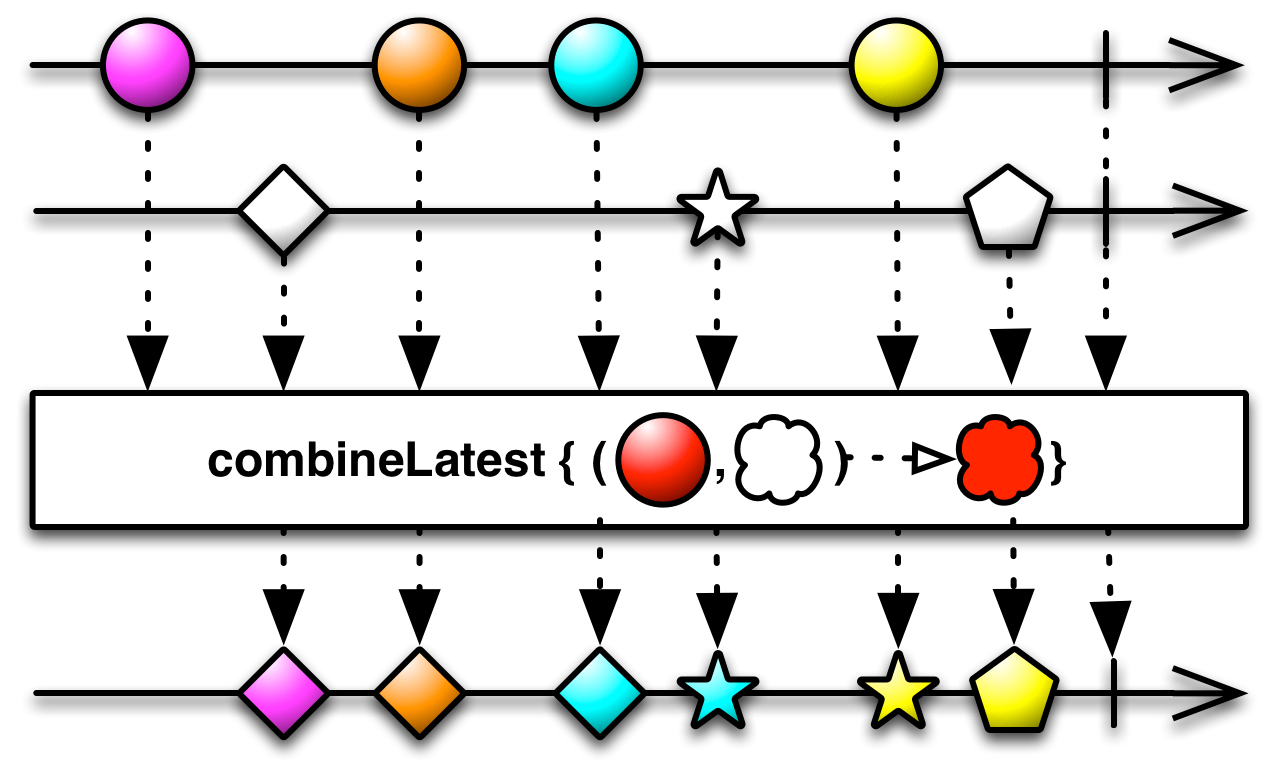
- Scheduler:
combineLatestdoes not operate by default on a particularScheduler.
- Type Parameters:
T- the common base type of source valuesR- the result type- Parameters:
sources- the collection of source ObservableSourcescombiner- the aggregation function used to combine the items emitted by the source ObservableSourcesbufferSize- the internal buffer size and prefetch amount applied to every source Observable- Returns:
- an Observable that emits items that are the result of combining the items emitted by the source ObservableSources by means of the given aggregation function
- See Also:
- ReactiveX operators documentation: CombineLatest
-
combineLatest
@CheckReturnValue @SchedulerSupport(value="none") public static <T,R> Observable<R> combineLatest(Iterable<? extends ObservableSource<? extends T>> sources, Function<? super Object[],? extends R> combiner)
Combines a collection of source ObservableSources by emitting an item that aggregates the latest values of each of the source ObservableSources each time an item is received from any of the source ObservableSources, where this aggregation is defined by a specified function.Note on method signature: since Java doesn't allow creating a generic array with
new T[], the implementation of this operator has to create anObject[]instead. Unfortunately, aFunction<Integer[], R>passed to the method would trigger aClassCastException.If any of the sources never produces an item but only terminates (normally or with an error), the resulting sequence terminates immediately (normally or with all the errors accumulated till that point). If that input source is also synchronous, other sources after it will not be subscribed to.
If the provided iterable of ObservableSources is empty, the resulting sequence completes immediately without emitting any items and without any calls to the combiner function.

- Scheduler:
combineLatestdoes not operate by default on a particularScheduler.
- Type Parameters:
T- the common base type of source valuesR- the result type- Parameters:
sources- the collection of source ObservableSourcescombiner- the aggregation function used to combine the items emitted by the source ObservableSources- Returns:
- an Observable that emits items that are the result of combining the items emitted by the source ObservableSources by means of the given aggregation function
- See Also:
- ReactiveX operators documentation: CombineLatest
-
combineLatest
@CheckReturnValue @NonNull @SchedulerSupport(value="none") public static <T,R> Observable<R> combineLatest(Iterable<? extends ObservableSource<? extends T>> sources, Function<? super Object[],? extends R> combiner, int bufferSize)
Combines a collection of source ObservableSources by emitting an item that aggregates the latest values of each of the source ObservableSources each time an item is received from any of the source ObservableSources, where this aggregation is defined by a specified function.Note on method signature: since Java doesn't allow creating a generic array with
new T[], the implementation of this operator has to create anObject[]instead. Unfortunately, aFunction<Integer[], R>passed to the method would trigger aClassCastException.If any of the sources never produces an item but only terminates (normally or with an error), the resulting sequence terminates immediately (normally or with all the errors accumulated till that point). If that input source is also synchronous, other sources after it will not be subscribed to.
If the provided iterable of ObservableSources is empty, the resulting sequence completes immediately without emitting any items and without any calls to the combiner function.

- Scheduler:
combineLatestdoes not operate by default on a particularScheduler.
- Type Parameters:
T- the common base type of source valuesR- the result type- Parameters:
sources- the collection of source ObservableSourcescombiner- the aggregation function used to combine the items emitted by the source ObservableSourcesbufferSize- the internal buffer size and prefetch amount applied to every source Observable- Returns:
- an Observable that emits items that are the result of combining the items emitted by the source ObservableSources by means of the given aggregation function
- See Also:
- ReactiveX operators documentation: CombineLatest
-
combineLatest
@CheckReturnValue @SchedulerSupport(value="none") public static <T,R> Observable<R> combineLatest(ObservableSource<? extends T>[] sources, Function<? super Object[],? extends R> combiner)
Combines a collection of source ObservableSources by emitting an item that aggregates the latest values of each of the source ObservableSources each time an item is received from any of the source ObservableSources, where this aggregation is defined by a specified function.Note on method signature: since Java doesn't allow creating a generic array with
new T[], the implementation of this operator has to create anObject[]instead. Unfortunately, aFunction<Integer[], R>passed to the method would trigger aClassCastException.If any of the sources never produces an item but only terminates (normally or with an error), the resulting sequence terminates immediately (normally or with all the errors accumulated till that point). If that input source is also synchronous, other sources after it will not be subscribed to.
If the provided array of ObservableSources is empty, the resulting sequence completes immediately without emitting any items and without any calls to the combiner function.

- Scheduler:
combineLatestdoes not operate by default on a particularScheduler.
- Type Parameters:
T- the common base type of source valuesR- the result type- Parameters:
sources- the collection of source ObservableSourcescombiner- the aggregation function used to combine the items emitted by the source ObservableSources- Returns:
- an Observable that emits items that are the result of combining the items emitted by the source ObservableSources by means of the given aggregation function
- See Also:
- ReactiveX operators documentation: CombineLatest
-
combineLatest
@CheckReturnValue @NonNull @SchedulerSupport(value="none") public static <T,R> Observable<R> combineLatest(ObservableSource<? extends T>[] sources, Function<? super Object[],? extends R> combiner, int bufferSize)
Combines a collection of source ObservableSources by emitting an item that aggregates the latest values of each of the source ObservableSources each time an item is received from any of the source ObservableSources, where this aggregation is defined by a specified function.Note on method signature: since Java doesn't allow creating a generic array with
new T[], the implementation of this operator has to create anObject[]instead. Unfortunately, aFunction<Integer[], R>passed to the method would trigger aClassCastException.If any of the sources never produces an item but only terminates (normally or with an error), the resulting sequence terminates immediately (normally or with all the errors accumulated till that point). If that input source is also synchronous, other sources after it will not be subscribed to.
If the provided array of ObservableSources is empty, the resulting sequence completes immediately without emitting any items and without any calls to the combiner function.

- Scheduler:
combineLatestdoes not operate by default on a particularScheduler.
- Type Parameters:
T- the common base type of source valuesR- the result type- Parameters:
sources- the collection of source ObservableSourcescombiner- the aggregation function used to combine the items emitted by the source ObservableSourcesbufferSize- the internal buffer size and prefetch amount applied to every source Observable- Returns:
- an Observable that emits items that are the result of combining the items emitted by the source ObservableSources by means of the given aggregation function
- See Also:
- ReactiveX operators documentation: CombineLatest
-
combineLatest
@CheckReturnValue @NonNull @SchedulerSupport(value="none") public static <T1,T2,R> Observable<R> combineLatest(ObservableSource<? extends T1> source1, ObservableSource<? extends T2> source2, BiFunction<? super T1,? super T2,? extends R> combiner)
Combines two source ObservableSources by emitting an item that aggregates the latest values of each of the source ObservableSources each time an item is received from either of the source ObservableSources, where this aggregation is defined by a specified function.If any of the sources never produces an item but only terminates (normally or with an error), the resulting sequence terminates immediately (normally or with all the errors accumulated till that point). If that input source is also synchronous, other sources after it will not be subscribed to.

- Scheduler:
combineLatestdoes not operate by default on a particularScheduler.
- Type Parameters:
T1- the element type of the first sourceT2- the element type of the second sourceR- the combined output type- Parameters:
source1- the first source ObservableSourcesource2- the second source ObservableSourcecombiner- the aggregation function used to combine the items emitted by the source ObservableSources- Returns:
- an Observable that emits items that are the result of combining the items emitted by the source ObservableSources by means of the given aggregation function
- See Also:
- ReactiveX operators documentation: CombineLatest
-
combineLatest
@CheckReturnValue @NonNull @SchedulerSupport(value="none") public static <T1,T2,T3,R> Observable<R> combineLatest(ObservableSource<? extends T1> source1, ObservableSource<? extends T2> source2, ObservableSource<? extends T3> source3, Function3<? super T1,? super T2,? super T3,? extends R> combiner)
Combines three source ObservableSources by emitting an item that aggregates the latest values of each of the source ObservableSources each time an item is received from any of the source ObservableSources, where this aggregation is defined by a specified function.If any of the sources never produces an item but only terminates (normally or with an error), the resulting sequence terminates immediately (normally or with all the errors accumulated till that point). If that input source is also synchronous, other sources after it will not be subscribed to.

- Scheduler:
combineLatestdoes not operate by default on a particularScheduler.
- Type Parameters:
T1- the element type of the first sourceT2- the element type of the second sourceT3- the element type of the third sourceR- the combined output type- Parameters:
source1- the first source ObservableSourcesource2- the second source ObservableSourcesource3- the third source ObservableSourcecombiner- the aggregation function used to combine the items emitted by the source ObservableSources- Returns:
- an Observable that emits items that are the result of combining the items emitted by the source ObservableSources by means of the given aggregation function
- See Also:
- ReactiveX operators documentation: CombineLatest
-
combineLatest
@CheckReturnValue @NonNull @SchedulerSupport(value="none") public static <T1,T2,T3,T4,R> Observable<R> combineLatest(ObservableSource<? extends T1> source1, ObservableSource<? extends T2> source2, ObservableSource<? extends T3> source3, ObservableSource<? extends T4> source4, Function4<? super T1,? super T2,? super T3,? super T4,? extends R> combiner)
Combines four source ObservableSources by emitting an item that aggregates the latest values of each of the source ObservableSources each time an item is received from any of the source ObservableSources, where this aggregation is defined by a specified function.If any of the sources never produces an item but only terminates (normally or with an error), the resulting sequence terminates immediately (normally or with all the errors accumulated till that point). If that input source is also synchronous, other sources after it will not be subscribed to.

- Scheduler:
combineLatestdoes not operate by default on a particularScheduler.
- Type Parameters:
T1- the element type of the first sourceT2- the element type of the second sourceT3- the element type of the third sourceT4- the element type of the fourth sourceR- the combined output type- Parameters:
source1- the first source ObservableSourcesource2- the second source ObservableSourcesource3- the third source ObservableSourcesource4- the fourth source ObservableSourcecombiner- the aggregation function used to combine the items emitted by the source ObservableSources- Returns:
- an Observable that emits items that are the result of combining the items emitted by the source ObservableSources by means of the given aggregation function
- See Also:
- ReactiveX operators documentation: CombineLatest
-
combineLatest
@CheckReturnValue @NonNull @SchedulerSupport(value="none") public static <T1,T2,T3,T4,T5,R> Observable<R> combineLatest(ObservableSource<? extends T1> source1, ObservableSource<? extends T2> source2, ObservableSource<? extends T3> source3, ObservableSource<? extends T4> source4, ObservableSource<? extends T5> source5, Function5<? super T1,? super T2,? super T3,? super T4,? super T5,? extends R> combiner)
Combines five source ObservableSources by emitting an item that aggregates the latest values of each of the source ObservableSources each time an item is received from any of the source ObservableSources, where this aggregation is defined by a specified function.If any of the sources never produces an item but only terminates (normally or with an error), the resulting sequence terminates immediately (normally or with all the errors accumulated till that point). If that input source is also synchronous, other sources after it will not be subscribed to.

- Scheduler:
combineLatestdoes not operate by default on a particularScheduler.
- Type Parameters:
T1- the element type of the first sourceT2- the element type of the second sourceT3- the element type of the third sourceT4- the element type of the fourth sourceT5- the element type of the fifth sourceR- the combined output type- Parameters:
source1- the first source ObservableSourcesource2- the second source ObservableSourcesource3- the third source ObservableSourcesource4- the fourth source ObservableSourcesource5- the fifth source ObservableSourcecombiner- the aggregation function used to combine the items emitted by the source ObservableSources- Returns:
- an Observable that emits items that are the result of combining the items emitted by the source ObservableSources by means of the given aggregation function
- See Also:
- ReactiveX operators documentation: CombineLatest
-
combineLatest
@CheckReturnValue @NonNull @SchedulerSupport(value="none") public static <T1,T2,T3,T4,T5,T6,R> Observable<R> combineLatest(ObservableSource<? extends T1> source1, ObservableSource<? extends T2> source2, ObservableSource<? extends T3> source3, ObservableSource<? extends T4> source4, ObservableSource<? extends T5> source5, ObservableSource<? extends T6> source6, Function6<? super T1,? super T2,? super T3,? super T4,? super T5,? super T6,? extends R> combiner)
Combines six source ObservableSources by emitting an item that aggregates the latest values of each of the source ObservableSources each time an item is received from any of the source ObservableSources, where this aggregation is defined by a specified function.If any of the sources never produces an item but only terminates (normally or with an error), the resulting sequence terminates immediately (normally or with all the errors accumulated till that point). If that input source is also synchronous, other sources after it will not be subscribed to.

- Scheduler:
combineLatestdoes not operate by default on a particularScheduler.
- Type Parameters:
T1- the element type of the first sourceT2- the element type of the second sourceT3- the element type of the third sourceT4- the element type of the fourth sourceT5- the element type of the fifth sourceT6- the element type of the sixth sourceR- the combined output type- Parameters:
source1- the first source ObservableSourcesource2- the second source ObservableSourcesource3- the third source ObservableSourcesource4- the fourth source ObservableSourcesource5- the fifth source ObservableSourcesource6- the sixth source ObservableSourcecombiner- the aggregation function used to combine the items emitted by the source ObservableSources- Returns:
- an Observable that emits items that are the result of combining the items emitted by the source ObservableSources by means of the given aggregation function
- See Also:
- ReactiveX operators documentation: CombineLatest
-
combineLatest
@CheckReturnValue @NonNull @SchedulerSupport(value="none") public static <T1,T2,T3,T4,T5,T6,T7,R> Observable<R> combineLatest(ObservableSource<? extends T1> source1, ObservableSource<? extends T2> source2, ObservableSource<? extends T3> source3, ObservableSource<? extends T4> source4, ObservableSource<? extends T5> source5, ObservableSource<? extends T6> source6, ObservableSource<? extends T7> source7, Function7<? super T1,? super T2,? super T3,? super T4,? super T5,? super T6,? super T7,? extends R> combiner)
Combines seven source ObservableSources by emitting an item that aggregates the latest values of each of the source ObservableSources each time an item is received from any of the source ObservableSources, where this aggregation is defined by a specified function.If any of the sources never produces an item but only terminates (normally or with an error), the resulting sequence terminates immediately (normally or with all the errors accumulated till that point). If that input source is also synchronous, other sources after it will not be subscribed to.

- Scheduler:
combineLatestdoes not operate by default on a particularScheduler.
- Type Parameters:
T1- the element type of the first sourceT2- the element type of the second sourceT3- the element type of the third sourceT4- the element type of the fourth sourceT5- the element type of the fifth sourceT6- the element type of the sixth sourceT7- the element type of the seventh sourceR- the combined output type- Parameters:
source1- the first source ObservableSourcesource2- the second source ObservableSourcesource3- the third source ObservableSourcesource4- the fourth source ObservableSourcesource5- the fifth source ObservableSourcesource6- the sixth source ObservableSourcesource7- the seventh source ObservableSourcecombiner- the aggregation function used to combine the items emitted by the source ObservableSources- Returns:
- an Observable that emits items that are the result of combining the items emitted by the source ObservableSources by means of the given aggregation function
- See Also:
- ReactiveX operators documentation: CombineLatest
-
combineLatest
@CheckReturnValue @NonNull @SchedulerSupport(value="none") public static <T1,T2,T3,T4,T5,T6,T7,T8,R> Observable<R> combineLatest(ObservableSource<? extends T1> source1, ObservableSource<? extends T2> source2, ObservableSource<? extends T3> source3, ObservableSource<? extends T4> source4, ObservableSource<? extends T5> source5, ObservableSource<? extends T6> source6, ObservableSource<? extends T7> source7, ObservableSource<? extends T8> source8, Function8<? super T1,? super T2,? super T3,? super T4,? super T5,? super T6,? super T7,? super T8,? extends R> combiner)
Combines eight source ObservableSources by emitting an item that aggregates the latest values of each of the source ObservableSources each time an item is received from any of the source ObservableSources, where this aggregation is defined by a specified function.If any of the sources never produces an item but only terminates (normally or with an error), the resulting sequence terminates immediately (normally or with all the errors accumulated till that point). If that input source is also synchronous, other sources after it will not be subscribed to.

- Scheduler:
combineLatestdoes not operate by default on a particularScheduler.
- Type Parameters:
T1- the element type of the first sourceT2- the element type of the second sourceT3- the element type of the third sourceT4- the element type of the fourth sourceT5- the element type of the fifth sourceT6- the element type of the sixth sourceT7- the element type of the seventh sourceT8- the element type of the eighth sourceR- the combined output type- Parameters:
source1- the first source ObservableSourcesource2- the second source ObservableSourcesource3- the third source ObservableSourcesource4- the fourth source ObservableSourcesource5- the fifth source ObservableSourcesource6- the sixth source ObservableSourcesource7- the seventh source ObservableSourcesource8- the eighth source ObservableSourcecombiner- the aggregation function used to combine the items emitted by the source ObservableSources- Returns:
- an Observable that emits items that are the result of combining the items emitted by the source ObservableSources by means of the given aggregation function
- See Also:
- ReactiveX operators documentation: CombineLatest
-
combineLatest
@CheckReturnValue @NonNull @SchedulerSupport(value="none") public static <T1,T2,T3,T4,T5,T6,T7,T8,T9,R> Observable<R> combineLatest(ObservableSource<? extends T1> source1, ObservableSource<? extends T2> source2, ObservableSource<? extends T3> source3, ObservableSource<? extends T4> source4, ObservableSource<? extends T5> source5, ObservableSource<? extends T6> source6, ObservableSource<? extends T7> source7, ObservableSource<? extends T8> source8, ObservableSource<? extends T9> source9, Function9<? super T1,? super T2,? super T3,? super T4,? super T5,? super T6,? super T7,? super T8,? super T9,? extends R> combiner)
Combines nine source ObservableSources by emitting an item that aggregates the latest values of each of the source ObservableSources each time an item is received from any of the source ObservableSources, where this aggregation is defined by a specified function.If any of the sources never produces an item but only terminates (normally or with an error), the resulting sequence terminates immediately (normally or with all the errors accumulated till that point). If that input source is also synchronous, other sources after it will not be subscribed to.

- Scheduler:
combineLatestdoes not operate by default on a particularScheduler.
- Type Parameters:
T1- the element type of the first sourceT2- the element type of the second sourceT3- the element type of the third sourceT4- the element type of the fourth sourceT5- the element type of the fifth sourceT6- the element type of the sixth sourceT7- the element type of the seventh sourceT8- the element type of the eighth sourceT9- the element type of the ninth sourceR- the combined output type- Parameters:
source1- the first source ObservableSourcesource2- the second source ObservableSourcesource3- the third source ObservableSourcesource4- the fourth source ObservableSourcesource5- the fifth source ObservableSourcesource6- the sixth source ObservableSourcesource7- the seventh source ObservableSourcesource8- the eighth source ObservableSourcesource9- the ninth source ObservableSourcecombiner- the aggregation function used to combine the items emitted by the source ObservableSources- Returns:
- an Observable that emits items that are the result of combining the items emitted by the source ObservableSources by means of the given aggregation function
- See Also:
- ReactiveX operators documentation: CombineLatest
-
combineLatestDelayError
@CheckReturnValue @SchedulerSupport(value="none") public static <T,R> Observable<R> combineLatestDelayError(ObservableSource<? extends T>[] sources, Function<? super Object[],? extends R> combiner)
Combines a collection of source ObservableSources by emitting an item that aggregates the latest values of each of the source ObservableSources each time an item is received from any of the source ObservableSources, where this aggregation is defined by a specified function.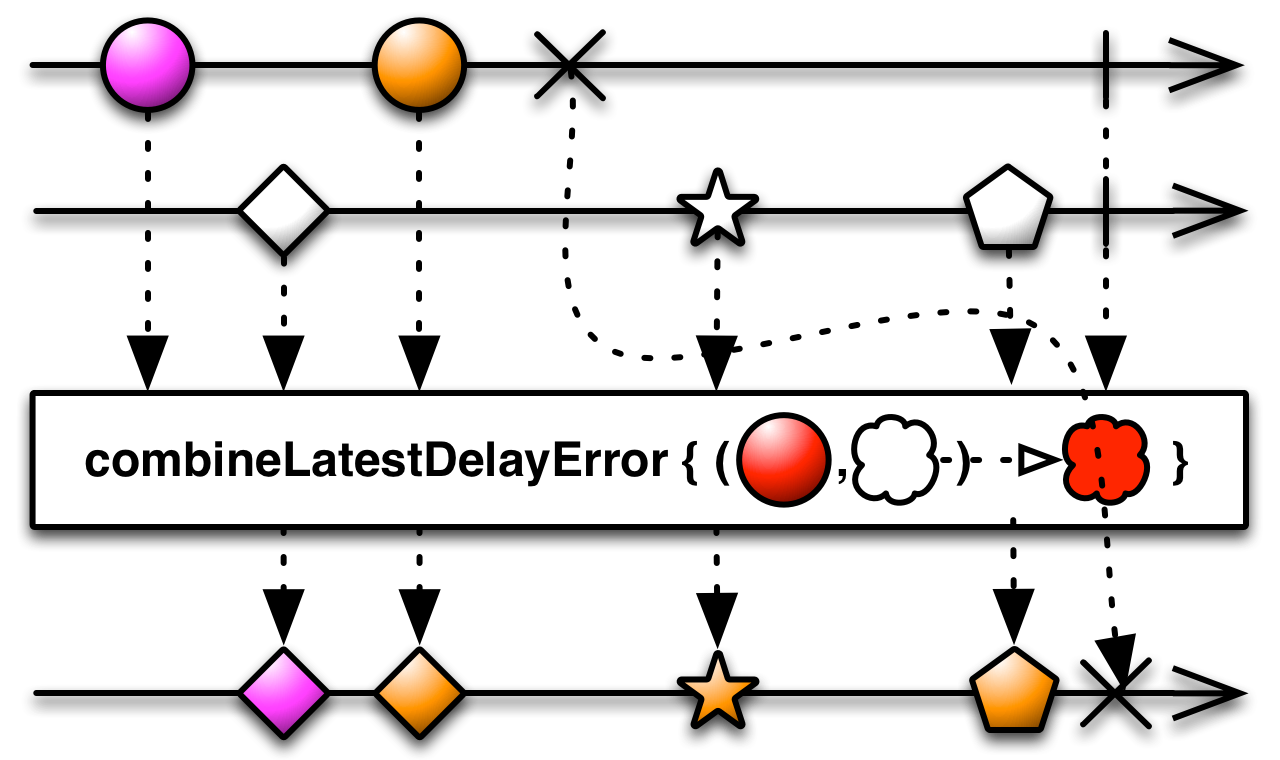
Note on method signature: since Java doesn't allow creating a generic array with
new T[], the implementation of this operator has to create anObject[]instead. Unfortunately, aFunction<Integer[], R>passed to the method would trigger aClassCastException.If any of the sources never produces an item but only terminates (normally or with an error), the resulting sequence terminates immediately (normally or with all the errors accumulated till that point). If that input source is also synchronous, other sources after it will not be subscribed to.
If the provided array of ObservableSources is empty, the resulting sequence completes immediately without emitting any items and without any calls to the combiner function.
- Scheduler:
combineLatestDelayErrordoes not operate by default on a particularScheduler.
- Type Parameters:
T- the common base type of source valuesR- the result type- Parameters:
sources- the collection of source ObservableSourcescombiner- the aggregation function used to combine the items emitted by the source ObservableSources- Returns:
- an Observable that emits items that are the result of combining the items emitted by the source ObservableSources by means of the given aggregation function
- See Also:
- ReactiveX operators documentation: CombineLatest
-
combineLatestDelayError
@CheckReturnValue @SchedulerSupport(value="none") public static <T,R> Observable<R> combineLatestDelayError(Function<? super Object[],? extends R> combiner, int bufferSize, ObservableSource<? extends T>... sources)
Combines a collection of source ObservableSources by emitting an item that aggregates the latest values of each of the source ObservableSources each time an item is received from any of the source ObservableSources, where this aggregation is defined by a specified function and delays any error from the sources until all source ObservableSources terminate.
Note on method signature: since Java doesn't allow creating a generic array with
new T[], the implementation of this operator has to create anObject[]instead. Unfortunately, aFunction<Integer[], R>passed to the method would trigger aClassCastException.If any of the sources never produces an item but only terminates (normally or with an error), the resulting sequence terminates immediately (normally or with all the errors accumulated till that point). If that input source is also synchronous, other sources after it will not be subscribed to.
If there are no ObservableSources provided, the resulting sequence completes immediately without emitting any items and without any calls to the combiner function.
- Scheduler:
combineLatestDelayErrordoes not operate by default on a particularScheduler.
- Type Parameters:
T- the common base type of source valuesR- the result type- Parameters:
sources- the collection of source ObservableSourcescombiner- the aggregation function used to combine the items emitted by the source ObservableSourcesbufferSize- the internal buffer size and prefetch amount applied to every source Observable- Returns:
- an Observable that emits items that are the result of combining the items emitted by the source ObservableSources by means of the given aggregation function
- See Also:
- ReactiveX operators documentation: CombineLatest
-
combineLatestDelayError
@CheckReturnValue @NonNull @SchedulerSupport(value="none") public static <T,R> Observable<R> combineLatestDelayError(ObservableSource<? extends T>[] sources, Function<? super Object[],? extends R> combiner, int bufferSize)
Combines a collection of source ObservableSources by emitting an item that aggregates the latest values of each of the source ObservableSources each time an item is received from any of the source ObservableSources, where this aggregation is defined by a specified function and delays any error from the sources until all source ObservableSources terminate.Note on method signature: since Java doesn't allow creating a generic array with
new T[], the implementation of this operator has to create anObject[]instead. Unfortunately, aFunction<Integer[], R>passed to the method would trigger aClassCastException.If any of the sources never produces an item but only terminates (normally or with an error), the resulting sequence terminates immediately (normally or with all the errors accumulated till that point). If that input source is also synchronous, other sources after it will not be subscribed to.
If the provided array of ObservableSources is empty, the resulting sequence completes immediately without emitting any items and without any calls to the combiner function.

- Scheduler:
combineLatestDelayErrordoes not operate by default on a particularScheduler.
- Type Parameters:
T- the common base type of source valuesR- the result type- Parameters:
sources- the collection of source ObservableSourcescombiner- the aggregation function used to combine the items emitted by the source ObservableSourcesbufferSize- the internal buffer size and prefetch amount applied to every source Observable- Returns:
- an Observable that emits items that are the result of combining the items emitted by the source ObservableSources by means of the given aggregation function
- See Also:
- ReactiveX operators documentation: CombineLatest
-
combineLatestDelayError
@CheckReturnValue @SchedulerSupport(value="none") public static <T,R> Observable<R> combineLatestDelayError(Iterable<? extends ObservableSource<? extends T>> sources, Function<? super Object[],? extends R> combiner)
Combines a collection of source ObservableSources by emitting an item that aggregates the latest values of each of the source ObservableSources each time an item is received from any of the source ObservableSources, where this aggregation is defined by a specified function and delays any error from the sources until all source ObservableSources terminate.Note on method signature: since Java doesn't allow creating a generic array with
new T[], the implementation of this operator has to create anObject[]instead. Unfortunately, aFunction<Integer[], R>passed to the method would trigger aClassCastException.If any of the sources never produces an item but only terminates (normally or with an error), the resulting sequence terminates immediately (normally or with all the errors accumulated till that point). If that input source is also synchronous, other sources after it will not be subscribed to.
If the provided iterable of ObservableSources is empty, the resulting sequence completes immediately without emitting any items and without any calls to the combiner function.

- Scheduler:
combineLatestDelayErrordoes not operate by default on a particularScheduler.
- Type Parameters:
T- the common base type of source valuesR- the result type- Parameters:
sources- the collection of source ObservableSourcescombiner- the aggregation function used to combine the items emitted by the source ObservableSources- Returns:
- an Observable that emits items that are the result of combining the items emitted by the source ObservableSources by means of the given aggregation function
- See Also:
- ReactiveX operators documentation: CombineLatest
-
combineLatestDelayError
@CheckReturnValue @NonNull @SchedulerSupport(value="none") public static <T,R> Observable<R> combineLatestDelayError(Iterable<? extends ObservableSource<? extends T>> sources, Function<? super Object[],? extends R> combiner, int bufferSize)
Combines a collection of source ObservableSources by emitting an item that aggregates the latest values of each of the source ObservableSources each time an item is received from any of the source ObservableSources, where this aggregation is defined by a specified function and delays any error from the sources until all source ObservableSources terminate.Note on method signature: since Java doesn't allow creating a generic array with
new T[], the implementation of this operator has to create anObject[]instead. Unfortunately, aFunction<Integer[], R>passed to the method would trigger aClassCastException.If any of the sources never produces an item but only terminates (normally or with an error), the resulting sequence terminates immediately (normally or with all the errors accumulated till that point). If that input source is also synchronous, other sources after it will not be subscribed to.
If the provided iterable of ObservableSources is empty, the resulting sequence completes immediately without emitting any items and without any calls to the combiner function.

- Scheduler:
combineLatestDelayErrordoes not operate by default on a particularScheduler.
- Type Parameters:
T- the common base type of source valuesR- the result type- Parameters:
sources- the collection of source ObservableSourcescombiner- the aggregation function used to combine the items emitted by the source ObservableSourcesbufferSize- the internal buffer size and prefetch amount applied to every source Observable- Returns:
- an Observable that emits items that are the result of combining the items emitted by the source ObservableSources by means of the given aggregation function
- See Also:
- ReactiveX operators documentation: CombineLatest
-
concat
@CheckReturnValue @NonNull @SchedulerSupport(value="none") public static <T> Observable<T> concat(Iterable<? extends ObservableSource<? extends T>> sources)
Concatenates elements of each ObservableSource provided via an Iterable sequence into a single sequence of elements without interleaving them.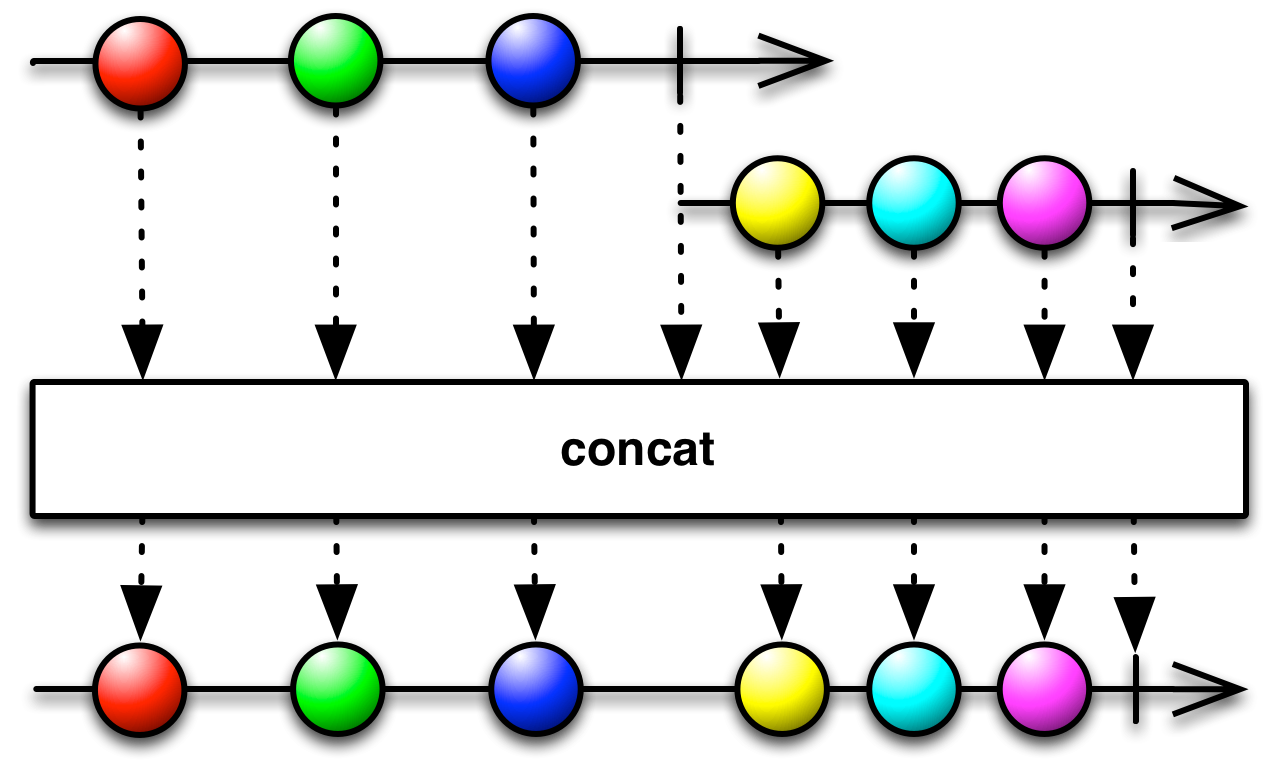
- Scheduler:
concatdoes not operate by default on a particularScheduler.
- Type Parameters:
T- the common value type of the sources- Parameters:
sources- the Iterable sequence of ObservableSources- Returns:
- the new Observable instance
-
concat
@CheckReturnValue @SchedulerSupport(value="none") public static <T> Observable<T> concat(ObservableSource<? extends ObservableSource<? extends T>> sources)
Returns an Observable that emits the items emitted by each of the ObservableSources emitted by the source ObservableSource, one after the other, without interleaving them.
- Scheduler:
concatdoes not operate by default on a particularScheduler.
- Type Parameters:
T- the common element base type- Parameters:
sources- an ObservableSource that emits ObservableSources- Returns:
- an Observable that emits items all of the items emitted by the ObservableSources emitted by
ObservableSources, one after the other, without interleaving them - See Also:
- ReactiveX operators documentation: Concat
-
concat
@CheckReturnValue @NonNull @SchedulerSupport(value="none") public static <T> Observable<T> concat(ObservableSource<? extends ObservableSource<? extends T>> sources, int prefetch)
Returns an Observable that emits the items emitted by each of the ObservableSources emitted by the source ObservableSource, one after the other, without interleaving them.
- Scheduler:
concatdoes not operate by default on a particularScheduler.
- Type Parameters:
T- the common element base type- Parameters:
sources- an ObservableSource that emits ObservableSourcesprefetch- the number of ObservableSources to prefetch from the sources sequence.- Returns:
- an Observable that emits items all of the items emitted by the ObservableSources emitted by
ObservableSources, one after the other, without interleaving them - See Also:
- ReactiveX operators documentation: Concat
-
concat
@CheckReturnValue @NonNull @SchedulerSupport(value="none") public static <T> Observable<T> concat(ObservableSource<? extends T> source1, ObservableSource<? extends T> source2)
Returns an Observable that emits the items emitted by two ObservableSources, one after the other, without interleaving them.
- Scheduler:
concatdoes not operate by default on a particularScheduler.
- Type Parameters:
T- the common element base type- Parameters:
source1- an ObservableSource to be concatenatedsource2- an ObservableSource to be concatenated- Returns:
- an Observable that emits items emitted by the two source ObservableSources, one after the other, without interleaving them
- See Also:
- ReactiveX operators documentation: Concat
-
concat
@CheckReturnValue @NonNull @SchedulerSupport(value="none") public static <T> Observable<T> concat(ObservableSource<? extends T> source1, ObservableSource<? extends T> source2, ObservableSource<? extends T> source3)
Returns an Observable that emits the items emitted by three ObservableSources, one after the other, without interleaving them.
- Scheduler:
concatdoes not operate by default on a particularScheduler.
- Type Parameters:
T- the common element base type- Parameters:
source1- an ObservableSource to be concatenatedsource2- an ObservableSource to be concatenatedsource3- an ObservableSource to be concatenated- Returns:
- an Observable that emits items emitted by the three source ObservableSources, one after the other, without interleaving them
- See Also:
- ReactiveX operators documentation: Concat
-
concat
@CheckReturnValue @NonNull @SchedulerSupport(value="none") public static <T> Observable<T> concat(ObservableSource<? extends T> source1, ObservableSource<? extends T> source2, ObservableSource<? extends T> source3, ObservableSource<? extends T> source4)
Returns an Observable that emits the items emitted by four ObservableSources, one after the other, without interleaving them.
- Scheduler:
concatdoes not operate by default on a particularScheduler.
- Type Parameters:
T- the common element base type- Parameters:
source1- an ObservableSource to be concatenatedsource2- an ObservableSource to be concatenatedsource3- an ObservableSource to be concatenatedsource4- an ObservableSource to be concatenated- Returns:
- an Observable that emits items emitted by the four source ObservableSources, one after the other, without interleaving them
- See Also:
- ReactiveX operators documentation: Concat
-
concatArray
@CheckReturnValue @SchedulerSupport(value="none") public static <T> Observable<T> concatArray(ObservableSource<? extends T>... sources)
Concatenates a variable number of ObservableSource sources.Note: named this way because of overload conflict with concat(ObservableSource<ObservableSource>)
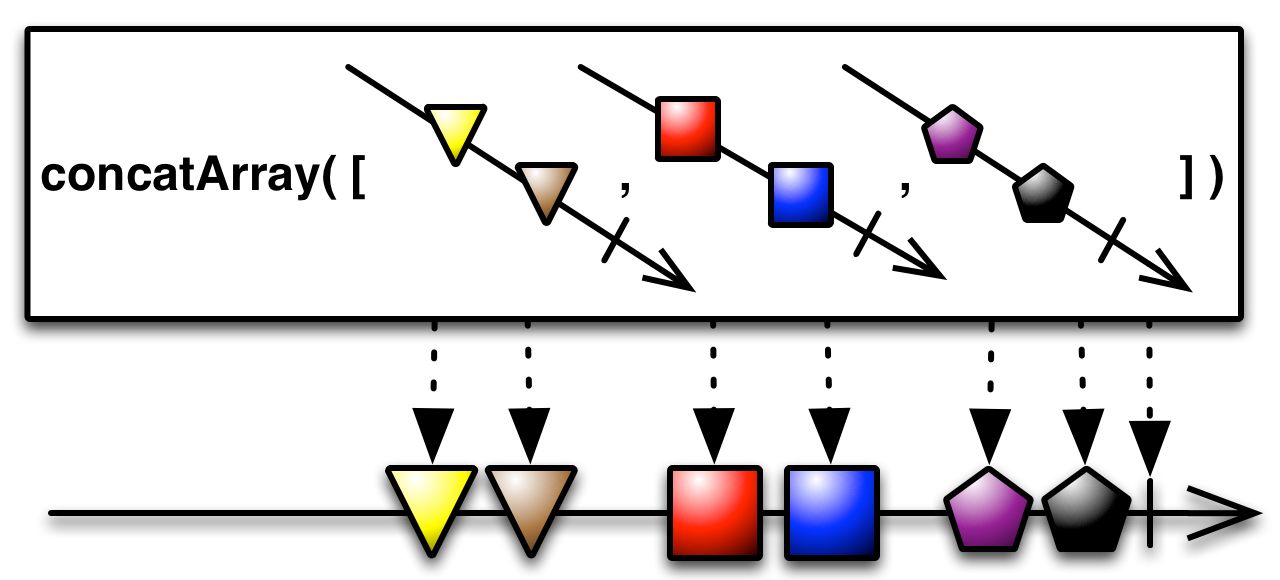
- Scheduler:
concatArraydoes not operate by default on a particularScheduler.
- Type Parameters:
T- the common base value type- Parameters:
sources- the array of sources- Returns:
- the new Observable instance
- Throws:
NullPointerException- if sources is null
-
concatArrayDelayError
@CheckReturnValue @SchedulerSupport(value="none") public static <T> Observable<T> concatArrayDelayError(ObservableSource<? extends T>... sources)
Concatenates a variable number of ObservableSource sources and delays errors from any of them till all terminate.
- Scheduler:
concatArrayDelayErrordoes not operate by default on a particularScheduler.
- Type Parameters:
T- the common base value type- Parameters:
sources- the array of sources- Returns:
- the new Observable instance
- Throws:
NullPointerException- if sources is null
-
concatArrayEager
@CheckReturnValue @SchedulerSupport(value="none") public static <T> Observable<T> concatArrayEager(ObservableSource<? extends T>... sources)
Concatenates an array of ObservableSources eagerly into a single stream of values.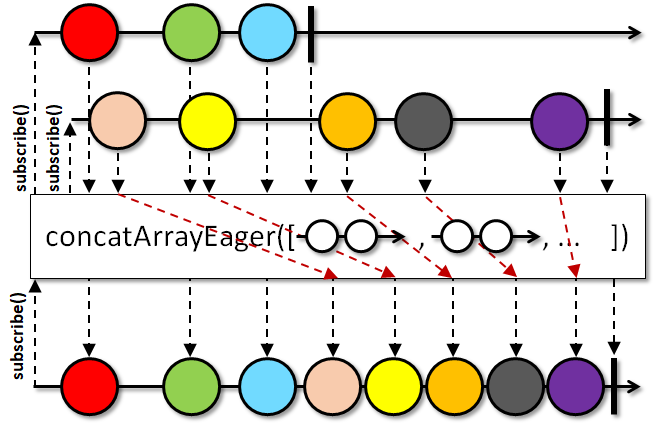
Eager concatenation means that once a subscriber subscribes, this operator subscribes to all of the source ObservableSources. The operator buffers the values emitted by these ObservableSources and then drains them in order, each one after the previous one completes.
- Scheduler:
- This method does not operate by default on a particular
Scheduler.
- Type Parameters:
T- the value type- Parameters:
sources- an array of ObservableSources that need to be eagerly concatenated- Returns:
- the new ObservableSource instance with the specified concatenation behavior
- Since:
- 2.0
-
concatArrayEager
@CheckReturnValue @SchedulerSupport(value="none") public static <T> Observable<T> concatArrayEager(int maxConcurrency, int prefetch, ObservableSource<? extends T>... sources)
Concatenates an array of ObservableSources eagerly into a single stream of values.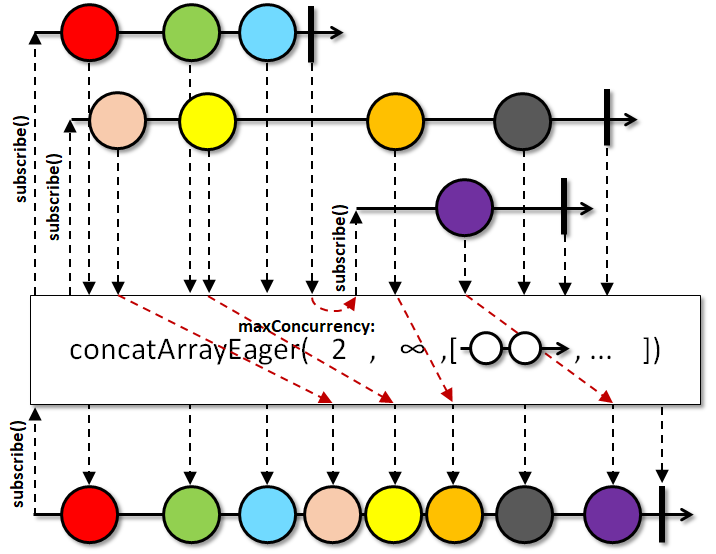
Eager concatenation means that once a subscriber subscribes, this operator subscribes to all of the source ObservableSources. The operator buffers the values emitted by these ObservableSources and then drains them in order, each one after the previous one completes.
- Scheduler:
- This method does not operate by default on a particular
Scheduler.
- Type Parameters:
T- the value type- Parameters:
sources- an array of ObservableSources that need to be eagerly concatenatedmaxConcurrency- the maximum number of concurrent subscriptions at a time, Integer.MAX_VALUE is interpreted as indication to subscribe to all sources at onceprefetch- the number of elements to prefetch from each ObservableSource source- Returns:
- the new ObservableSource instance with the specified concatenation behavior
- Since:
- 2.0
-
concatArrayEagerDelayError
@CheckReturnValue @SchedulerSupport(value="none") public static <T> Observable<T> concatArrayEagerDelayError(ObservableSource<? extends T>... sources)
Concatenates an array ofObservableSources eagerly into a single stream of values and delaying any errors until all sources terminate.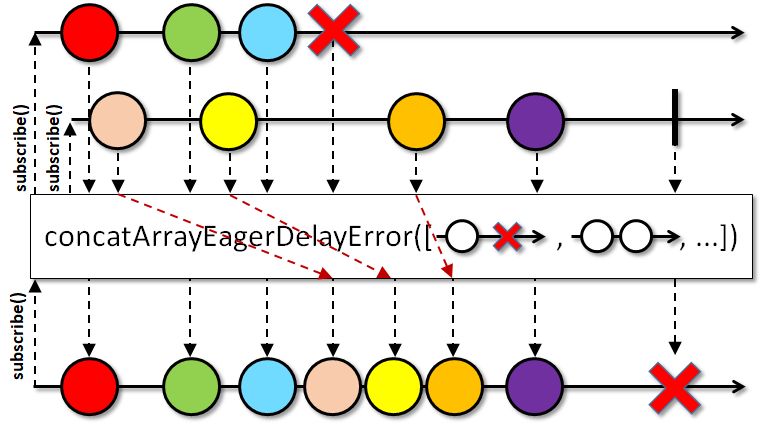
Eager concatenation means that once a subscriber subscribes, this operator subscribes to all of the source
ObservableSources. The operator buffers the values emitted by theseObservableSources and then drains them in order, each one after the previous one completes.- Scheduler:
- This method does not operate by default on a particular
Scheduler.
- Type Parameters:
T- the value type- Parameters:
sources- an array ofObservableSources that need to be eagerly concatenated- Returns:
- the new Observable instance with the specified concatenation behavior
- Since:
- 2.2.1 - experimental
-
concatArrayEagerDelayError
@CheckReturnValue @SchedulerSupport(value="none") public static <T> Observable<T> concatArrayEagerDelayError(int maxConcurrency, int prefetch, ObservableSource<? extends T>... sources)
Concatenates an array ofObservableSources eagerly into a single stream of values and delaying any errors until all sources terminate.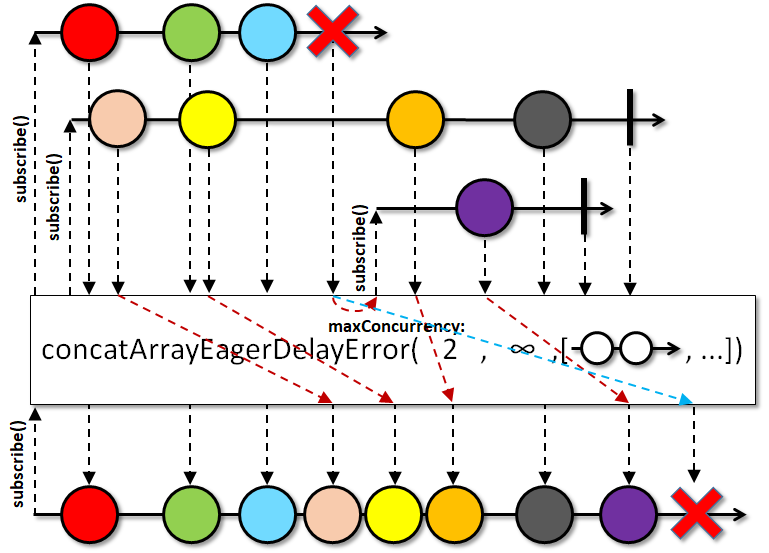
Eager concatenation means that once a subscriber subscribes, this operator subscribes to all of the source
ObservableSources. The operator buffers the values emitted by theseObservableSources and then drains them in order, each one after the previous one completes.- Scheduler:
- This method does not operate by default on a particular
Scheduler.
- Type Parameters:
T- the value type- Parameters:
sources- an array ofObservableSources that need to be eagerly concatenatedmaxConcurrency- the maximum number of concurrent subscriptions at a time, Integer.MAX_VALUE is interpreted as indication to subscribe to all sources at onceprefetch- the number of elements to prefetch from eachObservableSourcesource- Returns:
- the new Observable instance with the specified concatenation behavior
- Since:
- 2.2.1 - experimental
-
concatDelayError
@CheckReturnValue @NonNull @SchedulerSupport(value="none") public static <T> Observable<T> concatDelayError(Iterable<? extends ObservableSource<? extends T>> sources)
Concatenates the Iterable sequence of ObservableSources into a single sequence by subscribing to each ObservableSource, one after the other, one at a time and delays any errors till the all inner ObservableSources terminate.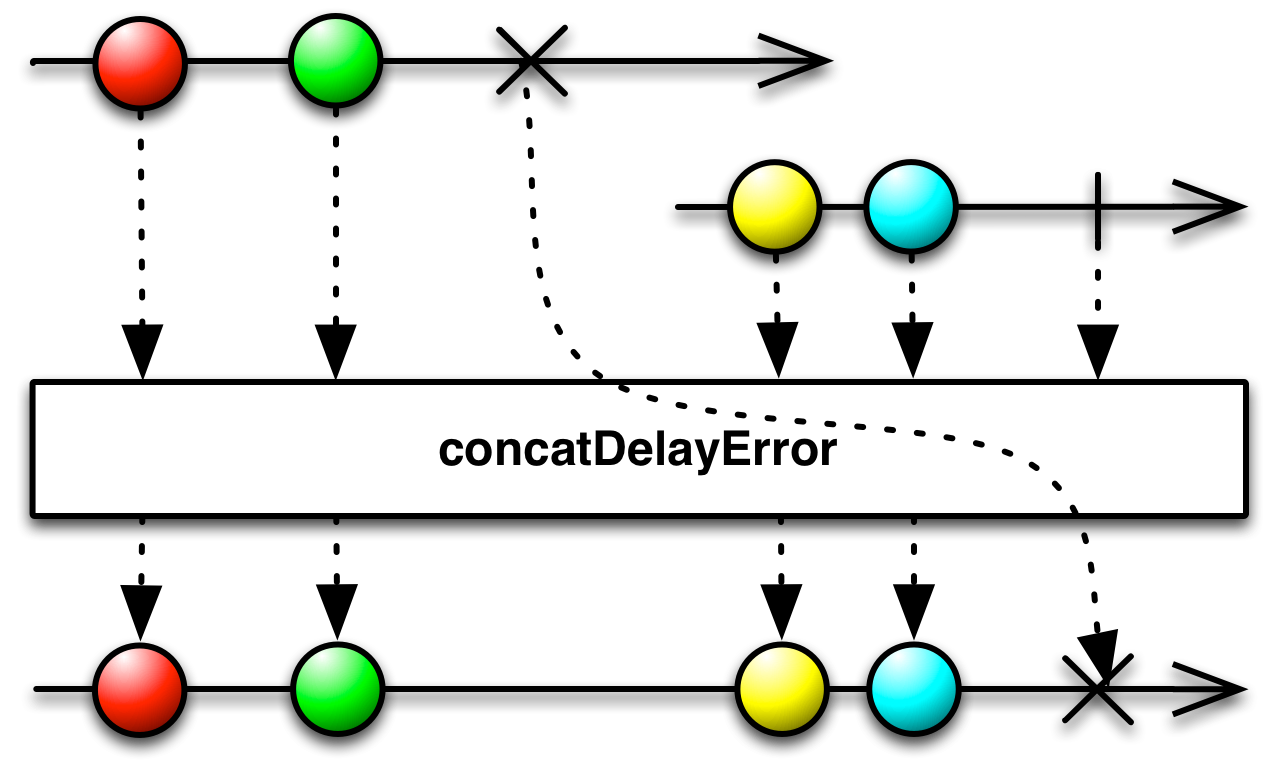
- Scheduler:
concatDelayErrordoes not operate by default on a particularScheduler.
- Type Parameters:
T- the common element base type- Parameters:
sources- the Iterable sequence of ObservableSources- Returns:
- the new ObservableSource with the concatenating behavior
-
concatDelayError
@CheckReturnValue @SchedulerSupport(value="none") public static <T> Observable<T> concatDelayError(ObservableSource<? extends ObservableSource<? extends T>> sources)
Concatenates the ObservableSource sequence of ObservableSources into a single sequence by subscribing to each inner ObservableSource, one after the other, one at a time and delays any errors till the all inner and the outer ObservableSources terminate.
- Scheduler:
concatDelayErrordoes not operate by default on a particularScheduler.
- Type Parameters:
T- the common element base type- Parameters:
sources- the ObservableSource sequence of ObservableSources- Returns:
- the new ObservableSource with the concatenating behavior
-
concatDelayError
@CheckReturnValue @NonNull @SchedulerSupport(value="none") public static <T> Observable<T> concatDelayError(ObservableSource<? extends ObservableSource<? extends T>> sources, int prefetch, boolean tillTheEnd)
Concatenates the ObservableSource sequence of ObservableSources into a single sequence by subscribing to each inner ObservableSource, one after the other, one at a time and delays any errors till the all inner and the outer ObservableSources terminate.
- Scheduler:
concatDelayErrordoes not operate by default on a particularScheduler.
- Type Parameters:
T- the common element base type- Parameters:
sources- the ObservableSource sequence of ObservableSourcesprefetch- the number of elements to prefetch from the outer ObservableSourcetillTheEnd- if true exceptions from the outer and all inner ObservableSources are delayed to the end if false, exception from the outer ObservableSource is delayed till the current ObservableSource terminates- Returns:
- the new ObservableSource with the concatenating behavior
-
concatEager
@CheckReturnValue @SchedulerSupport(value="none") public static <T> Observable<T> concatEager(ObservableSource<? extends ObservableSource<? extends T>> sources)
Concatenates an ObservableSource sequence of ObservableSources eagerly into a single stream of values.Eager concatenation means that once a subscriber subscribes, this operator subscribes to all of the emitted source ObservableSources as they are observed. The operator buffers the values emitted by these ObservableSources and then drains them in order, each one after the previous one completes.
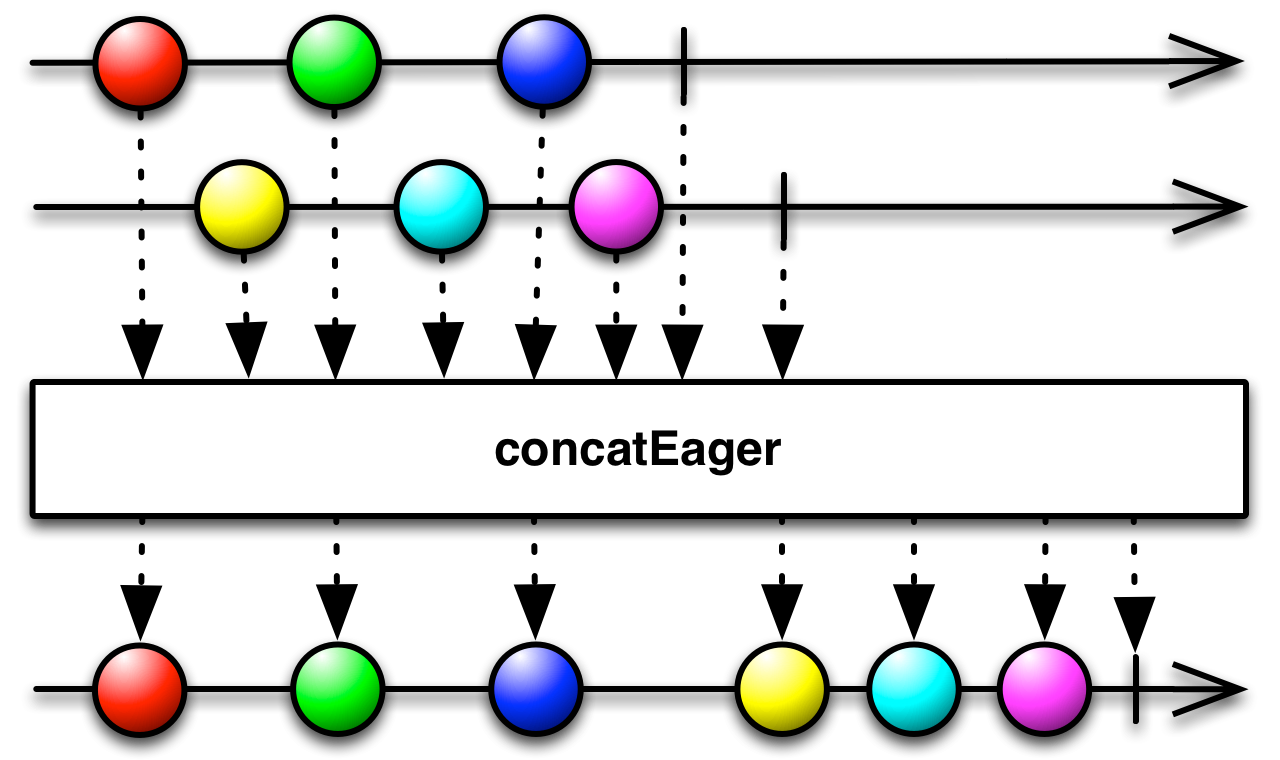
- Scheduler:
- This method does not operate by default on a particular
Scheduler.
- Type Parameters:
T- the value type- Parameters:
sources- a sequence of ObservableSources that need to be eagerly concatenated- Returns:
- the new ObservableSource instance with the specified concatenation behavior
- Since:
- 2.0
-
concatEager
@CheckReturnValue @SchedulerSupport(value="none") public static <T> Observable<T> concatEager(ObservableSource<? extends ObservableSource<? extends T>> sources, int maxConcurrency, int prefetch)
Concatenates an ObservableSource sequence of ObservableSources eagerly into a single stream of values.Eager concatenation means that once a subscriber subscribes, this operator subscribes to all of the emitted source ObservableSources as they are observed. The operator buffers the values emitted by these ObservableSources and then drains them in order, each one after the previous one completes.

- Scheduler:
- This method does not operate by default on a particular
Scheduler.
- Type Parameters:
T- the value type- Parameters:
sources- a sequence of ObservableSources that need to be eagerly concatenatedmaxConcurrency- the maximum number of concurrently running inner ObservableSources; Integer.MAX_VALUE is interpreted as all inner ObservableSources can be active at the same timeprefetch- the number of elements to prefetch from each inner ObservableSource source- Returns:
- the new ObservableSource instance with the specified concatenation behavior
- Since:
- 2.0
-
concatEager
@CheckReturnValue @SchedulerSupport(value="none") public static <T> Observable<T> concatEager(Iterable<? extends ObservableSource<? extends T>> sources)
Concatenates a sequence of ObservableSources eagerly into a single stream of values.Eager concatenation means that once a subscriber subscribes, this operator subscribes to all of the source ObservableSources. The operator buffers the values emitted by these ObservableSources and then drains them in order, each one after the previous one completes.

- Scheduler:
- This method does not operate by default on a particular
Scheduler.
- Type Parameters:
T- the value type- Parameters:
sources- a sequence of ObservableSources that need to be eagerly concatenated- Returns:
- the new ObservableSource instance with the specified concatenation behavior
- Since:
- 2.0
-
concatEager
@CheckReturnValue @SchedulerSupport(value="none") public static <T> Observable<T> concatEager(Iterable<? extends ObservableSource<? extends T>> sources, int maxConcurrency, int prefetch)
Concatenates a sequence of ObservableSources eagerly into a single stream of values.Eager concatenation means that once a subscriber subscribes, this operator subscribes to all of the source ObservableSources. The operator buffers the values emitted by these ObservableSources and then drains them in order, each one after the previous one completes.

- Scheduler:
- This method does not operate by default on a particular
Scheduler.
- Type Parameters:
T- the value type- Parameters:
sources- a sequence of ObservableSources that need to be eagerly concatenatedmaxConcurrency- the maximum number of concurrently running inner ObservableSources; Integer.MAX_VALUE is interpreted as all inner ObservableSources can be active at the same timeprefetch- the number of elements to prefetch from each inner ObservableSource source- Returns:
- the new ObservableSource instance with the specified concatenation behavior
- Since:
- 2.0
-
create
@CheckReturnValue @NonNull @SchedulerSupport(value="none") public static <T> Observable<T> create(ObservableOnSubscribe<T> source)
Provides an API (via a cold Observable) that bridges the reactive world with the callback-style world.Example:
Observable.<Event>create(emitter -> { Callback listener = new Callback() { @Override public void onEvent(Event e) { emitter.onNext(e); if (e.isLast()) { emitter.onComplete(); } } @Override public void onFailure(Exception e) { emitter.onError(e); } }; AutoCloseable c = api.someMethod(listener); emitter.setCancellable(c::close); });
You should call the ObservableEmitter's onNext, onError and onComplete methods in a serialized fashion. The rest of its methods are thread-safe.
- Scheduler:
createdoes not operate by default on a particularScheduler.
- Type Parameters:
T- the element type- Parameters:
source- the emitter that is called when an Observer subscribes to the returnedObservable- Returns:
- the new Observable instance
- See Also:
ObservableOnSubscribe,ObservableEmitter,Cancellable
-
defer
@CheckReturnValue @NonNull @SchedulerSupport(value="none") public static <T> Observable<T> defer(Callable<? extends ObservableSource<? extends T>> supplier)
Returns an Observable that calls an ObservableSource factory to create an ObservableSource for each new Observer that subscribes. That is, for each subscriber, the actual ObservableSource that subscriber observes is determined by the factory function.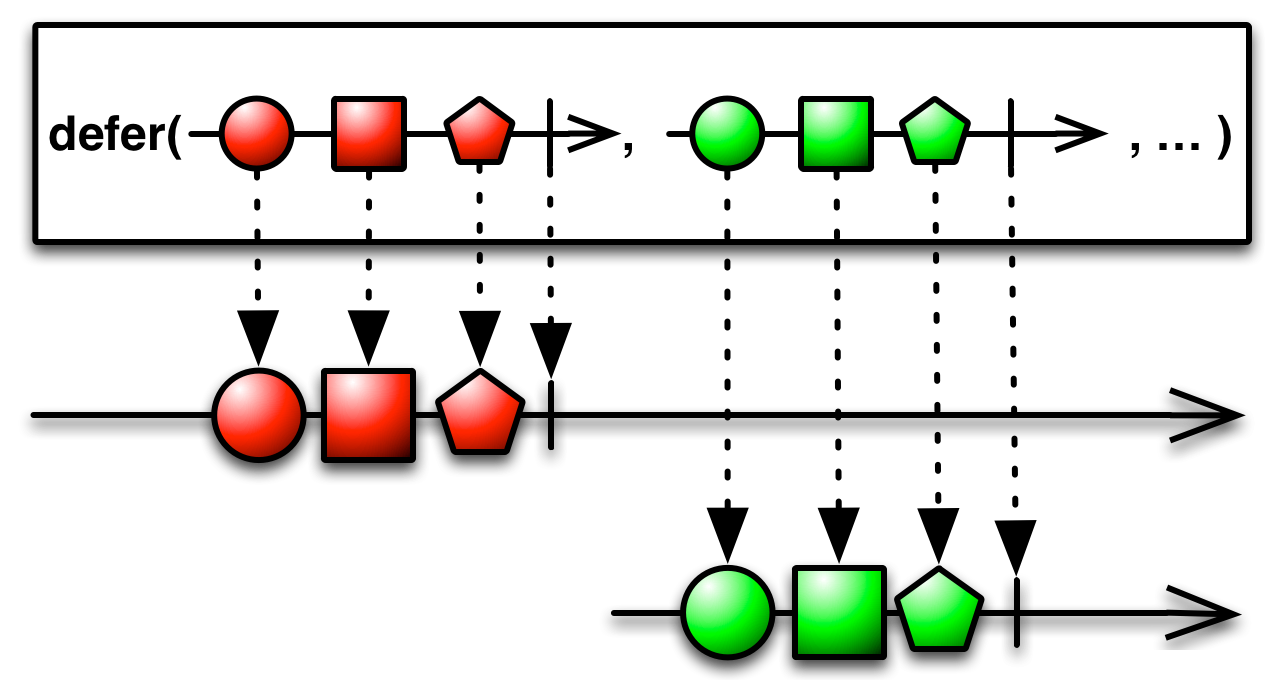
The defer Observer allows you to defer or delay emitting items from an ObservableSource until such time as an Observer subscribes to the ObservableSource. This allows an
Observerto easily obtain updates or a refreshed version of the sequence.- Scheduler:
deferdoes not operate by default on a particularScheduler.
- Type Parameters:
T- the type of the items emitted by the ObservableSource- Parameters:
supplier- the ObservableSource factory function to invoke for eachObserverthat subscribes to the resulting ObservableSource- Returns:
- an Observable whose
Observers' subscriptions trigger an invocation of the given ObservableSource factory function - See Also:
- ReactiveX operators documentation: Defer
-
empty
@CheckReturnValue @SchedulerSupport(value="none") public static <T> Observable<T> empty()
Returns an Observable that emits no items to theObserverand immediately invokes itsonCompletemethod.
- Scheduler:
emptydoes not operate by default on a particularScheduler.
- Type Parameters:
T- the type of the items (ostensibly) emitted by the ObservableSource- Returns:
- an Observable that emits no items to the
Observerbut immediately invokes theObserver'sonCompletemethod - See Also:
- ReactiveX operators documentation: Empty
-
error
@CheckReturnValue @NonNull @SchedulerSupport(value="none") public static <T> Observable<T> error(Callable<? extends Throwable> errorSupplier)
Returns an Observable that invokes anObserver'sonErrormethod when the Observer subscribes to it.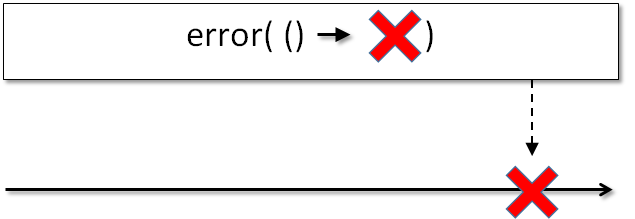
- Scheduler:
errordoes not operate by default on a particularScheduler.
- Type Parameters:
T- the type of the items (ostensibly) emitted by the ObservableSource- Parameters:
errorSupplier- a Callable factory to return a Throwable for each individual Observer- Returns:
- an Observable that invokes the
Observer'sonErrormethod when the Observer subscribes to it - See Also:
- ReactiveX operators documentation: Throw
-
error
@CheckReturnValue @NonNull @SchedulerSupport(value="none") public static <T> Observable<T> error(Throwable exception)
Returns an Observable that invokes anObserver'sonErrormethod when the Observer subscribes to it.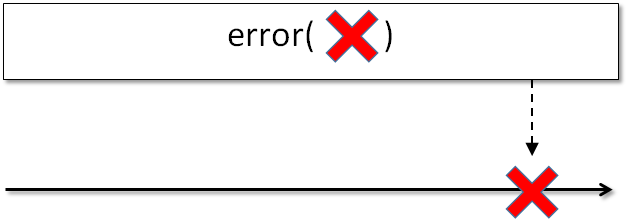
- Scheduler:
errordoes not operate by default on a particularScheduler.
- Type Parameters:
T- the type of the items (ostensibly) emitted by the ObservableSource- Parameters:
exception- the particular Throwable to pass toonError- Returns:
- an Observable that invokes the
Observer'sonErrormethod when the Observer subscribes to it - See Also:
- ReactiveX operators documentation: Throw
-
fromArray
@CheckReturnValue @SchedulerSupport(value="none") @NonNull public static <T> Observable<T> fromArray(T... items)
Converts an Array into an ObservableSource that emits the items in the Array.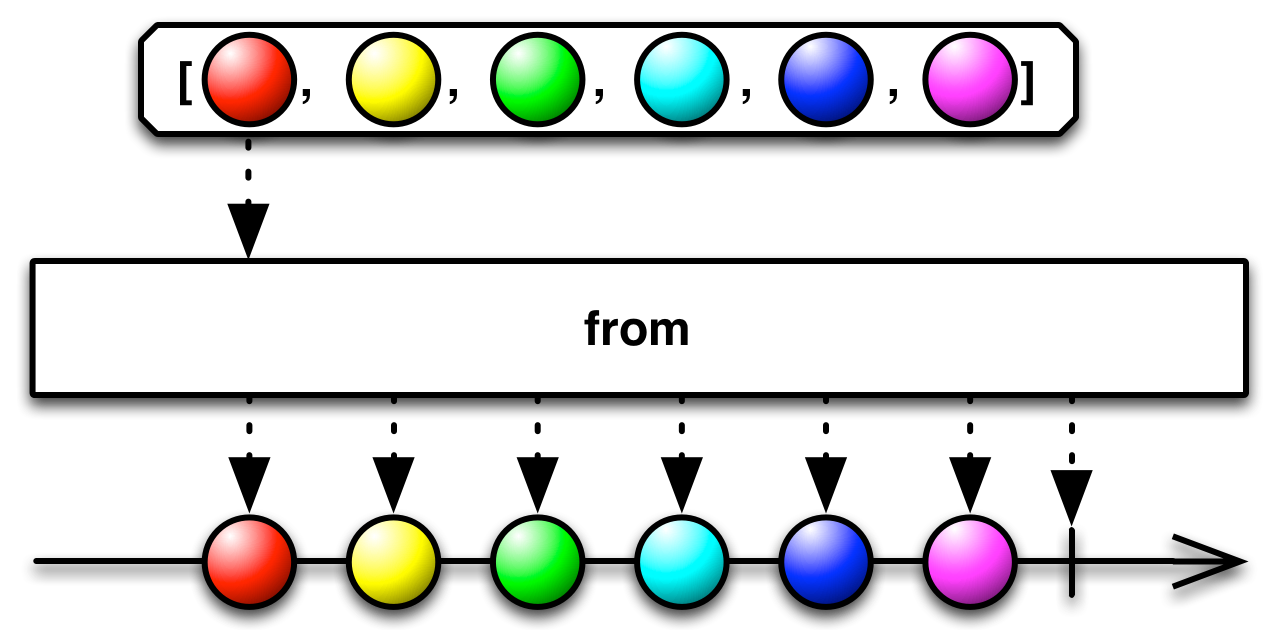
- Scheduler:
fromArraydoes not operate by default on a particularScheduler.
- Type Parameters:
T- the type of items in the Array and the type of items to be emitted by the resulting ObservableSource- Parameters:
items- the array of elements- Returns:
- an Observable that emits each item in the source Array
- See Also:
- ReactiveX operators documentation: From
-
fromCallable
@CheckReturnValue @NonNull @SchedulerSupport(value="none") public static <T> Observable<T> fromCallable(Callable<? extends T> supplier)
Returns an Observable that, when an observer subscribes to it, invokes a function you specify and then emits the value returned from that function.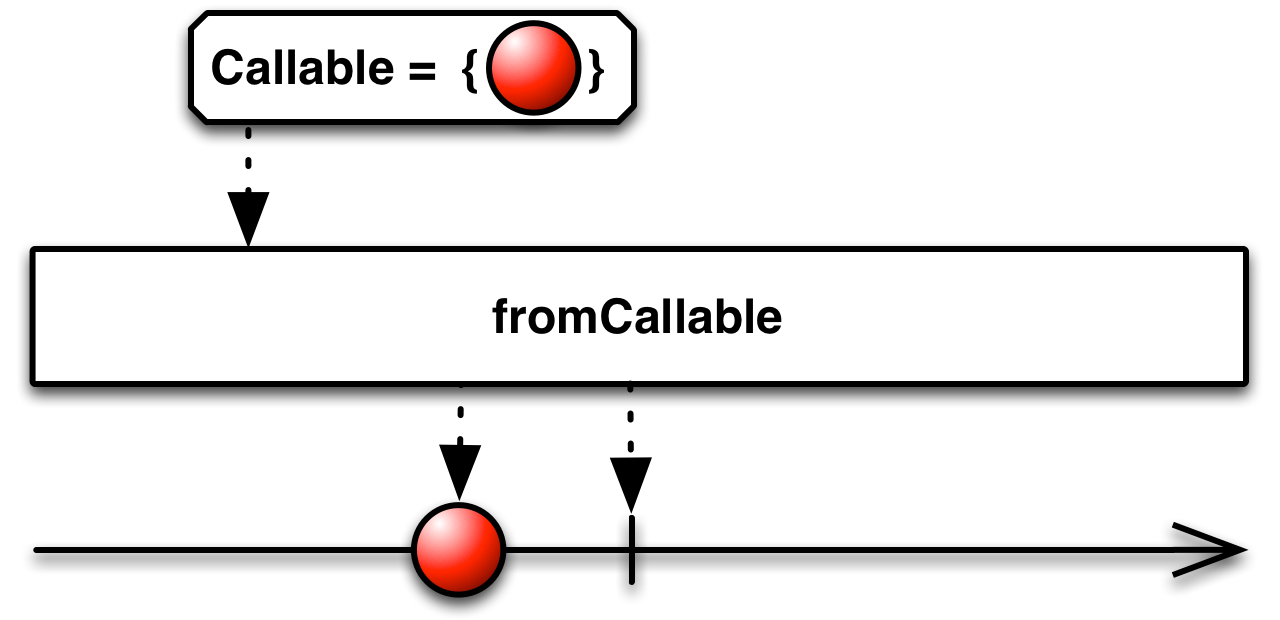
This allows you to defer the execution of the function you specify until an observer subscribes to the ObservableSource. That is to say, it makes the function "lazy."
- Scheduler:
fromCallabledoes not operate by default on a particularScheduler.- Error handling:
- If the
Callablethrows an exception, the respectiveThrowableis delivered to the downstream viaObserver.onError(Throwable), except when the downstream has disposed thisObservablesource. In this latter case, theThrowableis delivered to the global error handler viaRxJavaPlugins.onError(Throwable)as anUndeliverableException.
- Type Parameters:
T- the type of the item emitted by the ObservableSource- Parameters:
supplier- a function, the execution of which should be deferred;fromCallablewill invoke this function only when an observer subscribes to the ObservableSource thatfromCallablereturns- Returns:
- an Observable whose
Observers' subscriptions trigger an invocation of the given function - Since:
- 2.0
- See Also:
defer(Callable)
-
fromFuture
@CheckReturnValue @NonNull @SchedulerSupport(value="none") public static <T> Observable<T> fromFuture(Future<? extends T> future)
Converts aFutureinto an ObservableSource.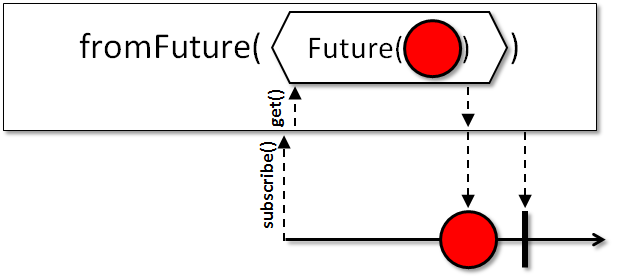
You can convert any object that supports the
Futureinterface into an ObservableSource that emits the return value of theFuture.get()method of that object, by passing the object into thefrommethod.Important note: This ObservableSource is blocking; you cannot dispose it.
Unlike 1.x, disposing the Observable won't cancel the future. If necessary, one can use composition to achieve the cancellation effect:
futureObservableSource.doOnDispose(() -> future.cancel(true));.- Scheduler:
fromFuturedoes not operate by default on a particularScheduler.
- Type Parameters:
T- the type of object that theFuturereturns, and also the type of item to be emitted by the resulting ObservableSource- Parameters:
future- the sourceFuture- Returns:
- an Observable that emits the item from the source
Future - See Also:
- ReactiveX operators documentation: From
-
fromFuture
@CheckReturnValue @NonNull @SchedulerSupport(value="none") public static <T> Observable<T> fromFuture(Future<? extends T> future, long timeout, TimeUnit unit)
Converts aFutureinto an ObservableSource, with a timeout on the Future.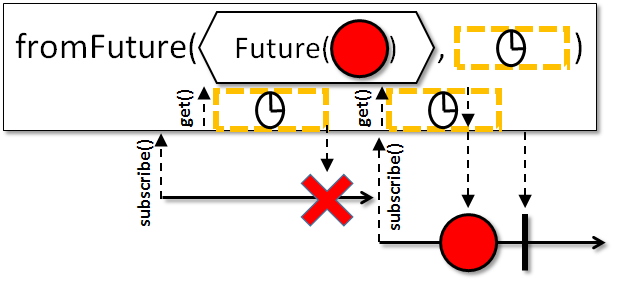
You can convert any object that supports the
Futureinterface into an ObservableSource that emits the return value of theFuture.get()method of that object, by passing the object into thefrommethod.Unlike 1.x, disposing the Observable won't cancel the future. If necessary, one can use composition to achieve the cancellation effect:
futureObservableSource.doOnDispose(() -> future.cancel(true));.Important note: This ObservableSource is blocking; you cannot dispose it.
- Scheduler:
fromFuturedoes not operate by default on a particularScheduler.
- Type Parameters:
T- the type of object that theFuturereturns, and also the type of item to be emitted by the resulting ObservableSource- Parameters:
future- the sourceFuturetimeout- the maximum time to wait before callinggetunit- theTimeUnitof thetimeoutargument- Returns:
- an Observable that emits the item from the source
Future - See Also:
- ReactiveX operators documentation: From
-
fromFuture
@CheckReturnValue @NonNull @SchedulerSupport(value="custom") public static <T> Observable<T> fromFuture(Future<? extends T> future, long timeout, TimeUnit unit, Scheduler scheduler)
Converts aFutureinto an ObservableSource, with a timeout on the Future.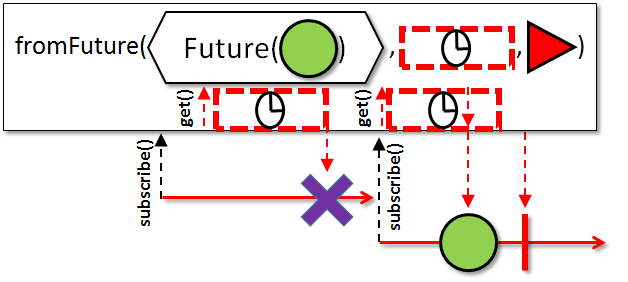
You can convert any object that supports the
Futureinterface into an ObservableSource that emits the return value of theFuture.get()method of that object, by passing the object into thefrommethod.Unlike 1.x, disposing the Observable won't cancel the future. If necessary, one can use composition to achieve the cancellation effect:
futureObservableSource.doOnDispose(() -> future.cancel(true));.Important note: This ObservableSource is blocking; you cannot dispose it.
- Scheduler:
fromFuturedoes not operate by default on a particularScheduler.
- Type Parameters:
T- the type of object that theFuturereturns, and also the type of item to be emitted by the resulting ObservableSource- Parameters:
future- the sourceFuturetimeout- the maximum time to wait before callinggetunit- theTimeUnitof thetimeoutargumentscheduler- theSchedulerto wait for the Future on. Use a Scheduler such asSchedulers.io()that can block and wait on the Future- Returns:
- an Observable that emits the item from the source
Future - See Also:
- ReactiveX operators documentation: From
-
fromFuture
@CheckReturnValue @NonNull @SchedulerSupport(value="custom") public static <T> Observable<T> fromFuture(Future<? extends T> future, Scheduler scheduler)
Converts aFuture, operating on a specifiedScheduler, into an ObservableSource.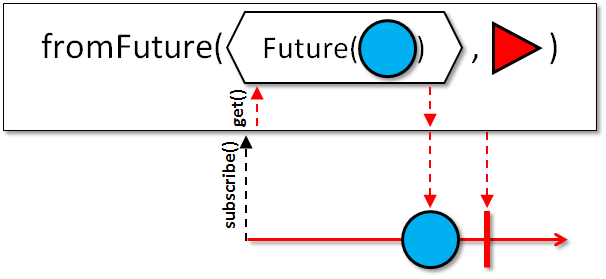
You can convert any object that supports the
Futureinterface into an ObservableSource that emits the return value of theFuture.get()method of that object, by passing the object into thefrommethod.Unlike 1.x, disposing the Observable won't cancel the future. If necessary, one can use composition to achieve the cancellation effect:
futureObservableSource.doOnDispose(() -> future.cancel(true));.- Scheduler:
- You specify which
Schedulerthis operator will use.
- Type Parameters:
T- the type of object that theFuturereturns, and also the type of item to be emitted by the resulting ObservableSource- Parameters:
future- the sourceFuturescheduler- theSchedulerto wait for the Future on. Use a Scheduler such asSchedulers.io()that can block and wait on the Future- Returns:
- an Observable that emits the item from the source
Future - See Also:
- ReactiveX operators documentation: From
-
fromIterable
@CheckReturnValue @NonNull @SchedulerSupport(value="none") public static <T> Observable<T> fromIterable(Iterable<? extends T> source)
Converts anIterablesequence into an ObservableSource that emits the items in the sequence.
- Scheduler:
fromIterabledoes not operate by default on a particularScheduler.
- Type Parameters:
T- the type of items in theIterablesequence and the type of items to be emitted by the resulting ObservableSource- Parameters:
source- the sourceIterablesequence- Returns:
- an Observable that emits each item in the source
Iterablesequence - See Also:
- ReactiveX operators documentation: From
-
fromPublisher
@BackpressureSupport(value=UNBOUNDED_IN) @CheckReturnValue @NonNull @SchedulerSupport(value="none") public static <T> Observable<T> fromPublisher(Publisher<? extends T> publisher)
Converts an arbitrary Reactive Streams Publisher into an Observable.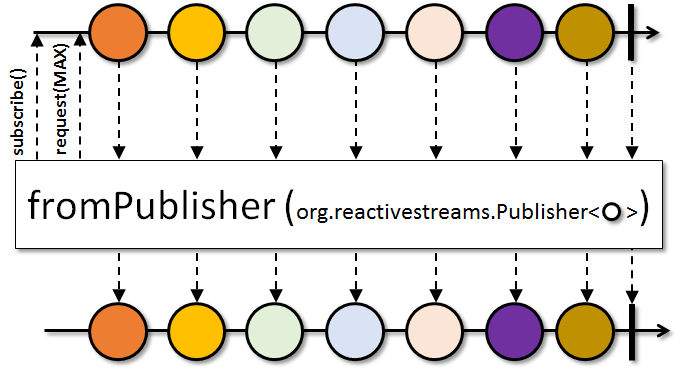
The
Publishermust follow the Reactive Streams specification. Violating the specification may result in undefined behavior.If possible, use
create(ObservableOnSubscribe)to create a source-likeObservableinstead.Note that even though
Publisherappears to be a functional interface, it is not recommended to implement it through a lambda as the specification requires state management that is not achievable with a stateless lambda.- Backpressure:
- The source
publisheris consumed in an unbounded fashion without applying any backpressure to it. - Scheduler:
fromPublisherdoes not operate by default on a particularScheduler.
- Type Parameters:
T- the value type of the flow- Parameters:
publisher- the Publisher to convert- Returns:
- the new Observable instance
- Throws:
NullPointerException- if publisher is null- See Also:
create(ObservableOnSubscribe)
-
generate
@CheckReturnValue @NonNull @SchedulerSupport(value="none") public static <T> Observable<T> generate(Consumer<Emitter<T>> generator)
Returns a cold, synchronous and stateless generator of values.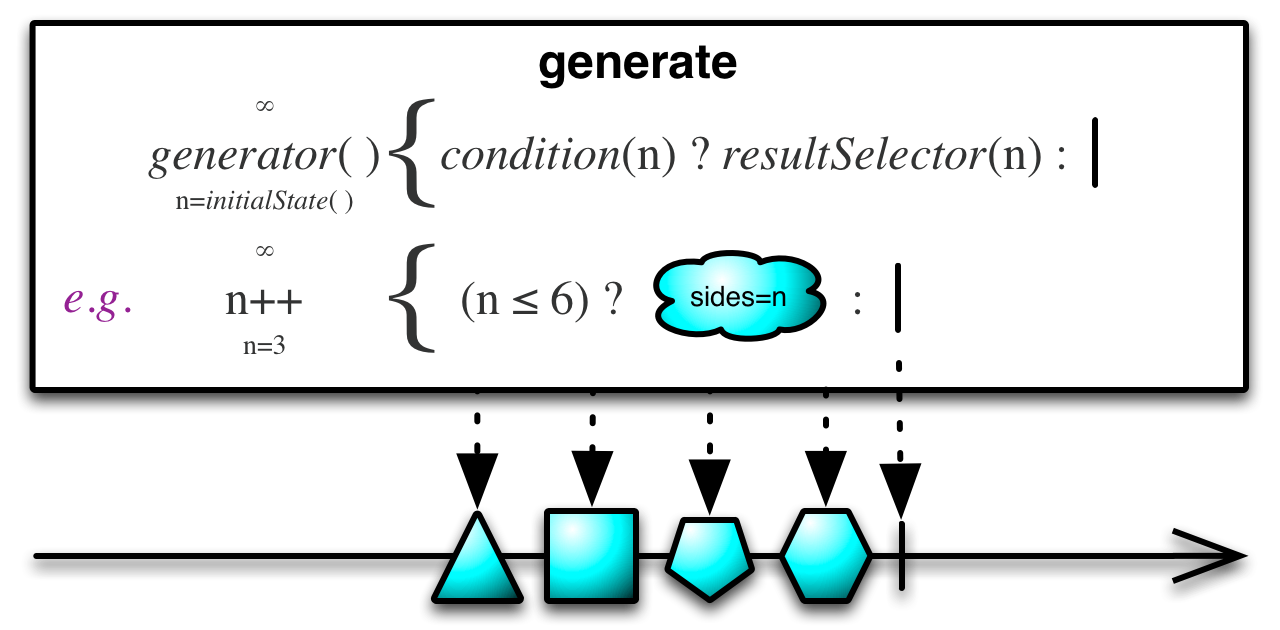
Note that the
Emitter.onNext(T),Emitter.onError(java.lang.Throwable)andEmitter.onComplete()methods provided to the function via theEmitterinstance should be called synchronously, never concurrently and only while the function body is executing. Calling them from multiple threads or outside the function call is not supported and leads to an undefined behavior.- Scheduler:
generatedoes not operate by default on a particularScheduler.
- Type Parameters:
T- the generated value type- Parameters:
generator- the Consumer called whenever a particular downstream Observer has requested a value. The callback then should callonNext,onErrororonCompleteto signal a value or a terminal event. Signalling multipleonNextin a call will make the operator signalIllegalStateException.- Returns:
- the new Observable instance
-
generate
@CheckReturnValue @NonNull @SchedulerSupport(value="none") public static <T,S> Observable<T> generate(Callable<S> initialState, BiConsumer<S,Emitter<T>> generator)
Returns a cold, synchronous and stateful generator of values.
Note that the
Emitter.onNext(T),Emitter.onError(java.lang.Throwable)andEmitter.onComplete()methods provided to the function via theEmitterinstance should be called synchronously, never concurrently and only while the function body is executing. Calling them from multiple threads or outside the function call is not supported and leads to an undefined behavior.- Scheduler:
generatedoes not operate by default on a particularScheduler.
- Type Parameters:
S- the type of the per-Observer stateT- the generated value type- Parameters:
initialState- the Callable to generate the initial state for each Observergenerator- the Consumer called with the current state whenever a particular downstream Observer has requested a value. The callback then should callonNext,onErrororonCompleteto signal a value or a terminal event. Signalling multipleonNextin a call will make the operator signalIllegalStateException.- Returns:
- the new Observable instance
-
generate
@CheckReturnValue @NonNull @SchedulerSupport(value="none") public static <T,S> Observable<T> generate(Callable<S> initialState, BiConsumer<S,Emitter<T>> generator, Consumer<? super S> disposeState)
Returns a cold, synchronous and stateful generator of values.
Note that the
Emitter.onNext(T),Emitter.onError(java.lang.Throwable)andEmitter.onComplete()methods provided to the function via theEmitterinstance should be called synchronously, never concurrently and only while the function body is executing. Calling them from multiple threads or outside the function call is not supported and leads to an undefined behavior.- Scheduler:
generatedoes not operate by default on a particularScheduler.
- Type Parameters:
S- the type of the per-Observer stateT- the generated value type- Parameters:
initialState- the Callable to generate the initial state for each Observergenerator- the Consumer called with the current state whenever a particular downstream Observer has requested a value. The callback then should callonNext,onErrororonCompleteto signal a value or a terminal event. Signalling multipleonNextin a call will make the operator signalIllegalStateException.disposeState- the Consumer that is called with the current state when the generator terminates the sequence or it gets disposed- Returns:
- the new Observable instance
-
generate
@CheckReturnValue @SchedulerSupport(value="none") public static <T,S> Observable<T> generate(Callable<S> initialState, BiFunction<S,Emitter<T>,S> generator)
Returns a cold, synchronous and stateful generator of values.
Note that the
Emitter.onNext(T),Emitter.onError(java.lang.Throwable)andEmitter.onComplete()methods provided to the function via theEmitterinstance should be called synchronously, never concurrently and only while the function body is executing. Calling them from multiple threads or outside the function call is not supported and leads to an undefined behavior.- Scheduler:
generatedoes not operate by default on a particularScheduler.
- Type Parameters:
S- the type of the per-Observer stateT- the generated value type- Parameters:
initialState- the Callable to generate the initial state for each Observergenerator- the Function called with the current state whenever a particular downstream Observer has requested a value. The callback then should callonNext,onErrororonCompleteto signal a value or a terminal event and should return a (new) state for the next invocation. Signalling multipleonNextin a call will make the operator signalIllegalStateException.- Returns:
- the new Observable instance
-
generate
@CheckReturnValue @NonNull @SchedulerSupport(value="none") public static <T,S> Observable<T> generate(Callable<S> initialState, BiFunction<S,Emitter<T>,S> generator, Consumer<? super S> disposeState)
Returns a cold, synchronous and stateful generator of values.
Note that the
Emitter.onNext(T),Emitter.onError(java.lang.Throwable)andEmitter.onComplete()methods provided to the function via theEmitterinstance should be called synchronously, never concurrently and only while the function body is executing. Calling them from multiple threads or outside the function call is not supported and leads to an undefined behavior.- Scheduler:
generatedoes not operate by default on a particularScheduler.
- Type Parameters:
S- the type of the per-Observer stateT- the generated value type- Parameters:
initialState- the Callable to generate the initial state for each Observergenerator- the Function called with the current state whenever a particular downstream Observer has requested a value. The callback then should callonNext,onErrororonCompleteto signal a value or a terminal event and should return a (new) state for the next invocation. Signalling multipleonNextin a call will make the operator signalIllegalStateException.disposeState- the Consumer that is called with the current state when the generator terminates the sequence or it gets disposed- Returns:
- the new Observable instance
-
interval
@CheckReturnValue @SchedulerSupport(value="io.reactivex:computation") public static Observable<Long> interval(long initialDelay, long period, TimeUnit unit)
Returns an Observable that emits a0Lafter theinitialDelayand ever increasing numbers after eachperiodof time thereafter.
- Scheduler:
intervaloperates by default on thecomputationScheduler.
- Parameters:
initialDelay- the initial delay time to wait before emitting the first value of 0Lperiod- the period of time between emissions of the subsequent numbersunit- the time unit for bothinitialDelayandperiod- Returns:
- an Observable that emits a 0L after the
initialDelayand ever increasing numbers after eachperiodof time thereafter - Since:
- 1.0.12
- See Also:
- ReactiveX operators documentation: Interval
-
interval
@CheckReturnValue @NonNull @SchedulerSupport(value="custom") public static Observable<Long> interval(long initialDelay, long period, TimeUnit unit, Scheduler scheduler)
Returns an Observable that emits a0Lafter theinitialDelayand ever increasing numbers after eachperiodof time thereafter, on a specifiedScheduler.
- Scheduler:
- You specify which
Schedulerthis operator will use.
- Parameters:
initialDelay- the initial delay time to wait before emitting the first value of 0Lperiod- the period of time between emissions of the subsequent numbersunit- the time unit for bothinitialDelayandperiodscheduler- the Scheduler on which the waiting happens and items are emitted- Returns:
- an Observable that emits a 0L after the
initialDelayand ever increasing numbers after eachperiodof time thereafter, while running on the given Scheduler - Since:
- 1.0.12
- See Also:
- ReactiveX operators documentation: Interval
-
interval
@CheckReturnValue @SchedulerSupport(value="io.reactivex:computation") public static Observable<Long> interval(long period, TimeUnit unit)
Returns an Observable that emits a sequential number every specified interval of time.
- Scheduler:
intervaloperates by default on thecomputationScheduler.
- Parameters:
period- the period size in time units (see below)unit- time units to use for the interval size- Returns:
- an Observable that emits a sequential number each time interval
- See Also:
- ReactiveX operators documentation: Interval
-
interval
@CheckReturnValue @SchedulerSupport(value="custom") public static Observable<Long> interval(long period, TimeUnit unit, Scheduler scheduler)
Returns an Observable that emits a sequential number every specified interval of time, on a specified Scheduler.
- Scheduler:
- You specify which
Schedulerthis operator will use.
- Parameters:
period- the period size in time units (see below)unit- time units to use for the interval sizescheduler- the Scheduler to use for scheduling the items- Returns:
- an Observable that emits a sequential number each time interval
- See Also:
- ReactiveX operators documentation: Interval
-
intervalRange
@CheckReturnValue @SchedulerSupport(value="io.reactivex:computation") public static Observable<Long> intervalRange(long start, long count, long initialDelay, long period, TimeUnit unit)
Signals a range of long values, the first after some initial delay and the rest periodically after.The sequence completes immediately after the last value (start + count - 1) has been reached.

- Scheduler:
intervalRangeby default operates on thecomputationScheduler.
- Parameters:
start- that start value of the rangecount- the number of values to emit in total, if zero, the operator emits an onComplete after the initial delay.initialDelay- the initial delay before signalling the first value (the start)period- the period between subsequent valuesunit- the unit of measure of the initialDelay and period amounts- Returns:
- the new Observable instance
-
intervalRange
@CheckReturnValue @NonNull @SchedulerSupport(value="custom") public static Observable<Long> intervalRange(long start, long count, long initialDelay, long period, TimeUnit unit, Scheduler scheduler)
Signals a range of long values, the first after some initial delay and the rest periodically after.The sequence completes immediately after the last value (start + count - 1) has been reached.
 *
* - Scheduler:
- you provide the
Scheduler.
- Parameters:
start- that start value of the rangecount- the number of values to emit in total, if zero, the operator emits an onComplete after the initial delay.initialDelay- the initial delay before signalling the first value (the start)period- the period between subsequent valuesunit- the unit of measure of the initialDelay and period amountsscheduler- the target scheduler where the values and terminal signals will be emitted- Returns:
- the new Observable instance
-
just
@CheckReturnValue @NonNull @SchedulerSupport(value="none") public static <T> Observable<T> just(T item)
Returns an Observable that signals the given (constant reference) item and then completes.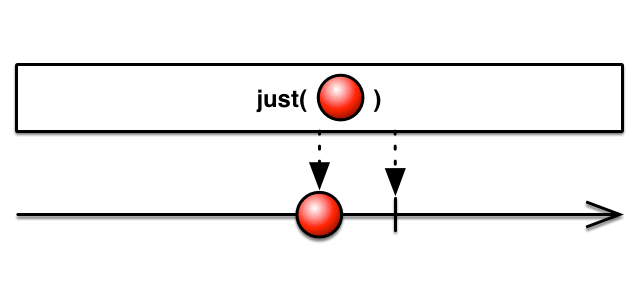
Note that the item is taken and re-emitted as is and not computed by any means by
just. UsefromCallable(Callable)to generate a single item on demand (whenObservers subscribe to it).See the multi-parameter overloads of
justto emit more than one (constant reference) items one after the other. UsefromArray(Object...)to emit an arbitrary number of items that are known upfront.To emit the items of an
Iterablesequence (such as aList), usefromIterable(Iterable).- Scheduler:
justdoes not operate by default on a particularScheduler.
- Type Parameters:
T- the type of that item- Parameters:
item- the item to emit- Returns:
- an Observable that emits
valueas a single item and then completes - See Also:
- ReactiveX operators documentation: Just,
just(Object, Object),fromCallable(Callable),fromArray(Object...),fromIterable(Iterable)
-
just
@CheckReturnValue @NonNull @SchedulerSupport(value="none") public static <T> Observable<T> just(T item1, T item2)
Converts two items into an ObservableSource that emits those items.
- Scheduler:
justdoes not operate by default on a particularScheduler.
- Type Parameters:
T- the type of these items- Parameters:
item1- first itemitem2- second item- Returns:
- an Observable that emits each item
- See Also:
- ReactiveX operators documentation: Just
-
just
@CheckReturnValue @NonNull @SchedulerSupport(value="none") public static <T> Observable<T> just(T item1, T item2, T item3)
Converts three items into an ObservableSource that emits those items.
- Scheduler:
justdoes not operate by default on a particularScheduler.
- Type Parameters:
T- the type of these items- Parameters:
item1- first itemitem2- second itemitem3- third item- Returns:
- an Observable that emits each item
- See Also:
- ReactiveX operators documentation: Just
-
just
@CheckReturnValue @NonNull @SchedulerSupport(value="none") public static <T> Observable<T> just(T item1, T item2, T item3, T item4)
Converts four items into an ObservableSource that emits those items.
- Scheduler:
justdoes not operate by default on a particularScheduler.
- Type Parameters:
T- the type of these items- Parameters:
item1- first itemitem2- second itemitem3- third itemitem4- fourth item- Returns:
- an Observable that emits each item
- See Also:
- ReactiveX operators documentation: Just
-
just
@CheckReturnValue @NonNull @SchedulerSupport(value="none") public static <T> Observable<T> just(T item1, T item2, T item3, T item4, T item5)
Converts five items into an ObservableSource that emits those items.
- Scheduler:
justdoes not operate by default on a particularScheduler.
- Type Parameters:
T- the type of these items- Parameters:
item1- first itemitem2- second itemitem3- third itemitem4- fourth itemitem5- fifth item- Returns:
- an Observable that emits each item
- See Also:
- ReactiveX operators documentation: Just
-
just
@CheckReturnValue @NonNull @SchedulerSupport(value="none") public static <T> Observable<T> just(T item1, T item2, T item3, T item4, T item5, T item6)
Converts six items into an ObservableSource that emits those items.
- Scheduler:
justdoes not operate by default on a particularScheduler.
- Type Parameters:
T- the type of these items- Parameters:
item1- first itemitem2- second itemitem3- third itemitem4- fourth itemitem5- fifth itemitem6- sixth item- Returns:
- an Observable that emits each item
- See Also:
- ReactiveX operators documentation: Just
-
just
@CheckReturnValue @NonNull @SchedulerSupport(value="none") public static <T> Observable<T> just(T item1, T item2, T item3, T item4, T item5, T item6, T item7)
Converts seven items into an ObservableSource that emits those items.
- Scheduler:
justdoes not operate by default on a particularScheduler.
- Type Parameters:
T- the type of these items- Parameters:
item1- first itemitem2- second itemitem3- third itemitem4- fourth itemitem5- fifth itemitem6- sixth itemitem7- seventh item- Returns:
- an Observable that emits each item
- See Also:
- ReactiveX operators documentation: Just
-
just
@CheckReturnValue @NonNull @SchedulerSupport(value="none") public static <T> Observable<T> just(T item1, T item2, T item3, T item4, T item5, T item6, T item7, T item8)
Converts eight items into an ObservableSource that emits those items.
- Scheduler:
justdoes not operate by default on a particularScheduler.
- Type Parameters:
T- the type of these items- Parameters:
item1- first itemitem2- second itemitem3- third itemitem4- fourth itemitem5- fifth itemitem6- sixth itemitem7- seventh itemitem8- eighth item- Returns:
- an Observable that emits each item
- See Also:
- ReactiveX operators documentation: Just
-
just
@CheckReturnValue @NonNull @SchedulerSupport(value="none") public static <T> Observable<T> just(T item1, T item2, T item3, T item4, T item5, T item6, T item7, T item8, T item9)
Converts nine items into an ObservableSource that emits those items.
- Scheduler:
justdoes not operate by default on a particularScheduler.
- Type Parameters:
T- the type of these items- Parameters:
item1- first itemitem2- second itemitem3- third itemitem4- fourth itemitem5- fifth itemitem6- sixth itemitem7- seventh itemitem8- eighth itemitem9- ninth item- Returns:
- an Observable that emits each item
- See Also:
- ReactiveX operators documentation: Just
-
just
@CheckReturnValue @NonNull @SchedulerSupport(value="none") public static <T> Observable<T> just(T item1, T item2, T item3, T item4, T item5, T item6, T item7, T item8, T item9, T item10)
Converts ten items into an ObservableSource that emits those items.
- Scheduler:
justdoes not operate by default on a particularScheduler.
- Type Parameters:
T- the type of these items- Parameters:
item1- first itemitem2- second itemitem3- third itemitem4- fourth itemitem5- fifth itemitem6- sixth itemitem7- seventh itemitem8- eighth itemitem9- ninth itemitem10- tenth item- Returns:
- an Observable that emits each item
- See Also:
- ReactiveX operators documentation: Just
-
merge
@CheckReturnValue @SchedulerSupport(value="none") public static <T> Observable<T> merge(Iterable<? extends ObservableSource<? extends T>> sources, int maxConcurrency, int bufferSize)
Flattens an Iterable of ObservableSources into one ObservableSource, without any transformation, while limiting the number of concurrent subscriptions to these ObservableSources.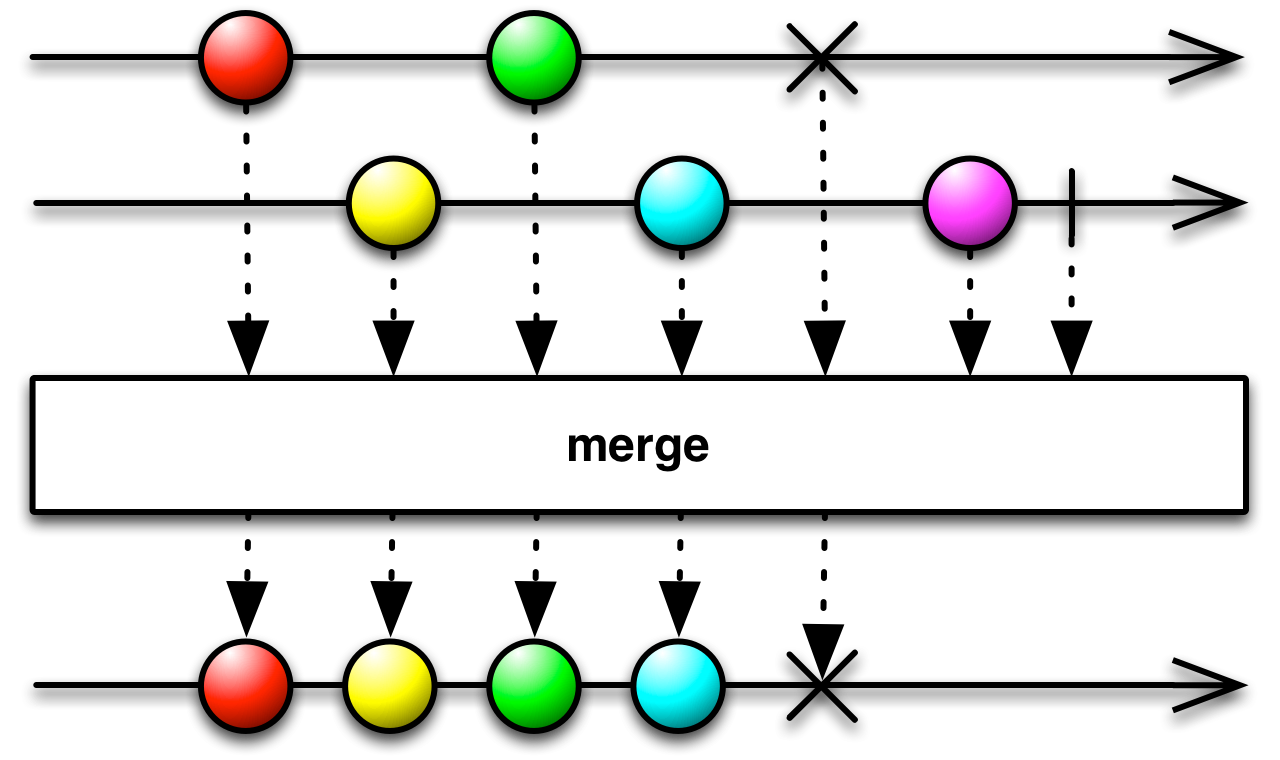
You can combine the items emitted by multiple ObservableSources so that they appear as a single ObservableSource, by using the
mergemethod.- Scheduler:
mergedoes not operate by default on a particularScheduler.- Error handling:
- If any of the source
ObservableSources signal aThrowableviaonError, the resultingObservableterminates with thatThrowableand all other sourceObservableSources are disposed. If more than oneObservableSourcesignals an error, the resultingObservablemay terminate with the first one's error or, depending on the concurrency of the sources, may terminate with aCompositeExceptioncontaining two or more of the various error signals.Throwables that didn't make into the composite will be sent (individually) to the global error handler viaRxJavaPlugins.onError(Throwable)method asUndeliverableExceptionerrors. Similarly,Throwables signaled by source(s) after the returnedObservablehas been disposed or terminated with a (composite) error will be sent to the same global error handler. UsemergeDelayError(Iterable, int, int)to merge sources and terminate only when all sourceObservableSources have completed or failed with an error.
- Type Parameters:
T- the common element base type- Parameters:
sources- the Iterable of ObservableSourcesmaxConcurrency- the maximum number of ObservableSources that may be subscribed to concurrentlybufferSize- the number of items to prefetch from each inner ObservableSource- Returns:
- an Observable that emits items that are the result of flattening the items emitted by the ObservableSources in the Iterable
- Throws:
IllegalArgumentException- ifmaxConcurrentis less than or equal to 0- See Also:
- ReactiveX operators documentation: Merge,
mergeDelayError(Iterable, int, int)
-
mergeArray
@CheckReturnValue @SchedulerSupport(value="none") public static <T> Observable<T> mergeArray(int maxConcurrency, int bufferSize, ObservableSource<? extends T>... sources)
Flattens an Iterable of ObservableSources into one ObservableSource, without any transformation, while limiting the number of concurrent subscriptions to these ObservableSources.
You can combine the items emitted by multiple ObservableSources so that they appear as a single ObservableSource, by using the
mergemethod.- Scheduler:
mergeArraydoes not operate by default on a particularScheduler.- Error handling:
- If any of the source
ObservableSources signal aThrowableviaonError, the resultingObservableterminates with thatThrowableand all other sourceObservableSources are disposed. If more than oneObservableSourcesignals an error, the resultingObservablemay terminate with the first one's error or, depending on the concurrency of the sources, may terminate with aCompositeExceptioncontaining two or more of the various error signals.Throwables that didn't make into the composite will be sent (individually) to the global error handler viaRxJavaPlugins.onError(Throwable)method asUndeliverableExceptionerrors. Similarly,Throwables signaled by source(s) after the returnedObservablehas been disposed or terminated with a (composite) error will be sent to the same global error handler. UsemergeArrayDelayError(int, int, ObservableSource...)to merge sources and terminate only when all sourceObservableSources have completed or failed with an error.
- Type Parameters:
T- the common element base type- Parameters:
sources- the array of ObservableSourcesmaxConcurrency- the maximum number of ObservableSources that may be subscribed to concurrentlybufferSize- the number of items to prefetch from each inner ObservableSource- Returns:
- an Observable that emits items that are the result of flattening the items emitted by the ObservableSources in the Iterable
- Throws:
IllegalArgumentException- ifmaxConcurrentis less than or equal to 0- See Also:
- ReactiveX operators documentation: Merge,
mergeArrayDelayError(int, int, ObservableSource...)
-
merge
@CheckReturnValue @SchedulerSupport(value="none") public static <T> Observable<T> merge(Iterable<? extends ObservableSource<? extends T>> sources)
Flattens an Iterable of ObservableSources into one ObservableSource, without any transformation.
You can combine the items emitted by multiple ObservableSources so that they appear as a single ObservableSource, by using the
mergemethod.- Scheduler:
mergedoes not operate by default on a particularScheduler.- Error handling:
- If any of the source
ObservableSources signal aThrowableviaonError, the resultingObservableterminates with thatThrowableand all other sourceObservableSources are disposed. If more than oneObservableSourcesignals an error, the resultingObservablemay terminate with the first one's error or, depending on the concurrency of the sources, may terminate with aCompositeExceptioncontaining two or more of the various error signals.Throwables that didn't make into the composite will be sent (individually) to the global error handler viaRxJavaPlugins.onError(Throwable)method asUndeliverableExceptionerrors. Similarly,Throwables signaled by source(s) after the returnedObservablehas been disposed or terminated with a (composite) error will be sent to the same global error handler. UsemergeDelayError(Iterable)to merge sources and terminate only when all sourceObservableSources have completed or failed with an error.
- Type Parameters:
T- the common element base type- Parameters:
sources- the Iterable of ObservableSources- Returns:
- an Observable that emits items that are the result of flattening the items emitted by the ObservableSources in the Iterable
- See Also:
- ReactiveX operators documentation: Merge,
mergeDelayError(Iterable)
-
merge
@CheckReturnValue @SchedulerSupport(value="none") public static <T> Observable<T> merge(Iterable<? extends ObservableSource<? extends T>> sources, int maxConcurrency)
Flattens an Iterable of ObservableSources into one ObservableSource, without any transformation, while limiting the number of concurrent subscriptions to these ObservableSources.
You can combine the items emitted by multiple ObservableSources so that they appear as a single ObservableSource, by using the
mergemethod.- Scheduler:
mergedoes not operate by default on a particularScheduler.- Error handling:
- If any of the source
ObservableSources signal aThrowableviaonError, the resultingObservableterminates with thatThrowableand all other sourceObservableSources are disposed. If more than oneObservableSourcesignals an error, the resultingObservablemay terminate with the first one's error or, depending on the concurrency of the sources, may terminate with aCompositeExceptioncontaining two or more of the various error signals.Throwables that didn't make into the composite will be sent (individually) to the global error handler viaRxJavaPlugins.onError(Throwable)method asUndeliverableExceptionerrors. Similarly,Throwables signaled by source(s) after the returnedObservablehas been disposed or terminated with a (composite) error will be sent to the same global error handler. UsemergeDelayError(Iterable, int)to merge sources and terminate only when all sourceObservableSources have completed or failed with an error.
- Type Parameters:
T- the common element base type- Parameters:
sources- the Iterable of ObservableSourcesmaxConcurrency- the maximum number of ObservableSources that may be subscribed to concurrently- Returns:
- an Observable that emits items that are the result of flattening the items emitted by the ObservableSources in the Iterable
- Throws:
IllegalArgumentException- ifmaxConcurrentis less than or equal to 0- See Also:
- ReactiveX operators documentation: Merge,
mergeDelayError(Iterable, int)
-
merge
@CheckReturnValue @SchedulerSupport(value="none") public static <T> Observable<T> merge(ObservableSource<? extends ObservableSource<? extends T>> sources)
Flattens an ObservableSource that emits ObservableSources into a single ObservableSource that emits the items emitted by those ObservableSources, without any transformation.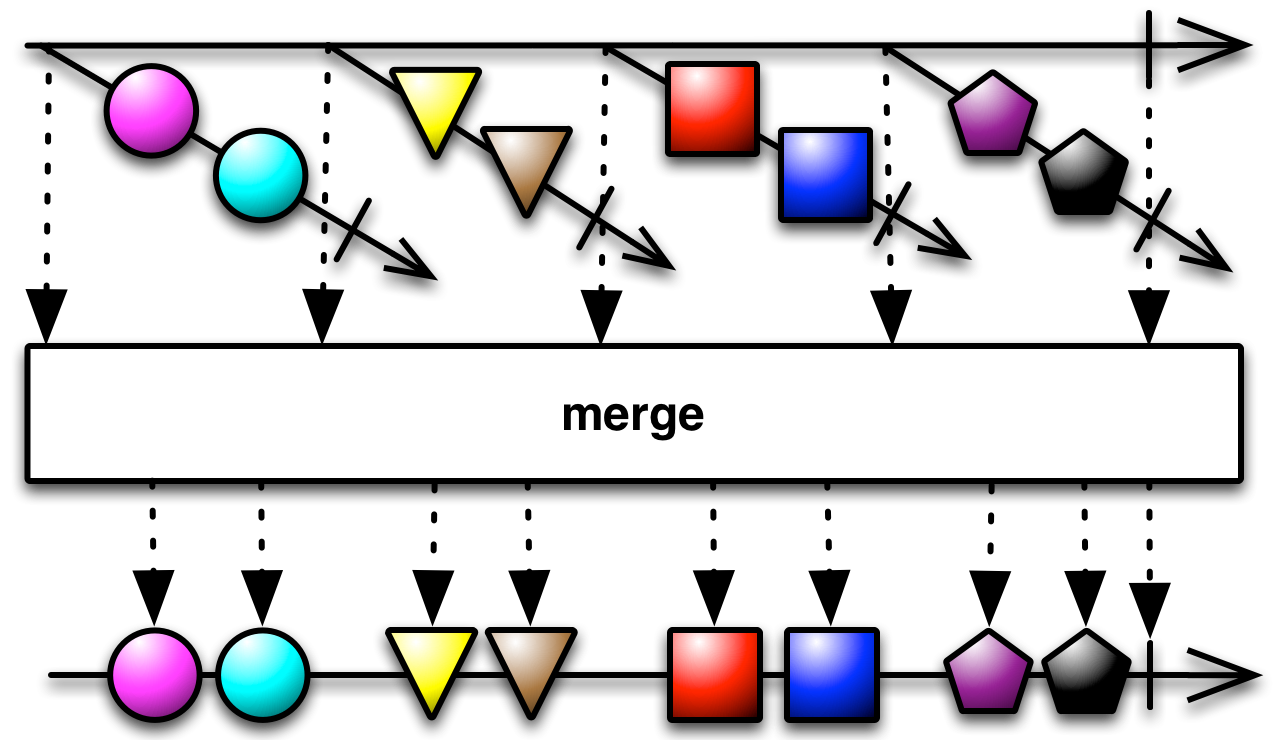
You can combine the items emitted by multiple ObservableSources so that they appear as a single ObservableSource, by using the
mergemethod.- Scheduler:
mergedoes not operate by default on a particularScheduler.- Error handling:
- If any of the source
ObservableSources signal aThrowableviaonError, the resultingObservableterminates with thatThrowableand all other sourceObservableSources are disposed. If more than oneObservableSourcesignals an error, the resultingObservablemay terminate with the first one's error or, depending on the concurrency of the sources, may terminate with aCompositeExceptioncontaining two or more of the various error signals.Throwables that didn't make into the composite will be sent (individually) to the global error handler viaRxJavaPlugins.onError(Throwable)method asUndeliverableExceptionerrors. Similarly,Throwables signaled by source(s) after the returnedObservablehas been disposed or terminated with a (composite) error will be sent to the same global error handler. UsemergeDelayError(ObservableSource)to merge sources and terminate only when all sourceObservableSources have completed or failed with an error.
- Type Parameters:
T- the common element base type- Parameters:
sources- an ObservableSource that emits ObservableSources- Returns:
- an Observable that emits items that are the result of flattening the ObservableSources emitted by the
sourceObservableSource - See Also:
- ReactiveX operators documentation: Merge,
mergeDelayError(ObservableSource)
-
merge
@CheckReturnValue @SchedulerSupport(value="none") public static <T> Observable<T> merge(ObservableSource<? extends ObservableSource<? extends T>> sources, int maxConcurrency)
Flattens an ObservableSource that emits ObservableSources into a single ObservableSource that emits the items emitted by those ObservableSources, without any transformation, while limiting the maximum number of concurrent subscriptions to these ObservableSources.
You can combine the items emitted by multiple ObservableSources so that they appear as a single ObservableSource, by using the
mergemethod.- Scheduler:
mergedoes not operate by default on a particularScheduler.- Error handling:
- If any of the source
ObservableSources signal aThrowableviaonError, the resultingObservableterminates with thatThrowableand all other sourceObservableSources are disposed. If more than oneObservableSourcesignals an error, the resultingObservablemay terminate with the first one's error or, depending on the concurrency of the sources, may terminate with aCompositeExceptioncontaining two or more of the various error signals.Throwables that didn't make into the composite will be sent (individually) to the global error handler viaRxJavaPlugins.onError(Throwable)method asUndeliverableExceptionerrors. Similarly,Throwables signaled by source(s) after the returnedObservablehas been disposed or terminated with a (composite) error will be sent to the same global error handler. UsemergeDelayError(ObservableSource, int)to merge sources and terminate only when all sourceObservableSources have completed or failed with an error.
- Type Parameters:
T- the common element base type- Parameters:
sources- an ObservableSource that emits ObservableSourcesmaxConcurrency- the maximum number of ObservableSources that may be subscribed to concurrently- Returns:
- an Observable that emits items that are the result of flattening the ObservableSources emitted by the
sourceObservableSource - Throws:
IllegalArgumentException- ifmaxConcurrentis less than or equal to 0- Since:
- 1.1.0
- See Also:
- ReactiveX operators documentation: Merge,
mergeDelayError(ObservableSource, int)
-
merge
@CheckReturnValue @SchedulerSupport(value="none") public static <T> Observable<T> merge(ObservableSource<? extends T> source1, ObservableSource<? extends T> source2)
Flattens two ObservableSources into a single ObservableSource, without any transformation.
You can combine items emitted by multiple ObservableSources so that they appear as a single ObservableSource, by using the
mergemethod.- Scheduler:
mergedoes not operate by default on a particularScheduler.- Error handling:
- If any of the source
ObservableSources signal aThrowableviaonError, the resultingObservableterminates with thatThrowableand all other sourceObservableSources are disposed. If more than oneObservableSourcesignals an error, the resultingObservablemay terminate with the first one's error or, depending on the concurrency of the sources, may terminate with aCompositeExceptioncontaining two or more of the various error signals.Throwables that didn't make into the composite will be sent (individually) to the global error handler viaRxJavaPlugins.onError(Throwable)method asUndeliverableExceptionerrors. Similarly,Throwables signaled by source(s) after the returnedObservablehas been disposed or terminated with a (composite) error will be sent to the same global error handler. UsemergeDelayError(ObservableSource, ObservableSource)to merge sources and terminate only when all sourceObservableSources have completed or failed with an error.
- Type Parameters:
T- the common element base type- Parameters:
source1- an ObservableSource to be mergedsource2- an ObservableSource to be merged- Returns:
- an Observable that emits all of the items emitted by the source ObservableSources
- See Also:
- ReactiveX operators documentation: Merge,
mergeDelayError(ObservableSource, ObservableSource)
-
merge
@CheckReturnValue @SchedulerSupport(value="none") public static <T> Observable<T> merge(ObservableSource<? extends T> source1, ObservableSource<? extends T> source2, ObservableSource<? extends T> source3)
Flattens three ObservableSources into a single ObservableSource, without any transformation.
You can combine items emitted by multiple ObservableSources so that they appear as a single ObservableSource, by using the
mergemethod.- Scheduler:
mergedoes not operate by default on a particularScheduler.- Error handling:
- If any of the source
ObservableSources signal aThrowableviaonError, the resultingObservableterminates with thatThrowableand all other sourceObservableSources are disposed. If more than oneObservableSourcesignals an error, the resultingObservablemay terminate with the first one's error or, depending on the concurrency of the sources, may terminate with aCompositeExceptioncontaining two or more of the various error signals.Throwables that didn't make into the composite will be sent (individually) to the global error handler viaRxJavaPlugins.onError(Throwable)method asUndeliverableExceptionerrors. Similarly,Throwables signaled by source(s) after the returnedObservablehas been disposed or terminated with a (composite) error will be sent to the same global error handler. UsemergeDelayError(ObservableSource, ObservableSource, ObservableSource)to merge sources and terminate only when all sourceObservableSources have completed or failed with an error.
- Type Parameters:
T- the common element base type- Parameters:
source1- an ObservableSource to be mergedsource2- an ObservableSource to be mergedsource3- an ObservableSource to be merged- Returns:
- an Observable that emits all of the items emitted by the source ObservableSources
- See Also:
- ReactiveX operators documentation: Merge,
mergeDelayError(ObservableSource, ObservableSource, ObservableSource)
-
merge
@CheckReturnValue @SchedulerSupport(value="none") public static <T> Observable<T> merge(ObservableSource<? extends T> source1, ObservableSource<? extends T> source2, ObservableSource<? extends T> source3, ObservableSource<? extends T> source4)
Flattens four ObservableSources into a single ObservableSource, without any transformation.
You can combine items emitted by multiple ObservableSources so that they appear as a single ObservableSource, by using the
mergemethod.- Scheduler:
mergedoes not operate by default on a particularScheduler.- Error handling:
- If any of the source
ObservableSources signal aThrowableviaonError, the resultingObservableterminates with thatThrowableand all other sourceObservableSources are disposed. If more than oneObservableSourcesignals an error, the resultingObservablemay terminate with the first one's error or, depending on the concurrency of the sources, may terminate with aCompositeExceptioncontaining two or more of the various error signals.Throwables that didn't make into the composite will be sent (individually) to the global error handler viaRxJavaPlugins.onError(Throwable)method asUndeliverableExceptionerrors. Similarly,Throwables signaled by source(s) after the returnedObservablehas been disposed or terminated with a (composite) error will be sent to the same global error handler. UsemergeDelayError(ObservableSource, ObservableSource, ObservableSource, ObservableSource)to merge sources and terminate only when all sourceObservableSources have completed or failed with an error.
- Type Parameters:
T- the common element base type- Parameters:
source1- an ObservableSource to be mergedsource2- an ObservableSource to be mergedsource3- an ObservableSource to be mergedsource4- an ObservableSource to be merged- Returns:
- an Observable that emits all of the items emitted by the source ObservableSources
- See Also:
- ReactiveX operators documentation: Merge,
mergeDelayError(ObservableSource, ObservableSource, ObservableSource, ObservableSource)
-
mergeArray
@CheckReturnValue @SchedulerSupport(value="none") public static <T> Observable<T> mergeArray(ObservableSource<? extends T>... sources)
Flattens an Array of ObservableSources into one ObservableSource, without any transformation.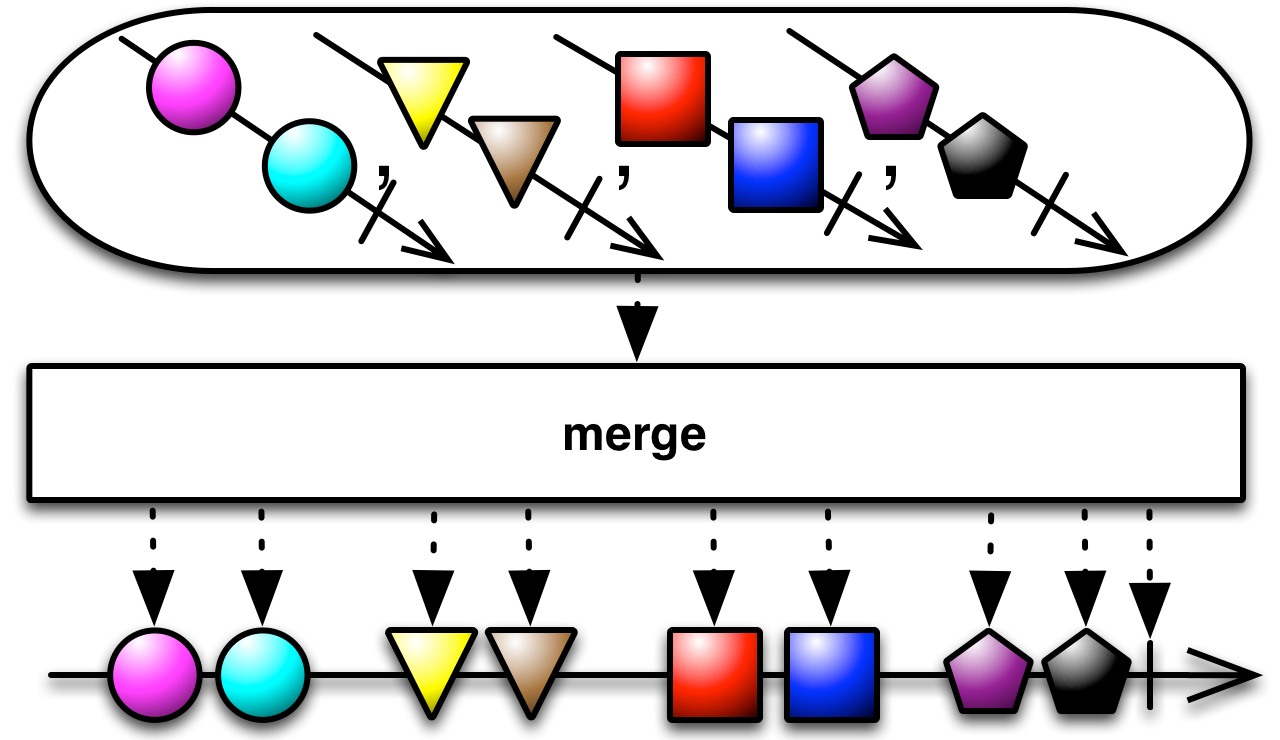
You can combine items emitted by multiple ObservableSources so that they appear as a single ObservableSource, by using the
mergemethod.- Scheduler:
mergeArraydoes not operate by default on a particularScheduler.- Error handling:
- If any of the source
ObservableSources signal aThrowableviaonError, the resultingObservableterminates with thatThrowableand all other sourceObservableSources are disposed. If more than oneObservableSourcesignals an error, the resultingObservablemay terminate with the first one's error or, depending on the concurrency of the sources, may terminate with aCompositeExceptioncontaining two or more of the various error signals.Throwables that didn't make into the composite will be sent (individually) to the global error handler viaRxJavaPlugins.onError(Throwable)method asUndeliverableExceptionerrors. Similarly,Throwables signaled by source(s) after the returnedObservablehas been disposed or terminated with a (composite) error will be sent to the same global error handler. UsemergeArrayDelayError(ObservableSource...)to merge sources and terminate only when all sourceObservableSources have completed or failed with an error.
- Type Parameters:
T- the common element base type- Parameters:
sources- the array of ObservableSources- Returns:
- an Observable that emits all of the items emitted by the ObservableSources in the Array
- See Also:
- ReactiveX operators documentation: Merge,
mergeArrayDelayError(ObservableSource...)
-
mergeDelayError
@CheckReturnValue @SchedulerSupport(value="none") public static <T> Observable<T> mergeDelayError(Iterable<? extends ObservableSource<? extends T>> sources)
Flattens an Iterable of ObservableSources into one ObservableSource, in a way that allows an Observer to receive all successfully emitted items from each of the source ObservableSources without being interrupted by an error notification from one of them.This behaves like
merge(ObservableSource)except that if any of the merged ObservableSources notify of an error viaonError,mergeDelayErrorwill refrain from propagating that error notification until all of the merged ObservableSources have finished emitting items.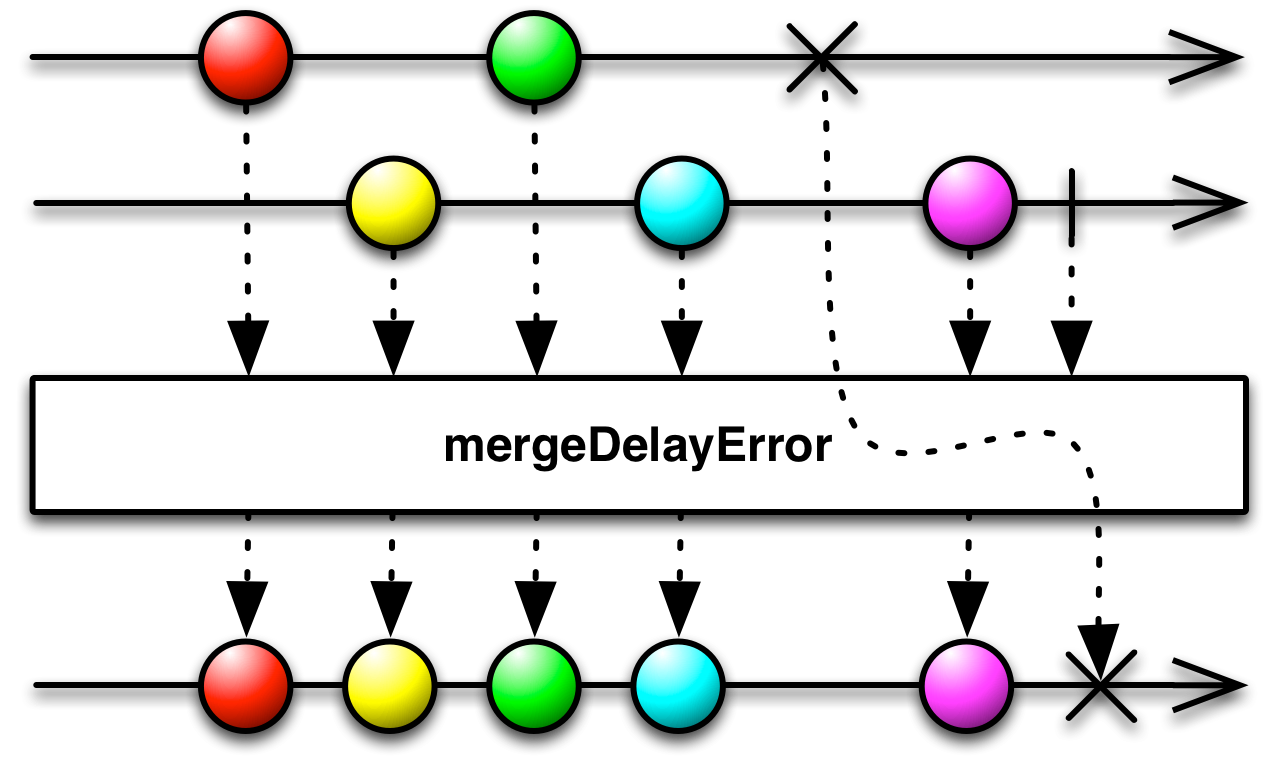
Even if multiple merged ObservableSources send
onErrornotifications,mergeDelayErrorwill only invoke theonErrormethod of its Observers once.- Scheduler:
mergeDelayErrordoes not operate by default on a particularScheduler.
- Type Parameters:
T- the common element base type- Parameters:
sources- the Iterable of ObservableSources- Returns:
- an Observable that emits items that are the result of flattening the items emitted by the ObservableSources in the Iterable
- See Also:
- ReactiveX operators documentation: Merge
-
mergeDelayError
@CheckReturnValue @SchedulerSupport(value="none") public static <T> Observable<T> mergeDelayError(Iterable<? extends ObservableSource<? extends T>> sources, int maxConcurrency, int bufferSize)
Flattens an Iterable of ObservableSources into one ObservableSource, in a way that allows an Observer to receive all successfully emitted items from each of the source ObservableSources without being interrupted by an error notification from one of them, while limiting the number of concurrent subscriptions to these ObservableSources.This behaves like
merge(ObservableSource)except that if any of the merged ObservableSources notify of an error viaonError,mergeDelayErrorwill refrain from propagating that error notification until all of the merged ObservableSources have finished emitting items.
Even if multiple merged ObservableSources send
onErrornotifications,mergeDelayErrorwill only invoke theonErrormethod of its Observers once.- Scheduler:
mergeDelayErrordoes not operate by default on a particularScheduler.
- Type Parameters:
T- the common element base type- Parameters:
sources- the Iterable of ObservableSourcesmaxConcurrency- the maximum number of ObservableSources that may be subscribed to concurrentlybufferSize- the number of items to prefetch from each inner ObservableSource- Returns:
- an Observable that emits items that are the result of flattening the items emitted by the ObservableSources in the Iterable
- See Also:
- ReactiveX operators documentation: Merge
-
mergeArrayDelayError
@CheckReturnValue @SchedulerSupport(value="none") public static <T> Observable<T> mergeArrayDelayError(int maxConcurrency, int bufferSize, ObservableSource<? extends T>... sources)
Flattens an array of ObservableSources into one ObservableSource, in a way that allows an Observer to receive all successfully emitted items from each of the source ObservableSources without being interrupted by an error notification from one of them, while limiting the number of concurrent subscriptions to these ObservableSources.This behaves like
merge(ObservableSource)except that if any of the merged ObservableSources notify of an error viaonError,mergeDelayErrorwill refrain from propagating that error notification until all of the merged ObservableSources have finished emitting items.
Even if multiple merged ObservableSources send
onErrornotifications,mergeDelayErrorwill only invoke theonErrormethod of its Observers once.- Scheduler:
mergeArrayDelayErrordoes not operate by default on a particularScheduler.
- Type Parameters:
T- the common element base type- Parameters:
sources- the array of ObservableSourcesmaxConcurrency- the maximum number of ObservableSources that may be subscribed to concurrentlybufferSize- the number of items to prefetch from each inner ObservableSource- Returns:
- an Observable that emits items that are the result of flattening the items emitted by the ObservableSources in the Iterable
- See Also:
- ReactiveX operators documentation: Merge
-
mergeDelayError
@CheckReturnValue @SchedulerSupport(value="none") public static <T> Observable<T> mergeDelayError(Iterable<? extends ObservableSource<? extends T>> sources, int maxConcurrency)
Flattens an Iterable of ObservableSources into one ObservableSource, in a way that allows an Observer to receive all successfully emitted items from each of the source ObservableSources without being interrupted by an error notification from one of them, while limiting the number of concurrent subscriptions to these ObservableSources.This behaves like
merge(ObservableSource)except that if any of the merged ObservableSources notify of an error viaonError,mergeDelayErrorwill refrain from propagating that error notification until all of the merged ObservableSources have finished emitting items.
Even if multiple merged ObservableSources send
onErrornotifications,mergeDelayErrorwill only invoke theonErrormethod of its Observers once.- Scheduler:
mergeDelayErrordoes not operate by default on a particularScheduler.
- Type Parameters:
T- the common element base type- Parameters:
sources- the Iterable of ObservableSourcesmaxConcurrency- the maximum number of ObservableSources that may be subscribed to concurrently- Returns:
- an Observable that emits items that are the result of flattening the items emitted by the ObservableSources in the Iterable
- See Also:
- ReactiveX operators documentation: Merge
-
mergeDelayError
@CheckReturnValue @SchedulerSupport(value="none") public static <T> Observable<T> mergeDelayError(ObservableSource<? extends ObservableSource<? extends T>> sources)
Flattens an ObservableSource that emits ObservableSources into one ObservableSource, in a way that allows an Observer to receive all successfully emitted items from all of the source ObservableSources without being interrupted by an error notification from one of them.This behaves like
merge(ObservableSource)except that if any of the merged ObservableSources notify of an error viaonError,mergeDelayErrorwill refrain from propagating that error notification until all of the merged ObservableSources have finished emitting items.
Even if multiple merged ObservableSources send
onErrornotifications,mergeDelayErrorwill only invoke theonErrormethod of its Observers once.- Scheduler:
mergeDelayErrordoes not operate by default on a particularScheduler.
- Type Parameters:
T- the common element base type- Parameters:
sources- an ObservableSource that emits ObservableSources- Returns:
- an Observable that emits all of the items emitted by the ObservableSources emitted by the
sourceObservableSource - See Also:
- ReactiveX operators documentation: Merge
-
mergeDelayError
@CheckReturnValue @SchedulerSupport(value="none") public static <T> Observable<T> mergeDelayError(ObservableSource<? extends ObservableSource<? extends T>> sources, int maxConcurrency)
Flattens an ObservableSource that emits ObservableSources into one ObservableSource, in a way that allows an Observer to receive all successfully emitted items from all of the source ObservableSources without being interrupted by an error notification from one of them, while limiting the number of concurrent subscriptions to these ObservableSources.This behaves like
merge(ObservableSource)except that if any of the merged ObservableSources notify of an error viaonError,mergeDelayErrorwill refrain from propagating that error notification until all of the merged ObservableSources have finished emitting items.
Even if multiple merged ObservableSources send
onErrornotifications,mergeDelayErrorwill only invoke theonErrormethod of its Observers once.- Scheduler:
mergeDelayErrordoes not operate by default on a particularScheduler.
- Type Parameters:
T- the common element base type- Parameters:
sources- an ObservableSource that emits ObservableSourcesmaxConcurrency- the maximum number of ObservableSources that may be subscribed to concurrently- Returns:
- an Observable that emits all of the items emitted by the ObservableSources emitted by the
sourceObservableSource - Since:
- 2.0
- See Also:
- ReactiveX operators documentation: Merge
-
mergeDelayError
@CheckReturnValue @SchedulerSupport(value="none") public static <T> Observable<T> mergeDelayError(ObservableSource<? extends T> source1, ObservableSource<? extends T> source2)
Flattens two ObservableSources into one ObservableSource, in a way that allows an Observer to receive all successfully emitted items from each of the source ObservableSources without being interrupted by an error notification from one of them.This behaves like
merge(ObservableSource, ObservableSource)except that if any of the merged ObservableSources notify of an error viaonError,mergeDelayErrorwill refrain from propagating that error notification until all of the merged ObservableSources have finished emitting items.
Even if both merged ObservableSources send
onErrornotifications,mergeDelayErrorwill only invoke theonErrormethod of its Observers once.- Scheduler:
mergeDelayErrordoes not operate by default on a particularScheduler.
- Type Parameters:
T- the common element base type- Parameters:
source1- an ObservableSource to be mergedsource2- an ObservableSource to be merged- Returns:
- an Observable that emits all of the items that are emitted by the two source ObservableSources
- See Also:
- ReactiveX operators documentation: Merge
-
mergeDelayError
@CheckReturnValue @SchedulerSupport(value="none") public static <T> Observable<T> mergeDelayError(ObservableSource<? extends T> source1, ObservableSource<? extends T> source2, ObservableSource<? extends T> source3)
Flattens three ObservableSources into one ObservableSource, in a way that allows an Observer to receive all successfully emitted items from all of the source ObservableSources without being interrupted by an error notification from one of them.This behaves like
merge(ObservableSource, ObservableSource, ObservableSource)except that if any of the merged ObservableSources notify of an error viaonError,mergeDelayErrorwill refrain from propagating that error notification until all of the merged ObservableSources have finished emitting items.
Even if multiple merged ObservableSources send
onErrornotifications,mergeDelayErrorwill only invoke theonErrormethod of its Observers once.- Scheduler:
mergeDelayErrordoes not operate by default on a particularScheduler.
- Type Parameters:
T- the common element base type- Parameters:
source1- an ObservableSource to be mergedsource2- an ObservableSource to be mergedsource3- an ObservableSource to be merged- Returns:
- an Observable that emits all of the items that are emitted by the source ObservableSources
- See Also:
- ReactiveX operators documentation: Merge
-
mergeDelayError
@CheckReturnValue @SchedulerSupport(value="none") public static <T> Observable<T> mergeDelayError(ObservableSource<? extends T> source1, ObservableSource<? extends T> source2, ObservableSource<? extends T> source3, ObservableSource<? extends T> source4)
Flattens four ObservableSources into one ObservableSource, in a way that allows an Observer to receive all successfully emitted items from all of the source ObservableSources without being interrupted by an error notification from one of them.This behaves like
merge(ObservableSource, ObservableSource, ObservableSource, ObservableSource)except that if any of the merged ObservableSources notify of an error viaonError,mergeDelayErrorwill refrain from propagating that error notification until all of the merged ObservableSources have finished emitting items.
Even if multiple merged ObservableSources send
onErrornotifications,mergeDelayErrorwill only invoke theonErrormethod of its Observers once.- Scheduler:
mergeDelayErrordoes not operate by default on a particularScheduler.
- Type Parameters:
T- the common element base type- Parameters:
source1- an ObservableSource to be mergedsource2- an ObservableSource to be mergedsource3- an ObservableSource to be mergedsource4- an ObservableSource to be merged- Returns:
- an Observable that emits all of the items that are emitted by the source ObservableSources
- See Also:
- ReactiveX operators documentation: Merge
-
mergeArrayDelayError
@CheckReturnValue @SchedulerSupport(value="none") public static <T> Observable<T> mergeArrayDelayError(ObservableSource<? extends T>... sources)
Flattens an Iterable of ObservableSources into one ObservableSource, in a way that allows an Observer to receive all successfully emitted items from each of the source ObservableSources without being interrupted by an error notification from one of them.This behaves like
merge(ObservableSource)except that if any of the merged ObservableSources notify of an error viaonError,mergeDelayErrorwill refrain from propagating that error notification until all of the merged ObservableSources have finished emitting items.
Even if multiple merged ObservableSources send
onErrornotifications,mergeDelayErrorwill only invoke theonErrormethod of its Observers once.- Scheduler:
mergeArrayDelayErrordoes not operate by default on a particularScheduler.
- Type Parameters:
T- the common element base type- Parameters:
sources- the Iterable of ObservableSources- Returns:
- an Observable that emits items that are the result of flattening the items emitted by the ObservableSources in the Iterable
- See Also:
- ReactiveX operators documentation: Merge
-
never
@CheckReturnValue @SchedulerSupport(value="none") public static <T> Observable<T> never()
Returns an Observable that never sends any items or notifications to anObserver.
This ObservableSource is useful primarily for testing purposes.
- Scheduler:
neverdoes not operate by default on a particularScheduler.
- Type Parameters:
T- the type of items (not) emitted by the ObservableSource- Returns:
- an Observable that never emits any items or sends any notifications to an
Observer - See Also:
- ReactiveX operators documentation: Never
-
range
@CheckReturnValue @SchedulerSupport(value="none") public static Observable<Integer> range(int start, int count)
Returns an Observable that emits a sequence of Integers within a specified range.
- Scheduler:
rangedoes not operate by default on a particularScheduler.
- Parameters:
start- the value of the first Integer in the sequencecount- the number of sequential Integers to generate- Returns:
- an Observable that emits a range of sequential Integers
- Throws:
IllegalArgumentException- ifcountis less than zero, or ifstart+count− 1 exceedsInteger.MAX_VALUE- See Also:
- ReactiveX operators documentation: Range
-
rangeLong
@CheckReturnValue @SchedulerSupport(value="none") public static Observable<Long> rangeLong(long start, long count)
Returns an Observable that emits a sequence of Longs within a specified range.
- Scheduler:
rangeLongdoes not operate by default on a particularScheduler.
- Parameters:
start- the value of the first Long in the sequencecount- the number of sequential Longs to generate- Returns:
- an Observable that emits a range of sequential Longs
- Throws:
IllegalArgumentException- ifcountis less than zero, or ifstart+count− 1 exceedsLong.MAX_VALUE- See Also:
- ReactiveX operators documentation: Range
-
sequenceEqual
@CheckReturnValue @SchedulerSupport(value="none") public static <T> Single<Boolean> sequenceEqual(ObservableSource<? extends T> source1, ObservableSource<? extends T> source2)
Returns a Single that emits a Boolean value that indicates whether two ObservableSource sequences are the same by comparing the items emitted by each ObservableSource pairwise.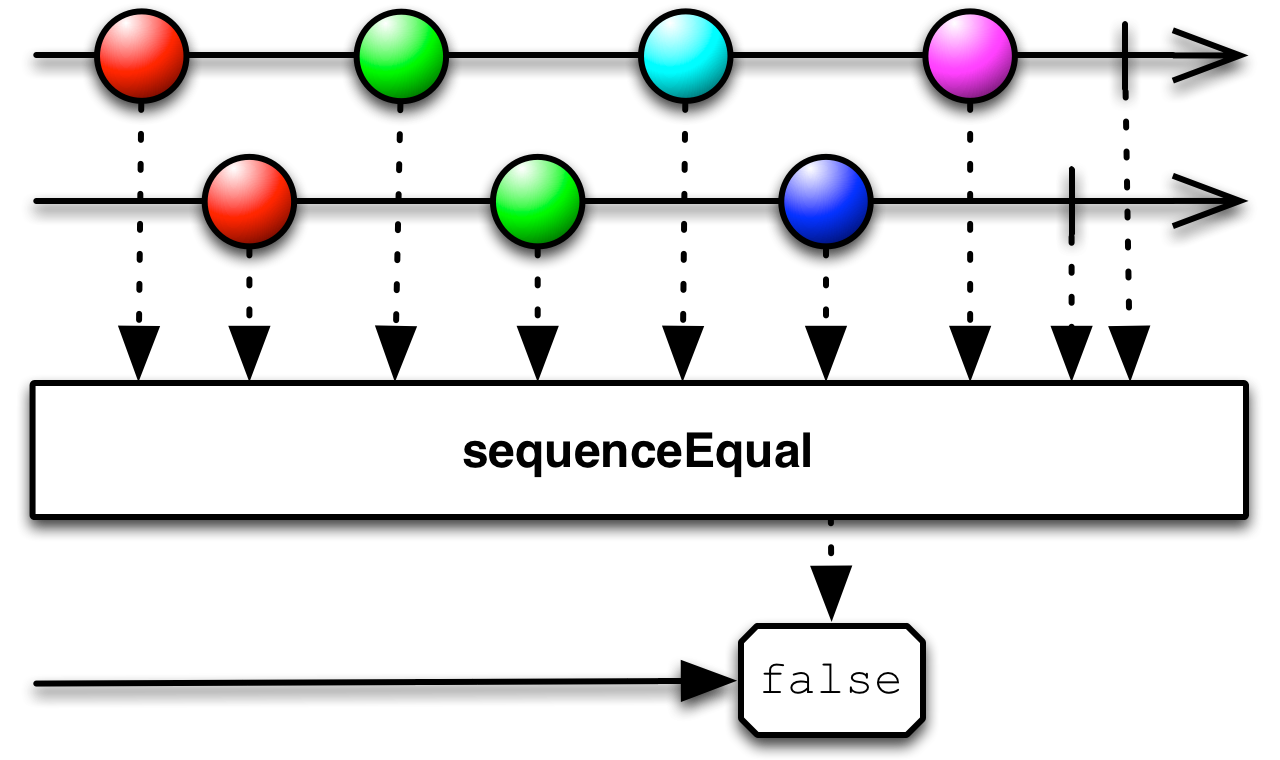
- Scheduler:
sequenceEqualdoes not operate by default on a particularScheduler.
- Type Parameters:
T- the type of items emitted by each ObservableSource- Parameters:
source1- the first ObservableSource to comparesource2- the second ObservableSource to compare- Returns:
- a Single that emits a Boolean value that indicates whether the two sequences are the same
- See Also:
- ReactiveX operators documentation: SequenceEqual
-
sequenceEqual
@CheckReturnValue @SchedulerSupport(value="none") public static <T> Single<Boolean> sequenceEqual(ObservableSource<? extends T> source1, ObservableSource<? extends T> source2, BiPredicate<? super T,? super T> isEqual)
Returns a Single that emits a Boolean value that indicates whether two ObservableSource sequences are the same by comparing the items emitted by each ObservableSource pairwise based on the results of a specified equality function.
- Scheduler:
sequenceEqualdoes not operate by default on a particularScheduler.
- Type Parameters:
T- the type of items emitted by each ObservableSource- Parameters:
source1- the first ObservableSource to comparesource2- the second ObservableSource to compareisEqual- a function used to compare items emitted by each ObservableSource- Returns:
- a Single that emits a Boolean value that indicates whether the two ObservableSource two sequences are the same according to the specified function
- See Also:
- ReactiveX operators documentation: SequenceEqual
-
sequenceEqual
@CheckReturnValue @SchedulerSupport(value="none") public static <T> Single<Boolean> sequenceEqual(ObservableSource<? extends T> source1, ObservableSource<? extends T> source2, BiPredicate<? super T,? super T> isEqual, int bufferSize)
Returns a Single that emits a Boolean value that indicates whether two ObservableSource sequences are the same by comparing the items emitted by each ObservableSource pairwise based on the results of a specified equality function.
- Scheduler:
sequenceEqualdoes not operate by default on a particularScheduler.
- Type Parameters:
T- the type of items emitted by each ObservableSource- Parameters:
source1- the first ObservableSource to comparesource2- the second ObservableSource to compareisEqual- a function used to compare items emitted by each ObservableSourcebufferSize- the number of items to prefetch from the first and second source ObservableSource- Returns:
- an Observable that emits a Boolean value that indicates whether the two ObservableSource two sequences are the same according to the specified function
- See Also:
- ReactiveX operators documentation: SequenceEqual
-
sequenceEqual
@CheckReturnValue @SchedulerSupport(value="none") public static <T> Single<Boolean> sequenceEqual(ObservableSource<? extends T> source1, ObservableSource<? extends T> source2, int bufferSize)
Returns a Single that emits a Boolean value that indicates whether two ObservableSource sequences are the same by comparing the items emitted by each ObservableSource pairwise.
- Scheduler:
sequenceEqualdoes not operate by default on a particularScheduler.
- Type Parameters:
T- the type of items emitted by each ObservableSource- Parameters:
source1- the first ObservableSource to comparesource2- the second ObservableSource to comparebufferSize- the number of items to prefetch from the first and second source ObservableSource- Returns:
- a Single that emits a Boolean value that indicates whether the two sequences are the same
- See Also:
- ReactiveX operators documentation: SequenceEqual
-
switchOnNext
@CheckReturnValue @SchedulerSupport(value="none") public static <T> Observable<T> switchOnNext(ObservableSource<? extends ObservableSource<? extends T>> sources, int bufferSize)
Converts an ObservableSource that emits ObservableSources into an ObservableSource that emits the items emitted by the most recently emitted of those ObservableSources.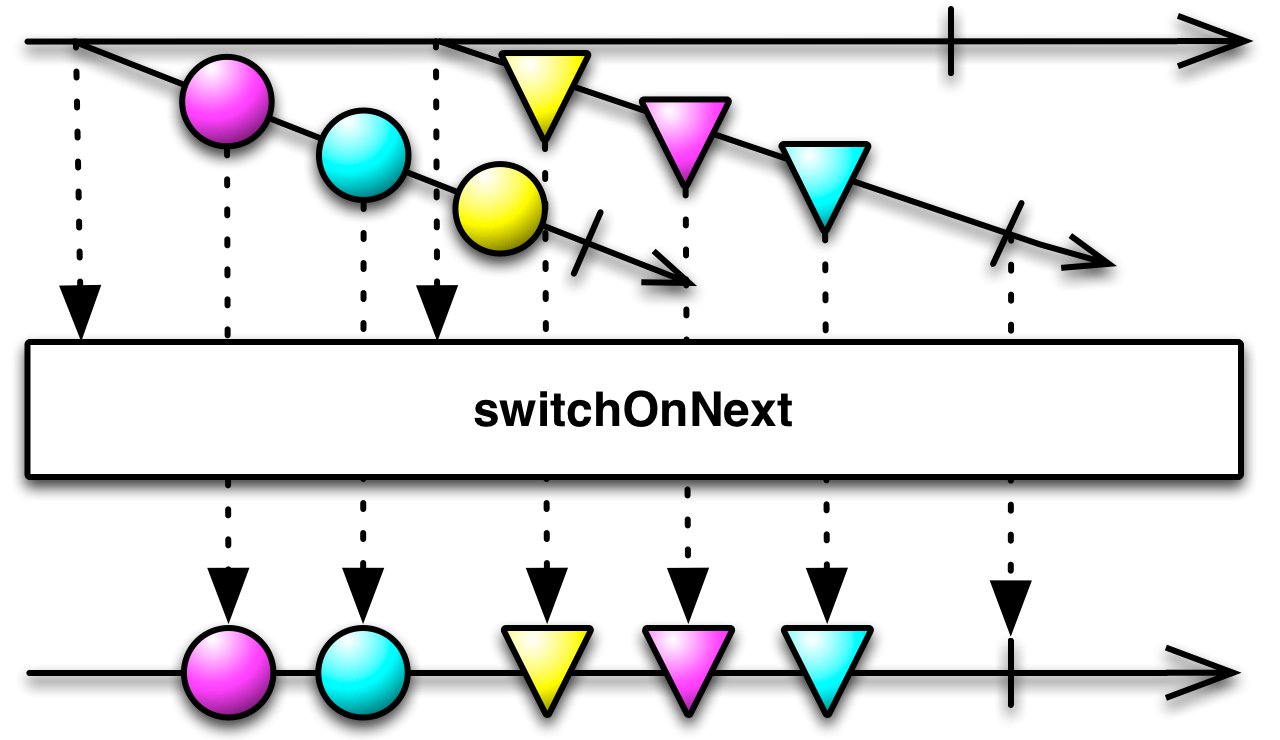
switchOnNextsubscribes to an ObservableSource that emits ObservableSources. Each time it observes one of these emitted ObservableSources, the ObservableSource returned byswitchOnNextbegins emitting the items emitted by that ObservableSource. When a new ObservableSource is emitted,switchOnNextstops emitting items from the earlier-emitted ObservableSource and begins emitting items from the new one.The resulting ObservableSource completes if both the outer ObservableSource and the last inner ObservableSource, if any, complete. If the outer ObservableSource signals an onError, the inner ObservableSource is disposed and the error delivered in-sequence.
- Scheduler:
switchOnNextdoes not operate by default on a particularScheduler.
- Type Parameters:
T- the item type- Parameters:
sources- the source ObservableSource that emits ObservableSourcesbufferSize- the number of items to prefetch from the inner ObservableSources- Returns:
- an Observable that emits the items emitted by the ObservableSource most recently emitted by the source ObservableSource
- See Also:
- ReactiveX operators documentation: Switch
-
switchOnNext
@CheckReturnValue @SchedulerSupport(value="none") public static <T> Observable<T> switchOnNext(ObservableSource<? extends ObservableSource<? extends T>> sources)
Converts an ObservableSource that emits ObservableSources into an ObservableSource that emits the items emitted by the most recently emitted of those ObservableSources.
switchOnNextsubscribes to an ObservableSource that emits ObservableSources. Each time it observes one of these emitted ObservableSources, the ObservableSource returned byswitchOnNextbegins emitting the items emitted by that ObservableSource. When a new ObservableSource is emitted,switchOnNextstops emitting items from the earlier-emitted ObservableSource and begins emitting items from the new one.The resulting ObservableSource completes if both the outer ObservableSource and the last inner ObservableSource, if any, complete. If the outer ObservableSource signals an onError, the inner ObservableSource is disposed and the error delivered in-sequence.
- Scheduler:
switchOnNextdoes not operate by default on a particularScheduler.
- Type Parameters:
T- the item type- Parameters:
sources- the source ObservableSource that emits ObservableSources- Returns:
- an Observable that emits the items emitted by the ObservableSource most recently emitted by the source ObservableSource
- See Also:
- ReactiveX operators documentation: Switch
-
switchOnNextDelayError
@CheckReturnValue @SchedulerSupport(value="none") public static <T> Observable<T> switchOnNextDelayError(ObservableSource<? extends ObservableSource<? extends T>> sources)
Converts an ObservableSource that emits ObservableSources into an ObservableSource that emits the items emitted by the most recently emitted of those ObservableSources and delays any exception until all ObservableSources terminate.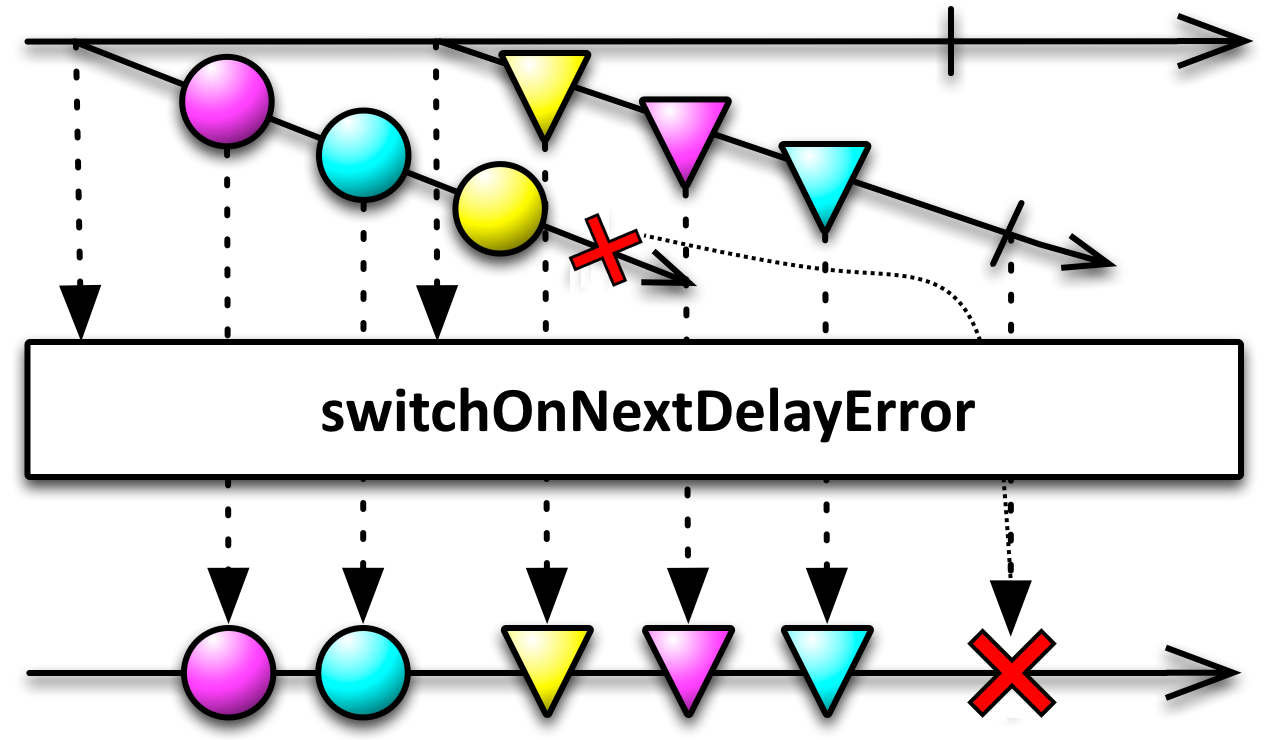
switchOnNextsubscribes to an ObservableSource that emits ObservableSources. Each time it observes one of these emitted ObservableSources, the ObservableSource returned byswitchOnNextbegins emitting the items emitted by that ObservableSource. When a new ObservableSource is emitted,switchOnNextstops emitting items from the earlier-emitted ObservableSource and begins emitting items from the new one.The resulting ObservableSource completes if both the main ObservableSource and the last inner ObservableSource, if any, complete. If the main ObservableSource signals an onError, the termination of the last inner ObservableSource will emit that error as is or wrapped into a CompositeException along with the other possible errors the former inner ObservableSources signalled.
- Scheduler:
switchOnNextDelayErrordoes not operate by default on a particularScheduler.
- Type Parameters:
T- the item type- Parameters:
sources- the source ObservableSource that emits ObservableSources- Returns:
- an Observable that emits the items emitted by the ObservableSource most recently emitted by the source ObservableSource
- Since:
- 2.0
- See Also:
- ReactiveX operators documentation: Switch
-
switchOnNextDelayError
@CheckReturnValue @SchedulerSupport(value="none") public static <T> Observable<T> switchOnNextDelayError(ObservableSource<? extends ObservableSource<? extends T>> sources, int prefetch)
Converts an ObservableSource that emits ObservableSources into an ObservableSource that emits the items emitted by the most recently emitted of those ObservableSources and delays any exception until all ObservableSources terminate.
switchOnNextsubscribes to an ObservableSource that emits ObservableSources. Each time it observes one of these emitted ObservableSources, the ObservableSource returned byswitchOnNextbegins emitting the items emitted by that ObservableSource. When a new ObservableSource is emitted,switchOnNextstops emitting items from the earlier-emitted ObservableSource and begins emitting items from the new one.The resulting ObservableSource completes if both the main ObservableSource and the last inner ObservableSource, if any, complete. If the main ObservableSource signals an onError, the termination of the last inner ObservableSource will emit that error as is or wrapped into a CompositeException along with the other possible errors the former inner ObservableSources signalled.
- Scheduler:
switchOnNextDelayErrordoes not operate by default on a particularScheduler.
- Type Parameters:
T- the item type- Parameters:
sources- the source ObservableSource that emits ObservableSourcesprefetch- the number of items to prefetch from the inner ObservableSources- Returns:
- an Observable that emits the items emitted by the ObservableSource most recently emitted by the source ObservableSource
- Since:
- 2.0
- See Also:
- ReactiveX operators documentation: Switch
-
timer
@CheckReturnValue @SchedulerSupport(value="io.reactivex:computation") public static Observable<Long> timer(long delay, TimeUnit unit)
Returns an Observable that emits0Lafter a specified delay, and then completes.
- Scheduler:
timeroperates by default on thecomputationScheduler.
- Parameters:
delay- the initial delay before emitting a single0Lunit- time units to use fordelay- Returns:
- an Observable that
0Lafter a specified delay, and then completes - See Also:
- ReactiveX operators documentation: Timer
-
timer
@CheckReturnValue @SchedulerSupport(value="custom") public static Observable<Long> timer(long delay, TimeUnit unit, Scheduler scheduler)
Returns an Observable that emits0Lafter a specified delay, on a specified Scheduler, and then completes.
- Scheduler:
- You specify which
Schedulerthis operator will use.
- Parameters:
delay- the initial delay before emitting a single 0Lunit- time units to use fordelayscheduler- theSchedulerto use for scheduling the item- Returns:
- an Observable that emits
0Lafter a specified delay, on a specified Scheduler, and then completes - Throws:
NullPointerException- ifunitis null, or ifscheduleris null- See Also:
- ReactiveX operators documentation: Timer
-
unsafeCreate
@CheckReturnValue @SchedulerSupport(value="none") public static <T> Observable<T> unsafeCreate(ObservableSource<T> onSubscribe)
Create an Observable by wrapping an ObservableSource which has to be implemented according to the Reactive Streams based Observable specification by handling disposal correctly; no safeguards are provided by the Observable itself.- Scheduler:
unsafeCreateby default doesn't operate on any particularScheduler.
- Type Parameters:
T- the value type emitted- Parameters:
onSubscribe- the ObservableSource instance to wrap- Returns:
- the new Observable instance
-
using
@CheckReturnValue @SchedulerSupport(value="none") public static <T,D> Observable<T> using(Callable<? extends D> resourceSupplier, Function<? super D,? extends ObservableSource<? extends T>> sourceSupplier, Consumer<? super D> disposer)
Constructs an ObservableSource that creates a dependent resource object which is disposed of when the downstream calls dispose().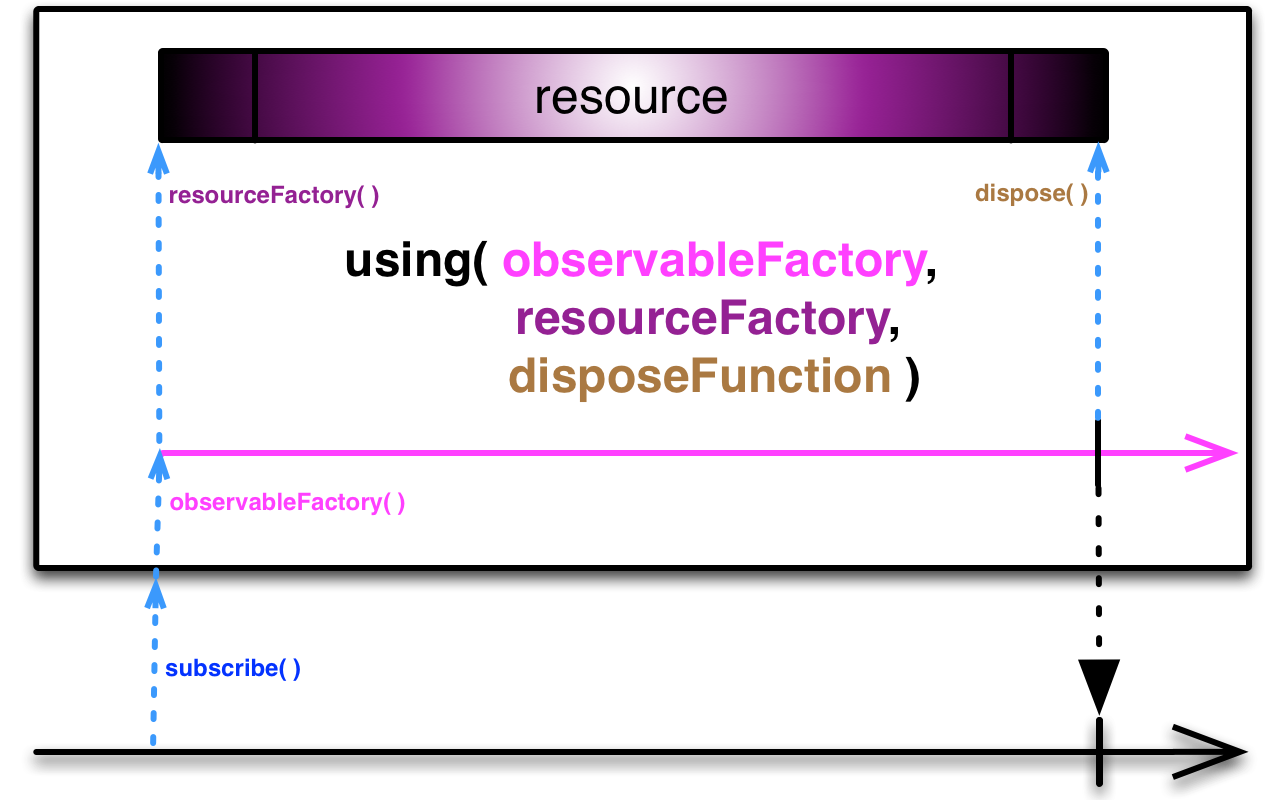
- Scheduler:
usingdoes not operate by default on a particularScheduler.
- Type Parameters:
T- the element type of the generated ObservableSourceD- the type of the resource associated with the output sequence- Parameters:
resourceSupplier- the factory function to create a resource object that depends on the ObservableSourcesourceSupplier- the factory function to create an ObservableSourcedisposer- the function that will dispose of the resource- Returns:
- the ObservableSource whose lifetime controls the lifetime of the dependent resource object
- See Also:
- ReactiveX operators documentation: Using
-
using
@CheckReturnValue @SchedulerSupport(value="none") public static <T,D> Observable<T> using(Callable<? extends D> resourceSupplier, Function<? super D,? extends ObservableSource<? extends T>> sourceSupplier, Consumer<? super D> disposer, boolean eager)
Constructs an ObservableSource that creates a dependent resource object which is disposed of just before termination if you have setdisposeEagerlytotrueand a dispose() call does not occur before termination. Otherwise resource disposal will occur on a dispose() call. Eager disposal is particularly appropriate for a synchronous ObservableSource that reuses resources.disposeActionwill only be called once per subscription.
- Scheduler:
usingdoes not operate by default on a particularScheduler.
- Type Parameters:
T- the element type of the generated ObservableSourceD- the type of the resource associated with the output sequence- Parameters:
resourceSupplier- the factory function to create a resource object that depends on the ObservableSourcesourceSupplier- the factory function to create an ObservableSourcedisposer- the function that will dispose of the resourceeager- iftruethen disposal will happen either on a dispose() call or just before emission of a terminal event (onCompleteoronError).- Returns:
- the ObservableSource whose lifetime controls the lifetime of the dependent resource object
- Since:
- 2.0
- See Also:
- ReactiveX operators documentation: Using
-
wrap
@CheckReturnValue @SchedulerSupport(value="none") public static <T> Observable<T> wrap(ObservableSource<T> source)
Wraps an ObservableSource into an Observable if not already an Observable.- Scheduler:
wrapdoes not operate by default on a particularScheduler.
- Type Parameters:
T- the value type- Parameters:
source- the source ObservableSource instance- Returns:
- the new Observable instance or the same as the source
- Throws:
NullPointerException- if source is null
-
zip
@CheckReturnValue @SchedulerSupport(value="none") public static <T,R> Observable<R> zip(Iterable<? extends ObservableSource<? extends T>> sources, Function<? super Object[],? extends R> zipper)
Returns an Observable that emits the results of a specified combiner function applied to combinations of items emitted, in sequence, by an Iterable of other ObservableSources.zipapplies this function in strict sequence, so the first item emitted by the new ObservableSource will be the result of the function applied to the first item emitted by each of the source ObservableSources; the second item emitted by the new ObservableSource will be the result of the function applied to the second item emitted by each of those ObservableSources; and so forth.The resulting
ObservableSource<R>returned fromzipwill invokeonNextas many times as the number ofonNextinvocations of the source ObservableSource that emits the fewest items.The operator subscribes to its sources in order they are specified and completes eagerly if one of the sources is shorter than the rest while disposing the other sources. Therefore, it is possible those other sources will never be able to run to completion (and thus not calling
doOnComplete()). This can also happen if the sources are exactly the same length; if source A completes and B has been consumed and is about to complete, the operator detects A won't be sending further values and it will dispose B immediately. For example:zip(Arrays.asList(range(1, 5).doOnComplete(action1), range(6, 5).doOnComplete(action2)), (a) -> a)action1will be called butaction2won't.
To work around this termination property, usedoOnDispose(Action)as well or useusing()to do cleanup in case of completion or a dispose() call.Note on method signature: since Java doesn't allow creating a generic array with
new T[], the implementation of this operator has to create anObject[]instead. Unfortunately, aFunction<Integer[], R>passed to the method would trigger aClassCastException.
- Scheduler:
zipdoes not operate by default on a particularScheduler.
- Type Parameters:
T- the common value typeR- the zipped result type- Parameters:
sources- an Iterable of source ObservableSourceszipper- a function that, when applied to an item emitted by each of the source ObservableSources, results in an item that will be emitted by the resulting ObservableSource- Returns:
- an Observable that emits the zipped results
- See Also:
- ReactiveX operators documentation: Zip
-
zip
@CheckReturnValue @SchedulerSupport(value="none") public static <T,R> Observable<R> zip(ObservableSource<? extends ObservableSource<? extends T>> sources, Function<? super Object[],? extends R> zipper)
Returns an Observable that emits the results of a specified combiner function applied to combinations of n items emitted, in sequence, by the n ObservableSources emitted by a specified ObservableSource.zipapplies this function in strict sequence, so the first item emitted by the new ObservableSource will be the result of the function applied to the first item emitted by each of the ObservableSources emitted by the source ObservableSource; the second item emitted by the new ObservableSource will be the result of the function applied to the second item emitted by each of those ObservableSources; and so forth.The resulting
ObservableSource<R>returned fromzipwill invokeonNextas many times as the number ofonNextinvocations of the source ObservableSource that emits the fewest items.The operator subscribes to its sources in order they are specified and completes eagerly if one of the sources is shorter than the rest while disposing the other sources. Therefore, it is possible those other sources will never be able to run to completion (and thus not calling
doOnComplete()). This can also happen if the sources are exactly the same length; if source A completes and B has been consumed and is about to complete, the operator detects A won't be sending further values and it will dispose B immediately. For example:zip(just(range(1, 5).doOnComplete(action1), range(6, 5).doOnComplete(action2)), (a) -> a)action1will be called butaction2won't.
To work around this termination property, usedoOnDispose(Action)as well or useusing()to do cleanup in case of completion or a dispose() call.Note on method signature: since Java doesn't allow creating a generic array with
new T[], the implementation of this operator has to create anObject[]instead. Unfortunately, aFunction<Integer[], R>passed to the method would trigger aClassCastException.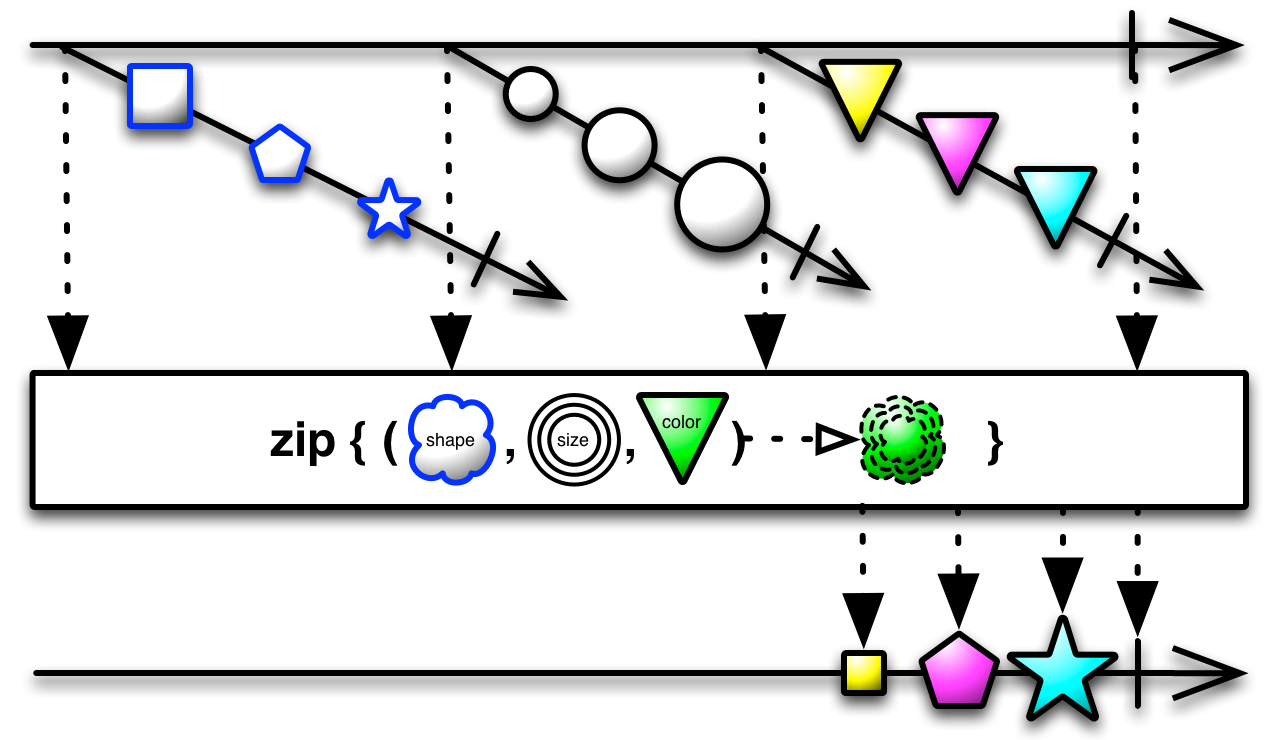
- Scheduler:
zipdoes not operate by default on a particularScheduler.
- Type Parameters:
T- the value type of the inner ObservableSourcesR- the zipped result type- Parameters:
sources- an ObservableSource of source ObservableSourceszipper- a function that, when applied to an item emitted by each of the ObservableSources emitted byws, results in an item that will be emitted by the resulting ObservableSource- Returns:
- an Observable that emits the zipped results
- See Also:
- ReactiveX operators documentation: Zip
-
zip
@CheckReturnValue @SchedulerSupport(value="none") public static <T1,T2,R> Observable<R> zip(ObservableSource<? extends T1> source1, ObservableSource<? extends T2> source2, BiFunction<? super T1,? super T2,? extends R> zipper)
Returns an Observable that emits the results of a specified combiner function applied to combinations of two items emitted, in sequence, by two other ObservableSources.
zipapplies this function in strict sequence, so the first item emitted by the new ObservableSource will be the result of the function applied to the first item emitted byo1and the first item emitted byo2; the second item emitted by the new ObservableSource will be the result of the function applied to the second item emitted byo1and the second item emitted byo2; and so forth.The resulting
ObservableSource<R>returned fromzipwill invokeonNextas many times as the number ofonNextinvocations of the source ObservableSource that emits the fewest items.The operator subscribes to its sources in order they are specified and completes eagerly if one of the sources is shorter than the rest while disposing the other sources. Therefore, it is possible those other sources will never be able to run to completion (and thus not calling
doOnComplete()). This can also happen if the sources are exactly the same length; if source A completes and B has been consumed and is about to complete, the operator detects A won't be sending further values and it will dispose B immediately. For example:zip(range(1, 5).doOnComplete(action1), range(6, 5).doOnComplete(action2), (a, b) -> a + b)action1will be called butaction2won't.
To work around this termination property, usedoOnDispose(Action)as well or useusing()to do cleanup in case of completion or a dispose() call.- Scheduler:
zipdoes not operate by default on a particularScheduler.
- Type Parameters:
T1- the value type of the first sourceT2- the value type of the second sourceR- the zipped result type- Parameters:
source1- the first source ObservableSourcesource2- a second source ObservableSourcezipper- a function that, when applied to an item emitted by each of the source ObservableSources, results in an item that will be emitted by the resulting ObservableSource- Returns:
- an Observable that emits the zipped results
- See Also:
- ReactiveX operators documentation: Zip
-
zip
@CheckReturnValue @SchedulerSupport(value="none") public static <T1,T2,R> Observable<R> zip(ObservableSource<? extends T1> source1, ObservableSource<? extends T2> source2, BiFunction<? super T1,? super T2,? extends R> zipper, boolean delayError)
Returns an Observable that emits the results of a specified combiner function applied to combinations of two items emitted, in sequence, by two other ObservableSources.
zipapplies this function in strict sequence, so the first item emitted by the new ObservableSource will be the result of the function applied to the first item emitted byo1and the first item emitted byo2; the second item emitted by the new ObservableSource will be the result of the function applied to the second item emitted byo1and the second item emitted byo2; and so forth.The resulting
ObservableSource<R>returned fromzipwill invokeonNextas many times as the number ofonNextinvocations of the source ObservableSource that emits the fewest items.The operator subscribes to its sources in order they are specified and completes eagerly if one of the sources is shorter than the rest while disposing the other sources. Therefore, it is possible those other sources will never be able to run to completion (and thus not calling
doOnComplete()). This can also happen if the sources are exactly the same length; if source A completes and B has been consumed and is about to complete, the operator detects A won't be sending further values and it will dispose B immediately. For example:zip(range(1, 5).doOnComplete(action1), range(6, 5).doOnComplete(action2), (a, b) -> a + b)action1will be called butaction2won't.
To work around this termination property, usedoOnDispose(Action)as well or useusing()to do cleanup in case of completion or a dispose() call.- Scheduler:
zipdoes not operate by default on a particularScheduler.
- Type Parameters:
T1- the value type of the first sourceT2- the value type of the second sourceR- the zipped result type- Parameters:
source1- the first source ObservableSourcesource2- a second source ObservableSourcezipper- a function that, when applied to an item emitted by each of the source ObservableSources, results in an item that will be emitted by the resulting ObservableSourcedelayError- delay errors from any of the source ObservableSources till the other terminates- Returns:
- an Observable that emits the zipped results
- See Also:
- ReactiveX operators documentation: Zip
-
zip
@CheckReturnValue @SchedulerSupport(value="none") public static <T1,T2,R> Observable<R> zip(ObservableSource<? extends T1> source1, ObservableSource<? extends T2> source2, BiFunction<? super T1,? super T2,? extends R> zipper, boolean delayError, int bufferSize)
Returns an Observable that emits the results of a specified combiner function applied to combinations of two items emitted, in sequence, by two other ObservableSources.
zipapplies this function in strict sequence, so the first item emitted by the new ObservableSource will be the result of the function applied to the first item emitted byo1and the first item emitted byo2; the second item emitted by the new ObservableSource will be the result of the function applied to the second item emitted byo1and the second item emitted byo2; and so forth.The resulting
ObservableSource<R>returned fromzipwill invokeonNextas many times as the number ofonNextinvocations of the source ObservableSource that emits the fewest items.The operator subscribes to its sources in order they are specified and completes eagerly if one of the sources is shorter than the rest while disposing the other sources. Therefore, it is possible those other sources will never be able to run to completion (and thus not calling
doOnComplete()). This can also happen if the sources are exactly the same length; if source A completes and B has been consumed and is about to complete, the operator detects A won't be sending further values and it will dispose B immediately. For example:zip(range(1, 5).doOnComplete(action1), range(6, 5).doOnComplete(action2), (a, b) -> a + b)action1will be called butaction2won't.
To work around this termination property, usedoOnDispose(Action)as well or useusing()to do cleanup in case of completion or a dispose() call.- Scheduler:
zipdoes not operate by default on a particularScheduler.
- Type Parameters:
T1- the value type of the first sourceT2- the value type of the second sourceR- the zipped result type- Parameters:
source1- the first source ObservableSourcesource2- a second source ObservableSourcezipper- a function that, when applied to an item emitted by each of the source ObservableSources, results in an item that will be emitted by the resulting ObservableSourcedelayError- delay errors from any of the source ObservableSources till the other terminatesbufferSize- the number of elements to prefetch from each source ObservableSource- Returns:
- an Observable that emits the zipped results
- See Also:
- ReactiveX operators documentation: Zip
-
zip
@CheckReturnValue @SchedulerSupport(value="none") public static <T1,T2,T3,R> Observable<R> zip(ObservableSource<? extends T1> source1, ObservableSource<? extends T2> source2, ObservableSource<? extends T3> source3, Function3<? super T1,? super T2,? super T3,? extends R> zipper)
Returns an Observable that emits the results of a specified combiner function applied to combinations of three items emitted, in sequence, by three other ObservableSources.
zipapplies this function in strict sequence, so the first item emitted by the new ObservableSource will be the result of the function applied to the first item emitted byo1, the first item emitted byo2, and the first item emitted byo3; the second item emitted by the new ObservableSource will be the result of the function applied to the second item emitted byo1, the second item emitted byo2, and the second item emitted byo3; and so forth.The resulting
ObservableSource<R>returned fromzipwill invokeonNextas many times as the number ofonNextinvocations of the source ObservableSource that emits the fewest items.The operator subscribes to its sources in order they are specified and completes eagerly if one of the sources is shorter than the rest while disposing the other sources. Therefore, it is possible those other sources will never be able to run to completion (and thus not calling
doOnComplete()). This can also happen if the sources are exactly the same length; if source A completes and B has been consumed and is about to complete, the operator detects A won't be sending further values and it will dispose B immediately. For example:zip(range(1, 5).doOnComplete(action1), range(6, 5).doOnComplete(action2), ..., (a, b, c) -> a + b)action1will be called butaction2won't.
To work around this termination property, usedoOnDispose(Action)as well or useusing()to do cleanup in case of completion or a dispose() call.- Scheduler:
zipdoes not operate by default on a particularScheduler.
- Type Parameters:
T1- the value type of the first sourceT2- the value type of the second sourceT3- the value type of the third sourceR- the zipped result type- Parameters:
source1- the first source ObservableSourcesource2- a second source ObservableSourcesource3- a third source ObservableSourcezipper- a function that, when applied to an item emitted by each of the source ObservableSources, results in an item that will be emitted by the resulting ObservableSource- Returns:
- an Observable that emits the zipped results
- See Also:
- ReactiveX operators documentation: Zip
-
zip
@CheckReturnValue @SchedulerSupport(value="none") public static <T1,T2,T3,T4,R> Observable<R> zip(ObservableSource<? extends T1> source1, ObservableSource<? extends T2> source2, ObservableSource<? extends T3> source3, ObservableSource<? extends T4> source4, Function4<? super T1,? super T2,? super T3,? super T4,? extends R> zipper)
Returns an Observable that emits the results of a specified combiner function applied to combinations of four items emitted, in sequence, by four other ObservableSources.
zipapplies this function in strict sequence, so the first item emitted by the new ObservableSource will be the result of the function applied to the first item emitted byo1, the first item emitted byo2, the first item emitted byo3, and the first item emitted by04; the second item emitted by the new ObservableSource will be the result of the function applied to the second item emitted by each of those ObservableSources; and so forth.The resulting
ObservableSource<R>returned fromzipwill invokeonNextas many times as the number ofonNextinvocations of the source ObservableSource that emits the fewest items.The operator subscribes to its sources in order they are specified and completes eagerly if one of the sources is shorter than the rest while disposing the other sources. Therefore, it is possible those other sources will never be able to run to completion (and thus not calling
doOnComplete()). This can also happen if the sources are exactly the same length; if source A completes and B has been consumed and is about to complete, the operator detects A won't be sending further values and it will dispose B immediately. For example:zip(range(1, 5).doOnComplete(action1), range(6, 5).doOnComplete(action2), ..., (a, b, c, d) -> a + b)action1will be called butaction2won't.
To work around this termination property, usedoOnDispose(Action)as well or useusing()to do cleanup in case of completion or a dispose() call.- Scheduler:
zipdoes not operate by default on a particularScheduler.
- Type Parameters:
T1- the value type of the first sourceT2- the value type of the second sourceT3- the value type of the third sourceT4- the value type of the fourth sourceR- the zipped result type- Parameters:
source1- the first source ObservableSourcesource2- a second source ObservableSourcesource3- a third source ObservableSourcesource4- a fourth source ObservableSourcezipper- a function that, when applied to an item emitted by each of the source ObservableSources, results in an item that will be emitted by the resulting ObservableSource- Returns:
- an Observable that emits the zipped results
- See Also:
- ReactiveX operators documentation: Zip
-
zip
@CheckReturnValue @SchedulerSupport(value="none") public static <T1,T2,T3,T4,T5,R> Observable<R> zip(ObservableSource<? extends T1> source1, ObservableSource<? extends T2> source2, ObservableSource<? extends T3> source3, ObservableSource<? extends T4> source4, ObservableSource<? extends T5> source5, Function5<? super T1,? super T2,? super T3,? super T4,? super T5,? extends R> zipper)
Returns an Observable that emits the results of a specified combiner function applied to combinations of five items emitted, in sequence, by five other ObservableSources.
zipapplies this function in strict sequence, so the first item emitted by the new ObservableSource will be the result of the function applied to the first item emitted byo1, the first item emitted byo2, the first item emitted byo3, the first item emitted byo4, and the first item emitted byo5; the second item emitted by the new ObservableSource will be the result of the function applied to the second item emitted by each of those ObservableSources; and so forth.The resulting
ObservableSource<R>returned fromzipwill invokeonNextas many times as the number ofonNextinvocations of the source ObservableSource that emits the fewest items.The operator subscribes to its sources in order they are specified and completes eagerly if one of the sources is shorter than the rest while disposing the other sources. Therefore, it is possible those other sources will never be able to run to completion (and thus not calling
doOnComplete()). This can also happen if the sources are exactly the same length; if source A completes and B has been consumed and is about to complete, the operator detects A won't be sending further values and it will dispose B immediately. For example:zip(range(1, 5).doOnComplete(action1), range(6, 5).doOnComplete(action2), ..., (a, b, c, d, e) -> a + b)action1will be called butaction2won't.
To work around this termination property, usedoOnDispose(Action)as well or useusing()to do cleanup in case of completion or a dispose() call.- Scheduler:
zipdoes not operate by default on a particularScheduler.
- Type Parameters:
T1- the value type of the first sourceT2- the value type of the second sourceT3- the value type of the third sourceT4- the value type of the fourth sourceT5- the value type of the fifth sourceR- the zipped result type- Parameters:
source1- the first source ObservableSourcesource2- a second source ObservableSourcesource3- a third source ObservableSourcesource4- a fourth source ObservableSourcesource5- a fifth source ObservableSourcezipper- a function that, when applied to an item emitted by each of the source ObservableSources, results in an item that will be emitted by the resulting ObservableSource- Returns:
- an Observable that emits the zipped results
- See Also:
- ReactiveX operators documentation: Zip
-
zip
@CheckReturnValue @SchedulerSupport(value="none") public static <T1,T2,T3,T4,T5,T6,R> Observable<R> zip(ObservableSource<? extends T1> source1, ObservableSource<? extends T2> source2, ObservableSource<? extends T3> source3, ObservableSource<? extends T4> source4, ObservableSource<? extends T5> source5, ObservableSource<? extends T6> source6, Function6<? super T1,? super T2,? super T3,? super T4,? super T5,? super T6,? extends R> zipper)
Returns an Observable that emits the results of a specified combiner function applied to combinations of six items emitted, in sequence, by six other ObservableSources.
zipapplies this function in strict sequence, so the first item emitted by the new ObservableSource will be the result of the function applied to the first item emitted by each source ObservableSource, the second item emitted by the new ObservableSource will be the result of the function applied to the second item emitted by each of those ObservableSources, and so forth.The resulting
ObservableSource<R>returned fromzipwill invokeonNextas many times as the number ofonNextinvocations of the source ObservableSource that emits the fewest items.The operator subscribes to its sources in order they are specified and completes eagerly if one of the sources is shorter than the rest while disposing the other sources. Therefore, it is possible those other sources will never be able to run to completion (and thus not calling
doOnComplete()). This can also happen if the sources are exactly the same length; if source A completes and B has been consumed and is about to complete, the operator detects A won't be sending further values and it will dispose B immediately. For example:zip(range(1, 5).doOnComplete(action1), range(6, 5).doOnComplete(action2), ..., (a, b, c, d, e, f) -> a + b)action1will be called butaction2won't.
To work around this termination property, usedoOnDispose(Action)as well or useusing()to do cleanup in case of completion or a dispose() call.- Scheduler:
zipdoes not operate by default on a particularScheduler.
- Type Parameters:
T1- the value type of the first sourceT2- the value type of the second sourceT3- the value type of the third sourceT4- the value type of the fourth sourceT5- the value type of the fifth sourceT6- the value type of the sixth sourceR- the zipped result type- Parameters:
source1- the first source ObservableSourcesource2- a second source ObservableSourcesource3- a third source ObservableSourcesource4- a fourth source ObservableSourcesource5- a fifth source ObservableSourcesource6- a sixth source ObservableSourcezipper- a function that, when applied to an item emitted by each of the source ObservableSources, results in an item that will be emitted by the resulting ObservableSource- Returns:
- an Observable that emits the zipped results
- See Also:
- ReactiveX operators documentation: Zip
-
zip
@CheckReturnValue @SchedulerSupport(value="none") public static <T1,T2,T3,T4,T5,T6,T7,R> Observable<R> zip(ObservableSource<? extends T1> source1, ObservableSource<? extends T2> source2, ObservableSource<? extends T3> source3, ObservableSource<? extends T4> source4, ObservableSource<? extends T5> source5, ObservableSource<? extends T6> source6, ObservableSource<? extends T7> source7, Function7<? super T1,? super T2,? super T3,? super T4,? super T5,? super T6,? super T7,? extends R> zipper)
Returns an Observable that emits the results of a specified combiner function applied to combinations of seven items emitted, in sequence, by seven other ObservableSources.
zipapplies this function in strict sequence, so the first item emitted by the new ObservableSource will be the result of the function applied to the first item emitted by each source ObservableSource, the second item emitted by the new ObservableSource will be the result of the function applied to the second item emitted by each of those ObservableSources, and so forth.The resulting
ObservableSource<R>returned fromzipwill invokeonNextas many times as the number ofonNextinvocations of the source ObservableSource that emits the fewest items.The operator subscribes to its sources in order they are specified and completes eagerly if one of the sources is shorter than the rest while disposing the other sources. Therefore, it is possible those other sources will never be able to run to completion (and thus not calling
doOnComplete()). This can also happen if the sources are exactly the same length; if source A completes and B has been consumed and is about to complete, the operator detects A won't be sending further values and it will dispose B immediately. For example:zip(range(1, 5).doOnComplete(action1), range(6, 5).doOnComplete(action2), ..., (a, b, c, d, e, f, g) -> a + b)action1will be called butaction2won't.
To work around this termination property, usedoOnDispose(Action)as well or useusing()to do cleanup in case of completion or a dispose() call.- Scheduler:
zipdoes not operate by default on a particularScheduler.
- Type Parameters:
T1- the value type of the first sourceT2- the value type of the second sourceT3- the value type of the third sourceT4- the value type of the fourth sourceT5- the value type of the fifth sourceT6- the value type of the sixth sourceT7- the value type of the seventh sourceR- the zipped result type- Parameters:
source1- the first source ObservableSourcesource2- a second source ObservableSourcesource3- a third source ObservableSourcesource4- a fourth source ObservableSourcesource5- a fifth source ObservableSourcesource6- a sixth source ObservableSourcesource7- a seventh source ObservableSourcezipper- a function that, when applied to an item emitted by each of the source ObservableSources, results in an item that will be emitted by the resulting ObservableSource- Returns:
- an Observable that emits the zipped results
- See Also:
- ReactiveX operators documentation: Zip
-
zip
@CheckReturnValue @SchedulerSupport(value="none") public static <T1,T2,T3,T4,T5,T6,T7,T8,R> Observable<R> zip(ObservableSource<? extends T1> source1, ObservableSource<? extends T2> source2, ObservableSource<? extends T3> source3, ObservableSource<? extends T4> source4, ObservableSource<? extends T5> source5, ObservableSource<? extends T6> source6, ObservableSource<? extends T7> source7, ObservableSource<? extends T8> source8, Function8<? super T1,? super T2,? super T3,? super T4,? super T5,? super T6,? super T7,? super T8,? extends R> zipper)
Returns an Observable that emits the results of a specified combiner function applied to combinations of eight items emitted, in sequence, by eight other ObservableSources.
zipapplies this function in strict sequence, so the first item emitted by the new ObservableSource will be the result of the function applied to the first item emitted by each source ObservableSource, the second item emitted by the new ObservableSource will be the result of the function applied to the second item emitted by each of those ObservableSources, and so forth.The resulting
ObservableSource<R>returned fromzipwill invokeonNextas many times as the number ofonNextinvocations of the source ObservableSource that emits the fewest items.The operator subscribes to its sources in order they are specified and completes eagerly if one of the sources is shorter than the rest while disposing the other sources. Therefore, it is possible those other sources will never be able to run to completion (and thus not calling
doOnComplete()). This can also happen if the sources are exactly the same length; if source A completes and B has been consumed and is about to complete, the operator detects A won't be sending further values and it will dispose B immediately. For example:zip(range(1, 5).doOnComplete(action1), range(6, 5).doOnComplete(action2), ..., (a, b, c, d, e, f, g, h) -> a + b)action1will be called butaction2won't.
To work around this termination property, usedoOnDispose(Action)as well or useusing()to do cleanup in case of completion or a dispose() call.- Scheduler:
zipdoes not operate by default on a particularScheduler.
- Type Parameters:
T1- the value type of the first sourceT2- the value type of the second sourceT3- the value type of the third sourceT4- the value type of the fourth sourceT5- the value type of the fifth sourceT6- the value type of the sixth sourceT7- the value type of the seventh sourceT8- the value type of the eighth sourceR- the zipped result type- Parameters:
source1- the first source ObservableSourcesource2- a second source ObservableSourcesource3- a third source ObservableSourcesource4- a fourth source ObservableSourcesource5- a fifth source ObservableSourcesource6- a sixth source ObservableSourcesource7- a seventh source ObservableSourcesource8- an eighth source ObservableSourcezipper- a function that, when applied to an item emitted by each of the source ObservableSources, results in an item that will be emitted by the resulting ObservableSource- Returns:
- an Observable that emits the zipped results
- See Also:
- ReactiveX operators documentation: Zip
-
zip
@CheckReturnValue @SchedulerSupport(value="none") public static <T1,T2,T3,T4,T5,T6,T7,T8,T9,R> Observable<R> zip(ObservableSource<? extends T1> source1, ObservableSource<? extends T2> source2, ObservableSource<? extends T3> source3, ObservableSource<? extends T4> source4, ObservableSource<? extends T5> source5, ObservableSource<? extends T6> source6, ObservableSource<? extends T7> source7, ObservableSource<? extends T8> source8, ObservableSource<? extends T9> source9, Function9<? super T1,? super T2,? super T3,? super T4,? super T5,? super T6,? super T7,? super T8,? super T9,? extends R> zipper)
Returns an Observable that emits the results of a specified combiner function applied to combinations of nine items emitted, in sequence, by nine other ObservableSources.
zipapplies this function in strict sequence, so the first item emitted by the new ObservableSource will be the result of the function applied to the first item emitted by each source ObservableSource, the second item emitted by the new ObservableSource will be the result of the function applied to the second item emitted by each of those ObservableSources, and so forth.The resulting
ObservableSource<R>returned fromzipwill invokeonNextas many times as the number ofonNextinvocations of the source ObservableSource that emits the fewest items.The operator subscribes to its sources in order they are specified and completes eagerly if one of the sources is shorter than the rest while disposing the other sources. Therefore, it is possible those other sources will never be able to run to completion (and thus not calling
doOnComplete()). This can also happen if the sources are exactly the same length; if source A completes and B has been consumed and is about to complete, the operator detects A won't be sending further values and it will dispose B immediately. For example:zip(range(1, 5).doOnComplete(action1), range(6, 5).doOnComplete(action2), ..., (a, b, c, d, e, f, g, h, i) -> a + b)action1will be called butaction2won't.
To work around this termination property, usedoOnDispose(Action)as well or useusing()to do cleanup in case of completion or a dispose() call.- Scheduler:
zipdoes not operate by default on a particularScheduler.
- Type Parameters:
T1- the value type of the first sourceT2- the value type of the second sourceT3- the value type of the third sourceT4- the value type of the fourth sourceT5- the value type of the fifth sourceT6- the value type of the sixth sourceT7- the value type of the seventh sourceT8- the value type of the eighth sourceT9- the value type of the ninth sourceR- the zipped result type- Parameters:
source1- the first source ObservableSourcesource2- a second source ObservableSourcesource3- a third source ObservableSourcesource4- a fourth source ObservableSourcesource5- a fifth source ObservableSourcesource6- a sixth source ObservableSourcesource7- a seventh source ObservableSourcesource8- an eighth source ObservableSourcesource9- a ninth source ObservableSourcezipper- a function that, when applied to an item emitted by each of the source ObservableSources, results in an item that will be emitted by the resulting ObservableSource- Returns:
- an Observable that emits the zipped results
- See Also:
- ReactiveX operators documentation: Zip
-
zipArray
@CheckReturnValue @SchedulerSupport(value="none") public static <T,R> Observable<R> zipArray(Function<? super Object[],? extends R> zipper, boolean delayError, int bufferSize, ObservableSource<? extends T>... sources)
Returns an Observable that emits the results of a specified combiner function applied to combinations of items emitted, in sequence, by an array of other ObservableSources.zipapplies this function in strict sequence, so the first item emitted by the new ObservableSource will be the result of the function applied to the first item emitted by each of the source ObservableSources; the second item emitted by the new ObservableSource will be the result of the function applied to the second item emitted by each of those ObservableSources; and so forth.The resulting
ObservableSource<R>returned fromzipwill invokeonNextas many times as the number ofonNextinvocations of the source ObservableSource that emits the fewest items.The operator subscribes to its sources in order they are specified and completes eagerly if one of the sources is shorter than the rest while disposing the other sources. Therefore, it is possible those other sources will never be able to run to completion (and thus not calling
doOnComplete()). This can also happen if the sources are exactly the same length; if source A completes and B has been consumed and is about to complete, the operator detects A won't be sending further values and it will dispose B immediately. For example:zip(new ObservableSource[]{range(1, 5).doOnComplete(action1), range(6, 5).doOnComplete(action2)}, (a) -> a)action1will be called butaction2won't.
To work around this termination property, usedoOnDispose(Action)as well or useusing()to do cleanup in case of completion or a dispose() call.Note on method signature: since Java doesn't allow creating a generic array with
new T[], the implementation of this operator has to create anObject[]instead. Unfortunately, aFunction<Integer[], R>passed to the method would trigger aClassCastException.
- Scheduler:
zipArraydoes not operate by default on a particularScheduler.
- Type Parameters:
T- the common element typeR- the result type- Parameters:
sources- an array of source ObservableSourceszipper- a function that, when applied to an item emitted by each of the source ObservableSources, results in an item that will be emitted by the resulting ObservableSourcedelayError- delay errors signalled by any of the source ObservableSource until all ObservableSources terminatebufferSize- the number of elements to prefetch from each source ObservableSource- Returns:
- an Observable that emits the zipped results
- See Also:
- ReactiveX operators documentation: Zip
-
zipIterable
@CheckReturnValue @SchedulerSupport(value="none") public static <T,R> Observable<R> zipIterable(Iterable<? extends ObservableSource<? extends T>> sources, Function<? super Object[],? extends R> zipper, boolean delayError, int bufferSize)
Returns an Observable that emits the results of a specified combiner function applied to combinations of items emitted, in sequence, by an Iterable of other ObservableSources.zipapplies this function in strict sequence, so the first item emitted by the new ObservableSource will be the result of the function applied to the first item emitted by each of the source ObservableSources; the second item emitted by the new ObservableSource will be the result of the function applied to the second item emitted by each of those ObservableSources; and so forth.The resulting
ObservableSource<R>returned fromzipwill invokeonNextas many times as the number ofonNextinvocations of the source ObservableSource that emits the fewest items.The operator subscribes to its sources in order they are specified and completes eagerly if one of the sources is shorter than the rest while disposing the other sources. Therefore, it is possible those other sources will never be able to run to completion (and thus not calling
doOnComplete()). This can also happen if the sources are exactly the same length; if source A completes and B has been consumed and is about to complete, the operator detects A won't be sending further values and it will dispose B immediately. For example:zip(Arrays.asList(range(1, 5).doOnComplete(action1), range(6, 5).doOnComplete(action2)), (a) -> a)action1will be called butaction2won't.
To work around this termination property, usedoOnDispose(Action)as well or useusing()to do cleanup in case of completion or a dispose() call.Note on method signature: since Java doesn't allow creating a generic array with
new T[], the implementation of this operator has to create anObject[]instead. Unfortunately, aFunction<Integer[], R>passed to the method would trigger aClassCastException.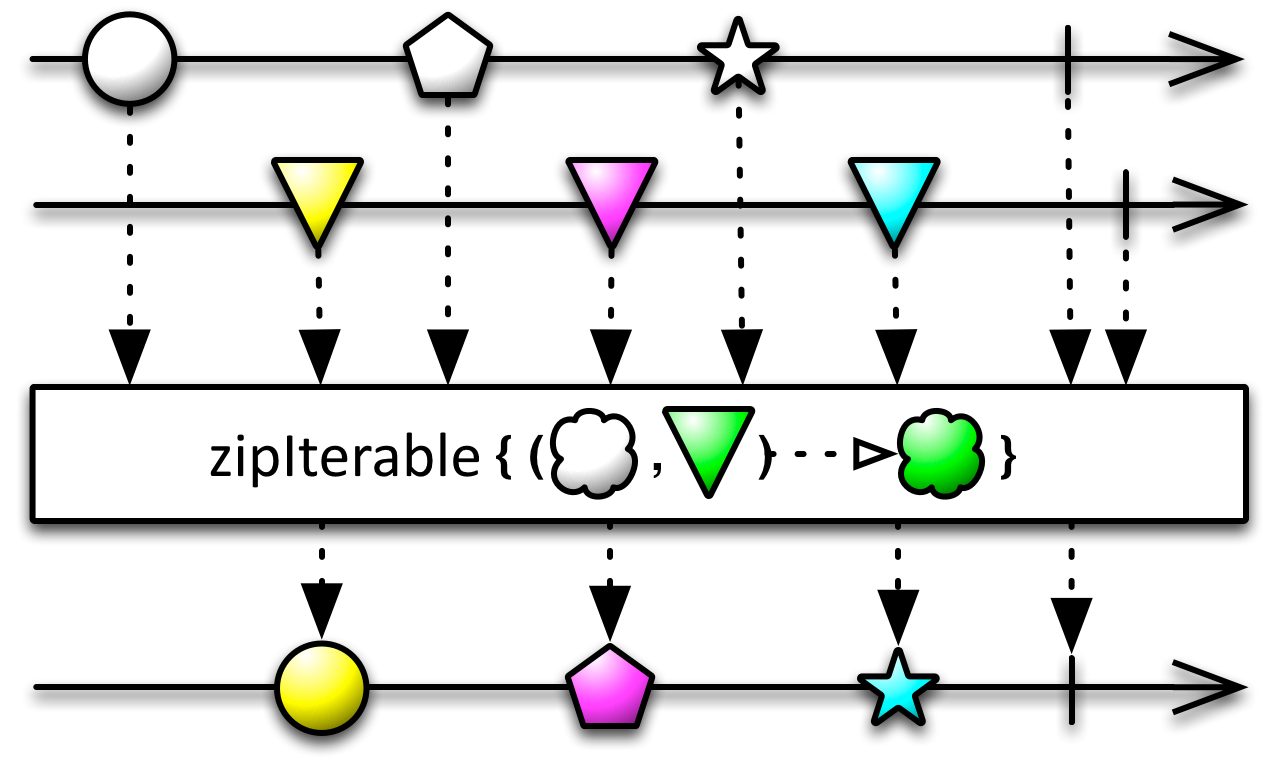
- Scheduler:
zipIterabledoes not operate by default on a particularScheduler.
- Type Parameters:
T- the common source value typeR- the zipped result type- Parameters:
sources- an Iterable of source ObservableSourceszipper- a function that, when applied to an item emitted by each of the source ObservableSources, results in an item that will be emitted by the resulting ObservableSourcedelayError- delay errors signalled by any of the source ObservableSource until all ObservableSources terminatebufferSize- the number of elements to prefetch from each source ObservableSource- Returns:
- an Observable that emits the zipped results
- See Also:
- ReactiveX operators documentation: Zip
-
all
@CheckReturnValue @SchedulerSupport(value="none") public final Single<Boolean> all(Predicate<? super T> predicate)
Returns a Single that emits a Boolean that indicates whether all of the items emitted by the source ObservableSource satisfy a condition.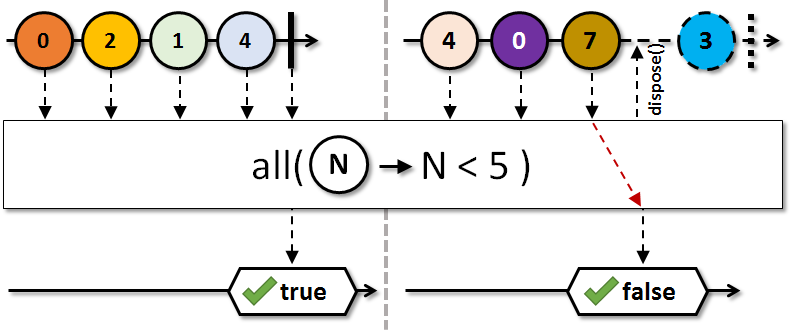
- Scheduler:
alldoes not operate by default on a particularScheduler.
- Parameters:
predicate- a function that evaluates an item and returns a Boolean- Returns:
- a Single that emits
trueif all items emitted by the source ObservableSource satisfy the predicate; otherwise,false - See Also:
- ReactiveX operators documentation: All
-
ambWith
@CheckReturnValue @SchedulerSupport(value="none") public final Observable<T> ambWith(ObservableSource<? extends T> other)
Mirrors the ObservableSource (current or provided) that first either emits an item or sends a termination notification.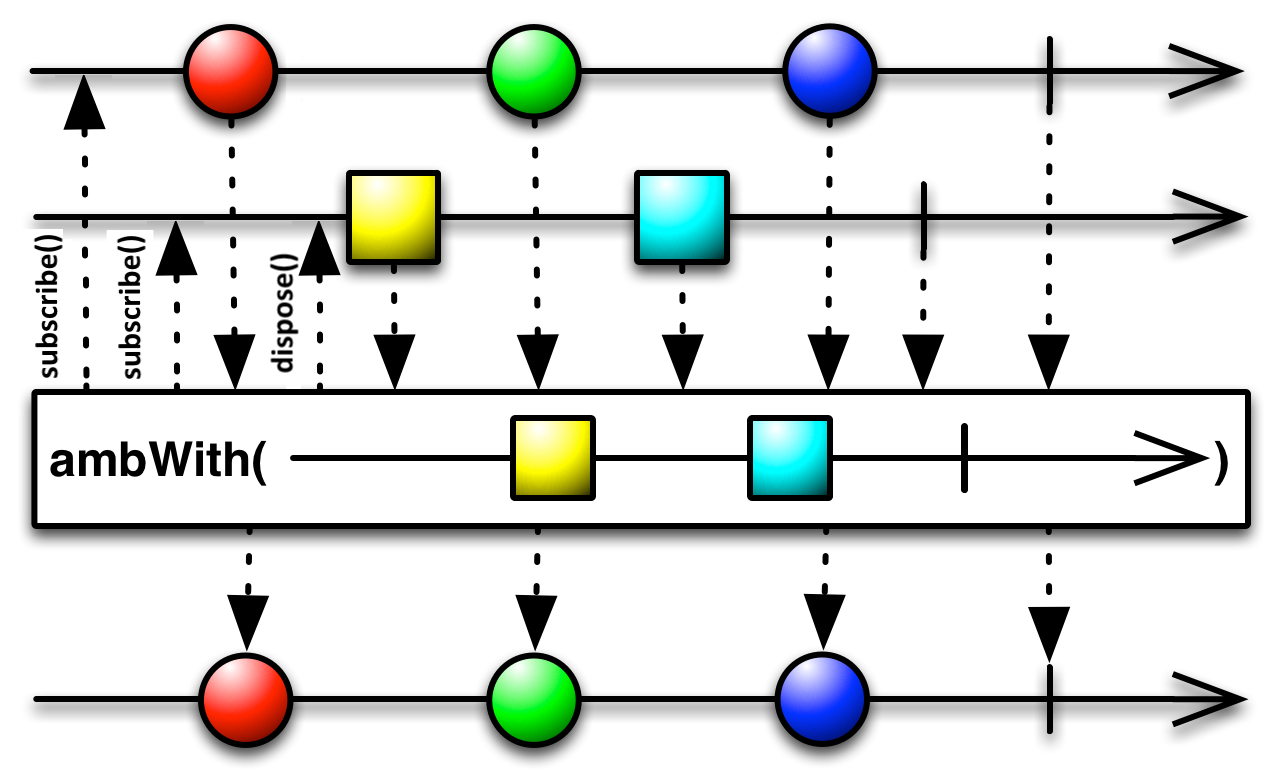
- Scheduler:
ambWithdoes not operate by default on a particularScheduler.
- Parameters:
other- an ObservableSource competing to react first. A subscription to this provided source will occur after subscribing to the current source.- Returns:
- an Observable that emits the same sequence as whichever of the source ObservableSources first emitted an item or sent a termination notification
- See Also:
- ReactiveX operators documentation: Amb
-
any
@CheckReturnValue @SchedulerSupport(value="none") public final Single<Boolean> any(Predicate<? super T> predicate)
Returns a Single that emitstrueif any item emitted by the source ObservableSource satisfies a specified condition, otherwisefalse. Note: this always emitsfalseif the source ObservableSource is empty.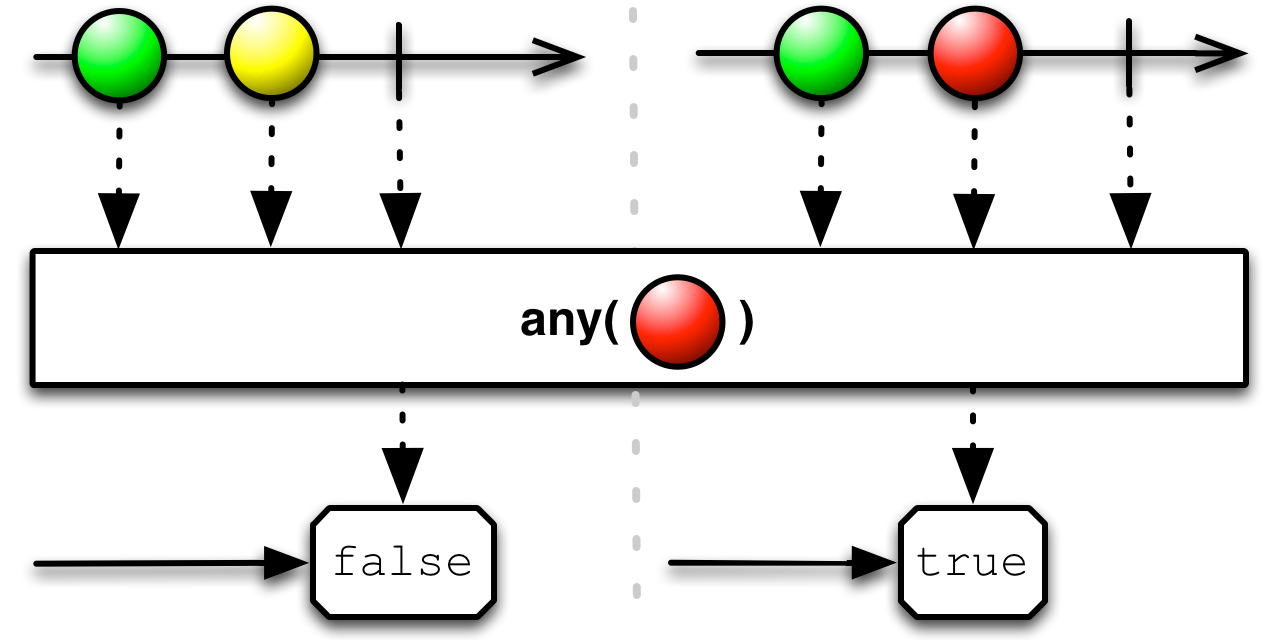
In Rx.Net this is the
anyObserver but we renamed it in RxJava to better match Java naming idioms.- Scheduler:
anydoes not operate by default on a particularScheduler.
- Parameters:
predicate- the condition to test items emitted by the source ObservableSource- Returns:
- a Single that emits a Boolean that indicates whether any item emitted by the source
ObservableSource satisfies the
predicate - See Also:
- ReactiveX operators documentation: Contains
-
as
@CheckReturnValue @SchedulerSupport(value="none") public final <R> R as(@NonNull ObservableConverter<T,? extends R> converter)
Calls the specified converter function during assembly time and returns its resulting value.This allows fluent conversion to any other type.
- Scheduler:
asdoes not operate by default on a particularScheduler.
History: 2.1.7 - experimental
- Type Parameters:
R- the resulting object type- Parameters:
converter- the function that receives the current Observable instance and returns a value- Returns:
- the converted value
- Throws:
NullPointerException- if converter is null- Since:
- 2.2
-
blockingFirst
@CheckReturnValue @SchedulerSupport(value="none") public final T blockingFirst()
Returns the first item emitted by thisObservable, or throwsNoSuchElementExceptionif it emits no items.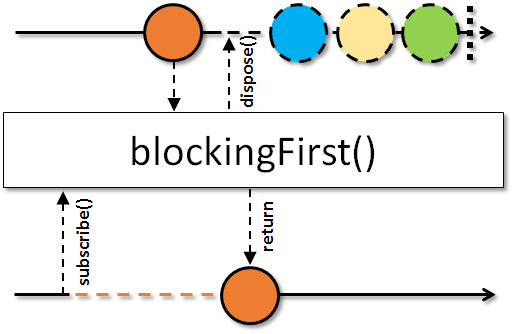
- Scheduler:
blockingFirstdoes not operate by default on a particularScheduler.
- Returns:
- the first item emitted by this
Observable - Throws:
NoSuchElementException- if thisObservableemits no items- See Also:
- ReactiveX documentation: First
-
blockingFirst
@CheckReturnValue @SchedulerSupport(value="none") public final T blockingFirst(T defaultItem)
Returns the first item emitted by thisObservable, or a default value if it emits no items.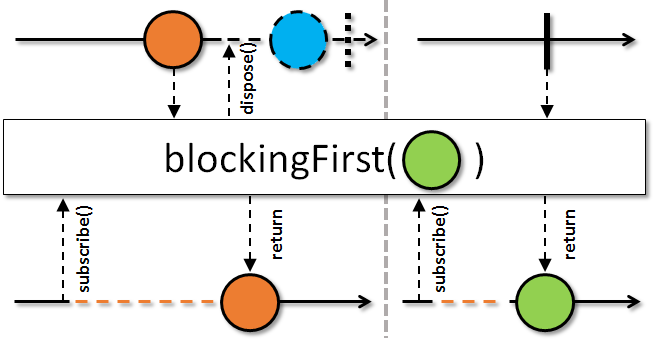
- Scheduler:
blockingFirstdoes not operate by default on a particularScheduler.
- Parameters:
defaultItem- a default value to return if thisObservableemits no items- Returns:
- the first item emitted by this
Observable, or the default value if it emits no items - See Also:
- ReactiveX documentation: First
-
blockingForEach
@SchedulerSupport(value="none") public final void blockingForEach(Consumer<? super T> onNext)
Consumes the upstreamObservablein a blocking fashion and invokes the givenConsumerwith each upstream item on the current thread until the upstream terminates.
Note: the method will only return if the upstream terminates or the current thread is interrupted.
This method executes the
Consumeron the current thread whilesubscribe(Consumer)executes the consumer on the original caller thread of the sequence.- Scheduler:
blockingForEachdoes not operate by default on a particularScheduler.- Error handling:
- If the source signals an error, the operator wraps a checked
ExceptionintoRuntimeExceptionand throws that. Otherwise,RuntimeExceptions andErrors are rethrown as they are.
- Parameters:
onNext- theConsumerto invoke for each item emitted by theObservable- Throws:
RuntimeException- if an error occurs- See Also:
- ReactiveX documentation: Subscribe,
subscribe(Consumer)
-
blockingIterable
@CheckReturnValue @SchedulerSupport(value="none") public final Iterable<T> blockingIterable()
Converts thisObservableinto anIterable.
- Scheduler:
blockingIterabledoes not operate by default on a particularScheduler.
- Returns:
- an
Iterableversion of thisObservable - See Also:
- ReactiveX documentation: To
-
blockingIterable
@CheckReturnValue @SchedulerSupport(value="none") public final Iterable<T> blockingIterable(int bufferSize)
Converts thisObservableinto anIterable.
- Scheduler:
blockingIterabledoes not operate by default on a particularScheduler.
- Parameters:
bufferSize- the number of items to prefetch from the current Observable- Returns:
- an
Iterableversion of thisObservable - See Also:
- ReactiveX documentation: To
-
blockingLast
@CheckReturnValue @SchedulerSupport(value="none") public final T blockingLast()
Returns the last item emitted by thisObservable, or throwsNoSuchElementExceptionif thisObservableemits no items.
- Scheduler:
blockingLastdoes not operate by default on a particularScheduler.- Error handling:
- If the source signals an error, the operator wraps a checked
ExceptionintoRuntimeExceptionand throws that. Otherwise,RuntimeExceptions andErrors are rethrown as they are.
- Returns:
- the last item emitted by this
Observable - Throws:
NoSuchElementException- if thisObservableemits no items- See Also:
- ReactiveX documentation: Last
-
blockingLast
@CheckReturnValue @SchedulerSupport(value="none") public final T blockingLast(T defaultItem)
Returns the last item emitted by thisObservable, or a default value if it emits no items.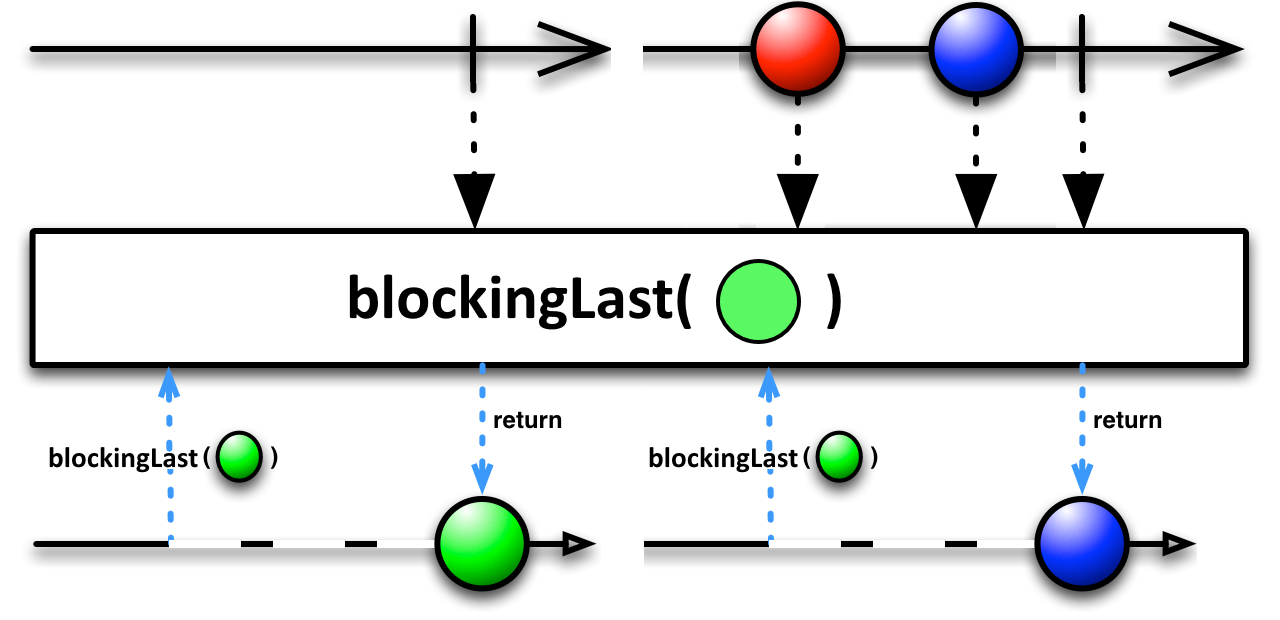
- Scheduler:
blockingLastdoes not operate by default on a particularScheduler.- Error handling:
- If the source signals an error, the operator wraps a checked
ExceptionintoRuntimeExceptionand throws that. Otherwise,RuntimeExceptions andErrors are rethrown as they are.
- Parameters:
defaultItem- a default value to return if thisObservableemits no items- Returns:
- the last item emitted by the
Observable, or the default value if it emits no items - See Also:
- ReactiveX documentation: Last
-
blockingLatest
@CheckReturnValue @SchedulerSupport(value="none") public final Iterable<T> blockingLatest()
Returns anIterablethat returns the latest item emitted by thisObservable, waiting if necessary for one to become available.
If this
Observableproduces items faster thanIterator.nexttakes them,onNextevents might be skipped, butonErrororonCompleteevents are not.Note also that an
onNextdirectly followed byonCompletemight hide theonNextevent.- Scheduler:
blockingLatestdoes not operate by default on a particularScheduler.
- Returns:
- an Iterable that always returns the latest item emitted by this
Observable - See Also:
- ReactiveX documentation: First
-
blockingMostRecent
@CheckReturnValue @SchedulerSupport(value="none") public final Iterable<T> blockingMostRecent(T initialValue)
Returns anIterablethat always returns the item most recently emitted by thisObservable.
- Scheduler:
blockingMostRecentdoes not operate by default on a particularScheduler.
- Parameters:
initialValue- the initial value that theIterablesequence will yield if thisObservablehas not yet emitted an item- Returns:
- an
Iterablethat on each iteration returns the item that thisObservablehas most recently emitted - See Also:
- ReactiveX documentation: First
-
blockingNext
@CheckReturnValue @SchedulerSupport(value="none") public final Iterable<T> blockingNext()
Returns anIterablethat blocks until thisObservableemits another item, then returns that item.
- Scheduler:
blockingNextdoes not operate by default on a particularScheduler.
- Returns:
- an
Iterablethat blocks upon each iteration until thisObservableemits a new item, whereupon the Iterable returns that item - See Also:
- ReactiveX documentation: TakeLast
-
blockingSingle
@CheckReturnValue @SchedulerSupport(value="none") public final T blockingSingle()
If thisObservablecompletes after emitting a single item, return that item, otherwise throw aNoSuchElementException.
- Scheduler:
blockingSingledoes not operate by default on a particularScheduler.- Error handling:
- If the source signals an error, the operator wraps a checked
ExceptionintoRuntimeExceptionand throws that. Otherwise,RuntimeExceptions andErrors are rethrown as they are.
- Returns:
- the single item emitted by this
Observable - See Also:
- ReactiveX documentation: First
-
blockingSingle
@CheckReturnValue @SchedulerSupport(value="none") public final T blockingSingle(T defaultItem)
If thisObservablecompletes after emitting a single item, return that item; if it emits more than one item, throw anIllegalArgumentException; if it emits no items, return a default value.
- Scheduler:
blockingSingledoes not operate by default on a particularScheduler.- Error handling:
- If the source signals an error, the operator wraps a checked
ExceptionintoRuntimeExceptionand throws that. Otherwise,RuntimeExceptions andErrors are rethrown as they are.
- Parameters:
defaultItem- a default value to return if thisObservableemits no items- Returns:
- the single item emitted by this
Observable, or the default value if it emits no items - See Also:
- ReactiveX documentation: First
-
toFuture
@CheckReturnValue @SchedulerSupport(value="none") public final Future<T> toFuture()
Returns aFuturerepresenting the only value emitted by thisObservable.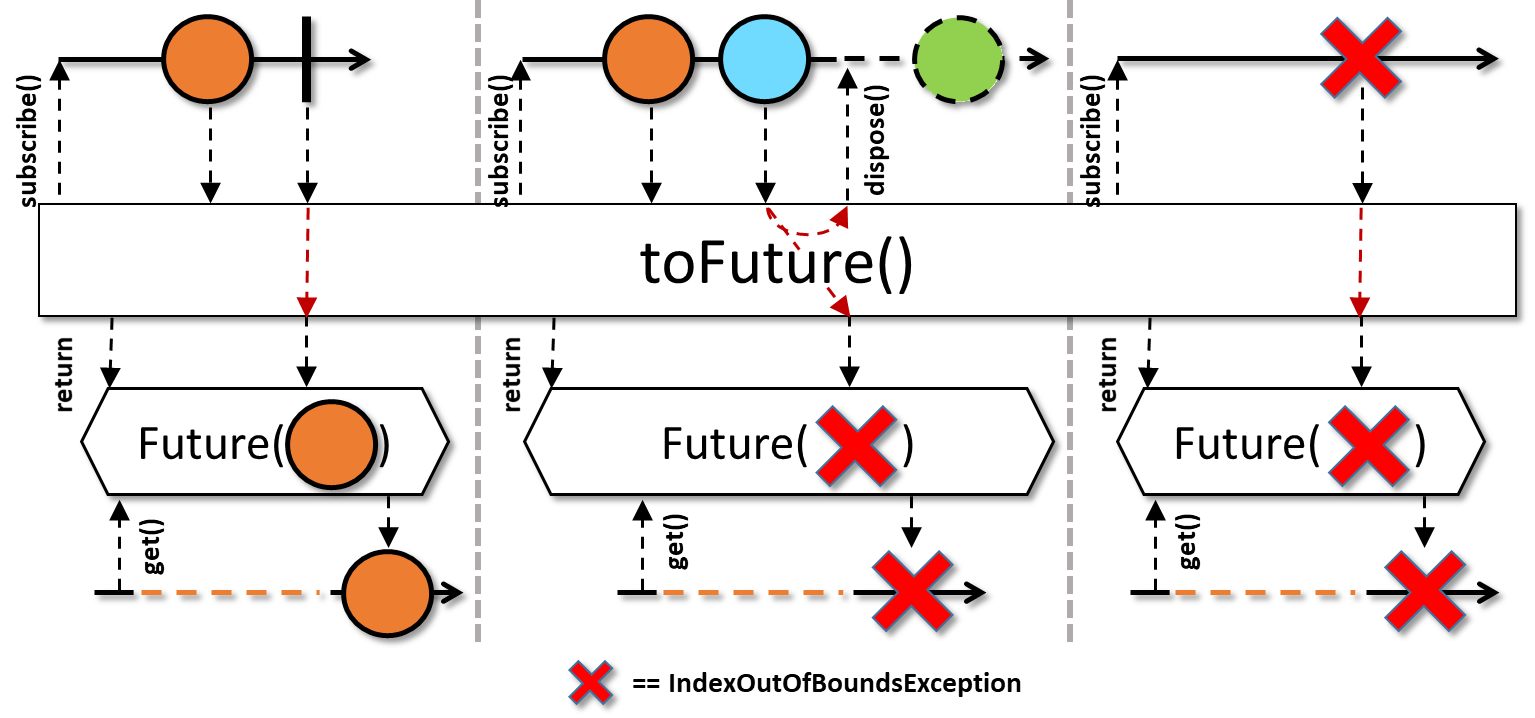
If the
Observableemits more than one item,Futurewill receive anIndexOutOfBoundsException. If theObservableis empty,Futurewill receive anNoSuchElementException. TheObservablesource has to terminate in order for the returnedFutureto terminate as well.If the
Observablemay emit more than one item, useObservable.toList().toFuture().- Scheduler:
toFuturedoes not operate by default on a particularScheduler.
- Returns:
- a
Futurethat expects a single item to be emitted by thisObservable - See Also:
- ReactiveX documentation: To
-
blockingSubscribe
@SchedulerSupport(value="none") public final void blockingSubscribe()
Runs the source observable to a terminal event, ignoring any values and rethrowing any exception.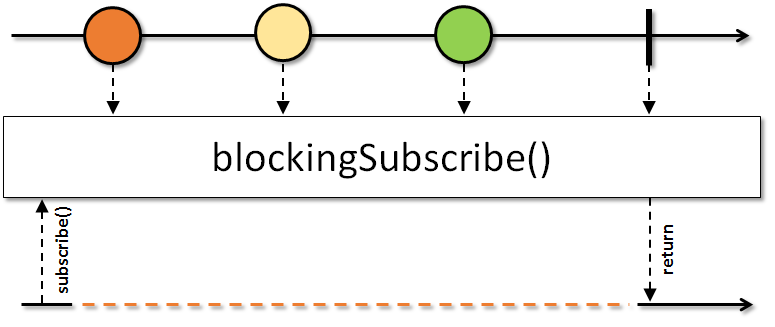
Note that calling this method will block the caller thread until the upstream terminates normally or with an error. Therefore, calling this method from special threads such as the Android Main Thread or the Swing Event Dispatch Thread is not recommended.
- Scheduler:
blockingSubscribedoes not operate by default on a particularScheduler.
-
blockingSubscribe
@SchedulerSupport(value="none") public final void blockingSubscribe(Consumer<? super T> onNext)
Subscribes to the source and calls the given callbacks on the current thread.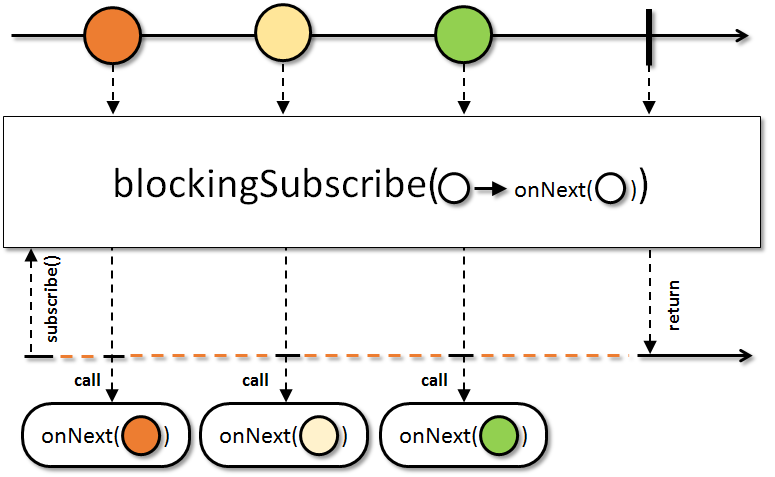
If the
Observableemits an error, it is wrapped into anOnErrorNotImplementedExceptionand routed to the RxJavaPlugins.onError handler. Using the overloadsblockingSubscribe(Consumer, Consumer)orblockingSubscribe(Consumer, Consumer, Action)instead is recommended.Note that calling this method will block the caller thread until the upstream terminates normally or with an error. Therefore, calling this method from special threads such as the Android Main Thread or the Swing Event Dispatch Thread is not recommended.
- Scheduler:
blockingSubscribedoes not operate by default on a particularScheduler.
- Parameters:
onNext- the callback action for each source value- Since:
- 2.0
- See Also:
blockingSubscribe(Consumer, Consumer),blockingSubscribe(Consumer, Consumer, Action)
-
blockingSubscribe
@SchedulerSupport(value="none") public final void blockingSubscribe(Consumer<? super T> onNext, Consumer<? super Throwable> onError)
Subscribes to the source and calls the given callbacks on the current thread.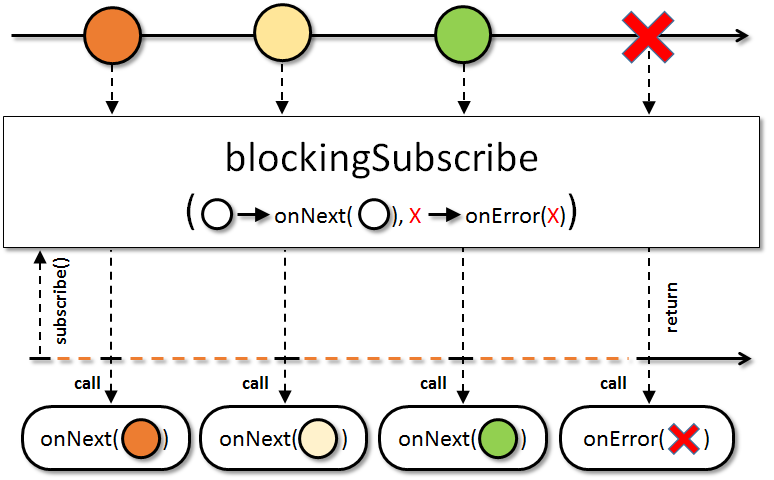
Note that calling this method will block the caller thread until the upstream terminates normally or with an error. Therefore, calling this method from special threads such as the Android Main Thread or the Swing Event Dispatch Thread is not recommended.
- Scheduler:
blockingSubscribedoes not operate by default on a particularScheduler.
- Parameters:
onNext- the callback action for each source valueonError- the callback action for an error event- Since:
- 2.0
- See Also:
blockingSubscribe(Consumer, Consumer, Action)
-
blockingSubscribe
@SchedulerSupport(value="none") public final void blockingSubscribe(Consumer<? super T> onNext, Consumer<? super Throwable> onError, Action onComplete)
Subscribes to the source and calls the given callbacks on the current thread.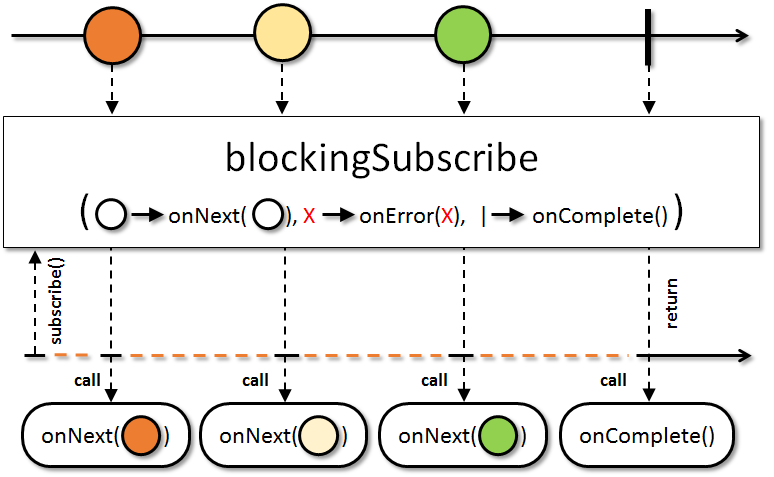
Note that calling this method will block the caller thread until the upstream terminates normally or with an error. Therefore, calling this method from special threads such as the Android Main Thread or the Swing Event Dispatch Thread is not recommended.
- Scheduler:
blockingSubscribedoes not operate by default on a particularScheduler.
- Parameters:
onNext- the callback action for each source valueonError- the callback action for an error eventonComplete- the callback action for the completion event.- Since:
- 2.0
-
blockingSubscribe
@SchedulerSupport(value="none") public final void blockingSubscribe(Observer<? super T> observer)
Subscribes to the source and calls theObservermethods on the current thread.Note that calling this method will block the caller thread until the upstream terminates normally, with an error or the
Observerdisposes theDisposableit receives viaObserver.onSubscribe(Disposable). Therefore, calling this method from special threads such as the Android Main Thread or the Swing Event Dispatch Thread is not recommended.- Scheduler:
blockingSubscribedoes not operate by default on a particularScheduler.
- Parameters:
observer- theObserverinstance to forward events and calls to in the current thread- Since:
- 2.0
-
buffer
@CheckReturnValue @SchedulerSupport(value="none") public final Observable<List<T>> buffer(int count)
Returns an Observable that emits buffers of items it collects from the source ObservableSource. The resulting ObservableSource emits connected, non-overlapping buffers, each containingcountitems. When the source ObservableSource completes, the resulting ObservableSource emits the current buffer and propagates the notification from the source ObservableSource. Note that if the source ObservableSource issues an onError notification the event is passed on immediately without first emitting the buffer it is in the process of assembling.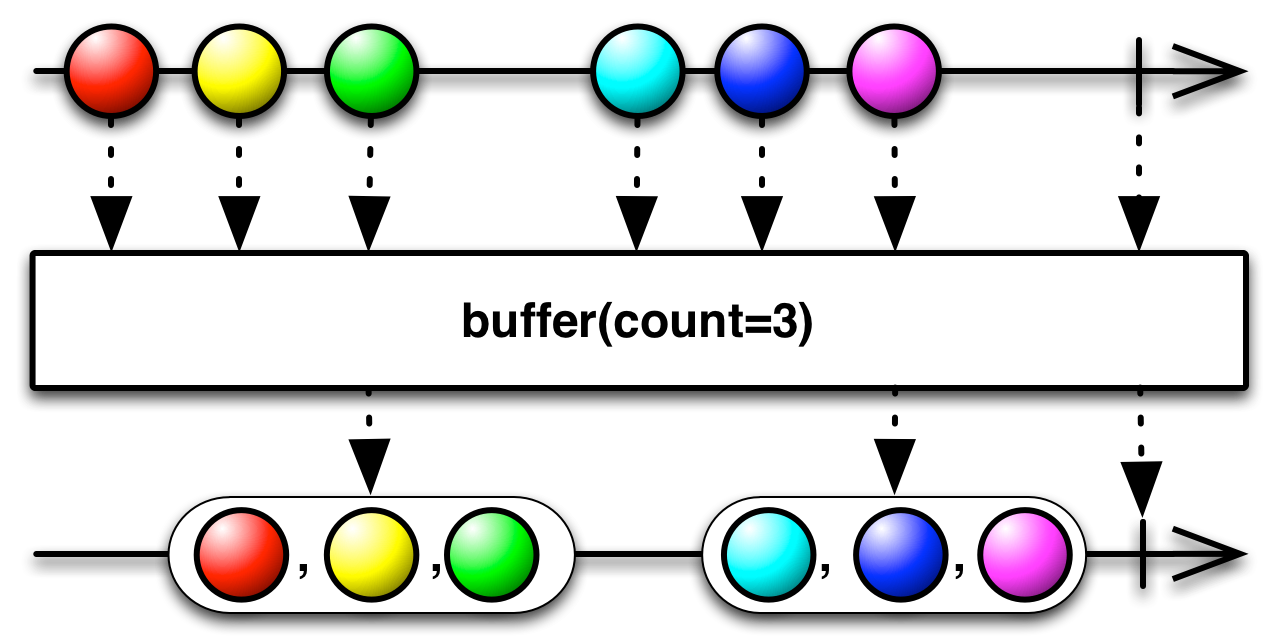
- Scheduler:
- This version of
bufferdoes not operate by default on a particularScheduler.
- Parameters:
count- the maximum number of items in each buffer before it should be emitted- Returns:
- an Observable that emits connected, non-overlapping buffers, each containing at most
countitems from the source ObservableSource - See Also:
- ReactiveX operators documentation: Buffer
-
buffer
@CheckReturnValue @SchedulerSupport(value="none") public final Observable<List<T>> buffer(int count, int skip)
Returns an Observable that emits buffers of items it collects from the source ObservableSource. The resulting ObservableSource emits buffers everyskipitems, each containingcountitems. When the source ObservableSource completes, the resulting ObservableSource emits the current buffer and propagates the notification from the source ObservableSource. Note that if the source ObservableSource issues an onError notification the event is passed on immediately without first emitting the buffer it is in the process of assembling.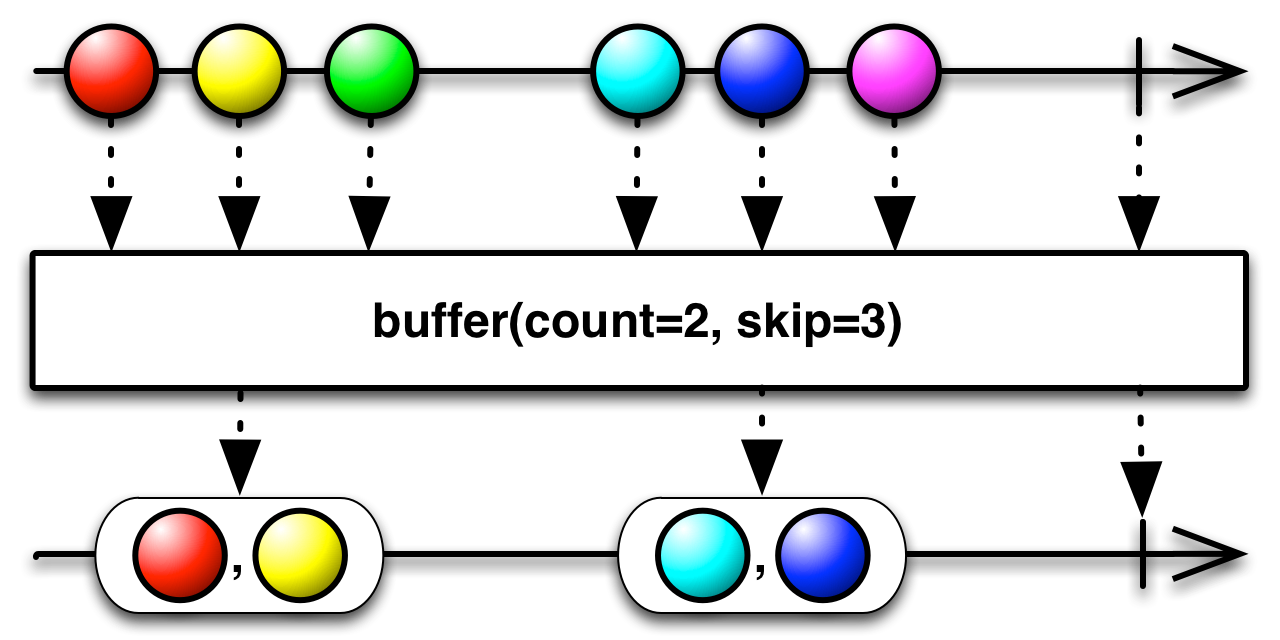
- Scheduler:
- This version of
bufferdoes not operate by default on a particularScheduler.
- Parameters:
count- the maximum size of each buffer before it should be emittedskip- how many items emitted by the source ObservableSource should be skipped before starting a new buffer. Note that whenskipandcountare equal, this is the same operation asbuffer(int).- Returns:
- an Observable that emits buffers for every
skipitem from the source ObservableSource and containing at mostcountitems - See Also:
- ReactiveX operators documentation: Buffer
-
buffer
@CheckReturnValue @SchedulerSupport(value="none") public final <U extends Collection<? super T>> Observable<U> buffer(int count, int skip, Callable<U> bufferSupplier)
Returns an Observable that emits buffers of items it collects from the source ObservableSource. The resulting ObservableSource emits buffers everyskipitems, each containingcountitems. When the source ObservableSource completes, the resulting ObservableSource emits the current buffer and propagates the notification from the source ObservableSource. Note that if the source ObservableSource issues an onError notification the event is passed on immediately without first emitting the buffer it is in the process of assembling.
- Scheduler:
- This version of
bufferdoes not operate by default on a particularScheduler.
- Type Parameters:
U- the collection subclass type to buffer into- Parameters:
count- the maximum size of each buffer before it should be emittedskip- how many items emitted by the source ObservableSource should be skipped before starting a new buffer. Note that whenskipandcountare equal, this is the same operation asbuffer(int).bufferSupplier- a factory function that returns an instance of the collection subclass to be used and returned as the buffer- Returns:
- an Observable that emits buffers for every
skipitem from the source ObservableSource and containing at mostcountitems - See Also:
- ReactiveX operators documentation: Buffer
-
buffer
@CheckReturnValue @SchedulerSupport(value="none") public final <U extends Collection<? super T>> Observable<U> buffer(int count, Callable<U> bufferSupplier)
Returns an Observable that emits buffers of items it collects from the source ObservableSource. The resulting ObservableSource emits connected, non-overlapping buffers, each containingcountitems. When the source ObservableSource completes, the resulting ObservableSource emits the current buffer and propagates the notification from the source ObservableSource. Note that if the source ObservableSource issues an onError notification the event is passed on immediately without first emitting the buffer it is in the process of assembling.
- Scheduler:
- This version of
bufferdoes not operate by default on a particularScheduler.
- Type Parameters:
U- the collection subclass type to buffer into- Parameters:
count- the maximum number of items in each buffer before it should be emittedbufferSupplier- a factory function that returns an instance of the collection subclass to be used and returned as the buffer- Returns:
- an Observable that emits connected, non-overlapping buffers, each containing at most
countitems from the source ObservableSource - See Also:
- ReactiveX operators documentation: Buffer
-
buffer
@CheckReturnValue @SchedulerSupport(value="io.reactivex:computation") public final Observable<List<T>> buffer(long timespan, long timeskip, TimeUnit unit)
Returns an Observable that emits buffers of items it collects from the source ObservableSource. The resulting ObservableSource starts a new buffer periodically, as determined by thetimeskipargument. It emits each buffer after a fixed timespan, specified by thetimespanargument. When the source ObservableSource completes, the resulting ObservableSource emits the current buffer and propagates the notification from the source ObservableSource. Note that if the source ObservableSource issues an onError notification the event is passed on immediately without first emitting the buffer it is in the process of assembling.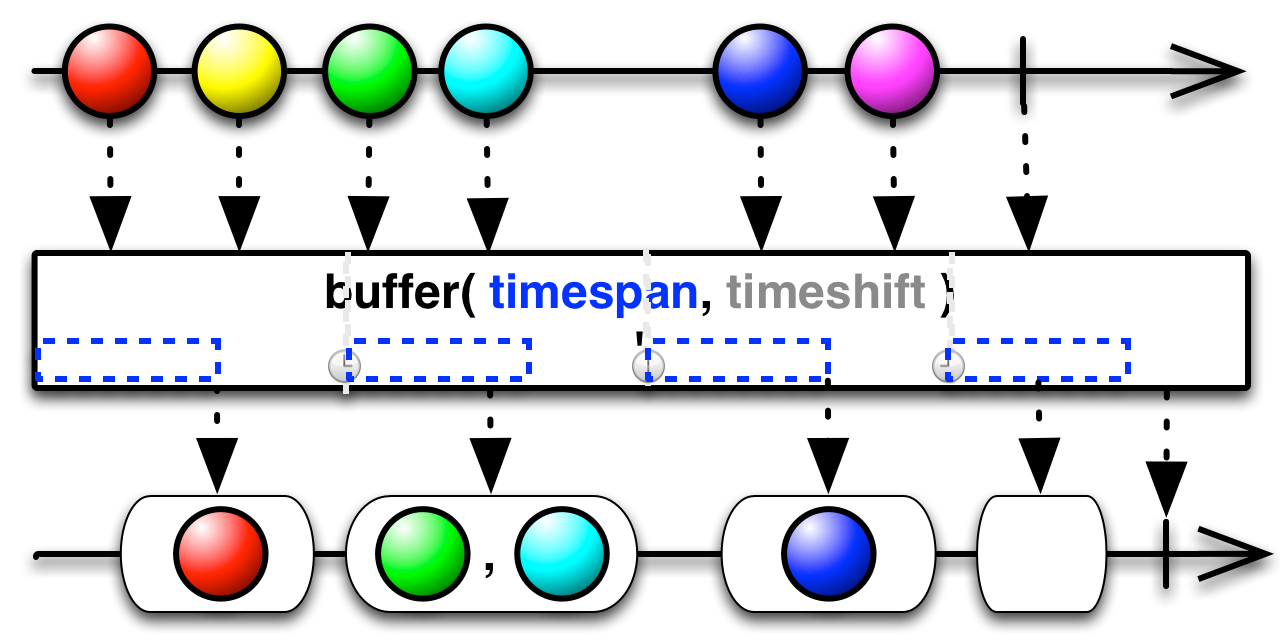
- Scheduler:
- This version of
bufferoperates by default on thecomputationScheduler.
- Parameters:
timespan- the period of time each buffer collects items before it is emittedtimeskip- the period of time after which a new buffer will be createdunit- the unit of time that applies to thetimespanandtimeskiparguments- Returns:
- an Observable that emits new buffers of items emitted by the source ObservableSource periodically after a fixed timespan has elapsed
- See Also:
- ReactiveX operators documentation: Buffer
-
buffer
@CheckReturnValue @SchedulerSupport(value="custom") public final Observable<List<T>> buffer(long timespan, long timeskip, TimeUnit unit, Scheduler scheduler)
Returns an Observable that emits buffers of items it collects from the source ObservableSource. The resulting ObservableSource starts a new buffer periodically, as determined by thetimeskipargument, and on the specifiedscheduler. It emits each buffer after a fixed timespan, specified by thetimespanargument. When the source ObservableSource completes, the resulting ObservableSource emits the current buffer and propagates the notification from the source ObservableSource. Note that if the source ObservableSource issues an onError notification the event is passed on immediately without first emitting the buffer it is in the process of assembling.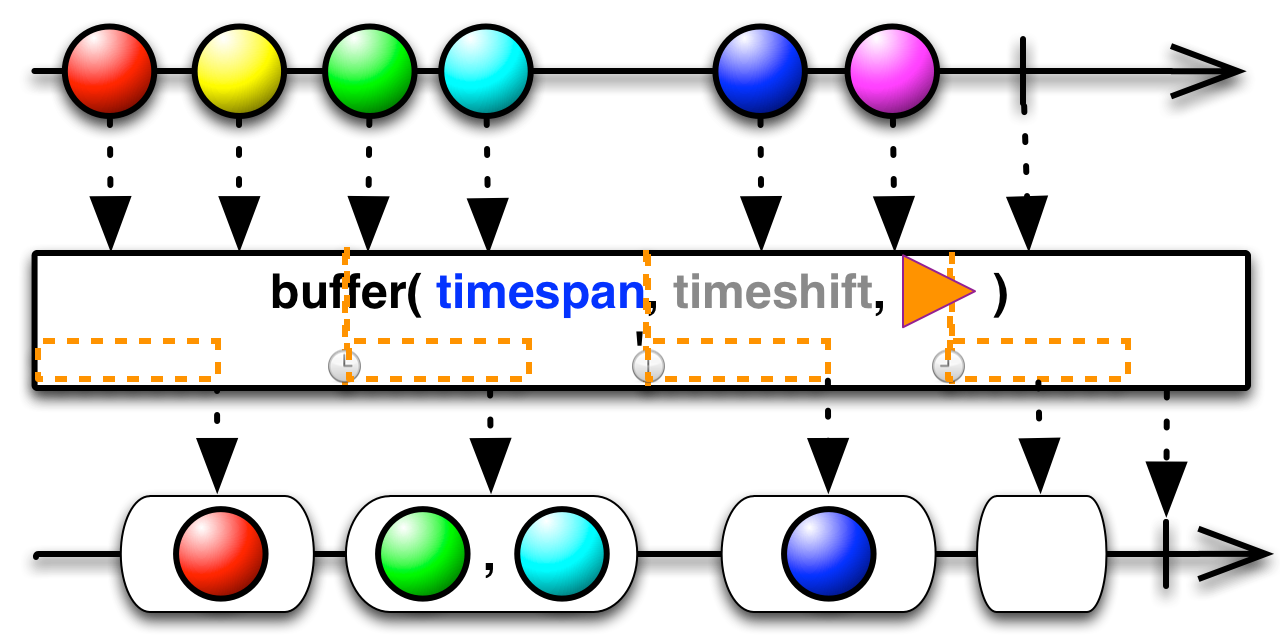
- Scheduler:
- You specify which
Schedulerthis operator will use.
- Parameters:
timespan- the period of time each buffer collects items before it is emittedtimeskip- the period of time after which a new buffer will be createdunit- the unit of time that applies to thetimespanandtimeskipargumentsscheduler- theSchedulerto use when determining the end and start of a buffer- Returns:
- an Observable that emits new buffers of items emitted by the source ObservableSource periodically after a fixed timespan has elapsed
- See Also:
- ReactiveX operators documentation: Buffer
-
buffer
@CheckReturnValue @SchedulerSupport(value="custom") public final <U extends Collection<? super T>> Observable<U> buffer(long timespan, long timeskip, TimeUnit unit, Scheduler scheduler, Callable<U> bufferSupplier)
Returns an Observable that emits buffers of items it collects from the source ObservableSource. The resulting ObservableSource starts a new buffer periodically, as determined by thetimeskipargument, and on the specifiedscheduler. It emits each buffer after a fixed timespan, specified by thetimespanargument. When the source ObservableSource completes, the resulting ObservableSource emits the current buffer and propagates the notification from the source ObservableSource. Note that if the source ObservableSource issues an onError notification the event is passed on immediately without first emitting the buffer it is in the process of assembling.
- Scheduler:
- You specify which
Schedulerthis operator will use.
- Type Parameters:
U- the collection subclass type to buffer into- Parameters:
timespan- the period of time each buffer collects items before it is emittedtimeskip- the period of time after which a new buffer will be createdunit- the unit of time that applies to thetimespanandtimeskipargumentsscheduler- theSchedulerto use when determining the end and start of a bufferbufferSupplier- a factory function that returns an instance of the collection subclass to be used and returned as the buffer- Returns:
- an Observable that emits new buffers of items emitted by the source ObservableSource periodically after a fixed timespan has elapsed
- See Also:
- ReactiveX operators documentation: Buffer
-
buffer
@CheckReturnValue @SchedulerSupport(value="io.reactivex:computation") public final Observable<List<T>> buffer(long timespan, TimeUnit unit)
Returns an Observable that emits buffers of items it collects from the source ObservableSource. The resulting ObservableSource emits connected, non-overlapping buffers, each of a fixed duration specified by thetimespanargument. When the source ObservableSource completes, the resulting ObservableSource emits the current buffer and propagates the notification from the source ObservableSource. Note that if the source ObservableSource issues an onError notification the event is passed on immediately without first emitting the buffer it is in the process of assembling.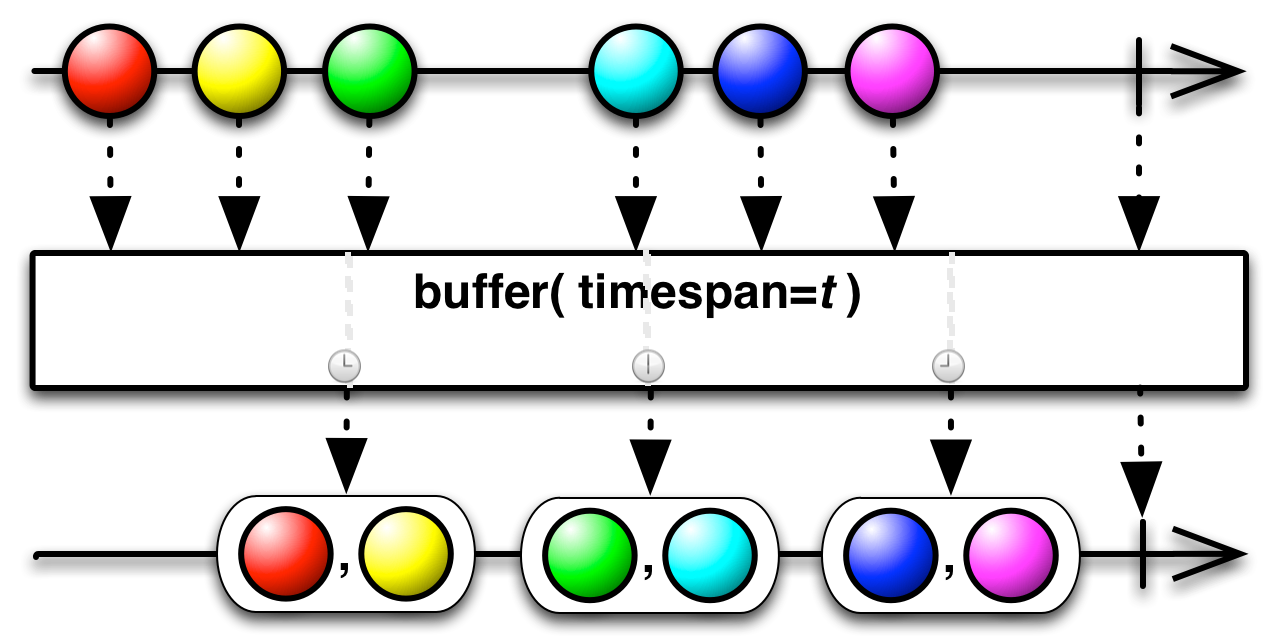
- Scheduler:
- This version of
bufferoperates by default on thecomputationScheduler.
- Parameters:
timespan- the period of time each buffer collects items before it is emitted and replaced with a new bufferunit- the unit of time that applies to thetimespanargument- Returns:
- an Observable that emits connected, non-overlapping buffers of items emitted by the source ObservableSource within a fixed duration
- See Also:
- ReactiveX operators documentation: Buffer
-
buffer
@CheckReturnValue @SchedulerSupport(value="io.reactivex:computation") public final Observable<List<T>> buffer(long timespan, TimeUnit unit, int count)
Returns an Observable that emits buffers of items it collects from the source ObservableSource. The resulting ObservableSource emits connected, non-overlapping buffers, each of a fixed duration specified by thetimespanargument or a maximum size specified by thecountargument (whichever is reached first). When the source ObservableSource completes, the resulting ObservableSource emits the current buffer and propagates the notification from the source ObservableSource. Note that if the source ObservableSource issues an onError notification the event is passed on immediately without first emitting the buffer it is in the process of assembling.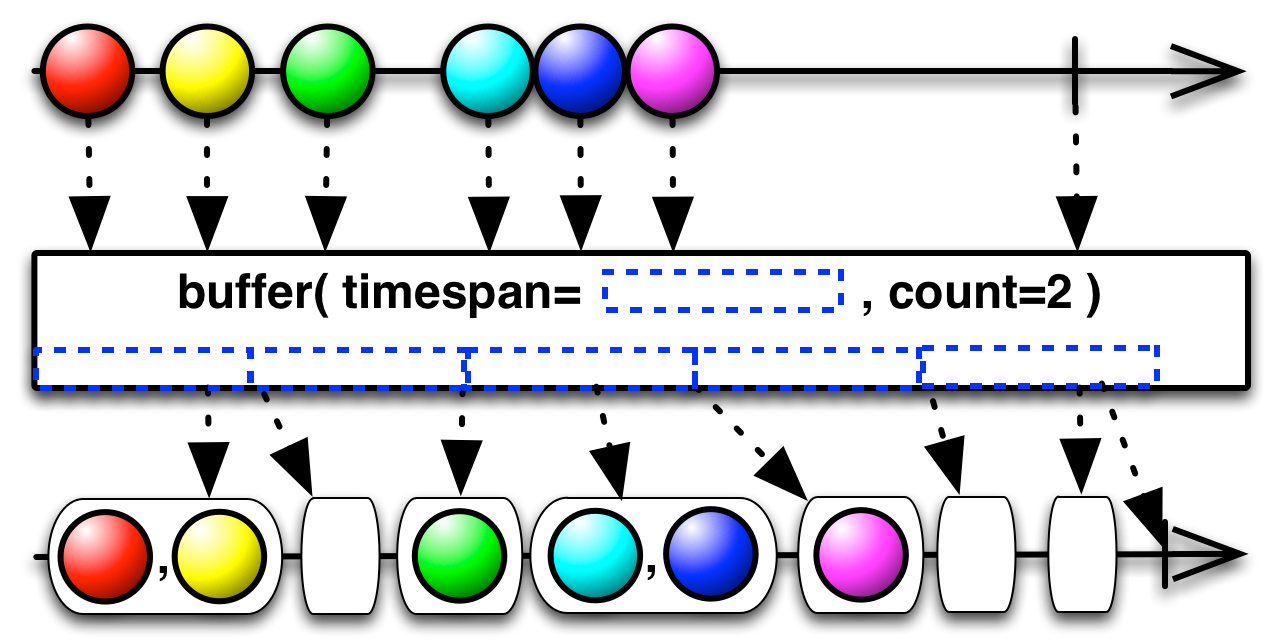
- Scheduler:
- This version of
bufferoperates by default on thecomputationScheduler.
- Parameters:
timespan- the period of time each buffer collects items before it is emitted and replaced with a new bufferunit- the unit of time which applies to thetimespanargumentcount- the maximum size of each buffer before it is emitted- Returns:
- an Observable that emits connected, non-overlapping buffers of items emitted by the source ObservableSource, after a fixed duration or when the buffer reaches maximum capacity (whichever occurs first)
- See Also:
- ReactiveX operators documentation: Buffer
-
buffer
@CheckReturnValue @SchedulerSupport(value="custom") public final Observable<List<T>> buffer(long timespan, TimeUnit unit, Scheduler scheduler, int count)
Returns an Observable that emits buffers of items it collects from the source ObservableSource. The resulting ObservableSource emits connected, non-overlapping buffers, each of a fixed duration specified by thetimespanargument as measured on the specifiedscheduler, or a maximum size specified by thecountargument (whichever is reached first). When the source ObservableSource completes, the resulting ObservableSource emits the current buffer and propagates the notification from the source ObservableSource. Note that if the source ObservableSource issues an onError notification the event is passed on immediately without first emitting the buffer it is in the process of assembling.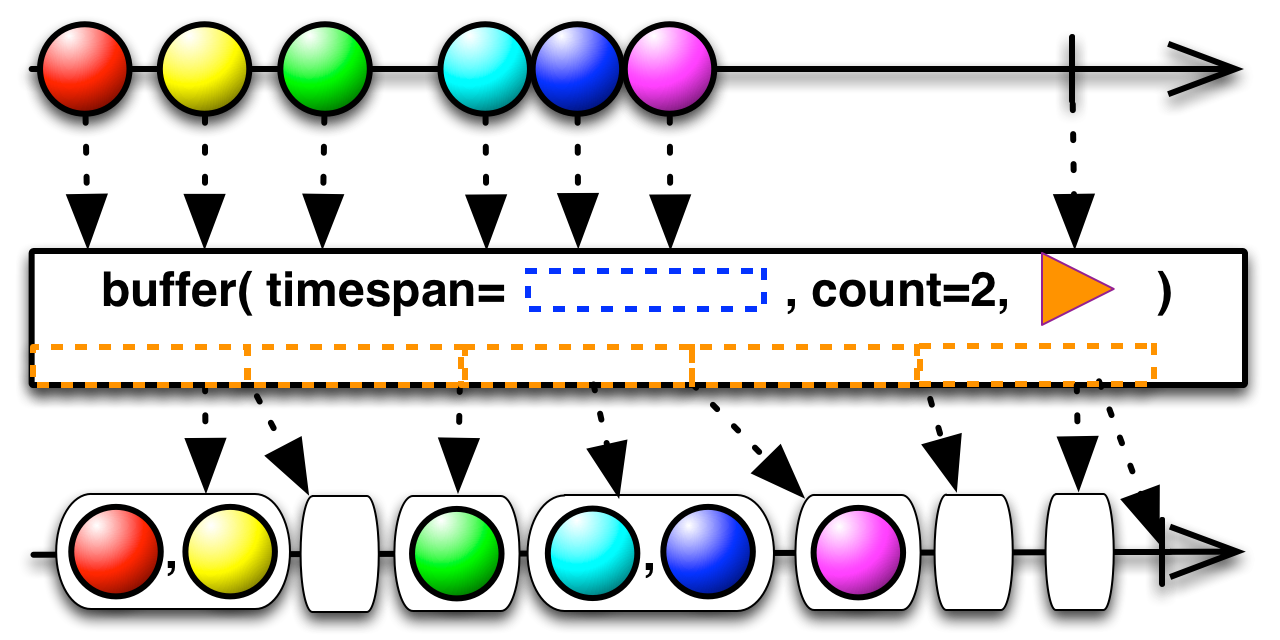
- Scheduler:
- You specify which
Schedulerthis operator will use.
- Parameters:
timespan- the period of time each buffer collects items before it is emitted and replaced with a new bufferunit- the unit of time which applies to thetimespanargumentscheduler- theSchedulerto use when determining the end and start of a buffercount- the maximum size of each buffer before it is emitted- Returns:
- an Observable that emits connected, non-overlapping buffers of items emitted by the source ObservableSource after a fixed duration or when the buffer reaches maximum capacity (whichever occurs first)
- See Also:
- ReactiveX operators documentation: Buffer
-
buffer
@CheckReturnValue @SchedulerSupport(value="custom") public final <U extends Collection<? super T>> Observable<U> buffer(long timespan, TimeUnit unit, Scheduler scheduler, int count, Callable<U> bufferSupplier, boolean restartTimerOnMaxSize)
Returns an Observable that emits buffers of items it collects from the source ObservableSource. The resulting ObservableSource emits connected, non-overlapping buffers, each of a fixed duration specified by thetimespanargument as measured on the specifiedscheduler, or a maximum size specified by thecountargument (whichever is reached first). When the source ObservableSource completes, the resulting ObservableSource emits the current buffer and propagates the notification from the source ObservableSource. Note that if the source ObservableSource issues an onError notification the event is passed on immediately without first emitting the buffer it is in the process of assembling.
- Scheduler:
- You specify which
Schedulerthis operator will use.
- Type Parameters:
U- the collection subclass type to buffer into- Parameters:
timespan- the period of time each buffer collects items before it is emitted and replaced with a new bufferunit- the unit of time which applies to thetimespanargumentscheduler- theSchedulerto use when determining the end and start of a buffercount- the maximum size of each buffer before it is emittedbufferSupplier- a factory function that returns an instance of the collection subclass to be used and returned as the bufferrestartTimerOnMaxSize- if true the time window is restarted when the max capacity of the current buffer is reached- Returns:
- an Observable that emits connected, non-overlapping buffers of items emitted by the source ObservableSource after a fixed duration or when the buffer reaches maximum capacity (whichever occurs first)
- See Also:
- ReactiveX operators documentation: Buffer
-
buffer
@CheckReturnValue @SchedulerSupport(value="custom") public final Observable<List<T>> buffer(long timespan, TimeUnit unit, Scheduler scheduler)
Returns an Observable that emits buffers of items it collects from the source ObservableSource. The resulting ObservableSource emits connected, non-overlapping buffers, each of a fixed duration specified by thetimespanargument and on the specifiedscheduler. When the source ObservableSource completes, the resulting ObservableSource emits the current buffer and propagates the notification from the source ObservableSource. Note that if the source ObservableSource issues an onError notification the event is passed on immediately without first emitting the buffer it is in the process of assembling.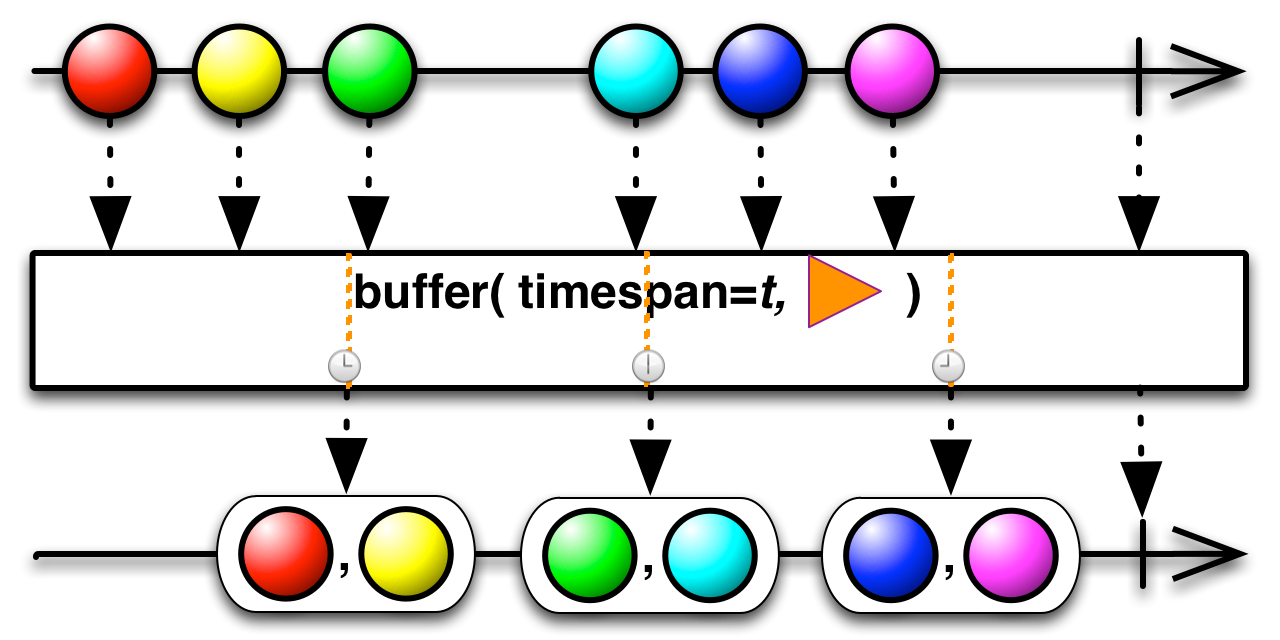
- Scheduler:
- You specify which
Schedulerthis operator will use.
- Parameters:
timespan- the period of time each buffer collects items before it is emitted and replaced with a new bufferunit- the unit of time which applies to thetimespanargumentscheduler- theSchedulerto use when determining the end and start of a buffer- Returns:
- an Observable that emits connected, non-overlapping buffers of items emitted by the source ObservableSource within a fixed duration
- See Also:
- ReactiveX operators documentation: Buffer
-
buffer
@CheckReturnValue @SchedulerSupport(value="none") public final <TOpening,TClosing> Observable<List<T>> buffer(ObservableSource<? extends TOpening> openingIndicator, Function<? super TOpening,? extends ObservableSource<? extends TClosing>> closingIndicator)
Returns an Observable that emits buffers of items it collects from the source ObservableSource. The resulting ObservableSource emits buffers that it creates when the specifiedopeningIndicatorObservableSource emits an item, and closes when the ObservableSource returned fromclosingIndicatoremits an item. If any of the source ObservableSource,openingIndicatororclosingIndicatorissues an onError notification the event is passed on immediately without first emitting the buffer it is in the process of assembling.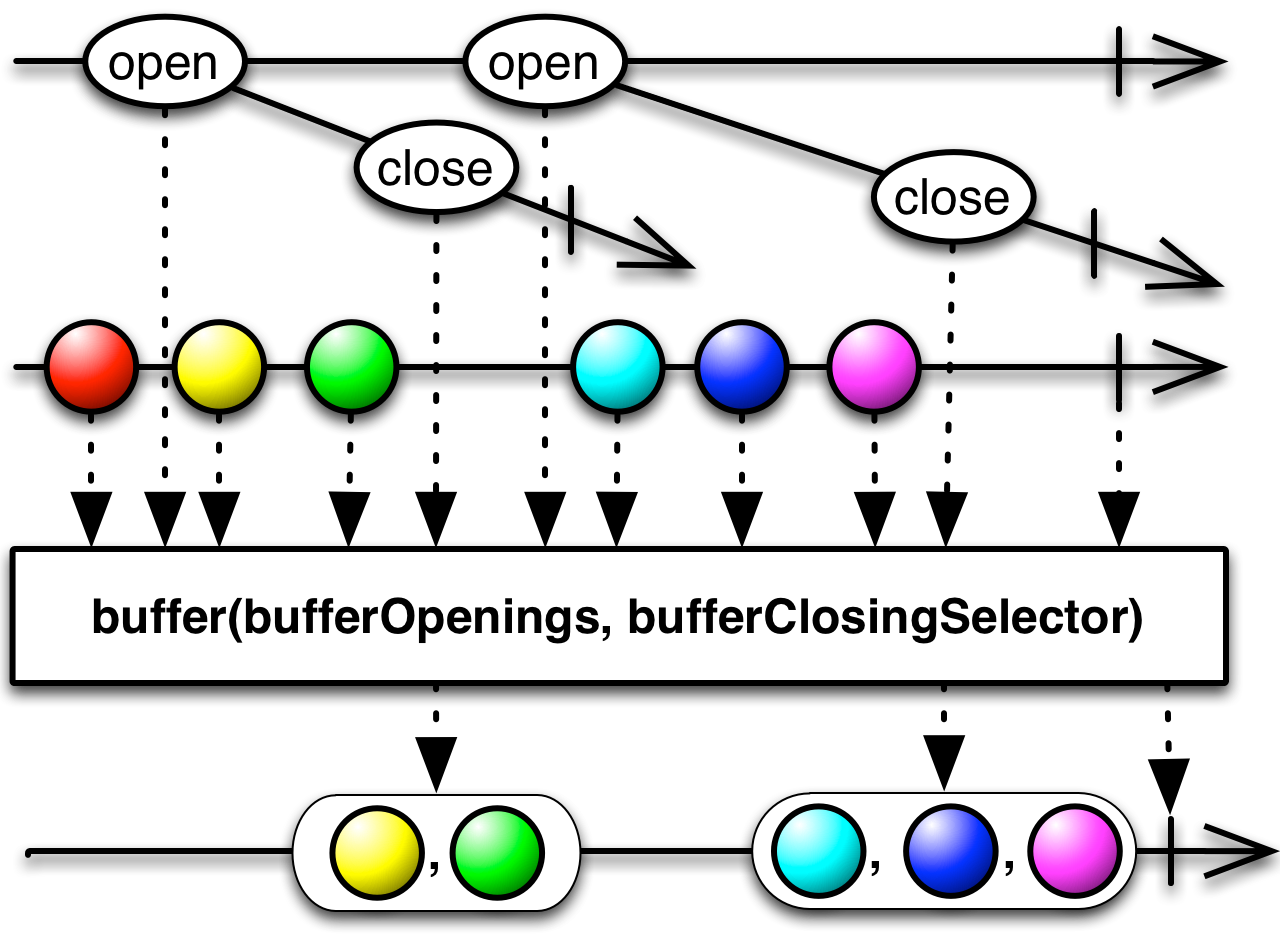
- Scheduler:
- This version of
bufferdoes not operate by default on a particularScheduler.
- Type Parameters:
TOpening- the element type of the buffer-opening ObservableSourceTClosing- the element type of the individual buffer-closing ObservableSources- Parameters:
openingIndicator- the ObservableSource that, when it emits an item, causes a new buffer to be createdclosingIndicator- theFunctionthat is used to produce an ObservableSource for every buffer created. When this ObservableSource emits an item, the associated buffer is emitted.- Returns:
- an Observable that emits buffers, containing items from the source ObservableSource, that are created and closed when the specified ObservableSources emit items
- See Also:
- ReactiveX operators documentation: Buffer
-
buffer
@CheckReturnValue @SchedulerSupport(value="none") public final <TOpening,TClosing,U extends Collection<? super T>> Observable<U> buffer(ObservableSource<? extends TOpening> openingIndicator, Function<? super TOpening,? extends ObservableSource<? extends TClosing>> closingIndicator, Callable<U> bufferSupplier)
Returns an Observable that emits buffers of items it collects from the source ObservableSource. The resulting ObservableSource emits buffers that it creates when the specifiedopeningIndicatorObservableSource emits an item, and closes when the ObservableSource returned fromclosingIndicatoremits an item. If any of the source ObservableSource,openingIndicatororclosingIndicatorissues an onError notification the event is passed on immediately without first emitting the buffer it is in the process of assembling.
- Scheduler:
- This version of
bufferdoes not operate by default on a particularScheduler.
- Type Parameters:
U- the collection subclass type to buffer intoTOpening- the element type of the buffer-opening ObservableSourceTClosing- the element type of the individual buffer-closing ObservableSources- Parameters:
openingIndicator- the ObservableSource that, when it emits an item, causes a new buffer to be createdclosingIndicator- theFunctionthat is used to produce an ObservableSource for every buffer created. When this ObservableSource emits an item, the associated buffer is emitted.bufferSupplier- a factory function that returns an instance of the collection subclass to be used and returned as the buffer- Returns:
- an Observable that emits buffers, containing items from the source ObservableSource, that are created and closed when the specified ObservableSources emit items
- See Also:
- ReactiveX operators documentation: Buffer
-
buffer
@CheckReturnValue @SchedulerSupport(value="none") public final <B> Observable<List<T>> buffer(ObservableSource<B> boundary)
Returns an Observable that emits non-overlapping buffered items from the source ObservableSource each time the specified boundary ObservableSource emits an item.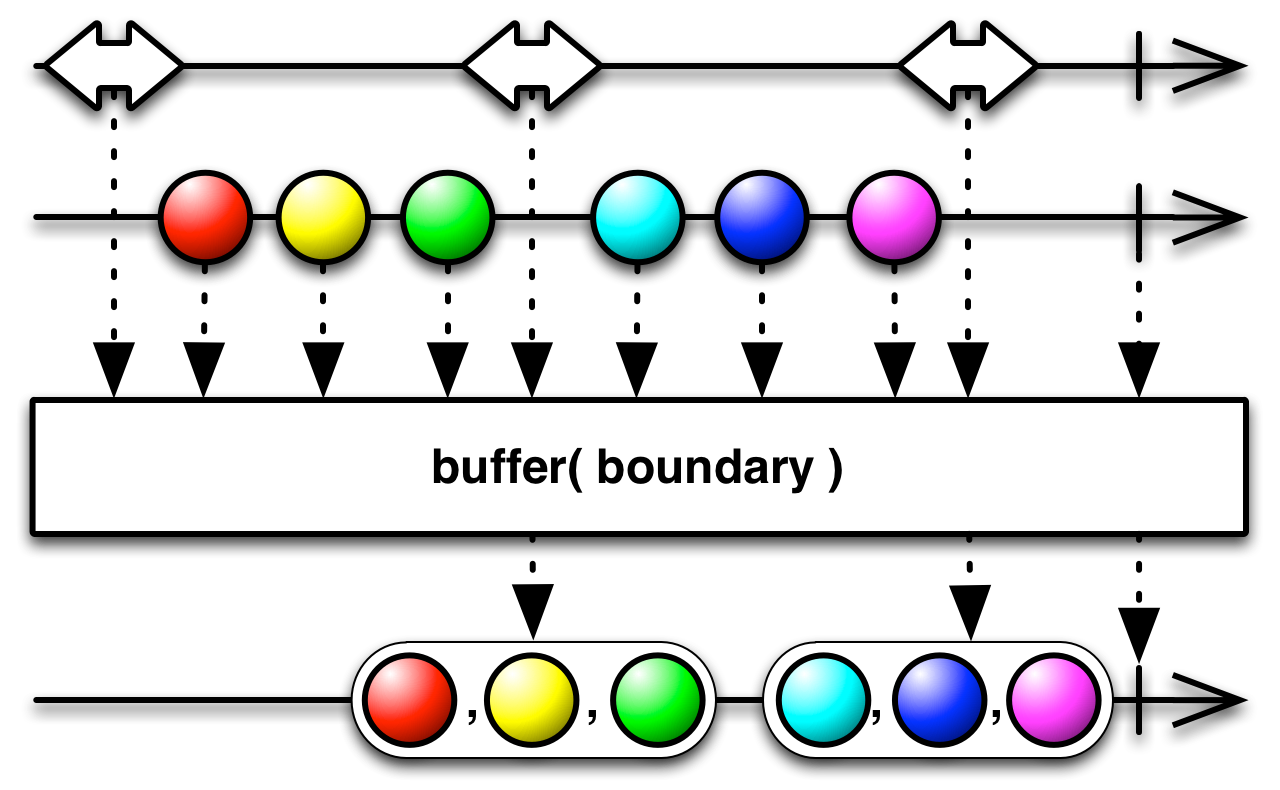
Completion of either the source or the boundary ObservableSource causes the returned ObservableSource to emit the latest buffer and complete. If either the source ObservableSource or the boundary ObservableSource issues an onError notification the event is passed on immediately without first emitting the buffer it is in the process of assembling.
- Scheduler:
- This version of
bufferdoes not operate by default on a particularScheduler.
- Type Parameters:
B- the boundary value type (ignored)- Parameters:
boundary- the boundary ObservableSource- Returns:
- an Observable that emits buffered items from the source ObservableSource when the boundary ObservableSource emits an item
- See Also:
buffer(ObservableSource, int), ReactiveX operators documentation: Buffer
-
buffer
@CheckReturnValue @SchedulerSupport(value="none") public final <B> Observable<List<T>> buffer(ObservableSource<B> boundary, int initialCapacity)
Returns an Observable that emits non-overlapping buffered items from the source ObservableSource each time the specified boundary ObservableSource emits an item.
Completion of either the source or the boundary ObservableSource causes the returned ObservableSource to emit the latest buffer and complete. If either the source ObservableSource or the boundary ObservableSource issues an onError notification the event is passed on immediately without first emitting the buffer it is in the process of assembling.
- Scheduler:
- This version of
bufferdoes not operate by default on a particularScheduler.
- Type Parameters:
B- the boundary value type (ignored)- Parameters:
boundary- the boundary ObservableSourceinitialCapacity- the initial capacity of each buffer chunk- Returns:
- an Observable that emits buffered items from the source ObservableSource when the boundary ObservableSource emits an item
- See Also:
- ReactiveX operators documentation: Buffer,
buffer(ObservableSource)
-
buffer
@CheckReturnValue @SchedulerSupport(value="none") public final <B,U extends Collection<? super T>> Observable<U> buffer(ObservableSource<B> boundary, Callable<U> bufferSupplier)
Returns an Observable that emits non-overlapping buffered items from the source ObservableSource each time the specified boundary ObservableSource emits an item.
Completion of either the source or the boundary ObservableSource causes the returned ObservableSource to emit the latest buffer and complete. If either the source ObservableSource or the boundary ObservableSource issues an onError notification the event is passed on immediately without first emitting the buffer it is in the process of assembling.
- Scheduler:
- This version of
bufferdoes not operate by default on a particularScheduler.
- Type Parameters:
U- the collection subclass type to buffer intoB- the boundary value type (ignored)- Parameters:
boundary- the boundary ObservableSourcebufferSupplier- a factory function that returns an instance of the collection subclass to be used and returned as the buffer- Returns:
- an Observable that emits buffered items from the source ObservableSource when the boundary ObservableSource emits an item
- See Also:
buffer(ObservableSource, int), ReactiveX operators documentation: Buffer
-
buffer
@CheckReturnValue @SchedulerSupport(value="none") public final <B> Observable<List<T>> buffer(Callable<? extends ObservableSource<B>> boundarySupplier)
Returns an Observable that emits buffers of items it collects from the source ObservableSource. The resulting ObservableSource emits connected, non-overlapping buffers. It emits the current buffer and replaces it with a new buffer whenever the ObservableSource produced by the specifiedboundarySupplieremits an item.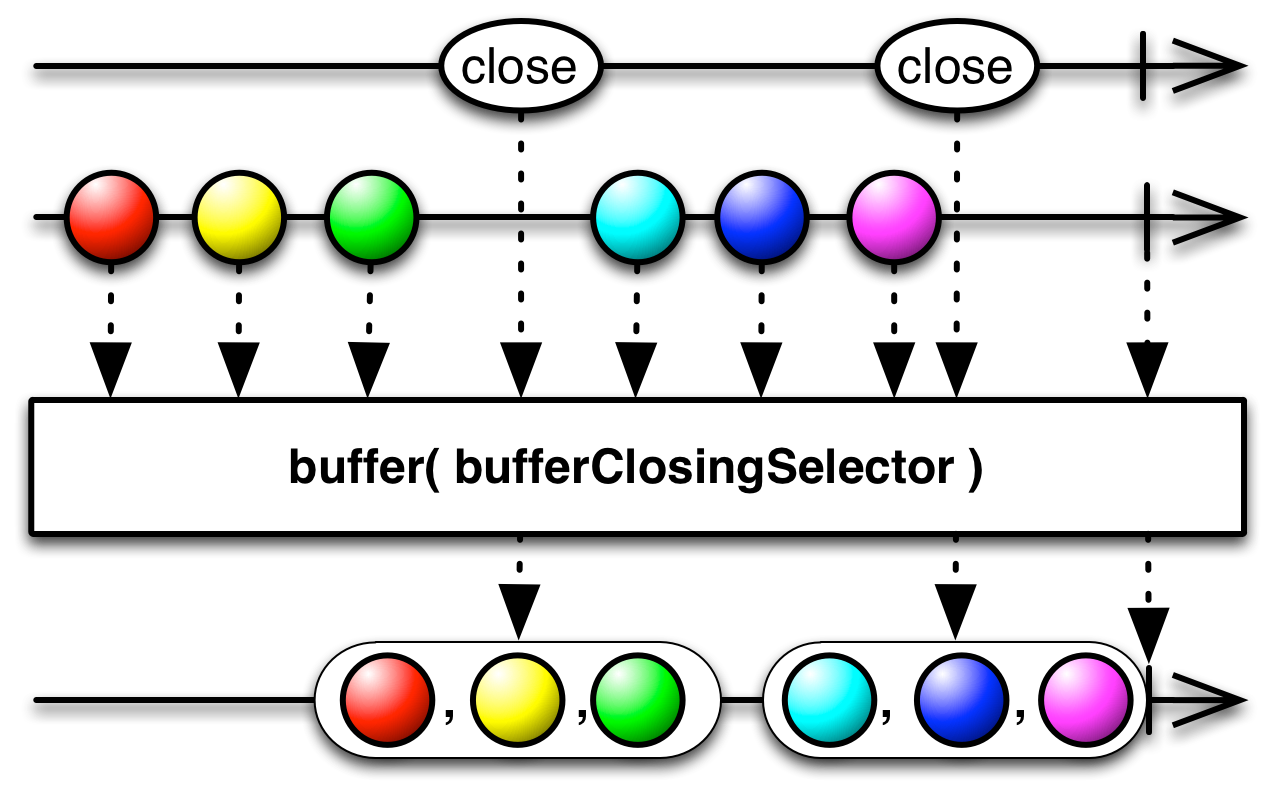
If either the source
ObservableSourceor the boundaryObservableSourceissues anonErrornotification the event is passed on immediately without first emitting the buffer it is in the process of assembling.- Scheduler:
- This version of
bufferdoes not operate by default on a particularScheduler.
- Type Parameters:
B- the value type of the boundary-providing ObservableSource- Parameters:
boundarySupplier- aCallablethat produces an ObservableSource that governs the boundary between buffers. Whenever the suppliedObservableSourceemits an item,bufferemits the current buffer and begins to fill a new one- Returns:
- an Observable that emits a connected, non-overlapping buffer of items from the source ObservableSource
each time the ObservableSource created with the
closingIndicatorargument emits an item - See Also:
- ReactiveX operators documentation: Buffer
-
buffer
@CheckReturnValue @SchedulerSupport(value="none") public final <B,U extends Collection<? super T>> Observable<U> buffer(Callable<? extends ObservableSource<B>> boundarySupplier, Callable<U> bufferSupplier)
Returns an Observable that emits buffers of items it collects from the source ObservableSource. The resulting ObservableSource emits connected, non-overlapping buffers. It emits the current buffer and replaces it with a new buffer whenever the ObservableSource produced by the specifiedboundarySupplieremits an item.
If either the source
ObservableSourceor the boundaryObservableSourceissues anonErrornotification the event is passed on immediately without first emitting the buffer it is in the process of assembling.- Scheduler:
- This version of
bufferdoes not operate by default on a particularScheduler.
- Type Parameters:
U- the collection subclass type to buffer intoB- the value type of the boundary-providing ObservableSource- Parameters:
boundarySupplier- aCallablethat produces an ObservableSource that governs the boundary between buffers. Whenever the suppliedObservableSourceemits an item,bufferemits the current buffer and begins to fill a new onebufferSupplier- a factory function that returns an instance of the collection subclass to be used and returned as the buffer- Returns:
- an Observable that emits a connected, non-overlapping buffer of items from the source ObservableSource
each time the ObservableSource created with the
closingIndicatorargument emits an item - See Also:
- ReactiveX operators documentation: Buffer
-
cache
@CheckReturnValue @SchedulerSupport(value="none") public final Observable<T> cache()
Returns an Observable that subscribes to this ObservableSource lazily, caches all of its events and replays them, in the same order as received, to all the downstream subscribers.
This is useful when you want an ObservableSource to cache responses and you can't control the subscribe/dispose behavior of all the
Observers.The operator subscribes only when the first downstream subscriber subscribes and maintains a single subscription towards this ObservableSource. In contrast, the operator family of
replay()that return aConnectableObservablerequire an explicit call toConnectableObservable.connect().Note: You sacrifice the ability to dispose the origin when you use the
cacheObserver so be careful not to use this Observer on ObservableSources that emit an infinite or very large number of items that will use up memory. A possible workaround is to apply `takeUntil` with a predicate or another source before (and perhaps after) the application of cache().
Since the operator doesn't allow clearing the cached values either, the possible workaround is to forget all references to it viaAtomicBoolean shouldStop = new AtomicBoolean(); source.takeUntil(v -> shouldStop.get()) .cache() .takeUntil(v -> shouldStop.get()) .subscribe(...);onTerminateDetach()applied along with the previous workaround:AtomicBoolean shouldStop = new AtomicBoolean(); source.takeUntil(v -> shouldStop.get()) .onTerminateDetach() .cache() .takeUntil(v -> shouldStop.get()) .onTerminateDetach() .subscribe(...);- Scheduler:
cachedoes not operate by default on a particularScheduler.
- Returns:
- an Observable that, when first subscribed to, caches all of its items and notifications for the benefit of subsequent subscribers
- See Also:
- ReactiveX operators documentation: Replay
-
cacheWithInitialCapacity
@CheckReturnValue @SchedulerSupport(value="none") public final Observable<T> cacheWithInitialCapacity(int initialCapacity)
Returns an Observable that subscribes to this ObservableSource lazily, caches all of its events and replays them, in the same order as received, to all the downstream subscribers.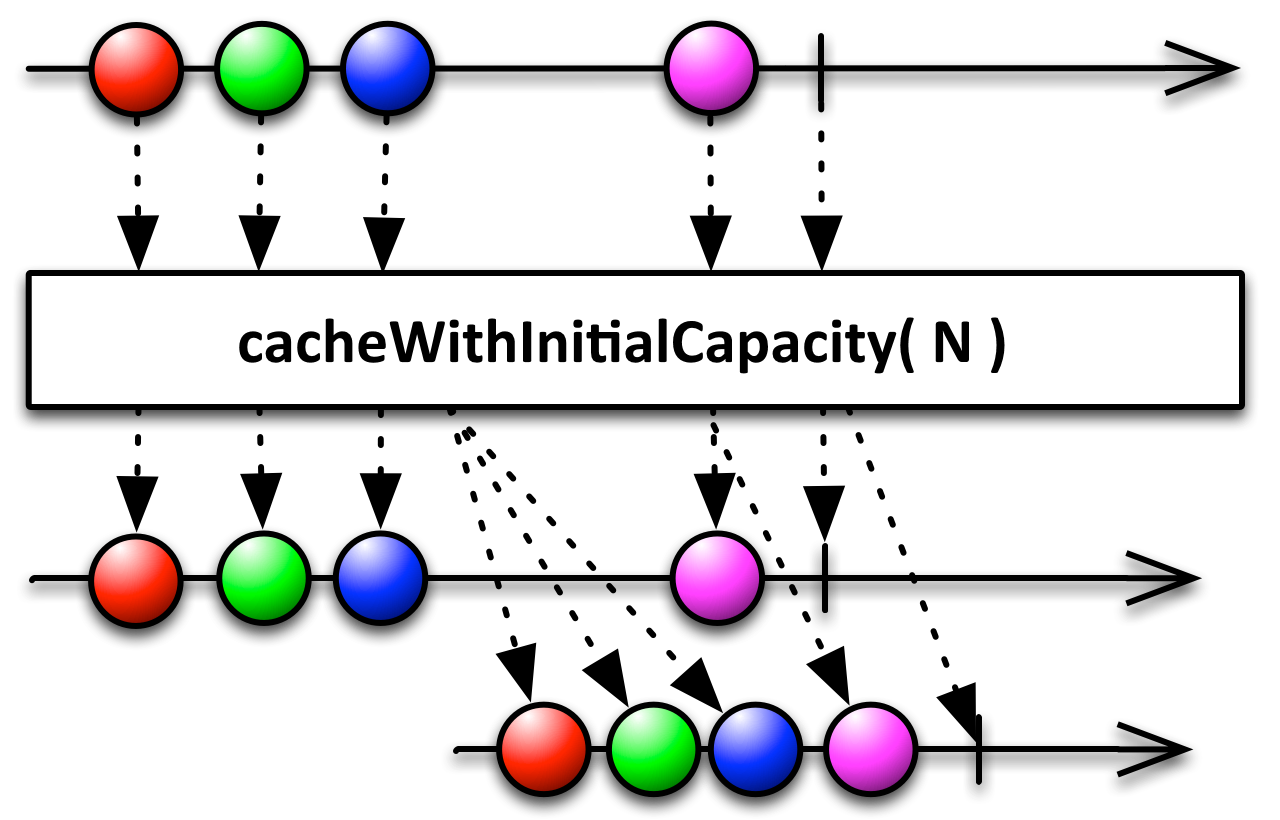
This is useful when you want an ObservableSource to cache responses and you can't control the subscribe/dispose behavior of all the
Observers.The operator subscribes only when the first downstream subscriber subscribes and maintains a single subscription towards this ObservableSource. In contrast, the operator family of
replay()that return aConnectableObservablerequire an explicit call toConnectableObservable.connect().Note: You sacrifice the ability to dispose the origin when you use the
cacheObserver so be careful not to use this Observer on ObservableSources that emit an infinite or very large number of items that will use up memory. A possible workaround is to apply `takeUntil` with a predicate or another source before (and perhaps after) the application of cache().
Since the operator doesn't allow clearing the cached values either, the possible workaround is to forget all references to it viaAtomicBoolean shouldStop = new AtomicBoolean(); source.takeUntil(v -> shouldStop.get()) .cache() .takeUntil(v -> shouldStop.get()) .subscribe(...);onTerminateDetach()applied along with the previous workaround:AtomicBoolean shouldStop = new AtomicBoolean(); source.takeUntil(v -> shouldStop.get()) .onTerminateDetach() .cache() .takeUntil(v -> shouldStop.get()) .onTerminateDetach() .subscribe(...);- Scheduler:
cacheWithInitialCapacitydoes not operate by default on a particularScheduler.
Note: The capacity hint is not an upper bound on cache size. For that, consider
replay(int)in combination withConnectableObservable.autoConnect()or similar.- Parameters:
initialCapacity- hint for number of items to cache (for optimizing underlying data structure)- Returns:
- an Observable that, when first subscribed to, caches all of its items and notifications for the benefit of subsequent subscribers
- See Also:
- ReactiveX operators documentation: Replay
-
cast
@CheckReturnValue @SchedulerSupport(value="none") public final <U> Observable<U> cast(Class<U> clazz)
Returns an Observable that emits the items emitted by the source ObservableSource, converted to the specified type.
- Scheduler:
castdoes not operate by default on a particularScheduler.
- Type Parameters:
U- the output value type cast to- Parameters:
clazz- the target class type thatcastwill cast the items emitted by the source ObservableSource into before emitting them from the resulting ObservableSource- Returns:
- an Observable that emits each item from the source ObservableSource after converting it to the specified type
- See Also:
- ReactiveX operators documentation: Map
-
collect
@CheckReturnValue @SchedulerSupport(value="none") public final <U> Single<U> collect(Callable<? extends U> initialValueSupplier, BiConsumer<? super U,? super T> collector)
Collects items emitted by the finite source ObservableSource into a single mutable data structure and returns a Single that emits this structure.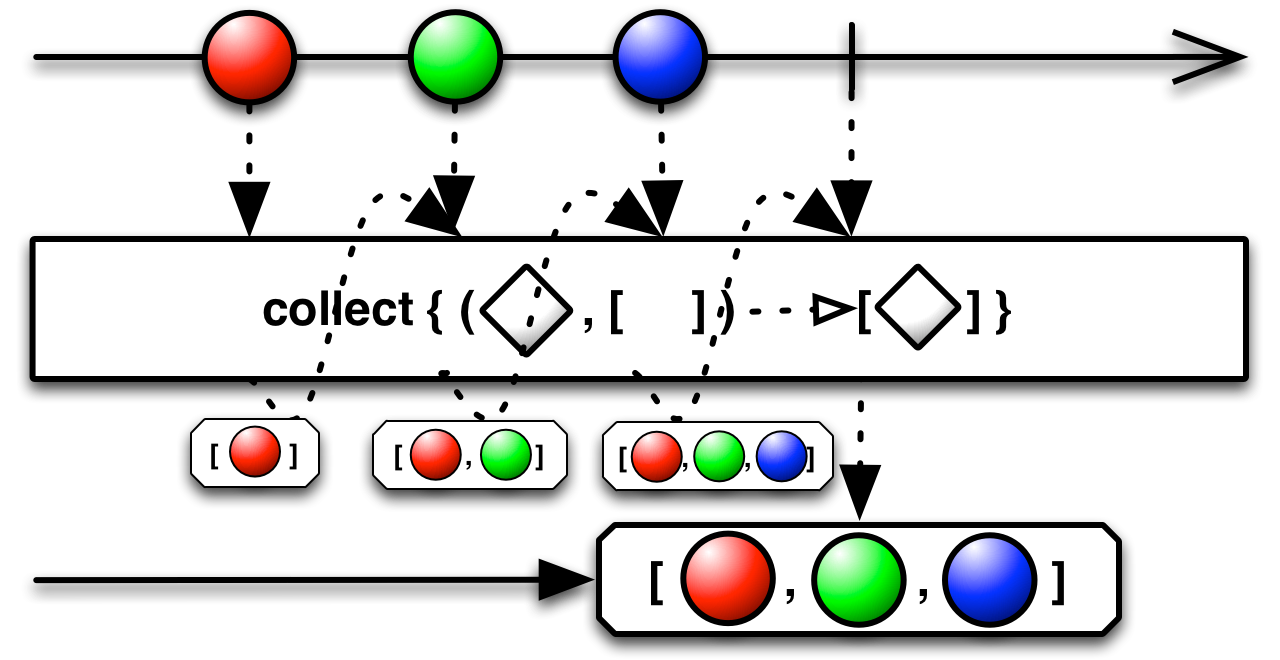
This is a simplified version of
reducethat does not need to return the state on each pass.Note that this operator requires the upstream to signal
onCompletefor the accumulator object to be emitted. Sources that are infinite and never complete will never emit anything through this operator and an infinite source may lead to a fatalOutOfMemoryError.- Scheduler:
collectdoes not operate by default on a particularScheduler.
- Type Parameters:
U- the accumulator and output type- Parameters:
initialValueSupplier- the mutable data structure that will collect the itemscollector- a function that accepts thestateand an emitted item, and modifiesstateaccordingly- Returns:
- a Single that emits the result of collecting the values emitted by the source ObservableSource into a single mutable data structure
- See Also:
- ReactiveX operators documentation: Reduce
-
collectInto
@CheckReturnValue @SchedulerSupport(value="none") public final <U> Single<U> collectInto(U initialValue, BiConsumer<? super U,? super T> collector)
Collects items emitted by the finite source ObservableSource into a single mutable data structure and returns a Single that emits this structure.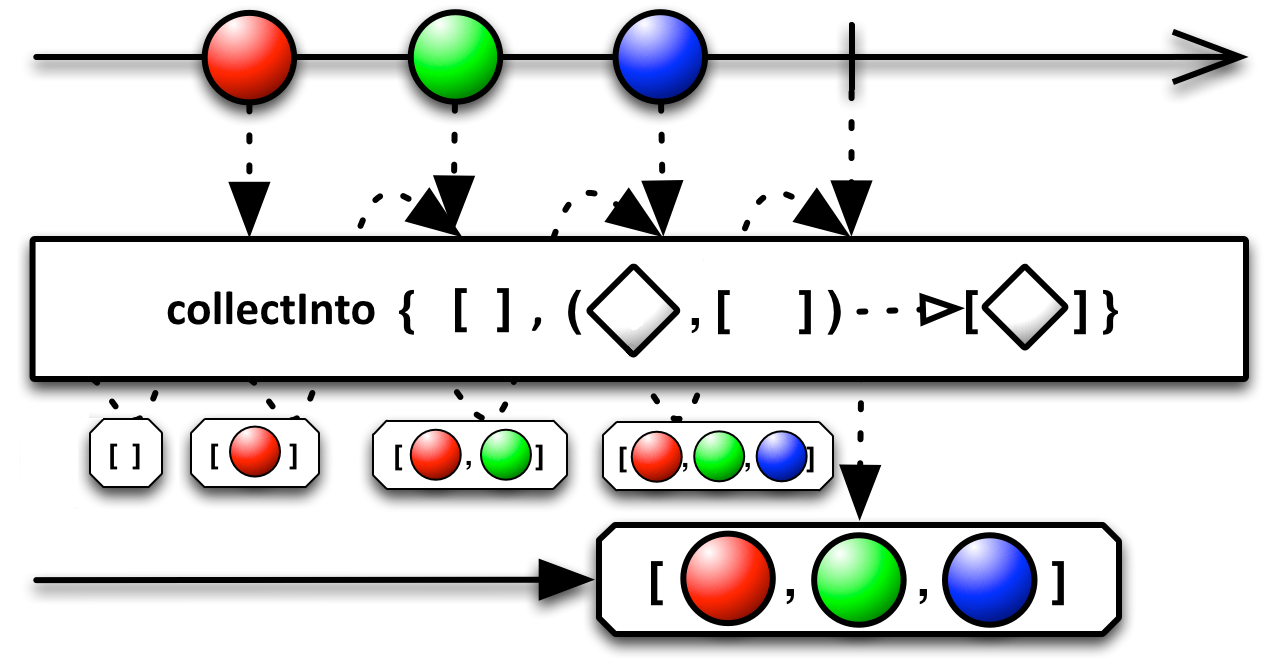
This is a simplified version of
reducethat does not need to return the state on each pass.Note that this operator requires the upstream to signal
onCompletefor the accumulator object to be emitted. Sources that are infinite and never complete will never emit anything through this operator and an infinite source may lead to a fatalOutOfMemoryError.- Scheduler:
collectIntodoes not operate by default on a particularScheduler.
- Type Parameters:
U- the accumulator and output type- Parameters:
initialValue- the mutable data structure that will collect the itemscollector- a function that accepts thestateand an emitted item, and modifiesstateaccordingly- Returns:
- a Single that emits the result of collecting the values emitted by the source ObservableSource into a single mutable data structure
- See Also:
- ReactiveX operators documentation: Reduce
-
compose
@CheckReturnValue @SchedulerSupport(value="none") public final <R> Observable<R> compose(ObservableTransformer<? super T,? extends R> composer)
Transform an ObservableSource by applying a particular Transformer function to it.This method operates on the ObservableSource itself whereas
lift(io.reactivex.ObservableOperator<? extends R, ? super T>)operates on the ObservableSource's Observers.If the operator you are creating is designed to act on the individual items emitted by a source ObservableSource, use
lift(io.reactivex.ObservableOperator<? extends R, ? super T>). If your operator is designed to transform the source ObservableSource as a whole (for instance, by applying a particular set of existing RxJava operators to it) usecompose.- Scheduler:
composedoes not operate by default on a particularScheduler.
- Type Parameters:
R- the value type of the output ObservableSource- Parameters:
composer- implements the function that transforms the source ObservableSource- Returns:
- the source ObservableSource, transformed by the transformer function
- See Also:
- RxJava wiki: Implementing Your Own Operators
-
concatMap
@CheckReturnValue @SchedulerSupport(value="none") public final <R> Observable<R> concatMap(Function<? super T,? extends ObservableSource<? extends R>> mapper)
Returns a new Observable that emits items resulting from applying a function that you supply to each item emitted by the source ObservableSource, where that function returns an ObservableSource, and then emitting the items that result from concatenating those resulting ObservableSources.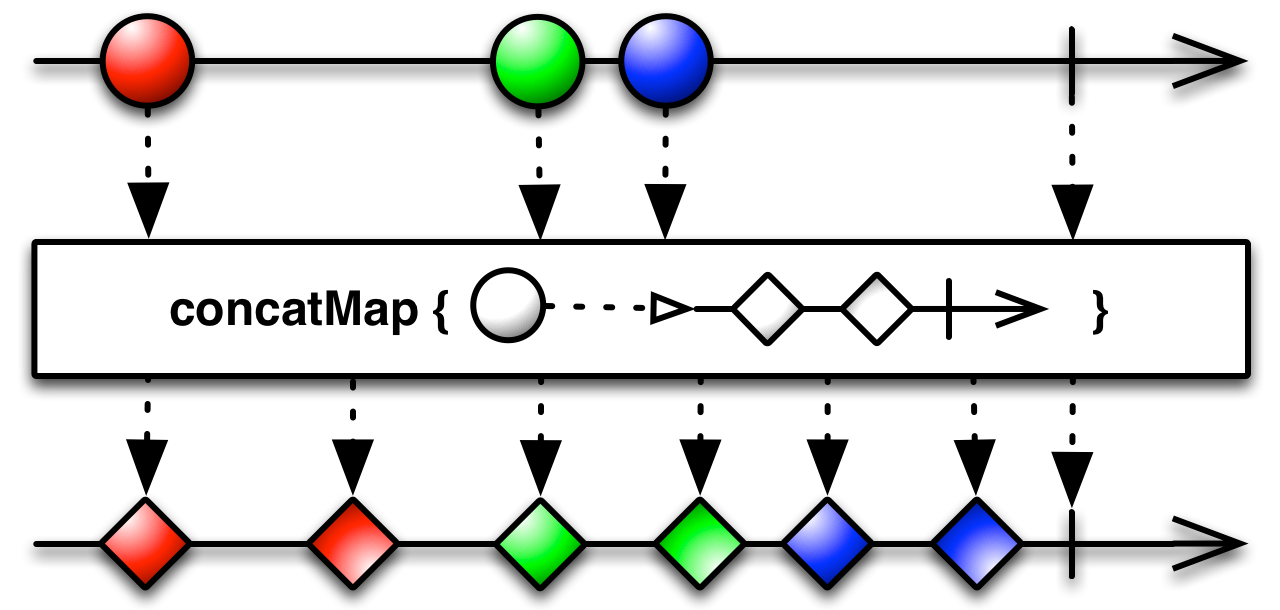
- Scheduler:
concatMapdoes not operate by default on a particularScheduler.
- Type Parameters:
R- the type of the inner ObservableSource sources and thus the output type- Parameters:
mapper- a function that, when applied to an item emitted by the source ObservableSource, returns an ObservableSource- Returns:
- an Observable that emits the result of applying the transformation function to each item emitted by the source ObservableSource and concatenating the ObservableSources obtained from this transformation
- See Also:
- ReactiveX operators documentation: FlatMap
-
concatMap
@CheckReturnValue @SchedulerSupport(value="none") public final <R> Observable<R> concatMap(Function<? super T,? extends ObservableSource<? extends R>> mapper, int prefetch)
Returns a new Observable that emits items resulting from applying a function that you supply to each item emitted by the source ObservableSource, where that function returns an ObservableSource, and then emitting the items that result from concatenating those resulting ObservableSources.
- Scheduler:
concatMapdoes not operate by default on a particularScheduler.
- Type Parameters:
R- the type of the inner ObservableSource sources and thus the output type- Parameters:
mapper- a function that, when applied to an item emitted by the source ObservableSource, returns an ObservableSourceprefetch- the number of elements to prefetch from the current Observable- Returns:
- an Observable that emits the result of applying the transformation function to each item emitted by the source ObservableSource and concatenating the ObservableSources obtained from this transformation
- See Also:
- ReactiveX operators documentation: FlatMap
-
concatMapDelayError
@CheckReturnValue @SchedulerSupport(value="none") public final <R> Observable<R> concatMapDelayError(Function<? super T,? extends ObservableSource<? extends R>> mapper)
Maps each of the items into an ObservableSource, subscribes to them one after the other, one at a time and emits their values in order while delaying any error from either this or any of the inner ObservableSources till all of them terminate.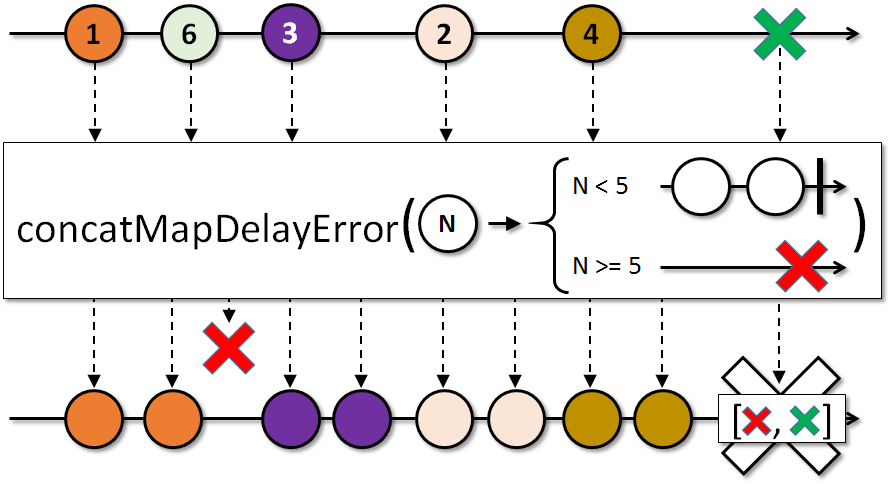
- Scheduler:
concatMapDelayErrordoes not operate by default on a particularScheduler.
- Type Parameters:
R- the result value type- Parameters:
mapper- the function that maps the items of this ObservableSource into the inner ObservableSources.- Returns:
- the new ObservableSource instance with the concatenation behavior
-
concatMapDelayError
@CheckReturnValue @SchedulerSupport(value="none") public final <R> Observable<R> concatMapDelayError(Function<? super T,? extends ObservableSource<? extends R>> mapper, int prefetch, boolean tillTheEnd)
Maps each of the items into an ObservableSource, subscribes to them one after the other, one at a time and emits their values in order while delaying any error from either this or any of the inner ObservableSources till all of them terminate.
- Scheduler:
concatMapDelayErrordoes not operate by default on a particularScheduler.
- Type Parameters:
R- the result value type- Parameters:
mapper- the function that maps the items of this ObservableSource into the inner ObservableSources.prefetch- the number of elements to prefetch from the current ObservabletillTheEnd- if true, all errors from the outer and inner ObservableSource sources are delayed until the end, if false, an error from the main source is signalled when the current ObservableSource source terminates- Returns:
- the new ObservableSource instance with the concatenation behavior
-
concatMapEager
@CheckReturnValue @SchedulerSupport(value="none") public final <R> Observable<R> concatMapEager(Function<? super T,? extends ObservableSource<? extends R>> mapper)
Maps a sequence of values into ObservableSources and concatenates these ObservableSources eagerly into a single ObservableSource.Eager concatenation means that once a subscriber subscribes, this operator subscribes to all of the source ObservableSources. The operator buffers the values emitted by these ObservableSources and then drains them in order, each one after the previous one completes.
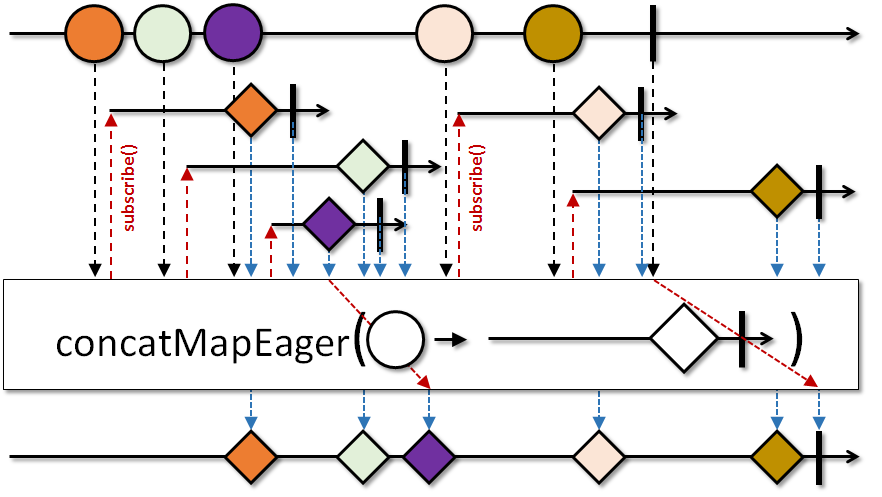
- Scheduler:
- This method does not operate by default on a particular
Scheduler.
- Type Parameters:
R- the value type- Parameters:
mapper- the function that maps a sequence of values into a sequence of ObservableSources that will be eagerly concatenated- Returns:
- the new ObservableSource instance with the specified concatenation behavior
- Since:
- 2.0
-
concatMapEager
@CheckReturnValue @SchedulerSupport(value="none") public final <R> Observable<R> concatMapEager(Function<? super T,? extends ObservableSource<? extends R>> mapper, int maxConcurrency, int prefetch)
Maps a sequence of values into ObservableSources and concatenates these ObservableSources eagerly into a single ObservableSource.Eager concatenation means that once a subscriber subscribes, this operator subscribes to all of the source ObservableSources. The operator buffers the values emitted by these ObservableSources and then drains them in order, each one after the previous one completes.

- Scheduler:
- This method does not operate by default on a particular
Scheduler.
- Type Parameters:
R- the value type- Parameters:
mapper- the function that maps a sequence of values into a sequence of ObservableSources that will be eagerly concatenatedmaxConcurrency- the maximum number of concurrent subscribed ObservableSourcesprefetch- hints about the number of expected values from each inner ObservableSource, must be positive- Returns:
- the new ObservableSource instance with the specified concatenation behavior
- Since:
- 2.0
-
concatMapEagerDelayError
@CheckReturnValue @SchedulerSupport(value="none") public final <R> Observable<R> concatMapEagerDelayError(Function<? super T,? extends ObservableSource<? extends R>> mapper, boolean tillTheEnd)
Maps a sequence of values into ObservableSources and concatenates these ObservableSources eagerly into a single ObservableSource.Eager concatenation means that once a subscriber subscribes, this operator subscribes to all of the source ObservableSources. The operator buffers the values emitted by these ObservableSources and then drains them in order, each one after the previous one completes.
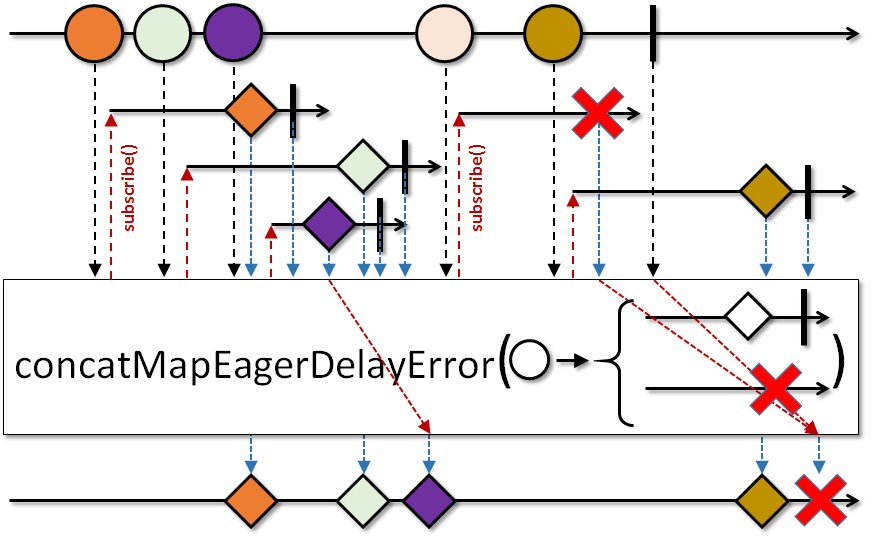
- Scheduler:
- This method does not operate by default on a particular
Scheduler.
- Type Parameters:
R- the value type- Parameters:
mapper- the function that maps a sequence of values into a sequence of ObservableSources that will be eagerly concatenatedtillTheEnd- if true, all errors from the outer and inner ObservableSource sources are delayed until the end, if false, an error from the main source is signalled when the current ObservableSource source terminates- Returns:
- the new ObservableSource instance with the specified concatenation behavior
- Since:
- 2.0
-
concatMapEagerDelayError
@CheckReturnValue @SchedulerSupport(value="none") public final <R> Observable<R> concatMapEagerDelayError(Function<? super T,? extends ObservableSource<? extends R>> mapper, int maxConcurrency, int prefetch, boolean tillTheEnd)
Maps a sequence of values into ObservableSources and concatenates these ObservableSources eagerly into a single ObservableSource.Eager concatenation means that once a subscriber subscribes, this operator subscribes to all of the source ObservableSources. The operator buffers the values emitted by these ObservableSources and then drains them in order, each one after the previous one completes.

- Scheduler:
- This method does not operate by default on a particular
Scheduler.
- Type Parameters:
R- the value type- Parameters:
mapper- the function that maps a sequence of values into a sequence of ObservableSources that will be eagerly concatenatedmaxConcurrency- the maximum number of concurrent subscribed ObservableSourcesprefetch- the number of elements to prefetch from each source ObservableSourcetillTheEnd- if true, exceptions from the current Observable and all the inner ObservableSources are delayed until all of them terminate, if false, exception from the current Observable is delayed until the currently running ObservableSource terminates- Returns:
- the new ObservableSource instance with the specified concatenation behavior
- Since:
- 2.0
-
concatMapCompletable
@CheckReturnValue @SchedulerSupport(value="none") public final Completable concatMapCompletable(Function<? super T,? extends CompletableSource> mapper)
Maps each element of the upstream Observable into CompletableSources, subscribes to them one at a time in order and waits until the upstream and all CompletableSources complete.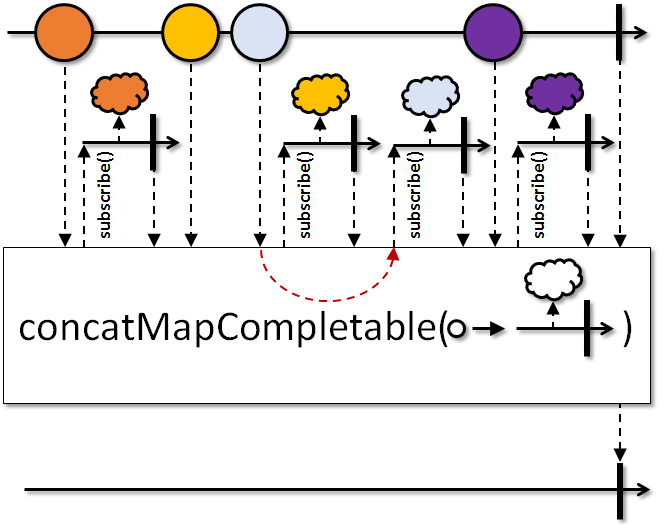
- Scheduler:
concatMapCompletabledoes not operate by default on a particularScheduler.
History: 2.1.6 - experimental
- Parameters:
mapper- a function that, when applied to an item emitted by the source ObservableSource, returns a CompletableSource- Returns:
- a Completable that signals
onCompletewhen the upstream and all CompletableSources complete - Since:
- 2.2
-
concatMapCompletable
@CheckReturnValue @SchedulerSupport(value="none") public final Completable concatMapCompletable(Function<? super T,? extends CompletableSource> mapper, int capacityHint)
Maps each element of the upstream Observable into CompletableSources, subscribes to them one at a time in order and waits until the upstream and all CompletableSources complete.
- Scheduler:
concatMapCompletabledoes not operate by default on a particularScheduler.
History: 2.1.6 - experimental
- Parameters:
mapper- a function that, when applied to an item emitted by the source ObservableSource, returns a CompletableSourcecapacityHint- the number of upstream items expected to be buffered until the current CompletableSource, mapped from the current item, completes.- Returns:
- a Completable that signals
onCompletewhen the upstream and all CompletableSources complete - Since:
- 2.2
-
concatMapCompletableDelayError
@CheckReturnValue @SchedulerSupport(value="none") public final Completable concatMapCompletableDelayError(Function<? super T,? extends CompletableSource> mapper)
Maps the upstream items intoCompletableSources and subscribes to them one after the other terminates, delaying all errors till both thisObservableand all innerCompletableSources terminate.
- Scheduler:
concatMapCompletableDelayErrordoes not operate by default on a particularScheduler.
History: 2.1.11 - experimental
- Parameters:
mapper- the function called with the upstream item and should return aCompletableSourceto become the next source to be subscribed to- Returns:
- a new Completable instance
- Since:
- 2.2
- See Also:
concatMapCompletable(Function, int)
-
concatMapCompletableDelayError
@CheckReturnValue @SchedulerSupport(value="none") public final Completable concatMapCompletableDelayError(Function<? super T,? extends CompletableSource> mapper, boolean tillTheEnd)
Maps the upstream items intoCompletableSources and subscribes to them one after the other terminates, optionally delaying all errors till both thisObservableand all innerCompletableSources terminate.
- Scheduler:
concatMapCompletableDelayErrordoes not operate by default on a particularScheduler.
History: 2.1.11 - experimental
- Parameters:
mapper- the function called with the upstream item and should return aCompletableSourceto become the next source to be subscribed totillTheEnd- Iftrue, errors from thisObservableor any of the innerCompletableSources are delayed until all of them terminate. Iffalse, an error from thisObservableis delayed until the current innerCompletableSourceterminates and only then is it emitted to the downstream.- Returns:
- a new Completable instance
- Since:
- 2.2
- See Also:
concatMapCompletable(Function)
-
concatMapCompletableDelayError
@CheckReturnValue @SchedulerSupport(value="none") public final Completable concatMapCompletableDelayError(Function<? super T,? extends CompletableSource> mapper, boolean tillTheEnd, int prefetch)
Maps the upstream items intoCompletableSources and subscribes to them one after the other terminates, optionally delaying all errors till both thisObservableand all innerCompletableSources terminate.
- Scheduler:
concatMapCompletableDelayErrordoes not operate by default on a particularScheduler.
History: 2.1.11 - experimental
- Parameters:
mapper- the function called with the upstream item and should return aCompletableSourceto become the next source to be subscribed totillTheEnd- Iftrue, errors from thisObservableor any of the innerCompletableSources are delayed until all of them terminate. Iffalse, an error from thisObservableis delayed until the current innerCompletableSourceterminates and only then is it emitted to the downstream.prefetch- The number of upstream items to prefetch so that fresh items are ready to be mapped when a previousCompletableSourceterminates. The operator replenishes after half of the prefetch amount has been consumed and turned intoCompletableSources.- Returns:
- a new Completable instance
- Since:
- 2.2
- See Also:
concatMapCompletable(Function, int)
-
concatMapIterable
@CheckReturnValue @SchedulerSupport(value="none") public final <U> Observable<U> concatMapIterable(Function<? super T,? extends Iterable<? extends U>> mapper)
Returns an Observable that concatenate each item emitted by the source ObservableSource with the values in an Iterable corresponding to that item that is generated by a selector.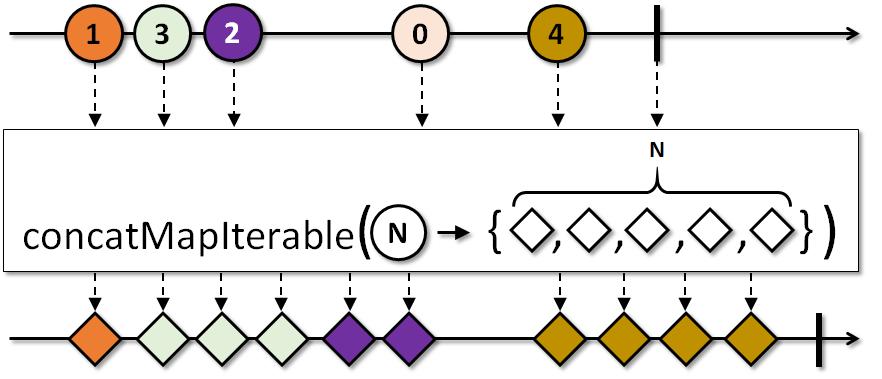
- Scheduler:
concatMapIterabledoes not operate by default on a particularScheduler.
- Type Parameters:
U- the type of item emitted by the resulting ObservableSource- Parameters:
mapper- a function that returns an Iterable sequence of values for when given an item emitted by the source ObservableSource- Returns:
- an Observable that emits the results of concatenating the items emitted by the source ObservableSource with
the values in the Iterables corresponding to those items, as generated by
collectionSelector - See Also:
- ReactiveX operators documentation: FlatMap
-
concatMapIterable
@CheckReturnValue @SchedulerSupport(value="none") public final <U> Observable<U> concatMapIterable(Function<? super T,? extends Iterable<? extends U>> mapper, int prefetch)
Returns an Observable that concatenate each item emitted by the source ObservableSource with the values in an Iterable corresponding to that item that is generated by a selector.
- Scheduler:
concatMapIterabledoes not operate by default on a particularScheduler.
- Type Parameters:
U- the type of item emitted by the resulting ObservableSource- Parameters:
mapper- a function that returns an Iterable sequence of values for when given an item emitted by the source ObservableSourceprefetch- the number of elements to prefetch from the current Observable- Returns:
- an Observable that emits the results of concatenating the items emitted by the source ObservableSource with
the values in the Iterables corresponding to those items, as generated by
collectionSelector - See Also:
- ReactiveX operators documentation: FlatMap
-
concatMapMaybe
@CheckReturnValue @SchedulerSupport(value="none") public final <R> Observable<R> concatMapMaybe(Function<? super T,? extends MaybeSource<? extends R>> mapper)
Maps the upstream items intoMaybeSources and subscribes to them one after the other succeeds or completes, emits their success value if available or terminates immediately if either thisObservableor the current innerMaybeSourcefail.
- Scheduler:
concatMapMaybedoes not operate by default on a particularScheduler.
History: 2.1.11 - experimental
- Type Parameters:
R- the result type of the innerMaybeSources- Parameters:
mapper- the function called with the upstream item and should return aMaybeSourceto become the next source to be subscribed to- Returns:
- a new Observable instance
- Since:
- 2.2
- See Also:
concatMapMaybeDelayError(Function),concatMapMaybe(Function, int)
-
concatMapMaybe
@CheckReturnValue @SchedulerSupport(value="none") public final <R> Observable<R> concatMapMaybe(Function<? super T,? extends MaybeSource<? extends R>> mapper, int prefetch)
Maps the upstream items intoMaybeSources and subscribes to them one after the other succeeds or completes, emits their success value if available or terminates immediately if either thisObservableor the current innerMaybeSourcefail.
- Scheduler:
concatMapMaybedoes not operate by default on a particularScheduler.
History: 2.1.11 - experimental
- Type Parameters:
R- the result type of the innerMaybeSources- Parameters:
mapper- the function called with the upstream item and should return aMaybeSourceto become the next source to be subscribed toprefetch- The number of upstream items to prefetch so that fresh items are ready to be mapped when a previousMaybeSourceterminates. The operator replenishes after half of the prefetch amount has been consumed and turned intoMaybeSources.- Returns:
- a new Observable instance
- Since:
- 2.2
- See Also:
concatMapMaybe(Function),concatMapMaybeDelayError(Function, boolean, int)
-
concatMapMaybeDelayError
@CheckReturnValue @SchedulerSupport(value="none") public final <R> Observable<R> concatMapMaybeDelayError(Function<? super T,? extends MaybeSource<? extends R>> mapper)
Maps the upstream items intoMaybeSources and subscribes to them one after the other terminates, emits their success value if available and delaying all errors till both thisObservableand all innerMaybeSources terminate.
- Scheduler:
concatMapMaybeDelayErrordoes not operate by default on a particularScheduler.
History: 2.1.11 - experimental
- Type Parameters:
R- the result type of the innerMaybeSources- Parameters:
mapper- the function called with the upstream item and should return aMaybeSourceto become the next source to be subscribed to- Returns:
- a new Observable instance
- Since:
- 2.2
- See Also:
concatMapMaybe(Function),concatMapMaybeDelayError(Function, boolean)
-
concatMapMaybeDelayError
@CheckReturnValue @SchedulerSupport(value="none") public final <R> Observable<R> concatMapMaybeDelayError(Function<? super T,? extends MaybeSource<? extends R>> mapper, boolean tillTheEnd)
Maps the upstream items intoMaybeSources and subscribes to them one after the other terminates, emits their success value if available and optionally delaying all errors till both thisObservableand all innerMaybeSources terminate.
- Scheduler:
concatMapMaybeDelayErrordoes not operate by default on a particularScheduler.
History: 2.1.11 - experimental
- Type Parameters:
R- the result type of the innerMaybeSources- Parameters:
mapper- the function called with the upstream item and should return aMaybeSourceto become the next source to be subscribed totillTheEnd- Iftrue, errors from thisObservableor any of the innerMaybeSources are delayed until all of them terminate. Iffalse, an error from thisObservableis delayed until the current innerMaybeSourceterminates and only then is it emitted to the downstream.- Returns:
- a new Observable instance
- Since:
- 2.2
- See Also:
concatMapMaybe(Function, int),concatMapMaybeDelayError(Function, boolean, int)
-
concatMapMaybeDelayError
@CheckReturnValue @SchedulerSupport(value="none") public final <R> Observable<R> concatMapMaybeDelayError(Function<? super T,? extends MaybeSource<? extends R>> mapper, boolean tillTheEnd, int prefetch)
Maps the upstream items intoMaybeSources and subscribes to them one after the other terminates, emits their success value if available and optionally delaying all errors till both thisObservableand all innerMaybeSources terminate.
- Scheduler:
concatMapMaybeDelayErrordoes not operate by default on a particularScheduler.
History: 2.1.11 - experimental
- Type Parameters:
R- the result type of the innerMaybeSources- Parameters:
mapper- the function called with the upstream item and should return aMaybeSourceto become the next source to be subscribed totillTheEnd- Iftrue, errors from thisObservableor any of the innerMaybeSources are delayed until all of them terminate. Iffalse, an error from thisObservableis delayed until the current innerMaybeSourceterminates and only then is it emitted to the downstream.prefetch- The number of upstream items to prefetch so that fresh items are ready to be mapped when a previousMaybeSourceterminates. The operator replenishes after half of the prefetch amount has been consumed and turned intoMaybeSources.- Returns:
- a new Observable instance
- Since:
- 2.2
- See Also:
concatMapMaybe(Function, int)
-
concatMapSingle
@CheckReturnValue @SchedulerSupport(value="none") public final <R> Observable<R> concatMapSingle(Function<? super T,? extends SingleSource<? extends R>> mapper)
Maps the upstream items intoSingleSources and subscribes to them one after the other succeeds, emits their success values or terminates immediately if either thisObservableor the current innerSingleSourcefail.
- Scheduler:
concatMapSingledoes not operate by default on a particularScheduler.
History: 2.1.11 - experimental
- Type Parameters:
R- the result type of the innerSingleSources- Parameters:
mapper- the function called with the upstream item and should return aSingleSourceto become the next source to be subscribed to- Returns:
- a new Observable instance
- Since:
- 2.2
- See Also:
concatMapSingleDelayError(Function),concatMapSingle(Function, int)
-
concatMapSingle
@CheckReturnValue @SchedulerSupport(value="none") public final <R> Observable<R> concatMapSingle(Function<? super T,? extends SingleSource<? extends R>> mapper, int prefetch)
Maps the upstream items intoSingleSources and subscribes to them one after the other succeeds, emits their success values or terminates immediately if either thisObservableor the current innerSingleSourcefail.
- Scheduler:
concatMapSingledoes not operate by default on a particularScheduler.
History: 2.1.11 - experimental
- Type Parameters:
R- the result type of the innerSingleSources- Parameters:
mapper- the function called with the upstream item and should return aSingleSourceto become the next source to be subscribed toprefetch- The number of upstream items to prefetch so that fresh items are ready to be mapped when a previousSingleSourceterminates. The operator replenishes after half of the prefetch amount has been consumed and turned intoSingleSources.- Returns:
- a new Observable instance
- Since:
- 2.2
- See Also:
concatMapSingle(Function),concatMapSingleDelayError(Function, boolean, int)
-
concatMapSingleDelayError
@CheckReturnValue @SchedulerSupport(value="none") public final <R> Observable<R> concatMapSingleDelayError(Function<? super T,? extends SingleSource<? extends R>> mapper)
Maps the upstream items intoSingleSources and subscribes to them one after the other succeeds or fails, emits their success values and delays all errors till both thisObservableand all innerSingleSources terminate.
- Scheduler:
concatMapSingleDelayErrordoes not operate by default on a particularScheduler.
History: 2.1.11 - experimental
- Type Parameters:
R- the result type of the innerSingleSources- Parameters:
mapper- the function called with the upstream item and should return aSingleSourceto become the next source to be subscribed to- Returns:
- a new Observable instance
- Since:
- 2.2
- See Also:
concatMapSingle(Function),concatMapSingleDelayError(Function, boolean)
-
concatMapSingleDelayError
@CheckReturnValue @SchedulerSupport(value="none") public final <R> Observable<R> concatMapSingleDelayError(Function<? super T,? extends SingleSource<? extends R>> mapper, boolean tillTheEnd)
Maps the upstream items intoSingleSources and subscribes to them one after the other succeeds or fails, emits their success values and optionally delays all errors till both thisObservableand all innerSingleSources terminate.
- Scheduler:
concatMapSingleDelayErrordoes not operate by default on a particularScheduler.
History: 2.1.11 - experimental
- Type Parameters:
R- the result type of the innerSingleSources- Parameters:
mapper- the function called with the upstream item and should return aSingleSourceto become the next source to be subscribed totillTheEnd- Iftrue, errors from thisObservableor any of the innerSingleSources are delayed until all of them terminate. Iffalse, an error from thisObservableis delayed until the current innerSingleSourceterminates and only then is it emitted to the downstream.- Returns:
- a new Observable instance
- Since:
- 2.2
- See Also:
concatMapSingle(Function, int),concatMapSingleDelayError(Function, boolean, int)
-
concatMapSingleDelayError
@CheckReturnValue @SchedulerSupport(value="none") public final <R> Observable<R> concatMapSingleDelayError(Function<? super T,? extends SingleSource<? extends R>> mapper, boolean tillTheEnd, int prefetch)
Maps the upstream items intoSingleSources and subscribes to them one after the other succeeds or fails, emits their success values and optionally delays errors till both thisObservableand all innerSingleSources terminate.
- Scheduler:
concatMapSingleDelayErrordoes not operate by default on a particularScheduler.
History: 2.1.11 - experimental
- Type Parameters:
R- the result type of the innerSingleSources- Parameters:
mapper- the function called with the upstream item and should return aSingleSourceto become the next source to be subscribed totillTheEnd- Iftrue, errors from thisObservableor any of the innerSingleSources are delayed until all of them terminate. Iffalse, an error from thisObservableis delayed until the current innerSingleSourceterminates and only then is it emitted to the downstream.prefetch- The number of upstream items to prefetch so that fresh items are ready to be mapped when a previousSingleSourceterminates. The operator replenishes after half of the prefetch amount has been consumed and turned intoSingleSources.- Returns:
- a new Observable instance
- Since:
- 2.2
- See Also:
concatMapSingle(Function, int)
-
concatWith
@CheckReturnValue @SchedulerSupport(value="none") public final Observable<T> concatWith(ObservableSource<? extends T> other)
Returns an Observable that emits the items emitted from the current ObservableSource, then the next, one after the other, without interleaving them.
- Scheduler:
concatWithdoes not operate by default on a particularScheduler.
- Parameters:
other- an ObservableSource to be concatenated after the current- Returns:
- an Observable that emits items emitted by the two source ObservableSources, one after the other, without interleaving them
- See Also:
- ReactiveX operators documentation: Concat
-
concatWith
@CheckReturnValue @SchedulerSupport(value="none") public final Observable<T> concatWith(@NonNull SingleSource<? extends T> other)
Returns anObservablethat emits the items from thisObservablefollowed by the success item or error event of the otherSingleSource.
- Scheduler:
concatWithdoes not operate by default on a particularScheduler.
History: 2.1.10 - experimental
- Parameters:
other- the SingleSource whose signal should be emitted after thisObservablecompletes normally.- Returns:
- the new Observable instance
- Since:
- 2.2
-
concatWith
@CheckReturnValue @SchedulerSupport(value="none") public final Observable<T> concatWith(@NonNull MaybeSource<? extends T> other)
Returns anObservablethat emits the items from thisObservablefollowed by the success item or terminal events of the otherMaybeSource.
- Scheduler:
concatWithdoes not operate by default on a particularScheduler.
History: 2.1.10 - experimental
- Parameters:
other- the MaybeSource whose signal should be emitted after this Observable completes normally.- Returns:
- the new Observable instance
- Since:
- 2.2
-
concatWith
@CheckReturnValue @SchedulerSupport(value="none") public final Observable<T> concatWith(@NonNull CompletableSource other)
Returns anObservablethat emits items from thisObservableand when it completes normally, the otherCompletableSourceis subscribed to and the returnedObservableemits its terminal events.
- Scheduler:
concatWithdoes not operate by default on a particularScheduler.
History: 2.1.10 - experimental
- Parameters:
other- theCompletableSourceto subscribe to once the currentObservablecompletes normally- Returns:
- the new Observable instance
- Since:
- 2.2
-
contains
@CheckReturnValue @SchedulerSupport(value="none") public final Single<Boolean> contains(Object element)
Returns a Single that emits a Boolean that indicates whether the source ObservableSource emitted a specified item.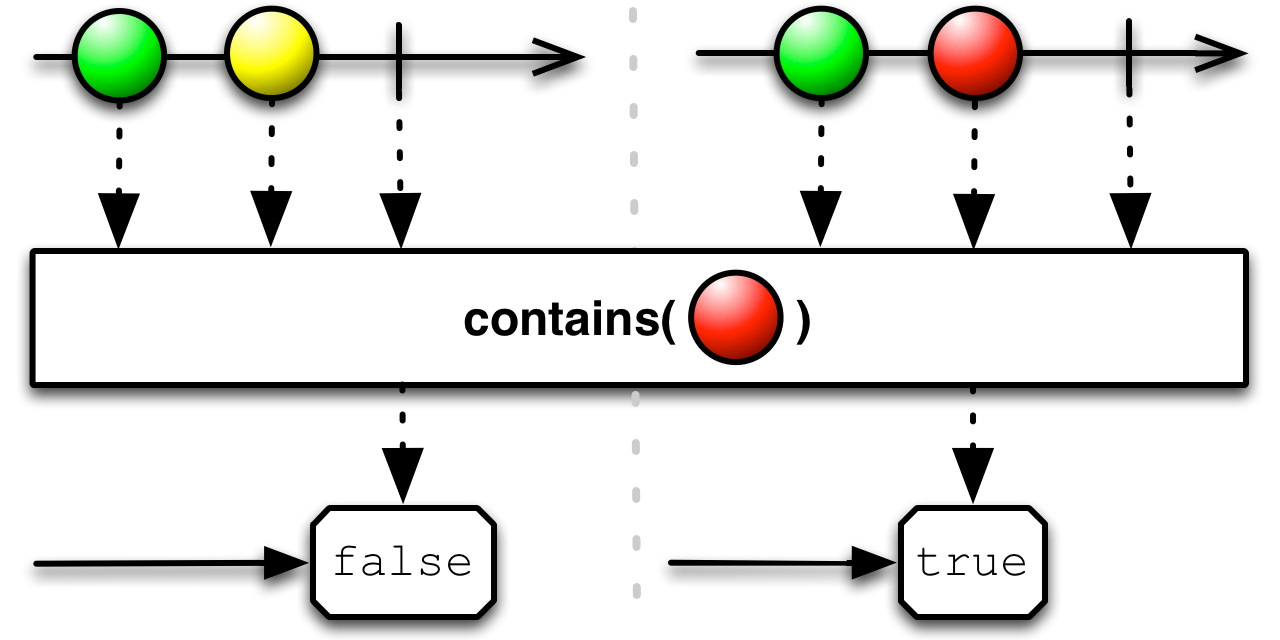
- Scheduler:
containsdoes not operate by default on a particularScheduler.
- Parameters:
element- the item to search for in the emissions from the source ObservableSource- Returns:
- a Single that emits
trueif the specified item is emitted by the source ObservableSource, orfalseif the source ObservableSource completes without emitting that item - See Also:
- ReactiveX operators documentation: Contains
-
count
@CheckReturnValue @SchedulerSupport(value="none") public final Single<Long> count()
Returns a Single that counts the total number of items emitted by the source ObservableSource and emits this count as a 64-bit Long.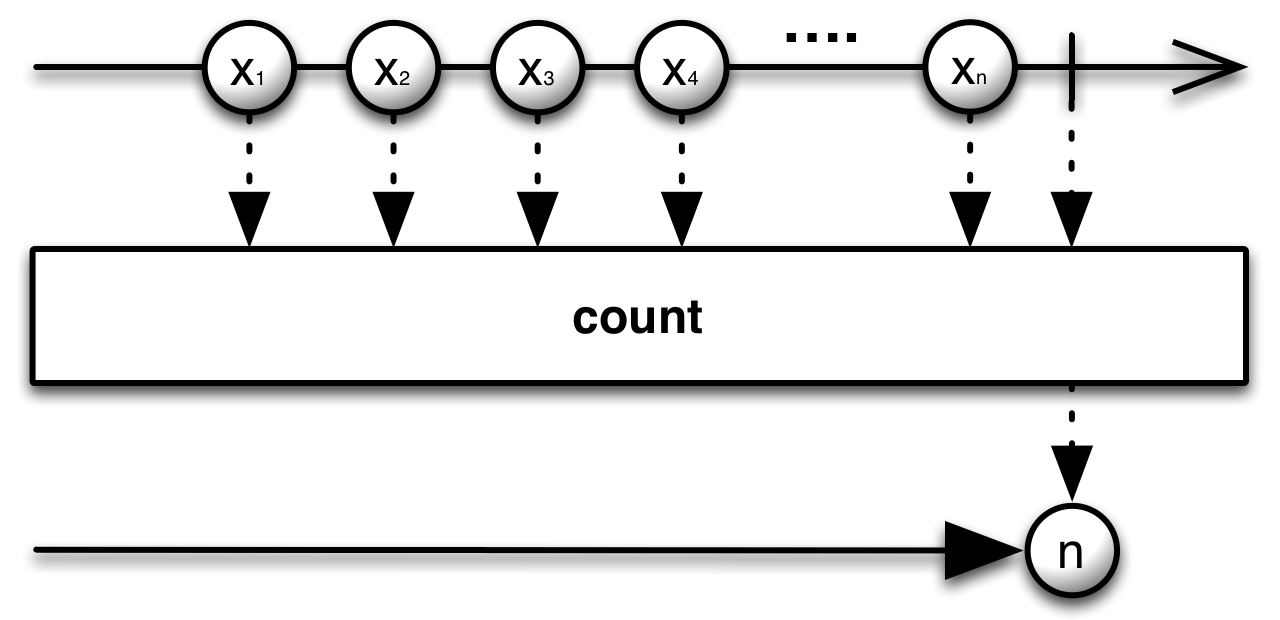
- Scheduler:
countdoes not operate by default on a particularScheduler.
- Returns:
- a Single that emits a single item: the number of items emitted by the source ObservableSource as a 64-bit Long item
- See Also:
- ReactiveX operators documentation: Count
-
debounce
@CheckReturnValue @SchedulerSupport(value="none") public final <U> Observable<T> debounce(Function<? super T,? extends ObservableSource<U>> debounceSelector)
Returns an Observable that mirrors the source ObservableSource, except that it drops items emitted by the source ObservableSource that are followed by another item within a computed debounce duration.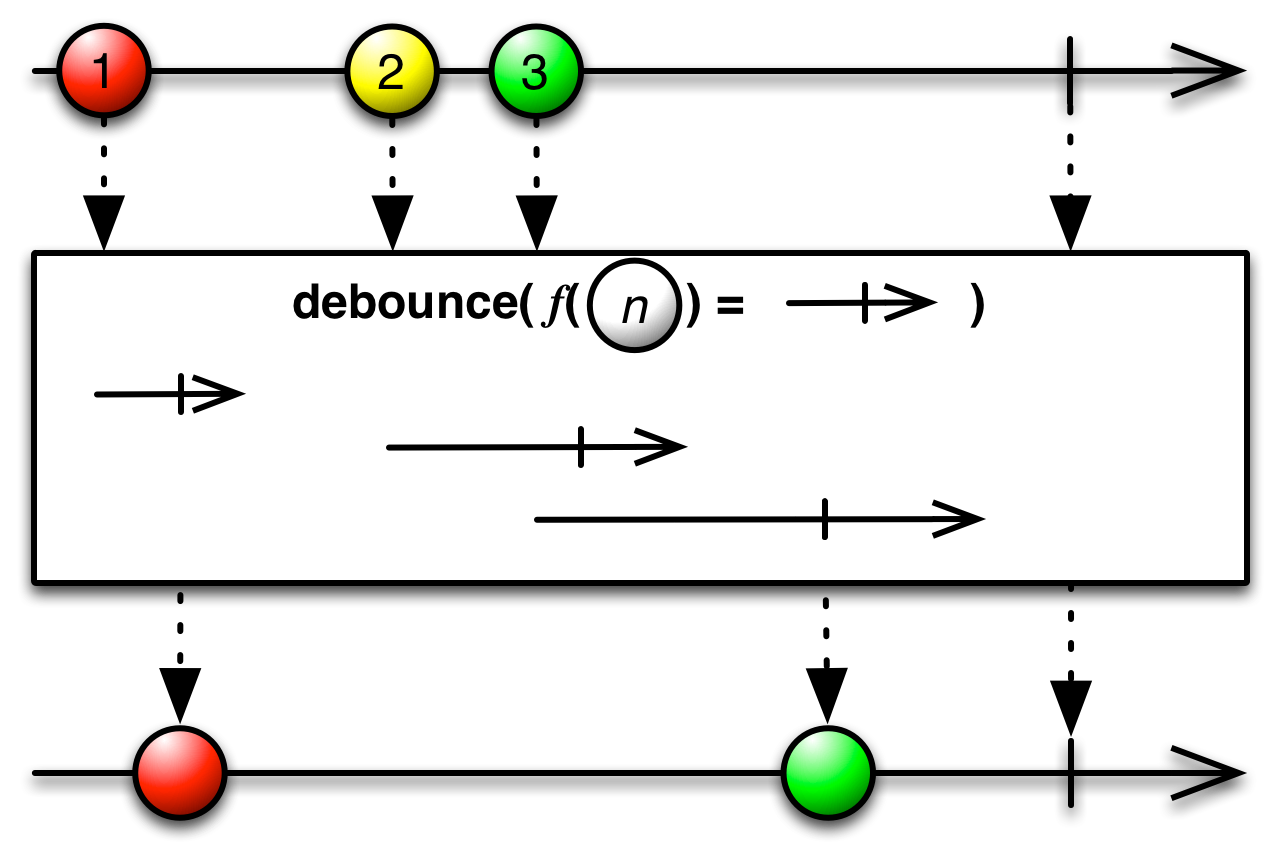
The delivery of the item happens on the thread of the first
onNextoronCompletesignal of the generatedObservableSourcesequence, which if takes too long, a newer item may arrive from the upstream, causing the generated sequence to get disposed, which may also interrupt any downstream blocking operation (yielding anInterruptedException). It is recommended processing items that may take long time to be moved to another thread viaobserveOn(io.reactivex.Scheduler)applied afterdebounceitself.- Scheduler:
- This version of
debouncedoes not operate by default on a particularScheduler.
- Type Parameters:
U- the debounce value type (ignored)- Parameters:
debounceSelector- function to retrieve a sequence that indicates the throttle duration for each item- Returns:
- an Observable that omits items emitted by the source ObservableSource that are followed by another item within a computed debounce duration
- See Also:
- ReactiveX operators documentation: Debounce
-
debounce
@CheckReturnValue @SchedulerSupport(value="io.reactivex:computation") public final Observable<T> debounce(long timeout, TimeUnit unit)
Returns an Observable that mirrors the source ObservableSource, except that it drops items emitted by the source ObservableSource that are followed by newer items before a timeout value expires. The timer resets on each emission.Note: If items keep being emitted by the source ObservableSource faster than the timeout then no items will be emitted by the resulting ObservableSource.
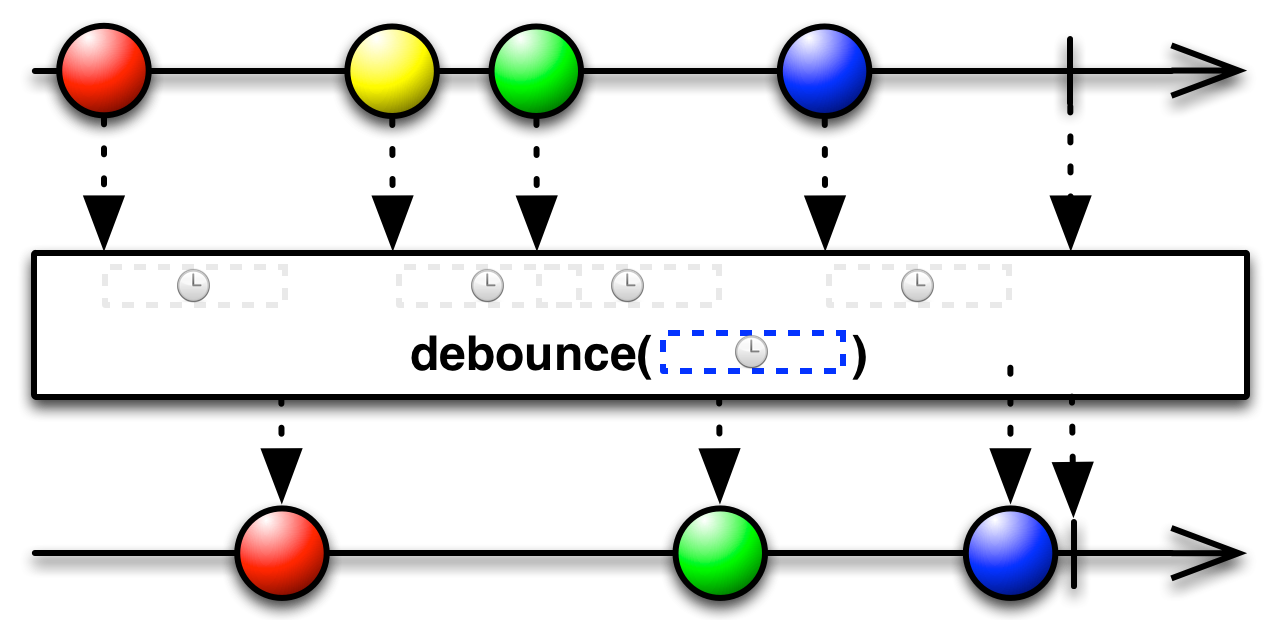
Delivery of the item after the grace period happens on the
computationScheduler'sWorkerwhich if takes too long, a newer item may arrive from the upstream, causing theWorker's task to get disposed, which may also interrupt any downstream blocking operation (yielding anInterruptedException). It is recommended processing items that may take long time to be moved to another thread viaobserveOn(io.reactivex.Scheduler)applied afterdebounceitself.- Scheduler:
debounceoperates by default on thecomputationScheduler.
- Parameters:
timeout- the length of the window of time that must pass after the emission of an item from the source ObservableSource in which that ObservableSource emits no items in order for the item to be emitted by the resulting ObservableSourceunit- the unit of time for the specifiedtimeout- Returns:
- an Observable that filters out items from the source ObservableSource that are too quickly followed by newer items
- See Also:
- ReactiveX operators documentation: Debounce,
throttleWithTimeout(long, TimeUnit)
-
debounce
@CheckReturnValue @SchedulerSupport(value="custom") public final Observable<T> debounce(long timeout, TimeUnit unit, Scheduler scheduler)
Returns an Observable that mirrors the source ObservableSource, except that it drops items emitted by the source ObservableSource that are followed by newer items before a timeout value expires on a specified Scheduler. The timer resets on each emission.Note: If items keep being emitted by the source ObservableSource faster than the timeout then no items will be emitted by the resulting ObservableSource.
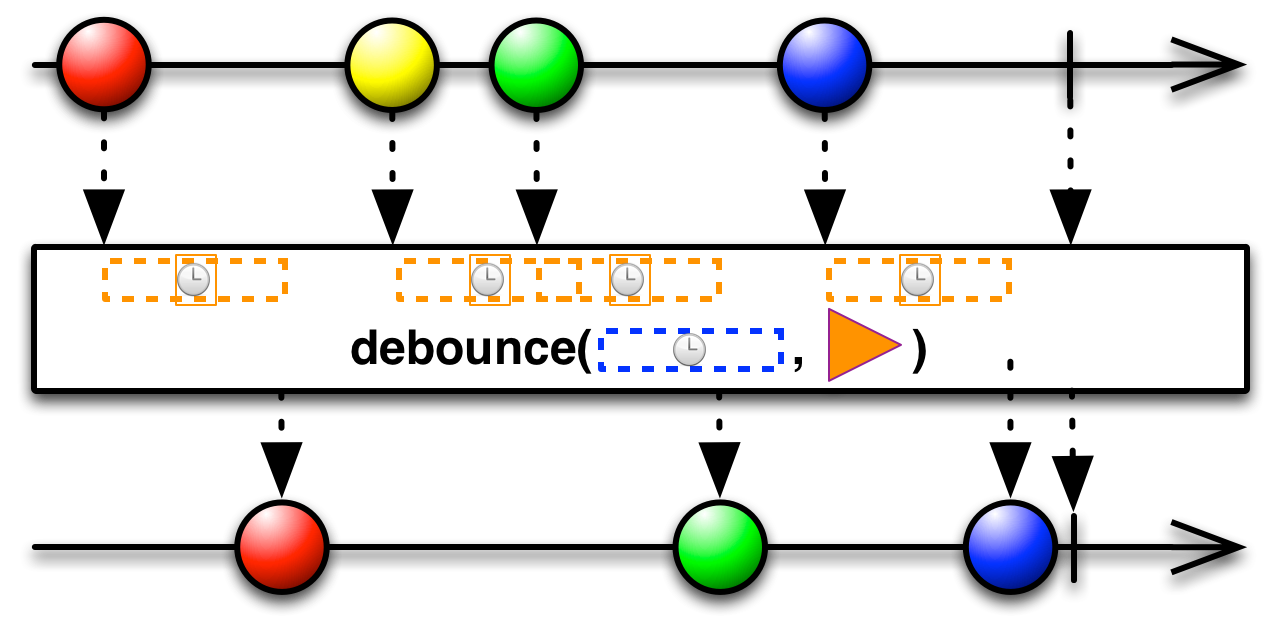
Delivery of the item after the grace period happens on the given
Scheduler'sWorkerwhich if takes too long, a newer item may arrive from the upstream, causing theWorker's task to get disposed, which may also interrupt any downstream blocking operation (yielding anInterruptedException). It is recommended processing items that may take long time to be moved to another thread viaobserveOn(io.reactivex.Scheduler)applied afterdebounceitself.- Scheduler:
- You specify which
Schedulerthis operator will use.
- Parameters:
timeout- the time each item has to be "the most recent" of those emitted by the source ObservableSource to ensure that it's not droppedunit- the unit of time for the specifiedtimeoutscheduler- theSchedulerto use internally to manage the timers that handle the timeout for each item- Returns:
- an Observable that filters out items from the source ObservableSource that are too quickly followed by newer items
- See Also:
- ReactiveX operators documentation: Debounce,
throttleWithTimeout(long, TimeUnit, Scheduler)
-
defaultIfEmpty
@CheckReturnValue @SchedulerSupport(value="none") public final Observable<T> defaultIfEmpty(T defaultItem)
Returns an Observable that emits the items emitted by the source ObservableSource or a specified default item if the source ObservableSource is empty.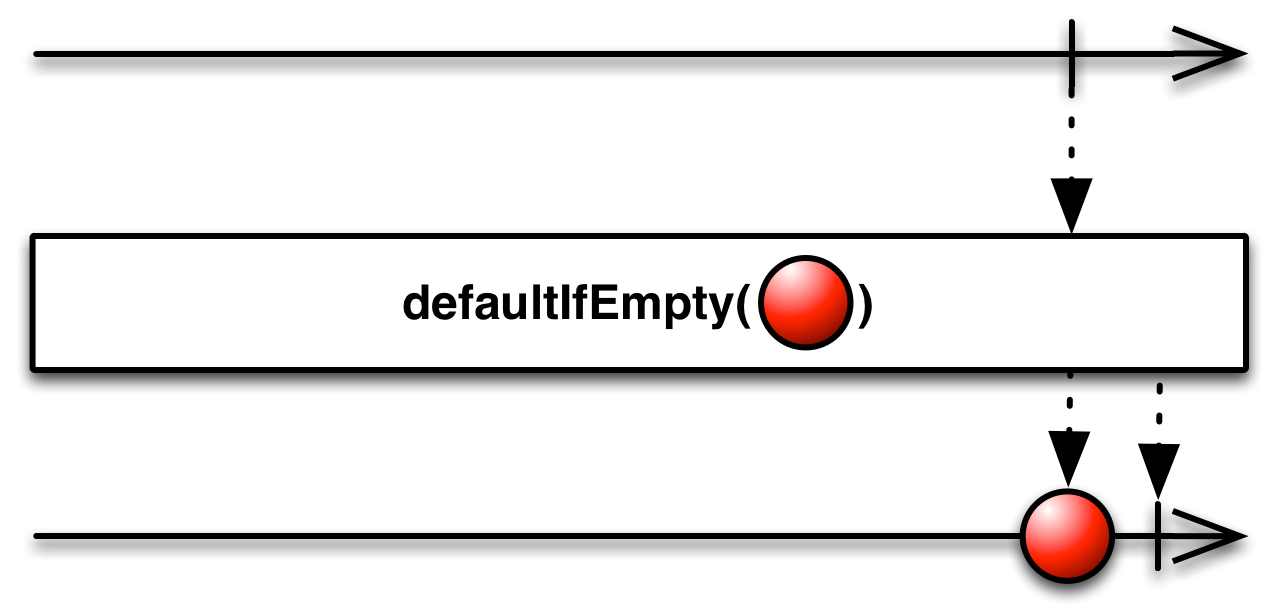
- Scheduler:
defaultIfEmptydoes not operate by default on a particularScheduler.
- Parameters:
defaultItem- the item to emit if the source ObservableSource emits no items- Returns:
- an Observable that emits either the specified default item if the source ObservableSource emits no items, or the items emitted by the source ObservableSource
- See Also:
- ReactiveX operators documentation: DefaultIfEmpty
-
delay
@CheckReturnValue @SchedulerSupport(value="none") public final <U> Observable<T> delay(Function<? super T,? extends ObservableSource<U>> itemDelay)
Returns an Observable that delays the emissions of the source ObservableSource via another ObservableSource on a per-item basis.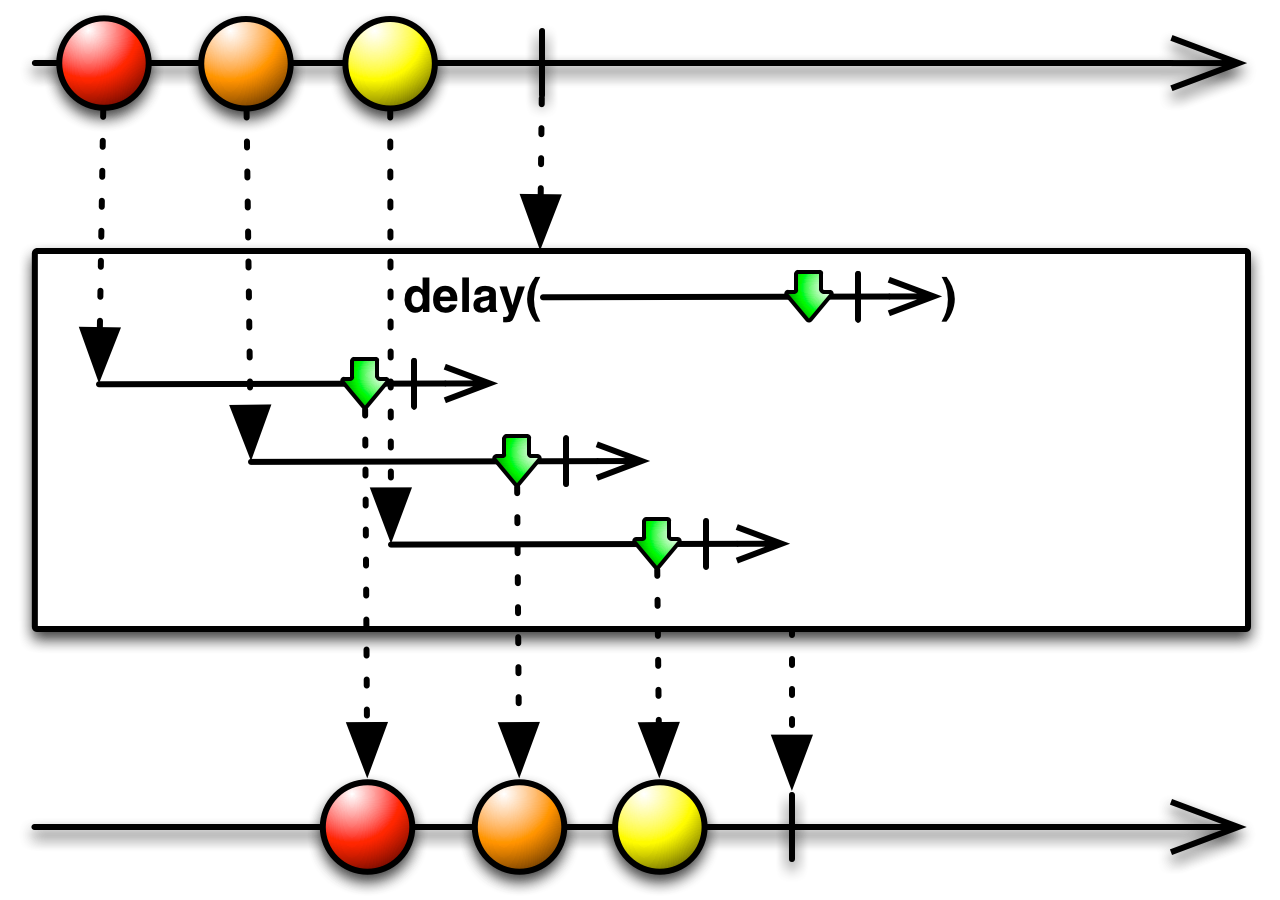
Note: the resulting ObservableSource will immediately propagate any
onErrornotification from the source ObservableSource.- Scheduler:
- This version of
delaydoes not operate by default on a particularScheduler.
- Type Parameters:
U- the item delay value type (ignored)- Parameters:
itemDelay- a function that returns an ObservableSource for each item emitted by the source ObservableSource, which is then used to delay the emission of that item by the resulting ObservableSource until the ObservableSource returned fromitemDelayemits an item- Returns:
- an Observable that delays the emissions of the source ObservableSource via another ObservableSource on a per-item basis
- See Also:
- ReactiveX operators documentation: Delay
-
delay
@CheckReturnValue @SchedulerSupport(value="io.reactivex:computation") public final Observable<T> delay(long delay, TimeUnit unit)
Returns an Observable that emits the items emitted by the source ObservableSource shifted forward in time by a specified delay. Error notifications from the source ObservableSource are not delayed.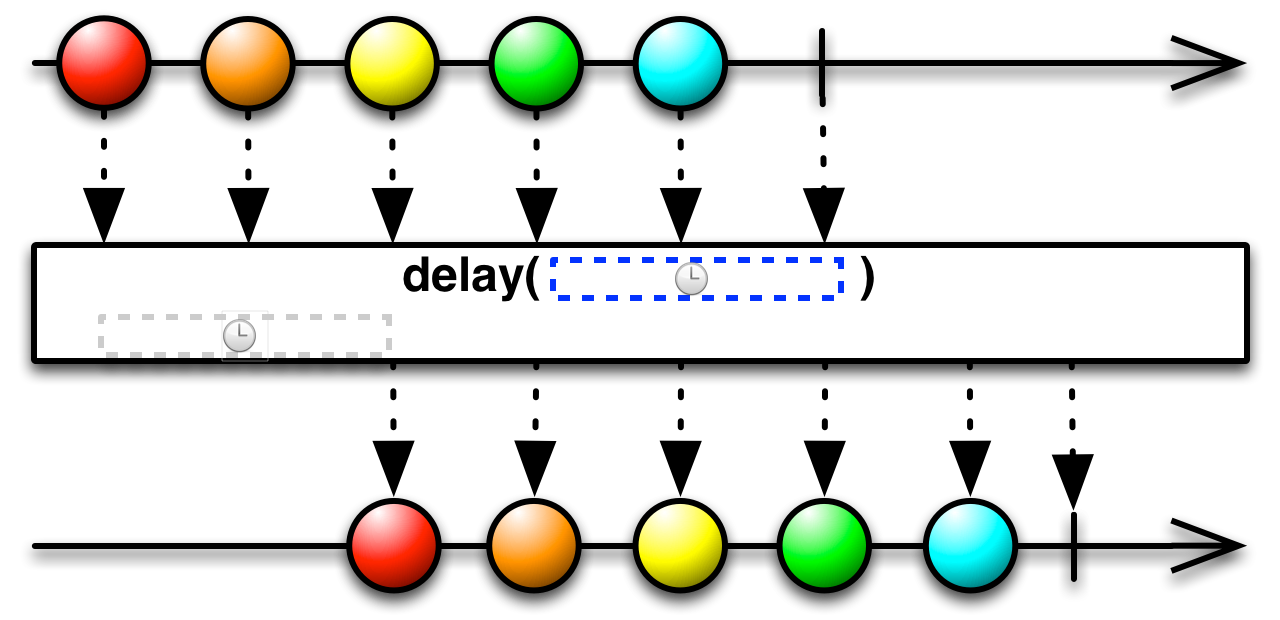
- Scheduler:
- This version of
delayoperates by default on thecomputationScheduler.
- Parameters:
delay- the delay to shift the source byunit- theTimeUnitin whichperiodis defined- Returns:
- the source ObservableSource shifted in time by the specified delay
- See Also:
- ReactiveX operators documentation: Delay
-
delay
@CheckReturnValue @SchedulerSupport(value="io.reactivex:computation") public final Observable<T> delay(long delay, TimeUnit unit, boolean delayError)
Returns an Observable that emits the items emitted by the source ObservableSource shifted forward in time by a specified delay. IfdelayErroris true, error notifications will also be delayed.
- Scheduler:
- This version of
delayoperates by default on thecomputationScheduler.
- Parameters:
delay- the delay to shift the source byunit- theTimeUnitin whichperiodis defineddelayError- if true, the upstream exception is signalled with the given delay, after all preceding normal elements, if false, the upstream exception is signalled immediately- Returns:
- the source ObservableSource shifted in time by the specified delay
- See Also:
- ReactiveX operators documentation: Delay
-
delay
@CheckReturnValue @SchedulerSupport(value="custom") public final Observable<T> delay(long delay, TimeUnit unit, Scheduler scheduler)
Returns an Observable that emits the items emitted by the source ObservableSource shifted forward in time by a specified delay. Error notifications from the source ObservableSource are not delayed.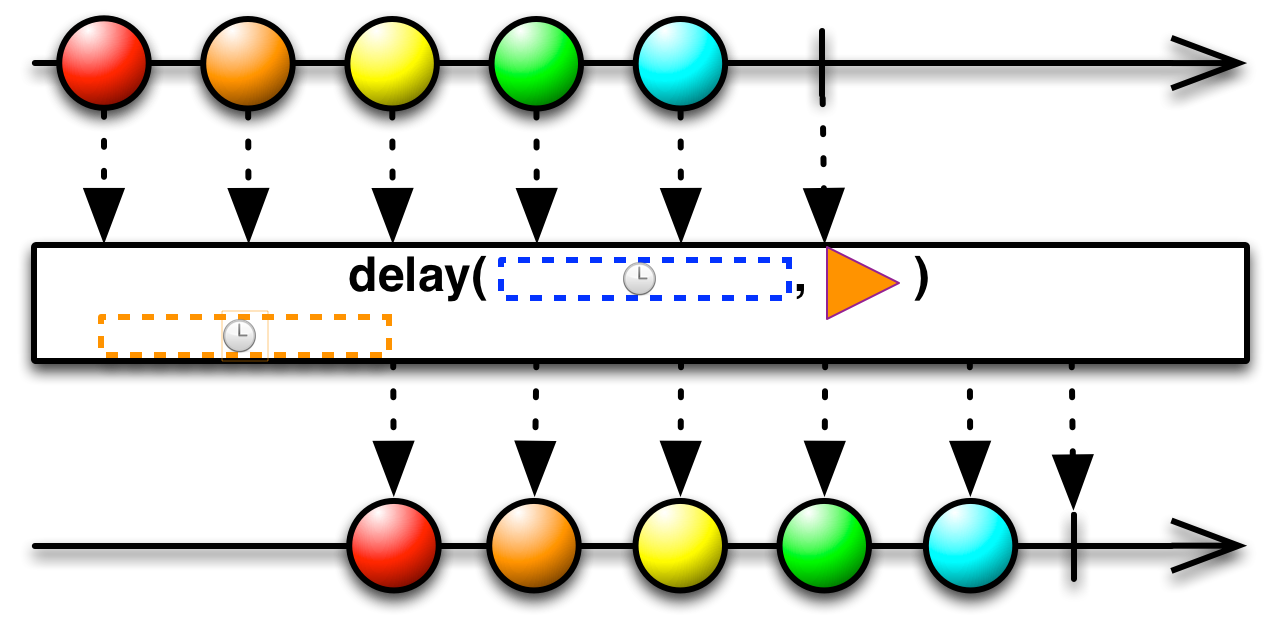
- Scheduler:
- You specify which
Schedulerthis operator will use.
- Parameters:
delay- the delay to shift the source byunit- the time unit ofdelayscheduler- theSchedulerto use for delaying- Returns:
- the source ObservableSource shifted in time by the specified delay
- See Also:
- ReactiveX operators documentation: Delay
-
delay
@CheckReturnValue @SchedulerSupport(value="custom") public final Observable<T> delay(long delay, TimeUnit unit, Scheduler scheduler, boolean delayError)
Returns an Observable that emits the items emitted by the source ObservableSource shifted forward in time by a specified delay. IfdelayErroris true, error notifications will also be delayed.
- Scheduler:
- You specify which
Schedulerthis operator will use.
- Parameters:
delay- the delay to shift the source byunit- the time unit ofdelayscheduler- theSchedulerto use for delayingdelayError- if true, the upstream exception is signalled with the given delay, after all preceding normal elements, if false, the upstream exception is signalled immediately- Returns:
- the source ObservableSource shifted in time by the specified delay
- See Also:
- ReactiveX operators documentation: Delay
-
delay
@CheckReturnValue @SchedulerSupport(value="none") public final <U,V> Observable<T> delay(ObservableSource<U> subscriptionDelay, Function<? super T,? extends ObservableSource<V>> itemDelay)
Returns an Observable that delays the subscription to and emissions from the source ObservableSource via another ObservableSource on a per-item basis.
Note: the resulting ObservableSource will immediately propagate any
onErrornotification from the source ObservableSource.- Scheduler:
- This version of
delaydoes not operate by default on a particularScheduler.
- Type Parameters:
U- the subscription delay value type (ignored)V- the item delay value type (ignored)- Parameters:
subscriptionDelay- a function that returns an ObservableSource that triggers the subscription to the source ObservableSource once it emits any itemitemDelay- a function that returns an ObservableSource for each item emitted by the source ObservableSource, which is then used to delay the emission of that item by the resulting ObservableSource until the ObservableSource returned fromitemDelayemits an item- Returns:
- an Observable that delays the subscription and emissions of the source ObservableSource via another ObservableSource on a per-item basis
- See Also:
- ReactiveX operators documentation: Delay
-
delaySubscription
@CheckReturnValue @SchedulerSupport(value="none") public final <U> Observable<T> delaySubscription(ObservableSource<U> other)
Returns an Observable that delays the subscription to this Observable until the other Observable emits an element or completes normally.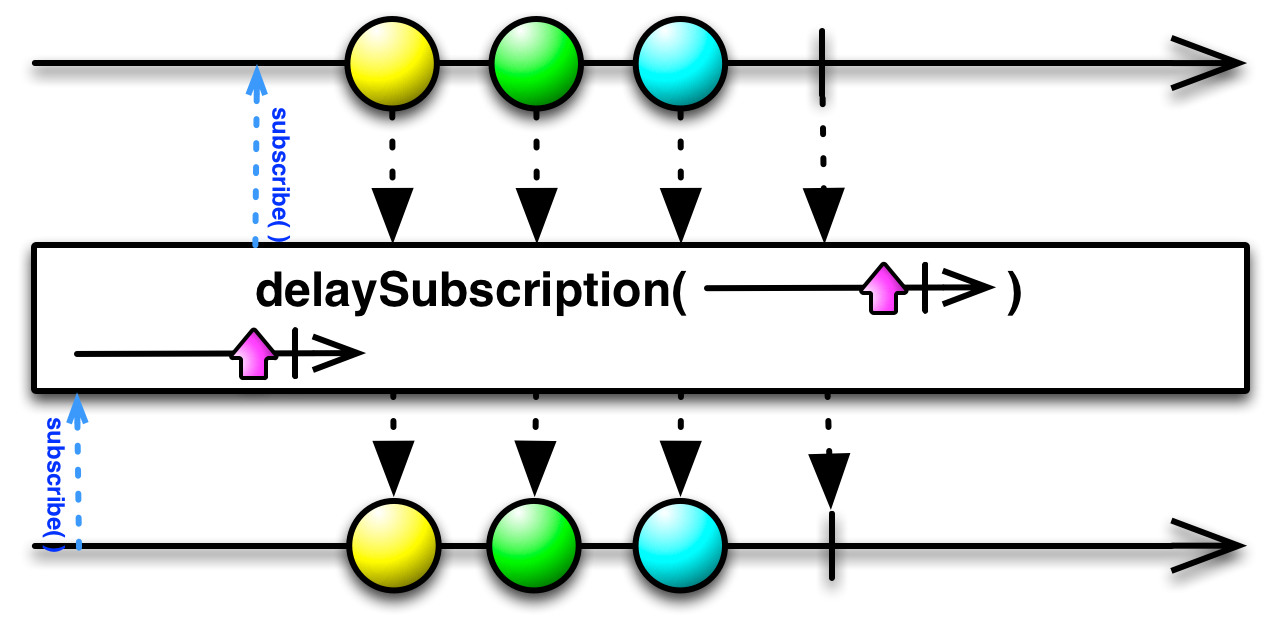
- Scheduler:
- This method does not operate by default on a particular
Scheduler.
- Type Parameters:
U- the value type of the other Observable, irrelevant- Parameters:
other- the other Observable that should trigger the subscription to this Observable.- Returns:
- an Observable that delays the subscription to this Observable until the other Observable emits an element or completes normally.
- Since:
- 2.0
-
delaySubscription
@CheckReturnValue @SchedulerSupport(value="io.reactivex:computation") public final Observable<T> delaySubscription(long delay, TimeUnit unit)
Returns an Observable that delays the subscription to the source ObservableSource by a given amount of time.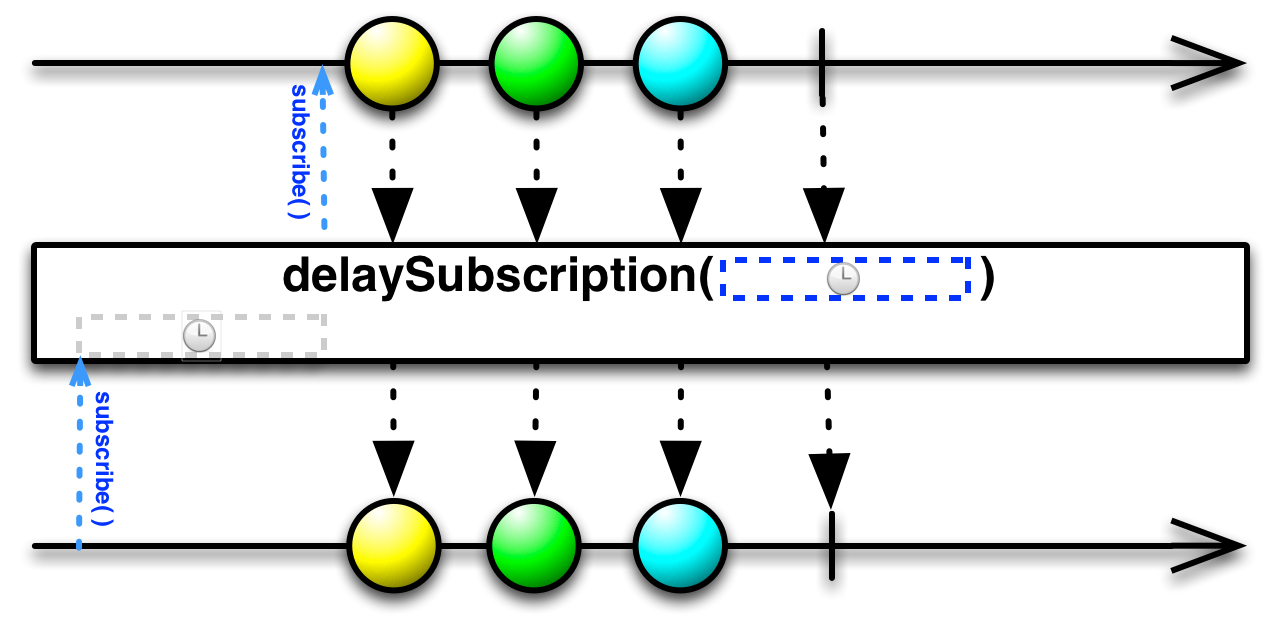
- Scheduler:
- This version of
delaySubscriptionoperates by default on thecomputationScheduler.
- Parameters:
delay- the time to delay the subscriptionunit- the time unit ofdelay- Returns:
- an Observable that delays the subscription to the source ObservableSource by the given amount
- See Also:
- ReactiveX operators documentation: Delay
-
delaySubscription
@CheckReturnValue @SchedulerSupport(value="custom") public final Observable<T> delaySubscription(long delay, TimeUnit unit, Scheduler scheduler)
Returns an Observable that delays the subscription to the source ObservableSource by a given amount of time, both waiting and subscribing on a given Scheduler.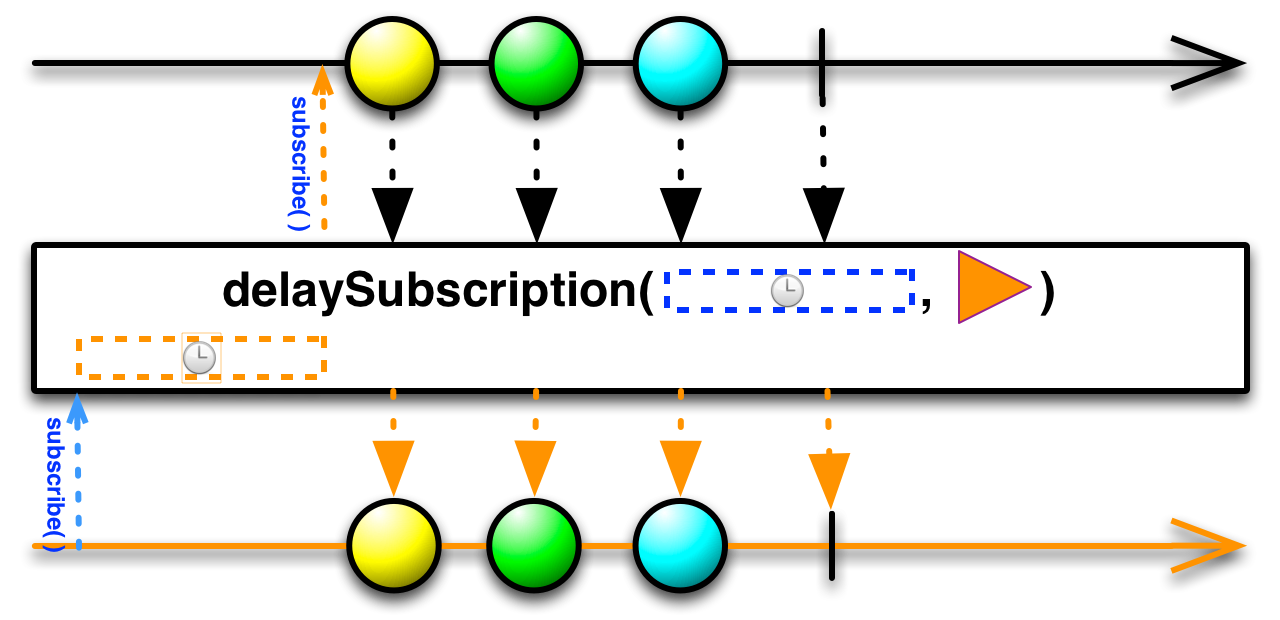
- Scheduler:
- You specify which
Schedulerthis operator will use.
- Parameters:
delay- the time to delay the subscriptionunit- the time unit ofdelayscheduler- the Scheduler on which the waiting and subscription will happen- Returns:
- an Observable that delays the subscription to the source ObservableSource by a given amount, waiting and subscribing on the given Scheduler
- See Also:
- ReactiveX operators documentation: Delay
-
dematerialize
@CheckReturnValue @SchedulerSupport(value="none") @Deprecated public final <T2> Observable<T2> dematerialize()
Deprecated. in 2.2.4; inherently type-unsafe as it overrides the output generic type. Usedematerialize(Function)instead.Returns an Observable that reverses the effect ofmaterializeby transforming theNotificationobjects emitted by the source ObservableSource into the items or notifications they represent.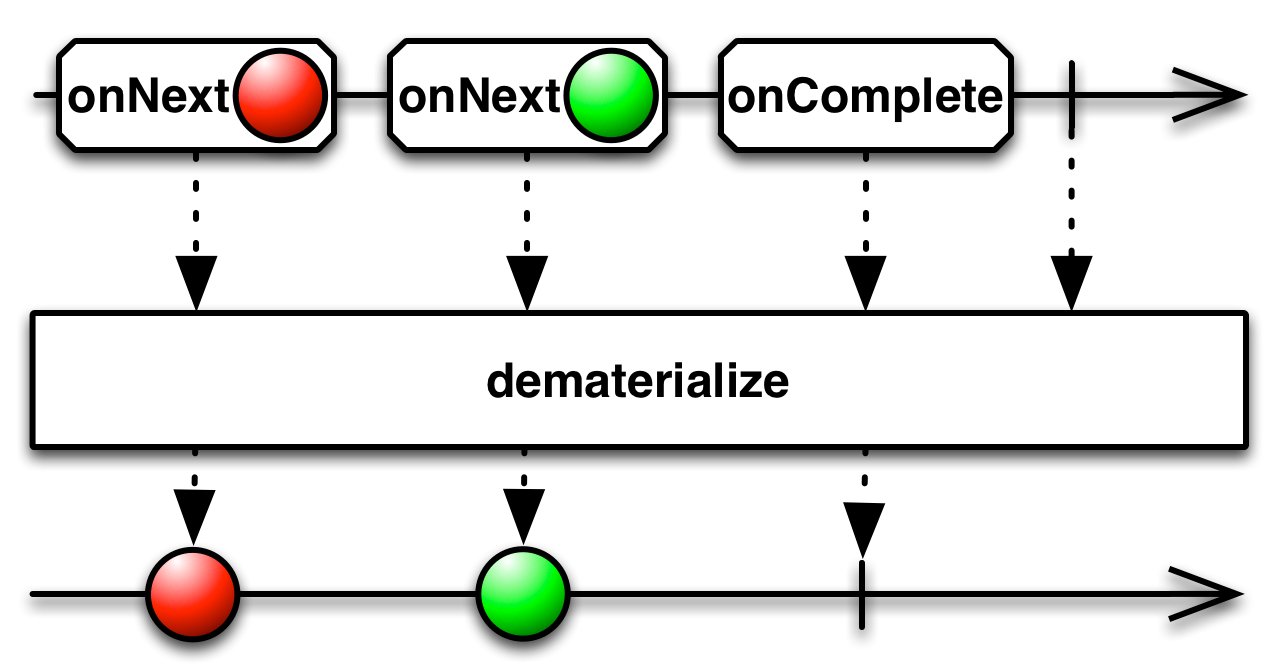
When the upstream signals an
onErrororonCompleteitem, the returned Observable disposes of the flow and terminates with that type of terminal event:
If the upstream signalsObservable.just(createOnNext(1), createOnComplete(), createOnNext(2)) .doOnDispose(() -> System.out.println("Disposed!")); .dematerialize() .test() .assertResult(1);onErrororonCompletedirectly, the flow is terminated with the same event.
If this behavior is not desired, the completion can be suppressed by applyingObservable.just(createOnNext(1), createOnNext(2)) .dematerialize() .test() .assertResult(1, 2);concatWith(ObservableSource)with anever()source.- Scheduler:
dematerializedoes not operate by default on a particularScheduler.
- Type Parameters:
T2- the output value type- Returns:
- an Observable that emits the items and notifications embedded in the
Notificationobjects emitted by the source ObservableSource - See Also:
- ReactiveX operators documentation: Dematerialize,
dematerialize(Function)
-
dematerialize
@CheckReturnValue @SchedulerSupport(value="none") public final <R> Observable<R> dematerialize(Function<? super T,Notification<R>> selector)
Returns an Observable that reverses the effect ofmaterializeby transforming theNotificationobjects extracted from the source items via a selector function into their respectiveObserversignal types.
The intended use of the
selectorfunction is to perform a type-safe identity mapping (see example) on a source that is already of typeNotification<T>. The Java language doesn't allow limiting instance methods to a certain generic argument shape, therefore, a function is used to ensure the conversion remains type safe.When the upstream signals an
onErrororonCompleteitem, the returned Observable disposes of the flow and terminates with that type of terminal event:
If the upstream signalsObservable.just(createOnNext(1), createOnComplete(), createOnNext(2)) .doOnDispose(() -> System.out.println("Disposed!")); .dematerialize(notification -> notification) .test() .assertResult(1);onErrororonCompletedirectly, the flow is terminated with the same event.
If this behavior is not desired, the completion can be suppressed by applyingObservable.just(createOnNext(1), createOnNext(2)) .dematerialize(notification -> notification) .test() .assertResult(1, 2);concatWith(ObservableSource)with anever()source.- Scheduler:
dematerializedoes not operate by default on a particularScheduler.
- Type Parameters:
R- the output value type- Parameters:
selector- function that returns the upstream item and should return a Notification to signal the correspondingObserverevent to the downstream.- Returns:
- an Observable that emits the items and notifications embedded in the
Notificationobjects selected from the items emitted by the source ObservableSource - Since:
- 2.2.4 - experimental
- See Also:
- ReactiveX operators documentation: Dematerialize
-
distinct
@CheckReturnValue @SchedulerSupport(value="none") public final Observable<T> distinct()
Returns an Observable that emits all items emitted by the source ObservableSource that are distinct based onObject.equals(Object)comparison.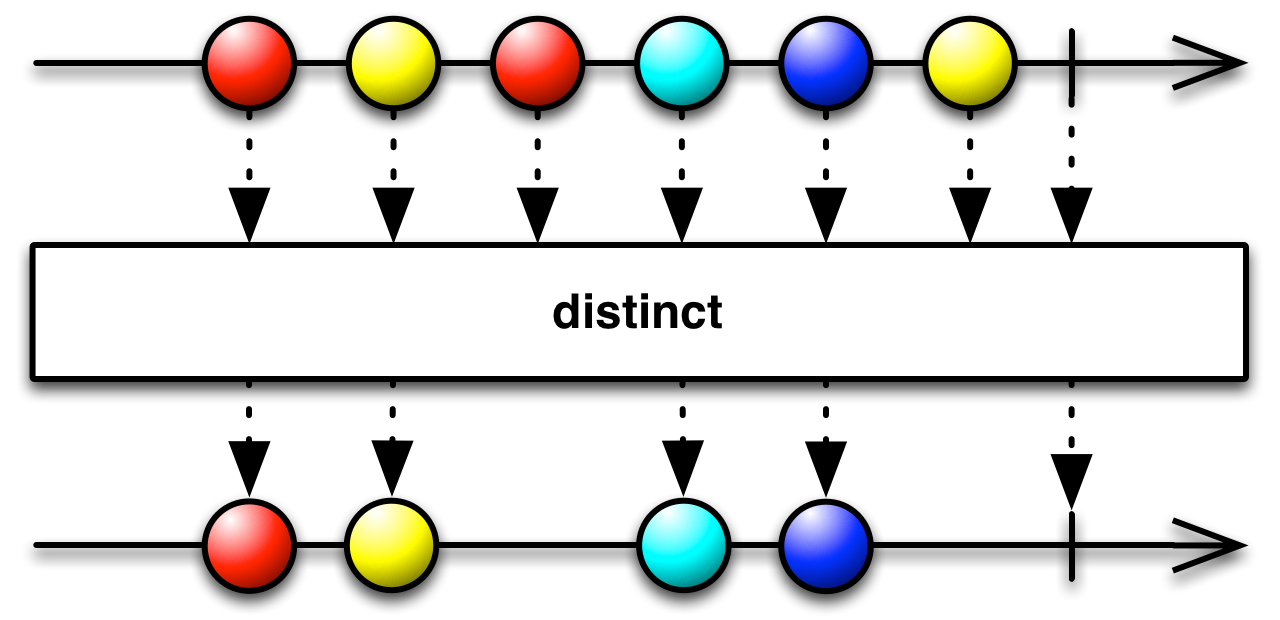
It is recommended the elements' class
Tin the flow overrides the defaultObject.equals()andObject.hashCode()to provide meaningful comparison between items as the default Java implementation only considers reference equivalence.By default,
distinct()uses an internalHashSetper Observer to remember previously seen items and usesSet.add(Object)returningfalseas the indicator for duplicates.Note that this internal
HashSetmay grow unbounded as items won't be removed from it by the operator. Therefore, using very long or infinite upstream (with very distinct elements) may lead toOutOfMemoryError.Customizing the retention policy can happen only by providing a custom
Collectionimplementation to thedistinct(Function, Callable)overload.- Scheduler:
distinctdoes not operate by default on a particularScheduler.
- Returns:
- an Observable that emits only those items emitted by the source ObservableSource that are distinct from each other
- See Also:
- ReactiveX operators documentation: Distinct,
distinct(Function),distinct(Function, Callable)
-
distinct
@CheckReturnValue @SchedulerSupport(value="none") public final <K> Observable<T> distinct(Function<? super T,K> keySelector)
Returns an Observable that emits all items emitted by the source ObservableSource that are distinct according to a key selector function and based onObject.equals(Object)comparison of the objects returned by the key selector function.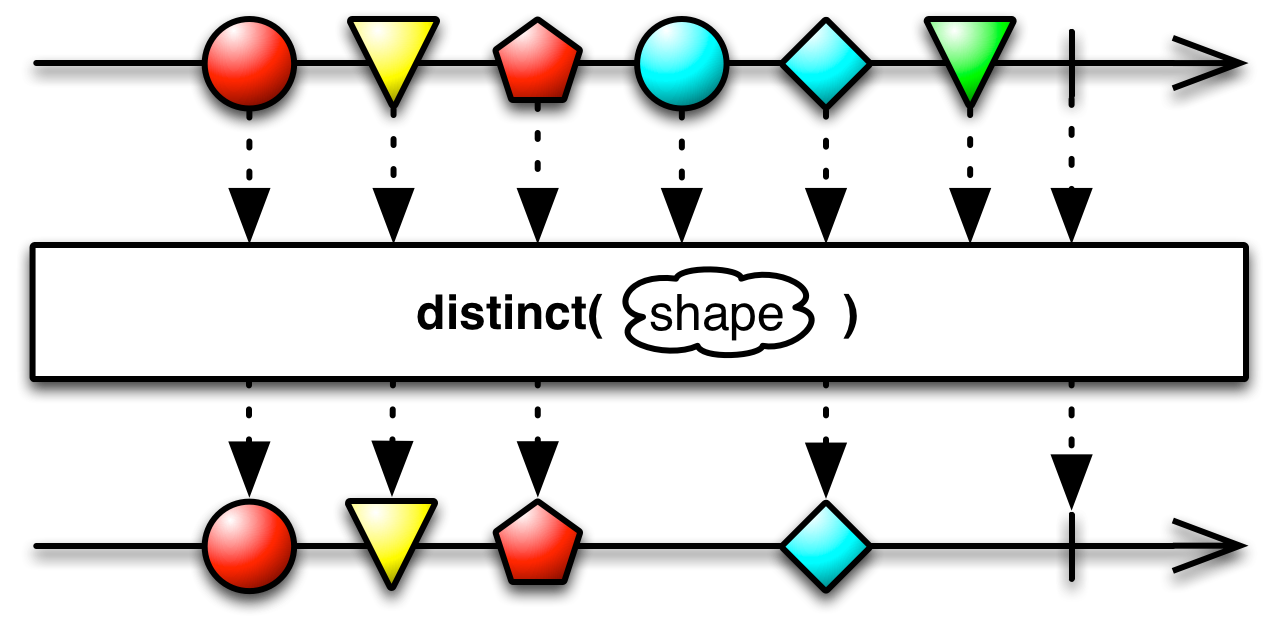
It is recommended the keys' class
Koverrides the defaultObject.equals()andObject.hashCode()to provide meaningful comparison between the key objects as the default Java implementation only considers reference equivalence.By default,
distinct()uses an internalHashSetper Observer to remember previously seen keys and usesSet.add(Object)returningfalseas the indicator for duplicates.Note that this internal
HashSetmay grow unbounded as keys won't be removed from it by the operator. Therefore, using very long or infinite upstream (with very distinct keys) may lead toOutOfMemoryError.Customizing the retention policy can happen only by providing a custom
Collectionimplementation to thedistinct(Function, Callable)overload.- Scheduler:
distinctdoes not operate by default on a particularScheduler.
- Type Parameters:
K- the key type- Parameters:
keySelector- a function that projects an emitted item to a key value that is used to decide whether an item is distinct from another one or not- Returns:
- an Observable that emits those items emitted by the source ObservableSource that have distinct keys
- See Also:
- ReactiveX operators documentation: Distinct,
distinct(Function, Callable)
-
distinct
@CheckReturnValue @SchedulerSupport(value="none") public final <K> Observable<T> distinct(Function<? super T,K> keySelector, Callable<? extends Collection<? super K>> collectionSupplier)
Returns an Observable that emits all items emitted by the source ObservableSource that are distinct according to a key selector function and based onObject.equals(Object)comparison of the objects returned by the key selector function.
It is recommended the keys' class
Koverrides the defaultObject.equals()andObject.hashCode()to provide meaningful comparison between the key objects as the default Java implementation only considers reference equivalence.- Scheduler:
distinctdoes not operate by default on a particularScheduler.
- Type Parameters:
K- the key type- Parameters:
keySelector- a function that projects an emitted item to a key value that is used to decide whether an item is distinct from another one or notcollectionSupplier- function called for each individual Observer to return a Collection subtype for holding the extracted keys and whose add() method's return indicates uniqueness.- Returns:
- an Observable that emits those items emitted by the source ObservableSource that have distinct keys
- See Also:
- ReactiveX operators documentation: Distinct
-
distinctUntilChanged
@CheckReturnValue @SchedulerSupport(value="none") public final Observable<T> distinctUntilChanged()
Returns an Observable that emits all items emitted by the source ObservableSource that are distinct from their immediate predecessors based onObject.equals(Object)comparison.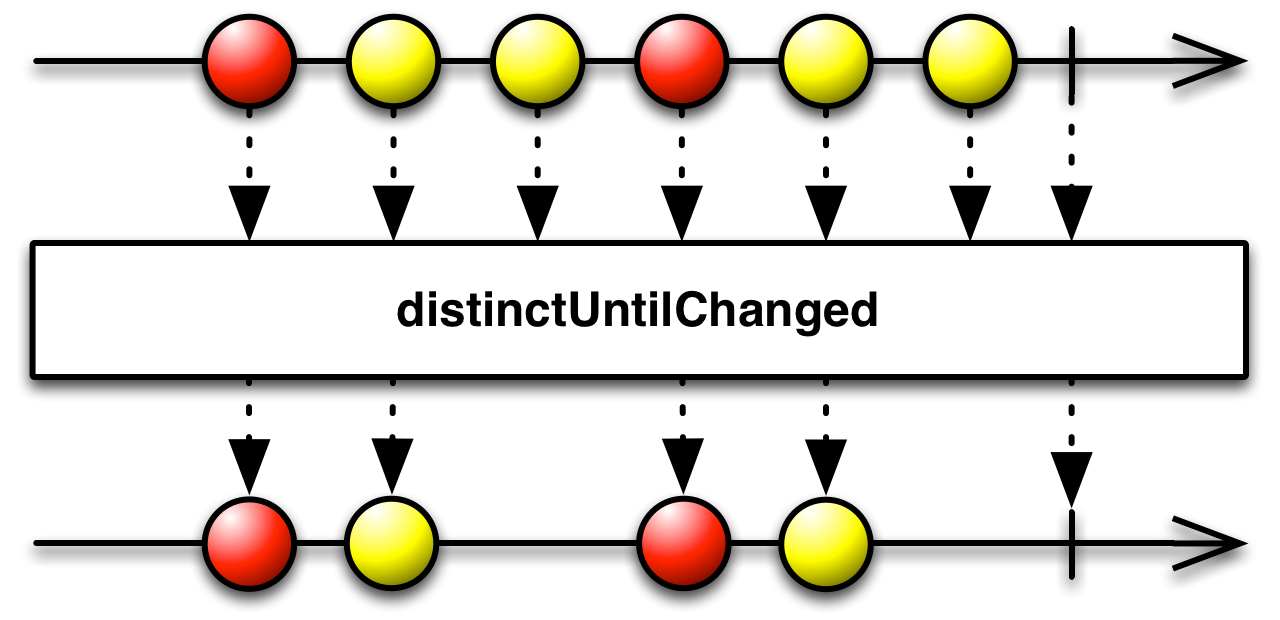
It is recommended the elements' class
Tin the flow overrides the defaultObject.equals()to provide meaningful comparison between items as the default Java implementation only considers reference equivalence. Alternatively, use thedistinctUntilChanged(BiPredicate)overload and provide a comparison function in case the classTcan't be overridden with customequals()or the comparison itself should happen on different terms or properties of the classT.Note that the operator always retains the latest item from upstream regardless of the comparison result and uses it in the next comparison with the next upstream item.
Note that if element type
Tin the flow is mutable, the comparison of the previous and current item may yield unexpected results if the items are mutated externally. Common cases are mutableCharSequences orLists where the objects will actually have the same references when they are modified anddistinctUntilChangedwill evaluate subsequent items as same. To avoid such situation, it is recommended that mutable data is converted to an immutable one, for example usingmap(CharSequence::toString)ormap(list -> Collections.unmodifiableList(new ArrayList<>(list))).- Scheduler:
distinctUntilChangeddoes not operate by default on a particularScheduler.
- Returns:
- an Observable that emits those items from the source ObservableSource that are distinct from their immediate predecessors
- See Also:
- ReactiveX operators documentation: Distinct,
distinctUntilChanged(BiPredicate)
-
distinctUntilChanged
@CheckReturnValue @SchedulerSupport(value="none") public final <K> Observable<T> distinctUntilChanged(Function<? super T,K> keySelector)
Returns an Observable that emits all items emitted by the source ObservableSource that are distinct from their immediate predecessors, according to a key selector function and based onObject.equals(Object)comparison of those objects returned by the key selector function.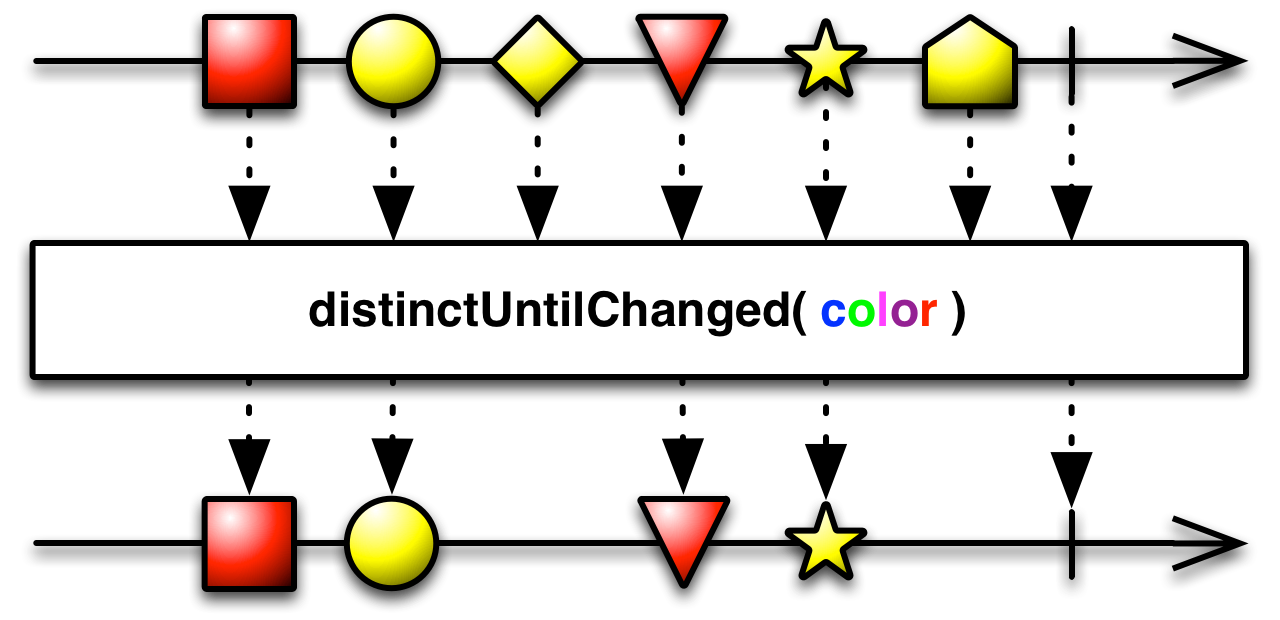
It is recommended the keys' class
Koverrides the defaultObject.equals()to provide meaningful comparison between the key objects as the default Java implementation only considers reference equivalence. Alternatively, use thedistinctUntilChanged(BiPredicate)overload and provide a comparison function in case the classKcan't be overridden with customequals()or the comparison itself should happen on different terms or properties of the item classT(for which the keys can be derived via a similar selector).Note that the operator always retains the latest key from upstream regardless of the comparison result and uses it in the next comparison with the next key derived from the next upstream item.
Note that if element type
Tin the flow is mutable, the comparison of the previous and current item may yield unexpected results if the items are mutated externally. Common cases are mutableCharSequences orLists where the objects will actually have the same references when they are modified anddistinctUntilChangedwill evaluate subsequent items as same. To avoid such situation, it is recommended that mutable data is converted to an immutable one, for example usingmap(CharSequence::toString)ormap(list -> Collections.unmodifiableList(new ArrayList<>(list))).- Scheduler:
distinctUntilChangeddoes not operate by default on a particularScheduler.
- Type Parameters:
K- the key type- Parameters:
keySelector- a function that projects an emitted item to a key value that is used to decide whether an item is distinct from another one or not- Returns:
- an Observable that emits those items from the source ObservableSource whose keys are distinct from those of their immediate predecessors
- See Also:
- ReactiveX operators documentation: Distinct
-
distinctUntilChanged
@CheckReturnValue @SchedulerSupport(value="none") public final Observable<T> distinctUntilChanged(BiPredicate<? super T,? super T> comparer)
Returns an Observable that emits all items emitted by the source ObservableSource that are distinct from their immediate predecessors when compared with each other via the provided comparator function.
Note that the operator always retains the latest item from upstream regardless of the comparison result and uses it in the next comparison with the next upstream item.
Note that if element type
Tin the flow is mutable, the comparison of the previous and current item may yield unexpected results if the items are mutated externally. Common cases are mutableCharSequences orLists where the objects will actually have the same references when they are modified anddistinctUntilChangedwill evaluate subsequent items as same. To avoid such situation, it is recommended that mutable data is converted to an immutable one, for example usingmap(CharSequence::toString)ormap(list -> Collections.unmodifiableList(new ArrayList<>(list))).- Scheduler:
distinctUntilChangeddoes not operate by default on a particularScheduler.
- Parameters:
comparer- the function that receives the previous item and the current item and is expected to return true if the two are equal, thus skipping the current value.- Returns:
- an Observable that emits those items from the source ObservableSource that are distinct from their immediate predecessors
- Since:
- 2.0
- See Also:
- ReactiveX operators documentation: Distinct
-
doAfterNext
@CheckReturnValue @SchedulerSupport(value="none") public final Observable<T> doAfterNext(Consumer<? super T> onAfterNext)
Calls the specified consumer with the current item after this item has been emitted to the downstream.Note that the
onAfterNextaction is shared between subscriptions and as such should be thread-safe.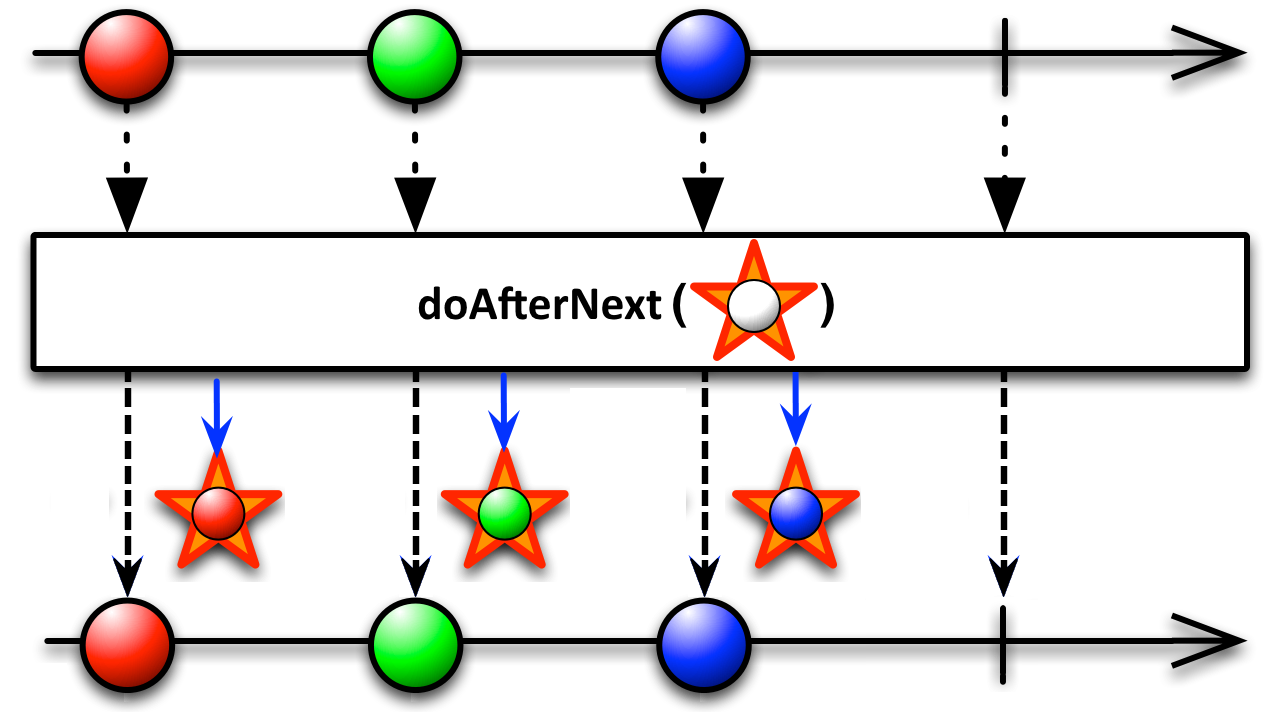
- Scheduler:
doAfterNextdoes not operate by default on a particularScheduler.- Operator-fusion:
- This operator supports boundary-limited synchronous or asynchronous queue-fusion.
History: 2.0.1 - experimental
- Parameters:
onAfterNext- the Consumer that will be called after emitting an item from upstream to the downstream- Returns:
- the new Observable instance
- Since:
- 2.1
-
doAfterTerminate
@CheckReturnValue @SchedulerSupport(value="none") public final Observable<T> doAfterTerminate(Action onFinally)
Registers anActionto be called when this ObservableSource invokes eitheronCompleteoronError.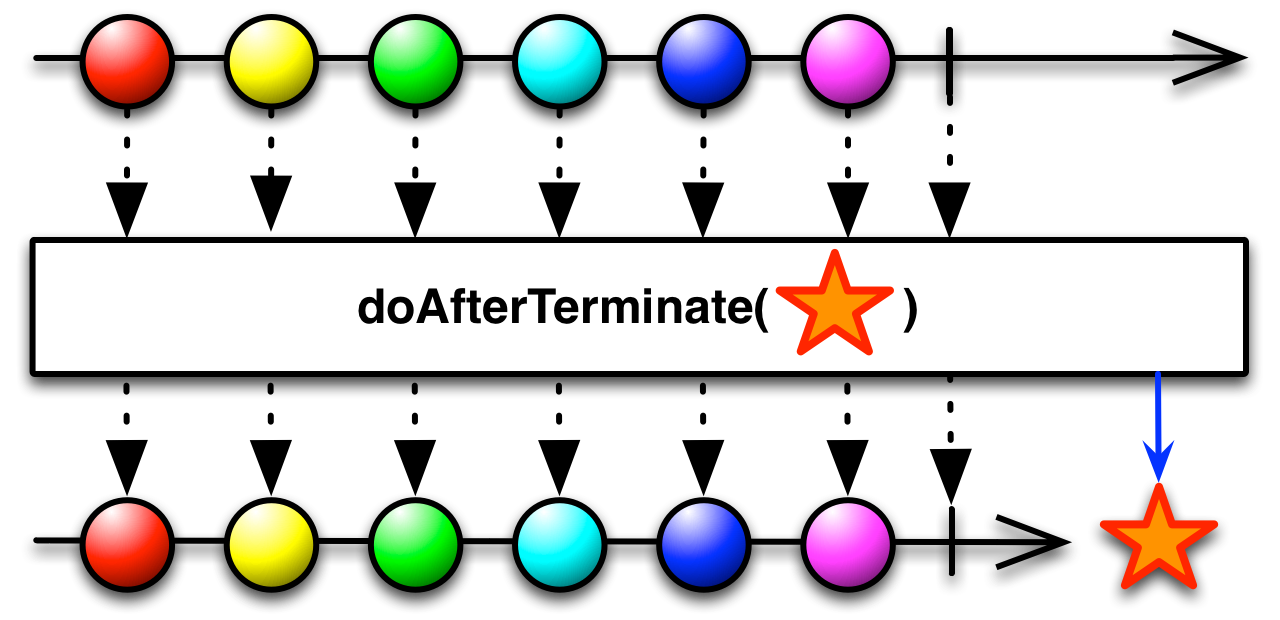
- Scheduler:
doAfterTerminatedoes not operate by default on a particularScheduler.
- Parameters:
onFinally- anActionto be invoked when the source ObservableSource finishes- Returns:
- an Observable that emits the same items as the source ObservableSource, then invokes the
Action - See Also:
- ReactiveX operators documentation: Do,
doOnTerminate(Action)
-
doFinally
@CheckReturnValue @SchedulerSupport(value="none") public final Observable<T> doFinally(Action onFinally)
Calls the specified action after this Observable signals onError or onCompleted or gets disposed by the downstream.In case of a race between a terminal event and a dispose call, the provided
onFinallyaction is executed once per subscription.Note that the
onFinallyaction is shared between subscriptions and as such should be thread-safe.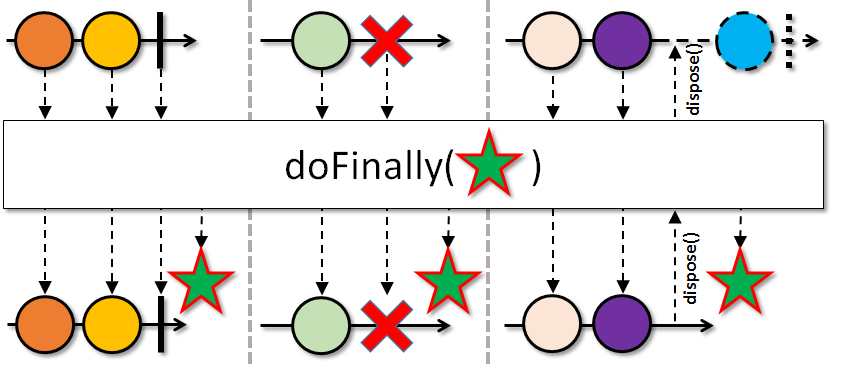
- Scheduler:
doFinallydoes not operate by default on a particularScheduler.- Operator-fusion:
- This operator supports boundary-limited synchronous or asynchronous queue-fusion.
History: 2.0.1 - experimental
- Parameters:
onFinally- the action called when this Observable terminates or gets disposed- Returns:
- the new Observable instance
- Since:
- 2.1
-
doOnDispose
@CheckReturnValue @SchedulerSupport(value="none") public final Observable<T> doOnDispose(Action onDispose)
Calls the disposeActionif the downstream disposes the sequence.The action is shared between subscriptions and thus may be called concurrently from multiple threads; the action must be thread safe.
If the action throws a runtime exception, that exception is rethrown by the
dispose()call, sometimes as aCompositeExceptionif there were multiple exceptions along the way.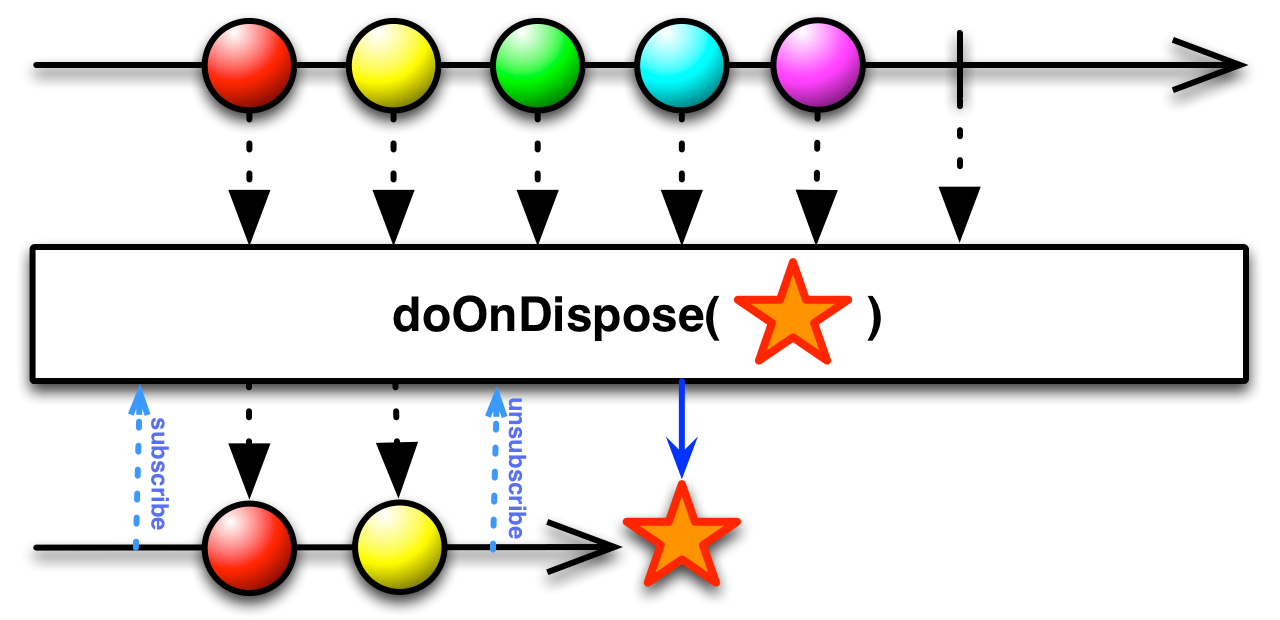
- Scheduler:
doOnDisposedoes not operate by default on a particularScheduler.
- Parameters:
onDispose- the action that gets called when the sourceObservableSource's Disposable is disposed- Returns:
- the source
ObservableSourcemodified so as to call this Action when appropriate - Throws:
NullPointerException- if onDispose is null- See Also:
- ReactiveX operators documentation: Do
-
doOnComplete
@CheckReturnValue @SchedulerSupport(value="none") public final Observable<T> doOnComplete(Action onComplete)
Modifies the source ObservableSource so that it invokes an action when it callsonComplete.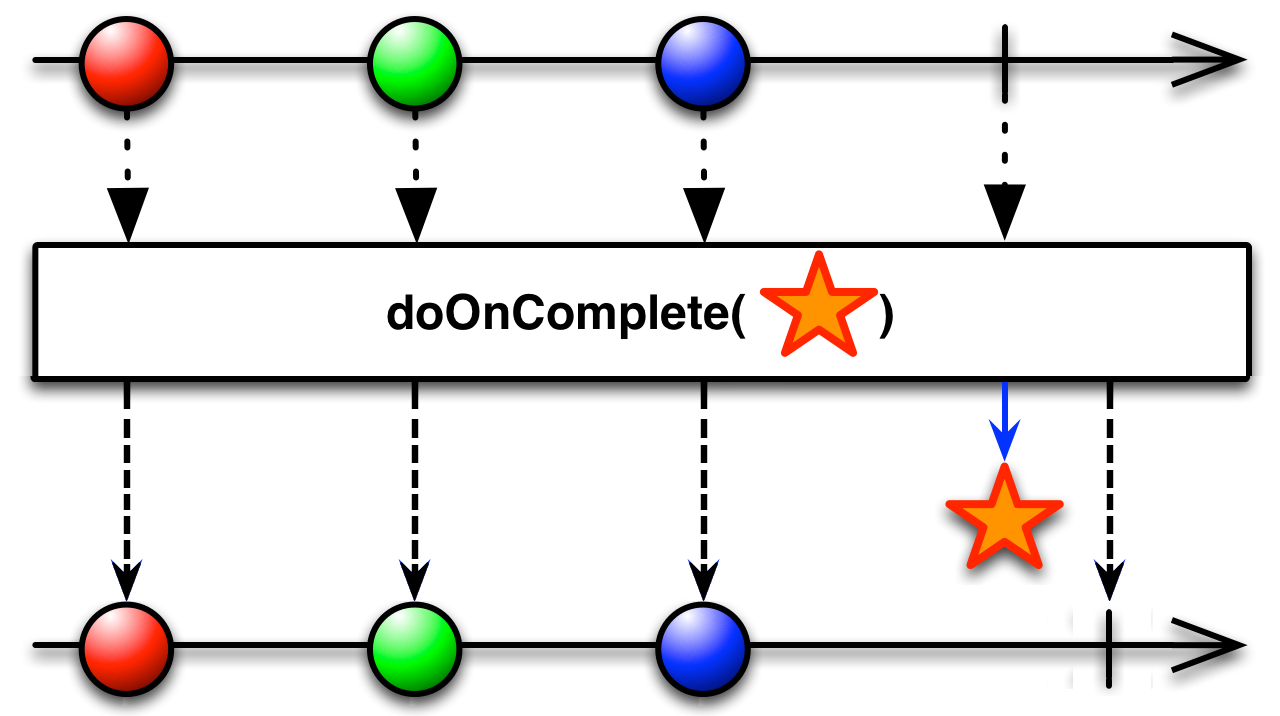
- Scheduler:
doOnCompletedoes not operate by default on a particularScheduler.
- Parameters:
onComplete- the action to invoke when the source ObservableSource callsonComplete- Returns:
- the source ObservableSource with the side-effecting behavior applied
- See Also:
- ReactiveX operators documentation: Do
-
doOnEach
@CheckReturnValue @SchedulerSupport(value="none") public final Observable<T> doOnEach(Consumer<? super Notification<T>> onNotification)
Modifies the source ObservableSource so that it invokes an action for each item it emits.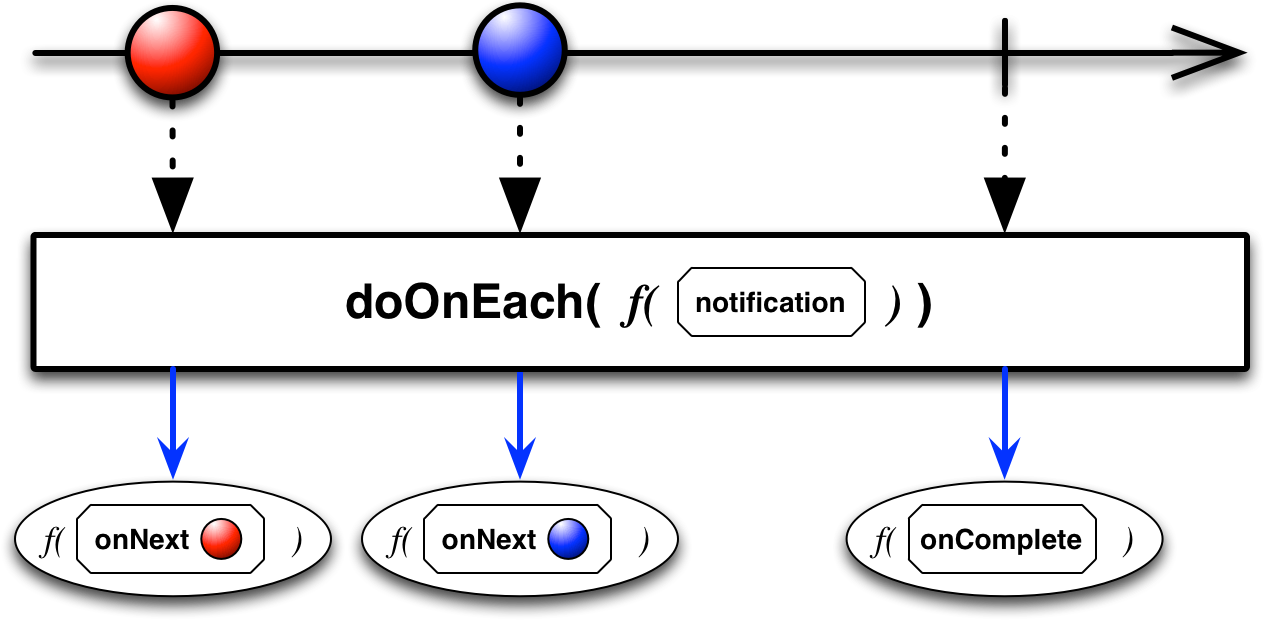
- Scheduler:
doOnEachdoes not operate by default on a particularScheduler.
- Parameters:
onNotification- the action to invoke for each item emitted by the source ObservableSource- Returns:
- the source ObservableSource with the side-effecting behavior applied
- See Also:
- ReactiveX operators documentation: Do
-
doOnEach
@CheckReturnValue @SchedulerSupport(value="none") public final Observable<T> doOnEach(Observer<? super T> observer)
Modifies the source ObservableSource so that it notifies an Observer for each item and terminal event it emits.In case the
onErrorof the supplied observer throws, the downstream will receive a composite exception containing the original exception and the exception thrown byonError. If either theonNextor theonCompletemethod of the supplied observer throws, the downstream will be terminated and will receive this thrown exception.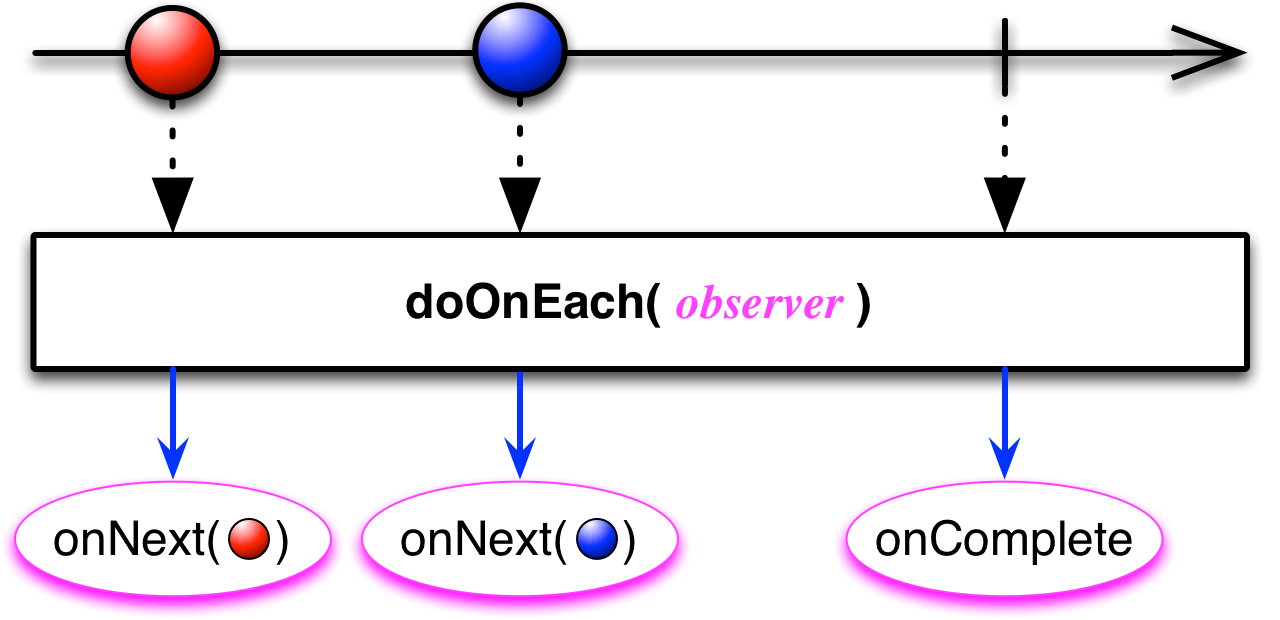
- Scheduler:
doOnEachdoes not operate by default on a particularScheduler.
- Parameters:
observer- the observer to be notified about onNext, onError and onComplete events on its respective methods before the actual downstream Observer gets notified.- Returns:
- the source ObservableSource with the side-effecting behavior applied
- See Also:
- ReactiveX operators documentation: Do
-
doOnError
@CheckReturnValue @SchedulerSupport(value="none") public final Observable<T> doOnError(Consumer<? super Throwable> onError)
Modifies the source ObservableSource so that it invokes an action if it callsonError.In case the
onErroraction throws, the downstream will receive a composite exception containing the original exception and the exception thrown byonError.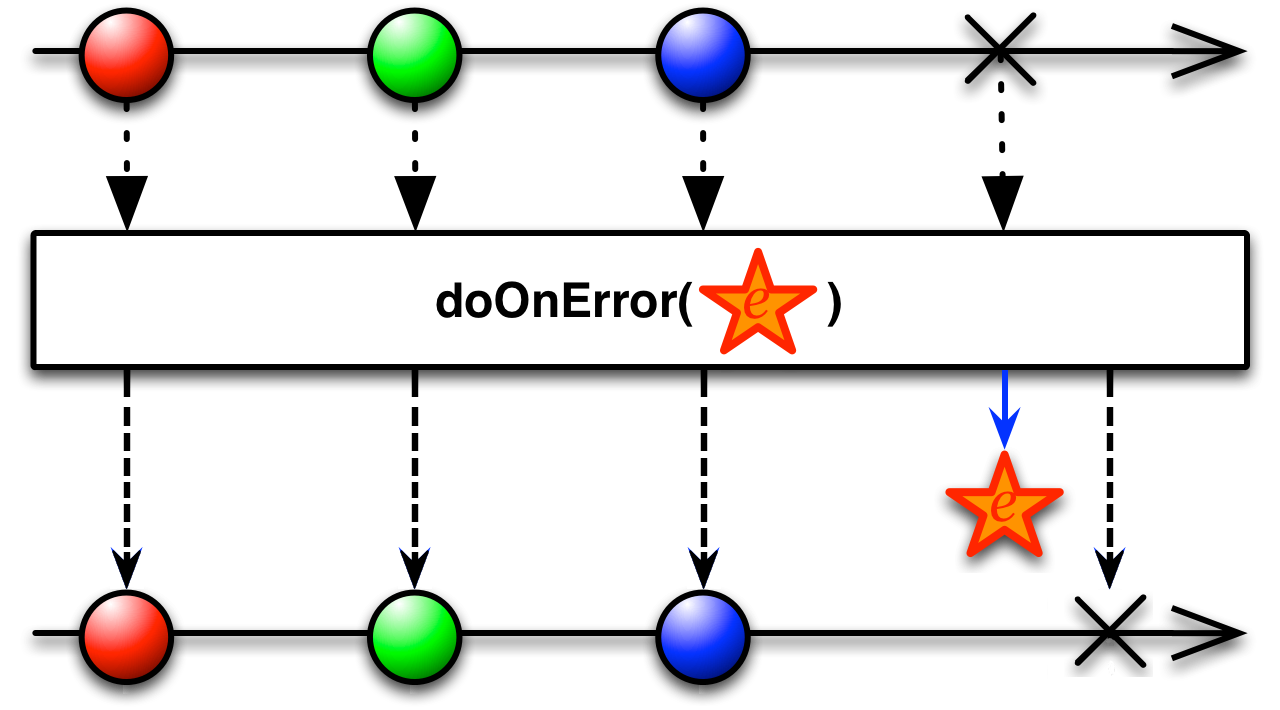
- Scheduler:
doOnErrordoes not operate by default on a particularScheduler.
- Parameters:
onError- the action to invoke if the source ObservableSource callsonError- Returns:
- the source ObservableSource with the side-effecting behavior applied
- See Also:
- ReactiveX operators documentation: Do
-
doOnLifecycle
@CheckReturnValue @SchedulerSupport(value="none") public final Observable<T> doOnLifecycle(Consumer<? super Disposable> onSubscribe, Action onDispose)
Calls the appropriate onXXX method (shared between all Observer) for the lifecycle events of the sequence (subscription, disposal).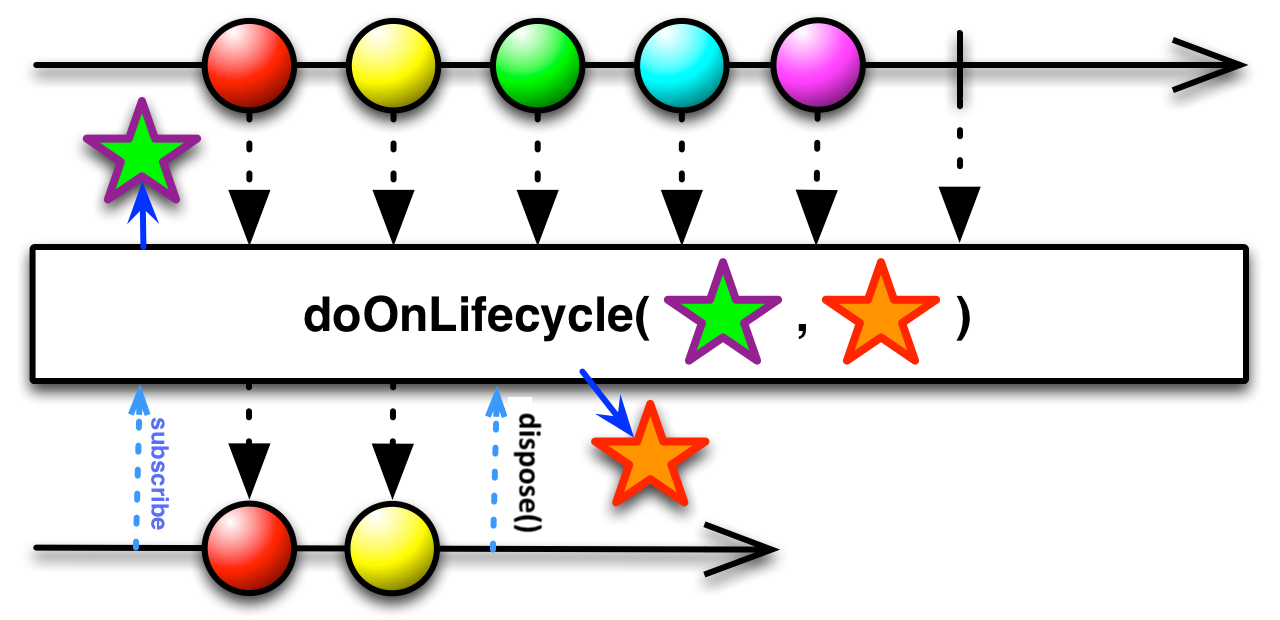
- Scheduler:
doOnLifecycledoes not operate by default on a particularScheduler.
- Parameters:
onSubscribe- a Consumer called with the Disposable sent via Observer.onSubscribe()onDispose- called when the downstream disposes the Disposable via dispose()- Returns:
- the source ObservableSource with the side-effecting behavior applied
- See Also:
- ReactiveX operators documentation: Do
-
doOnNext
@CheckReturnValue @SchedulerSupport(value="none") public final Observable<T> doOnNext(Consumer<? super T> onNext)
Modifies the source ObservableSource so that it invokes an action when it callsonNext.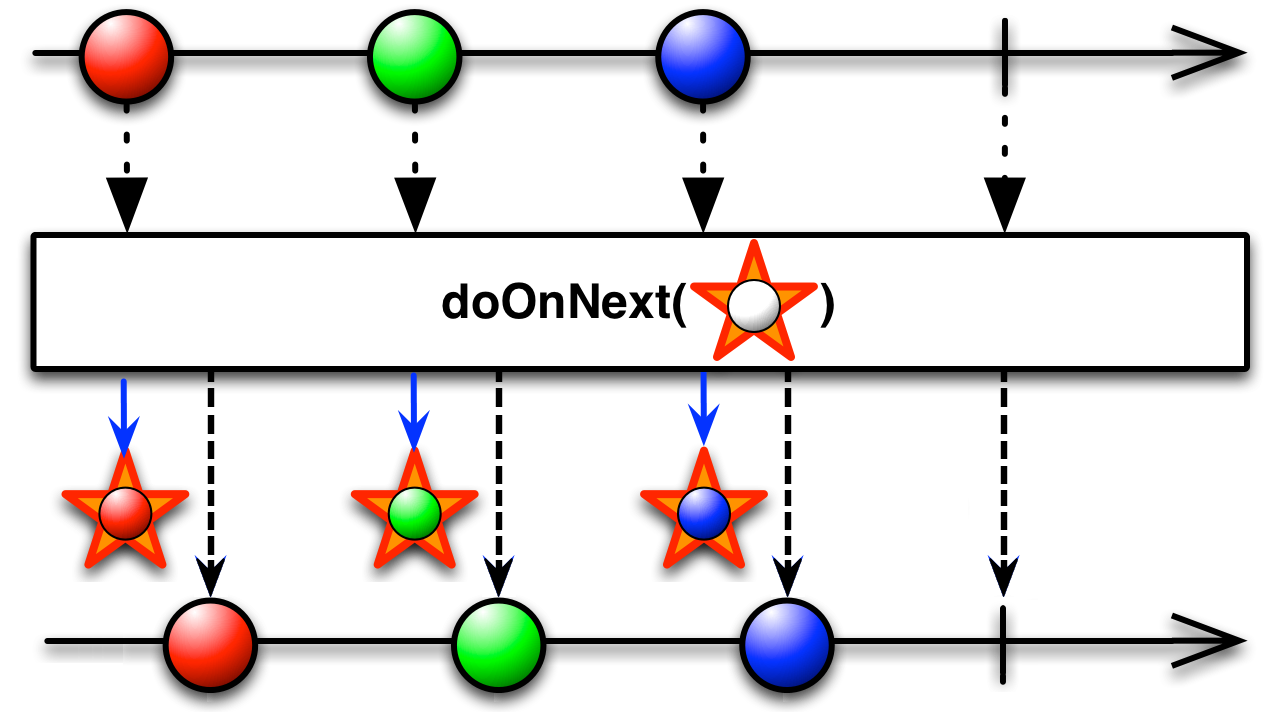
- Scheduler:
doOnNextdoes not operate by default on a particularScheduler.
- Parameters:
onNext- the action to invoke when the source ObservableSource callsonNext- Returns:
- the source ObservableSource with the side-effecting behavior applied
- See Also:
- ReactiveX operators documentation: Do
-
doOnSubscribe
@CheckReturnValue @SchedulerSupport(value="none") public final Observable<T> doOnSubscribe(Consumer<? super Disposable> onSubscribe)
Modifies the sourceObservableSourceso that it invokes the given action when it is subscribed from its subscribers. Each subscription will result in an invocation of the given action except when the sourceObservableSourceis reference counted, in which case the sourceObservableSourcewill invoke the given action for the first subscription.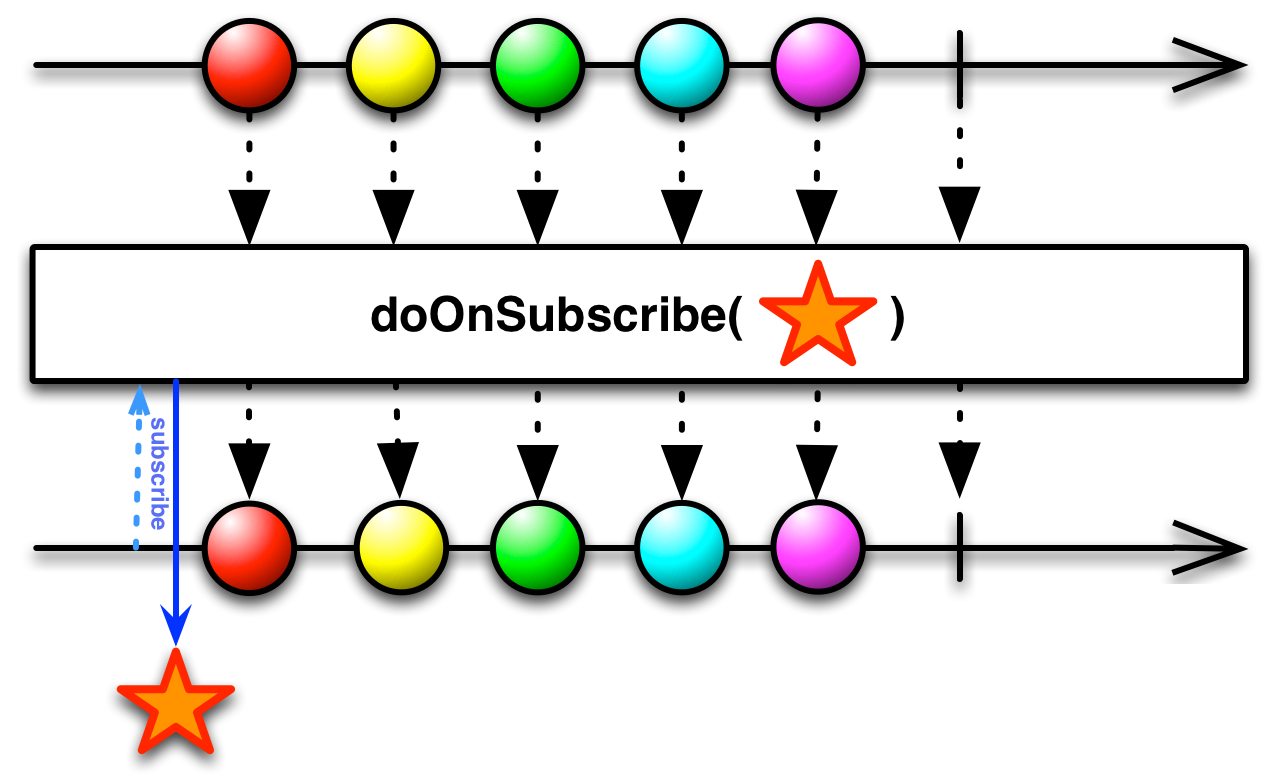
- Scheduler:
doOnSubscribedoes not operate by default on a particularScheduler.
- Parameters:
onSubscribe- the Consumer that gets called when an Observer subscribes to the currentObservable- Returns:
- the source
ObservableSourcemodified so as to call this Consumer when appropriate - See Also:
- ReactiveX operators documentation: Do
-
doOnTerminate
@CheckReturnValue @SchedulerSupport(value="none") public final Observable<T> doOnTerminate(Action onTerminate)
Modifies the source ObservableSource so that it invokes an action when it callsonCompleteoronError.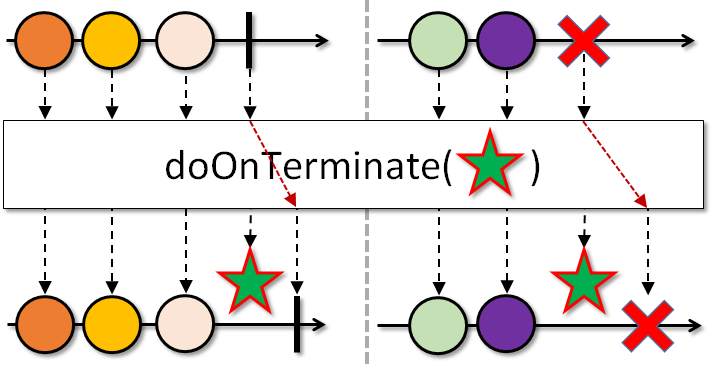
This differs from
doAfterTerminatein that this happens before theonCompleteoronErrornotification.- Scheduler:
doOnTerminatedoes not operate by default on a particularScheduler.
- Parameters:
onTerminate- the action to invoke when the source ObservableSource callsonCompleteoronError- Returns:
- the source ObservableSource with the side-effecting behavior applied
- See Also:
- ReactiveX operators documentation: Do,
doAfterTerminate(Action)
-
elementAt
@CheckReturnValue @SchedulerSupport(value="none") public final Maybe<T> elementAt(long index)
Returns a Maybe that emits the single item at a specified index in a sequence of emissions from this Observable or completes if this Observable signals fewer elements than index.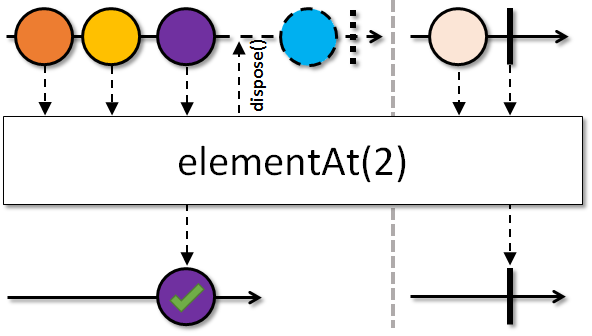
- Scheduler:
elementAtdoes not operate by default on a particularScheduler.
- Parameters:
index- the zero-based index of the item to retrieve- Returns:
- a Maybe that emits a single item: the item at the specified position in the sequence of those emitted by the source ObservableSource
- Throws:
IndexOutOfBoundsException- ifindexis less than 0- See Also:
- ReactiveX operators documentation: ElementAt
-
elementAt
@CheckReturnValue @SchedulerSupport(value="none") public final Single<T> elementAt(long index, T defaultItem)
Returns a Single that emits the item found at a specified index in a sequence of emissions from this Observable, or a default item if that index is out of range.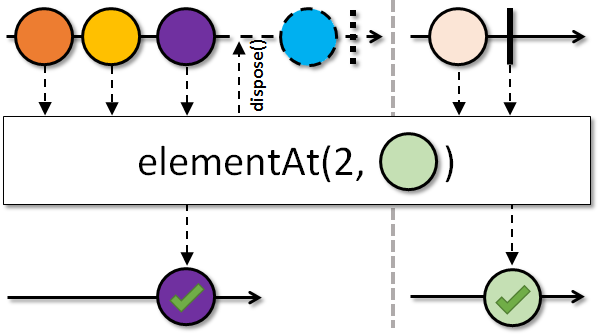
- Scheduler:
elementAtdoes not operate by default on a particularScheduler.
- Parameters:
index- the zero-based index of the item to retrievedefaultItem- the default item- Returns:
- a Single that emits the item at the specified position in the sequence emitted by the source ObservableSource, or the default item if that index is outside the bounds of the source sequence
- Throws:
IndexOutOfBoundsException- ifindexis less than 0- See Also:
- ReactiveX operators documentation: ElementAt
-
elementAtOrError
@CheckReturnValue @SchedulerSupport(value="none") public final Single<T> elementAtOrError(long index)
Returns a Single that emits the item found at a specified index in a sequence of emissions from this Observable or signals aNoSuchElementExceptionif this Observable signals fewer elements than index.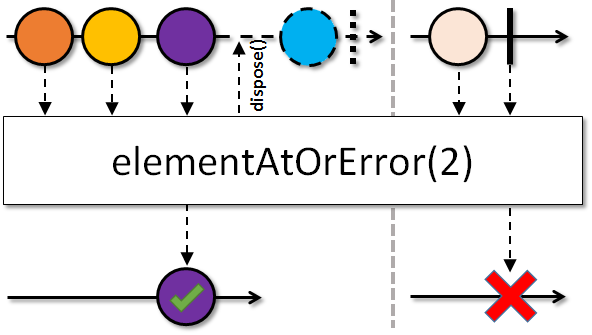
- Scheduler:
elementAtOrErrordoes not operate by default on a particularScheduler.
- Parameters:
index- the zero-based index of the item to retrieve- Returns:
- a Single that emits the item at the specified position in the sequence emitted by the source ObservableSource, or the default item if that index is outside the bounds of the source sequence
- Throws:
IndexOutOfBoundsException- ifindexis less than 0- See Also:
- ReactiveX operators documentation: ElementAt
-
filter
@CheckReturnValue @SchedulerSupport(value="none") public final Observable<T> filter(Predicate<? super T> predicate)
Filters items emitted by an ObservableSource by only emitting those that satisfy a specified predicate.
- Scheduler:
filterdoes not operate by default on a particularScheduler.
- Parameters:
predicate- a function that evaluates each item emitted by the source ObservableSource, returningtrueif it passes the filter- Returns:
- an Observable that emits only those items emitted by the source ObservableSource that the filter
evaluates as
true - See Also:
- ReactiveX operators documentation: Filter
-
firstElement
@CheckReturnValue @SchedulerSupport(value="none") public final Maybe<T> firstElement()
Returns a Maybe that emits only the very first item emitted by the source ObservableSource, or completes if the source ObservableSource is empty.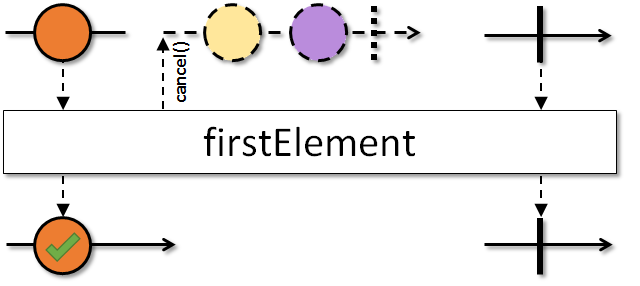
- Scheduler:
firstElementdoes not operate by default on a particularScheduler.
- Returns:
- the new Maybe instance
- See Also:
- ReactiveX operators documentation: First
-
first
@CheckReturnValue @SchedulerSupport(value="none") public final Single<T> first(T defaultItem)
Returns a Single that emits only the very first item emitted by the source ObservableSource, or a default item if the source ObservableSource completes without emitting any items.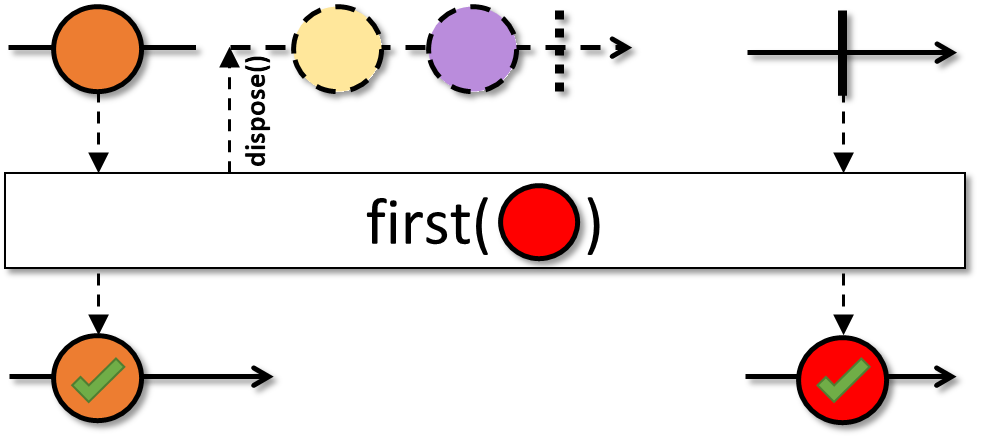
- Scheduler:
firstdoes not operate by default on a particularScheduler.
- Parameters:
defaultItem- the default item to emit if the source ObservableSource doesn't emit anything- Returns:
- the new Single instance
- See Also:
- ReactiveX operators documentation: First
-
firstOrError
@CheckReturnValue @SchedulerSupport(value="none") public final Single<T> firstOrError()
Returns a Single that emits only the very first item emitted by this Observable or signals aNoSuchElementExceptionif this Observable is empty.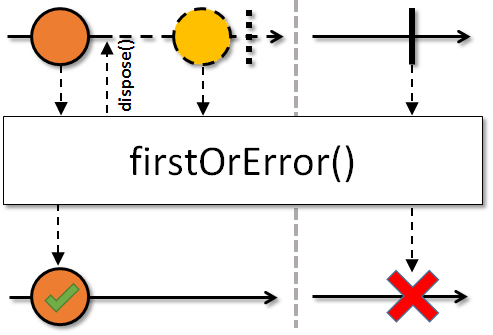
- Scheduler:
firstOrErrordoes not operate by default on a particularScheduler.
- Returns:
- the new Single instance
- See Also:
- ReactiveX operators documentation: First
-
flatMap
@CheckReturnValue @SchedulerSupport(value="none") public final <R> Observable<R> flatMap(Function<? super T,? extends ObservableSource<? extends R>> mapper)
Returns an Observable that emits items based on applying a function that you supply to each item emitted by the source ObservableSource, where that function returns an ObservableSource, and then merging those resulting ObservableSources and emitting the results of this merger.
- Scheduler:
flatMapdoes not operate by default on a particularScheduler.
- Type Parameters:
R- the value type of the inner ObservableSources and the output type- Parameters:
mapper- a function that, when applied to an item emitted by the source ObservableSource, returns an ObservableSource- Returns:
- an Observable that emits the result of applying the transformation function to each item emitted by the source ObservableSource and merging the results of the ObservableSources obtained from this transformation
- See Also:
- ReactiveX operators documentation: FlatMap
-
flatMap
@CheckReturnValue @SchedulerSupport(value="none") public final <R> Observable<R> flatMap(Function<? super T,? extends ObservableSource<? extends R>> mapper, boolean delayErrors)
Returns an Observable that emits items based on applying a function that you supply to each item emitted by the source ObservableSource, where that function returns an ObservableSource, and then merging those resulting ObservableSources and emitting the results of this merger.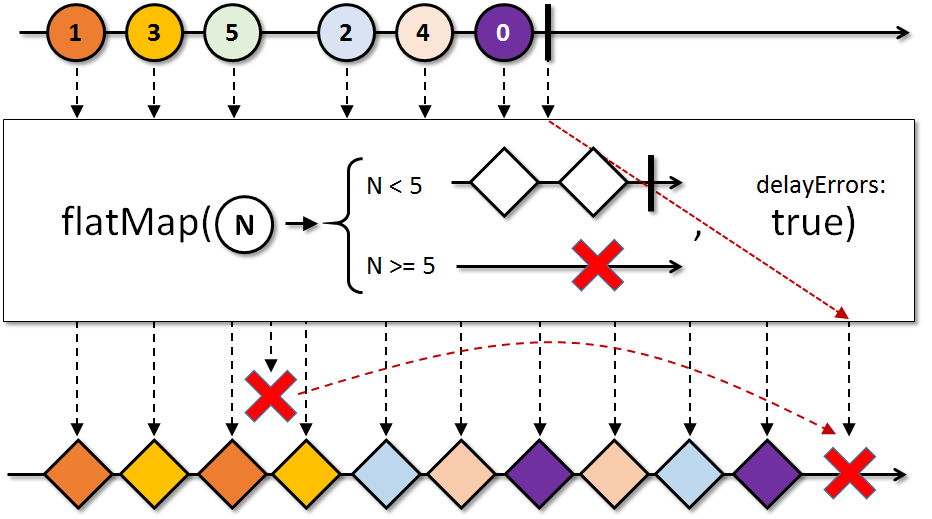
- Scheduler:
flatMapdoes not operate by default on a particularScheduler.
- Type Parameters:
R- the value type of the inner ObservableSources and the output type- Parameters:
mapper- a function that, when applied to an item emitted by the source ObservableSource, returns an ObservableSourcedelayErrors- if true, exceptions from the current Observable and all inner ObservableSources are delayed until all of them terminate if false, the first one signalling an exception will terminate the whole sequence immediately- Returns:
- an Observable that emits the result of applying the transformation function to each item emitted by the source ObservableSource and merging the results of the ObservableSources obtained from this transformation
- See Also:
- ReactiveX operators documentation: FlatMap
-
flatMap
@CheckReturnValue @SchedulerSupport(value="none") public final <R> Observable<R> flatMap(Function<? super T,? extends ObservableSource<? extends R>> mapper, boolean delayErrors, int maxConcurrency)
Returns an Observable that emits items based on applying a function that you supply to each item emitted by the source ObservableSource, where that function returns an ObservableSource, and then merging those resulting ObservableSources and emitting the results of this merger, while limiting the maximum number of concurrent subscriptions to these ObservableSources.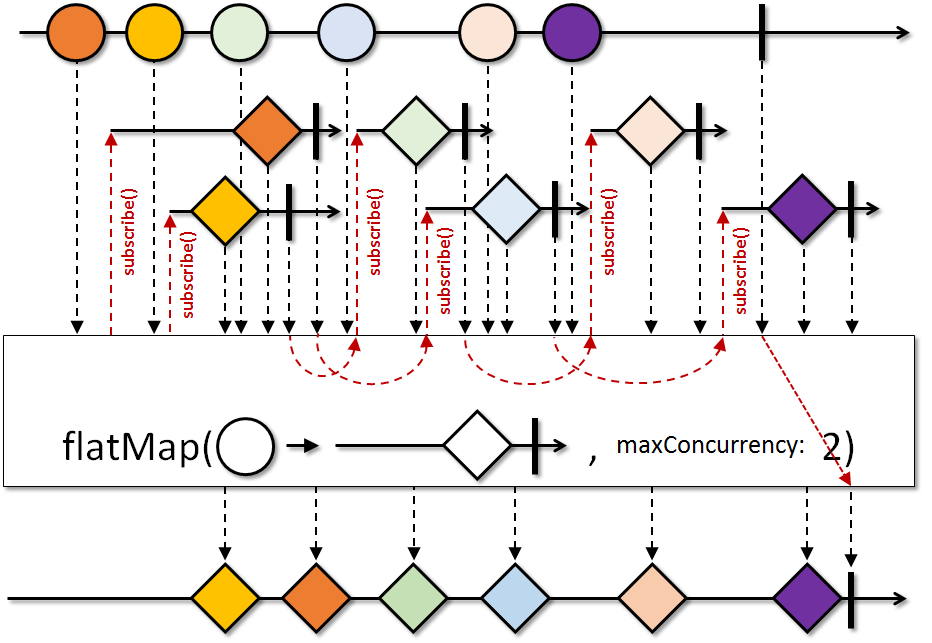
- Scheduler:
flatMapdoes not operate by default on a particularScheduler.
- Type Parameters:
R- the value type of the inner ObservableSources and the output type- Parameters:
mapper- a function that, when applied to an item emitted by the source ObservableSource, returns an ObservableSourcemaxConcurrency- the maximum number of ObservableSources that may be subscribed to concurrentlydelayErrors- if true, exceptions from the current Observable and all inner ObservableSources are delayed until all of them terminate if false, the first one signalling an exception will terminate the whole sequence immediately- Returns:
- an Observable that emits the result of applying the transformation function to each item emitted by the source ObservableSource and merging the results of the ObservableSources obtained from this transformation
- Since:
- 2.0
- See Also:
- ReactiveX operators documentation: FlatMap
-
flatMap
@CheckReturnValue @SchedulerSupport(value="none") public final <R> Observable<R> flatMap(Function<? super T,? extends ObservableSource<? extends R>> mapper, boolean delayErrors, int maxConcurrency, int bufferSize)
Returns an Observable that emits items based on applying a function that you supply to each item emitted by the source ObservableSource, where that function returns an ObservableSource, and then merging those resulting ObservableSources and emitting the results of this merger, while limiting the maximum number of concurrent subscriptions to these ObservableSources.
- Scheduler:
flatMapdoes not operate by default on a particularScheduler.
- Type Parameters:
R- the value type of the inner ObservableSources and the output type- Parameters:
mapper- a function that, when applied to an item emitted by the source ObservableSource, returns an ObservableSourcemaxConcurrency- the maximum number of ObservableSources that may be subscribed to concurrentlydelayErrors- if true, exceptions from the current Observable and all inner ObservableSources are delayed until all of them terminate if false, the first one signalling an exception will terminate the whole sequence immediatelybufferSize- the number of elements to prefetch from each inner ObservableSource- Returns:
- an Observable that emits the result of applying the transformation function to each item emitted by the source ObservableSource and merging the results of the ObservableSources obtained from this transformation
- Since:
- 2.0
- See Also:
- ReactiveX operators documentation: FlatMap
-
flatMap
@CheckReturnValue @SchedulerSupport(value="none") public final <R> Observable<R> flatMap(Function<? super T,? extends ObservableSource<? extends R>> onNextMapper, Function<? super Throwable,? extends ObservableSource<? extends R>> onErrorMapper, Callable<? extends ObservableSource<? extends R>> onCompleteSupplier)
Returns an Observable that applies a function to each item emitted or notification raised by the source ObservableSource and then flattens the ObservableSources returned from these functions and emits the resulting items.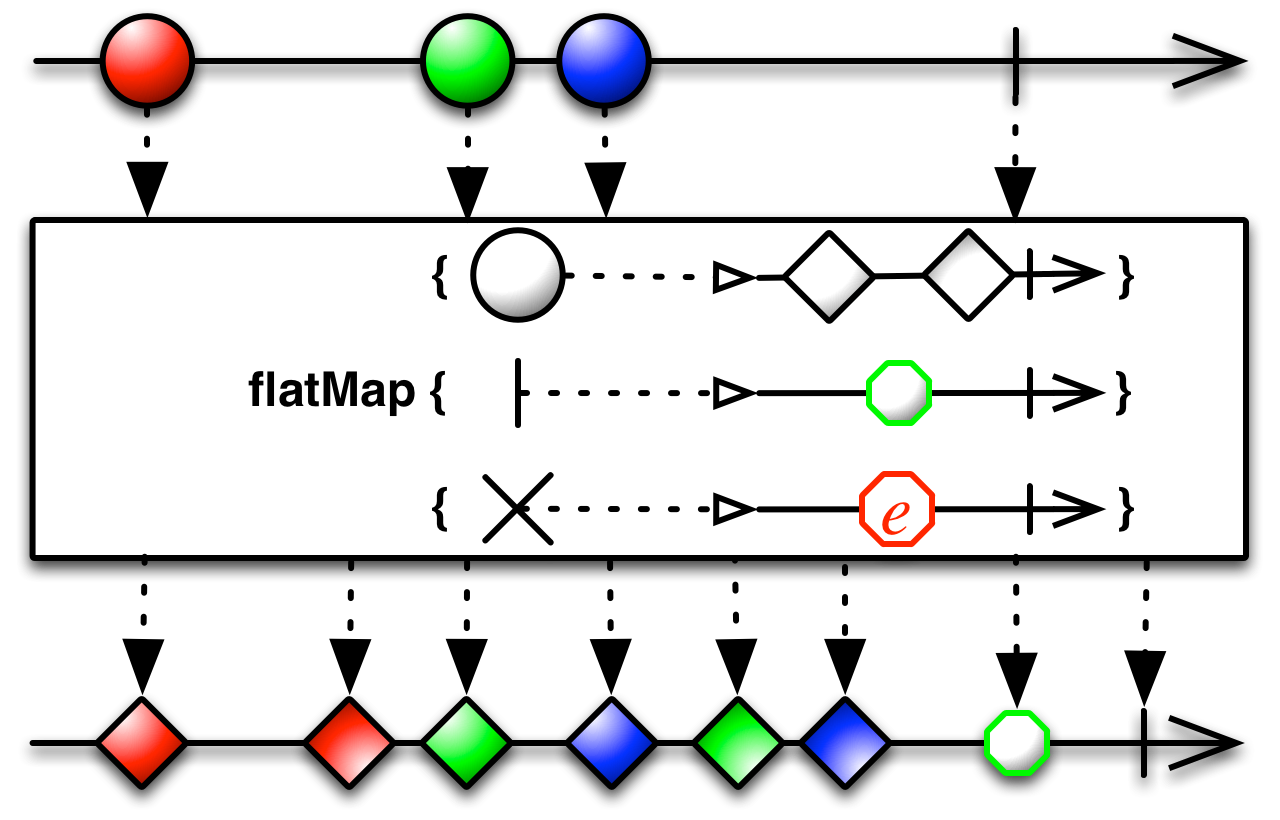
- Scheduler:
flatMapdoes not operate by default on a particularScheduler.
- Type Parameters:
R- the result type- Parameters:
onNextMapper- a function that returns an ObservableSource to merge for each item emitted by the source ObservableSourceonErrorMapper- a function that returns an ObservableSource to merge for an onError notification from the source ObservableSourceonCompleteSupplier- a function that returns an ObservableSource to merge for an onComplete notification from the source ObservableSource- Returns:
- an Observable that emits the results of merging the ObservableSources returned from applying the specified functions to the emissions and notifications of the source ObservableSource
- See Also:
- ReactiveX operators documentation: FlatMap
-
flatMap
@CheckReturnValue @SchedulerSupport(value="none") public final <R> Observable<R> flatMap(Function<? super T,? extends ObservableSource<? extends R>> onNextMapper, Function<Throwable,? extends ObservableSource<? extends R>> onErrorMapper, Callable<? extends ObservableSource<? extends R>> onCompleteSupplier, int maxConcurrency)
Returns an Observable that applies a function to each item emitted or notification raised by the source ObservableSource and then flattens the ObservableSources returned from these functions and emits the resulting items, while limiting the maximum number of concurrent subscriptions to these ObservableSources.
- Scheduler:
flatMapdoes not operate by default on a particularScheduler.
- Type Parameters:
R- the result type- Parameters:
onNextMapper- a function that returns an ObservableSource to merge for each item emitted by the source ObservableSourceonErrorMapper- a function that returns an ObservableSource to merge for an onError notification from the source ObservableSourceonCompleteSupplier- a function that returns an ObservableSource to merge for an onComplete notification from the source ObservableSourcemaxConcurrency- the maximum number of ObservableSources that may be subscribed to concurrently- Returns:
- an Observable that emits the results of merging the ObservableSources returned from applying the specified functions to the emissions and notifications of the source ObservableSource
- Since:
- 2.0
- See Also:
- ReactiveX operators documentation: FlatMap
-
flatMap
@CheckReturnValue @SchedulerSupport(value="none") public final <R> Observable<R> flatMap(Function<? super T,? extends ObservableSource<? extends R>> mapper, int maxConcurrency)
Returns an Observable that emits items based on applying a function that you supply to each item emitted by the source ObservableSource, where that function returns an ObservableSource, and then merging those resulting ObservableSources and emitting the results of this merger, while limiting the maximum number of concurrent subscriptions to these ObservableSources.
- Scheduler:
flatMapdoes not operate by default on a particularScheduler.
- Type Parameters:
R- the value type of the inner ObservableSources and the output type- Parameters:
mapper- a function that, when applied to an item emitted by the source ObservableSource, returns an ObservableSourcemaxConcurrency- the maximum number of ObservableSources that may be subscribed to concurrently- Returns:
- an Observable that emits the result of applying the transformation function to each item emitted by the source ObservableSource and merging the results of the ObservableSources obtained from this transformation
- Since:
- 2.0
- See Also:
- ReactiveX operators documentation: FlatMap
-
flatMap
@CheckReturnValue @SchedulerSupport(value="none") public final <U,R> Observable<R> flatMap(Function<? super T,? extends ObservableSource<? extends U>> mapper, BiFunction<? super T,? super U,? extends R> resultSelector)
Returns an Observable that emits the results of a specified function to the pair of values emitted by the source ObservableSource and a specified collection ObservableSource.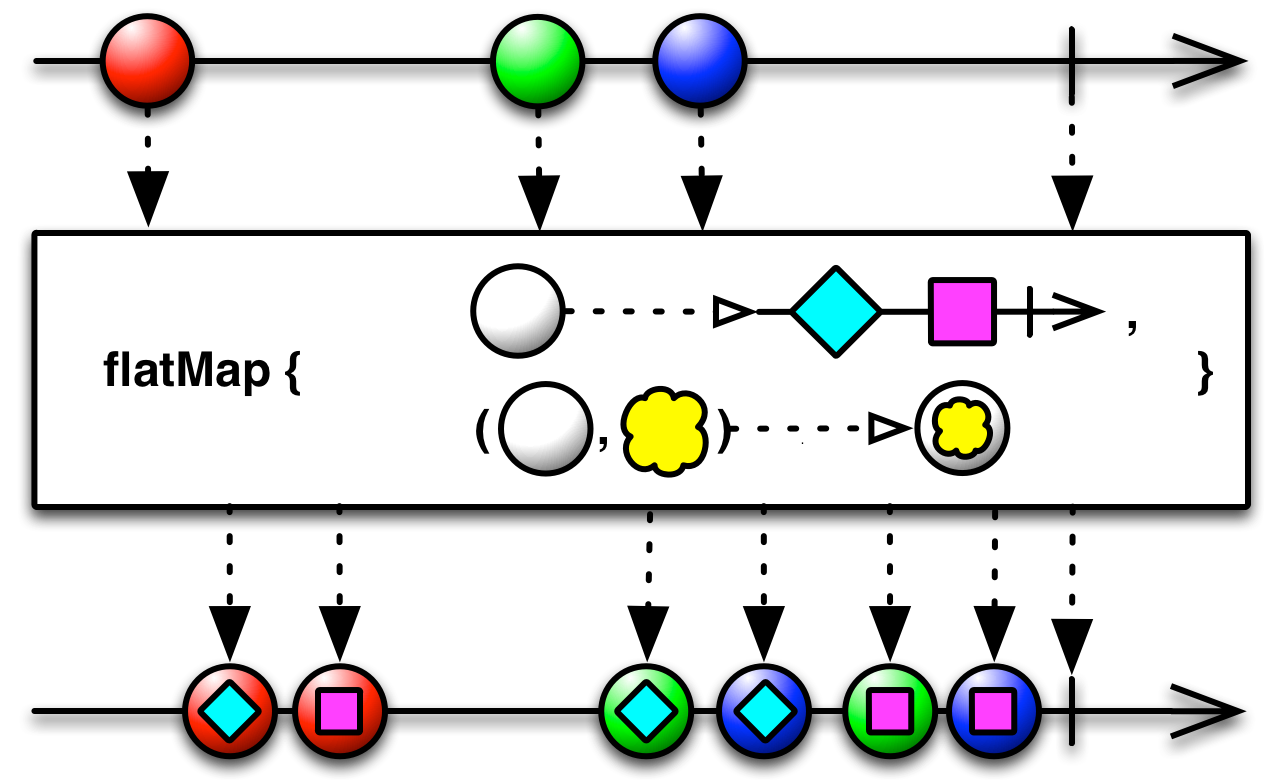
- Scheduler:
flatMapdoes not operate by default on a particularScheduler.
- Type Parameters:
U- the type of items emitted by the collection ObservableSourceR- the type of items emitted by the resulting ObservableSource- Parameters:
mapper- a function that returns an ObservableSource for each item emitted by the source ObservableSourceresultSelector- a function that combines one item emitted by each of the source and collection ObservableSources and returns an item to be emitted by the resulting ObservableSource- Returns:
- an Observable that emits the results of applying a function to a pair of values emitted by the source ObservableSource and the collection ObservableSource
- See Also:
- ReactiveX operators documentation: FlatMap
-
flatMap
@CheckReturnValue @SchedulerSupport(value="none") public final <U,R> Observable<R> flatMap(Function<? super T,? extends ObservableSource<? extends U>> mapper, BiFunction<? super T,? super U,? extends R> combiner, boolean delayErrors)
Returns an Observable that emits the results of a specified function to the pair of values emitted by the source ObservableSource and a specified collection ObservableSource.
- Scheduler:
flatMapdoes not operate by default on a particularScheduler.
- Type Parameters:
U- the type of items emitted by the collection ObservableSourceR- the type of items emitted by the resulting ObservableSource- Parameters:
mapper- a function that returns an ObservableSource for each item emitted by the source ObservableSourcecombiner- a function that combines one item emitted by each of the source and collection ObservableSources and returns an item to be emitted by the resulting ObservableSourcedelayErrors- if true, exceptions from the current Observable and all inner ObservableSources are delayed until all of them terminate if false, the first one signalling an exception will terminate the whole sequence immediately- Returns:
- an Observable that emits the results of applying a function to a pair of values emitted by the source ObservableSource and the collection ObservableSource
- See Also:
- ReactiveX operators documentation: FlatMap
-
flatMap
@CheckReturnValue @SchedulerSupport(value="none") public final <U,R> Observable<R> flatMap(Function<? super T,? extends ObservableSource<? extends U>> mapper, BiFunction<? super T,? super U,? extends R> combiner, boolean delayErrors, int maxConcurrency)
Returns an Observable that emits the results of a specified function to the pair of values emitted by the source ObservableSource and a specified collection ObservableSource, while limiting the maximum number of concurrent subscriptions to these ObservableSources.
- Scheduler:
flatMapdoes not operate by default on a particularScheduler.
- Type Parameters:
U- the type of items emitted by the collection ObservableSourceR- the type of items emitted by the resulting ObservableSource- Parameters:
mapper- a function that returns an ObservableSource for each item emitted by the source ObservableSourcecombiner- a function that combines one item emitted by each of the source and collection ObservableSources and returns an item to be emitted by the resulting ObservableSourcemaxConcurrency- the maximum number of ObservableSources that may be subscribed to concurrentlydelayErrors- if true, exceptions from the current Observable and all inner ObservableSources are delayed until all of them terminate if false, the first one signalling an exception will terminate the whole sequence immediately- Returns:
- an Observable that emits the results of applying a function to a pair of values emitted by the source ObservableSource and the collection ObservableSource
- Since:
- 2.0
- See Also:
- ReactiveX operators documentation: FlatMap
-
flatMap
@CheckReturnValue @SchedulerSupport(value="none") public final <U,R> Observable<R> flatMap(Function<? super T,? extends ObservableSource<? extends U>> mapper, BiFunction<? super T,? super U,? extends R> combiner, boolean delayErrors, int maxConcurrency, int bufferSize)
Returns an Observable that emits the results of a specified function to the pair of values emitted by the source ObservableSource and a specified collection ObservableSource, while limiting the maximum number of concurrent subscriptions to these ObservableSources.
- Scheduler:
flatMapdoes not operate by default on a particularScheduler.
- Type Parameters:
U- the type of items emitted by the collection ObservableSourceR- the type of items emitted by the resulting ObservableSource- Parameters:
mapper- a function that returns an ObservableSource for each item emitted by the source ObservableSourcecombiner- a function that combines one item emitted by each of the source and collection ObservableSources and returns an item to be emitted by the resulting ObservableSourcemaxConcurrency- the maximum number of ObservableSources that may be subscribed to concurrentlydelayErrors- if true, exceptions from the current Observable and all inner ObservableSources are delayed until all of them terminate if false, the first one signalling an exception will terminate the whole sequence immediatelybufferSize- the number of elements to prefetch from the inner ObservableSources.- Returns:
- an Observable that emits the results of applying a function to a pair of values emitted by the source ObservableSource and the collection ObservableSource
- Since:
- 2.0
- See Also:
- ReactiveX operators documentation: FlatMap
-
flatMap
@CheckReturnValue @SchedulerSupport(value="none") public final <U,R> Observable<R> flatMap(Function<? super T,? extends ObservableSource<? extends U>> mapper, BiFunction<? super T,? super U,? extends R> combiner, int maxConcurrency)
Returns an Observable that emits the results of a specified function to the pair of values emitted by the source ObservableSource and a specified collection ObservableSource, while limiting the maximum number of concurrent subscriptions to these ObservableSources.
- Scheduler:
flatMapdoes not operate by default on a particularScheduler.
- Type Parameters:
U- the type of items emitted by the collection ObservableSourceR- the type of items emitted by the resulting ObservableSource- Parameters:
mapper- a function that returns an ObservableSource for each item emitted by the source ObservableSourcecombiner- a function that combines one item emitted by each of the source and collection ObservableSources and returns an item to be emitted by the resulting ObservableSourcemaxConcurrency- the maximum number of ObservableSources that may be subscribed to concurrently- Returns:
- an Observable that emits the results of applying a function to a pair of values emitted by the source ObservableSource and the collection ObservableSource
- Since:
- 2.0
- See Also:
- ReactiveX operators documentation: FlatMap
-
flatMapCompletable
@CheckReturnValue @SchedulerSupport(value="none") public final Completable flatMapCompletable(Function<? super T,? extends CompletableSource> mapper)
Maps each element of the upstream Observable into CompletableSources, subscribes to them and waits until the upstream and all CompletableSources complete.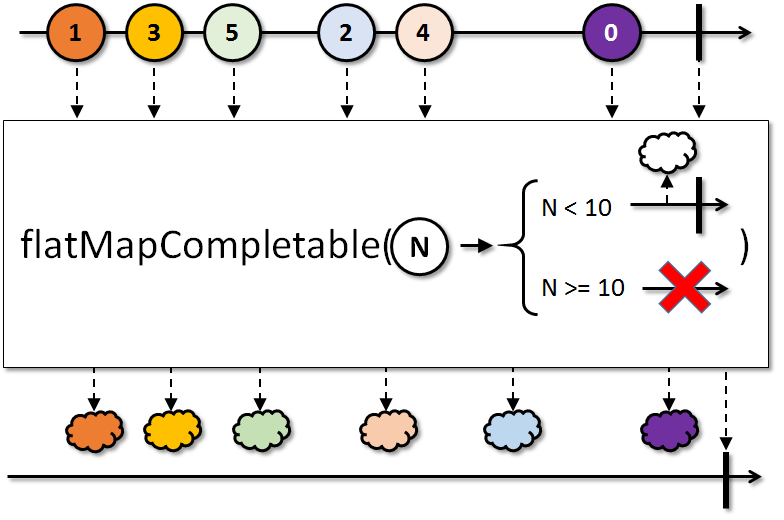
- Scheduler:
flatMapCompletabledoes not operate by default on a particularScheduler.
- Parameters:
mapper- the function that received each source value and transforms them into CompletableSources.- Returns:
- the new Completable instance
-
flatMapCompletable
@CheckReturnValue @SchedulerSupport(value="none") public final Completable flatMapCompletable(Function<? super T,? extends CompletableSource> mapper, boolean delayErrors)
Maps each element of the upstream Observable into CompletableSources, subscribes to them and waits until the upstream and all CompletableSources complete, optionally delaying all errors.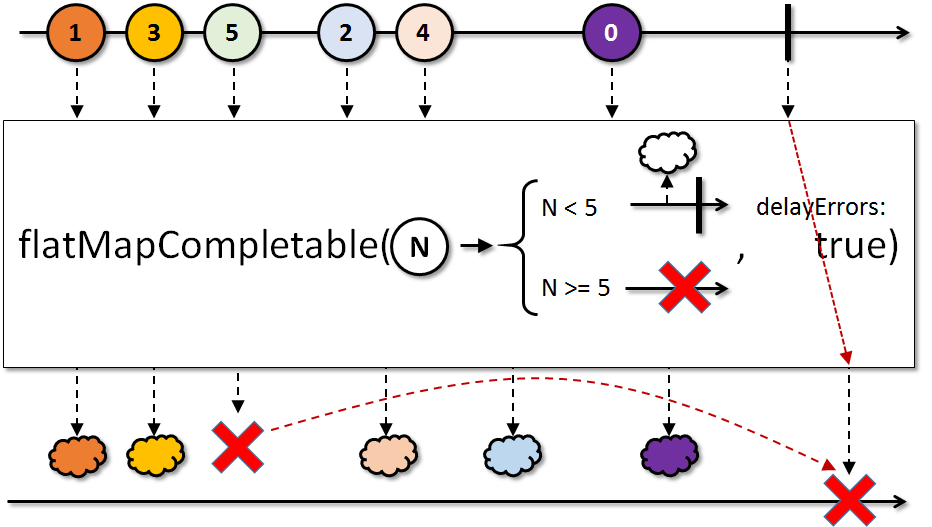
- Scheduler:
flatMapCompletabledoes not operate by default on a particularScheduler.
- Parameters:
mapper- the function that received each source value and transforms them into CompletableSources.delayErrors- if true errors from the upstream and inner CompletableSources are delayed until each of them terminates.- Returns:
- the new Completable instance
-
flatMapIterable
@CheckReturnValue @SchedulerSupport(value="none") public final <U> Observable<U> flatMapIterable(Function<? super T,? extends Iterable<? extends U>> mapper)
Returns an Observable that merges each item emitted by the source ObservableSource with the values in an Iterable corresponding to that item that is generated by a selector.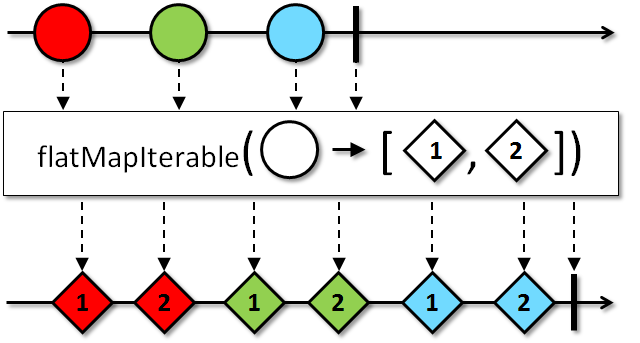
- Scheduler:
flatMapIterabledoes not operate by default on a particularScheduler.
- Type Parameters:
U- the type of item emitted by the resulting Iterable- Parameters:
mapper- a function that returns an Iterable sequence of values for when given an item emitted by the source ObservableSource- Returns:
- an Observable that emits the results of merging the items emitted by the source ObservableSource with
the values in the Iterables corresponding to those items, as generated by
collectionSelector - See Also:
- ReactiveX operators documentation: FlatMap
-
flatMapIterable
@CheckReturnValue @SchedulerSupport(value="none") public final <U,V> Observable<V> flatMapIterable(Function<? super T,? extends Iterable<? extends U>> mapper, BiFunction<? super T,? super U,? extends V> resultSelector)
Returns an Observable that emits the results of applying a function to the pair of values from the source ObservableSource and an Iterable corresponding to that item that is generated by a selector.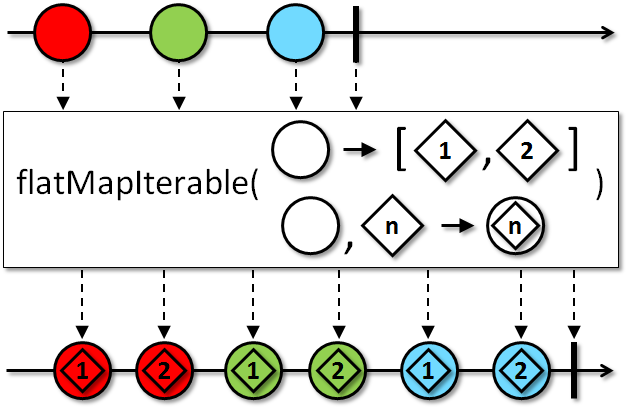
- Scheduler:
flatMapIterabledoes not operate by default on a particularScheduler.
- Type Parameters:
U- the collection element typeV- the type of item emitted by the resulting Iterable- Parameters:
mapper- a function that returns an Iterable sequence of values for each item emitted by the source ObservableSourceresultSelector- a function that returns an item based on the item emitted by the source ObservableSource and the Iterable returned for that item by thecollectionSelector- Returns:
- an Observable that emits the items returned by
resultSelectorfor each item in the source ObservableSource - See Also:
- ReactiveX operators documentation: FlatMap
-
flatMapMaybe
@CheckReturnValue @SchedulerSupport(value="none") public final <R> Observable<R> flatMapMaybe(Function<? super T,? extends MaybeSource<? extends R>> mapper)
Maps each element of the upstream Observable into MaybeSources, subscribes to all of them and merges their onSuccess values, in no particular order, into a single Observable sequence.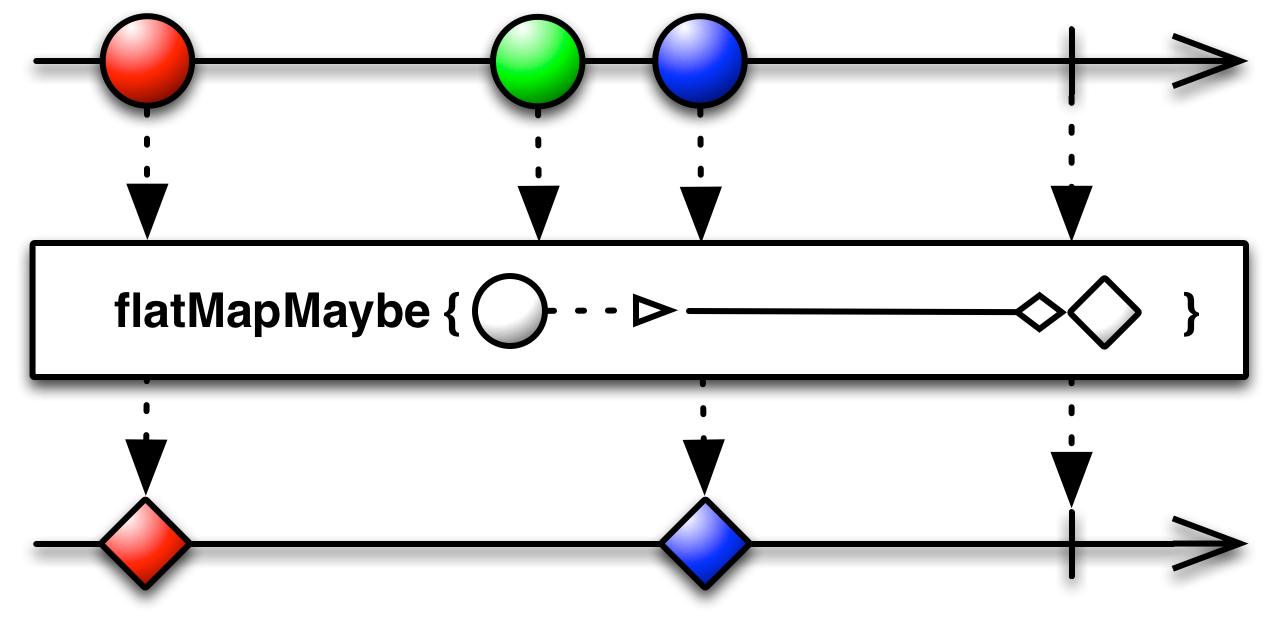
- Scheduler:
flatMapMaybedoes not operate by default on a particularScheduler.
- Type Parameters:
R- the result value type- Parameters:
mapper- the function that received each source value and transforms them into MaybeSources.- Returns:
- the new Observable instance
-
flatMapMaybe
@CheckReturnValue @SchedulerSupport(value="none") public final <R> Observable<R> flatMapMaybe(Function<? super T,? extends MaybeSource<? extends R>> mapper, boolean delayErrors)
Maps each element of the upstream Observable into MaybeSources, subscribes to them and merges their onSuccess values, in no particular order, into a single Observable sequence, optionally delaying all errors.
- Scheduler:
flatMapMaybedoes not operate by default on a particularScheduler.
- Type Parameters:
R- the result value type- Parameters:
mapper- the function that received each source value and transforms them into MaybeSources.delayErrors- if true errors from the upstream and inner MaybeSources are delayed until each of them terminates.- Returns:
- the new Observable instance
-
flatMapSingle
@CheckReturnValue @SchedulerSupport(value="none") public final <R> Observable<R> flatMapSingle(Function<? super T,? extends SingleSource<? extends R>> mapper)
Maps each element of the upstream Observable into SingleSources, subscribes to all of them and merges their onSuccess values, in no particular order, into a single Observable sequence.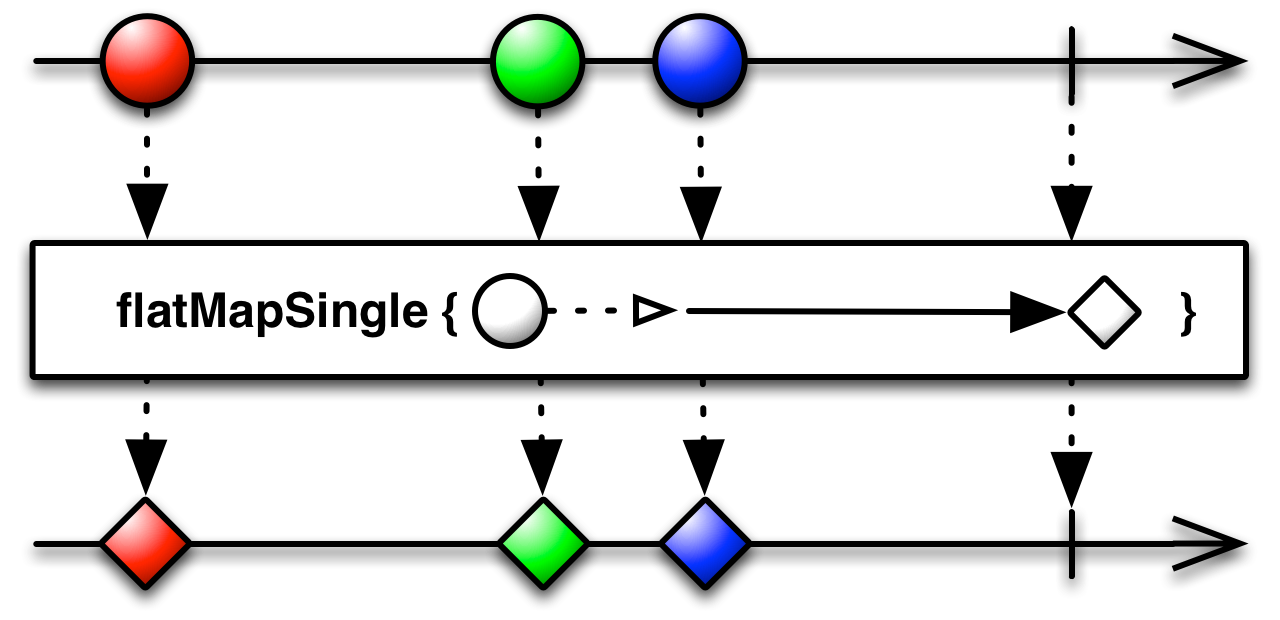
- Scheduler:
flatMapSingledoes not operate by default on a particularScheduler.
- Type Parameters:
R- the result value type- Parameters:
mapper- the function that received each source value and transforms them into SingleSources.- Returns:
- the new Observable instance
-
flatMapSingle
@CheckReturnValue @SchedulerSupport(value="none") public final <R> Observable<R> flatMapSingle(Function<? super T,? extends SingleSource<? extends R>> mapper, boolean delayErrors)
Maps each element of the upstream Observable into SingleSources, subscribes to them and merges their onSuccess values, in no particular order, into a single Observable sequence, optionally delaying all errors.
- Scheduler:
flatMapSingledoes not operate by default on a particularScheduler.
- Type Parameters:
R- the result value type- Parameters:
mapper- the function that received each source value and transforms them into SingleSources.delayErrors- if true errors from the upstream and inner SingleSources are delayed until each of them terminates.- Returns:
- the new Observable instance
-
forEach
@CheckReturnValue @SchedulerSupport(value="none") public final Disposable forEach(Consumer<? super T> onNext)
Subscribes to theObservableSourceand receives notifications for each element.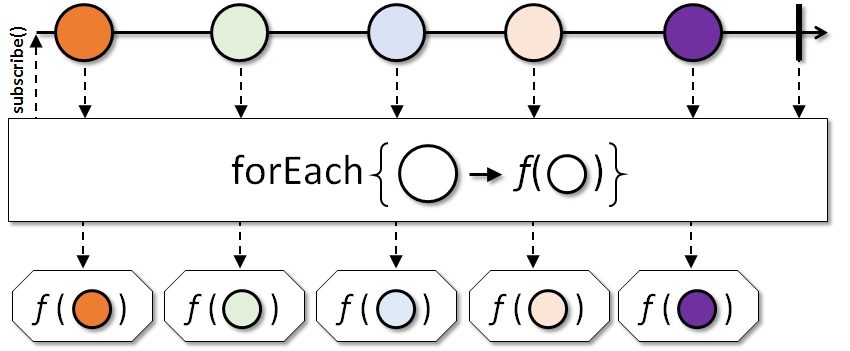
Alias to
subscribe(Consumer)- Scheduler:
forEachdoes not operate by default on a particularScheduler.
- Parameters:
onNext-Consumerto execute for each item.- Returns:
- a Disposable that allows disposing of an asynchronous sequence
- Throws:
NullPointerException- ifonNextis null- See Also:
- ReactiveX operators documentation: Subscribe
-
forEachWhile
@CheckReturnValue @SchedulerSupport(value="none") public final Disposable forEachWhile(Predicate<? super T> onNext)
Subscribes to theObservableSourceand receives notifications for each element until the onNext Predicate returns false.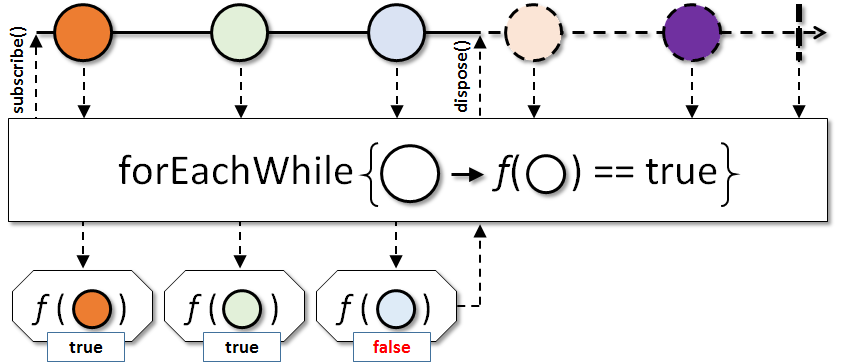
If the Observable emits an error, it is wrapped into an
OnErrorNotImplementedExceptionand routed to the RxJavaPlugins.onError handler.- Scheduler:
forEachWhiledoes not operate by default on a particularScheduler.
- Parameters:
onNext-Predicateto execute for each item.- Returns:
- a Disposable that allows disposing of an asynchronous sequence
- Throws:
NullPointerException- ifonNextis null- See Also:
- ReactiveX operators documentation: Subscribe
-
forEachWhile
@CheckReturnValue @SchedulerSupport(value="none") public final Disposable forEachWhile(Predicate<? super T> onNext, Consumer<? super Throwable> onError)
Subscribes to theObservableSourceand receives notifications for each element and error events until the onNext Predicate returns false.- Scheduler:
forEachWhiledoes not operate by default on a particularScheduler.
- Parameters:
onNext-Predicateto execute for each item.onError-Consumerto execute when an error is emitted.- Returns:
- a Disposable that allows disposing of an asynchronous sequence
- Throws:
NullPointerException- ifonNextis null, or ifonErroris null- See Also:
- ReactiveX operators documentation: Subscribe
-
forEachWhile
@CheckReturnValue @SchedulerSupport(value="none") public final Disposable forEachWhile(Predicate<? super T> onNext, Consumer<? super Throwable> onError, Action onComplete)
Subscribes to theObservableSourceand receives notifications for each element and the terminal events until the onNext Predicate returns false.- Scheduler:
forEachWhiledoes not operate by default on a particularScheduler.
- Parameters:
onNext-Predicateto execute for each item.onError-Consumerto execute when an error is emitted.onComplete-Actionto execute when completion is signalled.- Returns:
- a Disposable that allows disposing of an asynchronous sequence
- Throws:
NullPointerException- ifonNextis null, or ifonErroris null, or ifonCompleteis null- See Also:
- ReactiveX operators documentation: Subscribe
-
groupBy
@CheckReturnValue @SchedulerSupport(value="none") public final <K> Observable<GroupedObservable<K,T>> groupBy(Function<? super T,? extends K> keySelector)
Groups the items emitted by anObservableSourceaccording to a specified criterion, and emits these grouped items asGroupedObservables. The emittedGroupedObservableSourceallows only a singleObserverduring its lifetime and if thisObservercalls dispose() before the source terminates, the next emission by the source having the same key will trigger a newGroupedObservableSourceemission.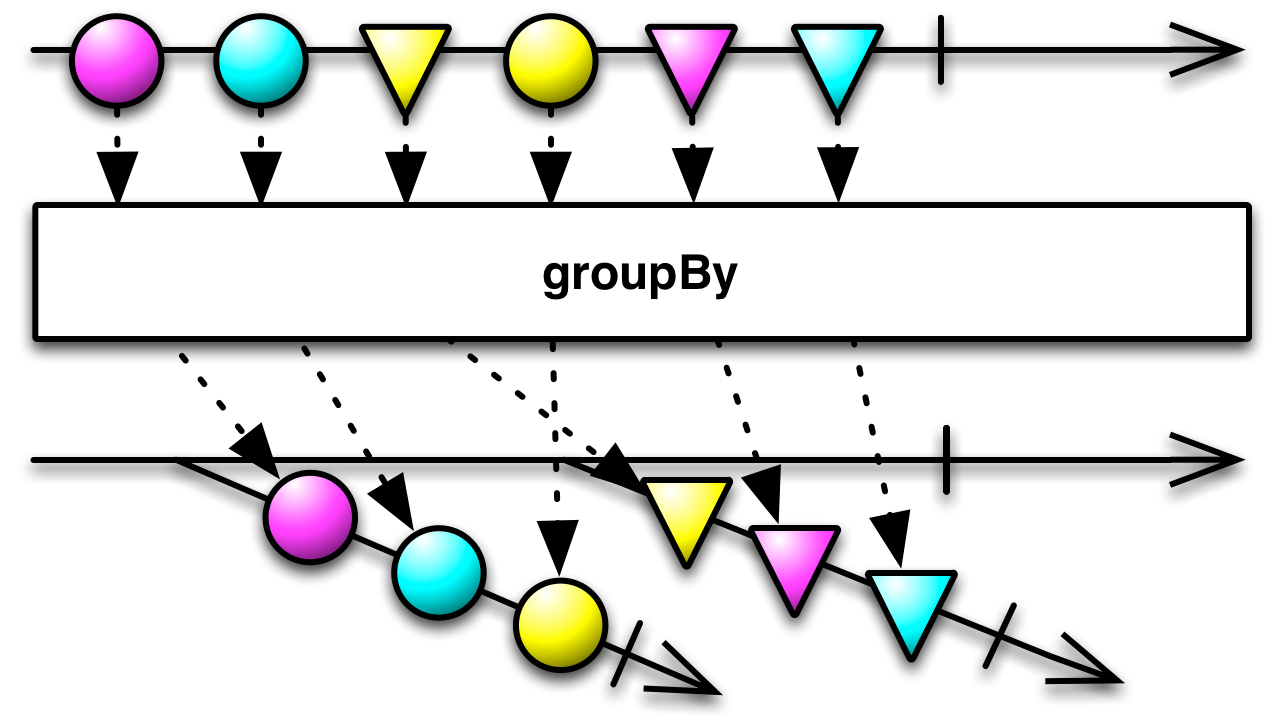
Note: A
GroupedObservablewill cache the items it is to emit until such time as it is subscribed to. For this reason, in order to avoid memory leaks, you should not simply ignore thoseGroupedObservableSources that do not concern you. Instead, you can signal to them that they may discard their buffers by applying an operator likeignoreElements()to them.- Scheduler:
groupBydoes not operate by default on a particularScheduler.
- Type Parameters:
K- the key type- Parameters:
keySelector- a function that extracts the key for each item- Returns:
- an
ObservableSourcethat emitsGroupedObservables, each of which corresponds to a unique key value and each of which emits those items from the source ObservableSource that share that key value - See Also:
- ReactiveX operators documentation: GroupBy
-
groupBy
@CheckReturnValue @SchedulerSupport(value="none") public final <K> Observable<GroupedObservable<K,T>> groupBy(Function<? super T,? extends K> keySelector, boolean delayError)
Groups the items emitted by anObservableSourceaccording to a specified criterion, and emits these grouped items asGroupedObservables. The emittedGroupedObservableSourceallows only a singleObserverduring its lifetime and if thisObservercalls dispose() before the source terminates, the next emission by the source having the same key will trigger a newGroupedObservableSourceemission.
Note: A
GroupedObservablewill cache the items it is to emit until such time as it is subscribed to. For this reason, in order to avoid memory leaks, you should not simply ignore thoseGroupedObservableSources that do not concern you. Instead, you can signal to them that they may discard their buffers by applying an operator likeignoreElements()to them.- Scheduler:
groupBydoes not operate by default on a particularScheduler.
- Type Parameters:
K- the key type- Parameters:
keySelector- a function that extracts the key for each itemdelayError- if true, the exception from the current Observable is delayed in each group until that specific group emitted the normal values; if false, the exception bypasses values in the groups and is reported immediately.- Returns:
- an
ObservableSourcethat emitsGroupedObservables, each of which corresponds to a unique key value and each of which emits those items from the source ObservableSource that share that key value - See Also:
- ReactiveX operators documentation: GroupBy
-
groupBy
@CheckReturnValue @SchedulerSupport(value="none") public final <K,V> Observable<GroupedObservable<K,V>> groupBy(Function<? super T,? extends K> keySelector, Function<? super T,? extends V> valueSelector)
Groups the items emitted by anObservableSourceaccording to a specified criterion, and emits these grouped items asGroupedObservables. The emittedGroupedObservableSourceallows only a singleObserverduring its lifetime and if thisObservercalls dispose() before the source terminates, the next emission by the source having the same key will trigger a newGroupedObservableSourceemission.
Note: A
GroupedObservablewill cache the items it is to emit until such time as it is subscribed to. For this reason, in order to avoid memory leaks, you should not simply ignore thoseGroupedObservableSources that do not concern you. Instead, you can signal to them that they may discard their buffers by applying an operator likeignoreElements()to them.- Scheduler:
groupBydoes not operate by default on a particularScheduler.
- Type Parameters:
K- the key typeV- the element type- Parameters:
keySelector- a function that extracts the key for each itemvalueSelector- a function that extracts the return element for each item- Returns:
- an
ObservableSourcethat emitsGroupedObservables, each of which corresponds to a unique key value and each of which emits those items from the source ObservableSource that share that key value - See Also:
- ReactiveX operators documentation: GroupBy
-
groupBy
@CheckReturnValue @SchedulerSupport(value="none") public final <K,V> Observable<GroupedObservable<K,V>> groupBy(Function<? super T,? extends K> keySelector, Function<? super T,? extends V> valueSelector, boolean delayError)
Groups the items emitted by anObservableSourceaccording to a specified criterion, and emits these grouped items asGroupedObservables. The emittedGroupedObservableSourceallows only a singleObserverduring its lifetime and if thisObservercalls dispose() before the source terminates, the next emission by the source having the same key will trigger a newGroupedObservableSourceemission.
Note: A
GroupedObservablewill cache the items it is to emit until such time as it is subscribed to. For this reason, in order to avoid memory leaks, you should not simply ignore thoseGroupedObservableSources that do not concern you. Instead, you can signal to them that they may discard their buffers by applying an operator likeignoreElements()to them.- Scheduler:
groupBydoes not operate by default on a particularScheduler.
- Type Parameters:
K- the key typeV- the element type- Parameters:
keySelector- a function that extracts the key for each itemvalueSelector- a function that extracts the return element for each itemdelayError- if true, the exception from the current Observable is delayed in each group until that specific group emitted the normal values; if false, the exception bypasses values in the groups and is reported immediately.- Returns:
- an
ObservableSourcethat emitsGroupedObservables, each of which corresponds to a unique key value and each of which emits those items from the source ObservableSource that share that key value - See Also:
- ReactiveX operators documentation: GroupBy
-
groupBy
@CheckReturnValue @SchedulerSupport(value="none") public final <K,V> Observable<GroupedObservable<K,V>> groupBy(Function<? super T,? extends K> keySelector, Function<? super T,? extends V> valueSelector, boolean delayError, int bufferSize)
Groups the items emitted by anObservableSourceaccording to a specified criterion, and emits these grouped items asGroupedObservables. The emittedGroupedObservableSourceallows only a singleObserverduring its lifetime and if thisObservercalls dispose() before the source terminates, the next emission by the source having the same key will trigger a newGroupedObservableSourceemission.
Note: A
GroupedObservablewill cache the items it is to emit until such time as it is subscribed to. For this reason, in order to avoid memory leaks, you should not simply ignore thoseGroupedObservableSources that do not concern you. Instead, you can signal to them that they may discard their buffers by applying an operator likeignoreElements()to them.- Scheduler:
groupBydoes not operate by default on a particularScheduler.
- Type Parameters:
K- the key typeV- the element type- Parameters:
keySelector- a function that extracts the key for each itemvalueSelector- a function that extracts the return element for each itemdelayError- if true, the exception from the current Observable is delayed in each group until that specific group emitted the normal values; if false, the exception bypasses values in the groups and is reported immediately.bufferSize- the hint for how manyGroupedObservables and element in eachGroupedObservableshould be buffered- Returns:
- an
ObservableSourcethat emitsGroupedObservables, each of which corresponds to a unique key value and each of which emits those items from the source ObservableSource that share that key value - See Also:
- ReactiveX operators documentation: GroupBy
-
groupJoin
@CheckReturnValue @SchedulerSupport(value="none") public final <TRight,TLeftEnd,TRightEnd,R> Observable<R> groupJoin(ObservableSource<? extends TRight> other, Function<? super T,? extends ObservableSource<TLeftEnd>> leftEnd, Function<? super TRight,? extends ObservableSource<TRightEnd>> rightEnd, BiFunction<? super T,? super Observable<TRight>,? extends R> resultSelector)
Returns an Observable that correlates two ObservableSources when they overlap in time and groups the results.There are no guarantees in what order the items get combined when multiple items from one or both source ObservableSources overlap.
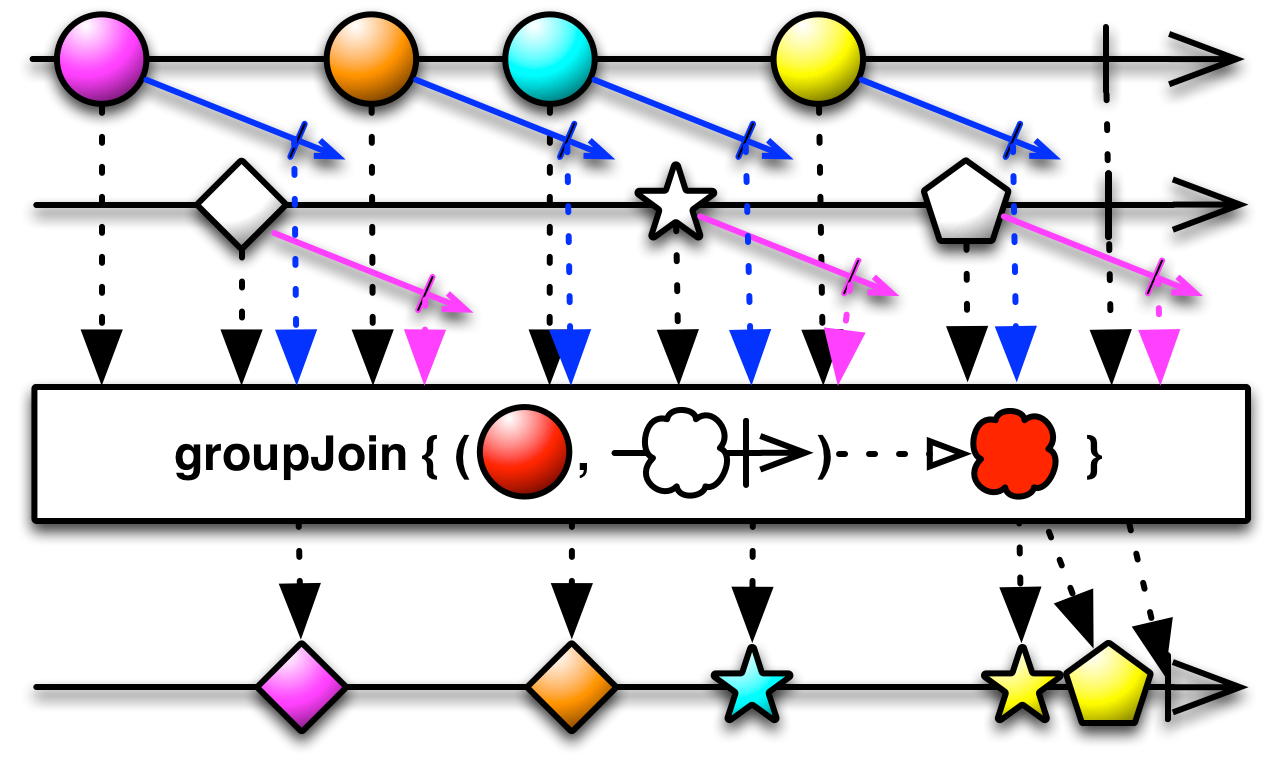
- Scheduler:
groupJoindoes not operate by default on a particularScheduler.
- Type Parameters:
TRight- the value type of the right ObservableSource sourceTLeftEnd- the element type of the left duration ObservableSourcesTRightEnd- the element type of the right duration ObservableSourcesR- the result type- Parameters:
other- the other ObservableSource to correlate items from the source ObservableSource withleftEnd- a function that returns an ObservableSource whose emissions indicate the duration of the values of the source ObservableSourcerightEnd- a function that returns an ObservableSource whose emissions indicate the duration of the values of therightObservableSourceresultSelector- a function that takes an item emitted by each ObservableSource and returns the value to be emitted by the resulting ObservableSource- Returns:
- an Observable that emits items based on combining those items emitted by the source ObservableSources whose durations overlap
- See Also:
- ReactiveX operators documentation: Join
-
hide
@CheckReturnValue @SchedulerSupport(value="none") public final Observable<T> hide()
Hides the identity of this Observable and its Disposable.Allows hiding extra features such as
Subject'sObservermethods or preventing certain identity-based optimizations (fusion).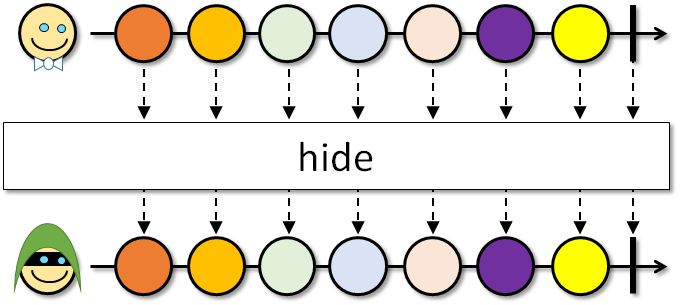
- Scheduler:
hidedoes not operate by default on a particularScheduler.
- Returns:
- the new Observable instance
- Since:
- 2.0
-
ignoreElements
@CheckReturnValue @SchedulerSupport(value="none") public final Completable ignoreElements()
Ignores all items emitted by the source ObservableSource and only callsonCompleteoronError.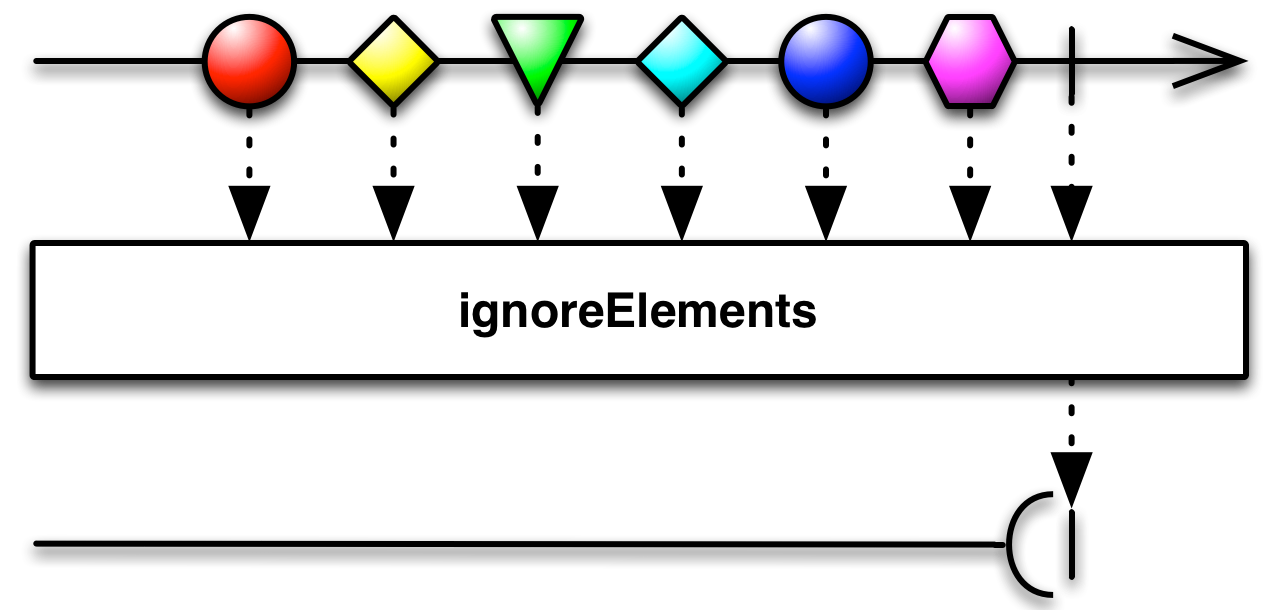
- Scheduler:
ignoreElementsdoes not operate by default on a particularScheduler.
- Returns:
- the new Completable instance
- See Also:
- ReactiveX operators documentation: IgnoreElements
-
isEmpty
@CheckReturnValue @SchedulerSupport(value="none") public final Single<Boolean> isEmpty()
Returns a Single that emitstrueif the source ObservableSource is empty, otherwisefalse.In Rx.Net this is negated as the
anyObserver but we renamed this in RxJava to better match Java naming idioms.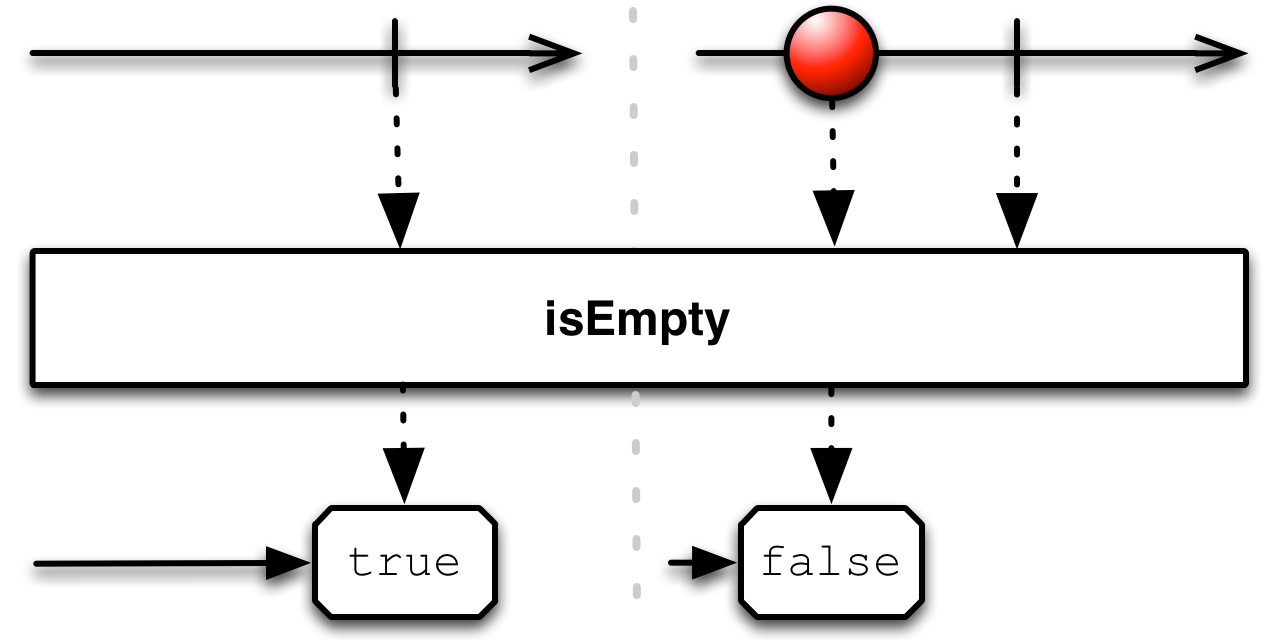
- Scheduler:
isEmptydoes not operate by default on a particularScheduler.
- Returns:
- a Single that emits a Boolean
- See Also:
- ReactiveX operators documentation: Contains
-
join
@CheckReturnValue @SchedulerSupport(value="none") public final <TRight,TLeftEnd,TRightEnd,R> Observable<R> join(ObservableSource<? extends TRight> other, Function<? super T,? extends ObservableSource<TLeftEnd>> leftEnd, Function<? super TRight,? extends ObservableSource<TRightEnd>> rightEnd, BiFunction<? super T,? super TRight,? extends R> resultSelector)
Correlates the items emitted by two ObservableSources based on overlapping durations.There are no guarantees in what order the items get combined when multiple items from one or both source ObservableSources overlap.
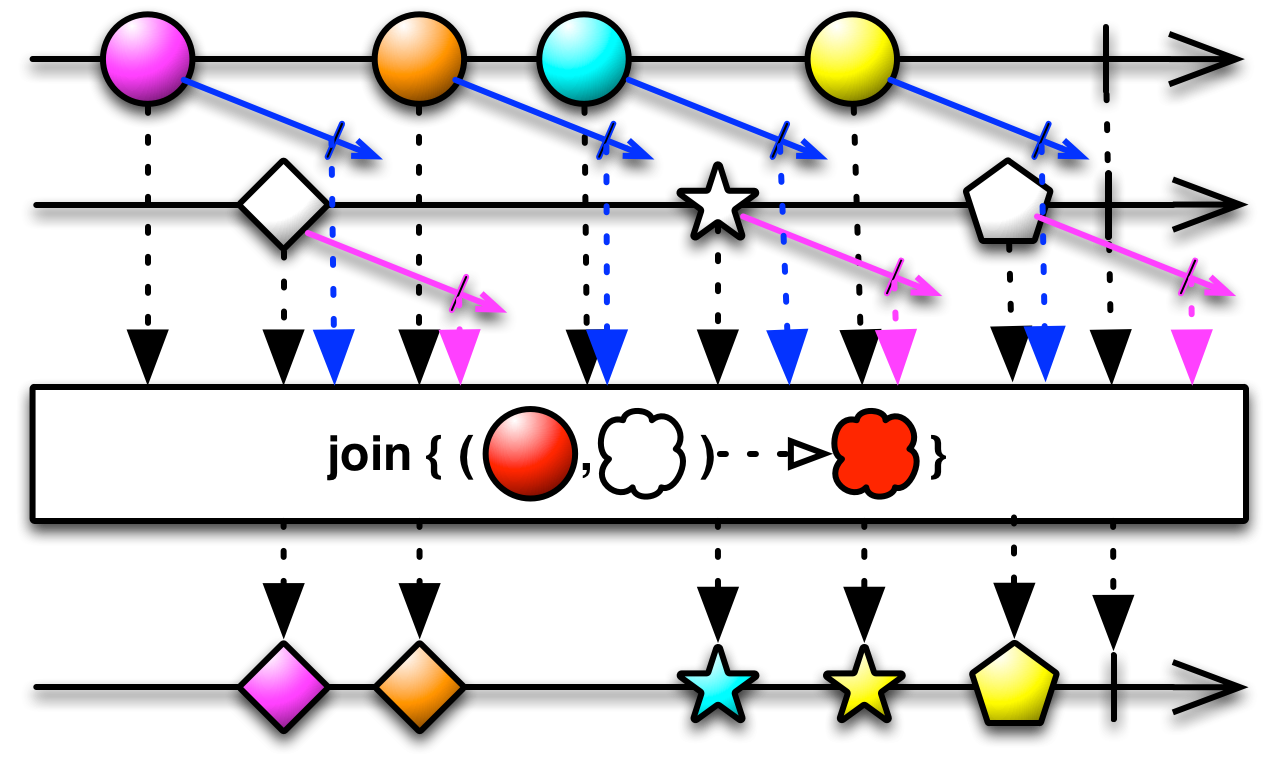
- Scheduler:
joindoes not operate by default on a particularScheduler.
- Type Parameters:
TRight- the value type of the right ObservableSource sourceTLeftEnd- the element type of the left duration ObservableSourcesTRightEnd- the element type of the right duration ObservableSourcesR- the result type- Parameters:
other- the second ObservableSource to join items fromleftEnd- a function to select a duration for each item emitted by the source ObservableSource, used to determine overlaprightEnd- a function to select a duration for each item emitted by therightObservableSource, used to determine overlapresultSelector- a function that computes an item to be emitted by the resulting ObservableSource for any two overlapping items emitted by the two ObservableSources- Returns:
- an Observable that emits items correlating to items emitted by the source ObservableSources that have overlapping durations
- See Also:
- ReactiveX operators documentation: Join
-
lastElement
@CheckReturnValue @SchedulerSupport(value="none") public final Maybe<T> lastElement()
Returns a Maybe that emits the last item emitted by this Observable or completes if this Observable is empty.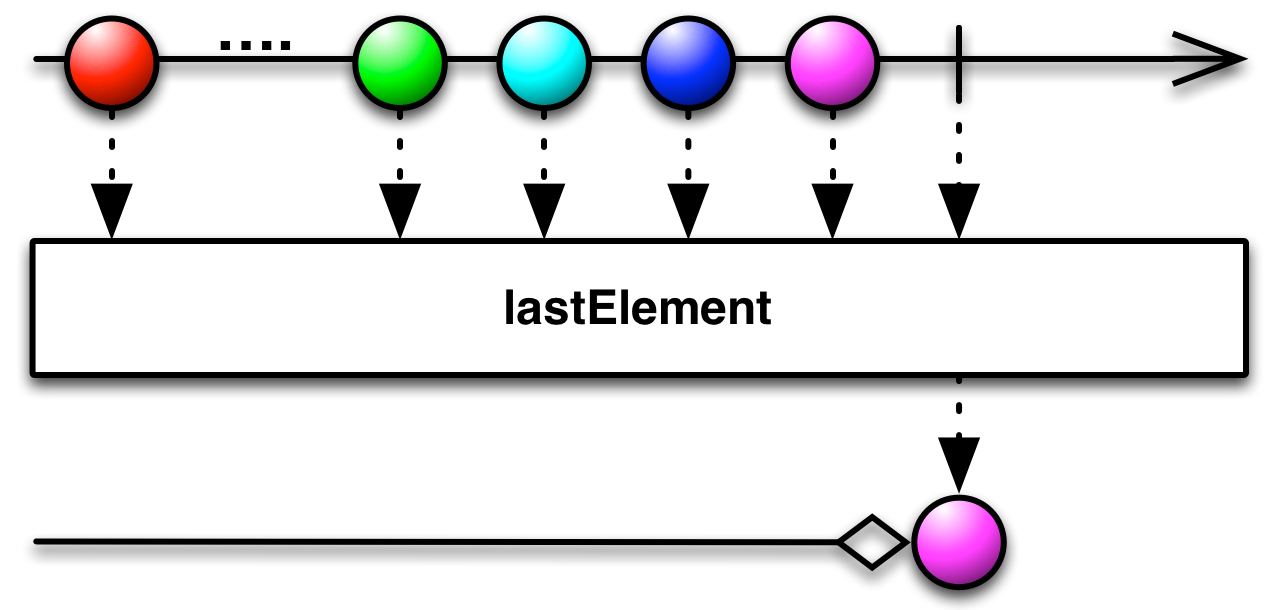
- Scheduler:
lastElementdoes not operate by default on a particularScheduler.
- Returns:
- a Maybe that emits the last item from the source ObservableSource or notifies observers of an error
- See Also:
- ReactiveX operators documentation: Last
-
last
@CheckReturnValue @SchedulerSupport(value="none") public final Single<T> last(T defaultItem)
Returns a Single that emits only the last item emitted by this Observable, or a default item if this Observable completes without emitting any items.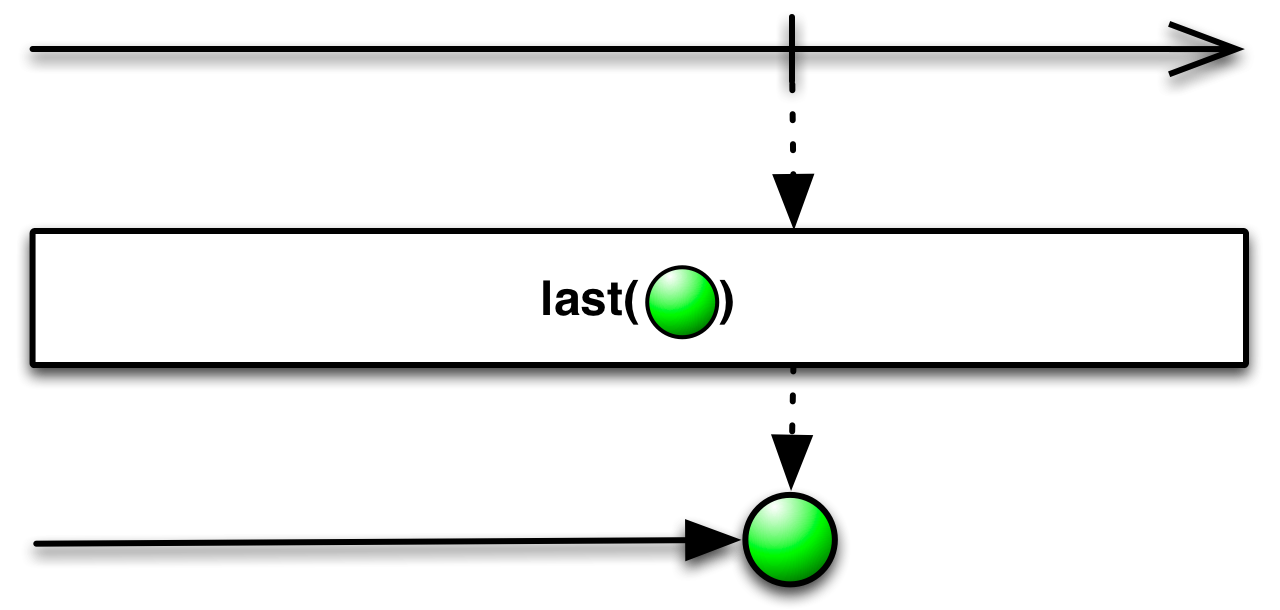
- Scheduler:
lastdoes not operate by default on a particularScheduler.
- Parameters:
defaultItem- the default item to emit if the source ObservableSource is empty- Returns:
- a Single that emits only the last item emitted by the source ObservableSource, or a default item if the source ObservableSource is empty
- See Also:
- ReactiveX operators documentation: Last
-
lastOrError
@CheckReturnValue @SchedulerSupport(value="none") public final Single<T> lastOrError()
Returns a Single that emits only the last item emitted by this Observable or signals aNoSuchElementExceptionif this Observable is empty.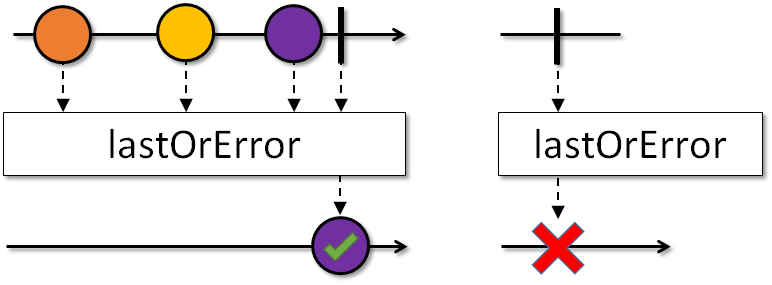
- Scheduler:
lastOrErrordoes not operate by default on a particularScheduler.
- Returns:
- a Single that emits only the last item emitted by the source ObservableSource.
If the source ObservableSource completes without emitting any items a
NoSuchElementExceptionwill be thrown. - See Also:
- ReactiveX operators documentation: Last
-
lift
@CheckReturnValue @SchedulerSupport(value="none") public final <R> Observable<R> lift(ObservableOperator<? extends R,? super T> lifter)
This method requires advanced knowledge about building operators, please consider other standard composition methods first; Returns anObservablewhich, when subscribed to, invokes theapply(Observer)method of the providedObservableOperatorfor each individual downstreamObserverand allows the insertion of a custom operator by accessing the downstream'sObserverduring this subscription phase and providing a newObserver, containing the custom operator's intended business logic, that will be used in the subscription process going further upstream.Generally, such a new
Observerwill wrap the downstream'sObserverand forwards theonNext,onErrorandonCompleteevents from the upstream directly or according to the emission pattern the custom operator's business logic requires. In addition, such operator can intercept the flow control calls ofdisposeandisDisposedthat would have traveled upstream and perform additional actions depending on the same business logic requirements.Example:
// Step 1: Create the consumer type that will be returned by the ObservableOperator.apply(): public final class CustomObserver<T> implements Observer<T>, Disposable { // The downstream's Observer that will receive the onXXX events final Observer<? super String> downstream; // The connection to the upstream source that will call this class' onXXX methods Disposable upstream; // The constructor takes the downstream subscriber and usually any other parameters public CustomObserver(Observer<? super String> downstream) { this.downstream = downstream; } // In the subscription phase, the upstream sends a Disposable to this class // and subsequently this class has to send a Disposable to the downstream. // Note that relaying the upstream's Disposable directly is not allowed in RxJava @Override public void onSubscribe(Disposable d) { if (upstream != null) { d.dispose(); } else { upstream = d; downstream.onSubscribe(this); } } // The upstream calls this with the next item and the implementation's // responsibility is to emit an item to the downstream based on the intended // business logic, or if it can't do so for the particular item, // request more from the upstream @Override public void onNext(T item) { String str = item.toString(); if (str.length() < 2) { downstream.onNext(str); } // Observable doesn't support backpressure, therefore, there is no // need or opportunity to call upstream.request(1) if an item // is not produced to the downstream } // Some operators may handle the upstream's error while others // could just forward it to the downstream. @Override public void onError(Throwable throwable) { downstream.onError(throwable); } // When the upstream completes, usually the downstream should complete as well. @Override public void onComplete() { downstream.onComplete(); } // Some operators may use their own resources which should be cleaned up if // the downstream disposes the flow before it completed. Operators without // resources can simply forward the dispose to the upstream. // In some cases, a disposed flag may be set by this method so that other parts // of this class may detect the dispose and stop sending events // to the downstream. @Override public void dispose() { upstream.dispose(); } // Some operators may simply forward the call to the upstream while others // can return the disposed flag set in dispose(). @Override public boolean isDisposed() { return upstream.isDisposed(); } } // Step 2: Create a class that implements the ObservableOperator interface and // returns the custom consumer type from above in its apply() method. // Such class may define additional parameters to be submitted to // the custom consumer type. final class CustomOperator<T> implements ObservableOperator<String, T> { @Override public Observer<T> apply(Observer<? super String> downstream) { return new CustomObserver<T>(downstream); } } // Step 3: Apply the custom operator via lift() in a flow by creating an instance of it // or reusing an existing one. Observable.range(5, 10) .lift(new CustomOperator<Integer>()) .test() .assertResult("5", "6", "7", "8", "9");Creating custom operators can be complicated and it is recommended one consults the RxJava wiki: Writing operators page about the tools, requirements, rules, considerations and pitfalls of implementing them.
Note that implementing custom operators via this
lift()method adds slightly more overhead by requiring an additional allocation and indirection per assembled flows. Instead, extending the abstractObservableclass and creating anObservableTransformerwith it is recommended.Note also that it is not possible to stop the subscription phase in
lift()as theapply()method requires a non-nullObserverinstance to be returned, which is then unconditionally subscribed to the upstreamObservable. For example, if the operator decided there is no reason to subscribe to the upstream source because of some optimization possibility or a failure to prepare the operator, it still has to return anObserverthat should immediately dispose the upstream'sDisposablein itsonSubscribemethod. Again, using anObservableTransformerand extending theObservableis a better option assubscribeActual(io.reactivex.Observer<? super T>)can decide to not subscribe to its upstream after all.- Scheduler:
liftdoes not operate by default on a particularScheduler, however, theObservableOperatormay use aSchedulerto support its own asynchronous behavior.
- Type Parameters:
R- the output value type- Parameters:
lifter- theObservableOperatorthat receives the downstream'sObserverand should return anObserverwith custom behavior to be used as the consumer for the currentObservable.- Returns:
- the new Observable instance
- See Also:
- RxJava wiki: Writing operators,
compose(ObservableTransformer)
-
map
@CheckReturnValue @SchedulerSupport(value="none") public final <R> Observable<R> map(Function<? super T,? extends R> mapper)
Returns an Observable that applies a specified function to each item emitted by the source ObservableSource and emits the results of these function applications.
- Scheduler:
mapdoes not operate by default on a particularScheduler.
- Type Parameters:
R- the output type- Parameters:
mapper- a function to apply to each item emitted by the ObservableSource- Returns:
- an Observable that emits the items from the source ObservableSource, transformed by the specified function
- See Also:
- ReactiveX operators documentation: Map
-
materialize
@CheckReturnValue @SchedulerSupport(value="none") public final Observable<Notification<T>> materialize()
Returns an Observable that represents all of the emissions and notifications from the source ObservableSource into emissions marked with their original types withinNotificationobjects.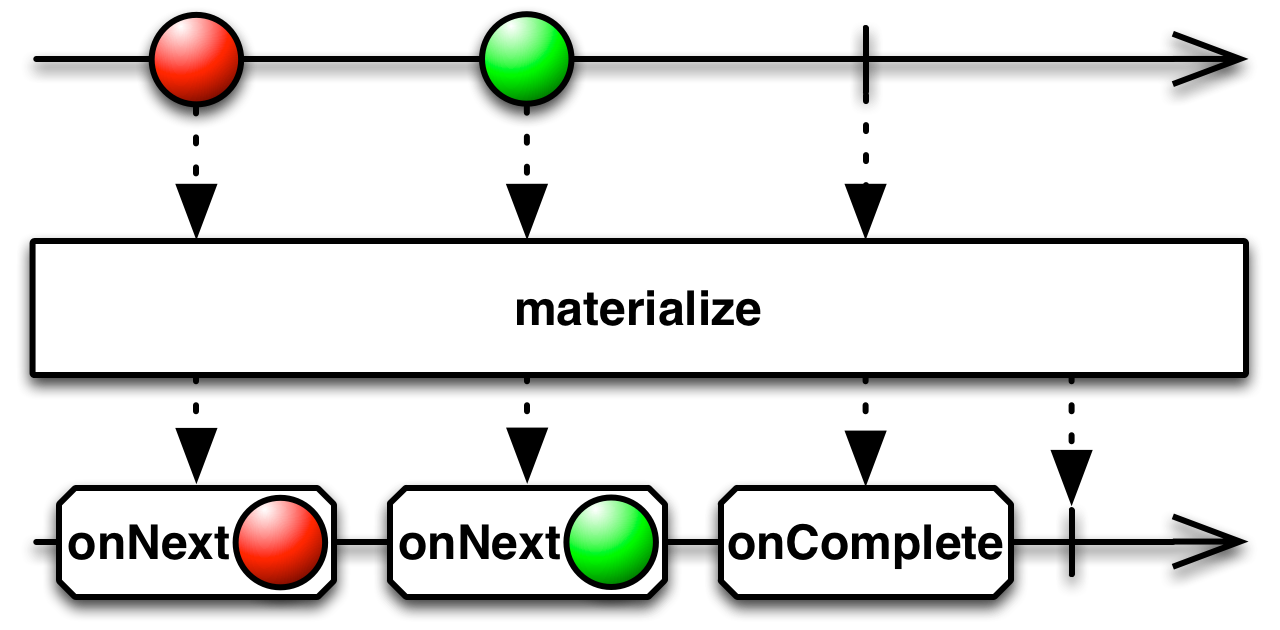
- Scheduler:
materializedoes not operate by default on a particularScheduler.
- Returns:
- an Observable that emits items that are the result of materializing the items and notifications of the source ObservableSource
- See Also:
- ReactiveX operators documentation: Materialize,
dematerialize(Function)
-
mergeWith
@CheckReturnValue @SchedulerSupport(value="none") public final Observable<T> mergeWith(ObservableSource<? extends T> other)
Flattens this and another ObservableSource into a single ObservableSource, without any transformation.
You can combine items emitted by multiple ObservableSources so that they appear as a single ObservableSource, by using the
mergeWithmethod.- Scheduler:
mergeWithdoes not operate by default on a particularScheduler.
- Parameters:
other- an ObservableSource to be merged- Returns:
- an Observable that emits all of the items emitted by the source ObservableSources
- See Also:
- ReactiveX operators documentation: Merge
-
mergeWith
@CheckReturnValue @SchedulerSupport(value="none") public final Observable<T> mergeWith(@NonNull SingleSource<? extends T> other)
Merges the sequence of items of this Observable with the success value of the other SingleSource.
The success value of the other
SingleSourcecan get interleaved at any point of thisObservablesequence.- Scheduler:
mergeWithdoes not operate by default on a particularScheduler.
History: 2.1.10 - experimental
- Parameters:
other- theSingleSourcewhose success value to merge with- Returns:
- the new Observable instance
- Since:
- 2.2
-
mergeWith
@CheckReturnValue @SchedulerSupport(value="none") public final Observable<T> mergeWith(@NonNull MaybeSource<? extends T> other)
Merges the sequence of items of this Observable with the success value of the other MaybeSource or waits both to complete normally if the MaybeSource is empty.
The success value of the other
MaybeSourcecan get interleaved at any point of thisObservablesequence.- Scheduler:
mergeWithdoes not operate by default on a particularScheduler.
History: 2.1.10 - experimental
- Parameters:
other- theMaybeSourcewhich provides a success value to merge with or completes- Returns:
- the new Observable instance
- Since:
- 2.2
-
mergeWith
@CheckReturnValue @SchedulerSupport(value="none") public final Observable<T> mergeWith(@NonNull CompletableSource other)
Relays the items of this Observable and completes only when the other CompletableSource completes as well.
- Scheduler:
mergeWithdoes not operate by default on a particularScheduler.
History: 2.1.10 - experimental
- Parameters:
other- theCompletableSourceto await for completion- Returns:
- the new Observable instance
- Since:
- 2.2
-
observeOn
@CheckReturnValue @SchedulerSupport(value="custom") public final Observable<T> observeOn(Scheduler scheduler)
Modifies an ObservableSource to perform its emissions and notifications on a specifiedScheduler, asynchronously with an unbounded buffer withFlowable.bufferSize()"island size".Note that onError notifications will cut ahead of onNext notifications on the emission thread if Scheduler is truly asynchronous. If strict event ordering is required, consider using the
observeOn(Scheduler, boolean)overload.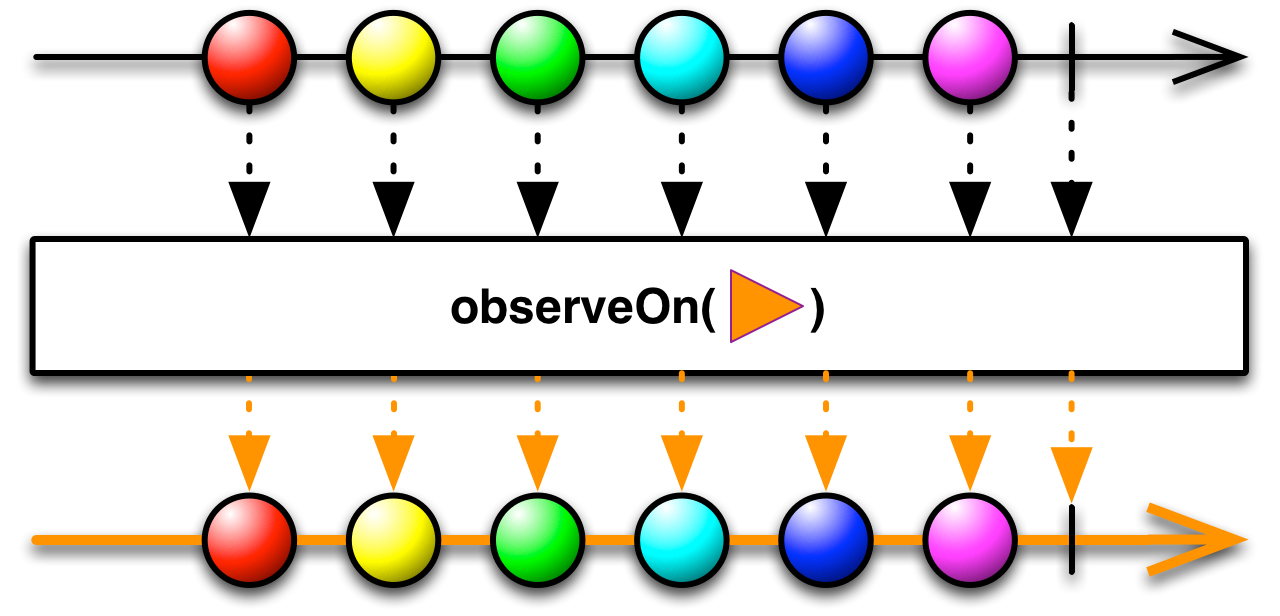
This operator keeps emitting as many signals as it can on the given Scheduler's Worker thread, which may result in a longer than expected occupation of this thread. In other terms, it does not allow per-signal fairness in case the worker runs on a shared underlying thread. If such fairness and signal/work interleaving is preferred, use the delay operator with zero time instead.
- Scheduler:
- You specify which
Schedulerthis operator will use.
"Island size" indicates how large chunks the unbounded buffer allocates to store the excess elements waiting to be consumed on the other side of the asynchronous boundary.
- Parameters:
scheduler- theSchedulerto notifyObservers on- Returns:
- the source ObservableSource modified so that its
Observers are notified on the specifiedScheduler - See Also:
- ReactiveX operators documentation: ObserveOn,
RxJava Threading Examples,
subscribeOn(io.reactivex.Scheduler),observeOn(Scheduler, boolean),observeOn(Scheduler, boolean, int),delay(long, TimeUnit, Scheduler)
-
observeOn
@CheckReturnValue @SchedulerSupport(value="custom") public final Observable<T> observeOn(Scheduler scheduler, boolean delayError)
Modifies an ObservableSource to perform its emissions and notifications on a specifiedScheduler, asynchronously with an unbounded buffer withFlowable.bufferSize()"island size" and optionally delays onError notifications.
This operator keeps emitting as many signals as it can on the given Scheduler's Worker thread, which may result in a longer than expected occupation of this thread. In other terms, it does not allow per-signal fairness in case the worker runs on a shared underlying thread. If such fairness and signal/work interleaving is preferred, use the delay operator with zero time instead.
- Scheduler:
- You specify which
Schedulerthis operator will use.
"Island size" indicates how large chunks the unbounded buffer allocates to store the excess elements waiting to be consumed on the other side of the asynchronous boundary.
- Parameters:
scheduler- theSchedulerto notifyObservers ondelayError- indicates if the onError notification may not cut ahead of onNext notification on the other side of the scheduling boundary. If true a sequence ending in onError will be replayed in the same order as was received from upstream- Returns:
- the source ObservableSource modified so that its
Observers are notified on the specifiedScheduler - See Also:
- ReactiveX operators documentation: ObserveOn,
RxJava Threading Examples,
subscribeOn(io.reactivex.Scheduler),observeOn(Scheduler),observeOn(Scheduler, boolean, int),delay(long, TimeUnit, Scheduler, boolean)
-
observeOn
@CheckReturnValue @SchedulerSupport(value="custom") public final Observable<T> observeOn(Scheduler scheduler, boolean delayError, int bufferSize)
Modifies an ObservableSource to perform its emissions and notifications on a specifiedScheduler, asynchronously with an unbounded buffer of configurable "island size" and optionally delays onError notifications.
This operator keeps emitting as many signals as it can on the given Scheduler's Worker thread, which may result in a longer than expected occupation of this thread. In other terms, it does not allow per-signal fairness in case the worker runs on a shared underlying thread. If such fairness and signal/work interleaving is preferred, use the delay operator with zero time instead.
- Scheduler:
- You specify which
Schedulerthis operator will use.
"Island size" indicates how large chunks the unbounded buffer allocates to store the excess elements waiting to be consumed on the other side of the asynchronous boundary. Values below 16 are not recommended in performance sensitive scenarios.
- Parameters:
scheduler- theSchedulerto notifyObservers ondelayError- indicates if the onError notification may not cut ahead of onNext notification on the other side of the scheduling boundary. If true a sequence ending in onError will be replayed in the same order as was received from upstreambufferSize- the size of the buffer.- Returns:
- the source ObservableSource modified so that its
Observers are notified on the specifiedScheduler - See Also:
- ReactiveX operators documentation: ObserveOn,
RxJava Threading Examples,
subscribeOn(io.reactivex.Scheduler),observeOn(Scheduler),observeOn(Scheduler, boolean),delay(long, TimeUnit, Scheduler, boolean)
-
ofType
@CheckReturnValue @SchedulerSupport(value="none") public final <U> Observable<U> ofType(Class<U> clazz)
Filters the items emitted by an ObservableSource, only emitting those of the specified type.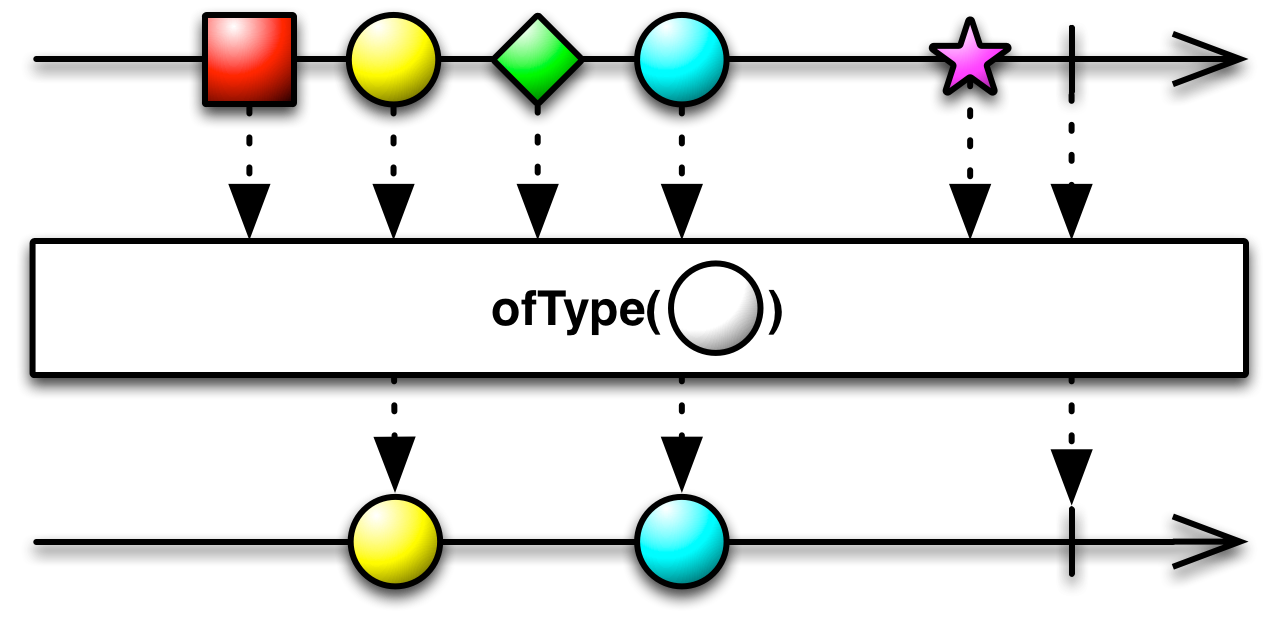
- Scheduler:
ofTypedoes not operate by default on a particularScheduler.
- Type Parameters:
U- the output type- Parameters:
clazz- the class type to filter the items emitted by the source ObservableSource- Returns:
- an Observable that emits items from the source ObservableSource of type
clazz - See Also:
- ReactiveX operators documentation: Filter
-
onErrorResumeNext
@CheckReturnValue @SchedulerSupport(value="none") public final Observable<T> onErrorResumeNext(Function<? super Throwable,? extends ObservableSource<? extends T>> resumeFunction)
Instructs an ObservableSource to pass control to another ObservableSource rather than invokingonErrorif it encounters an error.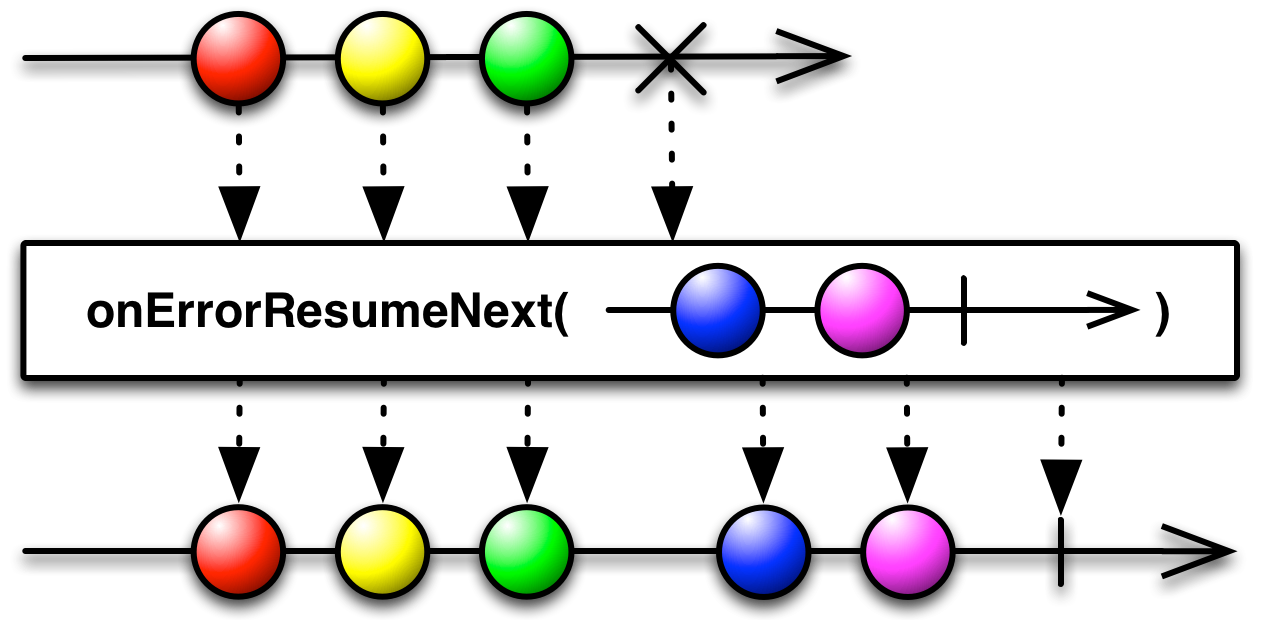
By default, when an ObservableSource encounters an error that prevents it from emitting the expected item to its
Observer, the ObservableSource invokes its Observer'sonErrormethod, and then quits without invoking any more of its Observer's methods. TheonErrorResumeNextmethod changes this behavior. If you pass a function that returns an ObservableSource (resumeFunction) toonErrorResumeNext, if the original ObservableSource encounters an error, instead of invoking its Observer'sonErrormethod, it will instead relinquish control to the ObservableSource returned fromresumeFunction, which will invoke the Observer'sonNextmethod if it is able to do so. In such a case, because no ObservableSource necessarily invokesonError, the Observer may never know that an error happened.You can use this to prevent errors from propagating or to supply fallback data should errors be encountered.
- Scheduler:
onErrorResumeNextdoes not operate by default on a particularScheduler.
- Parameters:
resumeFunction- a function that returns an ObservableSource that will take over if the source ObservableSource encounters an error- Returns:
- the original ObservableSource, with appropriately modified behavior
- See Also:
- ReactiveX operators documentation: Catch
-
onErrorResumeNext
@CheckReturnValue @SchedulerSupport(value="none") public final Observable<T> onErrorResumeNext(ObservableSource<? extends T> next)
Instructs an ObservableSource to pass control to another ObservableSource rather than invokingonErrorif it encounters an error.
By default, when an ObservableSource encounters an error that prevents it from emitting the expected item to its
Observer, the ObservableSource invokes its Observer'sonErrormethod, and then quits without invoking any more of its Observer's methods. TheonErrorResumeNextmethod changes this behavior. If you pass another ObservableSource (resumeSequence) to an ObservableSource'sonErrorResumeNextmethod, if the original ObservableSource encounters an error, instead of invoking its Observer'sonErrormethod, it will instead relinquish control toresumeSequencewhich will invoke the Observer'sonNextmethod if it is able to do so. In such a case, because no ObservableSource necessarily invokesonError, the Observer may never know that an error happened.You can use this to prevent errors from propagating or to supply fallback data should errors be encountered.
- Scheduler:
onErrorResumeNextdoes not operate by default on a particularScheduler.
- Parameters:
next- the next ObservableSource source that will take over if the source ObservableSource encounters an error- Returns:
- the original ObservableSource, with appropriately modified behavior
- See Also:
- ReactiveX operators documentation: Catch
-
onErrorReturn
@CheckReturnValue @SchedulerSupport(value="none") public final Observable<T> onErrorReturn(Function<? super Throwable,? extends T> valueSupplier)
Instructs an ObservableSource to emit an item (returned by a specified function) rather than invokingonErrorif it encounters an error.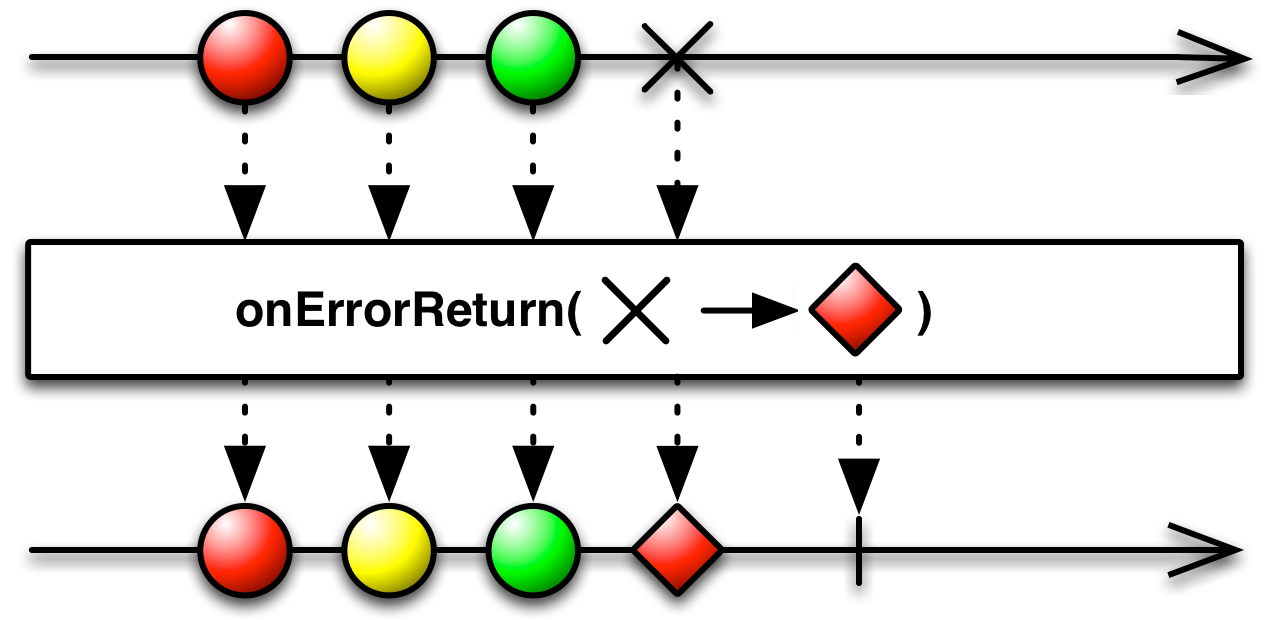
By default, when an ObservableSource encounters an error that prevents it from emitting the expected item to its
Observer, the ObservableSource invokes its Observer'sonErrormethod, and then quits without invoking any more of its Observer's methods. TheonErrorReturnmethod changes this behavior. If you pass a function (resumeFunction) to an ObservableSource'sonErrorReturnmethod, if the original ObservableSource encounters an error, instead of invoking its Observer'sonErrormethod, it will instead emit the return value ofresumeFunction.You can use this to prevent errors from propagating or to supply fallback data should errors be encountered.
- Scheduler:
onErrorReturndoes not operate by default on a particularScheduler.
- Parameters:
valueSupplier- a function that returns a single value that will be emitted along with a regular onComplete in case the current Observable signals an onError event- Returns:
- the original ObservableSource with appropriately modified behavior
- See Also:
- ReactiveX operators documentation: Catch
-
onErrorReturnItem
@CheckReturnValue @SchedulerSupport(value="none") public final Observable<T> onErrorReturnItem(T item)
Instructs an ObservableSource to emit an item (returned by a specified function) rather than invokingonErrorif it encounters an error.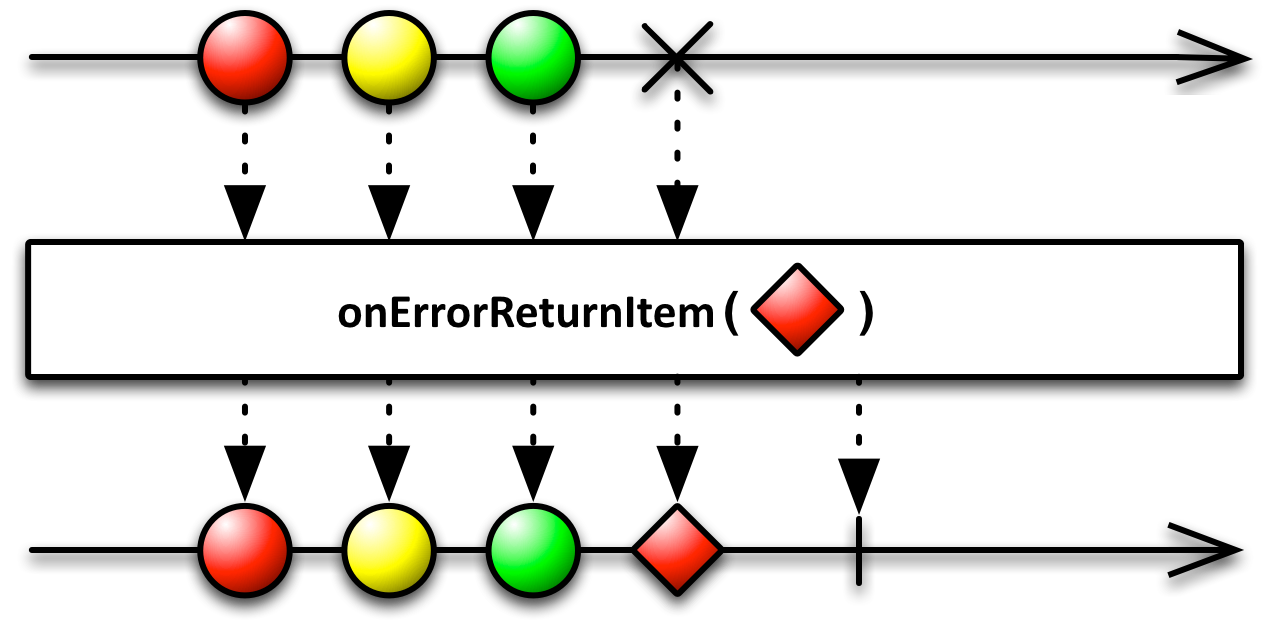
By default, when an ObservableSource encounters an error that prevents it from emitting the expected item to its
Observer, the ObservableSource invokes its Observer'sonErrormethod, and then quits without invoking any more of its Observer's methods. TheonErrorReturnmethod changes this behavior. If you pass a function (resumeFunction) to an ObservableSource'sonErrorReturnmethod, if the original ObservableSource encounters an error, instead of invoking its Observer'sonErrormethod, it will instead emit the return value ofresumeFunction.You can use this to prevent errors from propagating or to supply fallback data should errors be encountered.
- Scheduler:
onErrorReturnItemdoes not operate by default on a particularScheduler.
- Parameters:
item- the value that is emitted along with a regular onComplete in case the current Observable signals an exception- Returns:
- the original ObservableSource with appropriately modified behavior
- See Also:
- ReactiveX operators documentation: Catch
-
onExceptionResumeNext
@CheckReturnValue @SchedulerSupport(value="none") public final Observable<T> onExceptionResumeNext(ObservableSource<? extends T> next)
Instructs an ObservableSource to pass control to another ObservableSource rather than invokingonErrorif it encounters anException.This differs from
onErrorResumeNext(io.reactivex.functions.Function<? super java.lang.Throwable, ? extends io.reactivex.ObservableSource<? extends T>>)in that this one does not handleThrowableorErrorbut lets those continue through.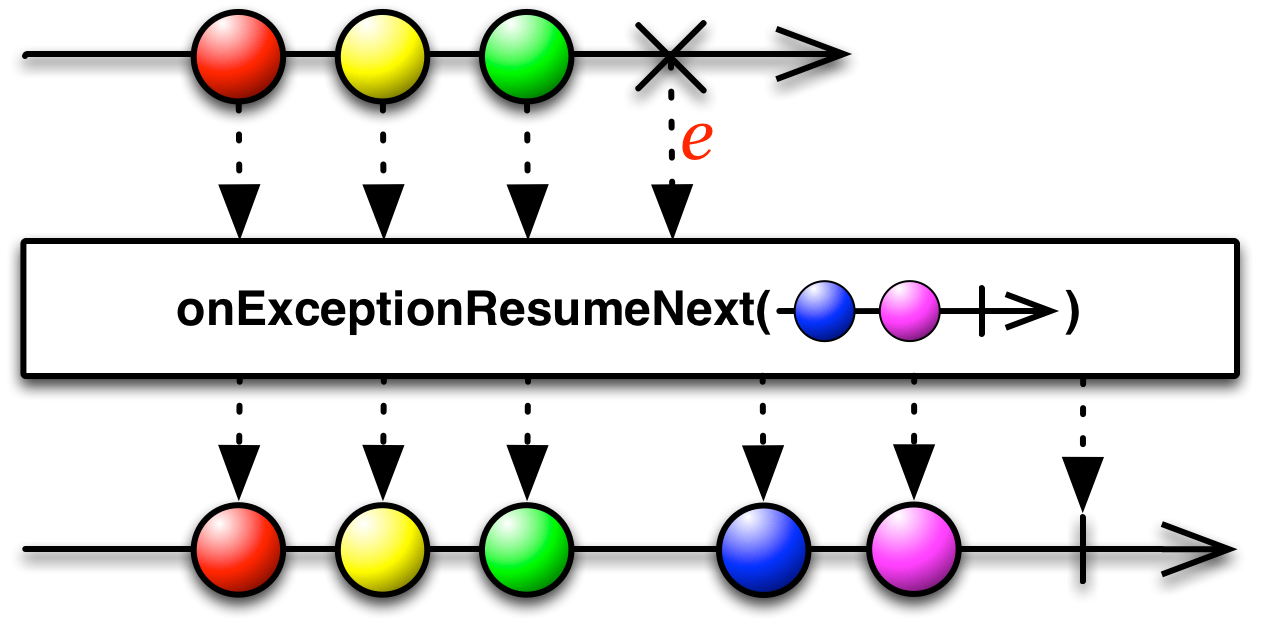
By default, when an ObservableSource encounters an exception that prevents it from emitting the expected item to its
Observer, the ObservableSource invokes its Observer'sonErrormethod, and then quits without invoking any more of its Observer's methods. TheonExceptionResumeNextmethod changes this behavior. If you pass another ObservableSource (resumeSequence) to an ObservableSource'sonExceptionResumeNextmethod, if the original ObservableSource encounters an exception, instead of invoking its Observer'sonErrormethod, it will instead relinquish control toresumeSequencewhich will invoke the Observer'sonNextmethod if it is able to do so. In such a case, because no ObservableSource necessarily invokesonError, the Observer may never know that an exception happened.You can use this to prevent exceptions from propagating or to supply fallback data should exceptions be encountered.
- Scheduler:
onExceptionResumeNextdoes not operate by default on a particularScheduler.
- Parameters:
next- the next ObservableSource that will take over if the source ObservableSource encounters an exception- Returns:
- the original ObservableSource, with appropriately modified behavior
- See Also:
- ReactiveX operators documentation: Catch
-
onTerminateDetach
@CheckReturnValue @SchedulerSupport(value="none") public final Observable<T> onTerminateDetach()
Nulls out references to the upstream producer and downstream Observer if the sequence is terminated or downstream calls dispose().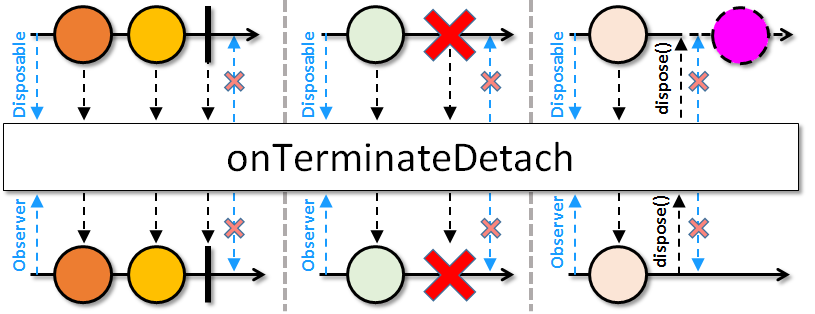
- Scheduler:
onTerminateDetachdoes not operate by default on a particularScheduler.
- Returns:
- an Observable which nulls out references to the upstream producer and downstream Observer if the sequence is terminated or downstream calls dispose()
- Since:
- 2.0
-
publish
@CheckReturnValue @SchedulerSupport(value="none") public final ConnectableObservable<T> publish()
Returns aConnectableObservable, which is a variety of ObservableSource that waits until itsconnectmethod is called before it begins emitting items to thoseObservers that have subscribed to it.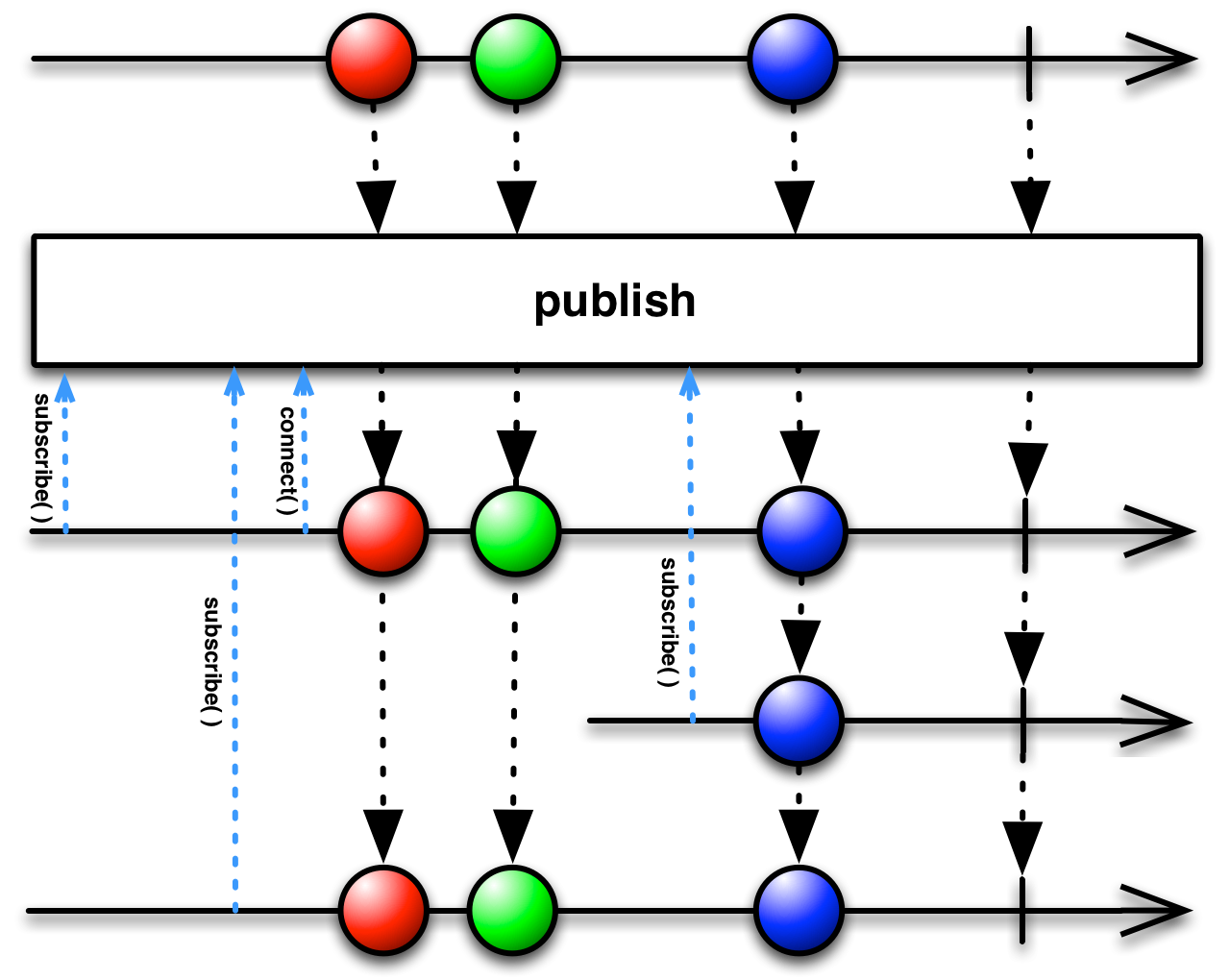
- Scheduler:
publishdoes not operate by default on a particularScheduler.
- Returns:
- a
ConnectableObservablethat upon connection causes the source ObservableSource to emit items to itsObservers - See Also:
- ReactiveX operators documentation: Publish
-
publish
@CheckReturnValue @SchedulerSupport(value="none") public final <R> Observable<R> publish(Function<? super Observable<T>,? extends ObservableSource<R>> selector)
Returns an Observable that emits the results of invoking a specified selector on items emitted by aConnectableObservablethat shares a single subscription to the underlying sequence.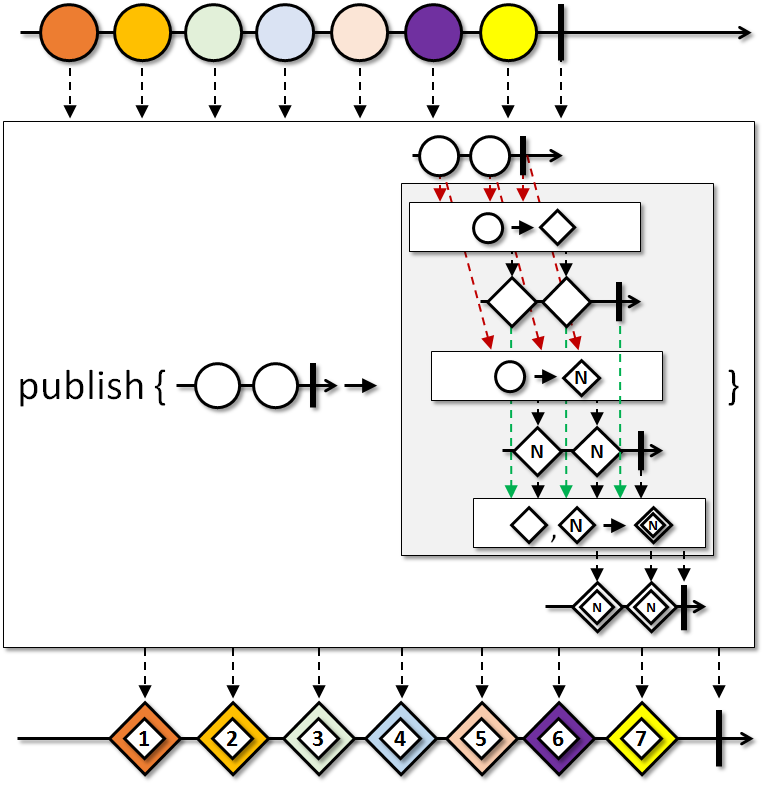
- Scheduler:
publishdoes not operate by default on a particularScheduler.
- Type Parameters:
R- the type of items emitted by the resulting ObservableSource- Parameters:
selector- a function that can use the multicasted source sequence as many times as needed, without causing multiple subscriptions to the source sequence. Observers to the given source will receive all notifications of the source from the time of the subscription forward.- Returns:
- an Observable that emits the results of invoking the selector on the items emitted by a
ConnectableObservablethat shares a single subscription to the underlying sequence - See Also:
- ReactiveX operators documentation: Publish
-
reduce
@CheckReturnValue @SchedulerSupport(value="none") public final Maybe<T> reduce(BiFunction<T,T,T> reducer)
Returns a Maybe that applies a specified accumulator function to the first item emitted by a source ObservableSource, then feeds the result of that function along with the second item emitted by the source ObservableSource into the same function, and so on until all items have been emitted by the finite source ObservableSource, and emits the final result from the final call to your function as its sole item.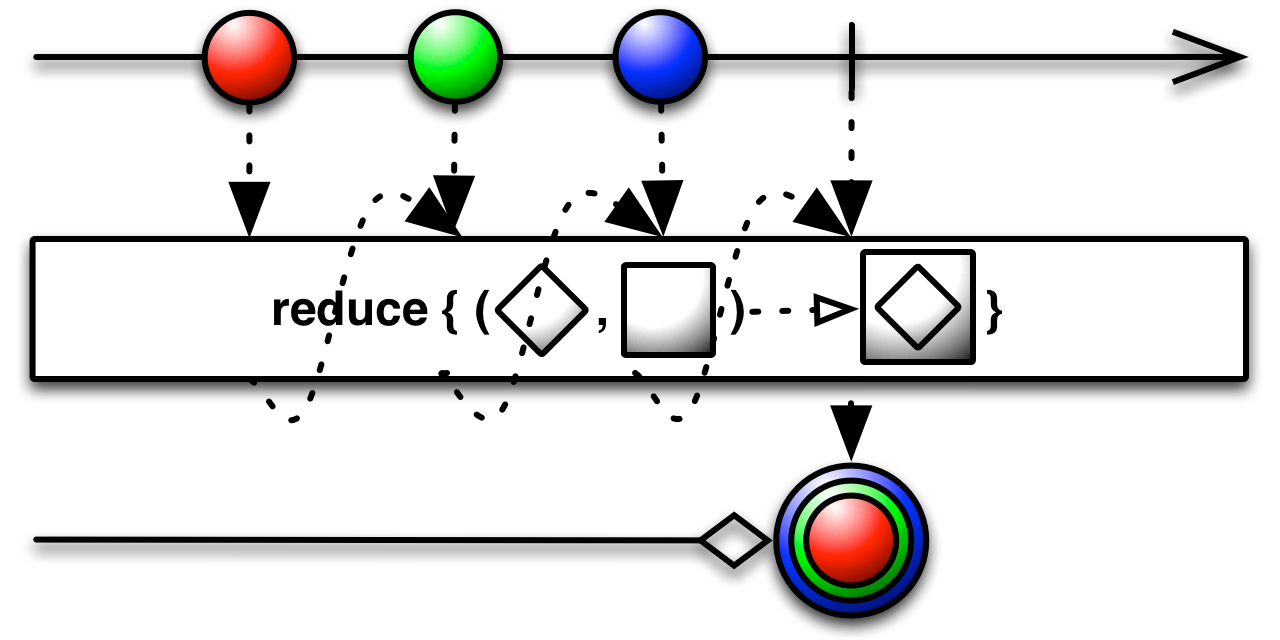
This technique, which is called "reduce" here, is sometimes called "aggregate," "fold," "accumulate," "compress," or "inject" in other programming contexts. Groovy, for instance, has an
injectmethod that does a similar operation on lists.Note that this operator requires the upstream to signal
onCompletefor the accumulator object to be emitted. Sources that are infinite and never complete will never emit anything through this operator and an infinite source may lead to a fatalOutOfMemoryError.- Scheduler:
reducedoes not operate by default on a particularScheduler.
- Parameters:
reducer- an accumulator function to be invoked on each item emitted by the source ObservableSource, whose result will be used in the next accumulator call- Returns:
- a Maybe that emits a single item that is the result of accumulating the items emitted by the source ObservableSource
- See Also:
- ReactiveX operators documentation: Reduce, Wikipedia: Fold (higher-order function)
-
reduce
@CheckReturnValue @SchedulerSupport(value="none") public final <R> Single<R> reduce(R seed, BiFunction<R,? super T,R> reducer)
Returns a Single that applies a specified accumulator function to the first item emitted by a source ObservableSource and a specified seed value, then feeds the result of that function along with the second item emitted by an ObservableSource into the same function, and so on until all items have been emitted by the finite source ObservableSource, emitting the final result from the final call to your function as its sole item.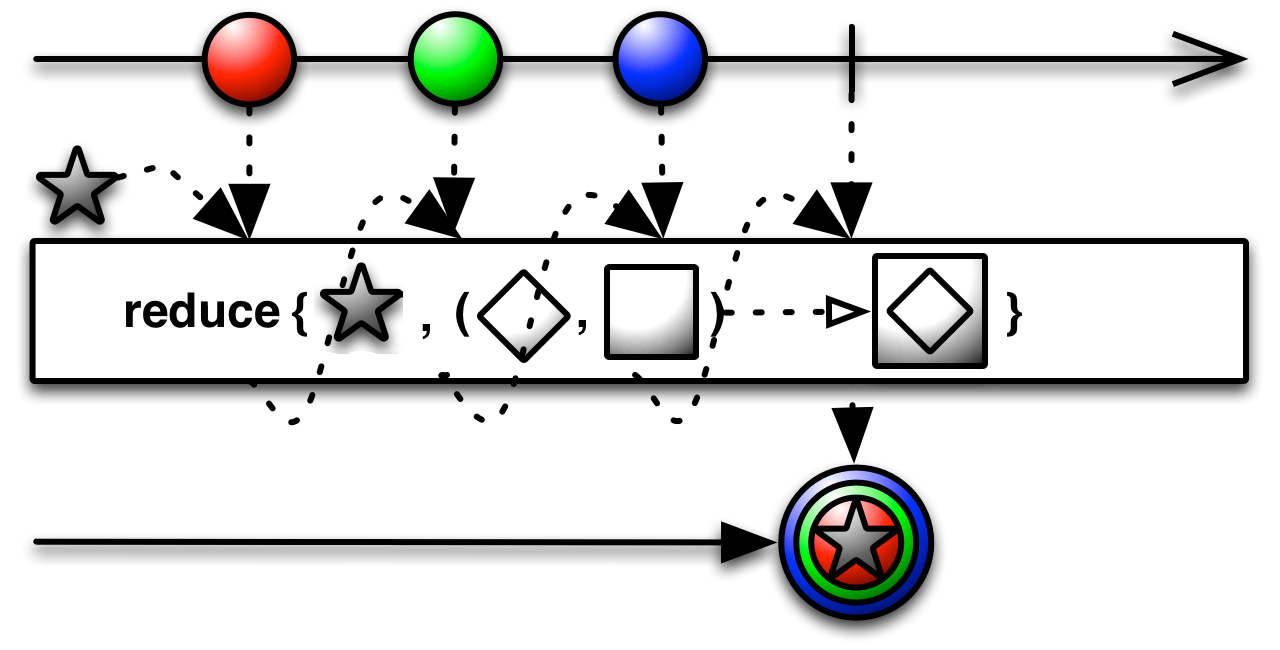
This technique, which is called "reduce" here, is sometimes called "aggregate," "fold," "accumulate," "compress," or "inject" in other programming contexts. Groovy, for instance, has an
injectmethod that does a similar operation on lists.Note that the
seedis shared among all subscribers to the resulting ObservableSource and may cause problems if it is mutable. To make sure each subscriber gets its own value, defer the application of this operator viadefer(Callable):ObservableSource<T> source = ... Single.defer(() -> source.reduce(new ArrayList<>(), (list, item) -> list.add(item))); // alternatively, by using compose to stay fluent source.compose(o -> Observable.defer(() -> o.reduce(new ArrayList<>(), (list, item) -> list.add(item)).toObservable()) ).firstOrError(); // or, by using reduceWith instead of reduce source.reduceWith(() -> new ArrayList<>(), (list, item) -> list.add(item)));Note that this operator requires the upstream to signal
onCompletefor the accumulator object to be emitted. Sources that are infinite and never complete will never emit anything through this operator and an infinite source may lead to a fatalOutOfMemoryError.- Scheduler:
reducedoes not operate by default on a particularScheduler.
- Type Parameters:
R- the accumulator and output value type- Parameters:
seed- the initial (seed) accumulator valuereducer- an accumulator function to be invoked on each item emitted by the source ObservableSource, the result of which will be used in the next accumulator call- Returns:
- a Single that emits a single item that is the result of accumulating the output from the items emitted by the source ObservableSource
- See Also:
- ReactiveX operators documentation: Reduce,
Wikipedia: Fold (higher-order function),
reduceWith(Callable, BiFunction)
-
reduceWith
@CheckReturnValue @SchedulerSupport(value="none") public final <R> Single<R> reduceWith(Callable<R> seedSupplier, BiFunction<R,? super T,R> reducer)
Returns a Single that applies a specified accumulator function to the first item emitted by a source ObservableSource and a seed value derived from calling a specified seedSupplier, then feeds the result of that function along with the second item emitted by an ObservableSource into the same function, and so on until all items have been emitted by the finite source ObservableSource, emitting the final result from the final call to your function as its sole item.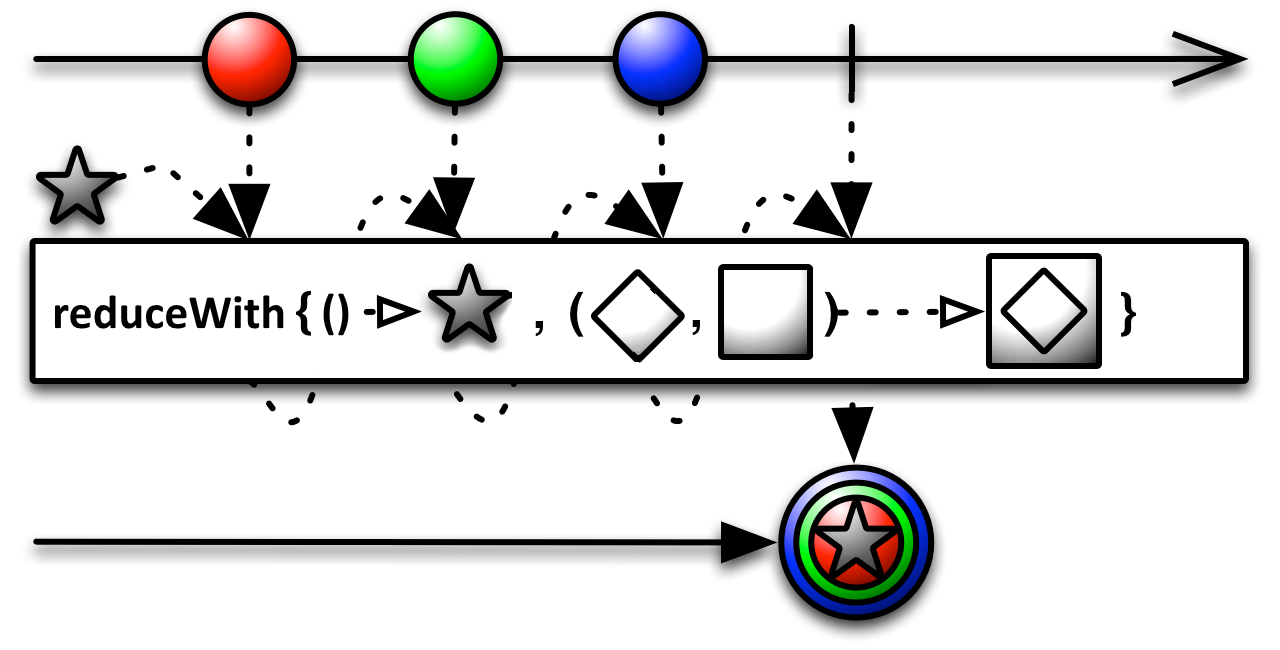
This technique, which is called "reduce" here, is sometimes called "aggregate," "fold," "accumulate," "compress," or "inject" in other programming contexts. Groovy, for instance, has an
injectmethod that does a similar operation on lists.Note that this operator requires the upstream to signal
onCompletefor the accumulator object to be emitted. Sources that are infinite and never complete will never emit anything through this operator and an infinite source may lead to a fatalOutOfMemoryError.- Scheduler:
reduceWithdoes not operate by default on a particularScheduler.
- Type Parameters:
R- the accumulator and output value type- Parameters:
seedSupplier- the Callable that provides the initial (seed) accumulator value for each individual Observerreducer- an accumulator function to be invoked on each item emitted by the source ObservableSource, the result of which will be used in the next accumulator call- Returns:
- a Single that emits a single item that is the result of accumulating the output from the items emitted by the source ObservableSource
- See Also:
- ReactiveX operators documentation: Reduce, Wikipedia: Fold (higher-order function)
-
repeat
@CheckReturnValue @SchedulerSupport(value="none") public final Observable<T> repeat()
Returns an Observable that repeats the sequence of items emitted by the source ObservableSource indefinitely.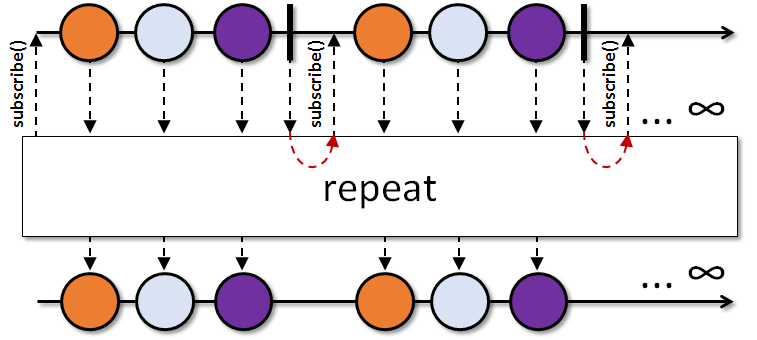
- Scheduler:
repeatdoes not operate by default on a particularScheduler.
- Returns:
- an Observable that emits the items emitted by the source ObservableSource repeatedly and in sequence
- See Also:
- ReactiveX operators documentation: Repeat
-
repeat
@CheckReturnValue @SchedulerSupport(value="none") public final Observable<T> repeat(long times)
Returns an Observable that repeats the sequence of items emitted by the source ObservableSource at mostcounttimes.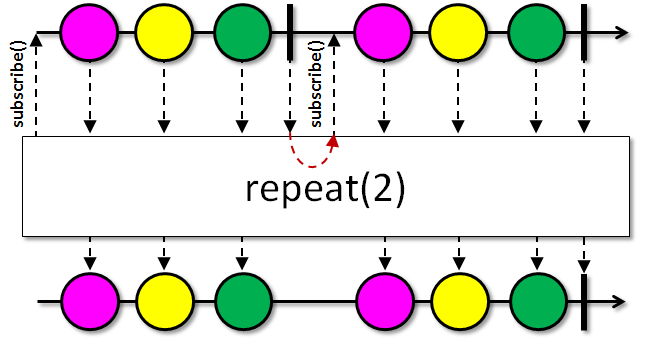
- Scheduler:
repeatdoes not operate by default on a particularScheduler.
- Parameters:
times- the number of times the source ObservableSource items are repeated, a count of 0 will yield an empty sequence- Returns:
- an Observable that repeats the sequence of items emitted by the source ObservableSource at most
counttimes - Throws:
IllegalArgumentException- ifcountis less than zero- See Also:
- ReactiveX operators documentation: Repeat
-
repeatUntil
@CheckReturnValue @SchedulerSupport(value="none") public final Observable<T> repeatUntil(BooleanSupplier stop)
Returns an Observable that repeats the sequence of items emitted by the source ObservableSource until the provided stop function returns true.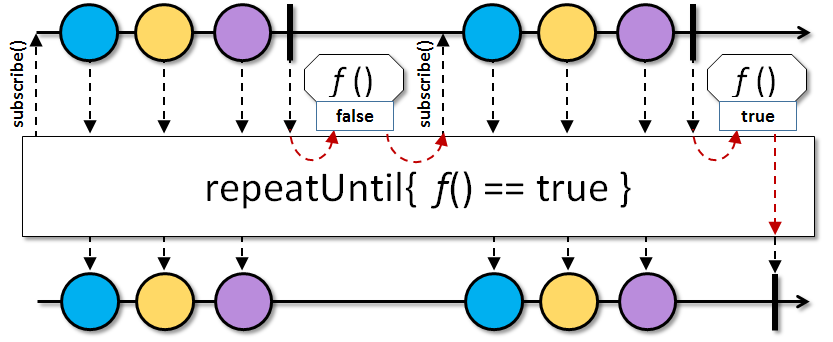
- Scheduler:
repeatUntildoes not operate by default on a particularScheduler.
- Parameters:
stop- a boolean supplier that is called when the current Observable completes; if it returns true, the returned Observable completes; if it returns false, the upstream Observable is resubscribed.- Returns:
- the new Observable instance
- Throws:
NullPointerException- ifstopis null- See Also:
- ReactiveX operators documentation: Repeat
-
repeatWhen
@CheckReturnValue @SchedulerSupport(value="none") public final Observable<T> repeatWhen(Function<? super Observable<Object>,? extends ObservableSource<?>> handler)
Returns an Observable that emits the same values as the source ObservableSource with the exception of anonComplete. AnonCompletenotification from the source will result in the emission of avoiditem to the ObservableSource provided as an argument to thenotificationHandlerfunction. If that ObservableSource callsonCompleteoronErrorthenrepeatWhenwill callonCompleteoronErroron the child subscription. Otherwise, this ObservableSource will resubscribe to the source ObservableSource.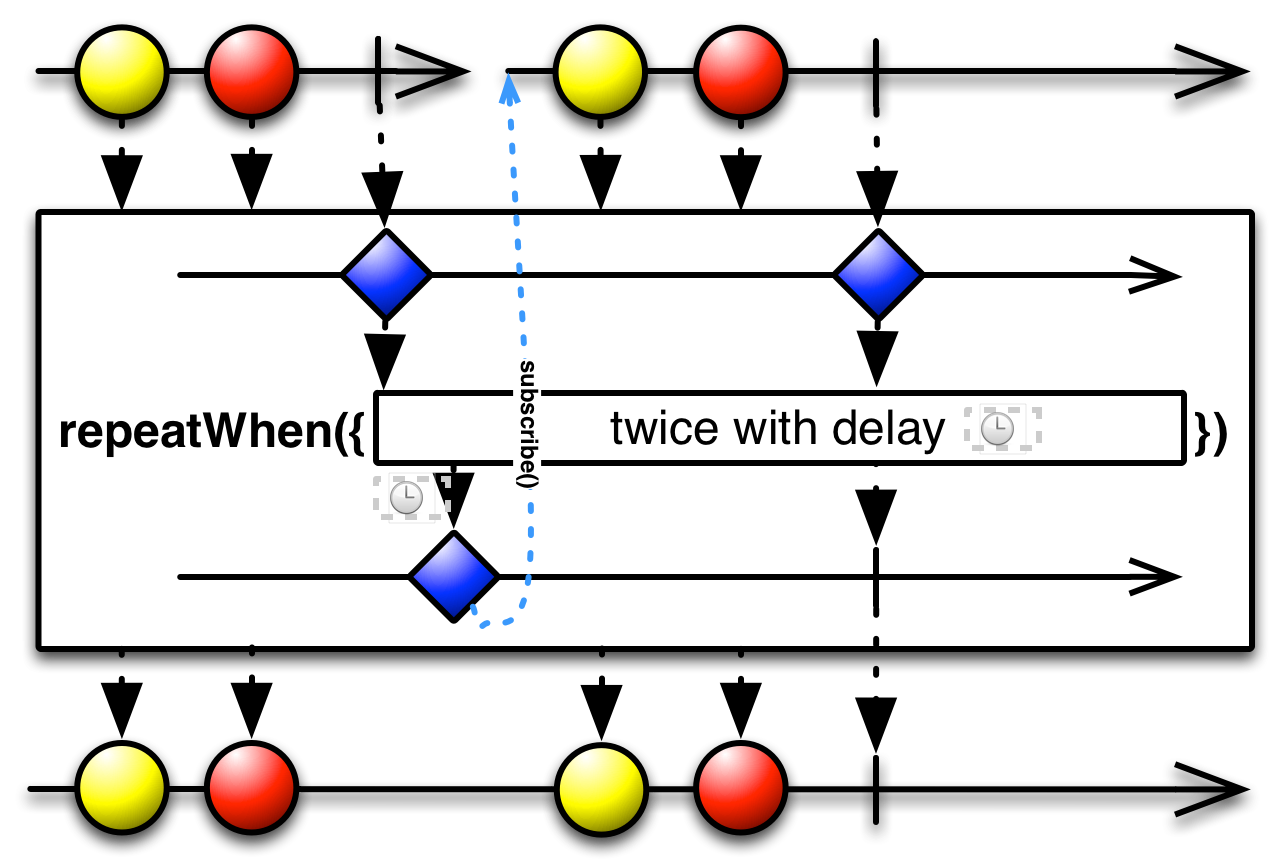
- Scheduler:
repeatWhendoes not operate by default on a particularScheduler.
- Parameters:
handler- receives an ObservableSource of notifications with which a user can complete or error, aborting the repeat.- Returns:
- the source ObservableSource modified with repeat logic
- See Also:
- ReactiveX operators documentation: Repeat
-
replay
@CheckReturnValue @SchedulerSupport(value="none") public final ConnectableObservable<T> replay()
Returns aConnectableObservablethat shares a single subscription to the underlying ObservableSource that will replay all of its items and notifications to any futureObserver. A Connectable ObservableSource resembles an ordinary ObservableSource, except that it does not begin emitting items when it is subscribed to, but only when itsconnectmethod is called.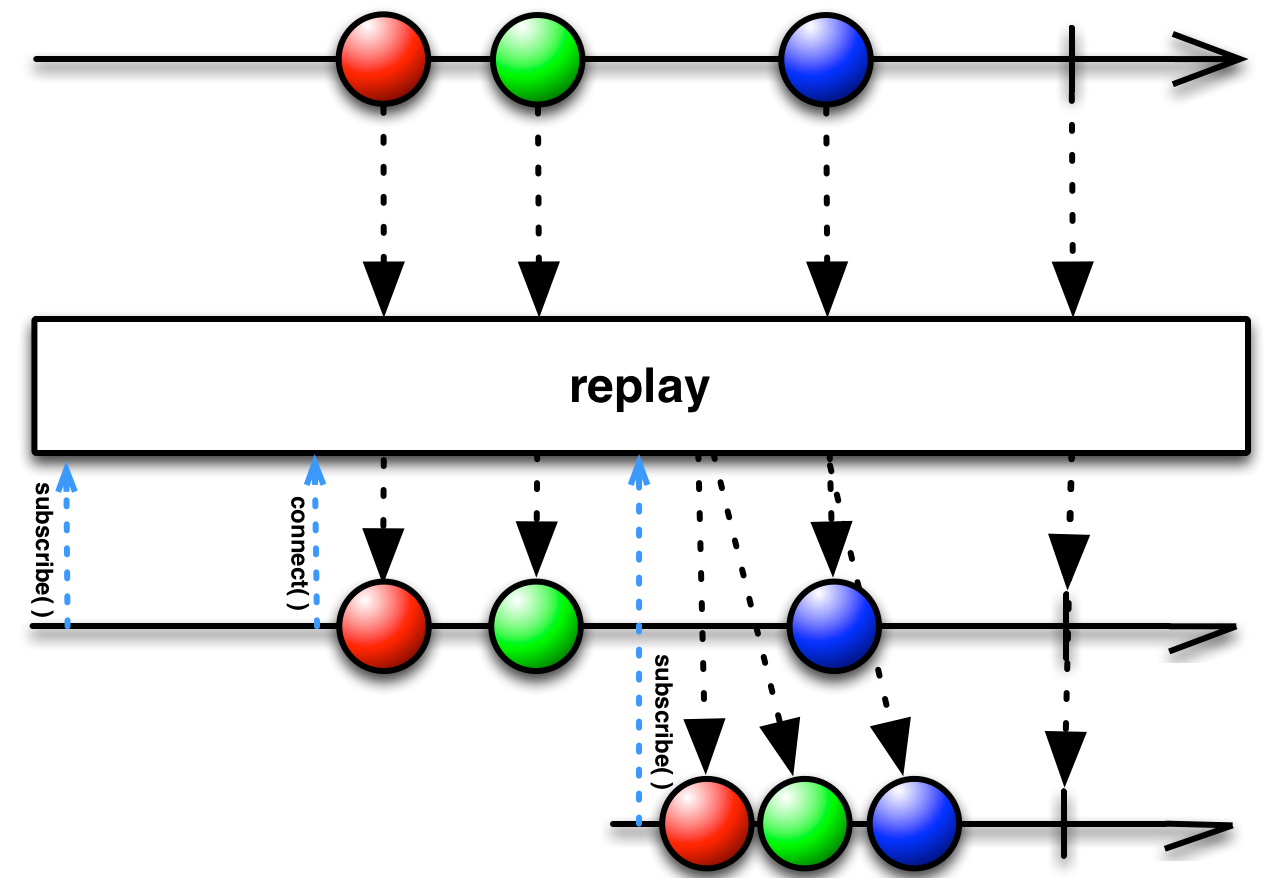
- Scheduler:
- This version of
replaydoes not operate by default on a particularScheduler.
- Returns:
- a
ConnectableObservablethat upon connection causes the source ObservableSource to emit its items to itsObservers - See Also:
- ReactiveX operators documentation: Replay
-
replay
@CheckReturnValue @SchedulerSupport(value="none") public final <R> Observable<R> replay(Function<? super Observable<T>,? extends ObservableSource<R>> selector)
Returns an Observable that emits items that are the results of invoking a specified selector on the items emitted by aConnectableObservablethat shares a single subscription to the source ObservableSource.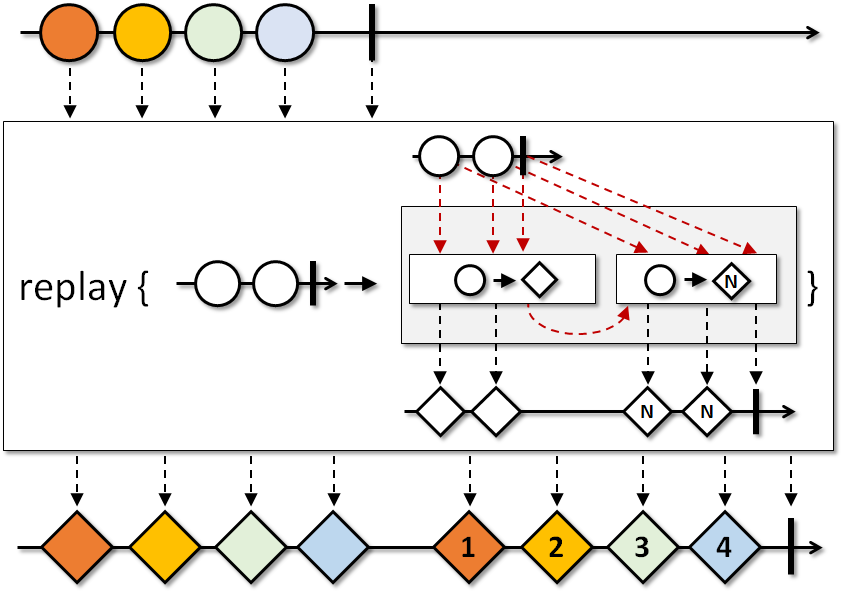
- Scheduler:
- This version of
replaydoes not operate by default on a particularScheduler.
- Type Parameters:
R- the type of items emitted by the resulting ObservableSource- Parameters:
selector- the selector function, which can use the multicasted sequence as many times as needed, without causing multiple subscriptions to the ObservableSource- Returns:
- an Observable that emits items that are the results of invoking the selector on a
ConnectableObservablethat shares a single subscription to the source ObservableSource - See Also:
- ReactiveX operators documentation: Replay
-
replay
@CheckReturnValue @SchedulerSupport(value="none") public final <R> Observable<R> replay(Function<? super Observable<T>,? extends ObservableSource<R>> selector, int bufferSize)
Returns an Observable that emits items that are the results of invoking a specified selector on items emitted by aConnectableObservablethat shares a single subscription to the source ObservableSource, replayingbufferSizenotifications.Note that due to concurrency requirements,
replay(bufferSize)may hold strong references to more thanbufferSizesource emissions.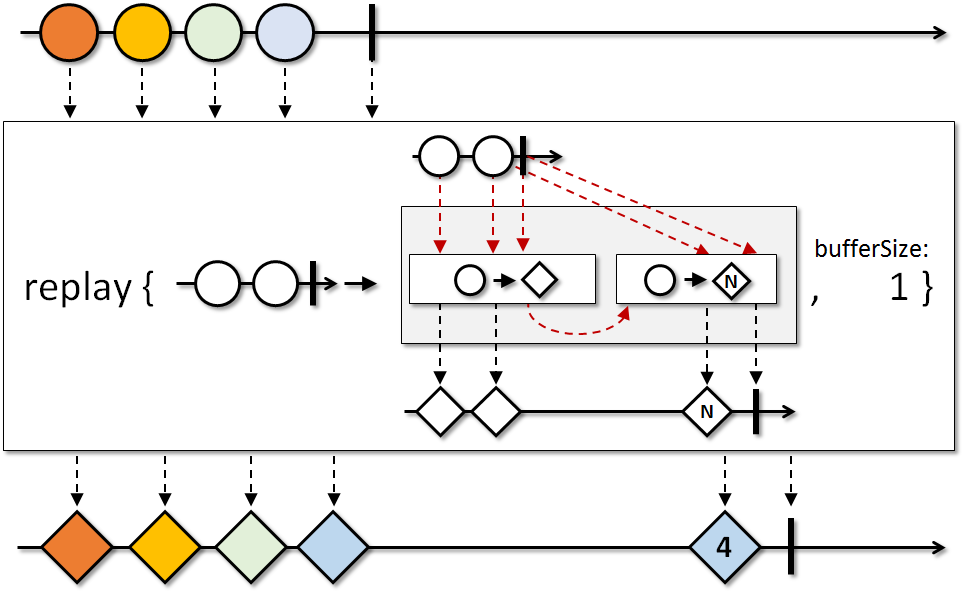
- Scheduler:
- This version of
replaydoes not operate by default on a particularScheduler.
- Type Parameters:
R- the type of items emitted by the resulting ObservableSource- Parameters:
selector- the selector function, which can use the multicasted sequence as many times as needed, without causing multiple subscriptions to the ObservableSourcebufferSize- the buffer size that limits the number of items the connectable ObservableSource can replay- Returns:
- an Observable that emits items that are the results of invoking the selector on items emitted by
a
ConnectableObservablethat shares a single subscription to the source ObservableSource replaying no more thanbufferSizeitems - See Also:
- ReactiveX operators documentation: Replay
-
replay
@CheckReturnValue @SchedulerSupport(value="io.reactivex:computation") public final <R> Observable<R> replay(Function<? super Observable<T>,? extends ObservableSource<R>> selector, int bufferSize, long time, TimeUnit unit)
Returns an Observable that emits items that are the results of invoking a specified selector on items emitted by aConnectableObservablethat shares a single subscription to the source ObservableSource, replaying no more thanbufferSizeitems that were emitted within a specified time window.Note that due to concurrency requirements,
replay(bufferSize)may hold strong references to more thanbufferSizesource emissions.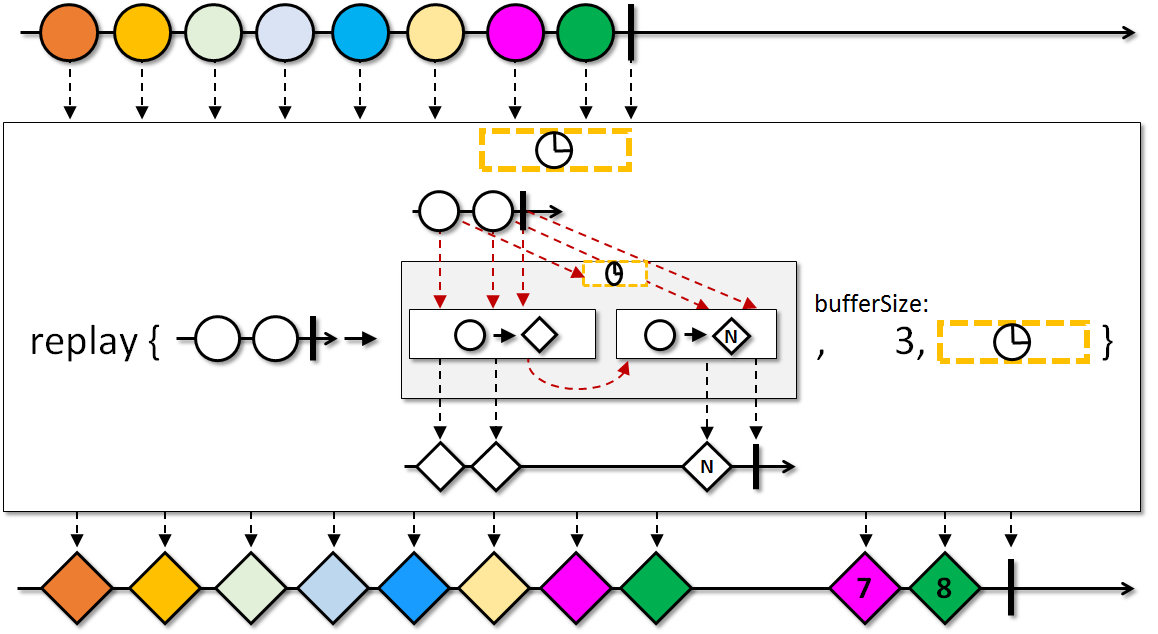
- Scheduler:
- This version of
replayoperates by default on thecomputationScheduler.
- Type Parameters:
R- the type of items emitted by the resulting ObservableSource- Parameters:
selector- a selector function, which can use the multicasted sequence as many times as needed, without causing multiple subscriptions to the ObservableSourcebufferSize- the buffer size that limits the number of items the connectable ObservableSource can replaytime- the duration of the window in which the replayed items must have been emittedunit- the time unit oftime- Returns:
- an Observable that emits items that are the results of invoking the selector on items emitted by
a
ConnectableObservablethat shares a single subscription to the source ObservableSource, and replays no more thanbufferSizeitems that were emitted within the window defined bytime - See Also:
- ReactiveX operators documentation: Replay
-
replay
@CheckReturnValue @SchedulerSupport(value="custom") public final <R> Observable<R> replay(Function<? super Observable<T>,? extends ObservableSource<R>> selector, int bufferSize, long time, TimeUnit unit, Scheduler scheduler)
Returns an Observable that emits items that are the results of invoking a specified selector on items emitted by aConnectableObservablethat shares a single subscription to the source ObservableSource, replaying no more thanbufferSizeitems that were emitted within a specified time window.Note that due to concurrency requirements,
replay(bufferSize)may hold strong references to more thanbufferSizesource emissions.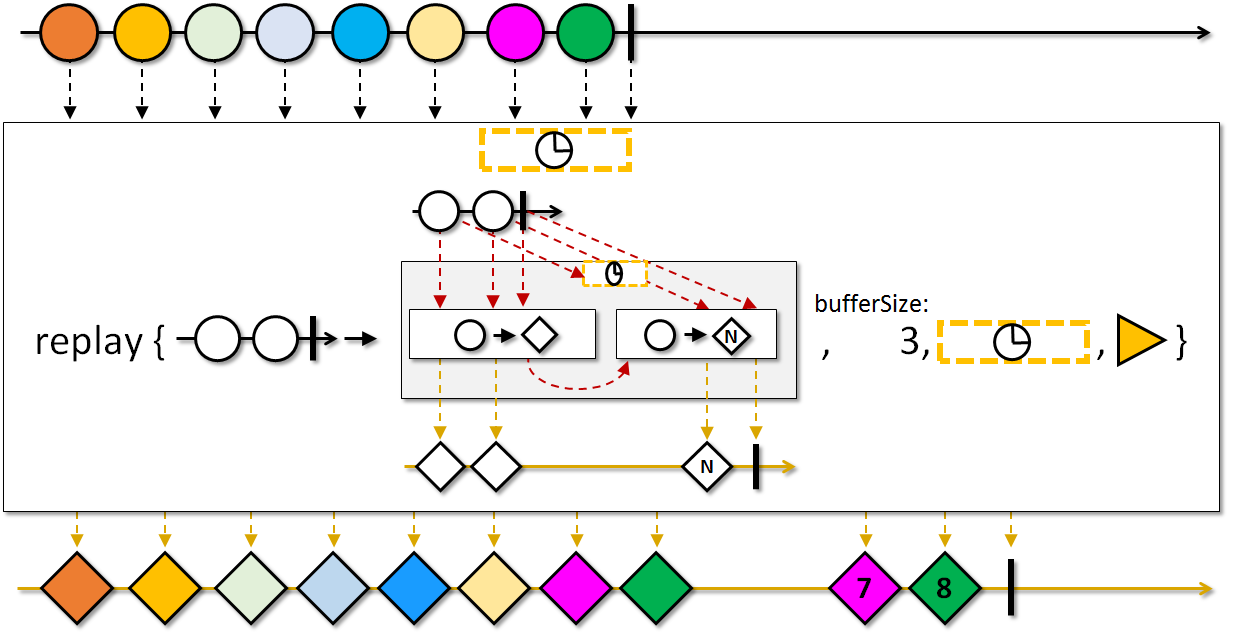
- Scheduler:
- You specify which
Schedulerthis operator will use.
- Type Parameters:
R- the type of items emitted by the resulting ObservableSource- Parameters:
selector- a selector function, which can use the multicasted sequence as many times as needed, without causing multiple subscriptions to the ObservableSourcebufferSize- the buffer size that limits the number of items the connectable ObservableSource can replaytime- the duration of the window in which the replayed items must have been emittedunit- the time unit oftimescheduler- the Scheduler that is the time source for the window- Returns:
- an Observable that emits items that are the results of invoking the selector on items emitted by
a
ConnectableObservablethat shares a single subscription to the source ObservableSource, and replays no more thanbufferSizeitems that were emitted within the window defined bytime - Throws:
IllegalArgumentException- ifbufferSizeis less than zero- See Also:
- ReactiveX operators documentation: Replay
-
replay
@CheckReturnValue @SchedulerSupport(value="custom") public final <R> Observable<R> replay(Function<? super Observable<T>,? extends ObservableSource<R>> selector, int bufferSize, Scheduler scheduler)
Returns an Observable that emits items that are the results of invoking a specified selector on items emitted by aConnectableObservablethat shares a single subscription to the source ObservableSource, replaying a maximum ofbufferSizeitems.Note that due to concurrency requirements,
replay(bufferSize)may hold strong references to more thanbufferSizesource emissions.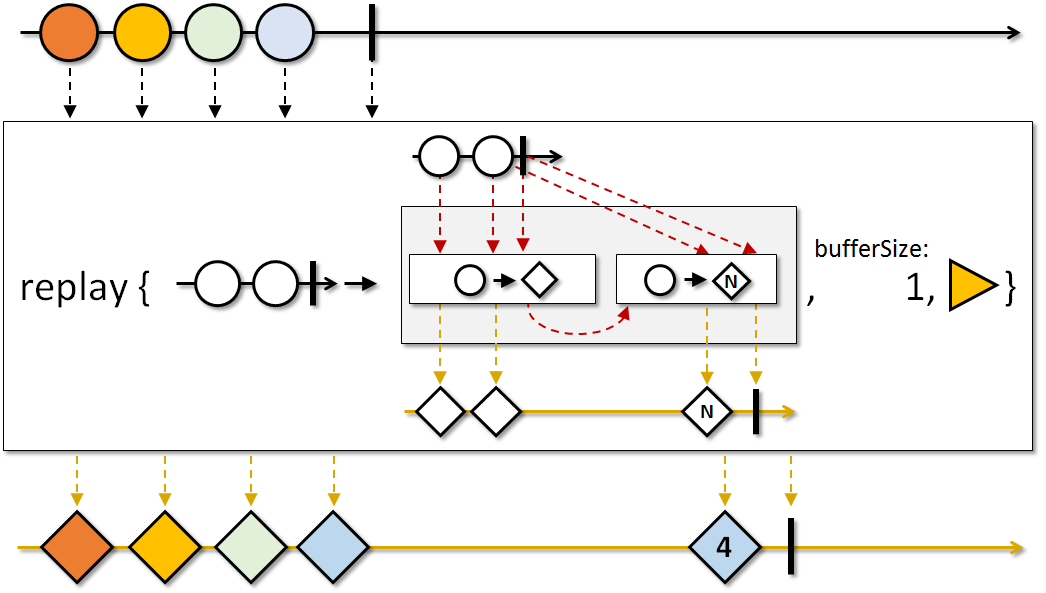
- Scheduler:
- You specify which
Schedulerthis operator will use.
- Type Parameters:
R- the type of items emitted by the resulting ObservableSource- Parameters:
selector- a selector function, which can use the multicasted sequence as many times as needed, without causing multiple subscriptions to the ObservableSourcebufferSize- the buffer size that limits the number of items the connectable ObservableSource can replayscheduler- the Scheduler on which the replay is observed- Returns:
- an Observable that emits items that are the results of invoking the selector on items emitted by
a
ConnectableObservablethat shares a single subscription to the source ObservableSource, replaying no more thanbufferSizenotifications - See Also:
- ReactiveX operators documentation: Replay
-
replay
@CheckReturnValue @SchedulerSupport(value="io.reactivex:computation") public final <R> Observable<R> replay(Function<? super Observable<T>,? extends ObservableSource<R>> selector, long time, TimeUnit unit)
Returns an Observable that emits items that are the results of invoking a specified selector on items emitted by aConnectableObservablethat shares a single subscription to the source ObservableSource, replaying all items that were emitted within a specified time window.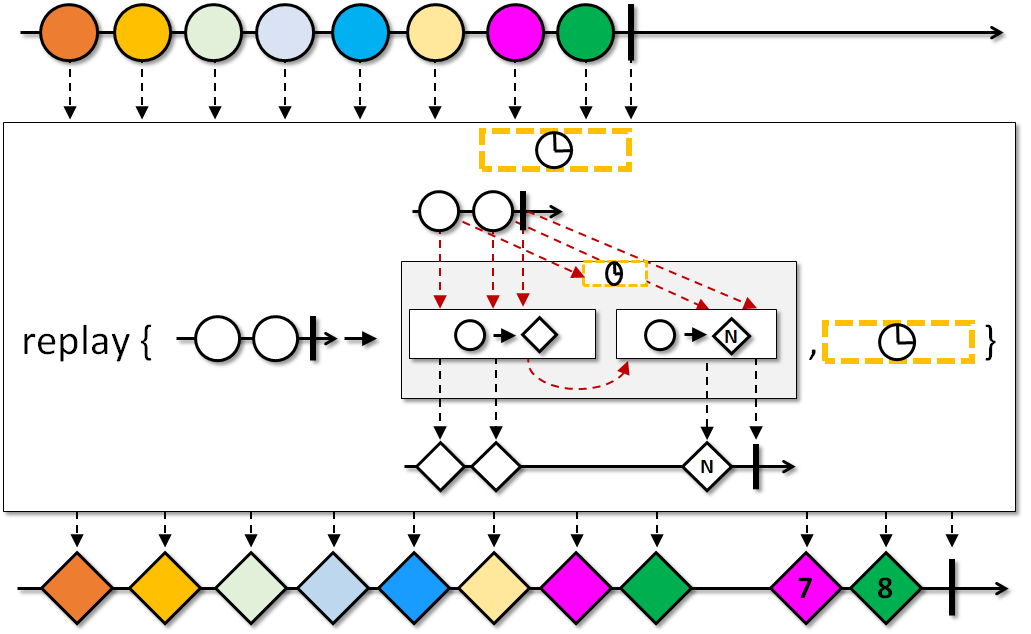
- Scheduler:
- This version of
replayoperates by default on thecomputationScheduler.
- Type Parameters:
R- the type of items emitted by the resulting ObservableSource- Parameters:
selector- a selector function, which can use the multicasted sequence as many times as needed, without causing multiple subscriptions to the ObservableSourcetime- the duration of the window in which the replayed items must have been emittedunit- the time unit oftime- Returns:
- an Observable that emits items that are the results of invoking the selector on items emitted by
a
ConnectableObservablethat shares a single subscription to the source ObservableSource, replaying all items that were emitted within the window defined bytime - See Also:
- ReactiveX operators documentation: Replay
-
replay
@CheckReturnValue @SchedulerSupport(value="custom") public final <R> Observable<R> replay(Function<? super Observable<T>,? extends ObservableSource<R>> selector, long time, TimeUnit unit, Scheduler scheduler)
Returns an Observable that emits items that are the results of invoking a specified selector on items emitted by aConnectableObservablethat shares a single subscription to the source ObservableSource, replaying all items that were emitted within a specified time window.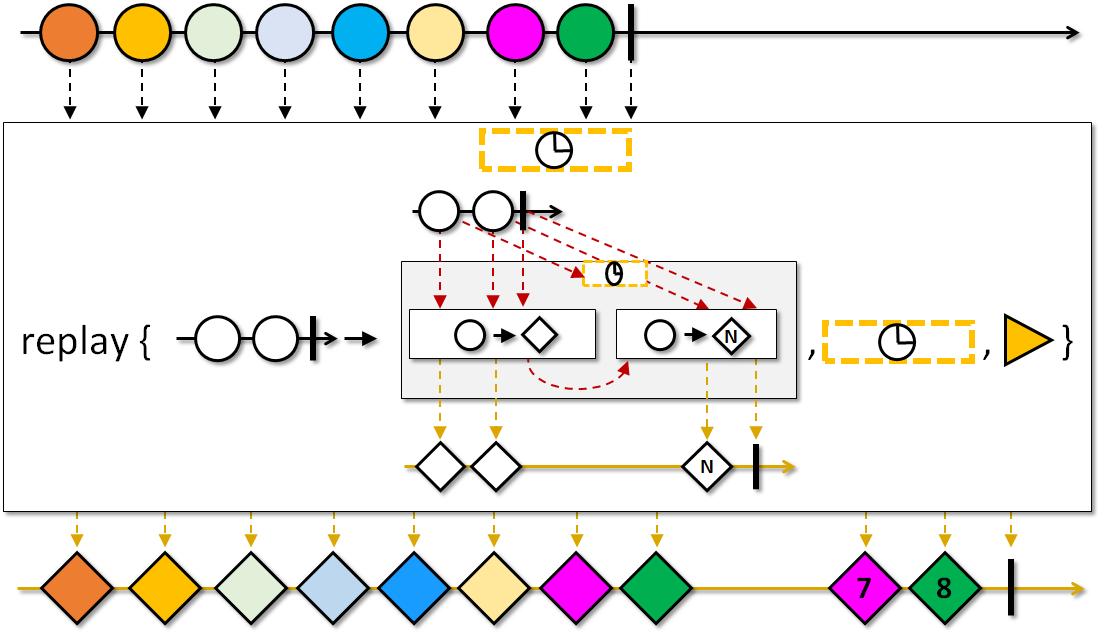
- Scheduler:
- You specify which
Schedulerthis operator will use.
- Type Parameters:
R- the type of items emitted by the resulting ObservableSource- Parameters:
selector- a selector function, which can use the multicasted sequence as many times as needed, without causing multiple subscriptions to the ObservableSourcetime- the duration of the window in which the replayed items must have been emittedunit- the time unit oftimescheduler- the scheduler that is the time source for the window- Returns:
- an Observable that emits items that are the results of invoking the selector on items emitted by
a
ConnectableObservablethat shares a single subscription to the source ObservableSource, replaying all items that were emitted within the window defined bytime - See Also:
- ReactiveX operators documentation: Replay
-
replay
@CheckReturnValue @SchedulerSupport(value="custom") public final <R> Observable<R> replay(Function<? super Observable<T>,? extends ObservableSource<R>> selector, Scheduler scheduler)
Returns an Observable that emits items that are the results of invoking a specified selector on items emitted by aConnectableObservablethat shares a single subscription to the source ObservableSource.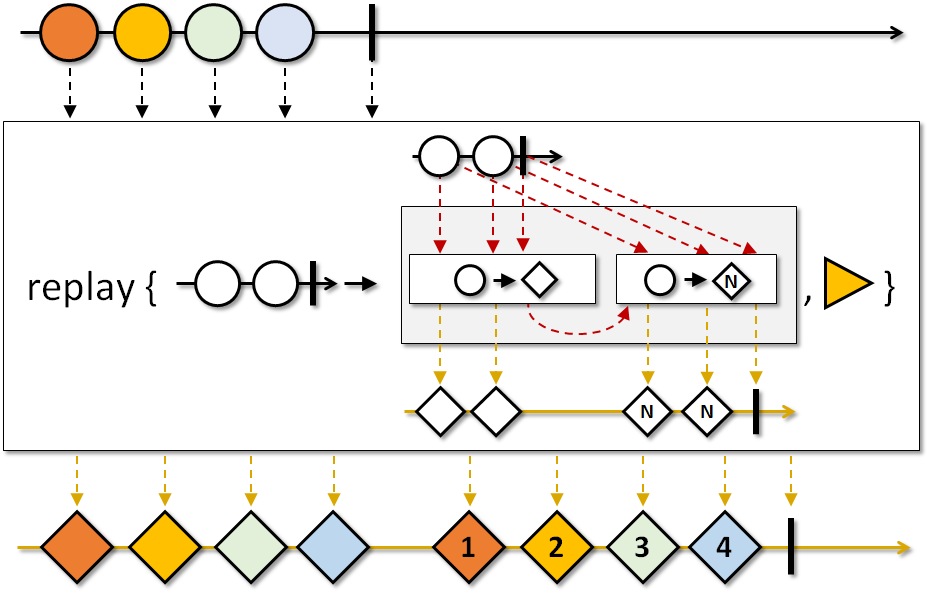
- Scheduler:
- You specify which
Schedulerthis operator will use.
- Type Parameters:
R- the type of items emitted by the resulting ObservableSource- Parameters:
selector- a selector function, which can use the multicasted sequence as many times as needed, without causing multiple subscriptions to the ObservableSourcescheduler- the Scheduler where the replay is observed- Returns:
- an Observable that emits items that are the results of invoking the selector on items emitted by
a
ConnectableObservablethat shares a single subscription to the source ObservableSource, replaying all items - See Also:
- ReactiveX operators documentation: Replay
-
replay
@CheckReturnValue @SchedulerSupport(value="none") public final ConnectableObservable<T> replay(int bufferSize)
Returns aConnectableObservablethat shares a single subscription to the source ObservableSource that replays at mostbufferSizeitems emitted by that ObservableSource. A Connectable ObservableSource resembles an ordinary ObservableSource, except that it does not begin emitting items when it is subscribed to, but only when itsconnectmethod is called.Note that due to concurrency requirements,
replay(bufferSize)may hold strong references to more thanbufferSizesource emissions.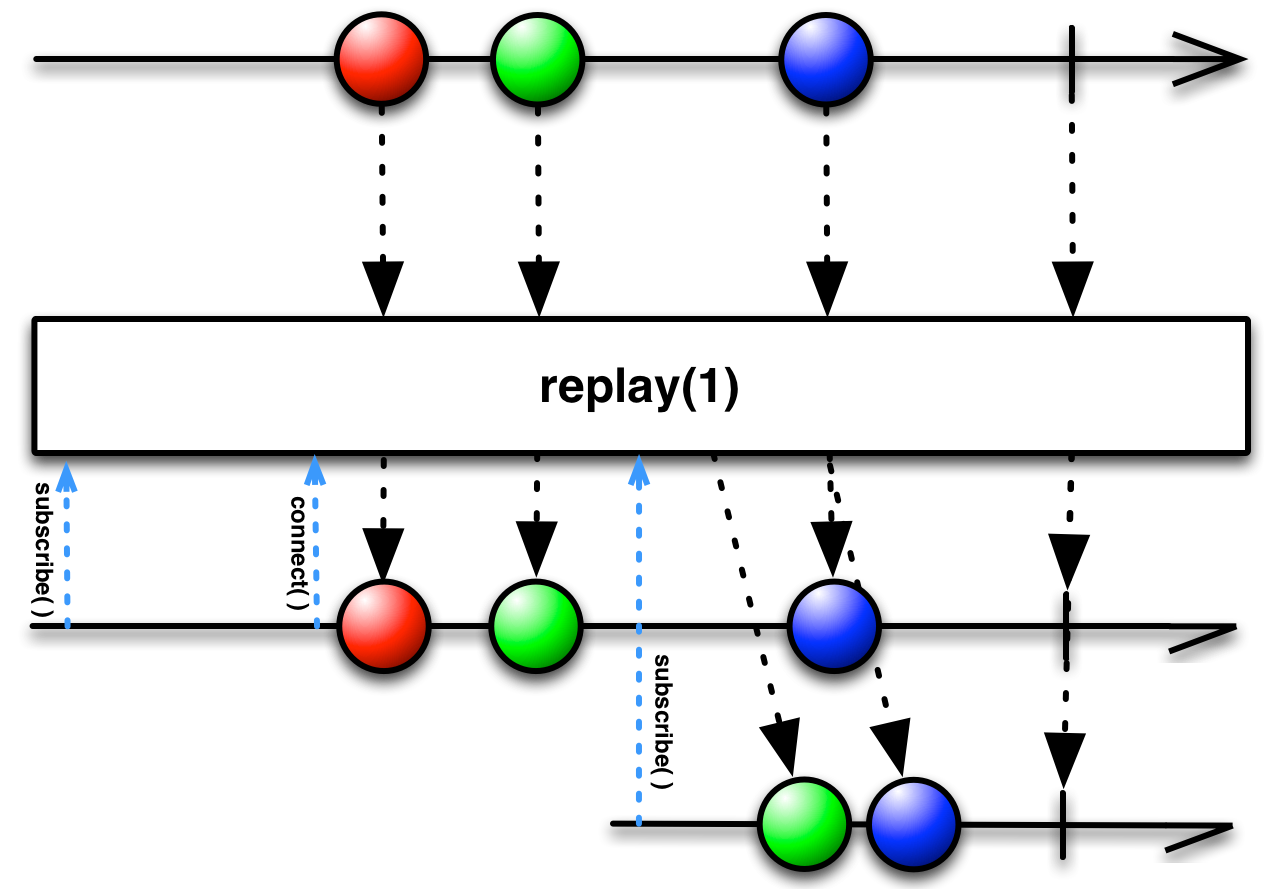
- Scheduler:
- This version of
replaydoes not operate by default on a particularScheduler.
- Parameters:
bufferSize- the buffer size that limits the number of items that can be replayed- Returns:
- a
ConnectableObservablethat shares a single subscription to the source ObservableSource and replays at mostbufferSizeitems emitted by that ObservableSource - See Also:
- ReactiveX operators documentation: Replay
-
replay
@CheckReturnValue @SchedulerSupport(value="io.reactivex:computation") public final ConnectableObservable<T> replay(int bufferSize, long time, TimeUnit unit)
Returns aConnectableObservablethat shares a single subscription to the source ObservableSource and replays at mostbufferSizeitems that were emitted during a specified time window. A Connectable ObservableSource resembles an ordinary ObservableSource, except that it does not begin emitting items when it is subscribed to, but only when itsconnectmethod is called.Note that due to concurrency requirements,
replay(bufferSize)may hold strong references to more thanbufferSizesource emissions.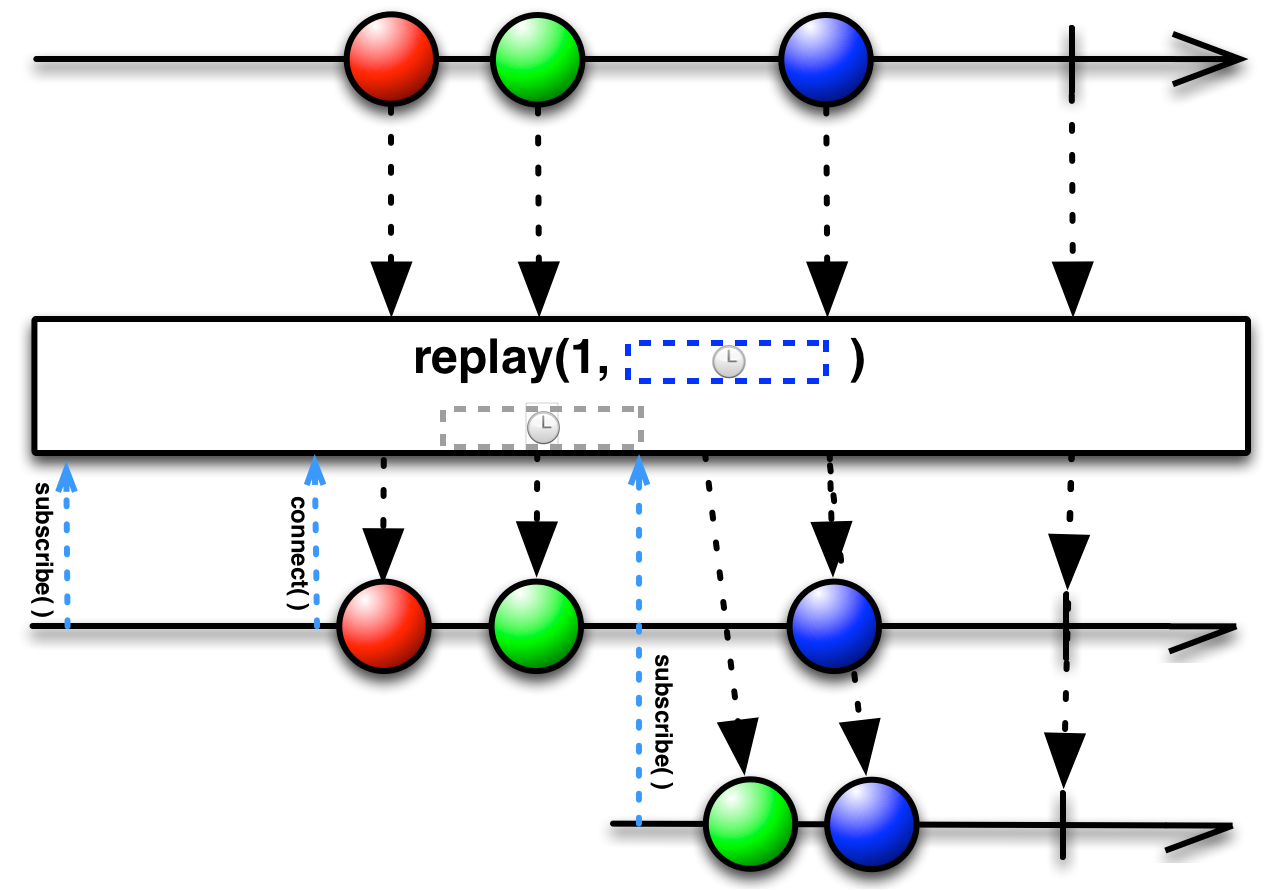
- Scheduler:
- This version of
replayoperates by default on thecomputationScheduler.
- Parameters:
bufferSize- the buffer size that limits the number of items that can be replayedtime- the duration of the window in which the replayed items must have been emittedunit- the time unit oftime- Returns:
- a
ConnectableObservablethat shares a single subscription to the source ObservableSource and replays at mostbufferSizeitems that were emitted during the window defined bytime - See Also:
- ReactiveX operators documentation: Replay
-
replay
@CheckReturnValue @SchedulerSupport(value="custom") public final ConnectableObservable<T> replay(int bufferSize, long time, TimeUnit unit, Scheduler scheduler)
Returns aConnectableObservablethat shares a single subscription to the source ObservableSource and that replays a maximum ofbufferSizeitems that are emitted within a specified time window. A Connectable ObservableSource resembles an ordinary ObservableSource, except that it does not begin emitting items when it is subscribed to, but only when itsconnectmethod is called.Note that due to concurrency requirements,
replay(bufferSize)may hold strong references to more thanbufferSizesource emissions.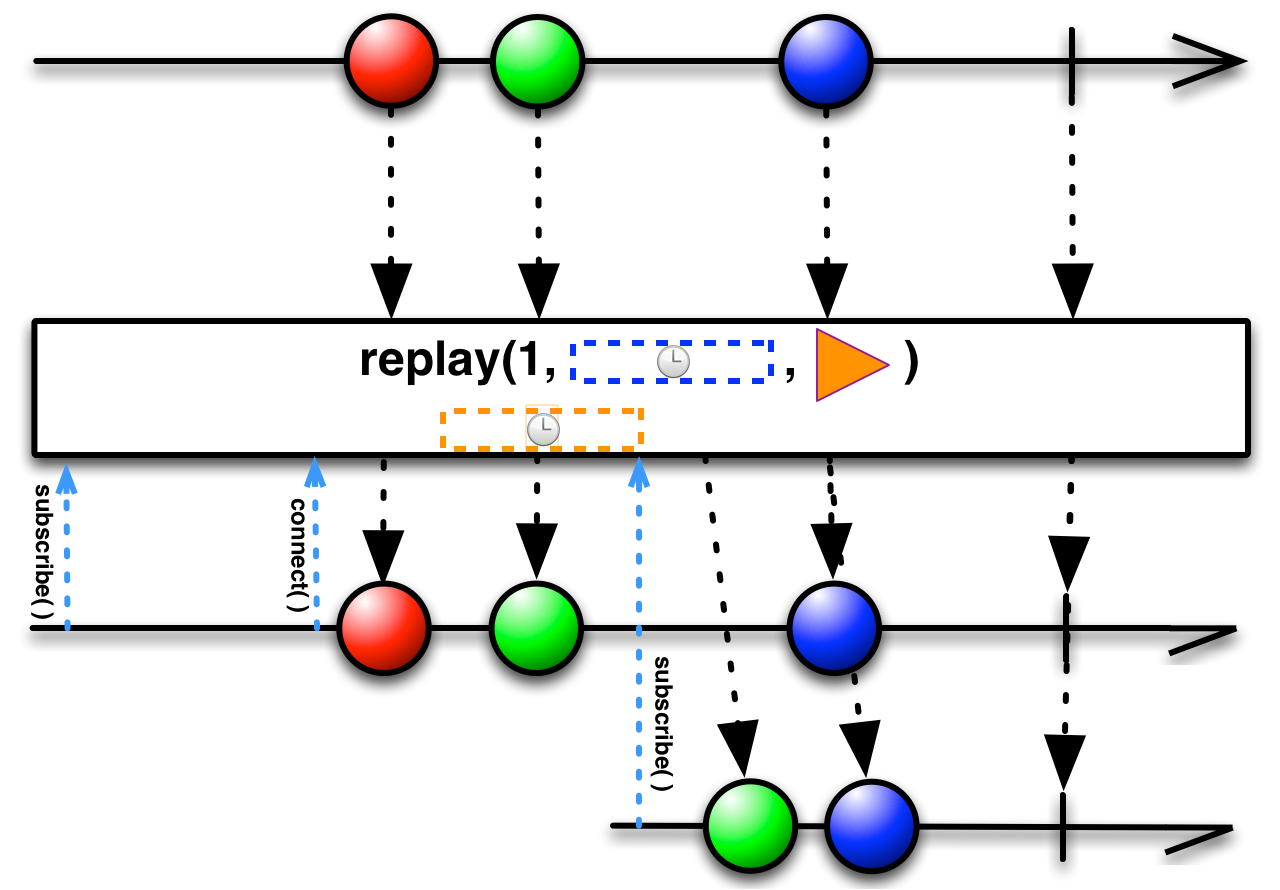
- Scheduler:
- You specify which
Schedulerthis operator will use.
- Parameters:
bufferSize- the buffer size that limits the number of items that can be replayedtime- the duration of the window in which the replayed items must have been emittedunit- the time unit oftimescheduler- the scheduler that is used as a time source for the window- Returns:
- a
ConnectableObservablethat shares a single subscription to the source ObservableSource and replays at mostbufferSizeitems that were emitted during the window defined bytime - Throws:
IllegalArgumentException- ifbufferSizeis less than zero- See Also:
- ReactiveX operators documentation: Replay
-
replay
@CheckReturnValue @SchedulerSupport(value="custom") public final ConnectableObservable<T> replay(int bufferSize, Scheduler scheduler)
Returns aConnectableObservablethat shares a single subscription to the source ObservableSource and replays at mostbufferSizeitems emitted by that ObservableSource. A Connectable ObservableSource resembles an ordinary ObservableSource, except that it does not begin emitting items when it is subscribed to, but only when itsconnectmethod is called.Note that due to concurrency requirements,
replay(bufferSize)may hold strong references to more thanbufferSizesource emissions.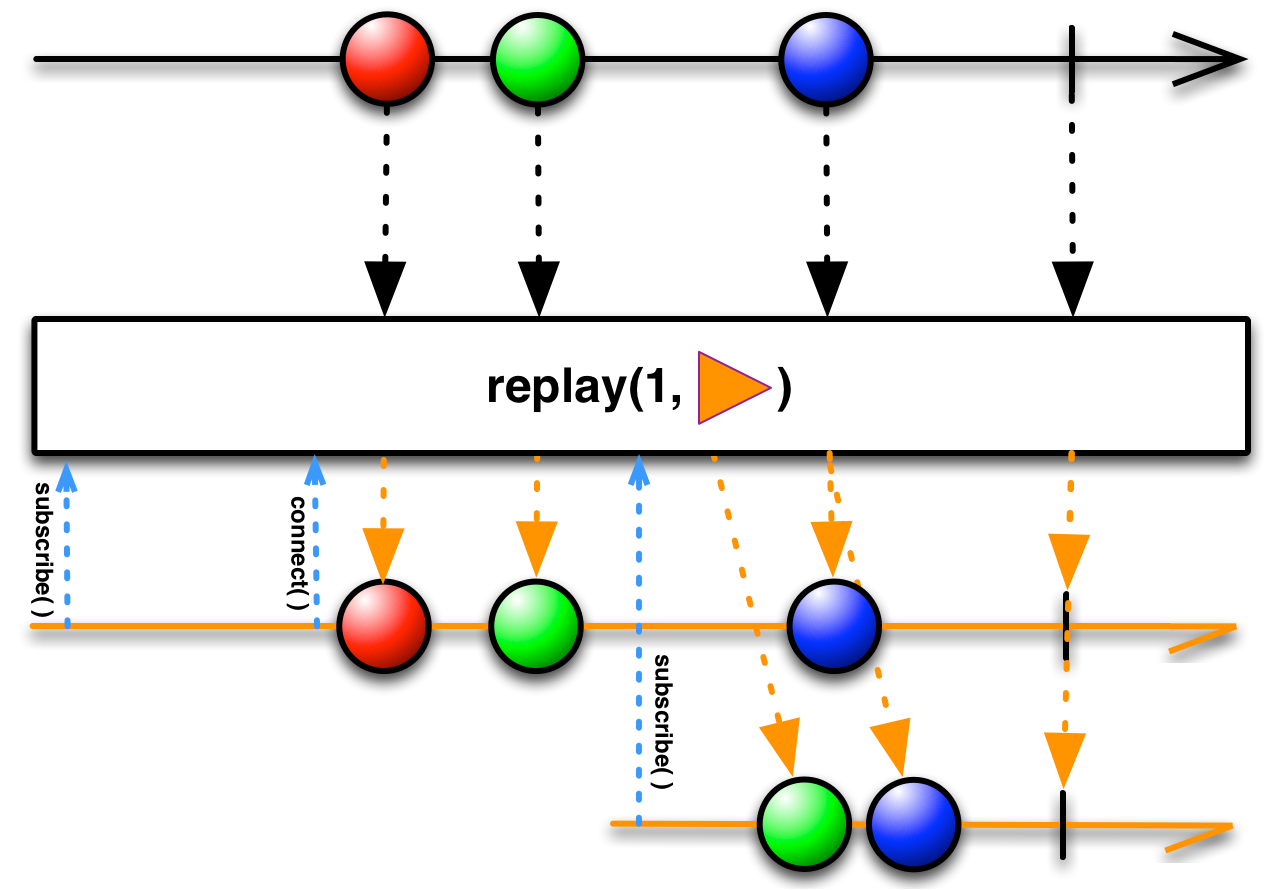
- Scheduler:
- You specify which
Schedulerthis operator will use.
- Parameters:
bufferSize- the buffer size that limits the number of items that can be replayedscheduler- the scheduler on which the Observers will observe the emitted items- Returns:
- a
ConnectableObservablethat shares a single subscription to the source ObservableSource and replays at mostbufferSizeitems that were emitted by the ObservableSource - See Also:
- ReactiveX operators documentation: Replay
-
replay
@CheckReturnValue @SchedulerSupport(value="io.reactivex:computation") public final ConnectableObservable<T> replay(long time, TimeUnit unit)
Returns aConnectableObservablethat shares a single subscription to the source ObservableSource and replays all items emitted by that ObservableSource within a specified time window. A Connectable ObservableSource resembles an ordinary ObservableSource, except that it does not begin emitting items when it is subscribed to, but only when itsconnectmethod is called.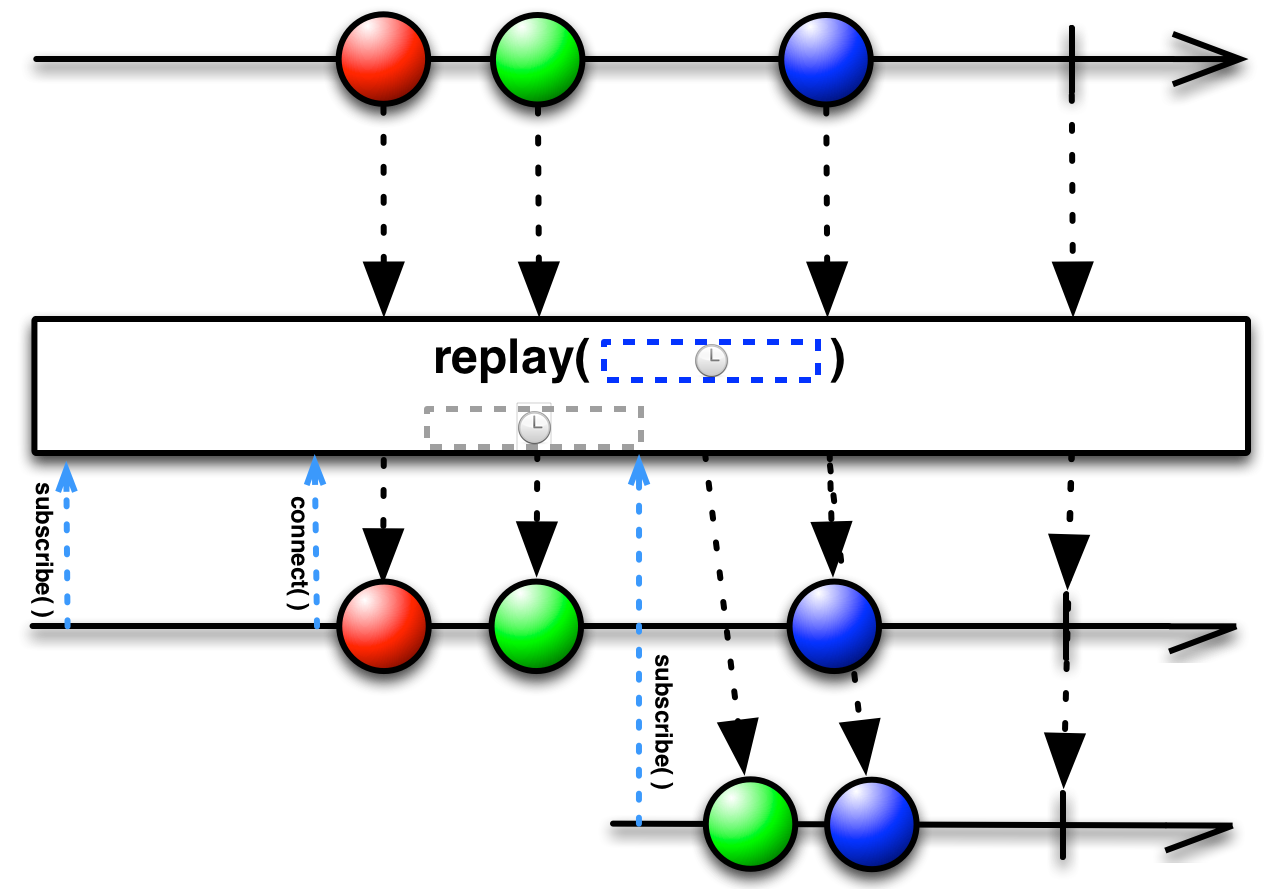
- Scheduler:
- This version of
replayoperates by default on thecomputationScheduler.
- Parameters:
time- the duration of the window in which the replayed items must have been emittedunit- the time unit oftime- Returns:
- a
ConnectableObservablethat shares a single subscription to the source ObservableSource and replays the items that were emitted during the window defined bytime - See Also:
- ReactiveX operators documentation: Replay
-
replay
@CheckReturnValue @SchedulerSupport(value="custom") public final ConnectableObservable<T> replay(long time, TimeUnit unit, Scheduler scheduler)
Returns aConnectableObservablethat shares a single subscription to the source ObservableSource and replays all items emitted by that ObservableSource within a specified time window. A Connectable ObservableSource resembles an ordinary ObservableSource, except that it does not begin emitting items when it is subscribed to, but only when itsconnectmethod is called.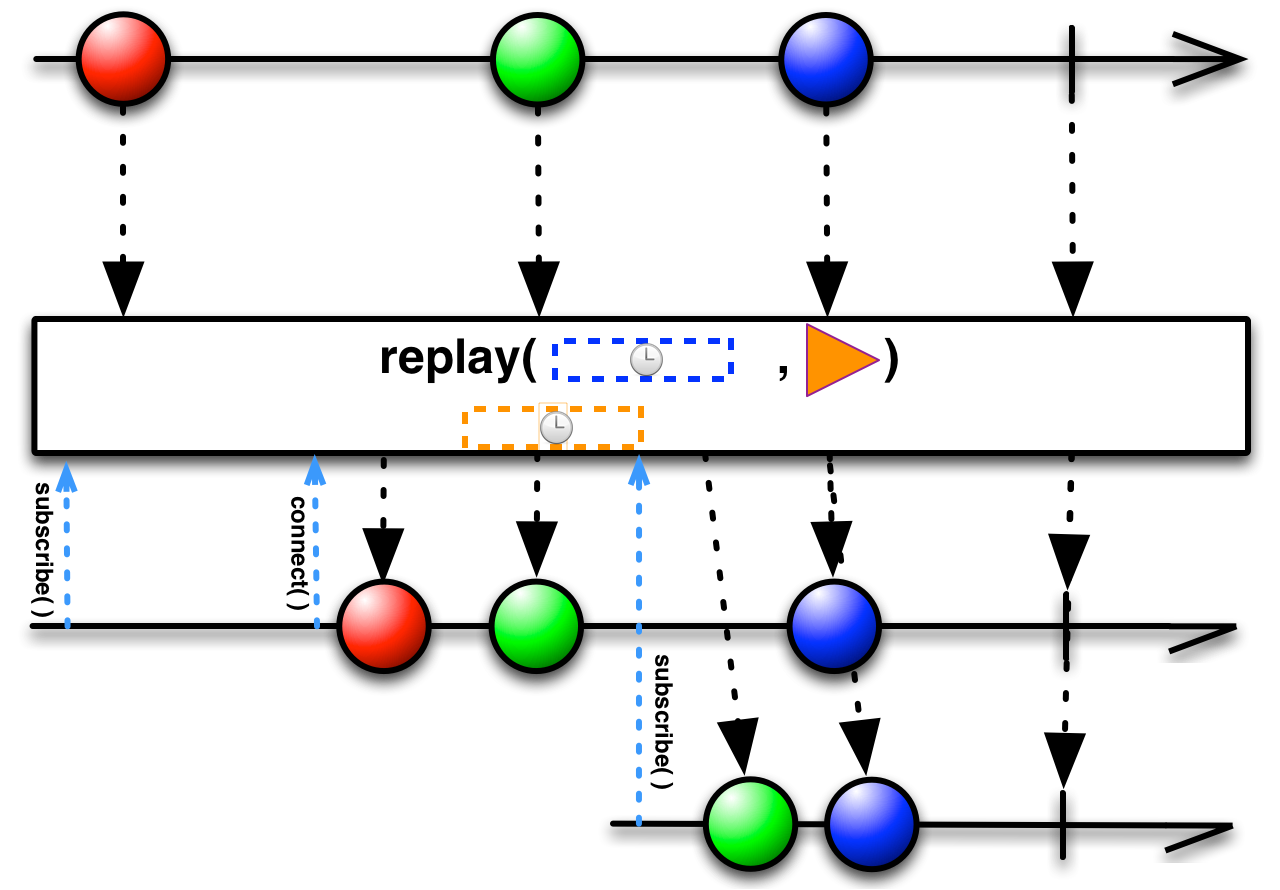
- Scheduler:
- You specify which
Schedulerthis operator will use.
- Parameters:
time- the duration of the window in which the replayed items must have been emittedunit- the time unit oftimescheduler- the Scheduler that is the time source for the window- Returns:
- a
ConnectableObservablethat shares a single subscription to the source ObservableSource and replays the items that were emitted during the window defined bytime - See Also:
- ReactiveX operators documentation: Replay
-
replay
@CheckReturnValue @SchedulerSupport(value="custom") public final ConnectableObservable<T> replay(Scheduler scheduler)
Returns aConnectableObservablethat shares a single subscription to the source ObservableSource that will replay all of its items and notifications to any futureObserveron the givenScheduler. A Connectable ObservableSource resembles an ordinary ObservableSource, except that it does not begin emitting items when it is subscribed to, but only when itsconnectmethod is called.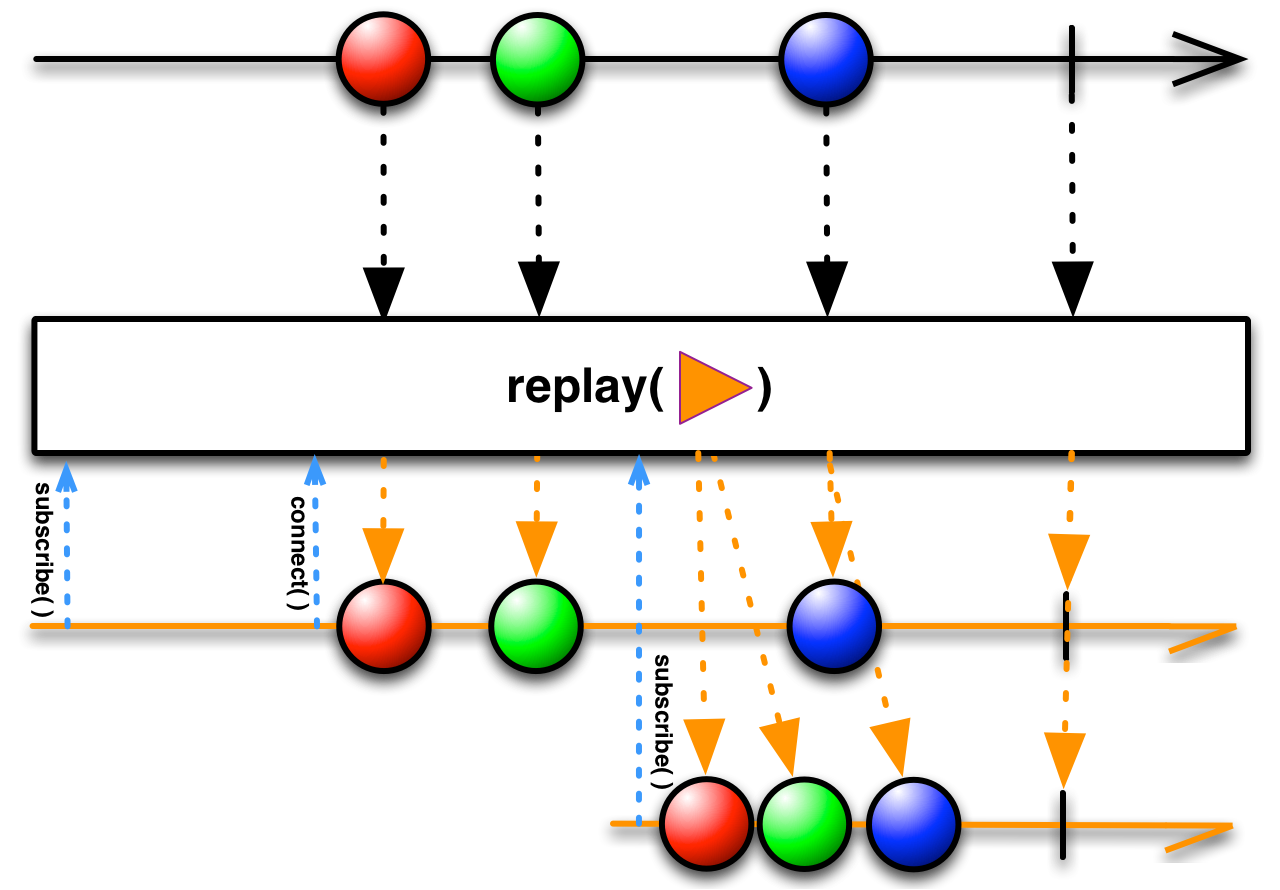
- Scheduler:
- You specify which
Schedulerthis operator will use.
- Parameters:
scheduler- the Scheduler on which the Observers will observe the emitted items- Returns:
- a
ConnectableObservablethat shares a single subscription to the source ObservableSource that will replay all of its items and notifications to any futureObserveron the givenScheduler - See Also:
- ReactiveX operators documentation: Replay
-
retry
@CheckReturnValue @SchedulerSupport(value="none") public final Observable<T> retry()
Returns an Observable that mirrors the source ObservableSource, resubscribing to it if it callsonError(infinite retry count).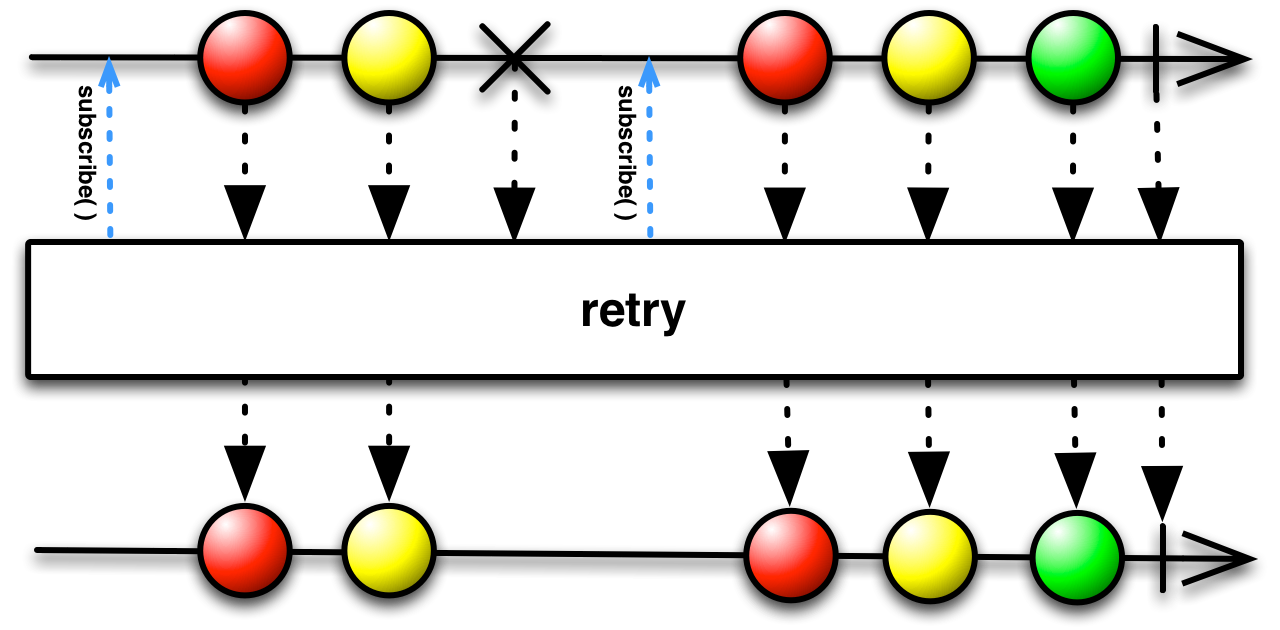
If the source ObservableSource calls
Observer.onError(java.lang.Throwable), this method will resubscribe to the source ObservableSource rather than propagating theonErrorcall.Any and all items emitted by the source ObservableSource will be emitted by the resulting ObservableSource, even those emitted during failed subscriptions. For example, if an ObservableSource fails at first but emits
[1, 2]then succeeds the second time and emits[1, 2, 3, 4, 5]then the complete sequence of emissions and notifications would be[1, 2, 1, 2, 3, 4, 5, onComplete].- Scheduler:
retrydoes not operate by default on a particularScheduler.
- Returns:
- the source ObservableSource modified with retry logic
- See Also:
- ReactiveX operators documentation: Retry
-
retry
@CheckReturnValue @SchedulerSupport(value="none") public final Observable<T> retry(BiPredicate<? super Integer,? super Throwable> predicate)
Returns an Observable that mirrors the source ObservableSource, resubscribing to it if it callsonErrorand the predicate returns true for that specific exception and retry count.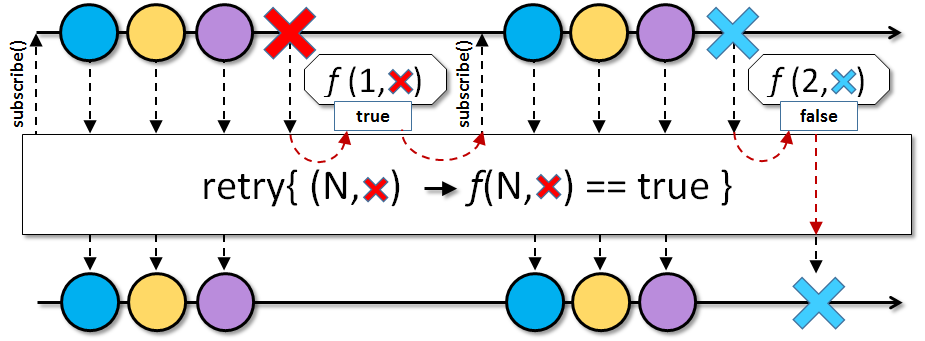
- Scheduler:
retrydoes not operate by default on a particularScheduler.
- Parameters:
predicate- the predicate that determines if a resubscription may happen in case of a specific exception and retry count- Returns:
- the source ObservableSource modified with retry logic
- See Also:
retry(), ReactiveX operators documentation: Retry
-
retry
@CheckReturnValue @SchedulerSupport(value="none") public final Observable<T> retry(long times)
Returns an Observable that mirrors the source ObservableSource, resubscribing to it if it callsonErrorup to a specified number of retries.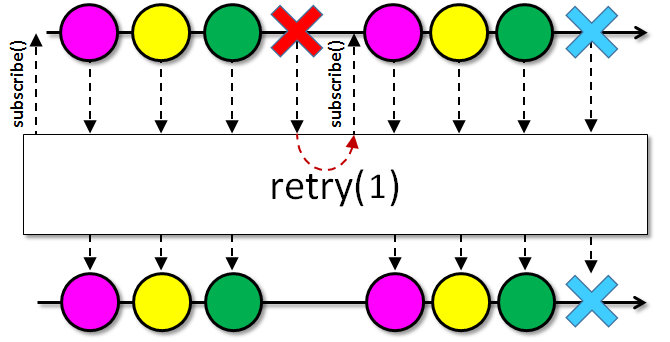
If the source ObservableSource calls
Observer.onError(java.lang.Throwable), this method will resubscribe to the source ObservableSource for a maximum ofcountresubscriptions rather than propagating theonErrorcall.Any and all items emitted by the source ObservableSource will be emitted by the resulting ObservableSource, even those emitted during failed subscriptions. For example, if an ObservableSource fails at first but emits
[1, 2]then succeeds the second time and emits[1, 2, 3, 4, 5]then the complete sequence of emissions and notifications would be[1, 2, 1, 2, 3, 4, 5, onComplete].- Scheduler:
retrydoes not operate by default on a particularScheduler.
- Parameters:
times- the number of times to resubscribe if the current Observable fails- Returns:
- the source ObservableSource modified with retry logic
- See Also:
- ReactiveX operators documentation: Retry
-
retry
@CheckReturnValue @SchedulerSupport(value="none") public final Observable<T> retry(long times, Predicate<? super Throwable> predicate)
Retries at most times or until the predicate returns false, whichever happens first.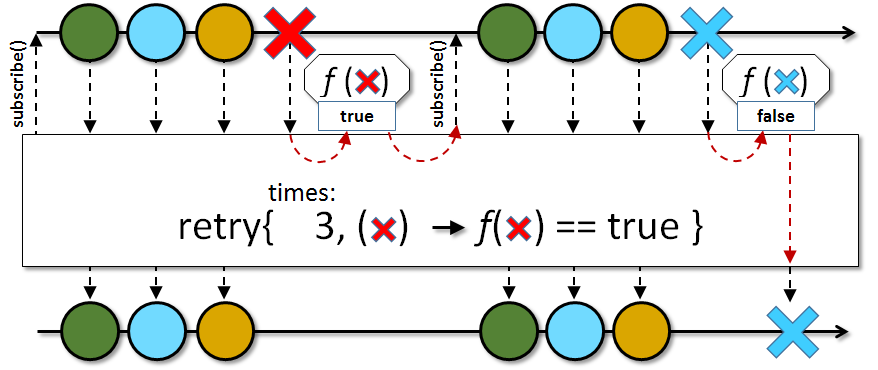
- Scheduler:
retrydoes not operate by default on a particularScheduler.
- Parameters:
times- the number of times to resubscribe if the current Observable failspredicate- the predicate called with the failure Throwable and should return true to trigger a retry.- Returns:
- the new Observable instance
-
retry
@CheckReturnValue @SchedulerSupport(value="none") public final Observable<T> retry(Predicate<? super Throwable> predicate)
Retries the current Observable if the predicate returns true.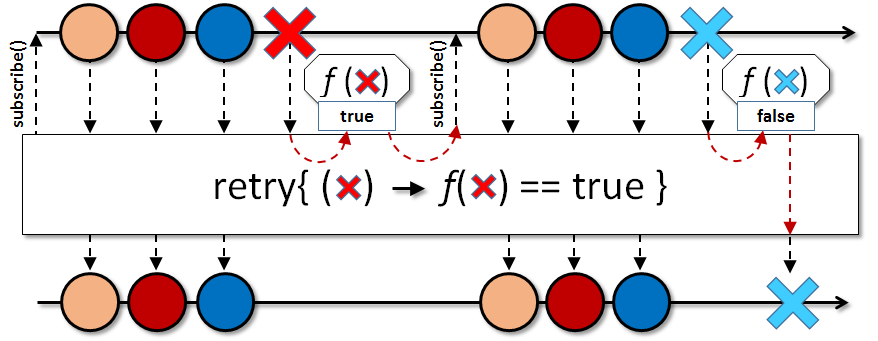
- Scheduler:
retrydoes not operate by default on a particularScheduler.
- Parameters:
predicate- the predicate that receives the failure Throwable and should return true to trigger a retry.- Returns:
- the new Observable instance
-
retryUntil
@CheckReturnValue @SchedulerSupport(value="none") public final Observable<T> retryUntil(BooleanSupplier stop)
Retries until the given stop function returns true.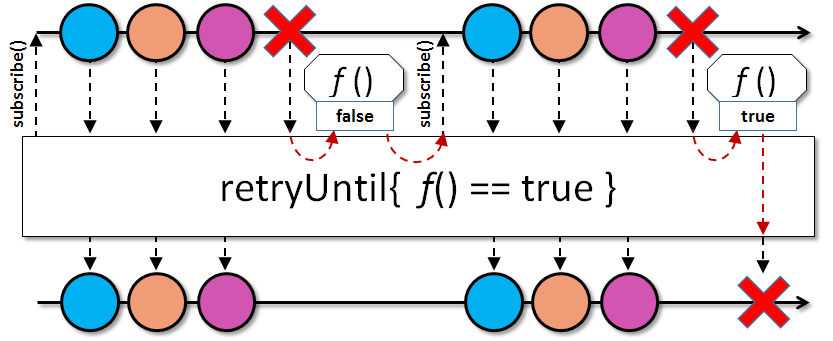
- Scheduler:
retryUntildoes not operate by default on a particularScheduler.
- Parameters:
stop- the function that should return true to stop retrying- Returns:
- the new Observable instance
-
retryWhen
@CheckReturnValue @SchedulerSupport(value="none") public final Observable<T> retryWhen(Function<? super Observable<Throwable>,? extends ObservableSource<?>> handler)
Returns an Observable that emits the same values as the source ObservableSource with the exception of anonError. AnonErrornotification from the source will result in the emission of aThrowableitem to the ObservableSource provided as an argument to thenotificationHandlerfunction. If that ObservableSource callsonCompleteoronErrorthenretrywill callonCompleteoronErroron the child subscription. Otherwise, this ObservableSource will resubscribe to the source ObservableSource.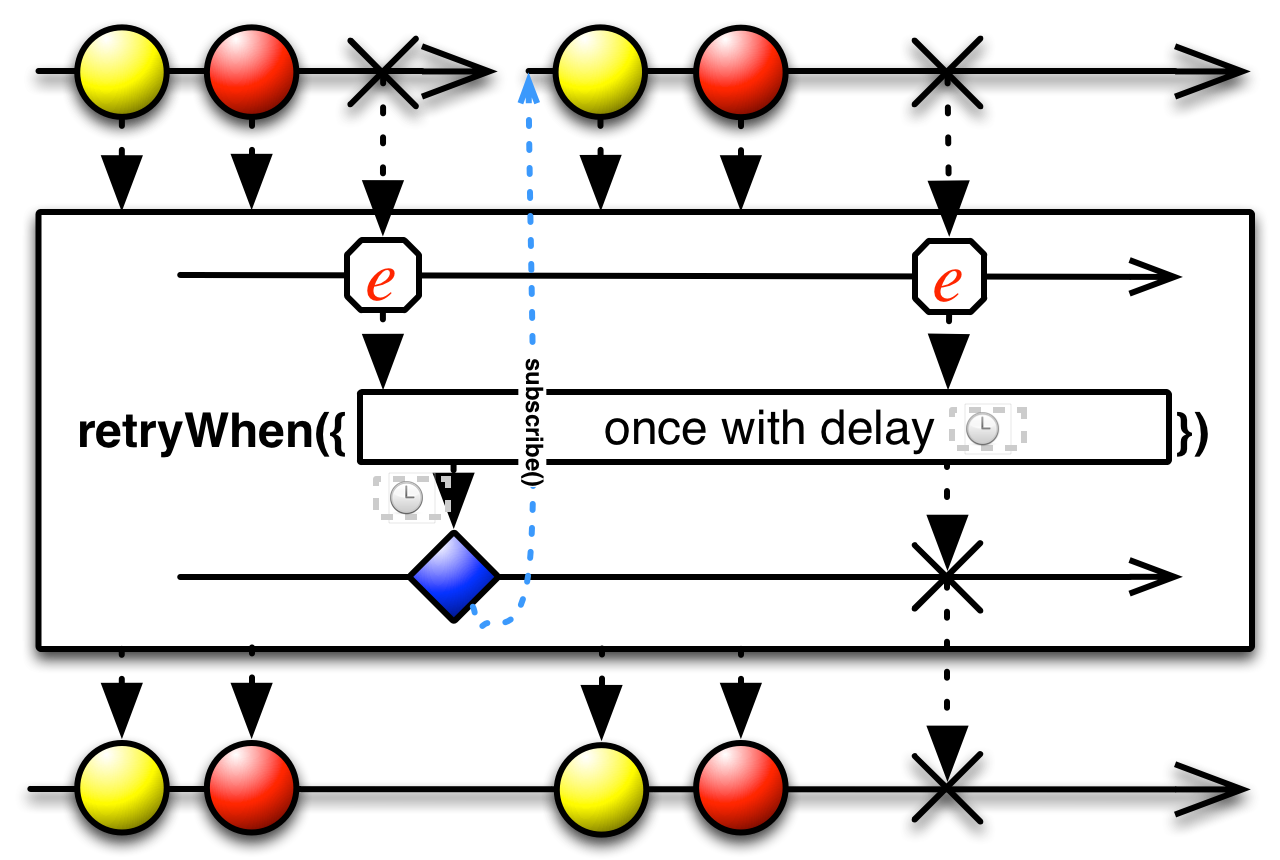
Example: This retries 3 times, each time incrementing the number of seconds it waits.
Output is:Observable.create((ObservableEmitter<? super String> s) -> { System.out.println("subscribing"); s.onError(new RuntimeException("always fails")); }).retryWhen(attempts -> { return attempts.zipWith(Observable.range(1, 3), (n, i) -> i).flatMap(i -> { System.out.println("delay retry by " + i + " second(s)"); return Observable.timer(i, TimeUnit.SECONDS); }); }).blockingForEach(System.out::println);subscribing delay retry by 1 second(s) subscribing delay retry by 2 second(s) subscribing delay retry by 3 second(s) subscribingNote that the inner
ObservableSourcereturned by the handler function should signal eitheronNext,onErrororonCompletein response to the receivedThrowableto indicate the operator should retry or terminate. If the upstream to the operator is asynchronous, signalling onNext followed by onComplete immediately may result in the sequence to be completed immediately. Similarly, if this innerObservableSourcesignalsonErrororonCompletewhile the upstream is active, the sequence is terminated with the same signal immediately.The following example demonstrates how to retry an asynchronous source with a delay:
Observable.timer(1, TimeUnit.SECONDS) .doOnSubscribe(s -> System.out.println("subscribing")) .map(v -> { throw new RuntimeException(); }) .retryWhen(errors -> { AtomicInteger counter = new AtomicInteger(); return errors .takeWhile(e -> counter.getAndIncrement() != 3) .flatMap(e -> { System.out.println("delay retry by " + counter.get() + " second(s)"); return Observable.timer(counter.get(), TimeUnit.SECONDS); }); }) .blockingSubscribe(System.out::println, System.out::println);- Scheduler:
retryWhendoes not operate by default on a particularScheduler.
- Parameters:
handler- receives an ObservableSource of notifications with which a user can complete or error, aborting the retry- Returns:
- the source ObservableSource modified with retry logic
- See Also:
- ReactiveX operators documentation: Retry
-
safeSubscribe
@SchedulerSupport(value="none") public final void safeSubscribe(Observer<? super T> observer)
Subscribes to the current Observable and wraps the given Observer into a SafeObserver (if not already a SafeObserver) that deals with exceptions thrown by a misbehaving Observer (that doesn't follow the Reactive Streams specification).- Scheduler:
safeSubscribedoes not operate by default on a particularScheduler.
- Parameters:
observer- the incoming Observer instance- Throws:
NullPointerException- if s is null
-
sample
@CheckReturnValue @SchedulerSupport(value="io.reactivex:computation") public final Observable<T> sample(long period, TimeUnit unit)
Returns an Observable that emits the most recently emitted item (if any) emitted by the source ObservableSource within periodic time intervals.
- Scheduler:
sampleoperates by default on thecomputationScheduler.
- Parameters:
period- the sampling rateunit- theTimeUnitin whichperiodis defined- Returns:
- an Observable that emits the results of sampling the items emitted by the source ObservableSource at the specified time interval
- See Also:
- ReactiveX operators documentation: Sample,
throttleLast(long, TimeUnit)
-
sample
@CheckReturnValue @SchedulerSupport(value="io.reactivex:computation") public final Observable<T> sample(long period, TimeUnit unit, boolean emitLast)
Returns an Observable that emits the most recently emitted item (if any) emitted by the source ObservableSource within periodic time intervals and optionally emit the very last upstream item when the upstream completes.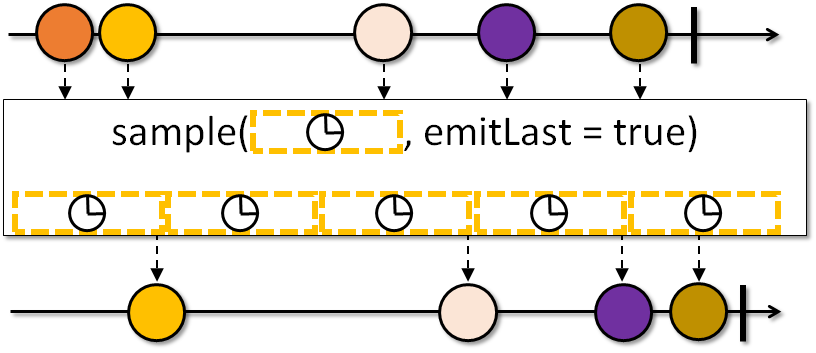
- Scheduler:
sampleoperates by default on thecomputationScheduler.
History: 2.0.5 - experimental
- Parameters:
period- the sampling rateunit- theTimeUnitin whichperiodis definedemitLast- if true and the upstream completes while there is still an unsampled item available, that item is emitted to downstream before completion if false, an unsampled last item is ignored.- Returns:
- an Observable that emits the results of sampling the items emitted by the source ObservableSource at the specified time interval
- Since:
- 2.1
- See Also:
- ReactiveX operators documentation: Sample,
throttleLast(long, TimeUnit)
-
sample
@CheckReturnValue @SchedulerSupport(value="custom") public final Observable<T> sample(long period, TimeUnit unit, Scheduler scheduler)
Returns an Observable that emits the most recently emitted item (if any) emitted by the source ObservableSource within periodic time intervals, where the intervals are defined on a particular Scheduler.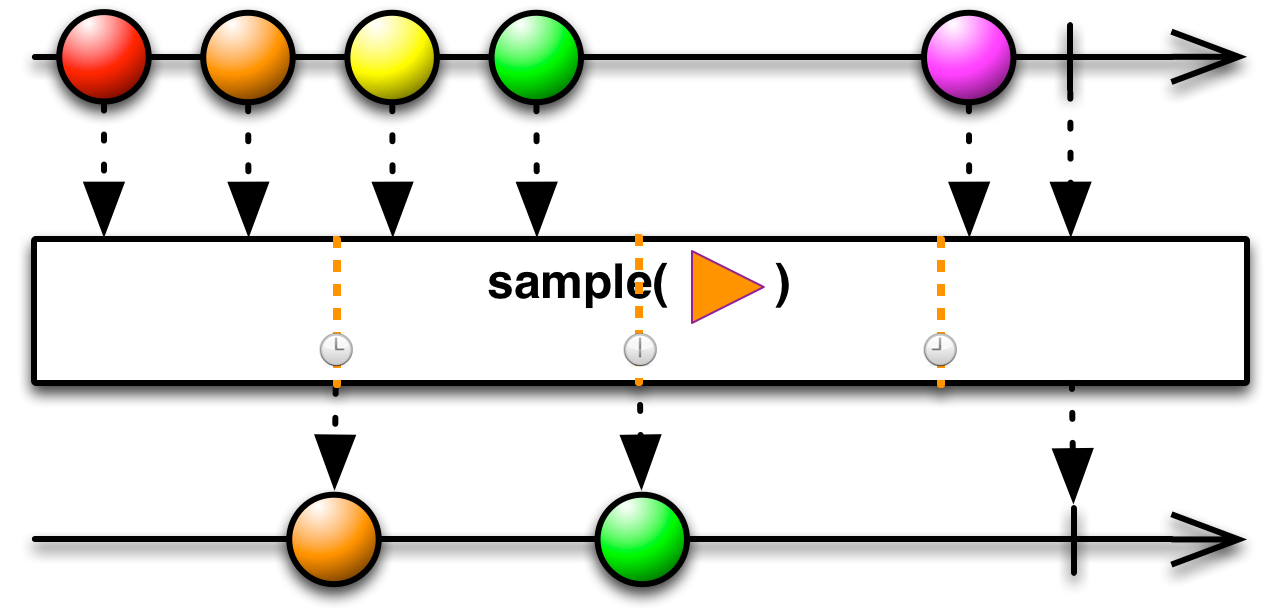
- Scheduler:
- You specify which
Schedulerthis operator will use.
- Parameters:
period- the sampling rateunit- theTimeUnitin whichperiodis definedscheduler- theSchedulerto use when sampling- Returns:
- an Observable that emits the results of sampling the items emitted by the source ObservableSource at the specified time interval
- See Also:
- ReactiveX operators documentation: Sample,
throttleLast(long, TimeUnit, Scheduler)
-
sample
@CheckReturnValue @SchedulerSupport(value="custom") public final Observable<T> sample(long period, TimeUnit unit, Scheduler scheduler, boolean emitLast)
Returns an Observable that emits the most recently emitted item (if any) emitted by the source ObservableSource within periodic time intervals, where the intervals are defined on a particular Scheduler and optionally emit the very last upstream item when the upstream completes.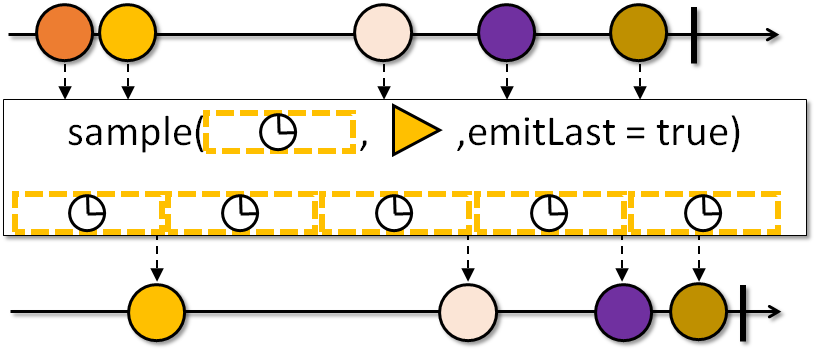
- Scheduler:
- You specify which
Schedulerthis operator will use.
History: 2.0.5 - experimental
- Parameters:
period- the sampling rateunit- theTimeUnitin whichperiodis definedscheduler- theSchedulerto use when samplingemitLast- if true and the upstream completes while there is still an unsampled item available, that item is emitted to downstream before completion if false, an unsampled last item is ignored.- Returns:
- an Observable that emits the results of sampling the items emitted by the source ObservableSource at the specified time interval
- Since:
- 2.1
- See Also:
- ReactiveX operators documentation: Sample,
throttleLast(long, TimeUnit, Scheduler)
-
sample
@CheckReturnValue @SchedulerSupport(value="none") public final <U> Observable<T> sample(ObservableSource<U> sampler)
Returns an Observable that, when the specifiedsamplerObservableSource emits an item or completes, emits the most recently emitted item (if any) emitted by the source ObservableSource since the previous emission from thesamplerObservableSource.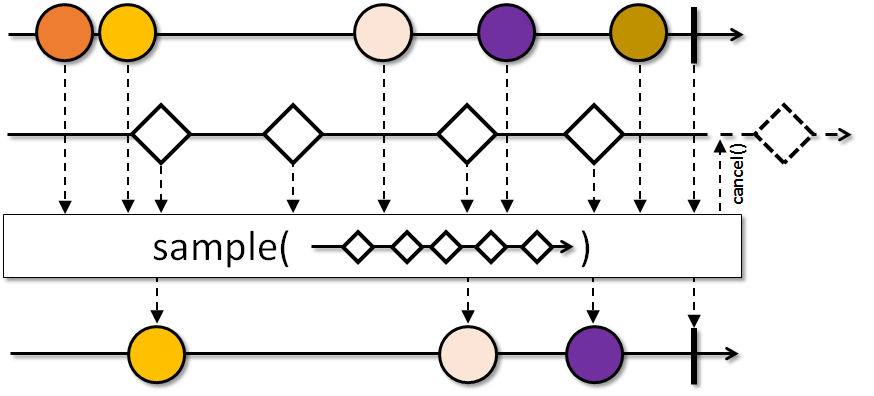
- Scheduler:
- This version of
sampledoes not operate by default on a particularScheduler.
- Type Parameters:
U- the element type of the sampler ObservableSource- Parameters:
sampler- the ObservableSource to use for sampling the source ObservableSource- Returns:
- an Observable that emits the results of sampling the items emitted by this ObservableSource whenever
the
samplerObservableSource emits an item or completes - See Also:
- ReactiveX operators documentation: Sample
-
sample
@CheckReturnValue @SchedulerSupport(value="none") public final <U> Observable<T> sample(ObservableSource<U> sampler, boolean emitLast)
Returns an Observable that, when the specifiedsamplerObservableSource emits an item or completes, emits the most recently emitted item (if any) emitted by the source ObservableSource since the previous emission from thesamplerObservableSource and optionally emit the very last upstream item when the upstream or other ObservableSource complete.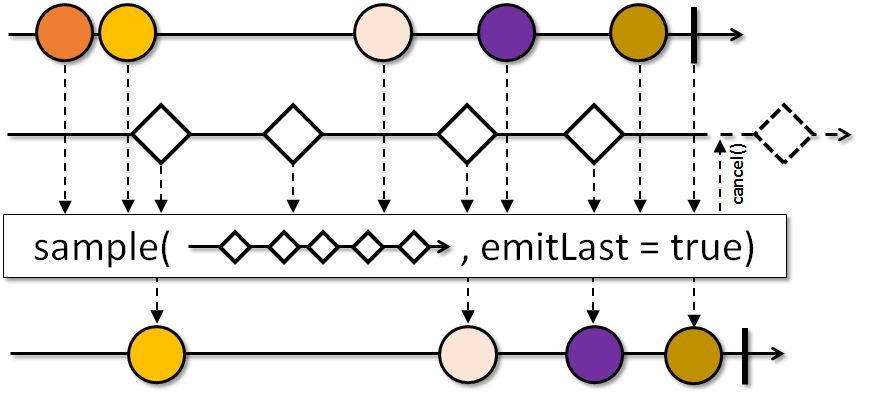
- Scheduler:
- This version of
sampledoes not operate by default on a particularScheduler.
History: 2.0.5 - experimental
- Type Parameters:
U- the element type of the sampler ObservableSource- Parameters:
sampler- the ObservableSource to use for sampling the source ObservableSourceemitLast- if true and the upstream completes while there is still an unsampled item available, that item is emitted to downstream before completion if false, an unsampled last item is ignored.- Returns:
- an Observable that emits the results of sampling the items emitted by this ObservableSource whenever
the
samplerObservableSource emits an item or completes - Since:
- 2.1
- See Also:
- ReactiveX operators documentation: Sample
-
scan
@CheckReturnValue @SchedulerSupport(value="none") public final Observable<T> scan(BiFunction<T,T,T> accumulator)
Returns an Observable that applies a specified accumulator function to the first item emitted by a source ObservableSource, then feeds the result of that function along with the second item emitted by the source ObservableSource into the same function, and so on until all items have been emitted by the source ObservableSource, emitting the result of each of these iterations.
This sort of function is sometimes called an accumulator.
- Scheduler:
scandoes not operate by default on a particularScheduler.
- Parameters:
accumulator- an accumulator function to be invoked on each item emitted by the source ObservableSource, whose result will be emitted toObservers viaonNextand used in the next accumulator call- Returns:
- an Observable that emits the results of each call to the accumulator function
- See Also:
- ReactiveX operators documentation: Scan
-
scan
@CheckReturnValue @SchedulerSupport(value="none") public final <R> Observable<R> scan(R initialValue, BiFunction<R,? super T,R> accumulator)
Returns an Observable that applies a specified accumulator function to the first item emitted by a source ObservableSource and a seed value, then feeds the result of that function along with the second item emitted by the source ObservableSource into the same function, and so on until all items have been emitted by the source ObservableSource, emitting the result of each of these iterations.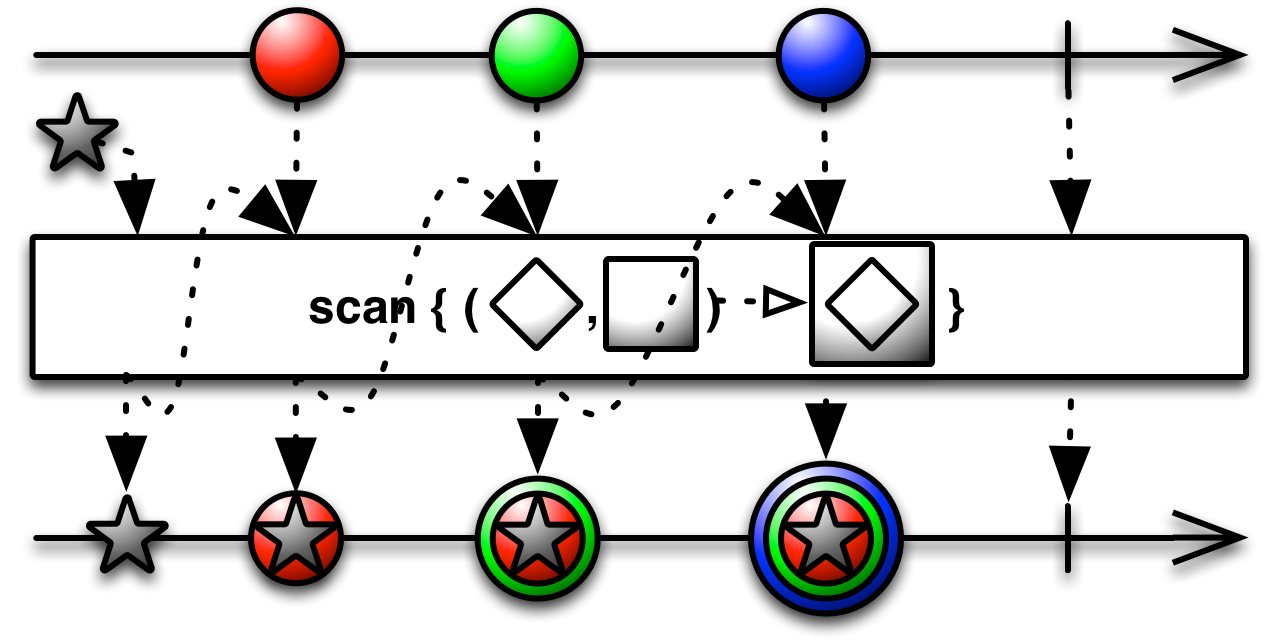
This sort of function is sometimes called an accumulator.
Note that the ObservableSource that results from this method will emit
initialValueas its first emitted item.Note that the
initialValueis shared among all subscribers to the resulting ObservableSource and may cause problems if it is mutable. To make sure each subscriber gets its own value, defer the application of this operator viadefer(Callable):ObservableSource<T> source = ... Observable.defer(() -> source.scan(new ArrayList<>(), (list, item) -> list.add(item))); // alternatively, by using compose to stay fluent source.compose(o -> Observable.defer(() -> o.scan(new ArrayList<>(), (list, item) -> list.add(item))) );- Scheduler:
scandoes not operate by default on a particularScheduler.
- Type Parameters:
R- the initial, accumulator and result type- Parameters:
initialValue- the initial (seed) accumulator itemaccumulator- an accumulator function to be invoked on each item emitted by the source ObservableSource, whose result will be emitted toObservers viaonNextand used in the next accumulator call- Returns:
- an Observable that emits
initialValuefollowed by the results of each call to the accumulator function - See Also:
- ReactiveX operators documentation: Scan
-
scanWith
@CheckReturnValue @SchedulerSupport(value="none") public final <R> Observable<R> scanWith(Callable<R> seedSupplier, BiFunction<R,? super T,R> accumulator)
Returns an Observable that applies a specified accumulator function to the first item emitted by a source ObservableSource and a seed value, then feeds the result of that function along with the second item emitted by the source ObservableSource into the same function, and so on until all items have been emitted by the source ObservableSource, emitting the result of each of these iterations.
This sort of function is sometimes called an accumulator.
Note that the ObservableSource that results from this method will emit the value returned by the
seedSupplieras its first item.- Scheduler:
scanWithdoes not operate by default on a particularScheduler.
- Type Parameters:
R- the initial, accumulator and result type- Parameters:
seedSupplier- a Callable that returns the initial (seed) accumulator item for each individual Observeraccumulator- an accumulator function to be invoked on each item emitted by the source ObservableSource, whose result will be emitted toObservers viaonNextand used in the next accumulator call- Returns:
- an Observable that emits
initialValuefollowed by the results of each call to the accumulator function - See Also:
- ReactiveX operators documentation: Scan
-
serialize
@CheckReturnValue @SchedulerSupport(value="none") public final Observable<T> serialize()
Forces an ObservableSource's emissions and notifications to be serialized and for it to obey the ObservableSource contract in other ways.It is possible for an ObservableSource to invoke its Observers' methods asynchronously, perhaps from different threads. This could make such an ObservableSource poorly-behaved, in that it might try to invoke
onCompleteoronErrorbefore one of itsonNextinvocations, or it might callonNextfrom two different threads concurrently. You can force such an ObservableSource to be well-behaved and sequential by applying theserializemethod to it.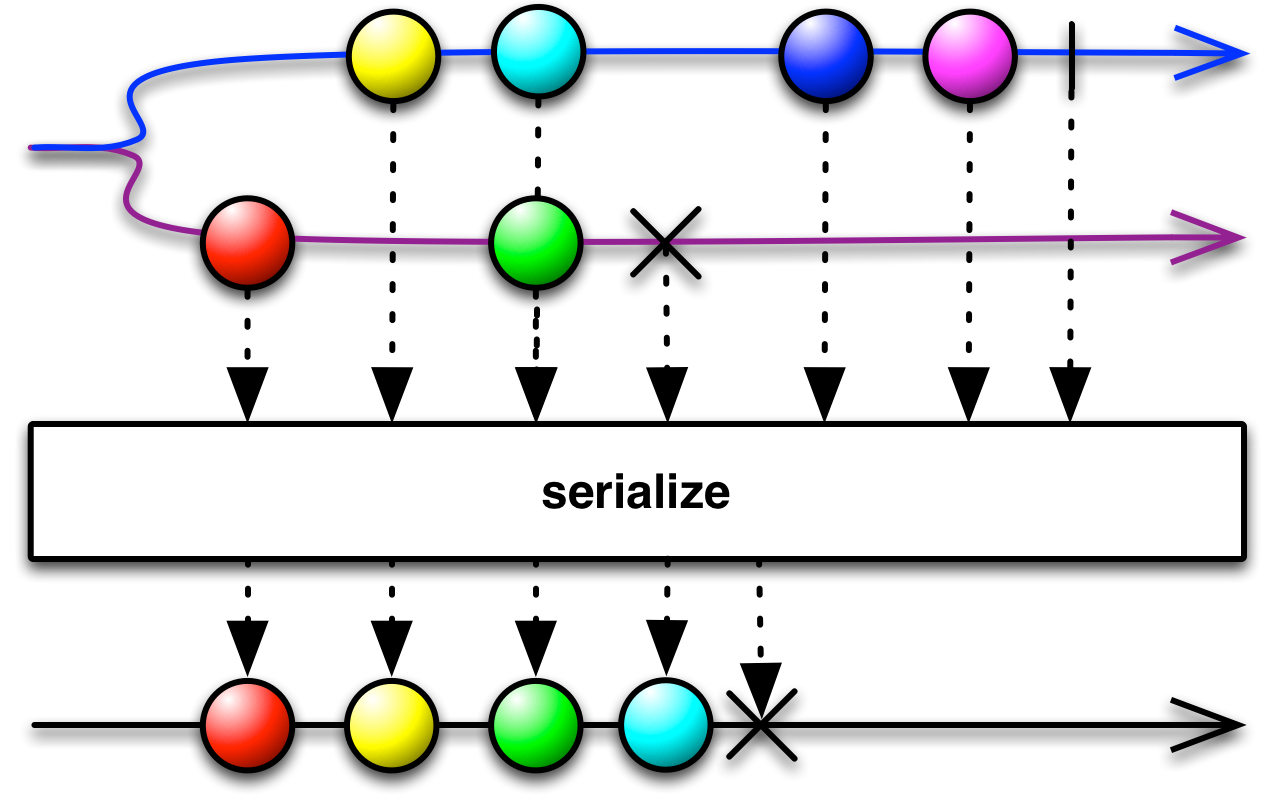
- Scheduler:
serializedoes not operate by default on a particularScheduler.
- Returns:
- an
ObservableSourcethat is guaranteed to be well-behaved and to make only serialized calls to its observers - See Also:
- ReactiveX operators documentation: Serialize
-
share
@CheckReturnValue @SchedulerSupport(value="none") public final Observable<T> share()
Returns a newObservableSourcethat multicasts (and shares a single subscription to) the originalObservableSource. As long as there is at least oneObserverthisObservableSourcewill be subscribed and emitting data. When all subscribers have disposed it will dispose the sourceObservableSource.This is an alias for
publish().refCount().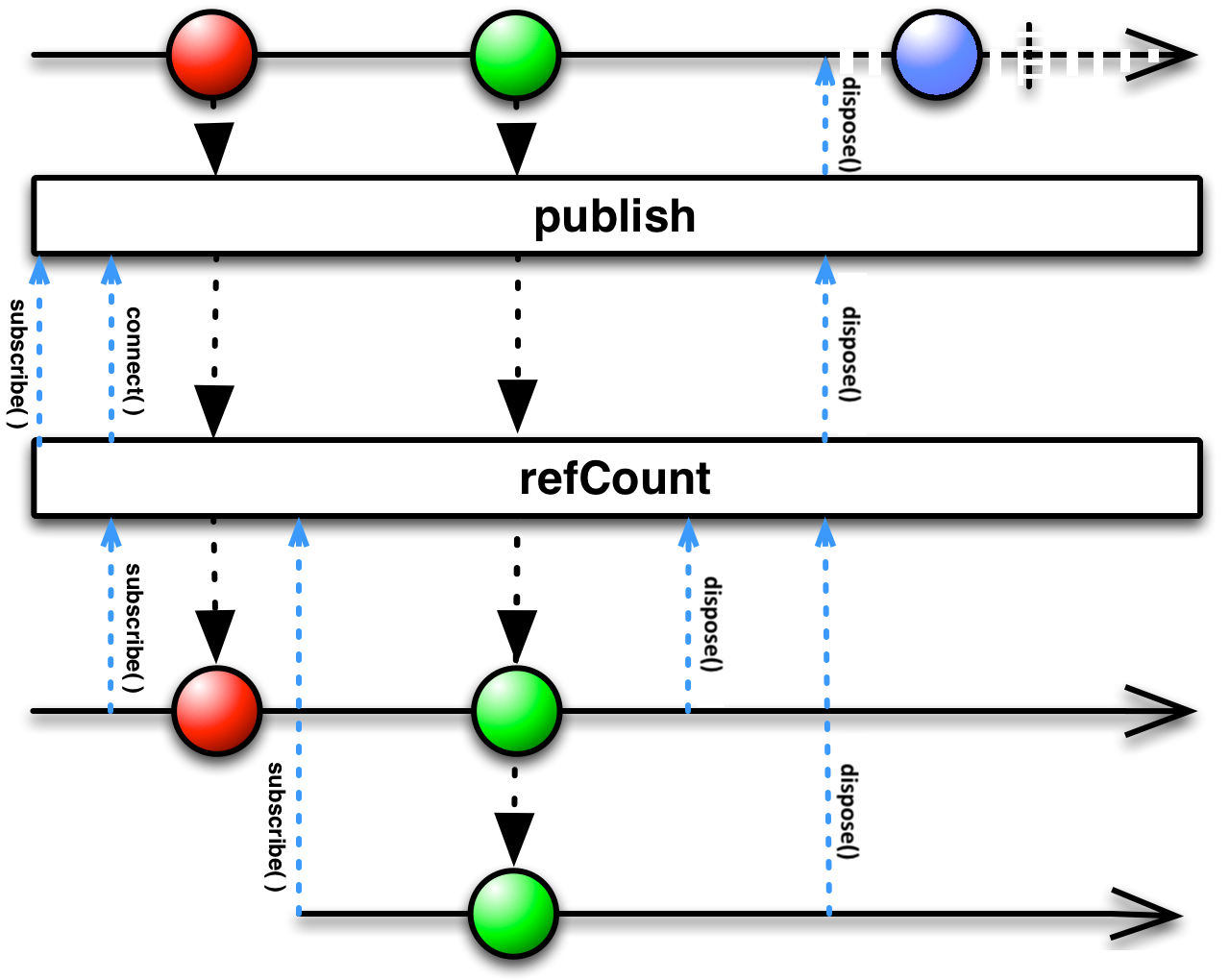
- Scheduler:
sharedoes not operate by default on a particularScheduler.
- Returns:
- an
ObservableSourcethat upon connection causes the sourceObservableSourceto emit items to itsObservers - See Also:
- ReactiveX operators documentation: RefCount
-
singleElement
@CheckReturnValue @SchedulerSupport(value="none") public final Maybe<T> singleElement()
Returns a Maybe that completes if this Observable is empty or emits the single item emitted by this Observable, or signals anIllegalArgumentExceptionif this Observable emits more than one item.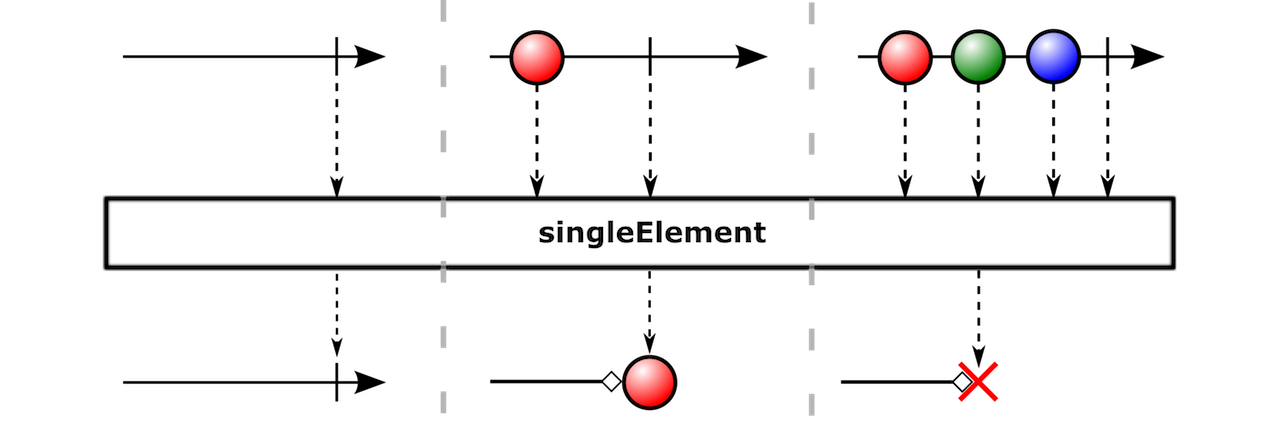
- Scheduler:
singleElementdoes not operate by default on a particularScheduler.
- Returns:
- a
Maybethat emits the single item emitted by the source ObservableSource - See Also:
- ReactiveX operators documentation: First
-
single
@CheckReturnValue @SchedulerSupport(value="none") public final Single<T> single(T defaultItem)
Returns a Single that emits the single item emitted by this Observable, if this Observable emits only a single item, or a default item if the source ObservableSource emits no items. If the source ObservableSource emits more than one item, anIllegalArgumentExceptionis signalled instead.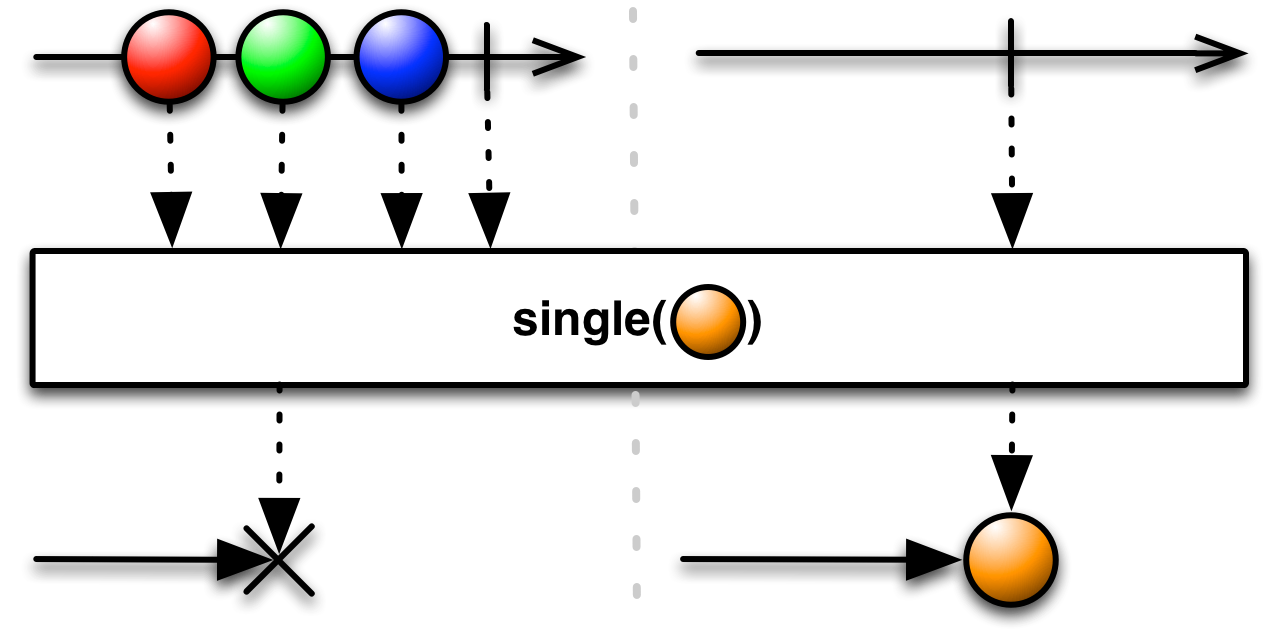
- Scheduler:
singledoes not operate by default on a particularScheduler.
- Parameters:
defaultItem- a default value to emit if the source ObservableSource emits no item- Returns:
- the new Single instance
- See Also:
- ReactiveX operators documentation: First
-
singleOrError
@CheckReturnValue @SchedulerSupport(value="none") public final Single<T> singleOrError()
Returns a Single that emits the single item emitted by this Observable if this Observable emits only a single item, otherwise if this Observable completes without emitting any items or emits more than one item aNoSuchElementExceptionorIllegalArgumentExceptionwill be signalled respectively.
- Scheduler:
singleOrErrordoes not operate by default on a particularScheduler.
- Returns:
- the new Single instance
- See Also:
- ReactiveX operators documentation: First
-
skip
@CheckReturnValue @SchedulerSupport(value="none") public final Observable<T> skip(long count)
Returns an Observable that skips the firstcountitems emitted by the source ObservableSource and emits the remainder.
- Scheduler:
- This version of
skipdoes not operate by default on a particularScheduler.
- Parameters:
count- the number of items to skip- Returns:
- an Observable that is identical to the source ObservableSource except that it does not emit the first
countitems that the source ObservableSource emits - See Also:
- ReactiveX operators documentation: Skip
-
skip
@CheckReturnValue @SchedulerSupport(value="io.reactivex:computation") public final Observable<T> skip(long time, TimeUnit unit)
Returns an Observable that skips values emitted by the source ObservableSource before a specified time window elapses.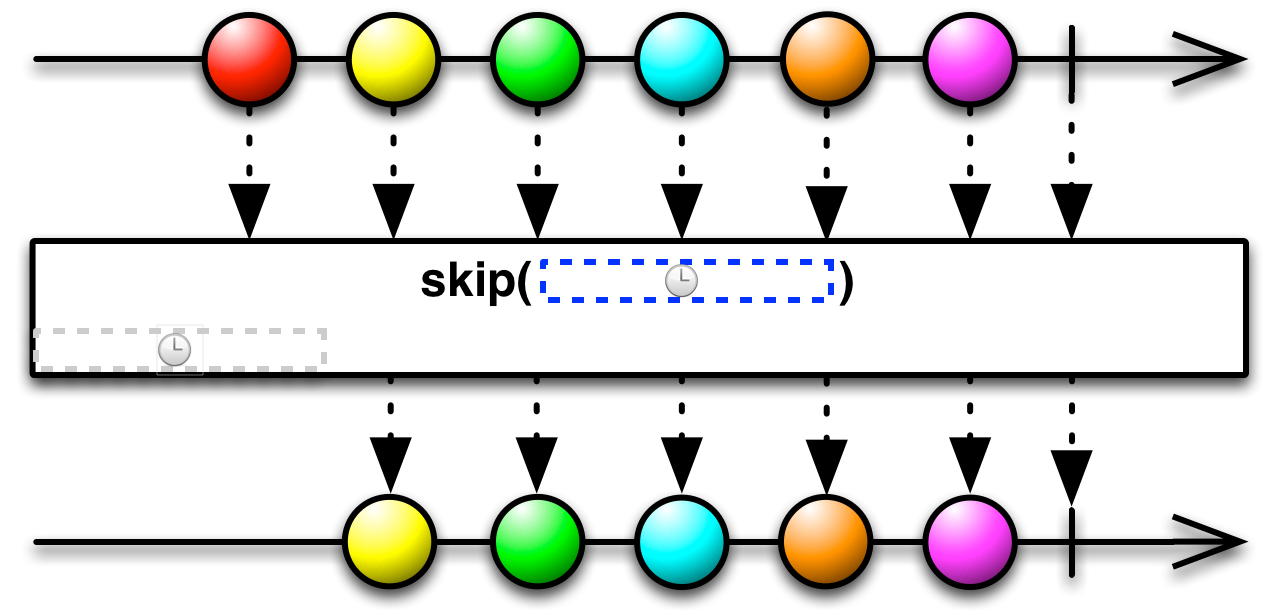
- Scheduler:
skipdoes not operate on any particular scheduler but uses the current time from thecomputationScheduler.
- Parameters:
time- the length of the time window to skipunit- the time unit oftime- Returns:
- an Observable that skips values emitted by the source ObservableSource before the time window defined
by
timeelapses and the emits the remainder - See Also:
- ReactiveX operators documentation: Skip
-
skip
@CheckReturnValue @SchedulerSupport(value="custom") public final Observable<T> skip(long time, TimeUnit unit, Scheduler scheduler)
Returns an Observable that skips values emitted by the source ObservableSource before a specified time window on a specifiedSchedulerelapses.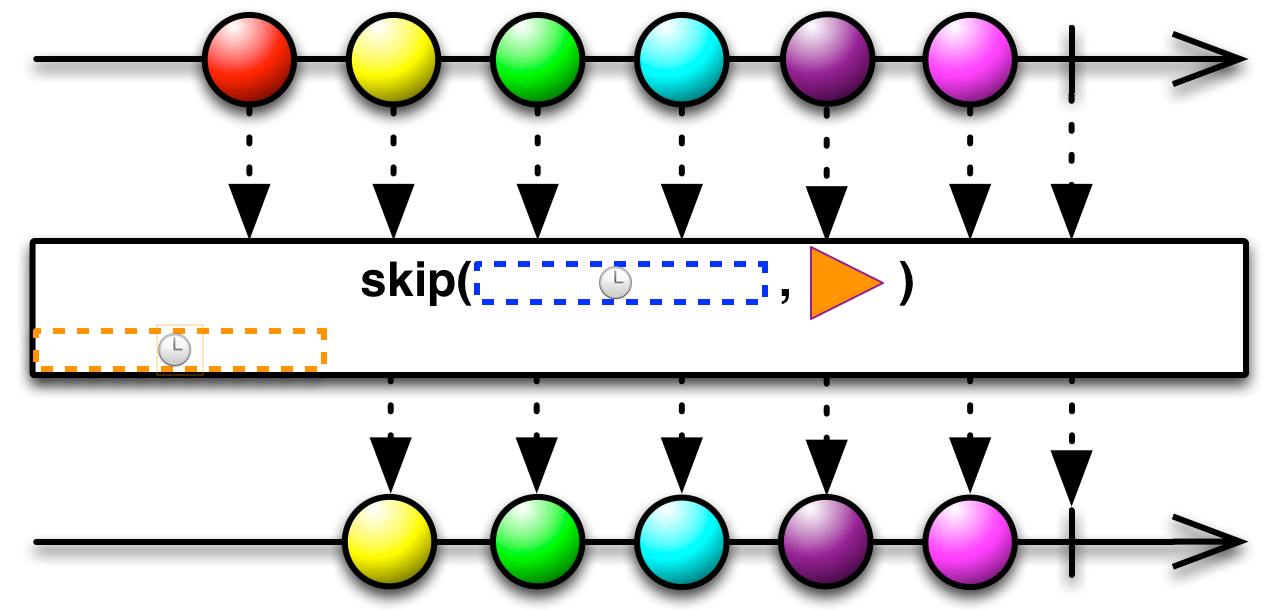
- Scheduler:
- You specify which
Schedulerthis operator will use for the timed skipping
- Parameters:
time- the length of the time window to skipunit- the time unit oftimescheduler- theScheduleron which the timed wait happens- Returns:
- an Observable that skips values emitted by the source ObservableSource before the time window defined
by
timeandschedulerelapses, and then emits the remainder - See Also:
- ReactiveX operators documentation: Skip
-
skipLast
@CheckReturnValue @SchedulerSupport(value="none") public final Observable<T> skipLast(int count)
Returns an Observable that drops a specified number of items from the end of the sequence emitted by the source ObservableSource.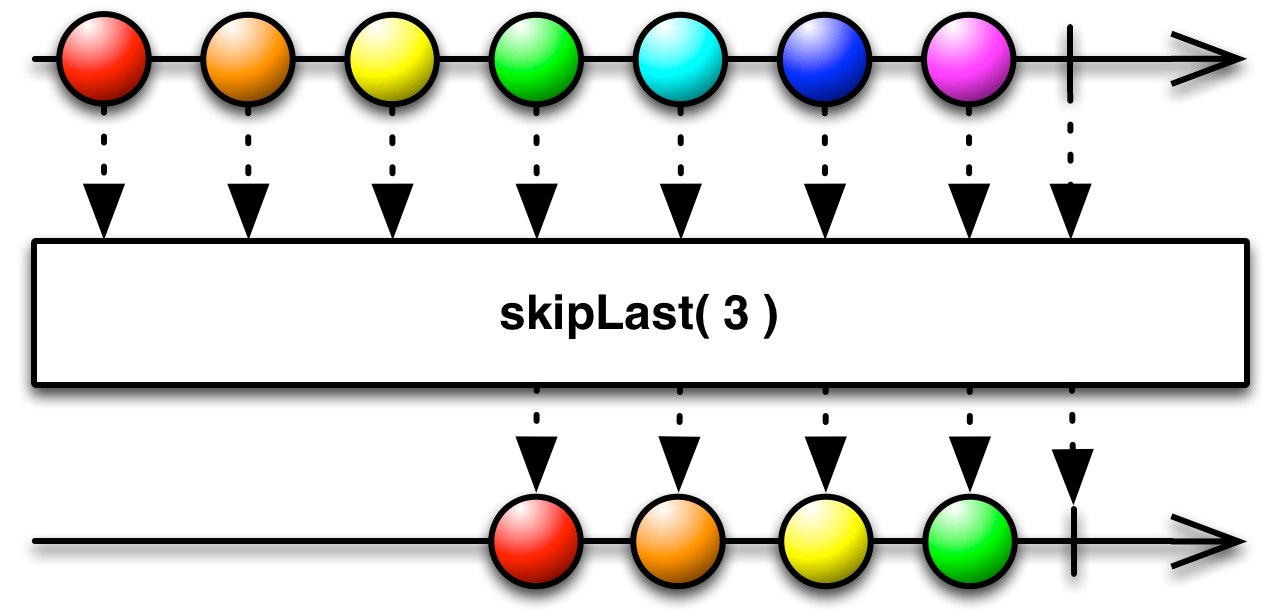
This Observer accumulates a queue long enough to store the first
countitems. As more items are received, items are taken from the front of the queue and emitted by the returned ObservableSource. This causes such items to be delayed.- Scheduler:
- This version of
skipLastdoes not operate by default on a particularScheduler.
- Parameters:
count- number of items to drop from the end of the source sequence- Returns:
- an Observable that emits the items emitted by the source ObservableSource except for the dropped ones at the end
- Throws:
IndexOutOfBoundsException- ifcountis less than zero- See Also:
- ReactiveX operators documentation: SkipLast
-
skipLast
@CheckReturnValue @SchedulerSupport(value="io.reactivex:trampoline") public final Observable<T> skipLast(long time, TimeUnit unit)
Returns an Observable that drops items emitted by the source ObservableSource during a specified time window before the source completes.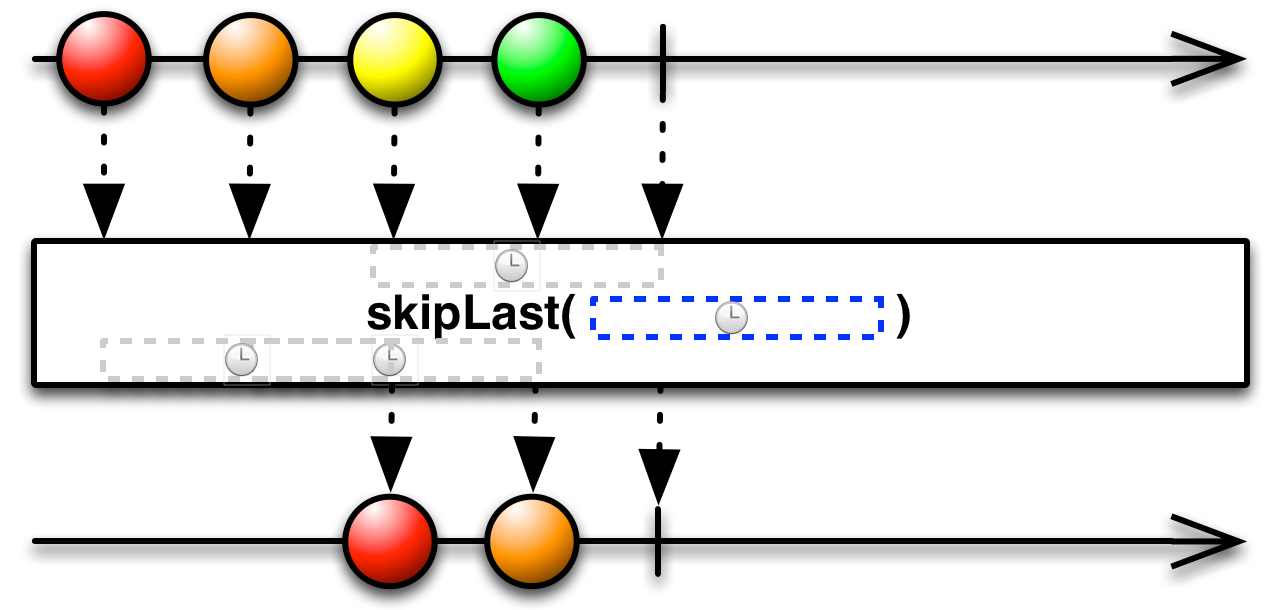
Note: this action will cache the latest items arriving in the specified time window.
- Scheduler:
skipLastdoes not operate on any particular scheduler but uses the current time from thecomputationScheduler.
- Parameters:
time- the length of the time windowunit- the time unit oftime- Returns:
- an Observable that drops those items emitted by the source ObservableSource in a time window before the
source completes defined by
time - See Also:
- ReactiveX operators documentation: SkipLast
-
skipLast
@CheckReturnValue @SchedulerSupport(value="io.reactivex:trampoline") public final Observable<T> skipLast(long time, TimeUnit unit, boolean delayError)
Returns an Observable that drops items emitted by the source ObservableSource during a specified time window before the source completes.
Note: this action will cache the latest items arriving in the specified time window.
- Scheduler:
skipLastdoes not operate on any particular scheduler but uses the current time from thecomputationScheduler.
- Parameters:
time- the length of the time windowunit- the time unit oftimedelayError- if true, an exception signalled by the current Observable is delayed until the regular elements are consumed by the downstream; if false, an exception is immediately signalled and all regular elements dropped- Returns:
- an Observable that drops those items emitted by the source ObservableSource in a time window before the
source completes defined by
time - See Also:
- ReactiveX operators documentation: SkipLast
-
skipLast
@CheckReturnValue @SchedulerSupport(value="custom") public final Observable<T> skipLast(long time, TimeUnit unit, Scheduler scheduler)
Returns an Observable that drops items emitted by the source ObservableSource during a specified time window (defined on a specified scheduler) before the source completes.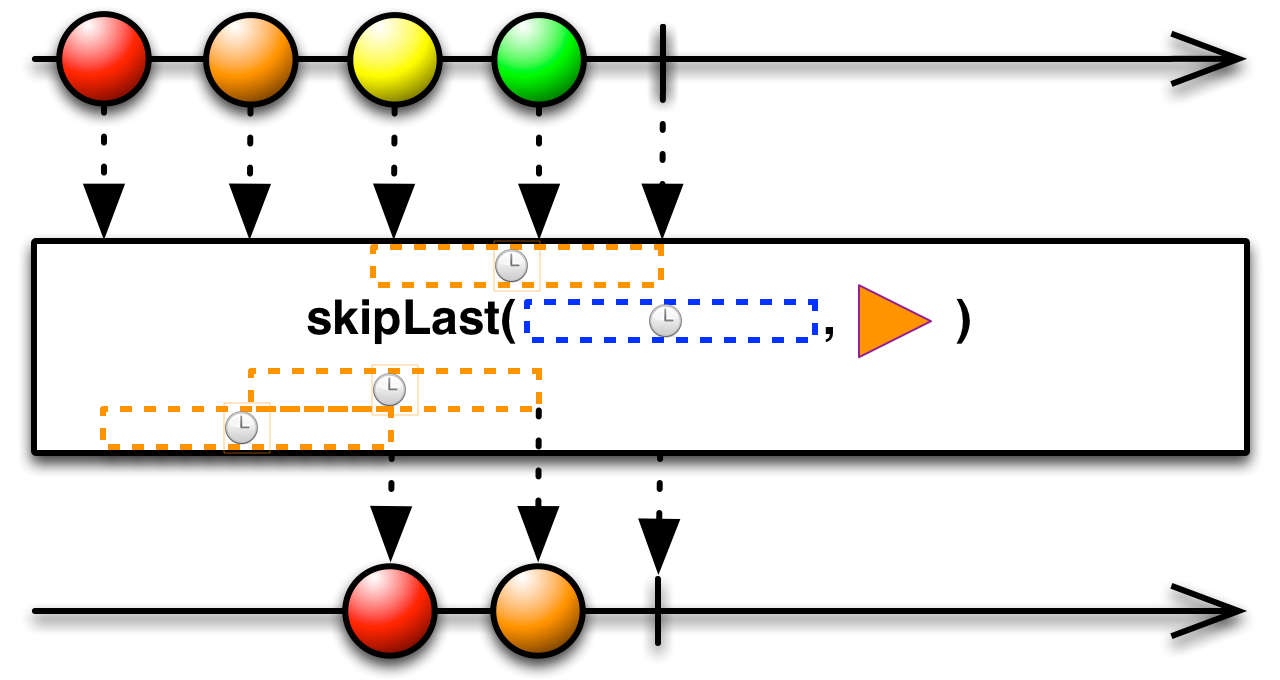
Note: this action will cache the latest items arriving in the specified time window.
- Scheduler:
- You specify which
Schedulerthis operator will use for tracking the current time
- Parameters:
time- the length of the time windowunit- the time unit oftimescheduler- the scheduler used as the time source- Returns:
- an Observable that drops those items emitted by the source ObservableSource in a time window before the
source completes defined by
timeandscheduler - See Also:
- ReactiveX operators documentation: SkipLast
-
skipLast
@CheckReturnValue @SchedulerSupport(value="custom") public final Observable<T> skipLast(long time, TimeUnit unit, Scheduler scheduler, boolean delayError)
Returns an Observable that drops items emitted by the source ObservableSource during a specified time window (defined on a specified scheduler) before the source completes.
Note: this action will cache the latest items arriving in the specified time window.
- Scheduler:
- You specify which
Schedulerthis operator will use to track the current time
- Parameters:
time- the length of the time windowunit- the time unit oftimescheduler- the scheduler used as the time sourcedelayError- if true, an exception signalled by the current Observable is delayed until the regular elements are consumed by the downstream; if false, an exception is immediately signalled and all regular elements dropped- Returns:
- an Observable that drops those items emitted by the source ObservableSource in a time window before the
source completes defined by
timeandscheduler - See Also:
- ReactiveX operators documentation: SkipLast
-
skipLast
@CheckReturnValue @SchedulerSupport(value="custom") public final Observable<T> skipLast(long time, TimeUnit unit, Scheduler scheduler, boolean delayError, int bufferSize)
Returns an Observable that drops items emitted by the source ObservableSource during a specified time window (defined on a specified scheduler) before the source completes.
Note: this action will cache the latest items arriving in the specified time window.
- Scheduler:
- You specify which
Schedulerthis operator will use.
- Parameters:
time- the length of the time windowunit- the time unit oftimescheduler- the scheduler used as the time sourcedelayError- if true, an exception signalled by the current Observable is delayed until the regular elements are consumed by the downstream; if false, an exception is immediately signalled and all regular elements droppedbufferSize- the hint about how many elements to expect to be skipped- Returns:
- an Observable that drops those items emitted by the source ObservableSource in a time window before the
source completes defined by
timeandscheduler - See Also:
- ReactiveX operators documentation: SkipLast
-
skipUntil
@CheckReturnValue @SchedulerSupport(value="none") public final <U> Observable<T> skipUntil(ObservableSource<U> other)
Returns an Observable that skips items emitted by the source ObservableSource until a second ObservableSource emits an item.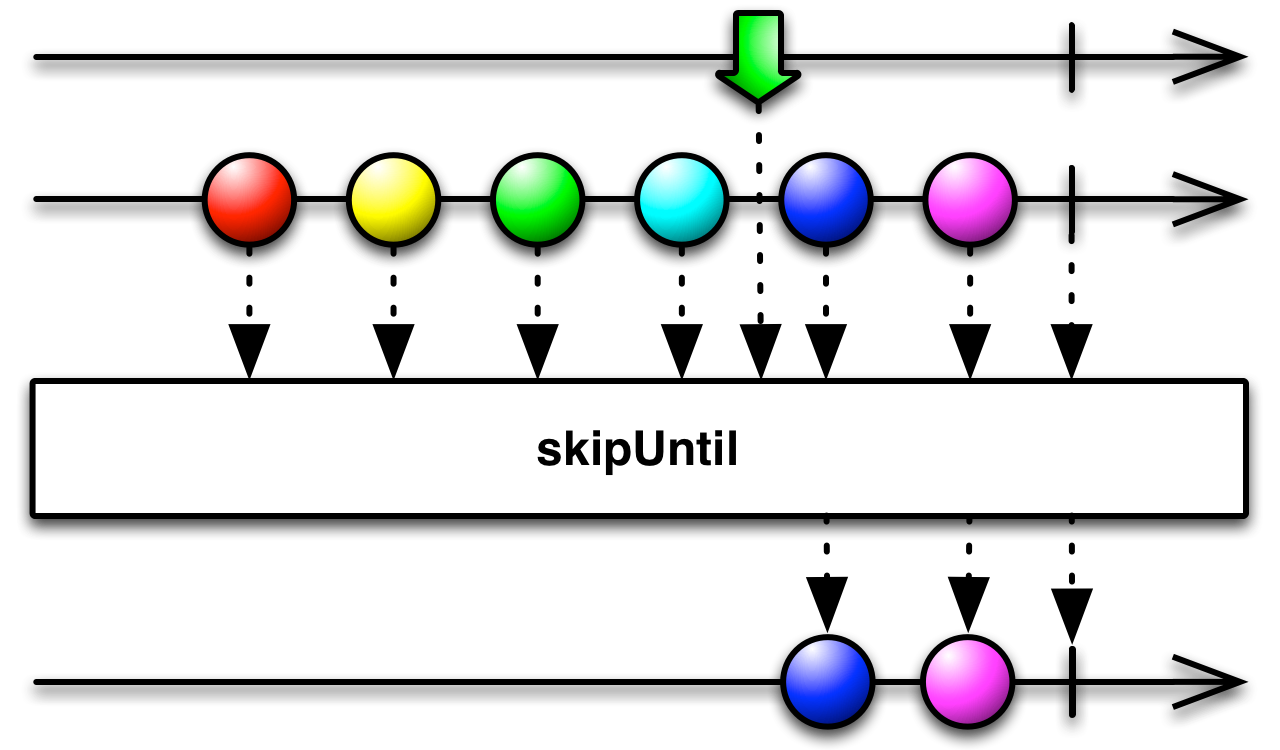
- Scheduler:
skipUntildoes not operate by default on a particularScheduler.
- Type Parameters:
U- the element type of the other ObservableSource- Parameters:
other- the second ObservableSource that has to emit an item before the source ObservableSource's elements begin to be mirrored by the resulting ObservableSource- Returns:
- an Observable that skips items from the source ObservableSource until the second ObservableSource emits an item, then emits the remaining items
- See Also:
- ReactiveX operators documentation: SkipUntil
-
skipWhile
@CheckReturnValue @SchedulerSupport(value="none") public final Observable<T> skipWhile(Predicate<? super T> predicate)
Returns an Observable that skips all items emitted by the source ObservableSource as long as a specified condition holds true, but emits all further source items as soon as the condition becomes false.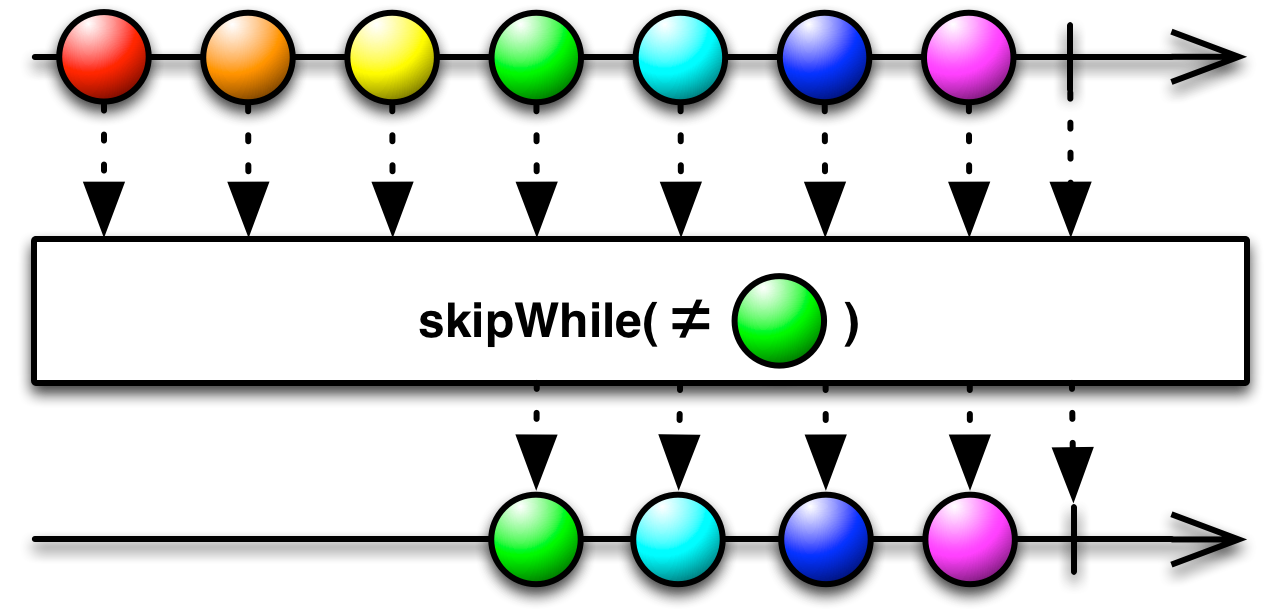
- Scheduler:
skipWhiledoes not operate by default on a particularScheduler.
- Parameters:
predicate- a function to test each item emitted from the source ObservableSource- Returns:
- an Observable that begins emitting items emitted by the source ObservableSource when the specified predicate becomes false
- See Also:
- ReactiveX operators documentation: SkipWhile
-
sorted
@CheckReturnValue @SchedulerSupport(value="none") public final Observable<T> sorted()
Returns an Observable that emits the events emitted by source ObservableSource, in a sorted order. Each item emitted by the ObservableSource must implementComparablewith respect to all other items in the sequence.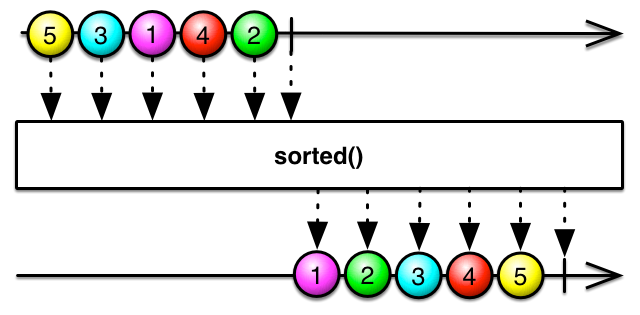
If any item emitted by this Observable does not implement
Comparablewith respect to all other items emitted by this Observable, no items will be emitted and the sequence is terminated with aClassCastException.Note that calling
sortedwith long, non-terminating or infinite sources might causeOutOfMemoryError- Scheduler:
sorteddoes not operate by default on a particularScheduler.
- Returns:
- an Observable that emits the items emitted by the source ObservableSource in sorted order
-
sorted
@CheckReturnValue @SchedulerSupport(value="none") public final Observable<T> sorted(Comparator<? super T> sortFunction)
Returns an Observable that emits the events emitted by source ObservableSource, in a sorted order based on a specified comparison function.Note that calling
sortedwith long, non-terminating or infinite sources might causeOutOfMemoryError- Scheduler:
sorteddoes not operate by default on a particularScheduler.
- Parameters:
sortFunction- a function that compares two items emitted by the source ObservableSource and returns an Integer that indicates their sort order- Returns:
- an Observable that emits the items emitted by the source ObservableSource in sorted order
-
startWith
@CheckReturnValue @SchedulerSupport(value="none") public final Observable<T> startWith(Iterable<? extends T> items)
Returns an Observable that emits the items in a specifiedIterablebefore it begins to emit items emitted by the source ObservableSource.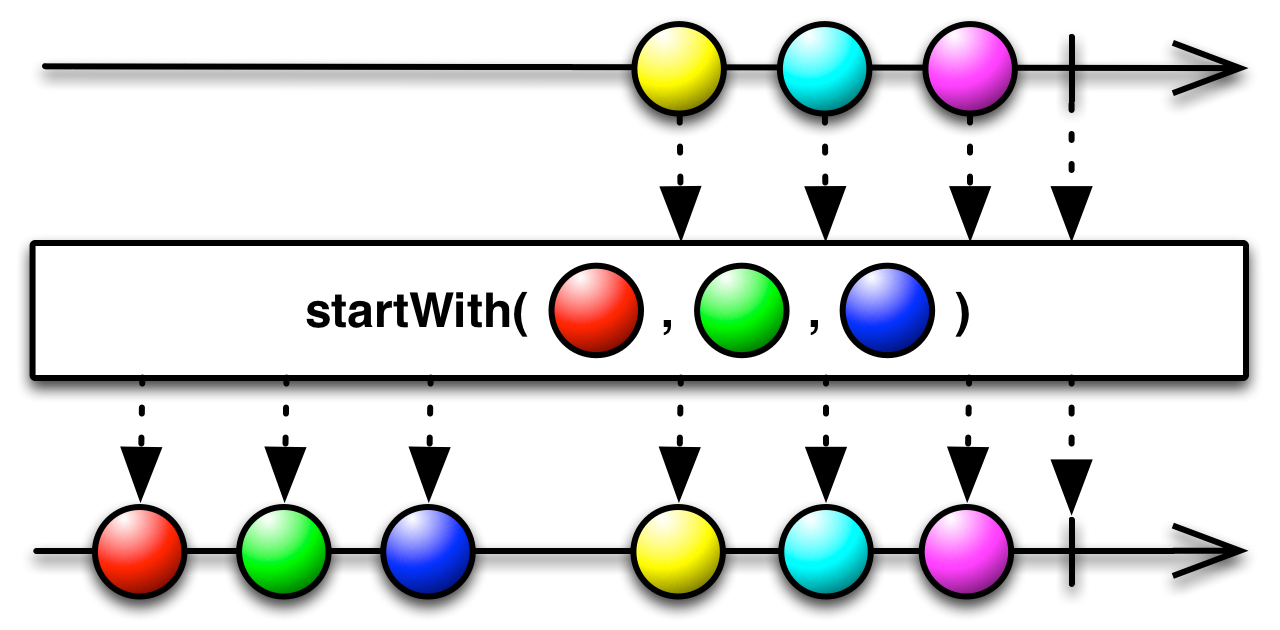
- Scheduler:
startWithdoes not operate by default on a particularScheduler.
- Parameters:
items- an Iterable that contains the items you want the modified ObservableSource to emit first- Returns:
- an Observable that emits the items in the specified
Iterableand then emits the items emitted by the source ObservableSource - See Also:
- ReactiveX operators documentation: StartWith
-
startWith
@CheckReturnValue @SchedulerSupport(value="none") public final Observable<T> startWith(ObservableSource<? extends T> other)
Returns an Observable that emits the items in a specifiedObservableSourcebefore it begins to emit items emitted by the source ObservableSource.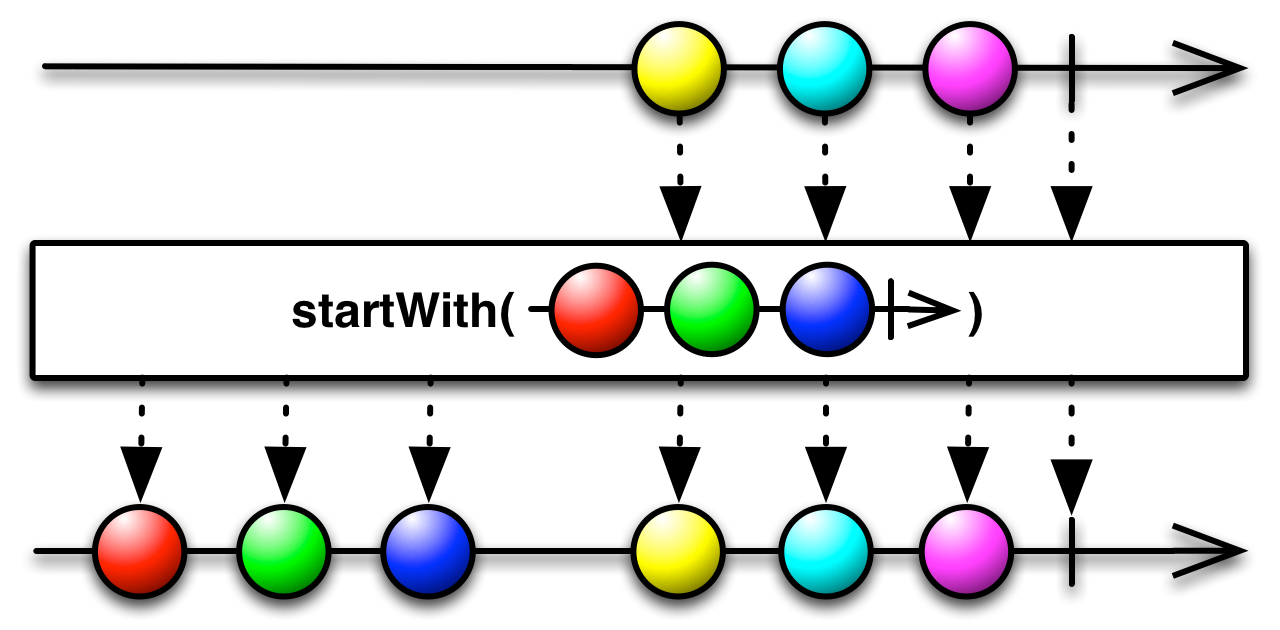
- Scheduler:
startWithdoes not operate by default on a particularScheduler.
- Parameters:
other- an ObservableSource that contains the items you want the modified ObservableSource to emit first- Returns:
- an Observable that emits the items in the specified
ObservableSourceand then emits the items emitted by the source ObservableSource - See Also:
- ReactiveX operators documentation: StartWith
-
startWith
@CheckReturnValue @SchedulerSupport(value="none") public final Observable<T> startWith(T item)
Returns an Observable that emits a specified item before it begins to emit items emitted by the source ObservableSource.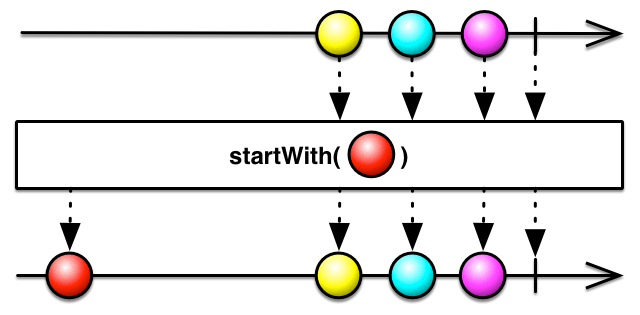
- Scheduler:
startWithdoes not operate by default on a particularScheduler.
- Parameters:
item- the item to emit first- Returns:
- an Observable that emits the specified item before it begins to emit items emitted by the source ObservableSource
- See Also:
- ReactiveX operators documentation: StartWith
-
startWithArray
@CheckReturnValue @SchedulerSupport(value="none") public final Observable<T> startWithArray(T... items)
Returns an Observable that emits the specified items before it begins to emit items emitted by the source ObservableSource.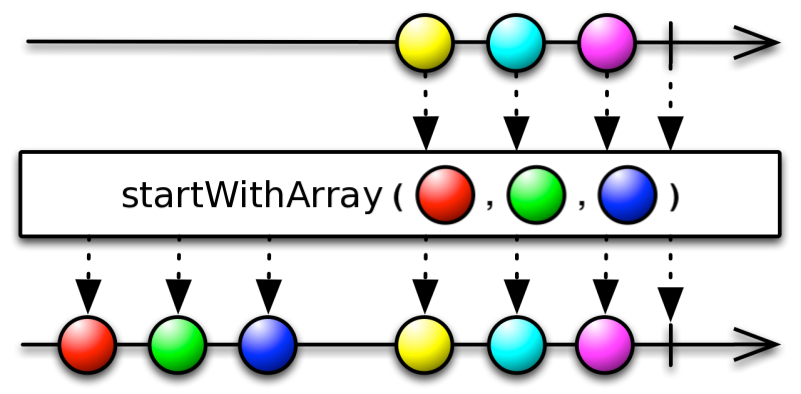
- Scheduler:
startWithArraydoes not operate by default on a particularScheduler.
- Parameters:
items- the array of values to emit first- Returns:
- an Observable that emits the specified items before it begins to emit items emitted by the source ObservableSource
- See Also:
- ReactiveX operators documentation: StartWith
-
subscribe
@SchedulerSupport(value="none") public final Disposable subscribe()
Subscribes to an ObservableSource and ignoresonNextandonCompleteemissions.If the Observable emits an error, it is wrapped into an
OnErrorNotImplementedExceptionand routed to the RxJavaPlugins.onError handler.- Scheduler:
subscribedoes not operate by default on a particularScheduler.
- Returns:
- a
Disposablereference with which the caller can stop receiving items before the ObservableSource has finished sending them - See Also:
- ReactiveX operators documentation: Subscribe
-
subscribe
@CheckReturnValue @SchedulerSupport(value="none") public final Disposable subscribe(Consumer<? super T> onNext)
Subscribes to an ObservableSource and provides a callback to handle the items it emits.If the Observable emits an error, it is wrapped into an
OnErrorNotImplementedExceptionand routed to the RxJavaPlugins.onError handler.- Scheduler:
subscribedoes not operate by default on a particularScheduler.
- Parameters:
onNext- theConsumer<T>you have designed to accept emissions from the ObservableSource- Returns:
- a
Disposablereference with which the caller can stop receiving items before the ObservableSource has finished sending them - Throws:
NullPointerException- ifonNextis null- See Also:
- ReactiveX operators documentation: Subscribe
-
subscribe
@CheckReturnValue @SchedulerSupport(value="none") public final Disposable subscribe(Consumer<? super T> onNext, Consumer<? super Throwable> onError)
Subscribes to an ObservableSource and provides callbacks to handle the items it emits and any error notification it issues.- Scheduler:
subscribedoes not operate by default on a particularScheduler.
- Parameters:
onNext- theConsumer<T>you have designed to accept emissions from the ObservableSourceonError- theConsumer<Throwable>you have designed to accept any error notification from the ObservableSource- Returns:
- a
Disposablereference with which the caller can stop receiving items before the ObservableSource has finished sending them - Throws:
NullPointerException- ifonNextis null, or ifonErroris null- See Also:
- ReactiveX operators documentation: Subscribe
-
subscribe
@CheckReturnValue @SchedulerSupport(value="none") public final Disposable subscribe(Consumer<? super T> onNext, Consumer<? super Throwable> onError, Action onComplete)
Subscribes to an ObservableSource and provides callbacks to handle the items it emits and any error or completion notification it issues.- Scheduler:
subscribedoes not operate by default on a particularScheduler.
- Parameters:
onNext- theConsumer<T>you have designed to accept emissions from the ObservableSourceonError- theConsumer<Throwable>you have designed to accept any error notification from the ObservableSourceonComplete- theActionyou have designed to accept a completion notification from the ObservableSource- Returns:
- a
Disposablereference with which the caller can stop receiving items before the ObservableSource has finished sending them - Throws:
NullPointerException- ifonNextis null, or ifonErroris null, or ifonCompleteis null- See Also:
- ReactiveX operators documentation: Subscribe
-
subscribe
@CheckReturnValue @SchedulerSupport(value="none") public final Disposable subscribe(Consumer<? super T> onNext, Consumer<? super Throwable> onError, Action onComplete, Consumer<? super Disposable> onSubscribe)
Subscribes to an ObservableSource and provides callbacks to handle the items it emits and any error or completion notification it issues.- Scheduler:
subscribedoes not operate by default on a particularScheduler.
- Parameters:
onNext- theConsumer<T>you have designed to accept emissions from the ObservableSourceonError- theConsumer<Throwable>you have designed to accept any error notification from the ObservableSourceonComplete- theActionyou have designed to accept a completion notification from the ObservableSourceonSubscribe- theConsumerthat receives the upstream's Disposable- Returns:
- a
Disposablereference with which the caller can stop receiving items before the ObservableSource has finished sending them - Throws:
NullPointerException- ifonNextis null, or ifonErroris null, or ifonCompleteis null, or ifonSubscribeis null- See Also:
- ReactiveX operators documentation: Subscribe
-
subscribe
@SchedulerSupport(value="none") public final void subscribe(Observer<? super T> observer)
Description copied from interface:ObservableSourceSubscribes the given Observer to this ObservableSource instance.- Specified by:
subscribein interfaceObservableSource<T>- Parameters:
observer- the Observer, not null
-
subscribeActual
protected abstract void subscribeActual(Observer<? super T> observer)
Operator implementations (both source and intermediate) should implement this method that performs the necessary business logic and handles the incomingObservers.There is no need to call any of the plugin hooks on the current
Observableinstance or theObserver; all hooks and basic safeguards have been applied bysubscribe(Observer)before this method gets called.- Parameters:
observer- the incoming Observer, never null
-
subscribeWith
@CheckReturnValue @SchedulerSupport(value="none") public final <E extends Observer<? super T>> E subscribeWith(E observer)
Subscribes a given Observer (subclass) to this Observable and returns the given Observer as is.Usage example:
Observable<Integer> source = Observable.range(1, 10); CompositeDisposable composite = new CompositeDisposable(); DisposableObserver<Integer> ds = new DisposableObserver<>() { // ... }; composite.add(source.subscribeWith(ds));- Scheduler:
subscribeWithdoes not operate by default on a particularScheduler.
- Type Parameters:
E- the type of the Observer to use and return- Parameters:
observer- the Observer (subclass) to use and return, not null- Returns:
- the input
observer - Throws:
NullPointerException- ifobserveris null- Since:
- 2.0
-
subscribeOn
@CheckReturnValue @SchedulerSupport(value="custom") public final Observable<T> subscribeOn(Scheduler scheduler)
Asynchronously subscribes Observers to this ObservableSource on the specifiedScheduler.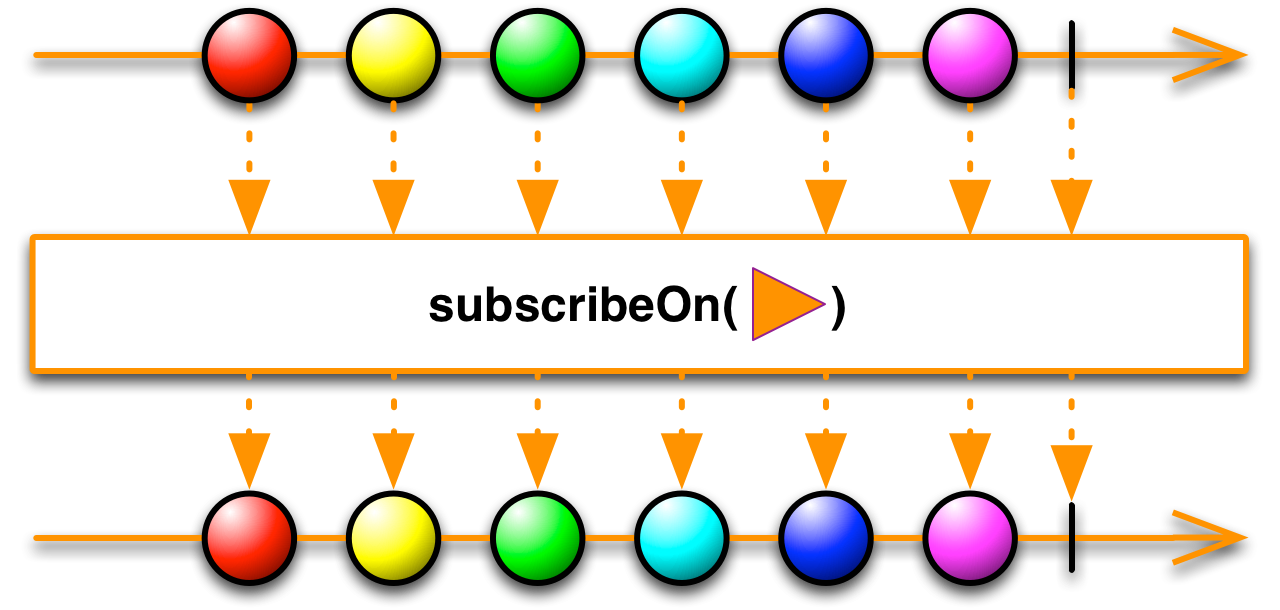
- Scheduler:
- You specify which
Schedulerthis operator will use.
- Parameters:
scheduler- theSchedulerto perform subscription actions on- Returns:
- the source ObservableSource modified so that its subscriptions happen on the
specified
Scheduler - See Also:
- ReactiveX operators documentation: SubscribeOn,
RxJava Threading Examples,
observeOn(io.reactivex.Scheduler)
-
switchIfEmpty
@CheckReturnValue @SchedulerSupport(value="none") public final Observable<T> switchIfEmpty(ObservableSource<? extends T> other)
Returns an Observable that emits the items emitted by the source ObservableSource or the items of an alternate ObservableSource if the source ObservableSource is empty.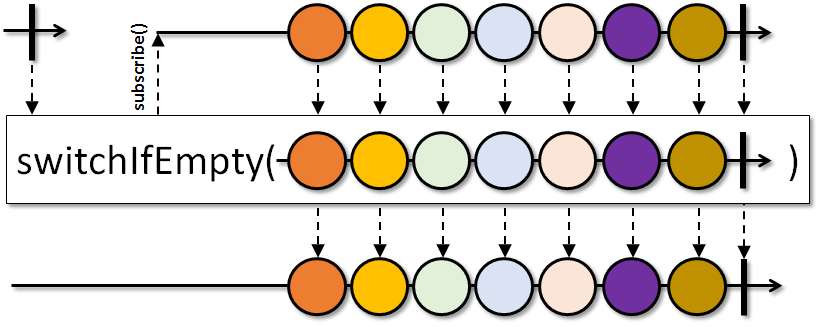
- Scheduler:
switchIfEmptydoes not operate by default on a particularScheduler.
- Parameters:
other- the alternate ObservableSource to subscribe to if the source does not emit any items- Returns:
- an ObservableSource that emits the items emitted by the source ObservableSource or the items of an alternate ObservableSource if the source ObservableSource is empty.
- Since:
- 1.1.0
-
switchMap
@CheckReturnValue @SchedulerSupport(value="none") public final <R> Observable<R> switchMap(Function<? super T,? extends ObservableSource<? extends R>> mapper)
Returns a new ObservableSource by applying a function that you supply to each item emitted by the source ObservableSource that returns an ObservableSource, and then emitting the items emitted by the most recently emitted of these ObservableSources.The resulting ObservableSource completes if both the upstream ObservableSource and the last inner ObservableSource, if any, complete. If the upstream ObservableSource signals an onError, the inner ObservableSource is disposed and the error delivered in-sequence.
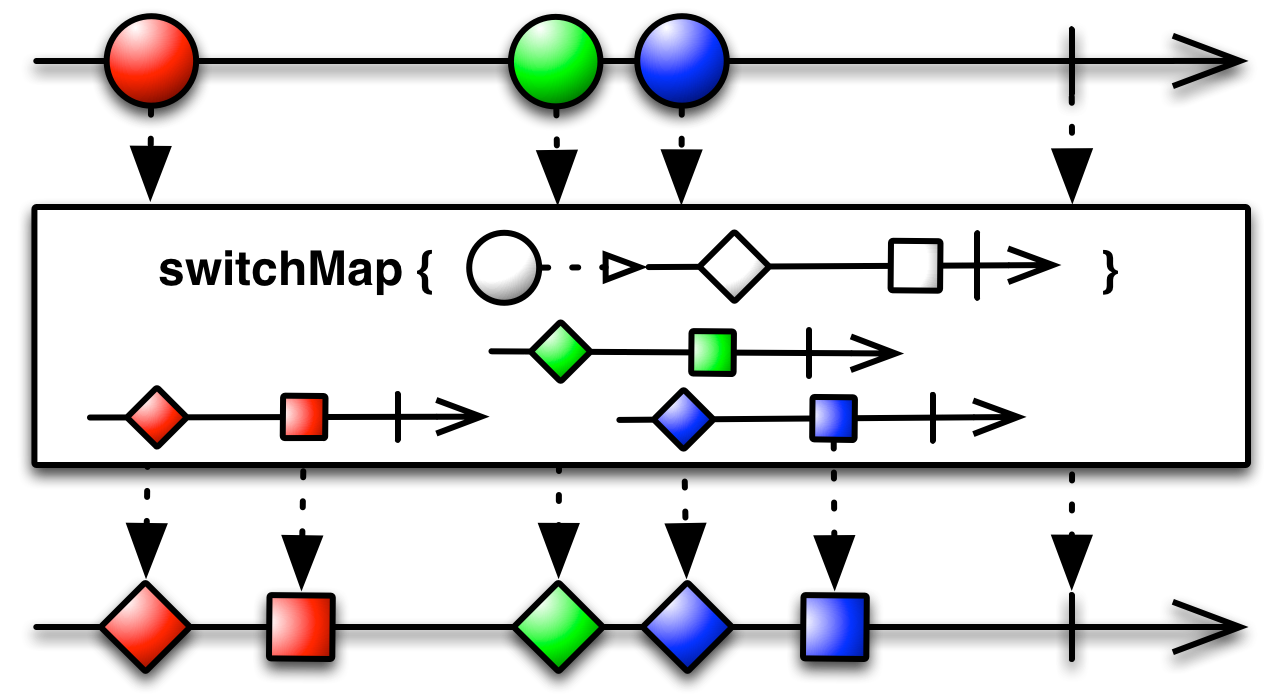
- Scheduler:
switchMapdoes not operate by default on a particularScheduler.
- Type Parameters:
R- the element type of the inner ObservableSources and the output- Parameters:
mapper- a function that, when applied to an item emitted by the source ObservableSource, returns an ObservableSource- Returns:
- an Observable that emits the items emitted by the ObservableSource returned from applying
functo the most recently emitted item emitted by the source ObservableSource - See Also:
- ReactiveX operators documentation: FlatMap,
switchMapDelayError(Function)
-
switchMap
@CheckReturnValue @SchedulerSupport(value="none") public final <R> Observable<R> switchMap(Function<? super T,? extends ObservableSource<? extends R>> mapper, int bufferSize)
Returns a new ObservableSource by applying a function that you supply to each item emitted by the source ObservableSource that returns an ObservableSource, and then emitting the items emitted by the most recently emitted of these ObservableSources.The resulting ObservableSource completes if both the upstream ObservableSource and the last inner ObservableSource, if any, complete. If the upstream ObservableSource signals an onError, the inner ObservableSource is disposed and the error delivered in-sequence.

- Scheduler:
switchMapdoes not operate by default on a particularScheduler.
- Type Parameters:
R- the element type of the inner ObservableSources and the output- Parameters:
mapper- a function that, when applied to an item emitted by the source ObservableSource, returns an ObservableSourcebufferSize- the number of elements to prefetch from the current active inner ObservableSource- Returns:
- an Observable that emits the items emitted by the ObservableSource returned from applying
functo the most recently emitted item emitted by the source ObservableSource - See Also:
- ReactiveX operators documentation: FlatMap,
switchMapDelayError(Function, int)
-
switchMapCompletable
@CheckReturnValue @SchedulerSupport(value="none") public final Completable switchMapCompletable(@NonNull Function<? super T,? extends CompletableSource> mapper)
Maps the upstream values intoCompletableSources, subscribes to the newer one while disposing the subscription to the previousCompletableSource, thus keeping at most one activeCompletableSourcerunning.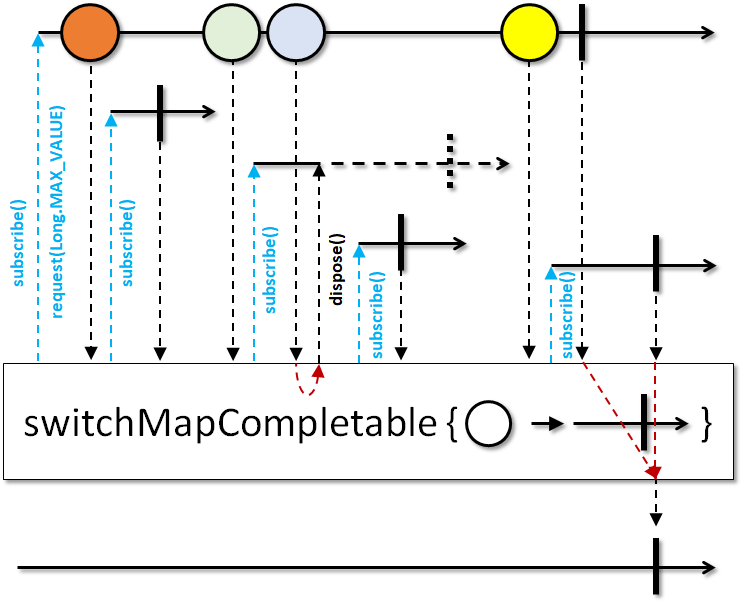
Since a
CompletableSourcedoesn't produce any items, the resulting reactive type of this operator is aCompletablethat can only indicate successful completion or a failure in any of the innerCompletableSources or the failure of the currentObservable.- Scheduler:
switchMapCompletabledoes not operate by default on a particularScheduler.- Error handling:
- If either this
Observableor the activeCompletableSourcesignals anonError, the resultingCompletableis terminated immediately with thatThrowable. Use theswitchMapCompletableDelayError(Function)to delay such inner failures until every innerCompletableSources and the mainObservableterminates in some fashion. If they fail concurrently, the operator may combine theThrowables into aCompositeExceptionand signal it to the downstream instead. If any inactivated (switched out)CompletableSourcesignals anonErrorlate, theThrowables will be signalled to the global error handler viaRxJavaPlugins.onError(Throwable)method asUndeliverableExceptionerrors.
History: 2.1.11 - experimental
- Parameters:
mapper- the function called with each upstream item and should return aCompletableSourceto be subscribed to and awaited for (non blockingly) for its terminal event- Returns:
- the new Completable instance
- Since:
- 2.2
- See Also:
switchMapCompletableDelayError(Function)
-
switchMapCompletableDelayError
@CheckReturnValue @SchedulerSupport(value="none") public final Completable switchMapCompletableDelayError(@NonNull Function<? super T,? extends CompletableSource> mapper)
Maps the upstream values intoCompletableSources, subscribes to the newer one while disposing the subscription to the previousCompletableSource, thus keeping at most one activeCompletableSourcerunning and delaying any main or inner errors until all of them terminate.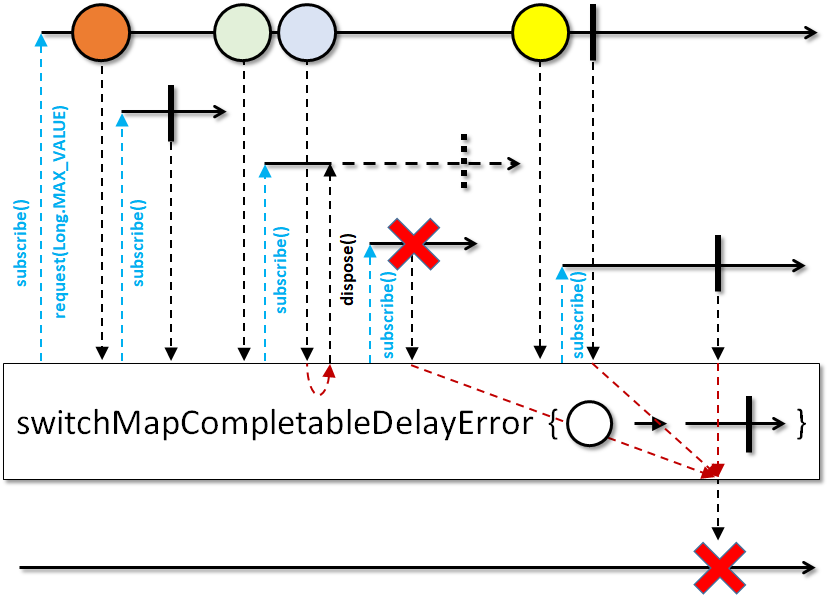
Since a
CompletableSourcedoesn't produce any items, the resulting reactive type of this operator is aCompletablethat can only indicate successful completion or a failure in any of the innerCompletableSources or the failure of the currentObservable.- Scheduler:
switchMapCompletableDelayErrordoes not operate by default on a particularScheduler.- Error handling:
- Errors of this
Observableand all theCompletableSources, who had the chance to run to their completion, are delayed until all of them terminate in some fashion. At this point, if there was only one failure, the respectiveThrowableis emitted to the downstream. It there were more than one failures, the operator combines allThrowables into aCompositeExceptionand signals that to the downstream. If any inactivated (switched out)CompletableSourcesignals anonErrorlate, theThrowables will be signalled to the global error handler viaRxJavaPlugins.onError(Throwable)method asUndeliverableExceptionerrors.
History: 2.1.11 - experimental
- Parameters:
mapper- the function called with each upstream item and should return aCompletableSourceto be subscribed to and awaited for (non blockingly) for its terminal event- Returns:
- the new Completable instance
- Since:
- 2.2
- See Also:
switchMapCompletable(Function)
-
switchMapMaybe
@CheckReturnValue @SchedulerSupport(value="none") public final <R> Observable<R> switchMapMaybe(@NonNull Function<? super T,? extends MaybeSource<? extends R>> mapper)
Maps the upstream items intoMaybeSources and switches (subscribes) to the newer ones while disposing the older ones (and ignoring their signals) and emits the latest success value of the current one if available while failing immediately if thisObservableor any of the active innerMaybeSources fail.
- Scheduler:
switchMapMaybedoes not operate by default on a particularScheduler.- Error handling:
- This operator terminates with an
onErrorif thisObservableor any of the innerMaybeSources fail while they are active. When this happens concurrently, their individualThrowableerrors may get combined and emitted as a singleCompositeException. Otherwise, a late (i.e., inactive or switched out)onErrorfrom thisObservableor from any of the innerMaybeSources will be forwarded to the global error handler viaRxJavaPlugins.onError(Throwable)asUndeliverableException
History: 2.1.11 - experimental
- Type Parameters:
R- the output value type- Parameters:
mapper- the function called with the current upstream event and should return aMaybeSourceto replace the current active inner source and get subscribed to.- Returns:
- the new Observable instance
- Since:
- 2.2
- See Also:
switchMapMaybeDelayError(Function)
-
switchMapMaybeDelayError
@CheckReturnValue @SchedulerSupport(value="none") public final <R> Observable<R> switchMapMaybeDelayError(@NonNull Function<? super T,? extends MaybeSource<? extends R>> mapper)
Maps the upstream items intoMaybeSources and switches (subscribes) to the newer ones while disposing the older ones (and ignoring their signals) and emits the latest success value of the current one if available, delaying errors from thisObservableor the innerMaybeSources until all terminate.
- Scheduler:
switchMapMaybeDelayErrordoes not operate by default on a particularScheduler.
History: 2.1.11 - experimental
- Type Parameters:
R- the output value type- Parameters:
mapper- the function called with the current upstream event and should return aMaybeSourceto replace the current active inner source and get subscribed to.- Returns:
- the new Observable instance
- Since:
- 2.2
- See Also:
switchMapMaybe(Function)
-
switchMapSingle
@CheckReturnValue @SchedulerSupport(value="none") @NonNull public final <R> Observable<R> switchMapSingle(@NonNull Function<? super T,? extends SingleSource<? extends R>> mapper)
Returns a new ObservableSource by applying a function that you supply to each item emitted by the source ObservableSource that returns a SingleSource, and then emitting the item emitted by the most recently emitted of these SingleSources.The resulting ObservableSource completes if both the upstream ObservableSource and the last inner SingleSource, if any, complete. If the upstream ObservableSource signals an onError, the inner SingleSource is disposed and the error delivered in-sequence.
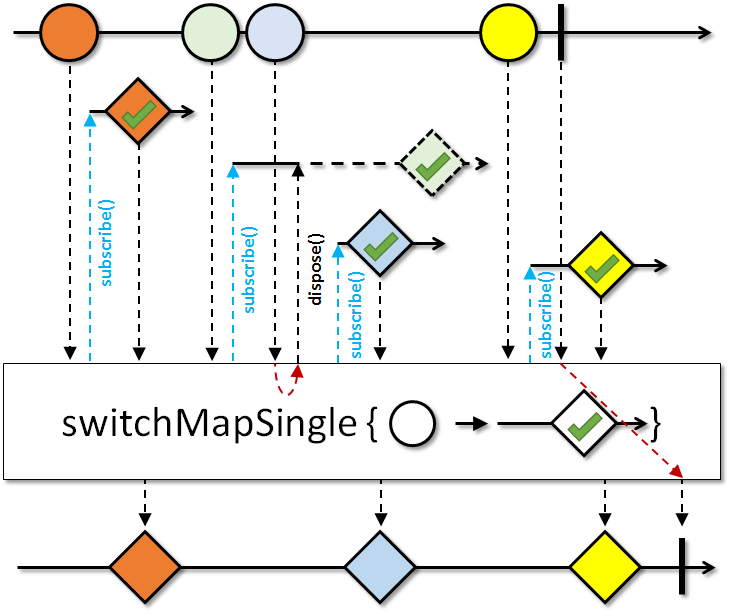
- Scheduler:
switchMapSingledoes not operate by default on a particularScheduler.
History: 2.0.8 - experimental
- Type Parameters:
R- the element type of the inner SingleSources and the output- Parameters:
mapper- a function that, when applied to an item emitted by the source ObservableSource, returns a SingleSource- Returns:
- an Observable that emits the item emitted by the SingleSource returned from applying
functo the most recently emitted item emitted by the source ObservableSource - Since:
- 2.2
- See Also:
- ReactiveX operators documentation: FlatMap,
switchMapSingleDelayError(Function)
-
switchMapSingleDelayError
@CheckReturnValue @SchedulerSupport(value="none") @NonNull public final <R> Observable<R> switchMapSingleDelayError(@NonNull Function<? super T,? extends SingleSource<? extends R>> mapper)
Returns a new ObservableSource by applying a function that you supply to each item emitted by the source ObservableSource that returns a SingleSource, and then emitting the item emitted by the most recently emitted of these SingleSources and delays any error until all SingleSources terminate.The resulting ObservableSource completes if both the upstream ObservableSource and the last inner SingleSource, if any, complete. If the upstream ObservableSource signals an onError, the termination of the last inner SingleSource will emit that error as is or wrapped into a CompositeException along with the other possible errors the former inner SingleSources signalled.
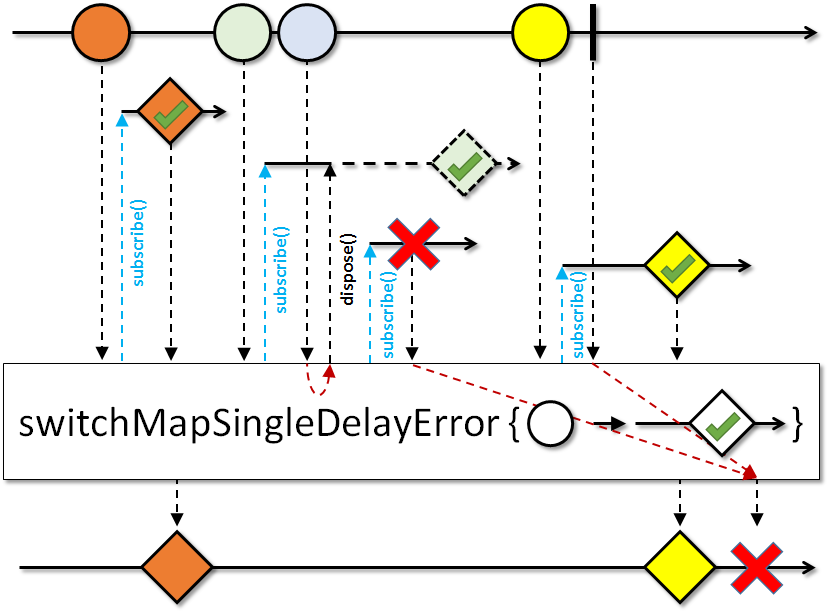
- Scheduler:
switchMapSingleDelayErrordoes not operate by default on a particularScheduler.
History: 2.0.8 - experimental
- Type Parameters:
R- the element type of the inner SingleSources and the output- Parameters:
mapper- a function that, when applied to an item emitted by the source ObservableSource, returns a SingleSource- Returns:
- an Observable that emits the item emitted by the SingleSource returned from applying
functo the most recently emitted item emitted by the source ObservableSource - Since:
- 2.2
- See Also:
- ReactiveX operators documentation: FlatMap,
switchMapSingle(Function)
-
switchMapDelayError
@CheckReturnValue @SchedulerSupport(value="none") public final <R> Observable<R> switchMapDelayError(Function<? super T,? extends ObservableSource<? extends R>> mapper)
Returns a new ObservableSource by applying a function that you supply to each item emitted by the source ObservableSource that returns an ObservableSource, and then emitting the items emitted by the most recently emitted of these ObservableSources and delays any error until all ObservableSources terminate.The resulting ObservableSource completes if both the upstream ObservableSource and the last inner ObservableSource, if any, complete. If the upstream ObservableSource signals an onError, the termination of the last inner ObservableSource will emit that error as is or wrapped into a CompositeException along with the other possible errors the former inner ObservableSources signalled.

- Scheduler:
switchMapDelayErrordoes not operate by default on a particularScheduler.
- Type Parameters:
R- the element type of the inner ObservableSources and the output- Parameters:
mapper- a function that, when applied to an item emitted by the source ObservableSource, returns an ObservableSource- Returns:
- an Observable that emits the items emitted by the ObservableSource returned from applying
functo the most recently emitted item emitted by the source ObservableSource - Since:
- 2.0
- See Also:
- ReactiveX operators documentation: FlatMap,
switchMap(Function)
-
switchMapDelayError
@CheckReturnValue @SchedulerSupport(value="none") public final <R> Observable<R> switchMapDelayError(Function<? super T,? extends ObservableSource<? extends R>> mapper, int bufferSize)
Returns a new ObservableSource by applying a function that you supply to each item emitted by the source ObservableSource that returns an ObservableSource, and then emitting the items emitted by the most recently emitted of these ObservableSources and delays any error until all ObservableSources terminate.The resulting ObservableSource completes if both the upstream ObservableSource and the last inner ObservableSource, if any, complete. If the upstream ObservableSource signals an onError, the termination of the last inner ObservableSource will emit that error as is or wrapped into a CompositeException along with the other possible errors the former inner ObservableSources signalled.

- Scheduler:
switchMapDelayErrordoes not operate by default on a particularScheduler.
- Type Parameters:
R- the element type of the inner ObservableSources and the output- Parameters:
mapper- a function that, when applied to an item emitted by the source ObservableSource, returns an ObservableSourcebufferSize- the number of elements to prefetch from the current active inner ObservableSource- Returns:
- an Observable that emits the items emitted by the ObservableSource returned from applying
functo the most recently emitted item emitted by the source ObservableSource - Since:
- 2.0
- See Also:
- ReactiveX operators documentation: FlatMap,
switchMap(Function, int)
-
take
@CheckReturnValue @SchedulerSupport(value="none") public final Observable<T> take(long count)
Returns an Observable that emits only the firstcountitems emitted by the source ObservableSource. If the source emits fewer thancountitems then all of its items are emitted.
This method returns an ObservableSource that will invoke a subscribing
Observer'sonNextfunction a maximum ofcounttimes before invokingonComplete.- Scheduler:
- This version of
takedoes not operate by default on a particularScheduler.
- Parameters:
count- the maximum number of items to emit- Returns:
- an Observable that emits only the first
countitems emitted by the source ObservableSource, or all of the items from the source ObservableSource if that ObservableSource emits fewer thancountitems - See Also:
- ReactiveX operators documentation: Take
-
take
@CheckReturnValue @SchedulerSupport(value="none") public final Observable<T> take(long time, TimeUnit unit)
Returns an Observable that emits those items emitted by source ObservableSource before a specified time runs out.If time runs out before the
Observablecompletes normally, theonCompleteevent will be signaled on the defaultcomputationScheduler.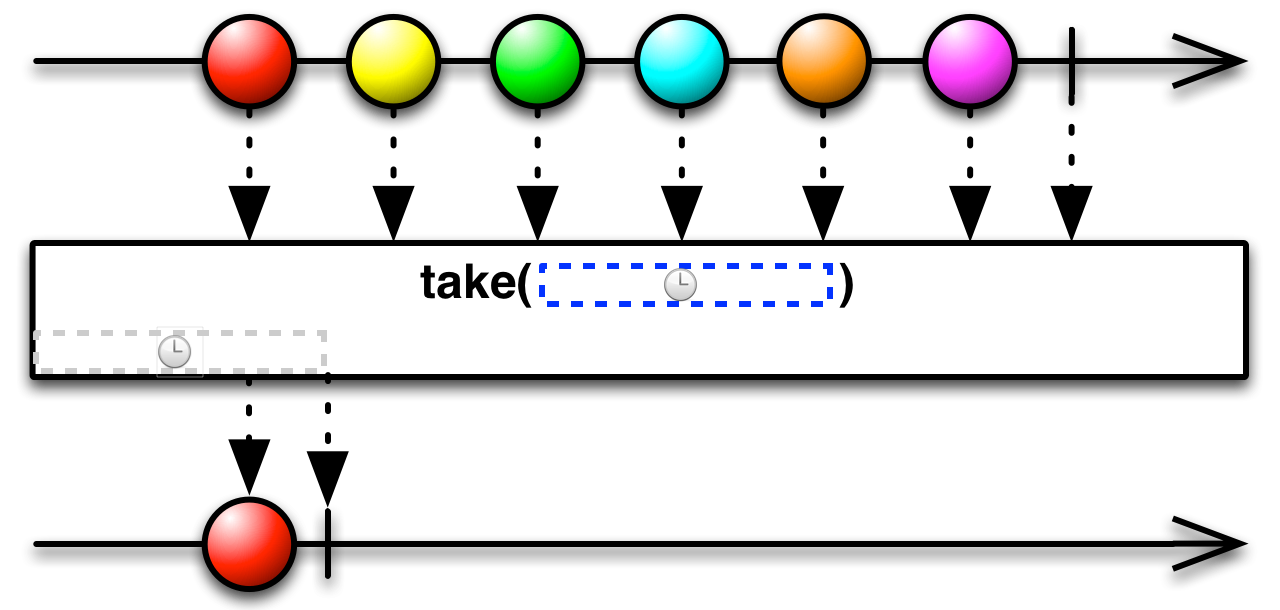
- Scheduler:
- This version of
takeoperates by default on thecomputationScheduler.
- Parameters:
time- the length of the time windowunit- the time unit oftime- Returns:
- an Observable that emits those items emitted by the source ObservableSource before the time runs out
- See Also:
- ReactiveX operators documentation: Take
-
take
@CheckReturnValue @SchedulerSupport(value="custom") public final Observable<T> take(long time, TimeUnit unit, Scheduler scheduler)
Returns an Observable that emits those items emitted by source ObservableSource before a specified time (on a specified Scheduler) runs out.If time runs out before the
Observablecompletes normally, theonCompleteevent will be signaled on the providedScheduler.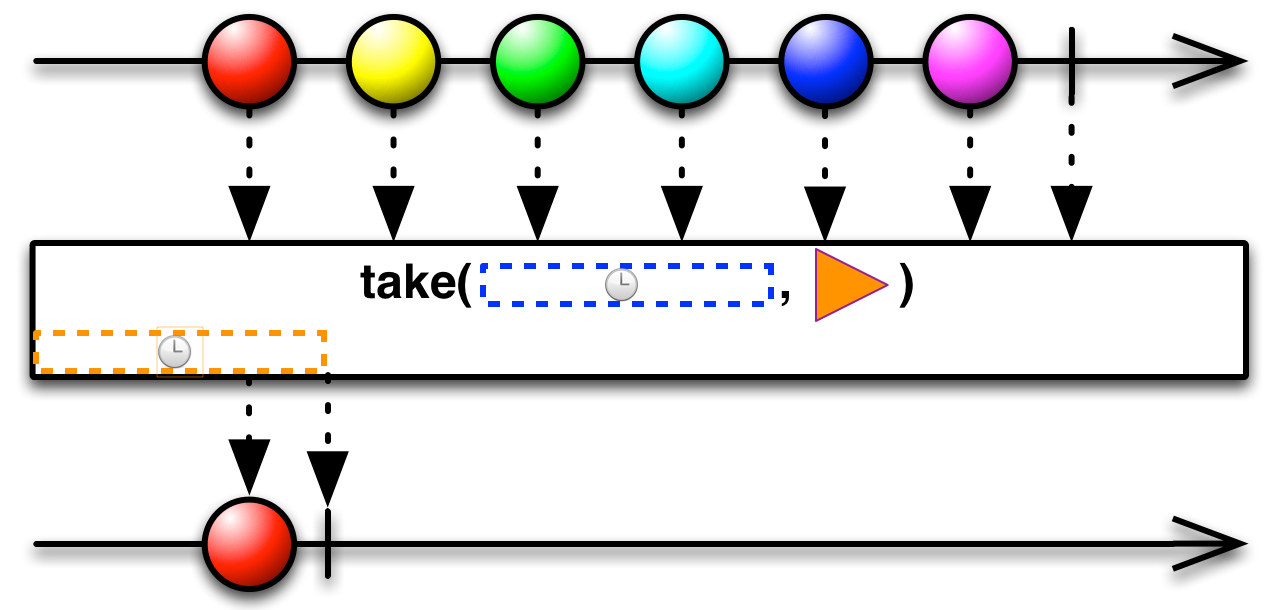
- Scheduler:
- You specify which
Schedulerthis operator will use.
- Parameters:
time- the length of the time windowunit- the time unit oftimescheduler- the Scheduler used for time source- Returns:
- an Observable that emits those items emitted by the source ObservableSource before the time runs out, according to the specified Scheduler
- See Also:
- ReactiveX operators documentation: Take
-
takeLast
@CheckReturnValue @SchedulerSupport(value="none") public final Observable<T> takeLast(int count)
Returns an Observable that emits at most the lastcountitems emitted by the source ObservableSource. If the source emits fewer thancountitems then all of its items are emitted.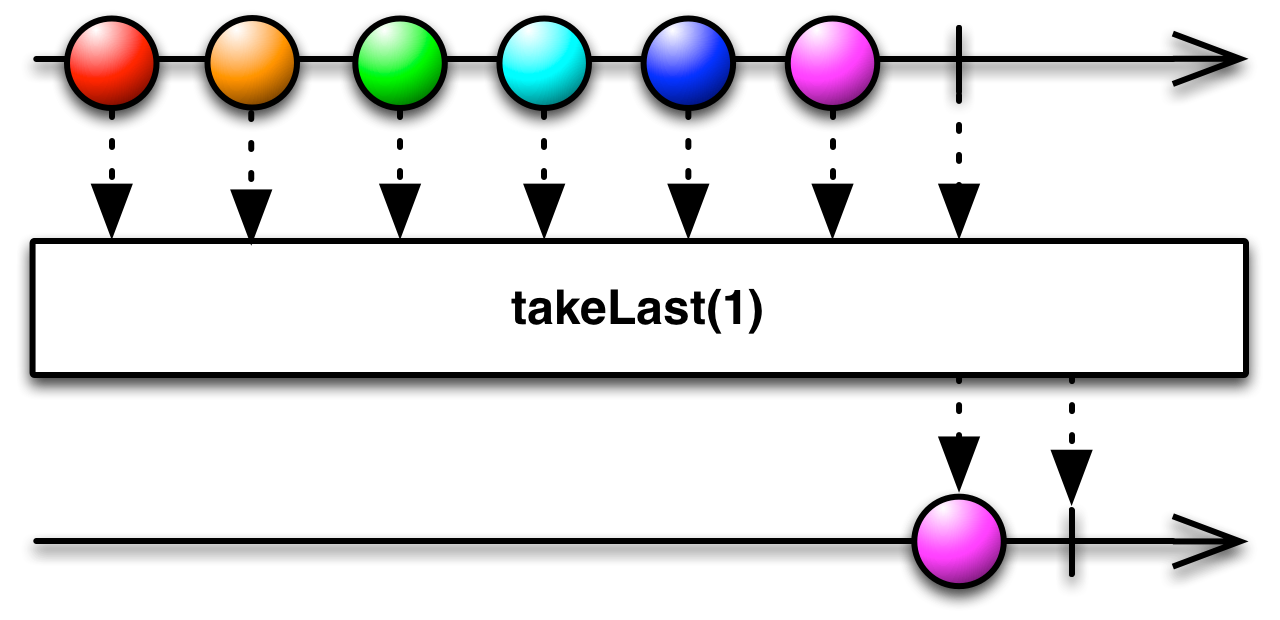
- Scheduler:
- This version of
takeLastdoes not operate by default on a particularScheduler.
- Parameters:
count- the maximum number of items to emit from the end of the sequence of items emitted by the source ObservableSource- Returns:
- an Observable that emits at most the last
countitems emitted by the source ObservableSource - Throws:
IndexOutOfBoundsException- ifcountis less than zero- See Also:
- ReactiveX operators documentation: TakeLast
-
takeLast
@CheckReturnValue @SchedulerSupport(value="io.reactivex:trampoline") public final Observable<T> takeLast(long count, long time, TimeUnit unit)
Returns an Observable that emits at most a specified number of items from the source ObservableSource that were emitted in a specified window of time before the ObservableSource completed.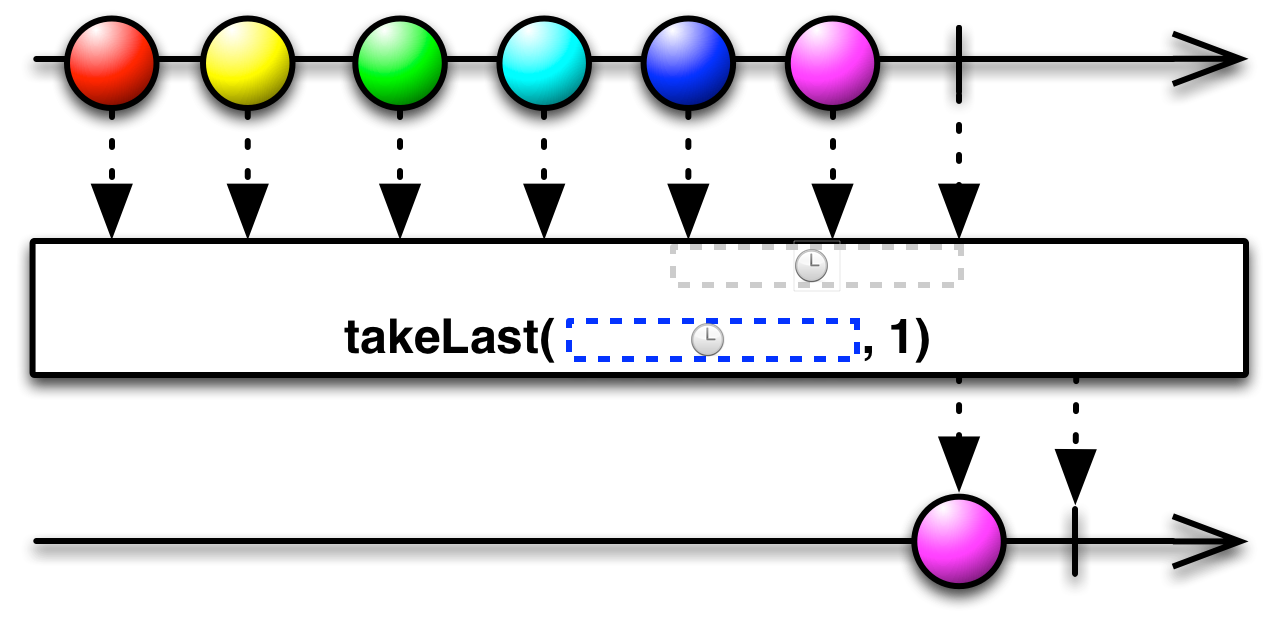
- Scheduler:
takeLastdoes not operate on any particular scheduler but uses the current time from thecomputationScheduler.
- Parameters:
count- the maximum number of items to emittime- the length of the time windowunit- the time unit oftime- Returns:
- an Observable that emits at most
countitems from the source ObservableSource that were emitted in a specified window of time before the ObservableSource completed - See Also:
- ReactiveX operators documentation: TakeLast
-
takeLast
@CheckReturnValue @SchedulerSupport(value="custom") public final Observable<T> takeLast(long count, long time, TimeUnit unit, Scheduler scheduler)
Returns an Observable that emits at most a specified number of items from the source ObservableSource that were emitted in a specified window of time before the ObservableSource completed, where the timing information is provided by a given Scheduler.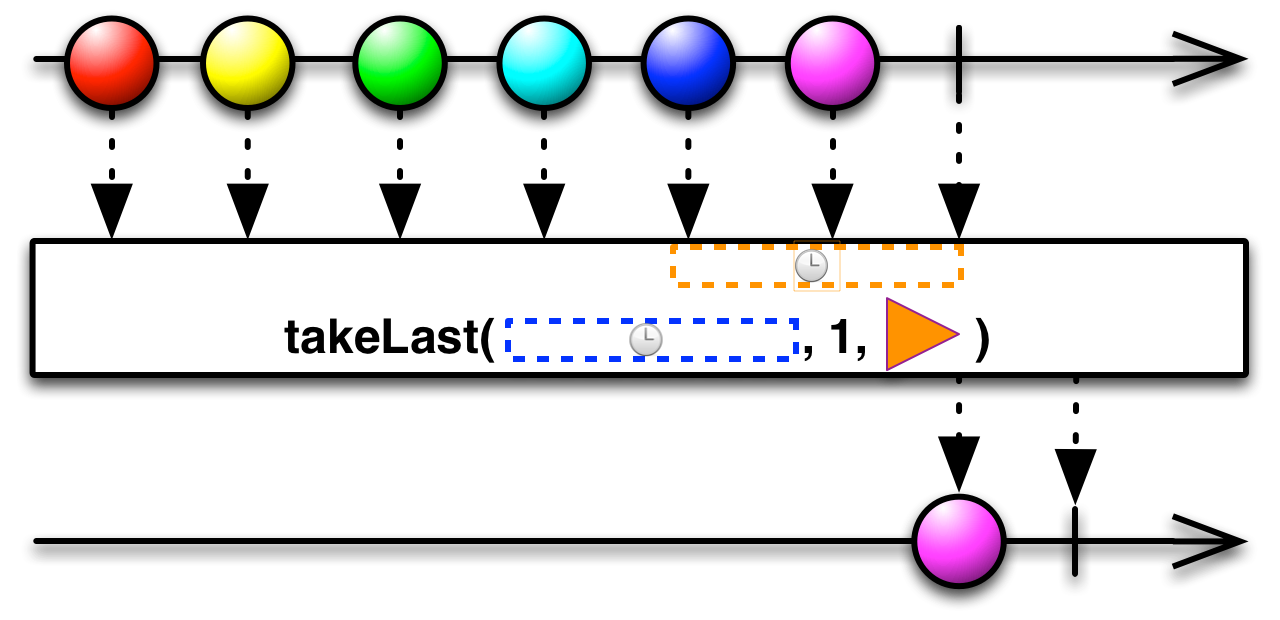
- Scheduler:
- You specify which
Schedulerthis operator will use for tracking the current time
- Parameters:
count- the maximum number of items to emittime- the length of the time windowunit- the time unit oftimescheduler- theSchedulerthat provides the timestamps for the observed items- Returns:
- an Observable that emits at most
countitems from the source ObservableSource that were emitted in a specified window of time before the ObservableSource completed, where the timing information is provided by the givenscheduler - Throws:
IndexOutOfBoundsException- ifcountis less than zero- See Also:
- ReactiveX operators documentation: TakeLast
-
takeLast
@CheckReturnValue @SchedulerSupport(value="custom") public final Observable<T> takeLast(long count, long time, TimeUnit unit, Scheduler scheduler, boolean delayError, int bufferSize)
Returns an Observable that emits at most a specified number of items from the source ObservableSource that were emitted in a specified window of time before the ObservableSource completed, where the timing information is provided by a given Scheduler.
- Scheduler:
- You specify which
Schedulerthis operator will use for tracking the current time
- Parameters:
count- the maximum number of items to emittime- the length of the time windowunit- the time unit oftimescheduler- theSchedulerthat provides the timestamps for the observed itemsdelayError- if true, an exception signalled by the current Observable is delayed until the regular elements are consumed by the downstream; if false, an exception is immediately signalled and all regular elements droppedbufferSize- the hint about how many elements to expect to be last- Returns:
- an Observable that emits at most
countitems from the source ObservableSource that were emitted in a specified window of time before the ObservableSource completed, where the timing information is provided by the givenscheduler - Throws:
IndexOutOfBoundsException- ifcountis less than zero- See Also:
- ReactiveX operators documentation: TakeLast
-
takeLast
@CheckReturnValue @SchedulerSupport(value="io.reactivex:trampoline") public final Observable<T> takeLast(long time, TimeUnit unit)
Returns an Observable that emits the items from the source ObservableSource that were emitted in a specified window of time before the ObservableSource completed.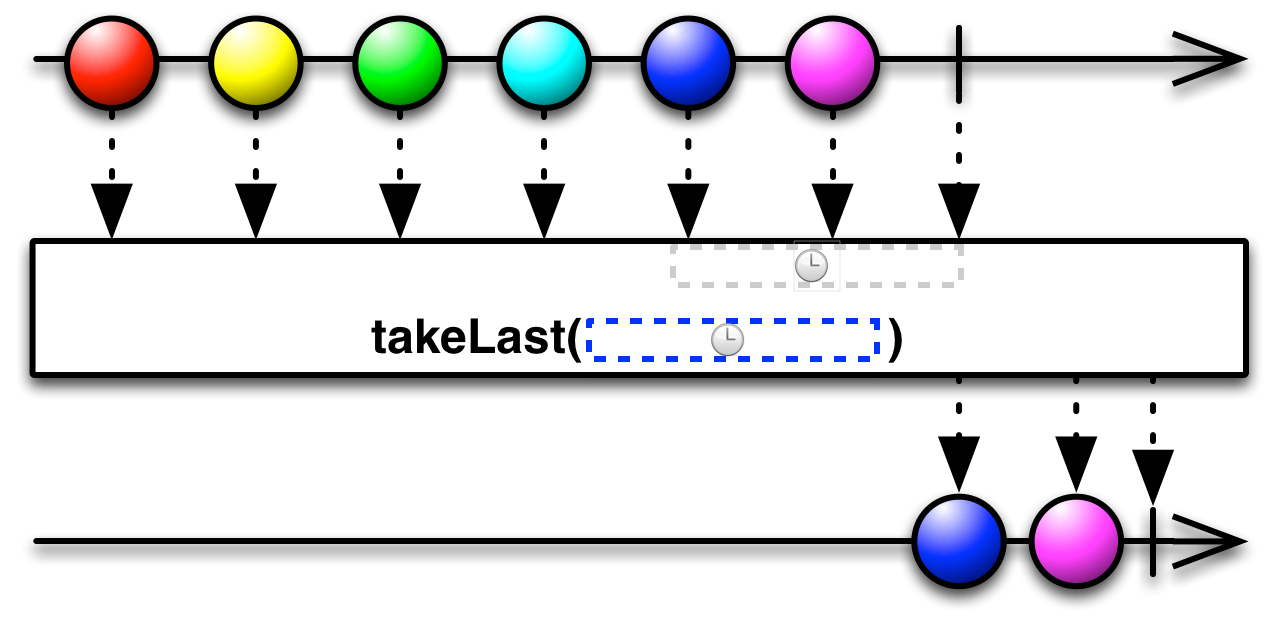
- Scheduler:
- This version of
takeLastoperates by default on thecomputationScheduler.
- Parameters:
time- the length of the time windowunit- the time unit oftime- Returns:
- an Observable that emits the items from the source ObservableSource that were emitted in the window of
time before the ObservableSource completed specified by
time - See Also:
- ReactiveX operators documentation: TakeLast
-
takeLast
@CheckReturnValue @SchedulerSupport(value="io.reactivex:trampoline") public final Observable<T> takeLast(long time, TimeUnit unit, boolean delayError)
Returns an Observable that emits the items from the source ObservableSource that were emitted in a specified window of time before the ObservableSource completed.
- Scheduler:
- This version of
takeLastoperates by default on thecomputationScheduler.
- Parameters:
time- the length of the time windowunit- the time unit oftimedelayError- if true, an exception signalled by the current Observable is delayed until the regular elements are consumed by the downstream; if false, an exception is immediately signalled and all regular elements dropped- Returns:
- an Observable that emits the items from the source ObservableSource that were emitted in the window of
time before the ObservableSource completed specified by
time - See Also:
- ReactiveX operators documentation: TakeLast
-
takeLast
@CheckReturnValue @SchedulerSupport(value="custom") public final Observable<T> takeLast(long time, TimeUnit unit, Scheduler scheduler)
Returns an Observable that emits the items from the source ObservableSource that were emitted in a specified window of time before the ObservableSource completed, where the timing information is provided by a specified Scheduler.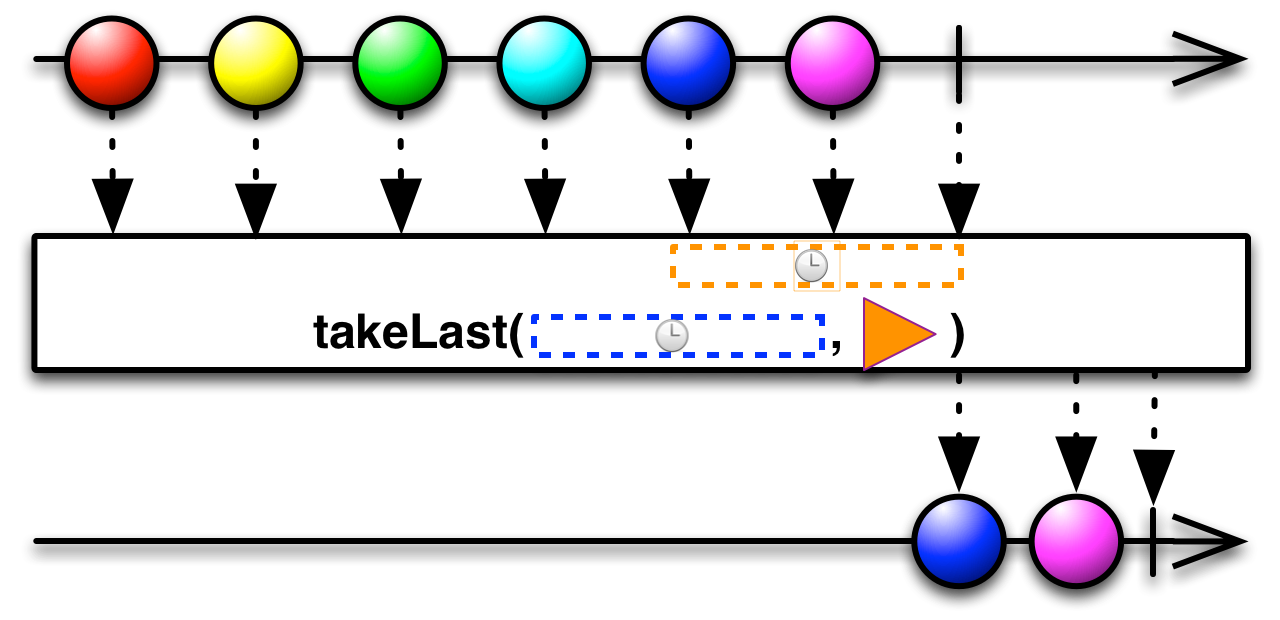
- Scheduler:
- You specify which
Schedulerthis operator will use.
- Parameters:
time- the length of the time windowunit- the time unit oftimescheduler- the Scheduler that provides the timestamps for the Observed items- Returns:
- an Observable that emits the items from the source ObservableSource that were emitted in the window of
time before the ObservableSource completed specified by
time, where the timing information is provided byscheduler - See Also:
- ReactiveX operators documentation: TakeLast
-
takeLast
@CheckReturnValue @SchedulerSupport(value="custom") public final Observable<T> takeLast(long time, TimeUnit unit, Scheduler scheduler, boolean delayError)
Returns an Observable that emits the items from the source ObservableSource that were emitted in a specified window of time before the ObservableSource completed, where the timing information is provided by a specified Scheduler.
- Scheduler:
- You specify which
Schedulerthis operator will use.
- Parameters:
time- the length of the time windowunit- the time unit oftimescheduler- the Scheduler that provides the timestamps for the Observed itemsdelayError- if true, an exception signalled by the current Observable is delayed until the regular elements are consumed by the downstream; if false, an exception is immediately signalled and all regular elements dropped- Returns:
- an Observable that emits the items from the source ObservableSource that were emitted in the window of
time before the ObservableSource completed specified by
time, where the timing information is provided byscheduler - See Also:
- ReactiveX operators documentation: TakeLast
-
takeLast
@CheckReturnValue @SchedulerSupport(value="custom") public final Observable<T> takeLast(long time, TimeUnit unit, Scheduler scheduler, boolean delayError, int bufferSize)
Returns an Observable that emits the items from the source ObservableSource that were emitted in a specified window of time before the ObservableSource completed, where the timing information is provided by a specified Scheduler.
- Scheduler:
- You specify which
Schedulerthis operator will use.
- Parameters:
time- the length of the time windowunit- the time unit oftimescheduler- the Scheduler that provides the timestamps for the Observed itemsdelayError- if true, an exception signalled by the current Observable is delayed until the regular elements are consumed by the downstream; if false, an exception is immediately signalled and all regular elements droppedbufferSize- the hint about how many elements to expect to be last- Returns:
- an Observable that emits the items from the source ObservableSource that were emitted in the window of
time before the ObservableSource completed specified by
time, where the timing information is provided byscheduler - See Also:
- ReactiveX operators documentation: TakeLast
-
takeUntil
@CheckReturnValue @SchedulerSupport(value="none") public final <U> Observable<T> takeUntil(ObservableSource<U> other)
Returns an Observable that emits the items emitted by the source Observable until a second ObservableSource emits an item.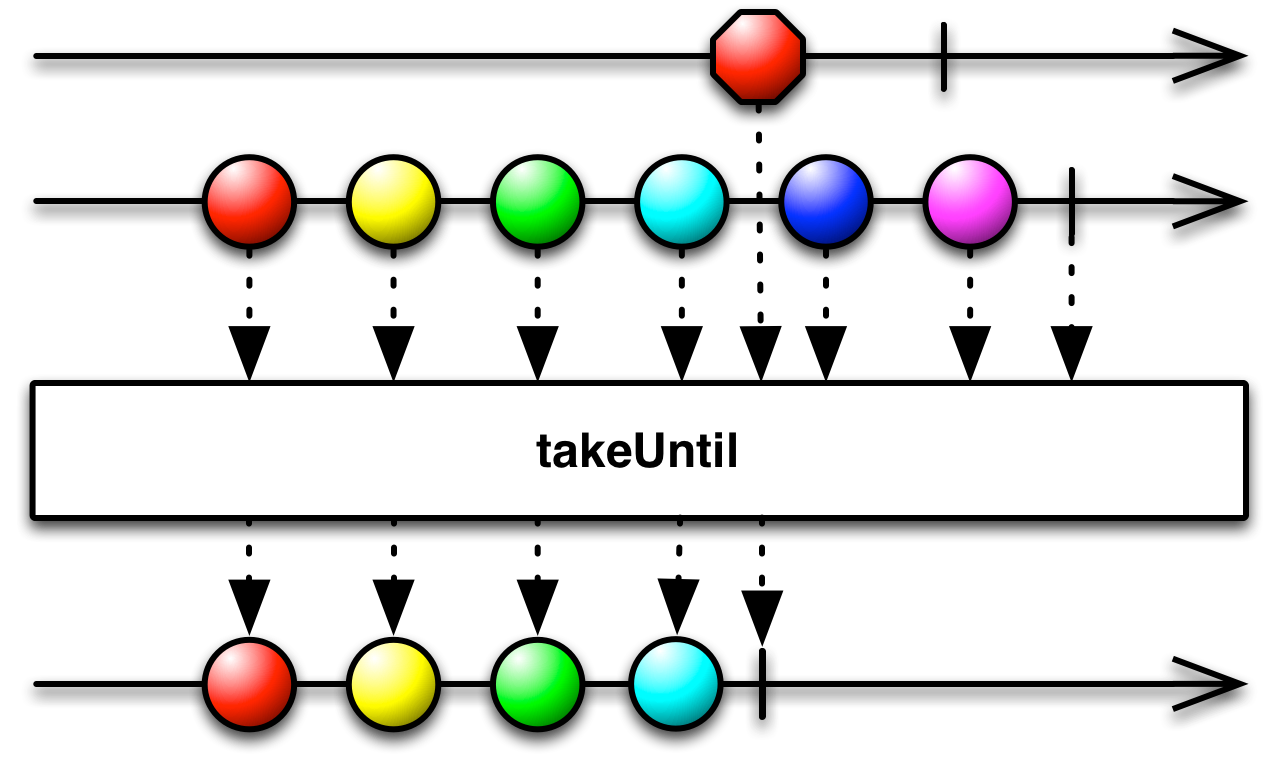
- Scheduler:
takeUntildoes not operate by default on a particularScheduler.
- Type Parameters:
U- the type of items emitted byother- Parameters:
other- the ObservableSource whose first emitted item will causetakeUntilto stop emitting items from the source Observable- Returns:
- an Observable that emits the items emitted by the source Observable until such time as
otheremits its first item - See Also:
- ReactiveX operators documentation: TakeUntil
-
takeUntil
@CheckReturnValue @SchedulerSupport(value="none") public final Observable<T> takeUntil(Predicate<? super T> stopPredicate)
Returns an Observable that emits items emitted by the source Observable, checks the specified predicate for each item, and then completes when the condition is satisfied.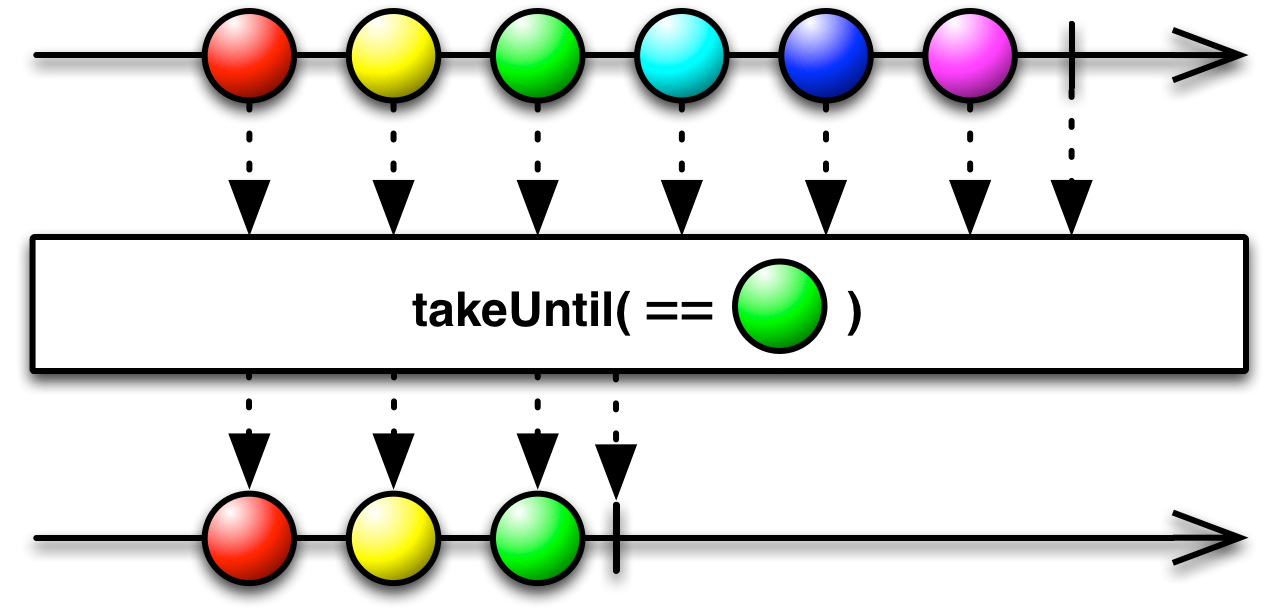
The difference between this operator and
takeWhile(Predicate)is that here, the condition is evaluated after the item is emitted.- Scheduler:
takeUntildoes not operate by default on a particularScheduler.
- Parameters:
stopPredicate- a function that evaluates an item emitted by the source Observable and returns a Boolean- Returns:
- an Observable that first emits items emitted by the source Observable, checks the specified condition after each item, and then completes when the condition is satisfied.
- Since:
- 1.1.0
- See Also:
- ReactiveX operators documentation: TakeUntil,
takeWhile(Predicate)
-
takeWhile
@CheckReturnValue @SchedulerSupport(value="none") public final Observable<T> takeWhile(Predicate<? super T> predicate)
Returns an Observable that emits items emitted by the source ObservableSource so long as each item satisfied a specified condition, and then completes as soon as this condition is not satisfied.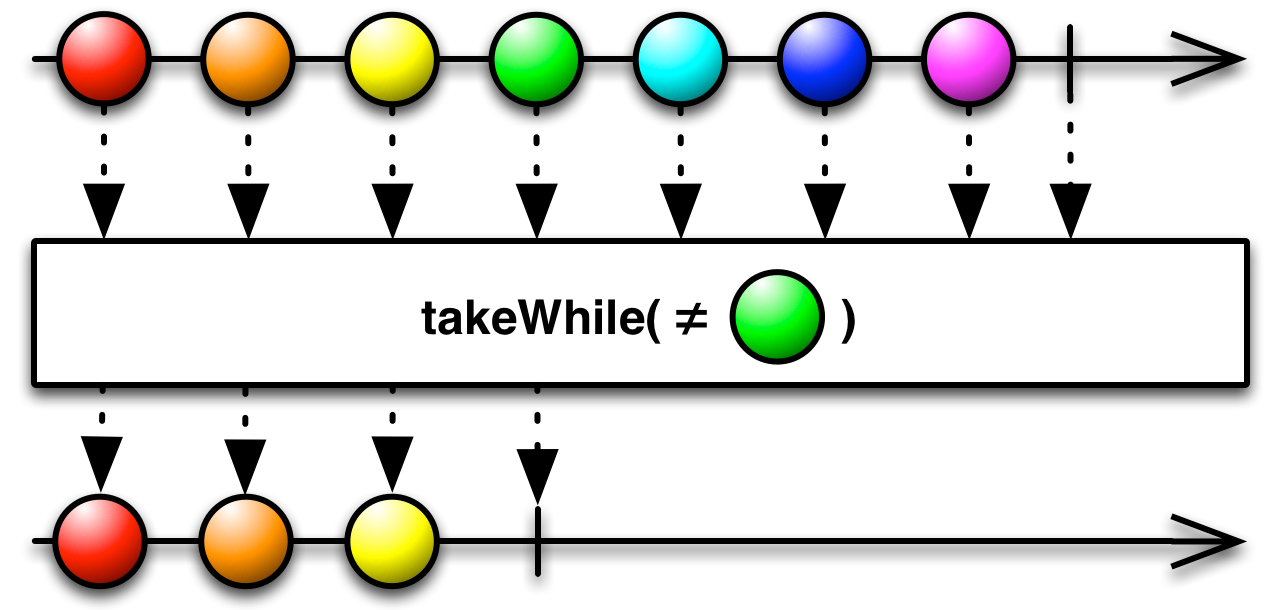
- Scheduler:
takeWhiledoes not operate by default on a particularScheduler.
- Parameters:
predicate- a function that evaluates an item emitted by the source ObservableSource and returns a Boolean- Returns:
- an Observable that emits the items from the source ObservableSource so long as each item satisfies the
condition defined by
predicate, then completes - See Also:
- ReactiveX operators documentation: TakeWhile,
takeUntil(Predicate)
-
throttleFirst
@CheckReturnValue @SchedulerSupport(value="io.reactivex:computation") public final Observable<T> throttleFirst(long windowDuration, TimeUnit unit)
Returns an Observable that emits only the first item emitted by the source ObservableSource during sequential time windows of a specified duration.This differs from
throttleLast(long, java.util.concurrent.TimeUnit)in that this only tracks passage of time whereasthrottleLast(long, java.util.concurrent.TimeUnit)ticks at scheduled intervals.
- Scheduler:
throttleFirstoperates by default on thecomputationScheduler.
- Parameters:
windowDuration- time to wait before emitting another item after emitting the last itemunit- the unit of time ofwindowDuration- Returns:
- an Observable that performs the throttle operation
- See Also:
- ReactiveX operators documentation: Sample
-
throttleFirst
@CheckReturnValue @SchedulerSupport(value="custom") public final Observable<T> throttleFirst(long skipDuration, TimeUnit unit, Scheduler scheduler)
Returns an Observable that emits only the first item emitted by the source ObservableSource during sequential time windows of a specified duration, where the windows are managed by a specified Scheduler.This differs from
throttleLast(long, java.util.concurrent.TimeUnit)in that this only tracks passage of time whereasthrottleLast(long, java.util.concurrent.TimeUnit)ticks at scheduled intervals.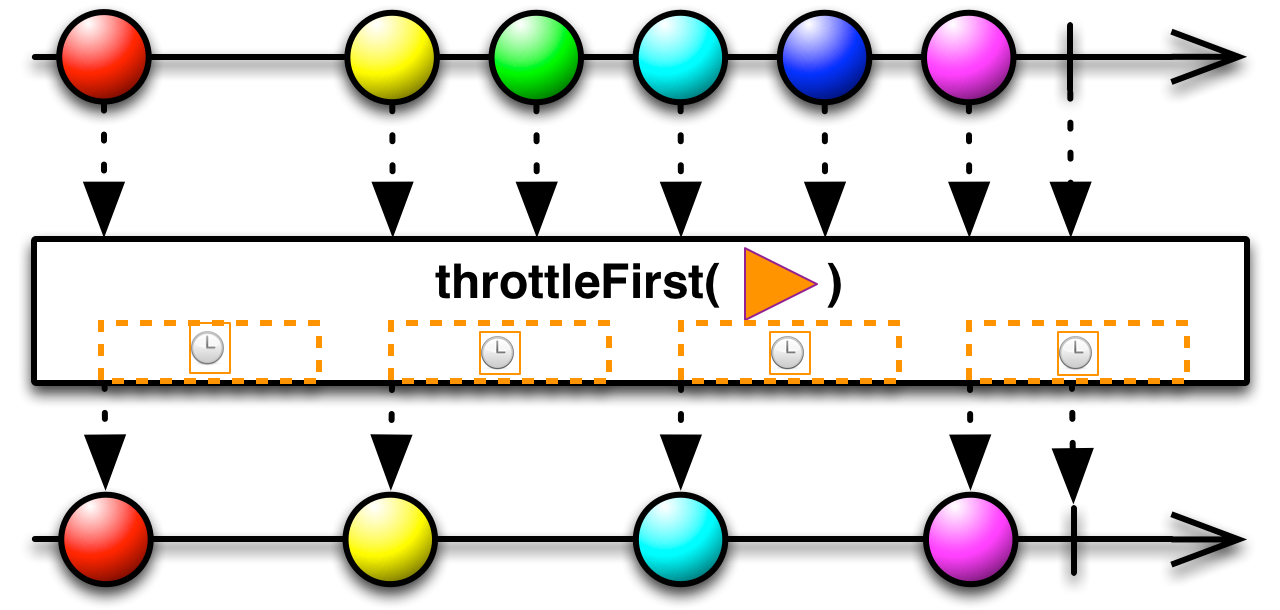
- Scheduler:
- You specify which
Schedulerthis operator will use.
- Parameters:
skipDuration- time to wait before emitting another item after emitting the last itemunit- the unit of time ofskipDurationscheduler- theSchedulerto use internally to manage the timers that handle timeout for each event- Returns:
- an Observable that performs the throttle operation
- See Also:
- ReactiveX operators documentation: Sample
-
throttleLast
@CheckReturnValue @SchedulerSupport(value="io.reactivex:computation") public final Observable<T> throttleLast(long intervalDuration, TimeUnit unit)
Returns an Observable that emits only the last item emitted by the source ObservableSource during sequential time windows of a specified duration.This differs from
throttleFirst(long, java.util.concurrent.TimeUnit)in that this ticks along at a scheduled interval whereasthrottleFirst(long, java.util.concurrent.TimeUnit)does not tick, it just tracks passage of time.
- Scheduler:
throttleLastoperates by default on thecomputationScheduler.
- Parameters:
intervalDuration- duration of windows within which the last item emitted by the source ObservableSource will be emittedunit- the unit of time ofintervalDuration- Returns:
- an Observable that performs the throttle operation
- See Also:
- ReactiveX operators documentation: Sample,
sample(long, TimeUnit)
-
throttleLast
@CheckReturnValue @SchedulerSupport(value="custom") public final Observable<T> throttleLast(long intervalDuration, TimeUnit unit, Scheduler scheduler)
Returns an Observable that emits only the last item emitted by the source ObservableSource during sequential time windows of a specified duration, where the duration is governed by a specified Scheduler.This differs from
throttleFirst(long, java.util.concurrent.TimeUnit)in that this ticks along at a scheduled interval whereasthrottleFirst(long, java.util.concurrent.TimeUnit)does not tick, it just tracks passage of time.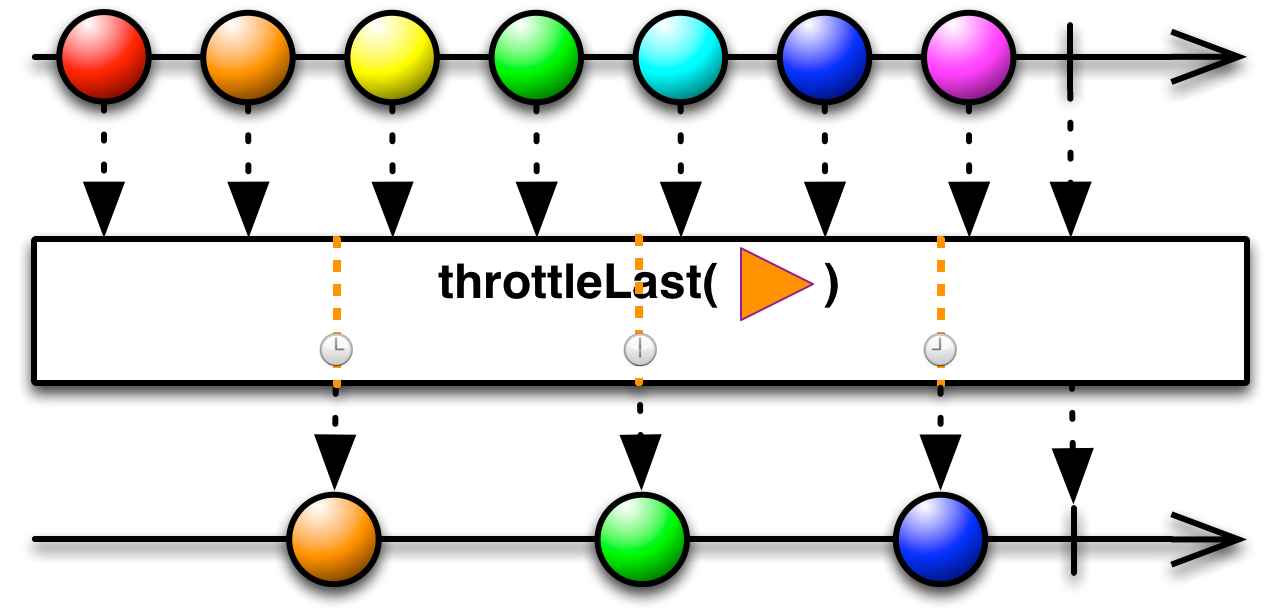
- Scheduler:
- You specify which
Schedulerthis operator will use.
- Parameters:
intervalDuration- duration of windows within which the last item emitted by the source ObservableSource will be emittedunit- the unit of time ofintervalDurationscheduler- theSchedulerto use internally to manage the timers that handle timeout for each event- Returns:
- an Observable that performs the throttle operation
- See Also:
- ReactiveX operators documentation: Sample,
sample(long, TimeUnit, Scheduler)
-
throttleLatest
@CheckReturnValue @SchedulerSupport(value="io.reactivex:computation") public final Observable<T> throttleLatest(long timeout, TimeUnit unit)
Throttles items from the upstreamObservableby first emitting the next item from upstream, then periodically emitting the latest item (if any) when the specified timeout elapses between them.
Unlike the option with
throttleLatest(long, TimeUnit, boolean), the very last item being held back (if any) is not emitted when the upstream completes.If no items were emitted from the upstream during this timeout phase, the next upstream item is emitted immediately and the timeout window starts from then.
- Scheduler:
throttleLatestoperates by default on thecomputationScheduler.
History: 2.1.14 - experimental
- Parameters:
timeout- the time to wait after an item emission towards the downstream before trying to emit the latest item from upstream againunit- the time unit- Returns:
- the new Observable instance
- Since:
- 2.2
- See Also:
throttleLatest(long, TimeUnit, boolean),throttleLatest(long, TimeUnit, Scheduler)
-
throttleLatest
@CheckReturnValue @SchedulerSupport(value="io.reactivex:computation") public final Observable<T> throttleLatest(long timeout, TimeUnit unit, boolean emitLast)
Throttles items from the upstreamObservableby first emitting the next item from upstream, then periodically emitting the latest item (if any) when the specified timeout elapses between them.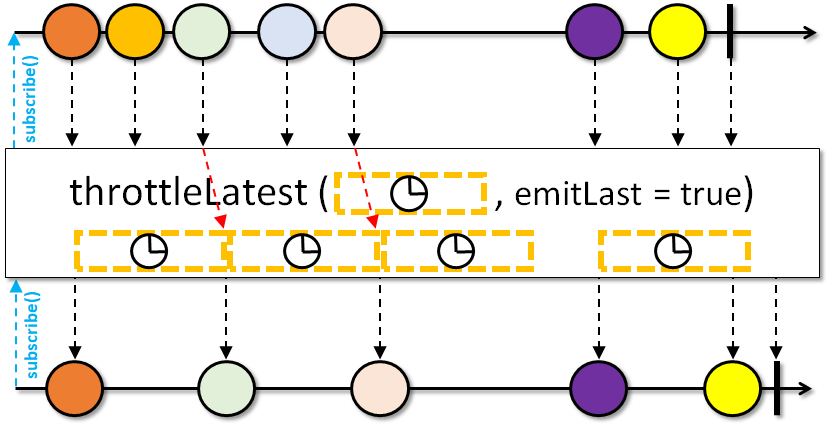
If no items were emitted from the upstream during this timeout phase, the next upstream item is emitted immediately and the timeout window starts from then.
- Scheduler:
throttleLatestoperates by default on thecomputationScheduler.
History: 2.1.14 - experimental
- Parameters:
timeout- the time to wait after an item emission towards the downstream before trying to emit the latest item from upstream againunit- the time unitemitLast- Iftrue, the very last item from the upstream will be emitted immediately when the upstream completes, regardless if there is a timeout window active or not. Iffalse, the very last upstream item is ignored and the flow terminates.- Returns:
- the new Observable instance
- Since:
- 2.2
- See Also:
throttleLatest(long, TimeUnit, Scheduler, boolean)
-
throttleLatest
@CheckReturnValue @SchedulerSupport(value="custom") public final Observable<T> throttleLatest(long timeout, TimeUnit unit, Scheduler scheduler)
Throttles items from the upstreamObservableby first emitting the next item from upstream, then periodically emitting the latest item (if any) when the specified timeout elapses between them.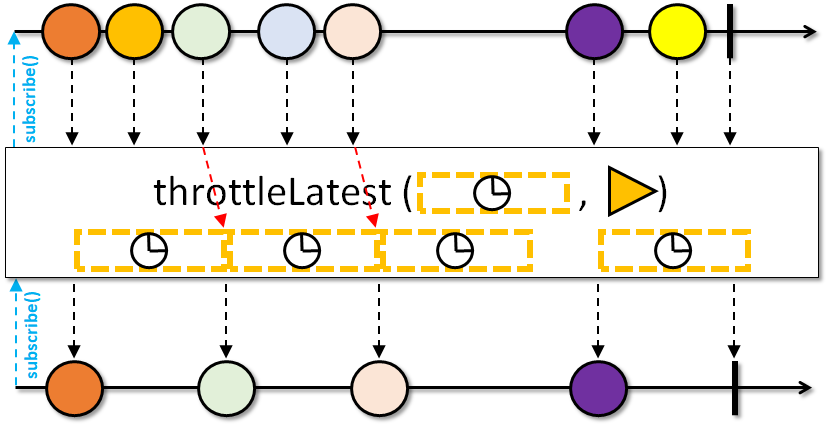
Unlike the option with
throttleLatest(long, TimeUnit, Scheduler, boolean), the very last item being held back (if any) is not emitted when the upstream completes.If no items were emitted from the upstream during this timeout phase, the next upstream item is emitted immediately and the timeout window starts from then.
- Scheduler:
- You specify which
Schedulerthis operator will use.
History: 2.1.14 - experimental
- Parameters:
timeout- the time to wait after an item emission towards the downstream before trying to emit the latest item from upstream againunit- the time unitscheduler- theSchedulerwhere the timed wait and latest item emission will be performed- Returns:
- the new Observable instance
- Since:
- 2.2
- See Also:
throttleLatest(long, TimeUnit, Scheduler, boolean)
-
throttleLatest
@CheckReturnValue @SchedulerSupport(value="custom") public final Observable<T> throttleLatest(long timeout, TimeUnit unit, Scheduler scheduler, boolean emitLast)
Throttles items from the upstreamObservableby first emitting the next item from upstream, then periodically emitting the latest item (if any) when the specified timeout elapses between them.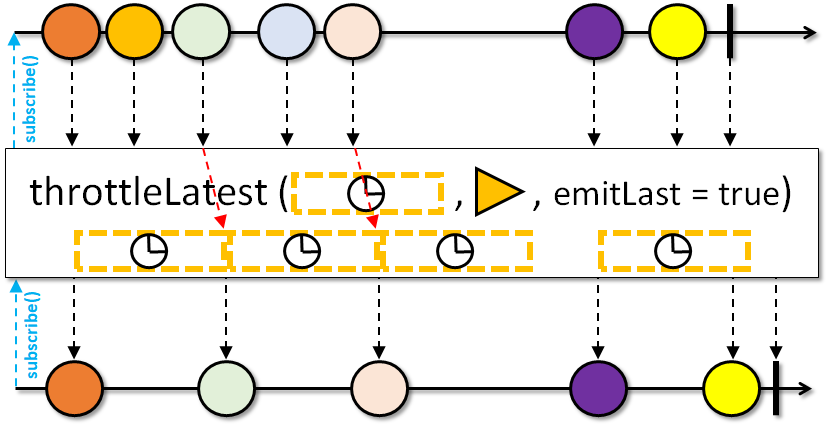
If no items were emitted from the upstream during this timeout phase, the next upstream item is emitted immediately and the timeout window starts from then.
- Scheduler:
- You specify which
Schedulerthis operator will use.
History: 2.1.14 - experimental
- Parameters:
timeout- the time to wait after an item emission towards the downstream before trying to emit the latest item from upstream againunit- the time unitscheduler- theSchedulerwhere the timed wait and latest item emission will be performedemitLast- Iftrue, the very last item from the upstream will be emitted immediately when the upstream completes, regardless if there is a timeout window active or not. Iffalse, the very last upstream item is ignored and the flow terminates.- Returns:
- the new Observable instance
- Since:
- 2.2
-
throttleWithTimeout
@CheckReturnValue @SchedulerSupport(value="io.reactivex:computation") public final Observable<T> throttleWithTimeout(long timeout, TimeUnit unit)
Returns an Observable that mirrors the source ObservableSource, except that it drops items emitted by the source ObservableSource that are followed by newer items before a timeout value expires. The timer resets on each emission (alias todebounce(long, TimeUnit, Scheduler)).Note: If items keep being emitted by the source ObservableSource faster than the timeout then no items will be emitted by the resulting ObservableSource.
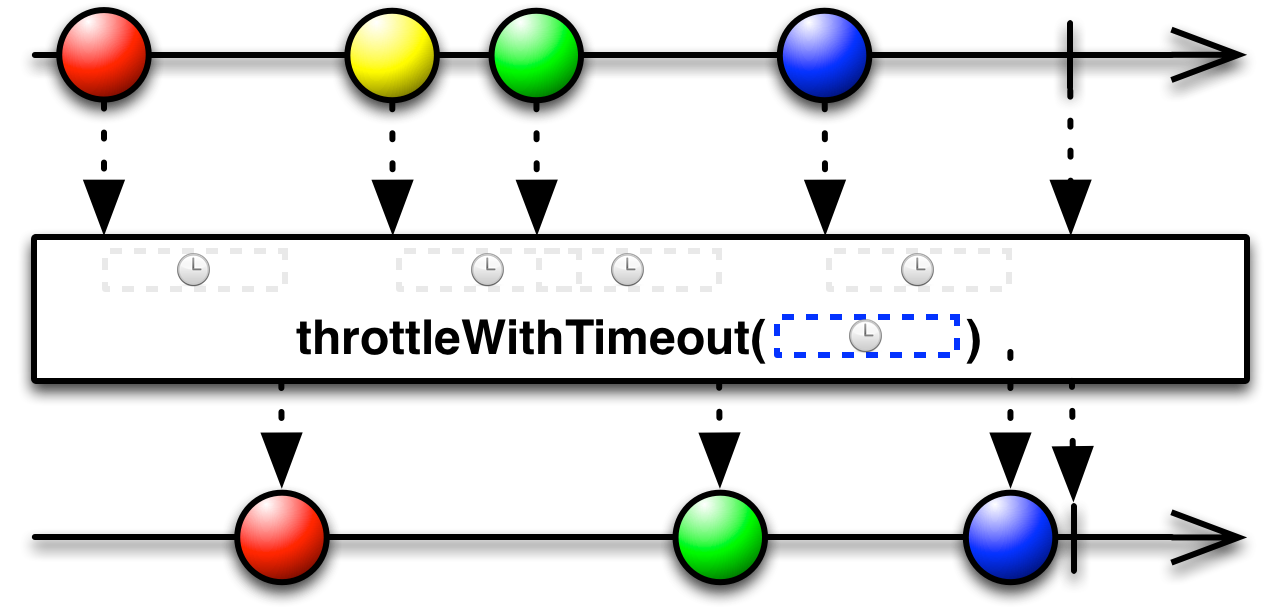
- Scheduler:
throttleWithTimeoutoperates by default on thecomputationScheduler.
- Parameters:
timeout- the length of the window of time that must pass after the emission of an item from the source ObservableSource in which that ObservableSource emits no items in order for the item to be emitted by the resulting ObservableSourceunit- the unit of time for the specifiedtimeout- Returns:
- an Observable that filters out items from the source ObservableSource that are too quickly followed by newer items
- See Also:
- ReactiveX operators documentation: Debounce,
debounce(long, TimeUnit)
-
throttleWithTimeout
@CheckReturnValue @SchedulerSupport(value="custom") public final Observable<T> throttleWithTimeout(long timeout, TimeUnit unit, Scheduler scheduler)
Returns an Observable that mirrors the source ObservableSource, except that it drops items emitted by the source ObservableSource that are followed by newer items before a timeout value expires on a specified Scheduler. The timer resets on each emission (Alias todebounce(long, TimeUnit, Scheduler)).Note: If items keep being emitted by the source ObservableSource faster than the timeout then no items will be emitted by the resulting ObservableSource.
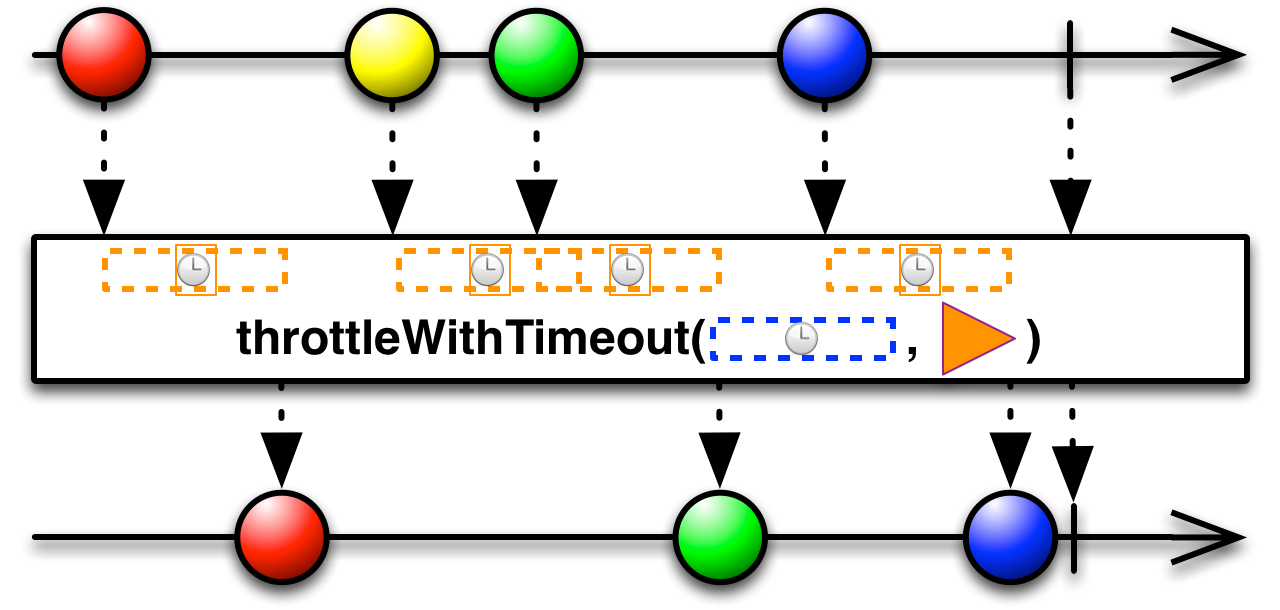
- Scheduler:
- You specify which
Schedulerthis operator will use.
- Parameters:
timeout- the length of the window of time that must pass after the emission of an item from the source ObservableSource in which that ObservableSource emits no items in order for the item to be emitted by the resulting ObservableSourceunit- the unit of time for the specifiedtimeoutscheduler- theSchedulerto use internally to manage the timers that handle the timeout for each item- Returns:
- an Observable that filters out items from the source ObservableSource that are too quickly followed by newer items
- See Also:
- ReactiveX operators documentation: Debounce,
debounce(long, TimeUnit, Scheduler)
-
timeInterval
@CheckReturnValue @SchedulerSupport(value="none") public final Observable<Timed<T>> timeInterval()
Returns an Observable that emits records of the time interval between consecutive items emitted by the source ObservableSource.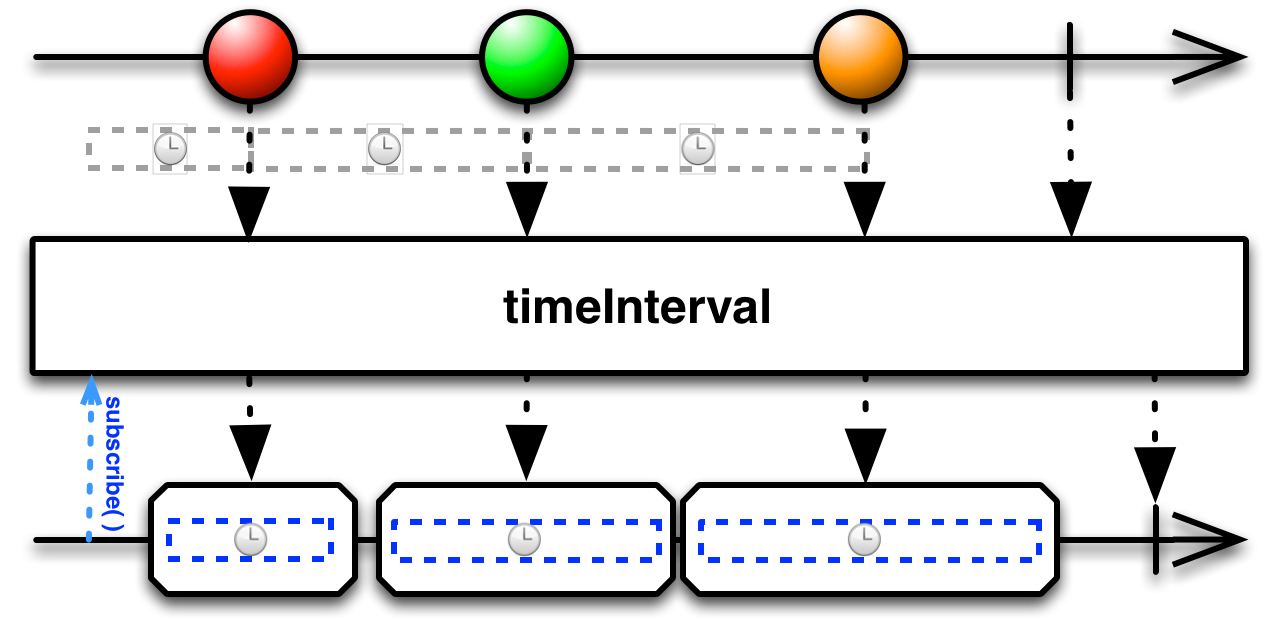
- Scheduler:
timeIntervaldoes not operate on any particular scheduler but uses the current time from thecomputationScheduler.
- Returns:
- an Observable that emits time interval information items
- See Also:
- ReactiveX operators documentation: TimeInterval
-
timeInterval
@CheckReturnValue @SchedulerSupport(value="none") public final Observable<Timed<T>> timeInterval(Scheduler scheduler)
Returns an Observable that emits records of the time interval between consecutive items emitted by the source ObservableSource, where this interval is computed on a specified Scheduler.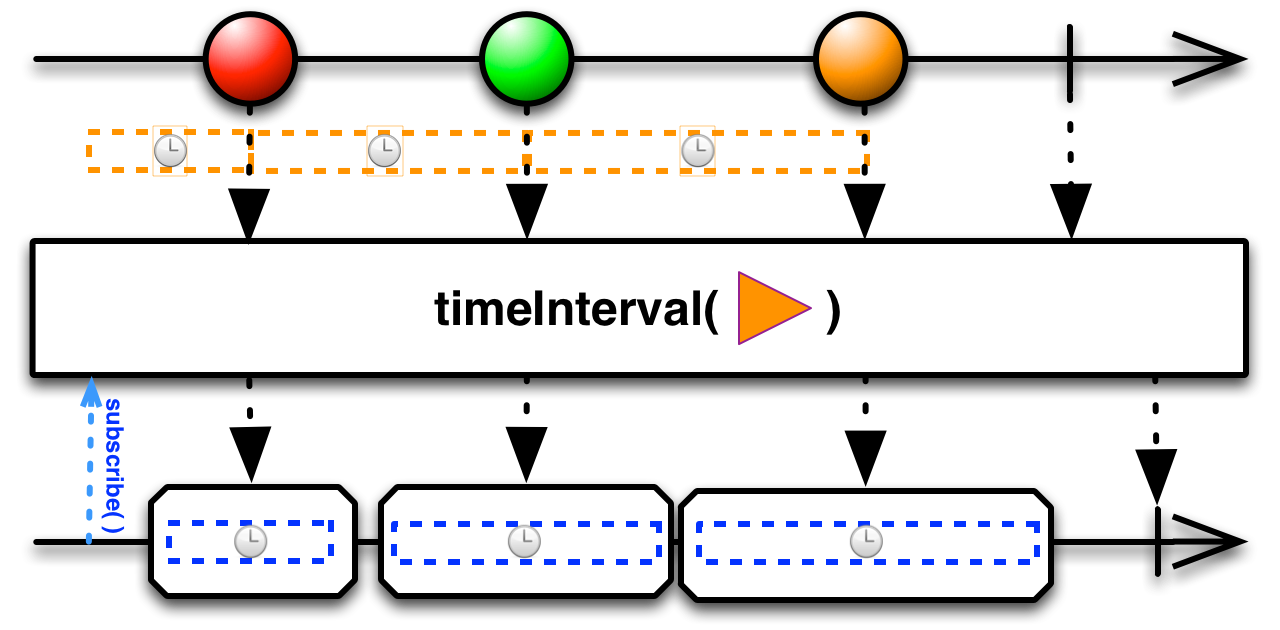
- Scheduler:
- The operator does not operate on any particular scheduler but uses the current time
from the specified
Scheduler.
- Parameters:
scheduler- theSchedulerused to compute time intervals- Returns:
- an Observable that emits time interval information items
- See Also:
- ReactiveX operators documentation: TimeInterval
-
timeInterval
@CheckReturnValue @SchedulerSupport(value="none") public final Observable<Timed<T>> timeInterval(TimeUnit unit)
Returns an Observable that emits records of the time interval between consecutive items emitted by the source ObservableSource.
- Scheduler:
timeIntervaldoes not operate on any particular scheduler but uses the current time from thecomputationScheduler.
- Parameters:
unit- the time unit for the current time- Returns:
- an Observable that emits time interval information items
- See Also:
- ReactiveX operators documentation: TimeInterval
-
timeInterval
@CheckReturnValue @SchedulerSupport(value="none") public final Observable<Timed<T>> timeInterval(TimeUnit unit, Scheduler scheduler)
Returns an Observable that emits records of the time interval between consecutive items emitted by the source ObservableSource, where this interval is computed on a specified Scheduler.
- Scheduler:
- The operator does not operate on any particular scheduler but uses the current time
from the specified
Scheduler.
- Parameters:
unit- the time unit for the current timescheduler- theSchedulerused to compute time intervals- Returns:
- an Observable that emits time interval information items
- See Also:
- ReactiveX operators documentation: TimeInterval
-
timeout
@CheckReturnValue @SchedulerSupport(value="none") public final <V> Observable<T> timeout(Function<? super T,? extends ObservableSource<V>> itemTimeoutIndicator)
Returns an Observable that mirrors the source ObservableSource, but notifies observers of aTimeoutExceptionif an item emitted by the source ObservableSource doesn't arrive within a window of time after the emission of the previous item, where that period of time is measured by an ObservableSource that is a function of the previous item.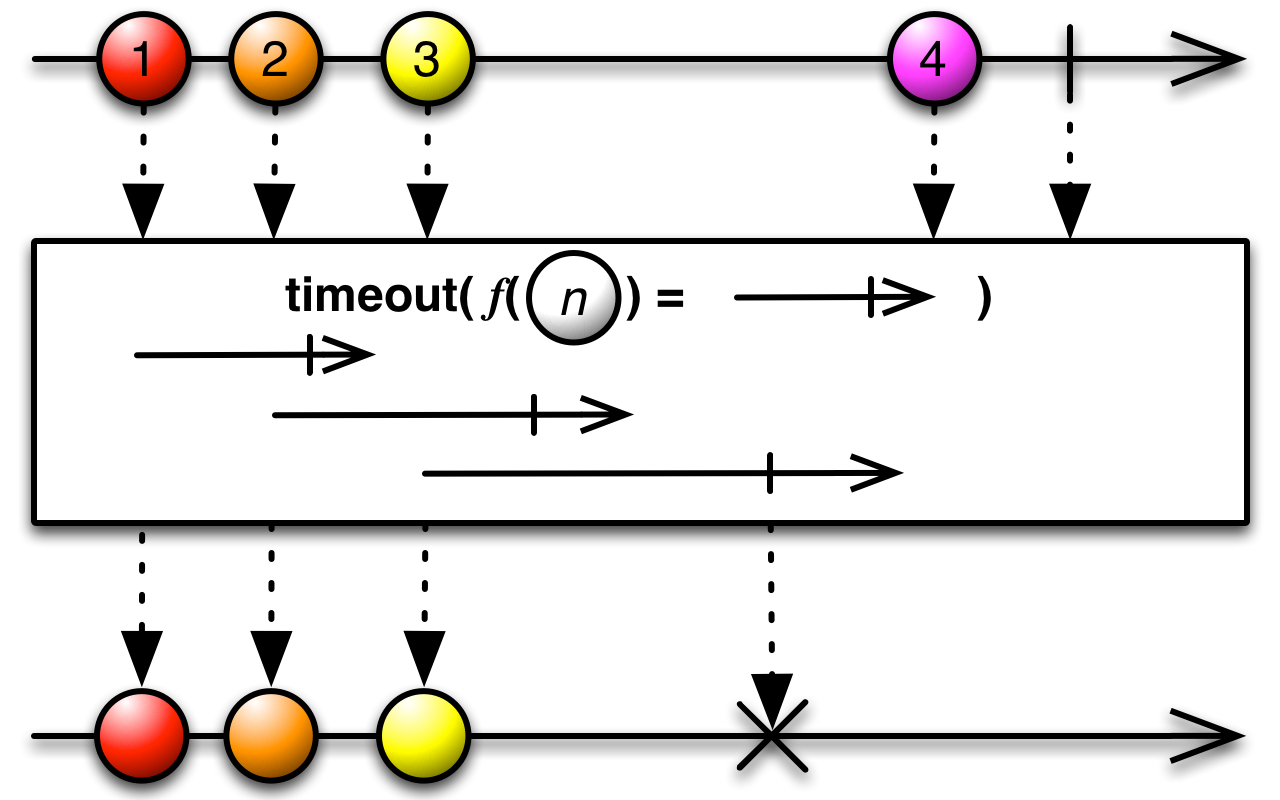
Note: The arrival of the first source item is never timed out.
- Scheduler:
- This version of
timeoutoperates by default on theimmediateScheduler.
- Type Parameters:
V- the timeout value type (ignored)- Parameters:
itemTimeoutIndicator- a function that returns an ObservableSource for each item emitted by the source ObservableSource and that determines the timeout window for the subsequent item- Returns:
- an Observable that mirrors the source ObservableSource, but notifies observers of a
TimeoutExceptionif an item emitted by the source ObservableSource takes longer to arrive than the time window defined by the selector for the previously emitted item - See Also:
- ReactiveX operators documentation: Timeout
-
timeout
@CheckReturnValue @SchedulerSupport(value="none") public final <V> Observable<T> timeout(Function<? super T,? extends ObservableSource<V>> itemTimeoutIndicator, ObservableSource<? extends T> other)
Returns an Observable that mirrors the source ObservableSource, but that switches to a fallback ObservableSource if an item emitted by the source ObservableSource doesn't arrive within a window of time after the emission of the previous item, where that period of time is measured by an ObservableSource that is a function of the previous item.
Note: The arrival of the first source item is never timed out.
- Scheduler:
- This version of
timeoutoperates by default on theimmediateScheduler.
- Type Parameters:
V- the timeout value type (ignored)- Parameters:
itemTimeoutIndicator- a function that returns an ObservableSource, for each item emitted by the source ObservableSource, that determines the timeout window for the subsequent itemother- the fallback ObservableSource to switch to if the source ObservableSource times out- Returns:
- an Observable that mirrors the source ObservableSource, but switches to mirroring a fallback ObservableSource if an item emitted by the source ObservableSource takes longer to arrive than the time window defined by the selector for the previously emitted item
- See Also:
- ReactiveX operators documentation: Timeout
-
timeout
@CheckReturnValue @SchedulerSupport(value="io.reactivex:computation") public final Observable<T> timeout(long timeout, TimeUnit timeUnit)
Returns an Observable that mirrors the source ObservableSource but applies a timeout policy for each emitted item. If the next item isn't emitted within the specified timeout duration starting from its predecessor, the resulting ObservableSource terminates and notifies observers of aTimeoutException.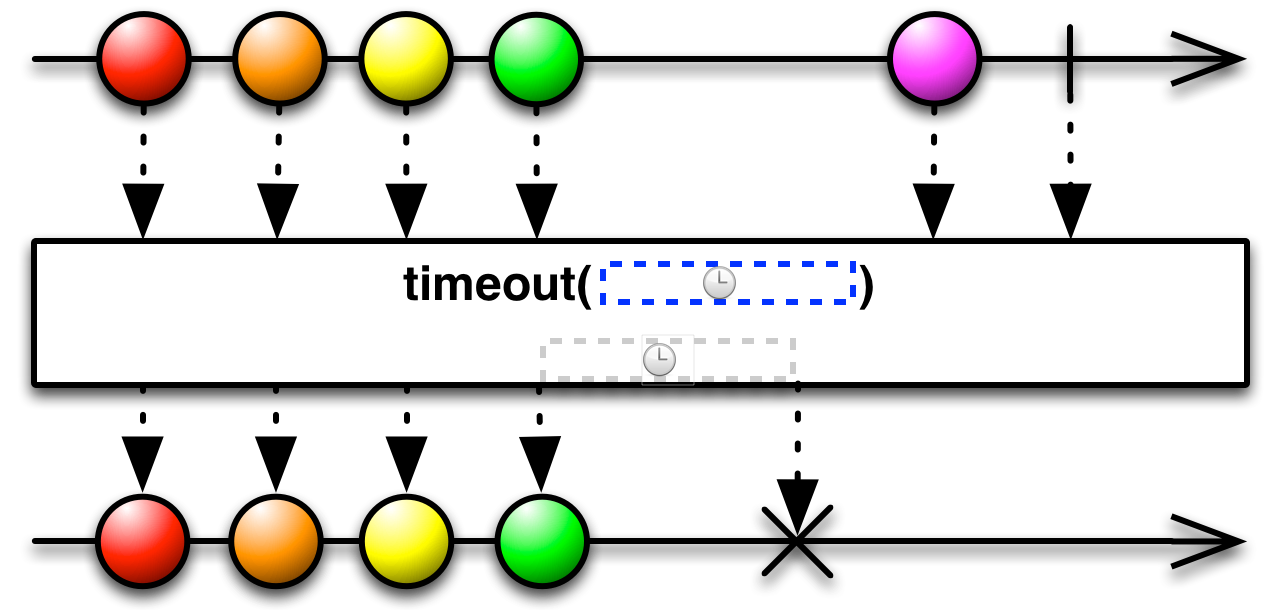
- Scheduler:
- This version of
timeoutoperates by default on thecomputationScheduler.
- Parameters:
timeout- maximum duration between emitted items before a timeout occurstimeUnit- the unit of time that applies to thetimeoutargument.- Returns:
- the source ObservableSource modified to notify observers of a
TimeoutExceptionin case of a timeout - See Also:
- ReactiveX operators documentation: Timeout
-
timeout
@CheckReturnValue @SchedulerSupport(value="io.reactivex:computation") public final Observable<T> timeout(long timeout, TimeUnit timeUnit, ObservableSource<? extends T> other)
Returns an Observable that mirrors the source ObservableSource but applies a timeout policy for each emitted item. If the next item isn't emitted within the specified timeout duration starting from its predecessor, the source ObservableSource is disposed and resulting ObservableSource begins instead to mirror a fallback ObservableSource.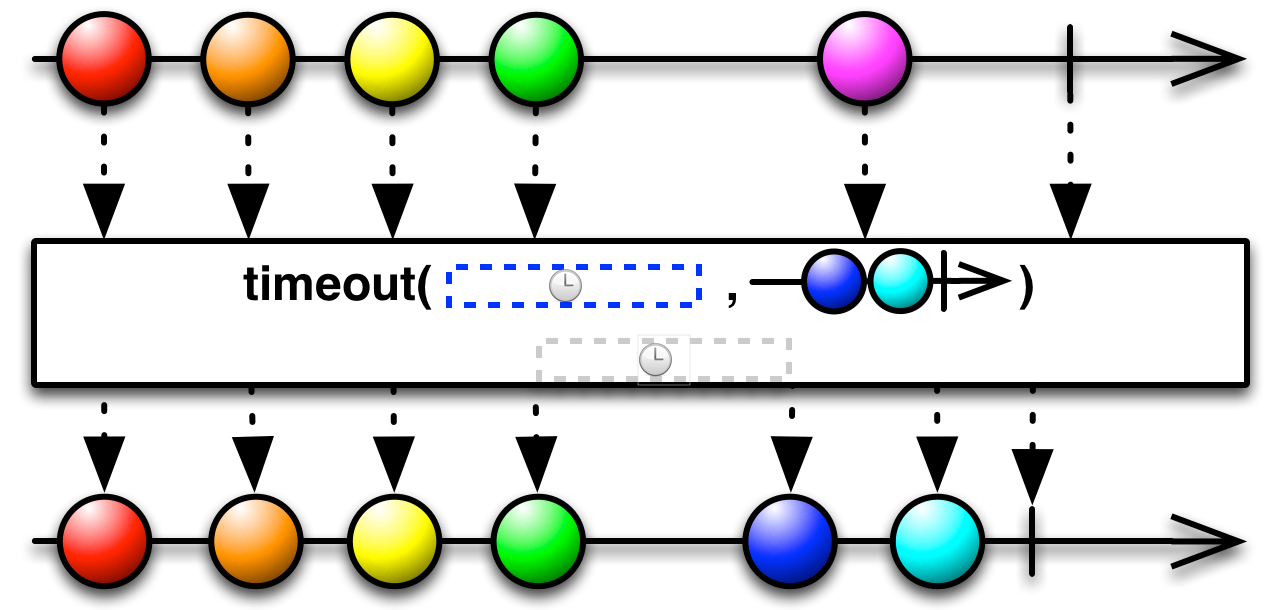
- Scheduler:
- This version of
timeoutoperates by default on thecomputationScheduler.
- Parameters:
timeout- maximum duration between items before a timeout occurstimeUnit- the unit of time that applies to thetimeoutargumentother- the fallback ObservableSource to use in case of a timeout- Returns:
- the source ObservableSource modified to switch to the fallback ObservableSource in case of a timeout
- See Also:
- ReactiveX operators documentation: Timeout
-
timeout
@CheckReturnValue @SchedulerSupport(value="custom") public final Observable<T> timeout(long timeout, TimeUnit timeUnit, Scheduler scheduler, ObservableSource<? extends T> other)
Returns an Observable that mirrors the source ObservableSource but applies a timeout policy for each emitted item using a specified Scheduler. If the next item isn't emitted within the specified timeout duration starting from its predecessor, the source ObservableSource is disposed and resulting ObservableSource begins instead to mirror a fallback ObservableSource.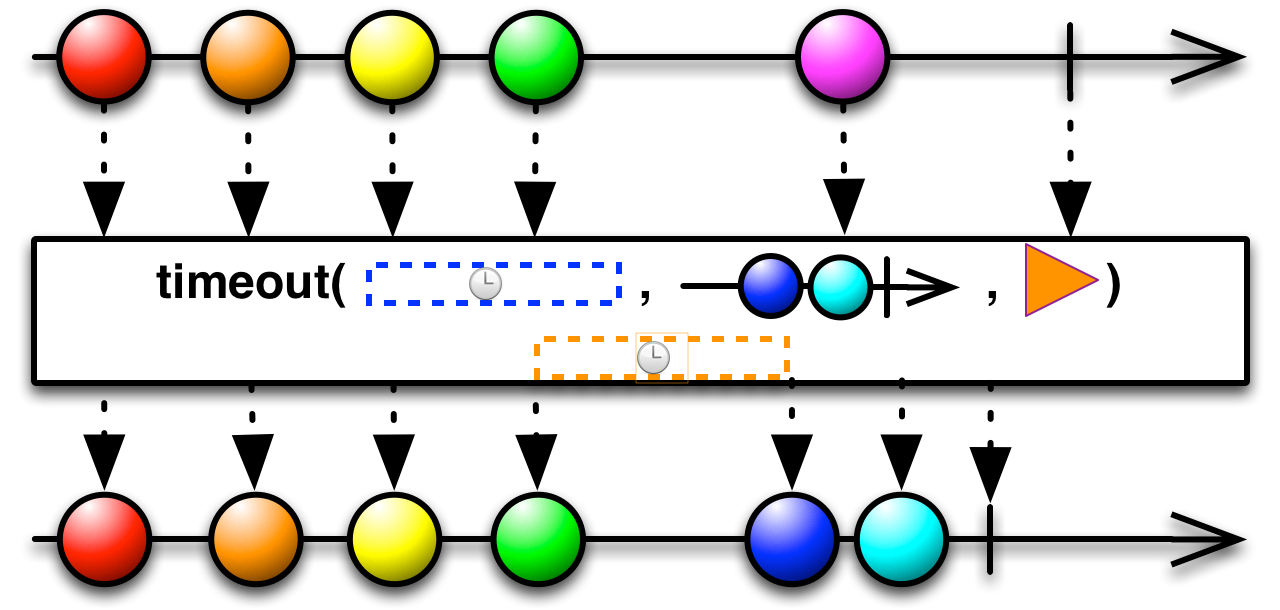
- Scheduler:
- You specify which
Schedulerthis operator will use.
- Parameters:
timeout- maximum duration between items before a timeout occurstimeUnit- the unit of time that applies to thetimeoutargumentscheduler- theSchedulerto run the timeout timers onother- the ObservableSource to use as the fallback in case of a timeout- Returns:
- the source ObservableSource modified so that it will switch to the fallback ObservableSource in case of a timeout
- See Also:
- ReactiveX operators documentation: Timeout
-
timeout
@CheckReturnValue @SchedulerSupport(value="custom") public final Observable<T> timeout(long timeout, TimeUnit timeUnit, Scheduler scheduler)
Returns an Observable that mirrors the source ObservableSource but applies a timeout policy for each emitted item, where this policy is governed on a specified Scheduler. If the next item isn't emitted within the specified timeout duration starting from its predecessor, the resulting ObservableSource terminates and notifies observers of aTimeoutException.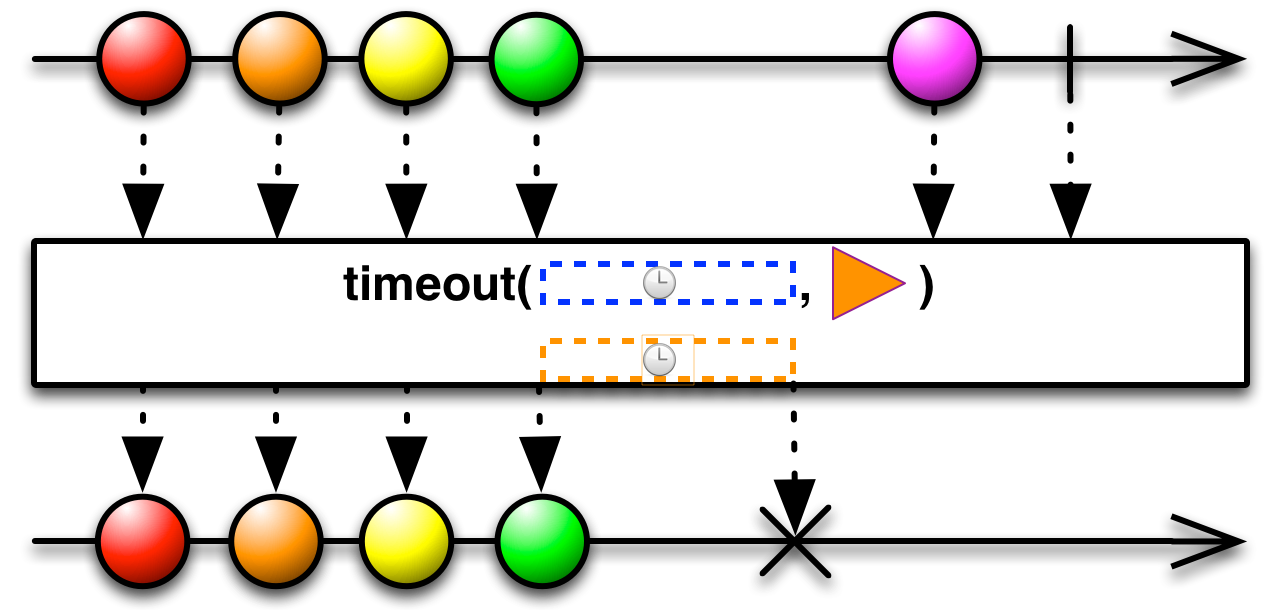
- Scheduler:
- You specify which
Schedulerthis operator will use.
- Parameters:
timeout- maximum duration between items before a timeout occurstimeUnit- the unit of time that applies to thetimeoutargumentscheduler- the Scheduler to run the timeout timers on- Returns:
- the source ObservableSource modified to notify observers of a
TimeoutExceptionin case of a timeout - See Also:
- ReactiveX operators documentation: Timeout
-
timeout
@CheckReturnValue @SchedulerSupport(value="none") public final <U,V> Observable<T> timeout(ObservableSource<U> firstTimeoutIndicator, Function<? super T,? extends ObservableSource<V>> itemTimeoutIndicator)
Returns an Observable that mirrors the source ObservableSource, but notifies observers of aTimeoutExceptionif either the first item emitted by the source ObservableSource or any subsequent item doesn't arrive within time windows defined by other ObservableSources.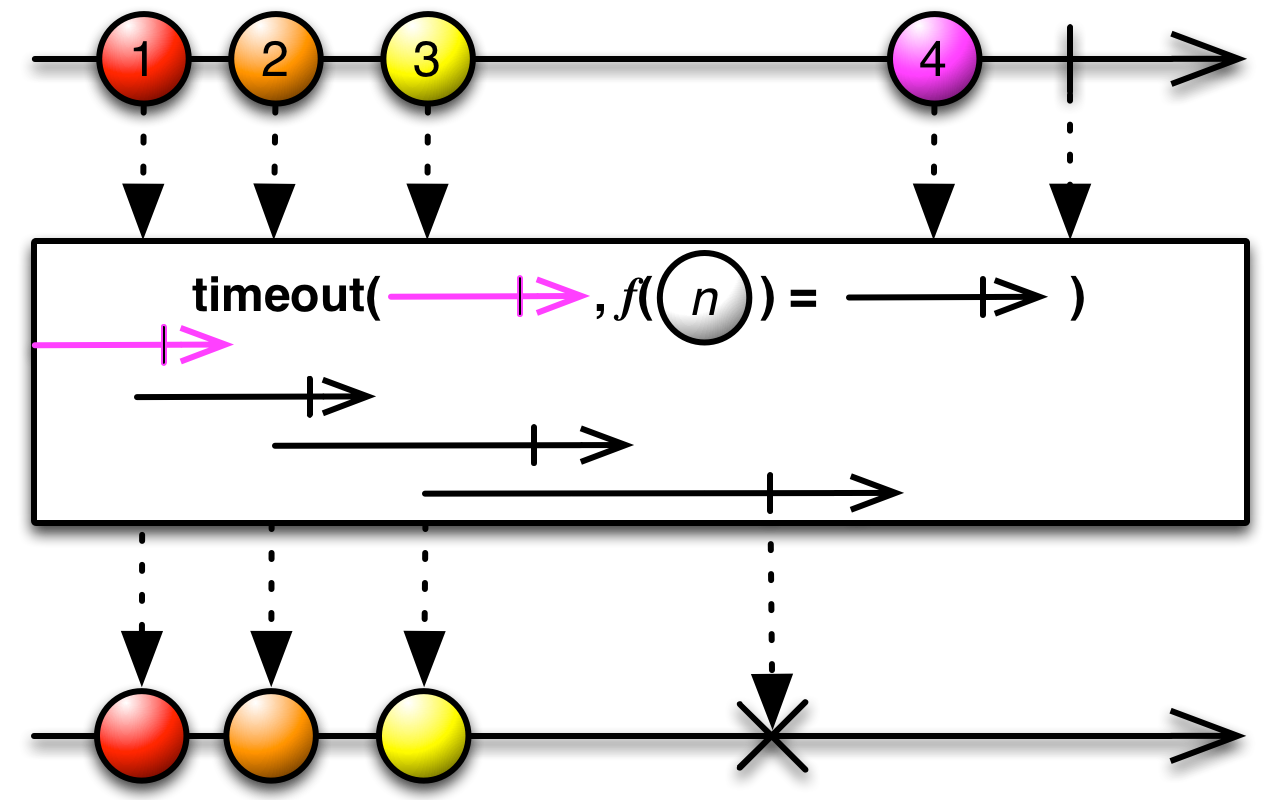
- Scheduler:
- This version of
timeoutoperates by default on theimmediateScheduler.
- Type Parameters:
U- the first timeout value type (ignored)V- the subsequent timeout value type (ignored)- Parameters:
firstTimeoutIndicator- a function that returns an ObservableSource that determines the timeout window for the first source itemitemTimeoutIndicator- a function that returns an ObservableSource for each item emitted by the source ObservableSource and that determines the timeout window in which the subsequent source item must arrive in order to continue the sequence- Returns:
- an Observable that mirrors the source ObservableSource, but notifies observers of a
TimeoutExceptionif either the first item or any subsequent item doesn't arrive within the time windows specified by the timeout selectors - See Also:
- ReactiveX operators documentation: Timeout
-
timeout
@CheckReturnValue @SchedulerSupport(value="none") public final <U,V> Observable<T> timeout(ObservableSource<U> firstTimeoutIndicator, Function<? super T,? extends ObservableSource<V>> itemTimeoutIndicator, ObservableSource<? extends T> other)
Returns an Observable that mirrors the source ObservableSource, but switches to a fallback ObservableSource if either the first item emitted by the source ObservableSource or any subsequent item doesn't arrive within time windows defined by other ObservableSources.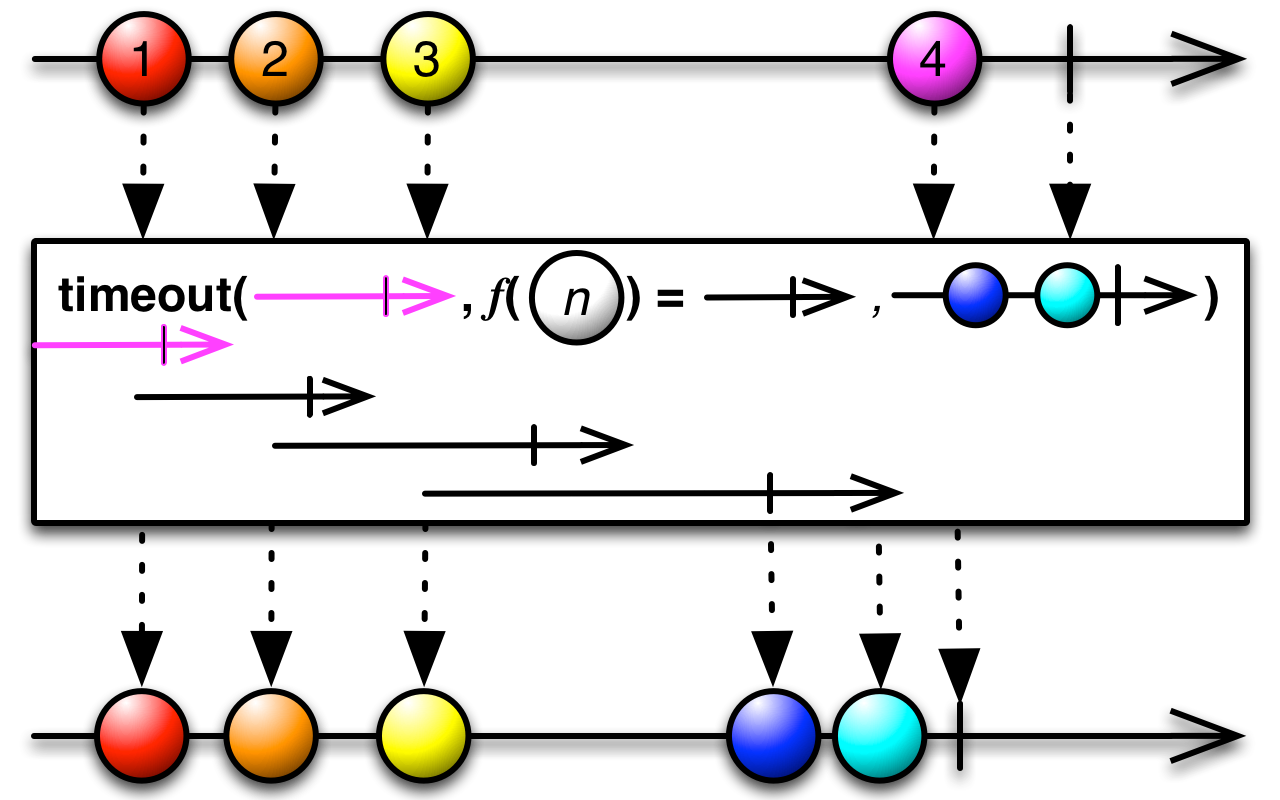
- Scheduler:
- This version of
timeoutoperates by default on theimmediateScheduler.
- Type Parameters:
U- the first timeout value type (ignored)V- the subsequent timeout value type (ignored)- Parameters:
firstTimeoutIndicator- a function that returns an ObservableSource which determines the timeout window for the first source itemitemTimeoutIndicator- a function that returns an ObservableSource for each item emitted by the source ObservableSource and that determines the timeout window in which the subsequent source item must arrive in order to continue the sequenceother- the fallback ObservableSource to switch to if the source ObservableSource times out- Returns:
- an Observable that mirrors the source ObservableSource, but switches to the
otherObservableSource if either the first item emitted by the source ObservableSource or any subsequent item doesn't arrive within time windows defined by the timeout selectors - Throws:
NullPointerException- ifitemTimeoutIndicatoris null, or ifotheris null- See Also:
- ReactiveX operators documentation: Timeout
-
timestamp
@CheckReturnValue @SchedulerSupport(value="none") public final Observable<Timed<T>> timestamp()
Returns an Observable that emits each item emitted by the source ObservableSource, wrapped in aTimedobject.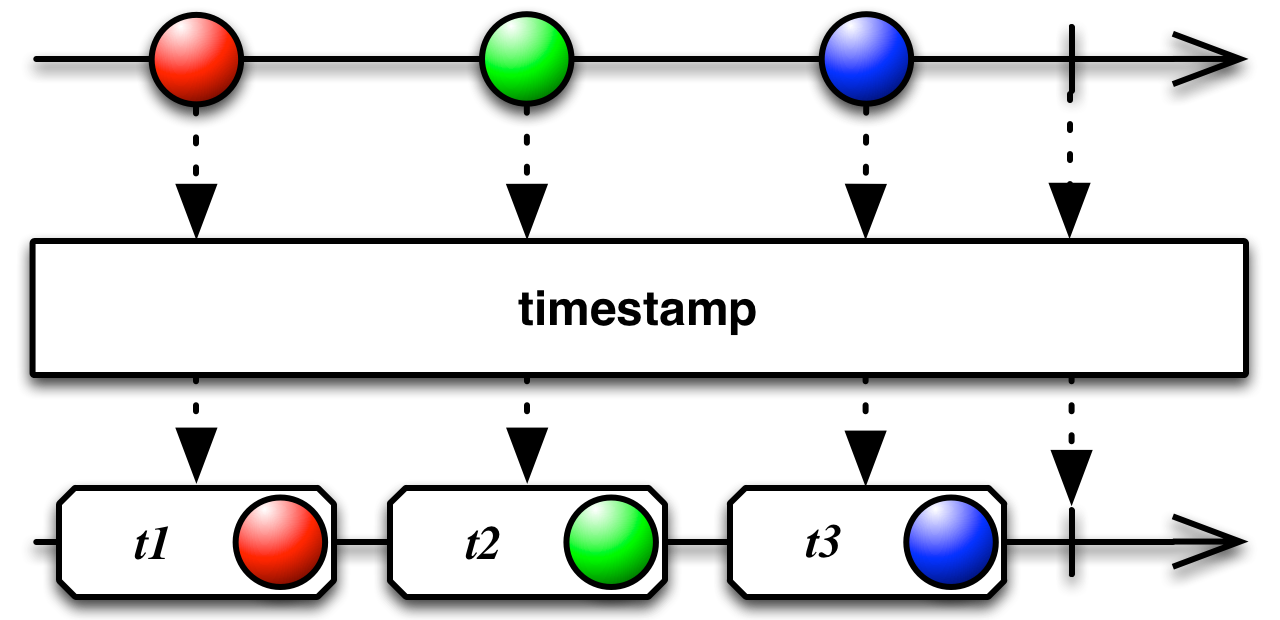
- Scheduler:
timestampdoes not operate on any particular scheduler but uses the current time from thecomputationScheduler.
- Returns:
- an Observable that emits timestamped items from the source ObservableSource
- See Also:
- ReactiveX operators documentation: Timestamp
-
timestamp
@CheckReturnValue @SchedulerSupport(value="none") public final Observable<Timed<T>> timestamp(Scheduler scheduler)
Returns an Observable that emits each item emitted by the source ObservableSource, wrapped in aTimedobject whose timestamps are provided by a specified Scheduler.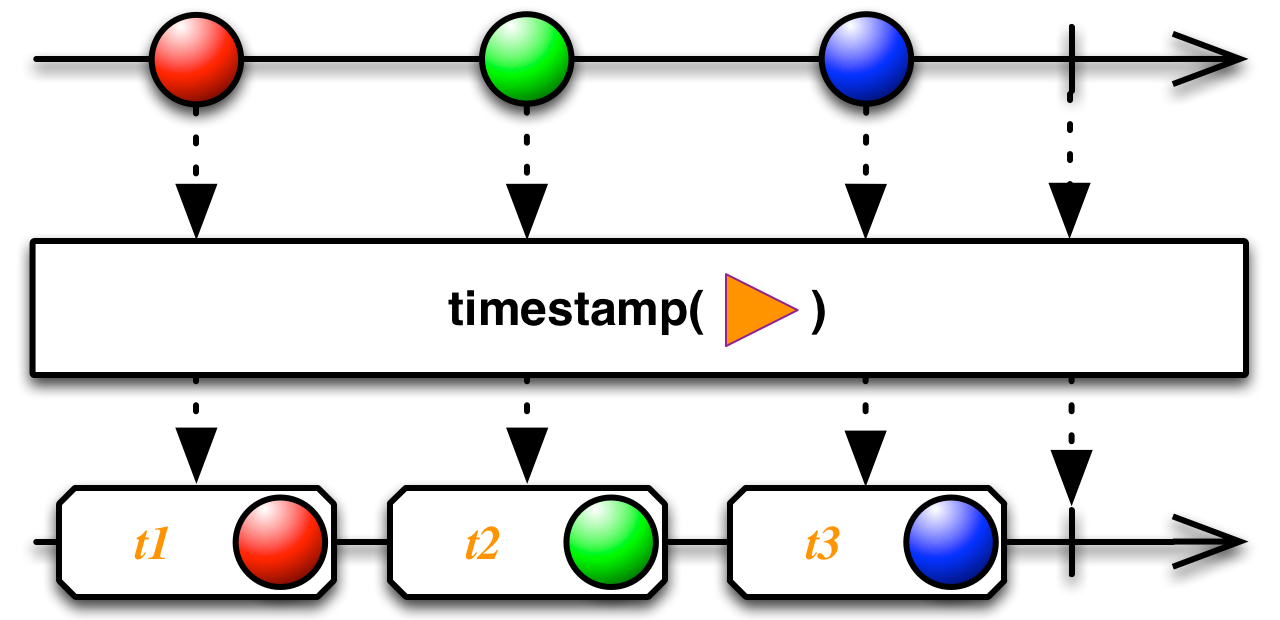
- Scheduler:
- This operator does not operate on any particular scheduler but uses the current time
from the specified
Scheduler.
- Parameters:
scheduler- theSchedulerto use as a time source- Returns:
- an Observable that emits timestamped items from the source ObservableSource with timestamps provided by
the
scheduler - See Also:
- ReactiveX operators documentation: Timestamp
-
timestamp
@CheckReturnValue @SchedulerSupport(value="none") public final Observable<Timed<T>> timestamp(TimeUnit unit)
Returns an Observable that emits each item emitted by the source ObservableSource, wrapped in aTimedobject.
- Scheduler:
timestampdoes not operate on any particular scheduler but uses the current time from thecomputationScheduler.
- Parameters:
unit- the time unit for the current time- Returns:
- an Observable that emits timestamped items from the source ObservableSource
- See Also:
- ReactiveX operators documentation: Timestamp
-
timestamp
@CheckReturnValue @SchedulerSupport(value="none") public final Observable<Timed<T>> timestamp(TimeUnit unit, Scheduler scheduler)
Returns an Observable that emits each item emitted by the source ObservableSource, wrapped in aTimedobject whose timestamps are provided by a specified Scheduler.
- Scheduler:
- This operator does not operate on any particular scheduler but uses the current time
from the specified
Scheduler.
- Parameters:
unit- the time unit for the current timescheduler- theSchedulerto use as a time source- Returns:
- an Observable that emits timestamped items from the source ObservableSource with timestamps provided by
the
scheduler - See Also:
- ReactiveX operators documentation: Timestamp
-
to
@CheckReturnValue @SchedulerSupport(value="none") public final <R> R to(Function<? super Observable<T>,R> converter)
Calls the specified converter function during assembly time and returns its resulting value.This allows fluent conversion to any other type.
- Scheduler:
todoes not operate by default on a particularScheduler.
- Type Parameters:
R- the resulting object type- Parameters:
converter- the function that receives the current Observable instance and returns a value- Returns:
- the value returned by the function
-
toList
@CheckReturnValue @SchedulerSupport(value="none") public final Single<List<T>> toList()
Returns a Single that emits a single item, a list composed of all the items emitted by the finite source ObservableSource.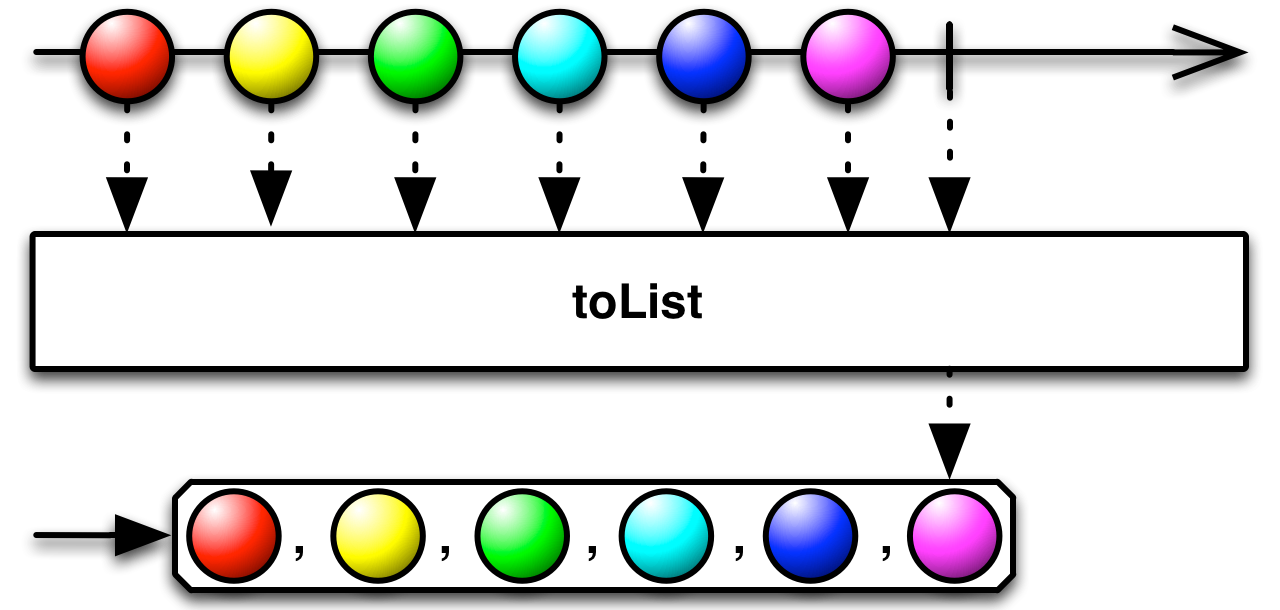
Normally, an ObservableSource that returns multiple items will do so by invoking its
Observer'sonNextmethod for each such item. You can change this behavior, instructing the ObservableSource to compose a list of all of these items and then to invoke the Observer'sonNextfunction once, passing it the entire list, by calling the ObservableSource'stoListmethod prior to calling itssubscribe()method.Note that this operator requires the upstream to signal
onCompletefor the accumulated list to be emitted. Sources that are infinite and never complete will never emit anything through this operator and an infinite source may lead to a fatalOutOfMemoryError.- Scheduler:
toListdoes not operate by default on a particularScheduler.
- Returns:
- a Single that emits a single item: a List containing all of the items emitted by the source ObservableSource
- See Also:
- ReactiveX operators documentation: To
-
toList
@CheckReturnValue @SchedulerSupport(value="none") public final Single<List<T>> toList(int capacityHint)
Returns a Single that emits a single item, a list composed of all the items emitted by the finite source ObservableSource.
Normally, an ObservableSource that returns multiple items will do so by invoking its
Observer'sonNextmethod for each such item. You can change this behavior, instructing the ObservableSource to compose a list of all of these items and then to invoke the Observer'sonNextfunction once, passing it the entire list, by calling the ObservableSource'stoListmethod prior to calling itssubscribe()method.Note that this operator requires the upstream to signal
onCompletefor the accumulated list to be emitted. Sources that are infinite and never complete will never emit anything through this operator and an infinite source may lead to a fatalOutOfMemoryError.- Scheduler:
toListdoes not operate by default on a particularScheduler.
- Parameters:
capacityHint- the number of elements expected from the current Observable- Returns:
- a Single that emits a single item: a List containing all of the items emitted by the source ObservableSource
- See Also:
- ReactiveX operators documentation: To
-
toList
@CheckReturnValue @SchedulerSupport(value="none") public final <U extends Collection<? super T>> Single<U> toList(Callable<U> collectionSupplier)
Returns a Single that emits a single item, a list composed of all the items emitted by the finite source ObservableSource.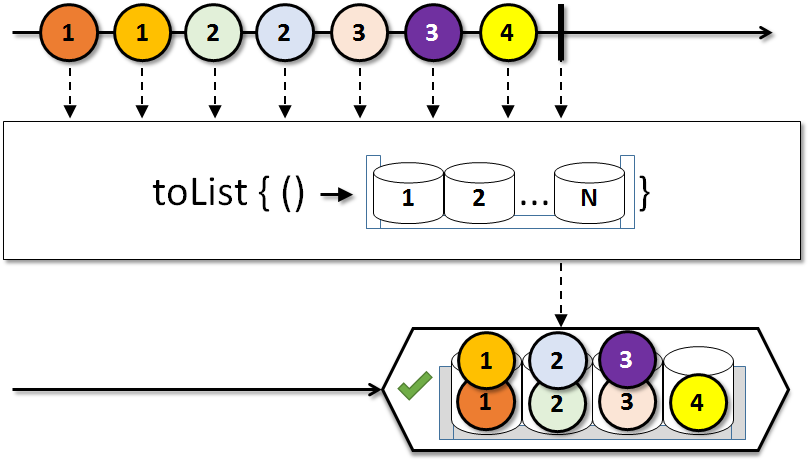
Normally, an ObservableSource that returns multiple items will do so by invoking its
Observer'sonNextmethod for each such item. You can change this behavior, instructing the ObservableSource to compose a list of all of these items and then to invoke the Observer'sonNextfunction once, passing it the entire list, by calling the ObservableSource'stoListmethod prior to calling itssubscribe()method.Note that this operator requires the upstream to signal
onCompletefor the accumulated collection to be emitted. Sources that are infinite and never complete will never emit anything through this operator and an infinite source may lead to a fatalOutOfMemoryError.- Scheduler:
toListdoes not operate by default on a particularScheduler.
- Type Parameters:
U- the subclass of a collection of Ts- Parameters:
collectionSupplier- the Callable returning the collection (for each individual Observer) to be filled in- Returns:
- a Single that emits a single item: a List containing all of the items emitted by the source ObservableSource
- See Also:
- ReactiveX operators documentation: To
-
toMap
@CheckReturnValue @SchedulerSupport(value="none") public final <K> Single<Map<K,T>> toMap(Function<? super T,? extends K> keySelector)
Returns a Single that emits a single HashMap containing all items emitted by the finite source ObservableSource, mapped by the keys returned by a specifiedkeySelectorfunction.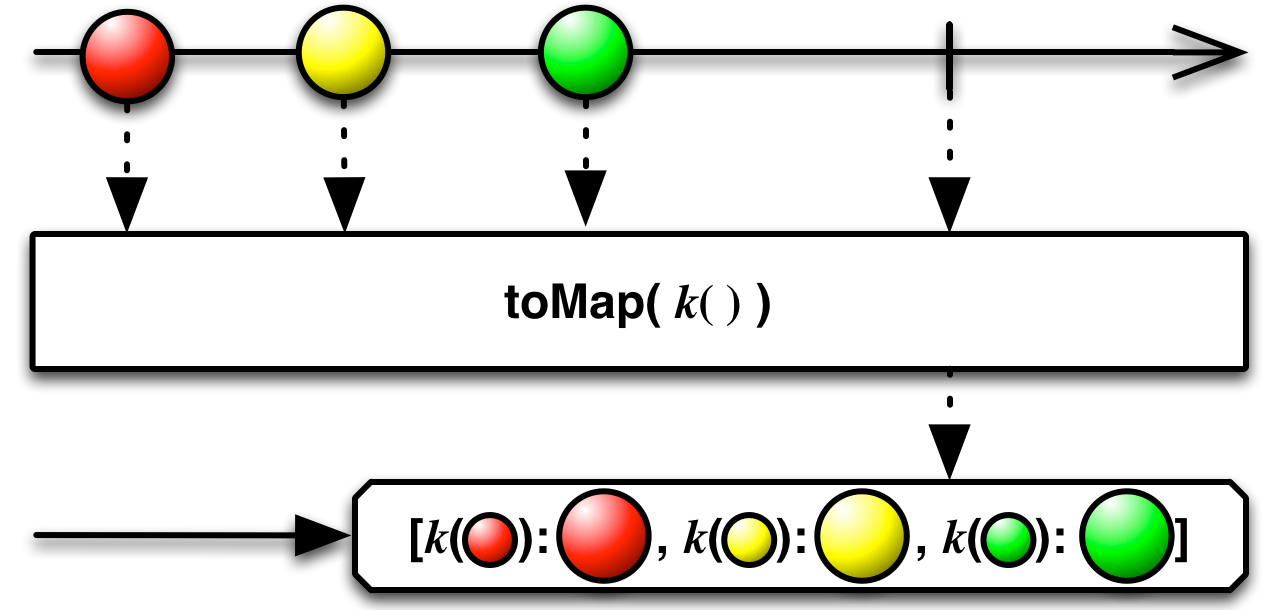
If more than one source item maps to the same key, the HashMap will contain the latest of those items.
Note that this operator requires the upstream to signal
onCompletefor the accumulated map to be emitted. Sources that are infinite and never complete will never emit anything through this operator and an infinite source may lead to a fatalOutOfMemoryError.- Scheduler:
toMapdoes not operate by default on a particularScheduler.
- Type Parameters:
K- the key type of the Map- Parameters:
keySelector- the function that extracts the key from a source item to be used in the HashMap- Returns:
- a Single that emits a single item: a HashMap containing the mapped items from the source ObservableSource
- See Also:
- ReactiveX operators documentation: To
-
toMap
@CheckReturnValue @SchedulerSupport(value="none") public final <K,V> Single<Map<K,V>> toMap(Function<? super T,? extends K> keySelector, Function<? super T,? extends V> valueSelector)
Returns a Single that emits a single HashMap containing values corresponding to items emitted by the finite source ObservableSource, mapped by the keys returned by a specifiedkeySelectorfunction.
If more than one source item maps to the same key, the HashMap will contain a single entry that corresponds to the latest of those items.
Note that this operator requires the upstream to signal
onCompletefor the accumulated map to be emitted. Sources that are infinite and never complete will never emit anything through this operator and an infinite source may lead to a fatalOutOfMemoryError.- Scheduler:
toMapdoes not operate by default on a particularScheduler.
- Type Parameters:
K- the key type of the MapV- the value type of the Map- Parameters:
keySelector- the function that extracts the key from a source item to be used in the HashMapvalueSelector- the function that extracts the value from a source item to be used in the HashMap- Returns:
- a Single that emits a single item: a HashMap containing the mapped items from the source ObservableSource
- See Also:
- ReactiveX operators documentation: To
-
toMap
@CheckReturnValue @SchedulerSupport(value="none") public final <K,V> Single<Map<K,V>> toMap(Function<? super T,? extends K> keySelector, Function<? super T,? extends V> valueSelector, Callable<? extends Map<K,V>> mapSupplier)
Returns a Single that emits a single Map, returned by a specifiedmapFactoryfunction, that contains keys and values extracted from the items emitted by the finite source ObservableSource.
Note that this operator requires the upstream to signal
onCompletefor the accumulated map to be emitted. Sources that are infinite and never complete will never emit anything through this operator and an infinite source may lead to a fatalOutOfMemoryError.- Scheduler:
toMapdoes not operate by default on a particularScheduler.
- Type Parameters:
K- the key type of the MapV- the value type of the Map- Parameters:
keySelector- the function that extracts the key from a source item to be used in the MapvalueSelector- the function that extracts the value from the source items to be used as value in the MapmapSupplier- the function that returns a Map instance to be used- Returns:
- a Single that emits a single item: a Map that contains the mapped items emitted by the source ObservableSource
- See Also:
- ReactiveX operators documentation: To
-
toMultimap
@CheckReturnValue @SchedulerSupport(value="none") public final <K> Single<Map<K,Collection<T>>> toMultimap(Function<? super T,? extends K> keySelector)
Returns a Single that emits a single HashMap that contains an ArrayList of items emitted by the finite source ObservableSource keyed by a specifiedkeySelectorfunction.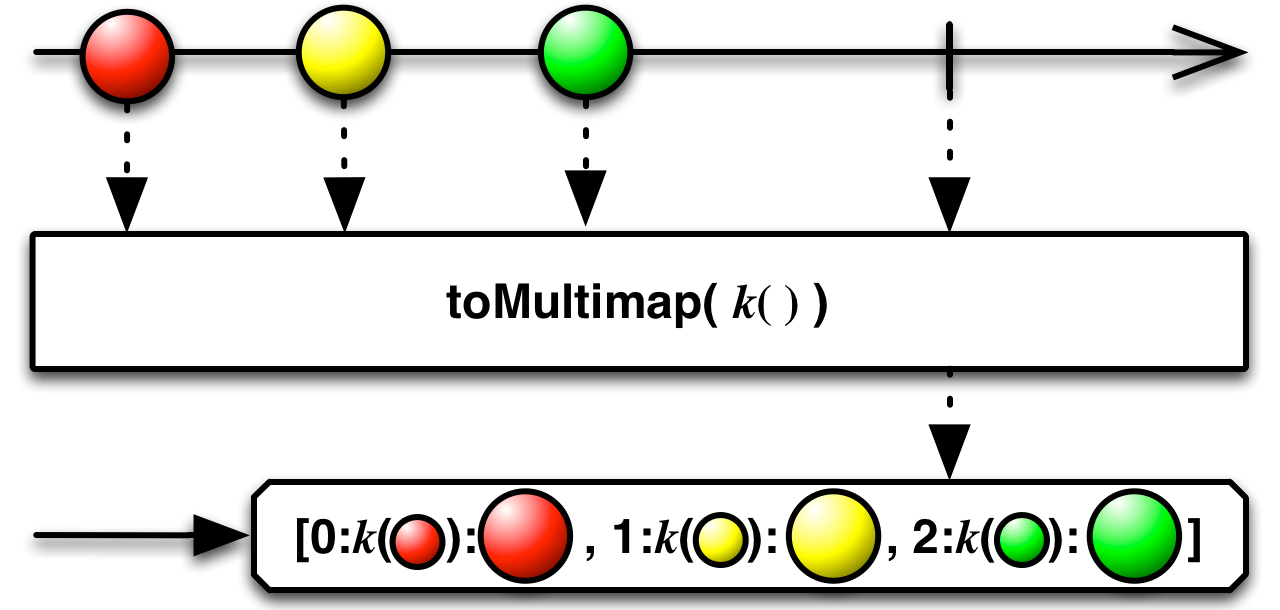
Note that this operator requires the upstream to signal
onCompletefor the accumulated map to be emitted. Sources that are infinite and never complete will never emit anything through this operator and an infinite source may lead to a fatalOutOfMemoryError.- Scheduler:
toMultimapdoes not operate by default on a particularScheduler.
- Type Parameters:
K- the key type of the Map- Parameters:
keySelector- the function that extracts the key from the source items to be used as key in the HashMap- Returns:
- a Single that emits a single item: a HashMap that contains an ArrayList of items mapped from the source ObservableSource
- See Also:
- ReactiveX operators documentation: To
-
toMultimap
@CheckReturnValue @SchedulerSupport(value="none") public final <K,V> Single<Map<K,Collection<V>>> toMultimap(Function<? super T,? extends K> keySelector, Function<? super T,? extends V> valueSelector)
Returns a Single that emits a single HashMap that contains an ArrayList of values extracted by a specifiedvalueSelectorfunction from items emitted by the finite source ObservableSource, keyed by a specifiedkeySelectorfunction.
Note that this operator requires the upstream to signal
onCompletefor the accumulated map to be emitted. Sources that are infinite and never complete will never emit anything through this operator and an infinite source may lead to a fatalOutOfMemoryError.- Scheduler:
toMultimapdoes not operate by default on a particularScheduler.
- Type Parameters:
K- the key type of the MapV- the value type of the Map- Parameters:
keySelector- the function that extracts a key from the source items to be used as key in the HashMapvalueSelector- the function that extracts a value from the source items to be used as value in the HashMap- Returns:
- a Single that emits a single item: a HashMap that contains an ArrayList of items mapped from the source ObservableSource
- See Also:
- ReactiveX operators documentation: To
-
toMultimap
@CheckReturnValue @SchedulerSupport(value="none") public final <K,V> Single<Map<K,Collection<V>>> toMultimap(Function<? super T,? extends K> keySelector, Function<? super T,? extends V> valueSelector, Callable<? extends Map<K,Collection<V>>> mapSupplier, Function<? super K,? extends Collection<? super V>> collectionFactory)
Returns a Single that emits a single Map, returned by a specifiedmapFactoryfunction, that contains a custom collection of values, extracted by a specifiedvalueSelectorfunction from items emitted by the source ObservableSource, and keyed by thekeySelectorfunction.
- Scheduler:
toMultimapdoes not operate by default on a particularScheduler.
- Type Parameters:
K- the key type of the MapV- the value type of the Map- Parameters:
keySelector- the function that extracts a key from the source items to be used as the key in the MapvalueSelector- the function that extracts a value from the source items to be used as the value in the MapmapSupplier- the function that returns a Map instance to be usedcollectionFactory- the function that returns a Collection instance for a particular key to be used in the Map- Returns:
- a Single that emits a single item: a Map that contains the collection of mapped items from the source ObservableSource
- See Also:
- ReactiveX operators documentation: To
-
toMultimap
@CheckReturnValue @SchedulerSupport(value="none") public final <K,V> Single<Map<K,Collection<V>>> toMultimap(Function<? super T,? extends K> keySelector, Function<? super T,? extends V> valueSelector, Callable<Map<K,Collection<V>>> mapSupplier)
Returns a Single that emits a single Map, returned by a specifiedmapFactoryfunction, that contains an ArrayList of values, extracted by a specifiedvalueSelectorfunction from items emitted by the finite source ObservableSource and keyed by thekeySelectorfunction.
Note that this operator requires the upstream to signal
onCompletefor the accumulated map to be emitted. Sources that are infinite and never complete will never emit anything through this operator and an infinite source may lead to a fatalOutOfMemoryError.- Scheduler:
toMultimapdoes not operate by default on a particularScheduler.
- Type Parameters:
K- the key type of the MapV- the value type of the Map- Parameters:
keySelector- the function that extracts a key from the source items to be used as the key in the MapvalueSelector- the function that extracts a value from the source items to be used as the value in the MapmapSupplier- the function that returns a Map instance to be used- Returns:
- a Single that emits a single item: a Map that contains a list items mapped from the source ObservableSource
- See Also:
- ReactiveX operators documentation: To
-
toFlowable
@BackpressureSupport(value=SPECIAL) @CheckReturnValue @SchedulerSupport(value="none") public final Flowable<T> toFlowable(BackpressureStrategy strategy)
Converts the current Observable into a Flowable by applying the specified backpressure strategy.Marble diagrams for the various backpressure strategies are as follows:
BackpressureStrategy.BUFFER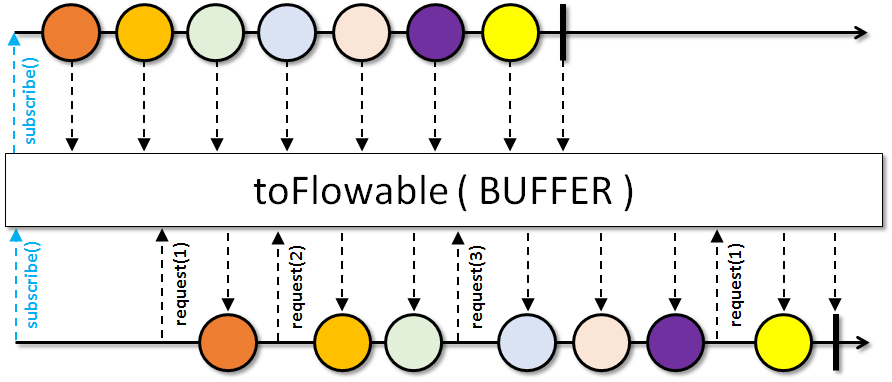
BackpressureStrategy.DROP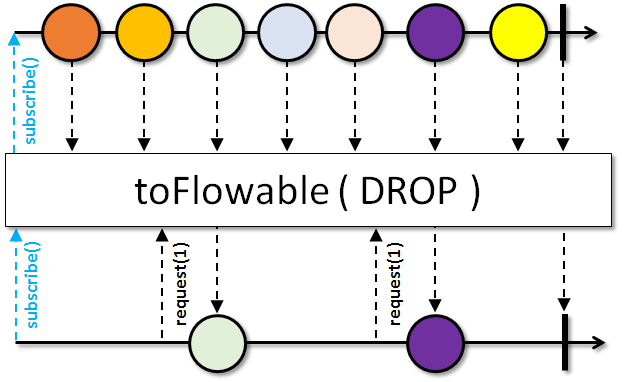
BackpressureStrategy.LATEST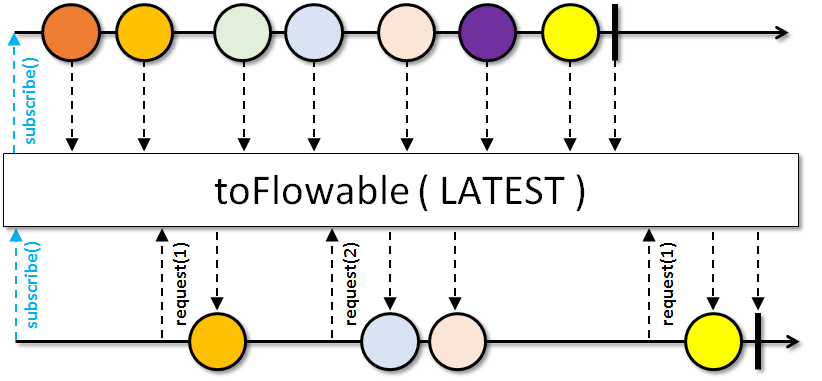
BackpressureStrategy.ERROR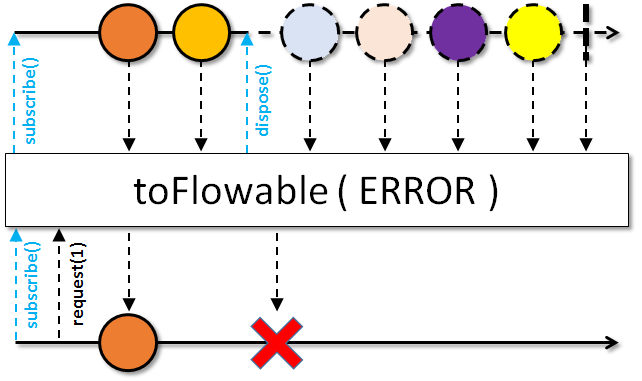
BackpressureStrategy.MISSING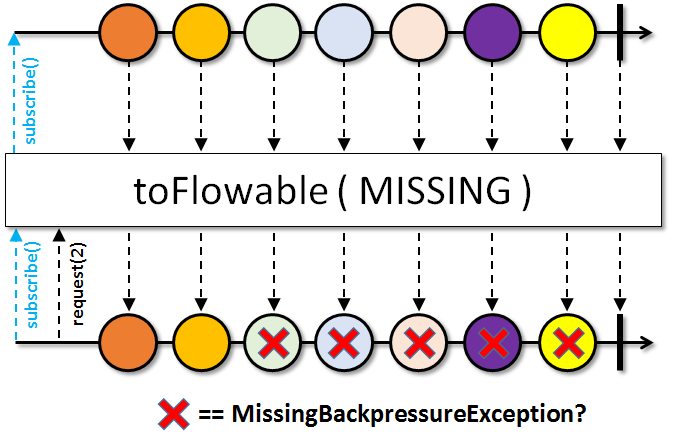
- Backpressure:
- The operator applies the chosen backpressure strategy of
BackpressureStrategyenum. - Scheduler:
toFlowabledoes not operate by default on a particularScheduler.
- Parameters:
strategy- the backpressure strategy to apply- Returns:
- the new Flowable instance
-
toSortedList
@CheckReturnValue @SchedulerSupport(value="none") public final Single<List<T>> toSortedList()
Returns a Single that emits a list that contains the items emitted by the finite source ObservableSource, in a sorted order. Each item emitted by the ObservableSource must implementComparablewith respect to all other items in the sequence.If any item emitted by this Observable does not implement
Comparablewith respect to all other items emitted by this Observable, no items will be emitted and the sequence is terminated with aClassCastException.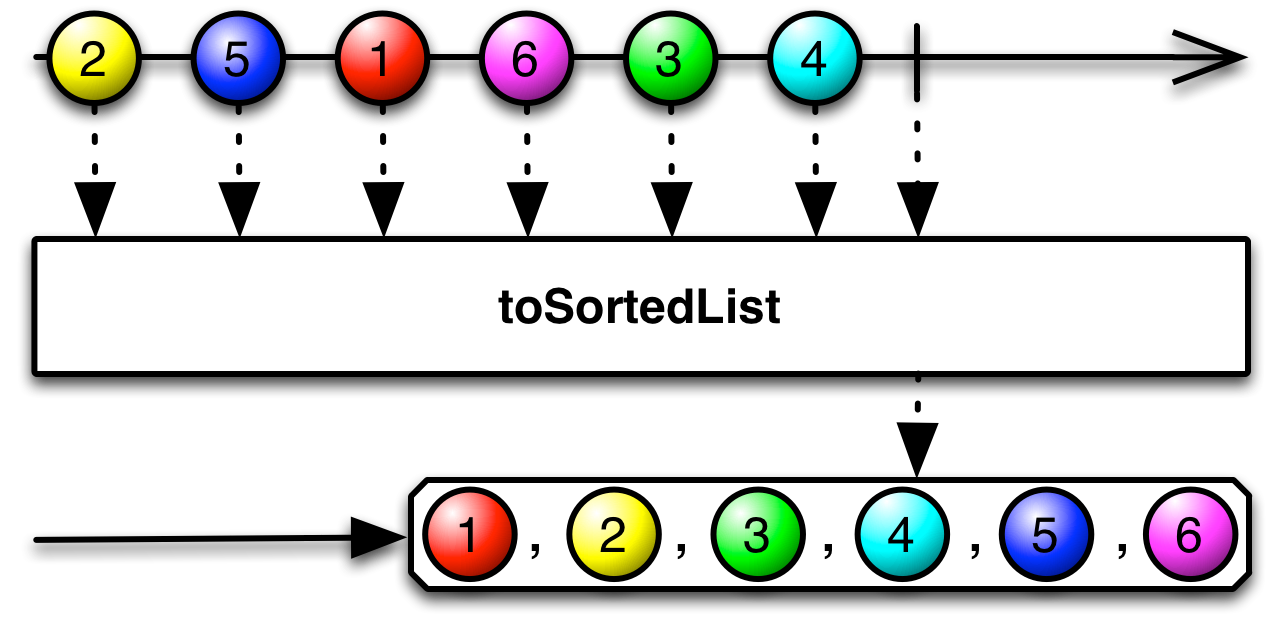
Note that this operator requires the upstream to signal
onCompletefor the accumulated list to be emitted. Sources that are infinite and never complete will never emit anything through this operator and an infinite source may lead to a fatalOutOfMemoryError.- Scheduler:
toSortedListdoes not operate by default on a particularScheduler.
- Returns:
- a Single that emits a list that contains the items emitted by the source ObservableSource in sorted order
- See Also:
- ReactiveX operators documentation: To
-
toSortedList
@CheckReturnValue @SchedulerSupport(value="none") public final Single<List<T>> toSortedList(Comparator<? super T> comparator)
Returns a Single that emits a list that contains the items emitted by the finite source ObservableSource, in a sorted order based on a specified comparison function.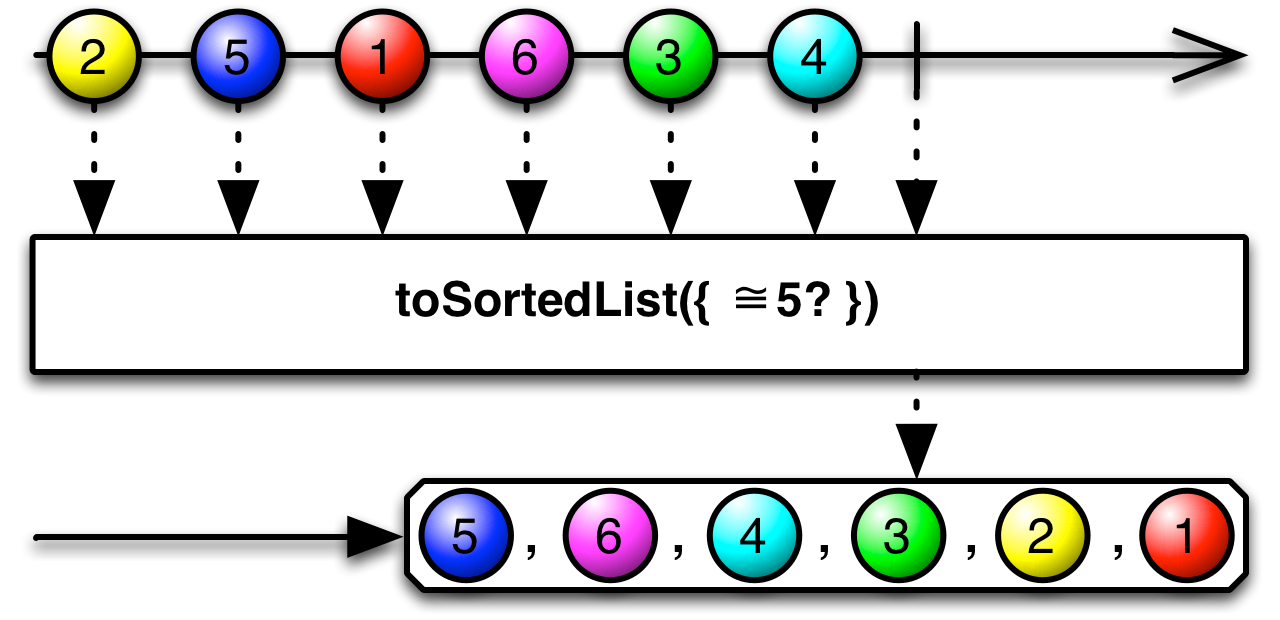
Note that this operator requires the upstream to signal
onCompletefor the accumulated list to be emitted. Sources that are infinite and never complete will never emit anything through this operator and an infinite source may lead to a fatalOutOfMemoryError.- Scheduler:
toSortedListdoes not operate by default on a particularScheduler.
- Parameters:
comparator- a function that compares two items emitted by the source ObservableSource and returns an Integer that indicates their sort order- Returns:
- a Single that emits a list that contains the items emitted by the source ObservableSource in sorted order
- See Also:
- ReactiveX operators documentation: To
-
toSortedList
@CheckReturnValue @SchedulerSupport(value="none") public final Single<List<T>> toSortedList(Comparator<? super T> comparator, int capacityHint)
Returns a Single that emits a list that contains the items emitted by the finite source ObservableSource, in a sorted order based on a specified comparison function.
Note that this operator requires the upstream to signal
onCompletefor the accumulated list to be emitted. Sources that are infinite and never complete will never emit anything through this operator and an infinite source may lead to a fatalOutOfMemoryError.- Scheduler:
toSortedListdoes not operate by default on a particularScheduler.
- Parameters:
comparator- a function that compares two items emitted by the source ObservableSource and returns an Integer that indicates their sort ordercapacityHint- the initial capacity of the ArrayList used to accumulate items before sorting- Returns:
- a Single that emits a list that contains the items emitted by the source ObservableSource in sorted order
- Since:
- 2.0
- See Also:
- ReactiveX operators documentation: To
-
toSortedList
@CheckReturnValue @SchedulerSupport(value="none") public final Single<List<T>> toSortedList(int capacityHint)
Returns a Single that emits a list that contains the items emitted by the finite source ObservableSource, in a sorted order. Each item emitted by the ObservableSource must implementComparablewith respect to all other items in the sequence.If any item emitted by this Observable does not implement
Comparablewith respect to all other items emitted by this Observable, no items will be emitted and the sequence is terminated with aClassCastException.
Note that this operator requires the upstream to signal
onCompletefor the accumulated list to be emitted. Sources that are infinite and never complete will never emit anything through this operator and an infinite source may lead to a fatalOutOfMemoryError.- Scheduler:
toSortedListdoes not operate by default on a particularScheduler.
- Parameters:
capacityHint- the initial capacity of the ArrayList used to accumulate items before sorting- Returns:
- a Single that emits a list that contains the items emitted by the source ObservableSource in sorted order
- Since:
- 2.0
- See Also:
- ReactiveX operators documentation: To
-
unsubscribeOn
@CheckReturnValue @SchedulerSupport(value="custom") public final Observable<T> unsubscribeOn(Scheduler scheduler)
Modifies the source ObservableSource so that subscribers will dispose it on a specifiedScheduler.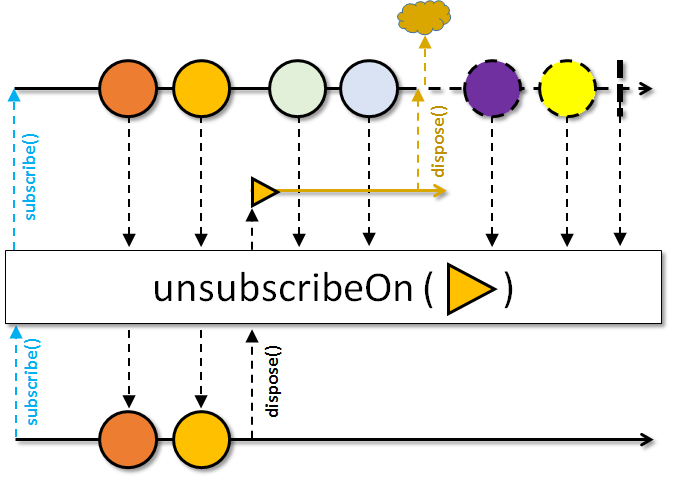
- Scheduler:
- You specify which
Schedulerthis operator will use.
- Parameters:
scheduler- theSchedulerto perform the call to dispose() of the upstream Disposable- Returns:
- the source ObservableSource modified so that its dispose() calls happen on the specified
Scheduler - See Also:
- ReactiveX operators documentation: SubscribeOn
-
window
@CheckReturnValue @SchedulerSupport(value="none") public final Observable<Observable<T>> window(long count)
Returns an Observable that emits windows of items it collects from the source ObservableSource. The resulting ObservableSource emits connected, non-overlapping windows, each containingcountitems. When the source ObservableSource completes or encounters an error, the resulting ObservableSource emits the current window and propagates the notification from the source ObservableSource.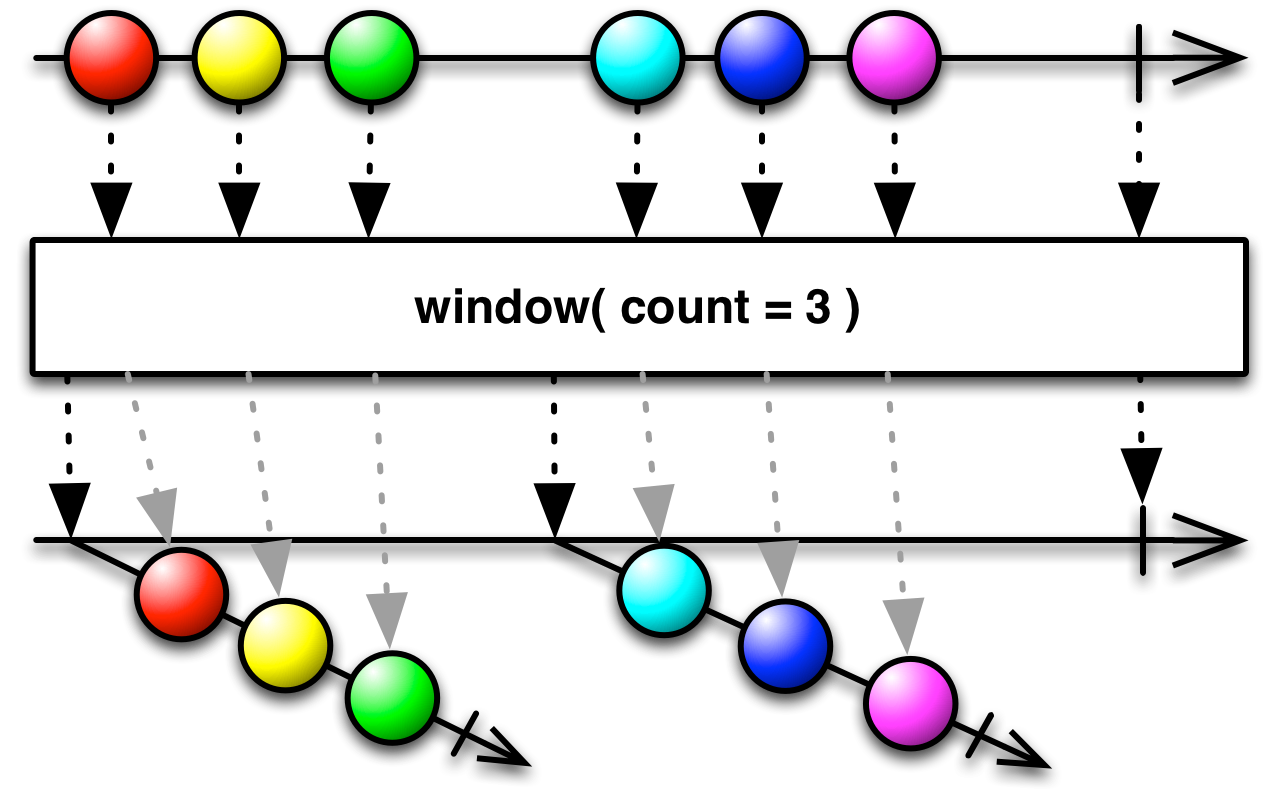
- Scheduler:
- This version of
windowdoes not operate by default on a particularScheduler.
- Parameters:
count- the maximum size of each window before it should be emitted- Returns:
- an Observable that emits connected, non-overlapping windows, each containing at most
countitems from the source ObservableSource - Throws:
IllegalArgumentException- if either count is non-positive- See Also:
- ReactiveX operators documentation: Window
-
window
@CheckReturnValue @SchedulerSupport(value="none") public final Observable<Observable<T>> window(long count, long skip)
Returns an Observable that emits windows of items it collects from the source ObservableSource. The resulting ObservableSource emits windows everyskipitems, each containing no more thancountitems. When the source ObservableSource completes or encounters an error, the resulting ObservableSource emits the current window and propagates the notification from the source ObservableSource.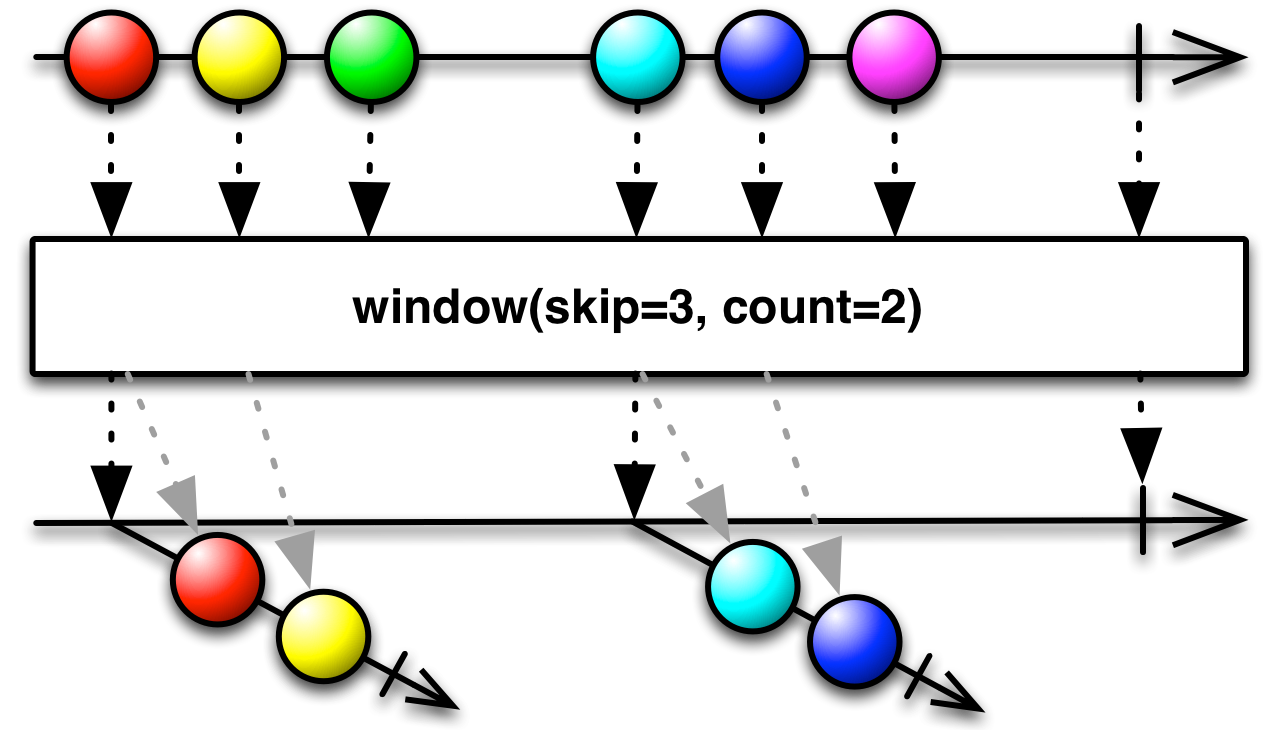
- Scheduler:
- This version of
windowdoes not operate by default on a particularScheduler.
- Parameters:
count- the maximum size of each window before it should be emittedskip- how many items need to be skipped before starting a new window. Note that ifskipandcountare equal this is the same operation aswindow(long).- Returns:
- an Observable that emits windows every
skipitems containing at mostcountitems from the source ObservableSource - Throws:
IllegalArgumentException- if either count or skip is non-positive- See Also:
- ReactiveX operators documentation: Window
-
window
@CheckReturnValue @SchedulerSupport(value="none") public final Observable<Observable<T>> window(long count, long skip, int bufferSize)
Returns an Observable that emits windows of items it collects from the source ObservableSource. The resulting ObservableSource emits windows everyskipitems, each containing no more thancountitems. When the source ObservableSource completes or encounters an error, the resulting ObservableSource emits the current window and propagates the notification from the source ObservableSource.
- Scheduler:
- This version of
windowdoes not operate by default on a particularScheduler.
- Parameters:
count- the maximum size of each window before it should be emittedskip- how many items need to be skipped before starting a new window. Note that ifskipandcountare equal this is the same operation aswindow(long).bufferSize- the capacity hint for the buffer in the inner windows- Returns:
- an Observable that emits windows every
skipitems containing at mostcountitems from the source ObservableSource - Throws:
IllegalArgumentException- if either count or skip is non-positive- See Also:
- ReactiveX operators documentation: Window
-
window
@CheckReturnValue @SchedulerSupport(value="io.reactivex:computation") public final Observable<Observable<T>> window(long timespan, long timeskip, TimeUnit unit)
Returns an Observable that emits windows of items it collects from the source ObservableSource. The resulting ObservableSource starts a new window periodically, as determined by thetimeskipargument. It emits each window after a fixed timespan, specified by thetimespanargument. When the source ObservableSource completes or ObservableSource completes or encounters an error, the resulting ObservableSource emits the current window and propagates the notification from the source ObservableSource.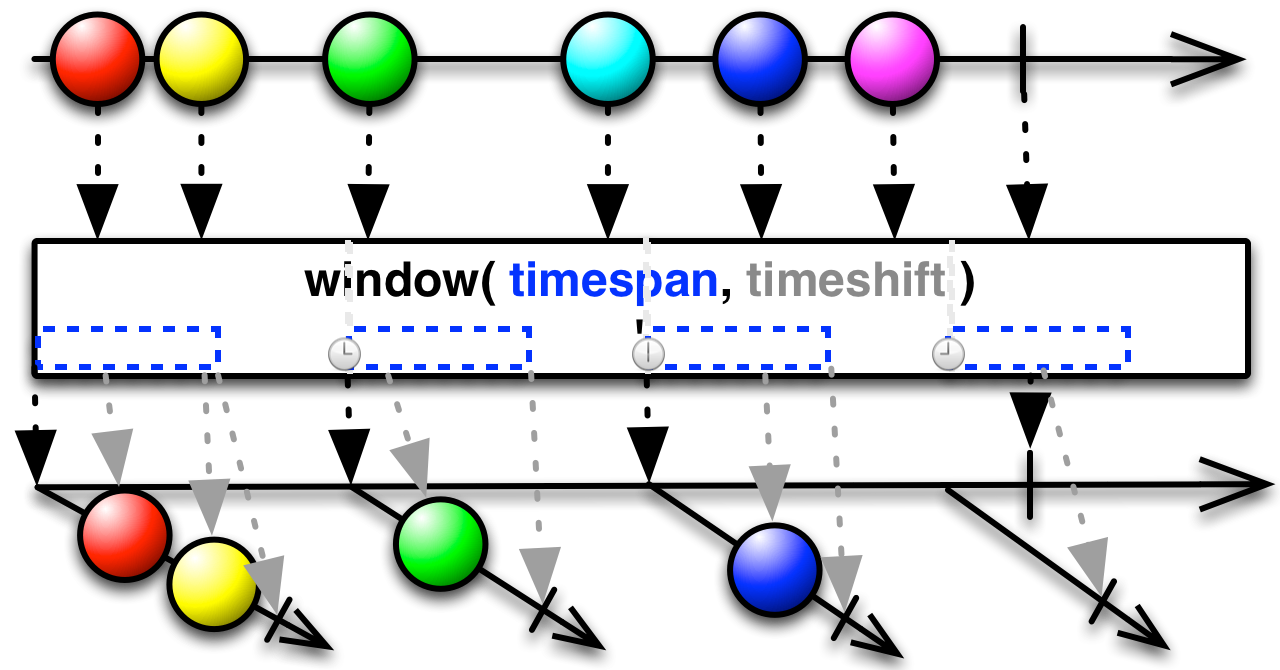
- Scheduler:
- This version of
windowoperates by default on thecomputationScheduler.
- Parameters:
timespan- the period of time each window collects items before it should be emittedtimeskip- the period of time after which a new window will be createdunit- the unit of time that applies to thetimespanandtimeskiparguments- Returns:
- an Observable that emits new windows periodically as a fixed timespan elapses
- See Also:
- ReactiveX operators documentation: Window
-
window
@CheckReturnValue @SchedulerSupport(value="custom") public final Observable<Observable<T>> window(long timespan, long timeskip, TimeUnit unit, Scheduler scheduler)
Returns an Observable that emits windows of items it collects from the source ObservableSource. The resulting ObservableSource starts a new window periodically, as determined by thetimeskipargument. It emits each window after a fixed timespan, specified by thetimespanargument. When the source ObservableSource completes or ObservableSource completes or encounters an error, the resulting ObservableSource emits the current window and propagates the notification from the source ObservableSource.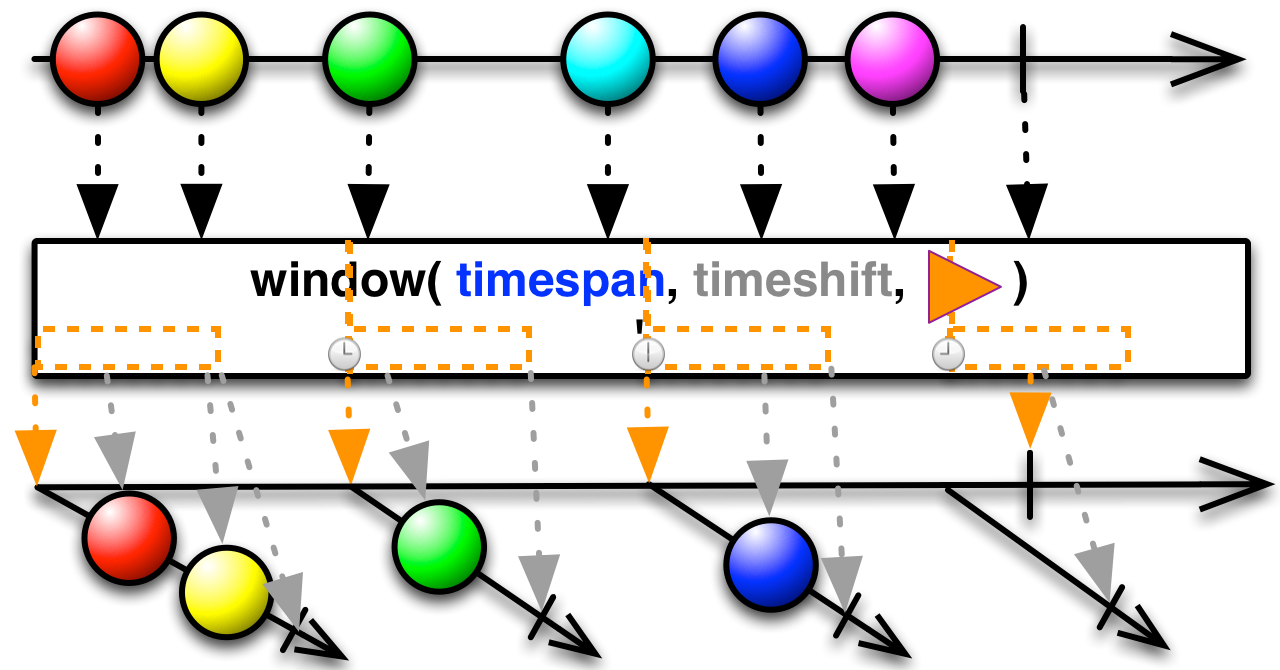
- Scheduler:
- You specify which
Schedulerthis operator will use.
- Parameters:
timespan- the period of time each window collects items before it should be emittedtimeskip- the period of time after which a new window will be createdunit- the unit of time that applies to thetimespanandtimeskipargumentsscheduler- theSchedulerto use when determining the end and start of a window- Returns:
- an Observable that emits new windows periodically as a fixed timespan elapses
- See Also:
- ReactiveX operators documentation: Window
-
window
@CheckReturnValue @SchedulerSupport(value="custom") public final Observable<Observable<T>> window(long timespan, long timeskip, TimeUnit unit, Scheduler scheduler, int bufferSize)
Returns an Observable that emits windows of items it collects from the source ObservableSource. The resulting ObservableSource starts a new window periodically, as determined by thetimeskipargument. It emits each window after a fixed timespan, specified by thetimespanargument. When the source ObservableSource completes or ObservableSource completes or encounters an error, the resulting ObservableSource emits the current window and propagates the notification from the source ObservableSource.
- Scheduler:
- You specify which
Schedulerthis operator will use.
- Parameters:
timespan- the period of time each window collects items before it should be emittedtimeskip- the period of time after which a new window will be createdunit- the unit of time that applies to thetimespanandtimeskipargumentsscheduler- theSchedulerto use when determining the end and start of a windowbufferSize- the capacity hint for the buffer in the inner windows- Returns:
- an Observable that emits new windows periodically as a fixed timespan elapses
- See Also:
- ReactiveX operators documentation: Window
-
window
@CheckReturnValue @SchedulerSupport(value="io.reactivex:computation") public final Observable<Observable<T>> window(long timespan, TimeUnit unit)
Returns an Observable that emits windows of items it collects from the source ObservableSource. The resulting ObservableSource emits connected, non-overlapping windows, each of a fixed duration specified by thetimespanargument. When the source ObservableSource completes or encounters an error, the resulting ObservableSource emits the current window and propagates the notification from the source ObservableSource.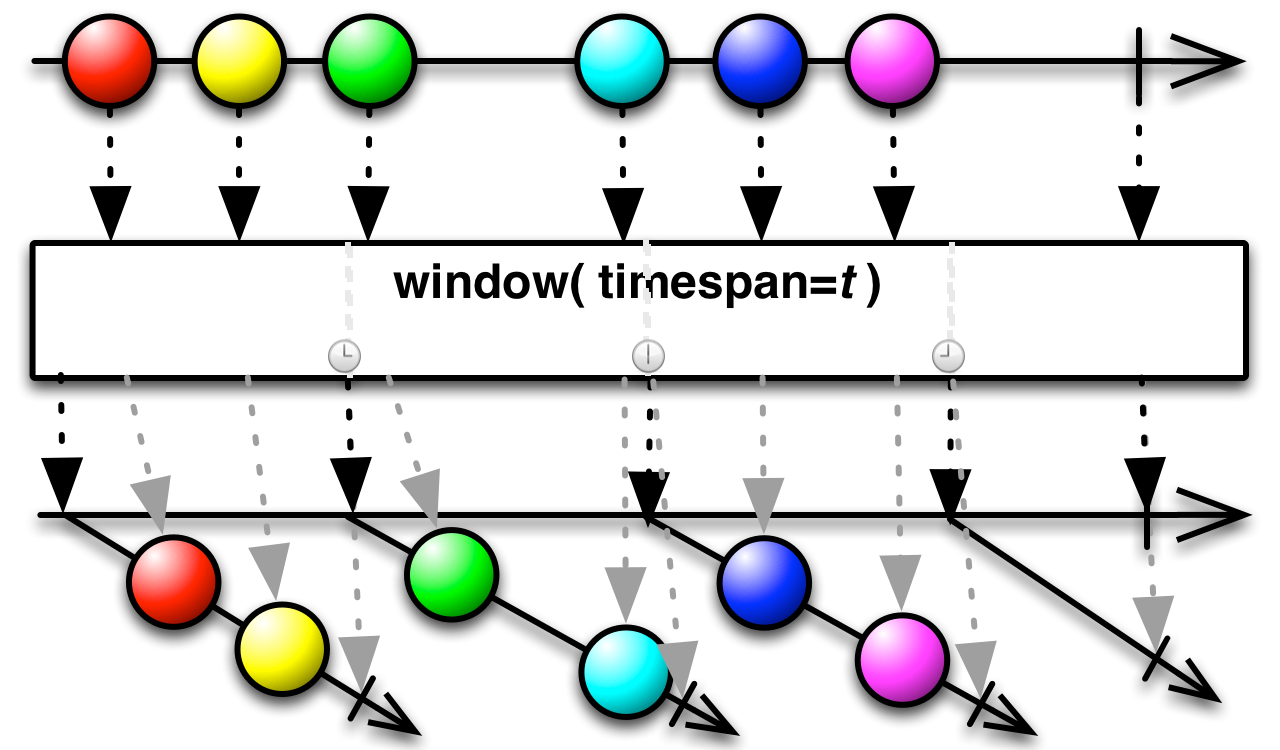
- Scheduler:
- This version of
windowoperates by default on thecomputationScheduler.
- Parameters:
timespan- the period of time each window collects items before it should be emitted and replaced with a new windowunit- the unit of time that applies to thetimespanargument- Returns:
- an Observable that emits connected, non-overlapping windows representing items emitted by the source ObservableSource during fixed, consecutive durations
- See Also:
- ReactiveX operators documentation: Window
-
window
@CheckReturnValue @SchedulerSupport(value="io.reactivex:computation") public final Observable<Observable<T>> window(long timespan, TimeUnit unit, long count)
Returns an Observable that emits windows of items it collects from the source ObservableSource. The resulting ObservableSource emits connected, non-overlapping windows, each of a fixed duration as specified by thetimespanargument or a maximum size as specified by thecountargument (whichever is reached first). When the source ObservableSource completes or encounters an error, the resulting ObservableSource emits the current window and propagates the notification from the source ObservableSource.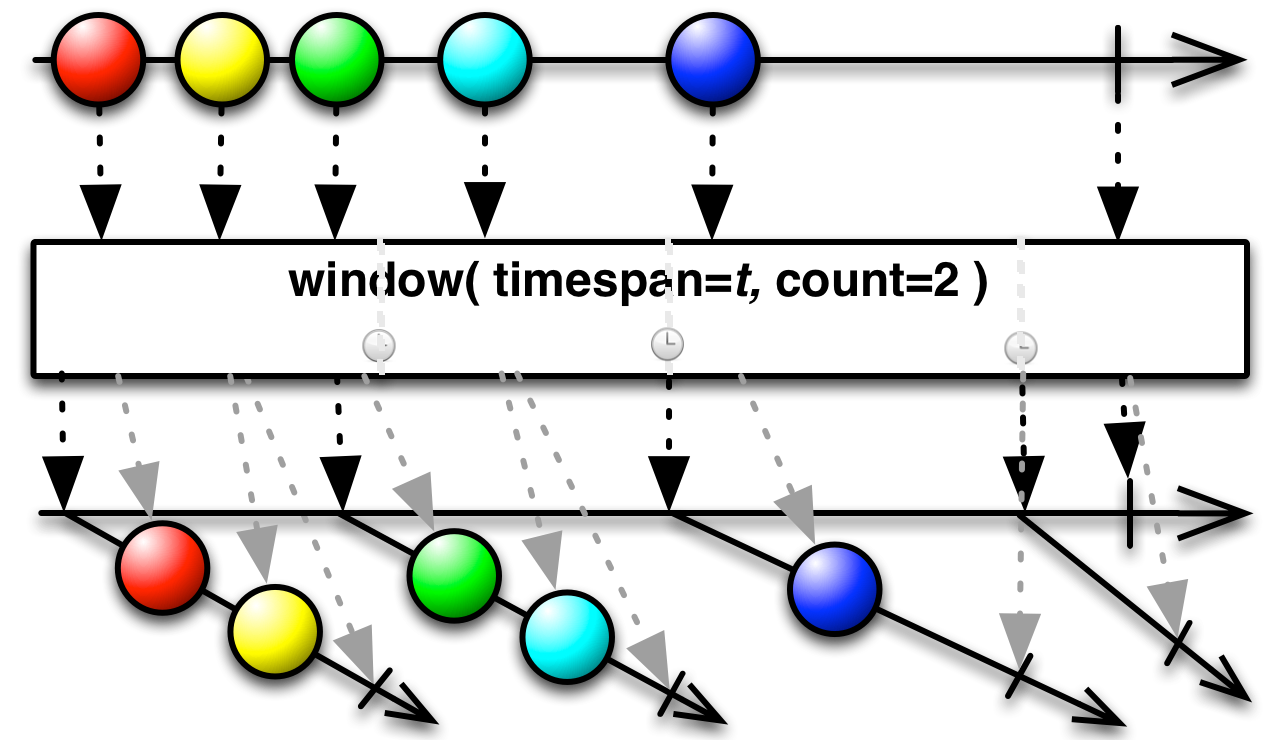
- Scheduler:
- This version of
windowoperates by default on thecomputationScheduler.
- Parameters:
timespan- the period of time each window collects items before it should be emitted and replaced with a new windowunit- the unit of time that applies to thetimespanargumentcount- the maximum size of each window before it should be emitted- Returns:
- an Observable that emits connected, non-overlapping windows of items from the source ObservableSource that were emitted during a fixed duration of time or when the window has reached maximum capacity (whichever occurs first)
- See Also:
- ReactiveX operators documentation: Window
-
window
@CheckReturnValue @SchedulerSupport(value="io.reactivex:computation") public final Observable<Observable<T>> window(long timespan, TimeUnit unit, long count, boolean restart)
Returns an Observable that emits windows of items it collects from the source ObservableSource. The resulting ObservableSource emits connected, non-overlapping windows, each of a fixed duration as specified by thetimespanargument or a maximum size as specified by thecountargument (whichever is reached first). When the source ObservableSource completes or encounters an error, the resulting ObservableSource emits the current window and propagates the notification from the source ObservableSource.
- Scheduler:
- This version of
windowoperates by default on thecomputationScheduler.
- Parameters:
timespan- the period of time each window collects items before it should be emitted and replaced with a new windowunit- the unit of time that applies to thetimespanargumentcount- the maximum size of each window before it should be emittedrestart- if true, when a window reaches the capacity limit, the timer is restarted as well- Returns:
- an Observable that emits connected, non-overlapping windows of items from the source ObservableSource that were emitted during a fixed duration of time or when the window has reached maximum capacity (whichever occurs first)
- See Also:
- ReactiveX operators documentation: Window
-
window
@CheckReturnValue @SchedulerSupport(value="custom") public final Observable<Observable<T>> window(long timespan, TimeUnit unit, Scheduler scheduler)
Returns an Observable that emits windows of items it collects from the source ObservableSource. The resulting ObservableSource emits connected, non-overlapping windows, each of a fixed duration as specified by thetimespanargument. When the source ObservableSource completes or encounters an error, the resulting ObservableSource emits the current window and propagates the notification from the source ObservableSource.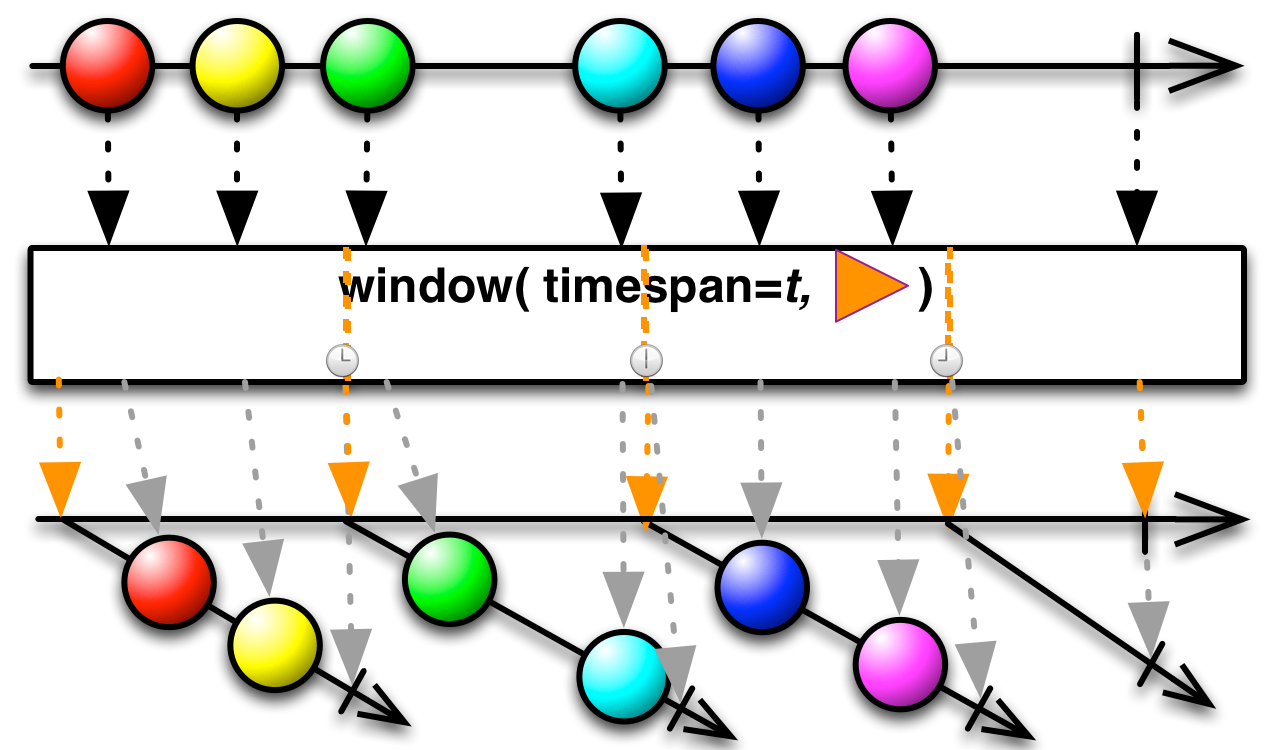
- Scheduler:
- You specify which
Schedulerthis operator will use.
- Parameters:
timespan- the period of time each window collects items before it should be emitted and replaced with a new windowunit- the unit of time which applies to thetimespanargumentscheduler- theSchedulerto use when determining the end and start of a window- Returns:
- an Observable that emits connected, non-overlapping windows containing items emitted by the source ObservableSource within a fixed duration
- See Also:
- ReactiveX operators documentation: Window
-
window
@CheckReturnValue @SchedulerSupport(value="custom") public final Observable<Observable<T>> window(long timespan, TimeUnit unit, Scheduler scheduler, long count)
Returns an Observable that emits windows of items it collects from the source ObservableSource. The resulting ObservableSource emits connected, non-overlapping windows, each of a fixed duration specified by thetimespanargument or a maximum size specified by thecountargument (whichever is reached first). When the source ObservableSource completes or encounters an error, the resulting ObservableSource emits the current window and propagates the notification from the source ObservableSource.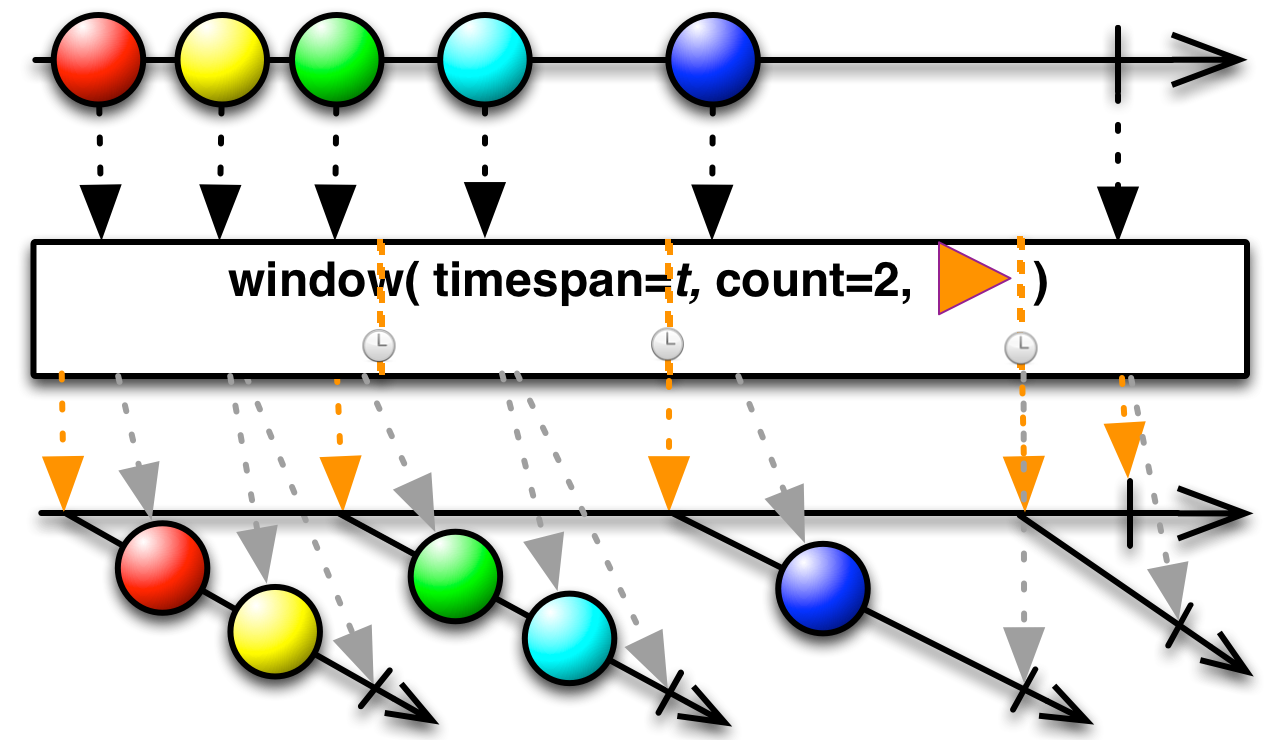
- Scheduler:
- You specify which
Schedulerthis operator will use.
- Parameters:
timespan- the period of time each window collects items before it should be emitted and replaced with a new windowunit- the unit of time which applies to thetimespanargumentcount- the maximum size of each window before it should be emittedscheduler- theSchedulerto use when determining the end and start of a window- Returns:
- an Observable that emits connected, non-overlapping windows of items from the source ObservableSource that were emitted during a fixed duration of time or when the window has reached maximum capacity (whichever occurs first)
- See Also:
- ReactiveX operators documentation: Window
-
window
@CheckReturnValue @SchedulerSupport(value="custom") public final Observable<Observable<T>> window(long timespan, TimeUnit unit, Scheduler scheduler, long count, boolean restart)
Returns an Observable that emits windows of items it collects from the source ObservableSource. The resulting ObservableSource emits connected, non-overlapping windows, each of a fixed duration specified by thetimespanargument or a maximum size specified by thecountargument (whichever is reached first). When the source ObservableSource completes or encounters an error, the resulting ObservableSource emits the current window and propagates the notification from the source ObservableSource.
- Scheduler:
- You specify which
Schedulerthis operator will use.
- Parameters:
timespan- the period of time each window collects items before it should be emitted and replaced with a new windowunit- the unit of time which applies to thetimespanargumentcount- the maximum size of each window before it should be emittedscheduler- theSchedulerto use when determining the end and start of a windowrestart- if true, when a window reaches the capacity limit, the timer is restarted as well- Returns:
- an Observable that emits connected, non-overlapping windows of items from the source ObservableSource that were emitted during a fixed duration of time or when the window has reached maximum capacity (whichever occurs first)
- See Also:
- ReactiveX operators documentation: Window
-
window
@CheckReturnValue @SchedulerSupport(value="custom") public final Observable<Observable<T>> window(long timespan, TimeUnit unit, Scheduler scheduler, long count, boolean restart, int bufferSize)
Returns an Observable that emits windows of items it collects from the source ObservableSource. The resulting ObservableSource emits connected, non-overlapping windows, each of a fixed duration specified by thetimespanargument or a maximum size specified by thecountargument (whichever is reached first). When the source ObservableSource completes or encounters an error, the resulting ObservableSource emits the current window and propagates the notification from the source ObservableSource.
- Scheduler:
- You specify which
Schedulerthis operator will use.
- Parameters:
timespan- the period of time each window collects items before it should be emitted and replaced with a new windowunit- the unit of time which applies to thetimespanargumentcount- the maximum size of each window before it should be emittedscheduler- theSchedulerto use when determining the end and start of a windowrestart- if true, when a window reaches the capacity limit, the timer is restarted as wellbufferSize- the capacity hint for the buffer in the inner windows- Returns:
- an Observable that emits connected, non-overlapping windows of items from the source ObservableSource that were emitted during a fixed duration of time or when the window has reached maximum capacity (whichever occurs first)
- See Also:
- ReactiveX operators documentation: Window
-
window
@CheckReturnValue @SchedulerSupport(value="none") public final <B> Observable<Observable<T>> window(ObservableSource<B> boundary)
Returns an Observable that emits non-overlapping windows of items it collects from the source ObservableSource where the boundary of each window is determined by the items emitted from a specified boundary-governing ObservableSource.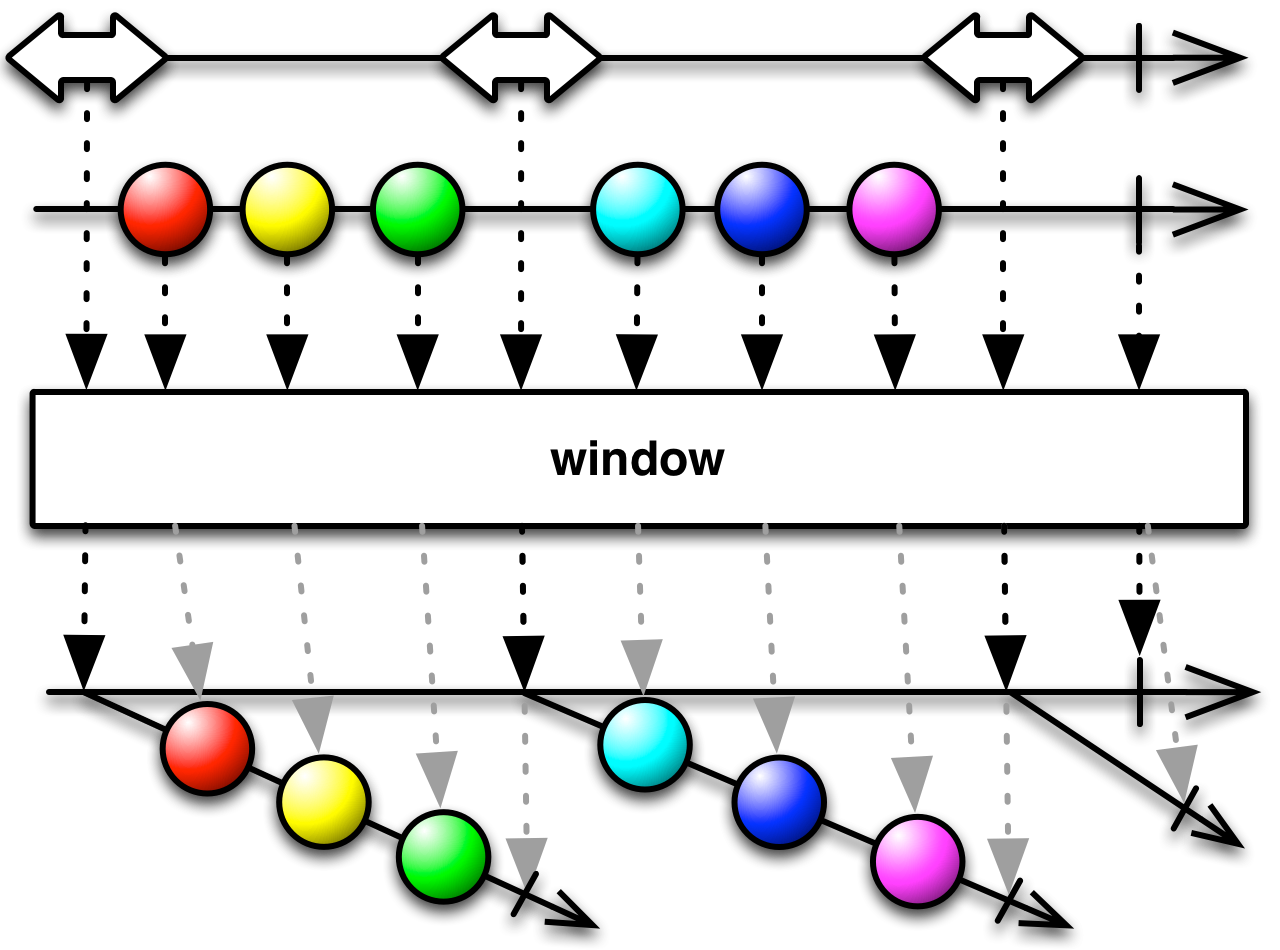
- Scheduler:
- This version of
windowdoes not operate by default on a particularScheduler.
- Type Parameters:
B- the window element type (ignored)- Parameters:
boundary- an ObservableSource whose emitted items close and open windows- Returns:
- an Observable that emits non-overlapping windows of items it collects from the source ObservableSource
where the boundary of each window is determined by the items emitted from the
boundaryObservableSource - See Also:
- ReactiveX operators documentation: Window
-
window
@CheckReturnValue @SchedulerSupport(value="none") public final <B> Observable<Observable<T>> window(ObservableSource<B> boundary, int bufferSize)
Returns an Observable that emits non-overlapping windows of items it collects from the source ObservableSource where the boundary of each window is determined by the items emitted from a specified boundary-governing ObservableSource.
- Scheduler:
- This version of
windowdoes not operate by default on a particularScheduler.
- Type Parameters:
B- the window element type (ignored)- Parameters:
boundary- an ObservableSource whose emitted items close and open windowsbufferSize- the capacity hint for the buffer in the inner windows- Returns:
- an Observable that emits non-overlapping windows of items it collects from the source ObservableSource
where the boundary of each window is determined by the items emitted from the
boundaryObservableSource - See Also:
- ReactiveX operators documentation: Window
-
window
@CheckReturnValue @SchedulerSupport(value="none") public final <U,V> Observable<Observable<T>> window(ObservableSource<U> openingIndicator, Function<? super U,? extends ObservableSource<V>> closingIndicator)
Returns an Observable that emits windows of items it collects from the source ObservableSource. The resulting ObservableSource emits windows that contain those items emitted by the source ObservableSource between the time when theopeningIndicatorObservableSource emits an item and when the ObservableSource returned byclosingIndicatoremits an item.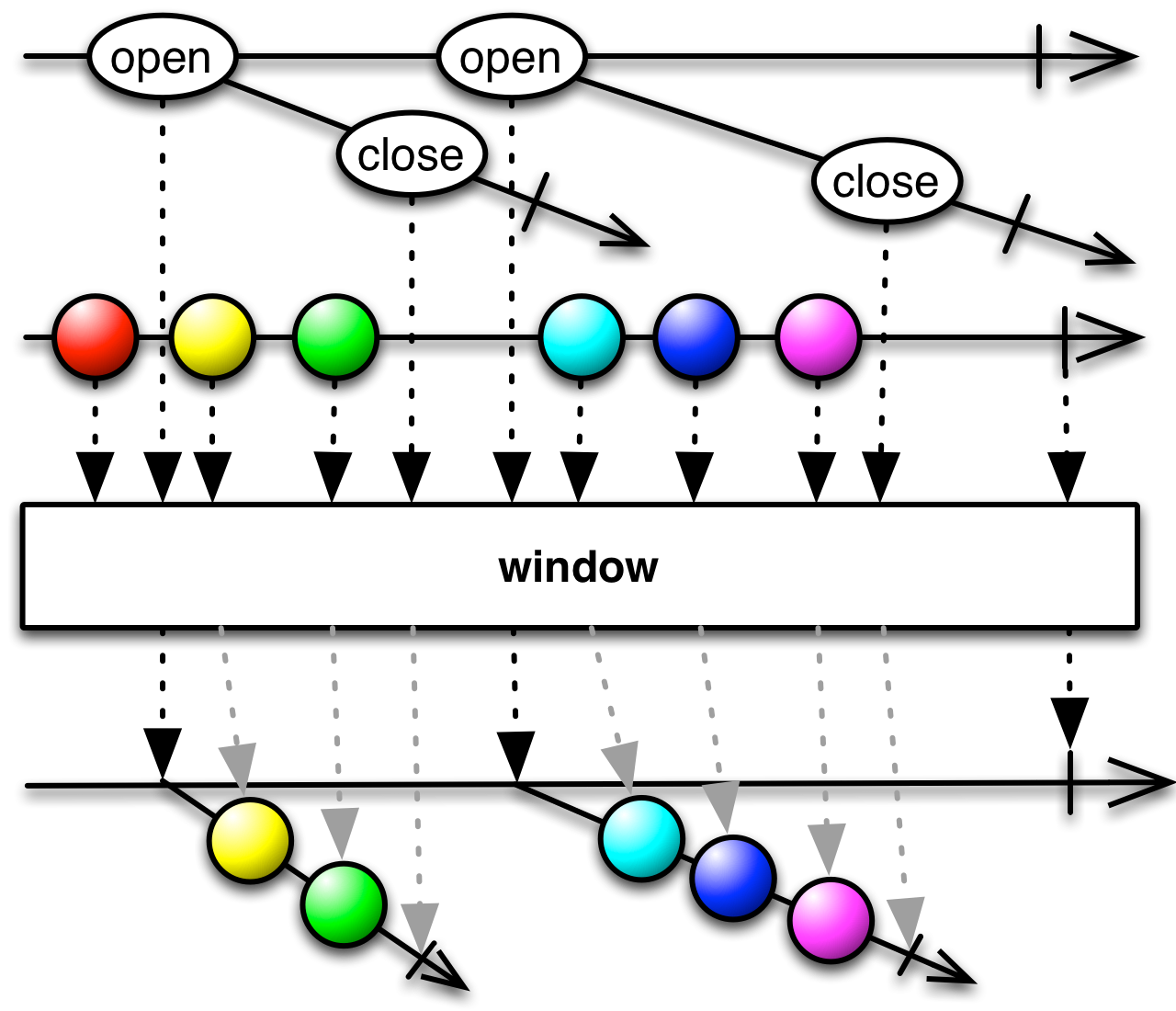
- Scheduler:
- This version of
windowdoes not operate by default on a particularScheduler.
- Type Parameters:
U- the element type of the window-opening ObservableSourceV- the element type of the window-closing ObservableSources- Parameters:
openingIndicator- an ObservableSource that, when it emits an item, causes another window to be createdclosingIndicator- aFunctionthat produces an ObservableSource for every window created. When this ObservableSource emits an item, the associated window is closed and emitted- Returns:
- an Observable that emits windows of items emitted by the source ObservableSource that are governed by the specified window-governing ObservableSources
- See Also:
- ReactiveX operators documentation: Window
-
window
@CheckReturnValue @SchedulerSupport(value="none") public final <U,V> Observable<Observable<T>> window(ObservableSource<U> openingIndicator, Function<? super U,? extends ObservableSource<V>> closingIndicator, int bufferSize)
Returns an Observable that emits windows of items it collects from the source ObservableSource. The resulting ObservableSource emits windows that contain those items emitted by the source ObservableSource between the time when theopeningIndicatorObservableSource emits an item and when the ObservableSource returned byclosingIndicatoremits an item.
- Scheduler:
- This version of
windowdoes not operate by default on a particularScheduler.
- Type Parameters:
U- the element type of the window-opening ObservableSourceV- the element type of the window-closing ObservableSources- Parameters:
openingIndicator- an ObservableSource that, when it emits an item, causes another window to be createdclosingIndicator- aFunctionthat produces an ObservableSource for every window created. When this ObservableSource emits an item, the associated window is closed and emittedbufferSize- the capacity hint for the buffer in the inner windows- Returns:
- an Observable that emits windows of items emitted by the source ObservableSource that are governed by the specified window-governing ObservableSources
- See Also:
- ReactiveX operators documentation: Window
-
window
@CheckReturnValue @SchedulerSupport(value="none") public final <B> Observable<Observable<T>> window(Callable<? extends ObservableSource<B>> boundary)
Returns an Observable that emits windows of items it collects from the source ObservableSource. The resulting ObservableSource emits connected, non-overlapping windows. It emits the current window and opens a new one whenever the ObservableSource produced by the specifiedclosingIndicatoremits an item.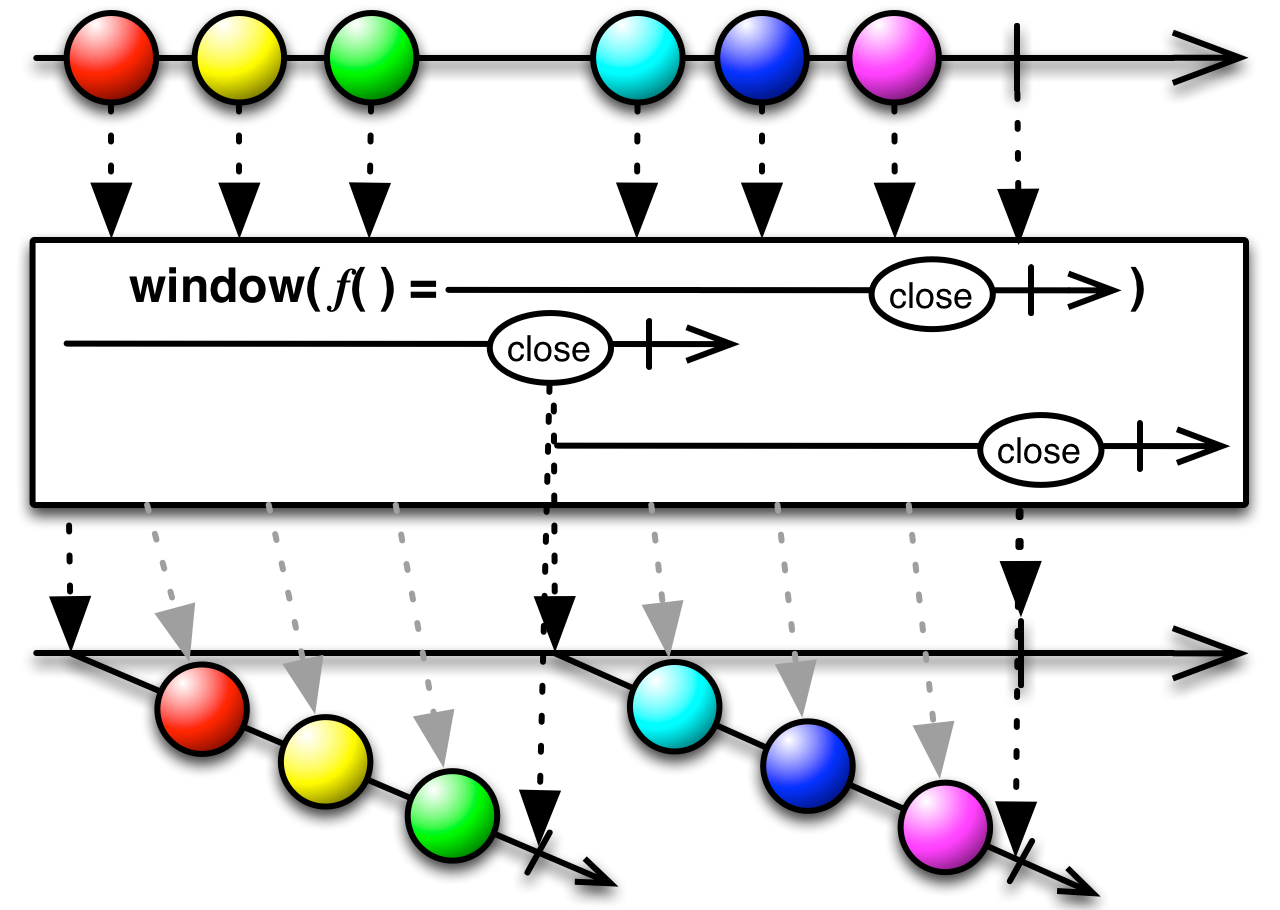
- Scheduler:
- This version of
windowdoes not operate by default on a particularScheduler.
- Type Parameters:
B- the element type of the boundary ObservableSource- Parameters:
boundary- aCallablethat returns anObservableSourcethat governs the boundary between windows. When the sourceObservableSourceemits an item,windowemits the current window and begins a new one.- Returns:
- an Observable that emits connected, non-overlapping windows of items from the source ObservableSource
whenever
closingIndicatoremits an item - See Also:
- ReactiveX operators documentation: Window
-
window
@CheckReturnValue @SchedulerSupport(value="none") public final <B> Observable<Observable<T>> window(Callable<? extends ObservableSource<B>> boundary, int bufferSize)
Returns an Observable that emits windows of items it collects from the source ObservableSource. The resulting ObservableSource emits connected, non-overlapping windows. It emits the current window and opens a new one whenever the ObservableSource produced by the specifiedclosingIndicatoremits an item.
- Scheduler:
- This version of
windowdoes not operate by default on a particularScheduler.
- Type Parameters:
B- the element type of the boundary ObservableSource- Parameters:
boundary- aCallablethat returns anObservableSourcethat governs the boundary between windows. When the sourceObservableSourceemits an item,windowemits the current window and begins a new one.bufferSize- the capacity hint for the buffer in the inner windows- Returns:
- an Observable that emits connected, non-overlapping windows of items from the source ObservableSource
whenever
closingIndicatoremits an item - See Also:
- ReactiveX operators documentation: Window
-
withLatestFrom
@CheckReturnValue @SchedulerSupport(value="none") public final <U,R> Observable<R> withLatestFrom(ObservableSource<? extends U> other, BiFunction<? super T,? super U,? extends R> combiner)
Merges the specified ObservableSource into this ObservableSource sequence by using theresultSelectorfunction only when the source ObservableSource (this instance) emits an item.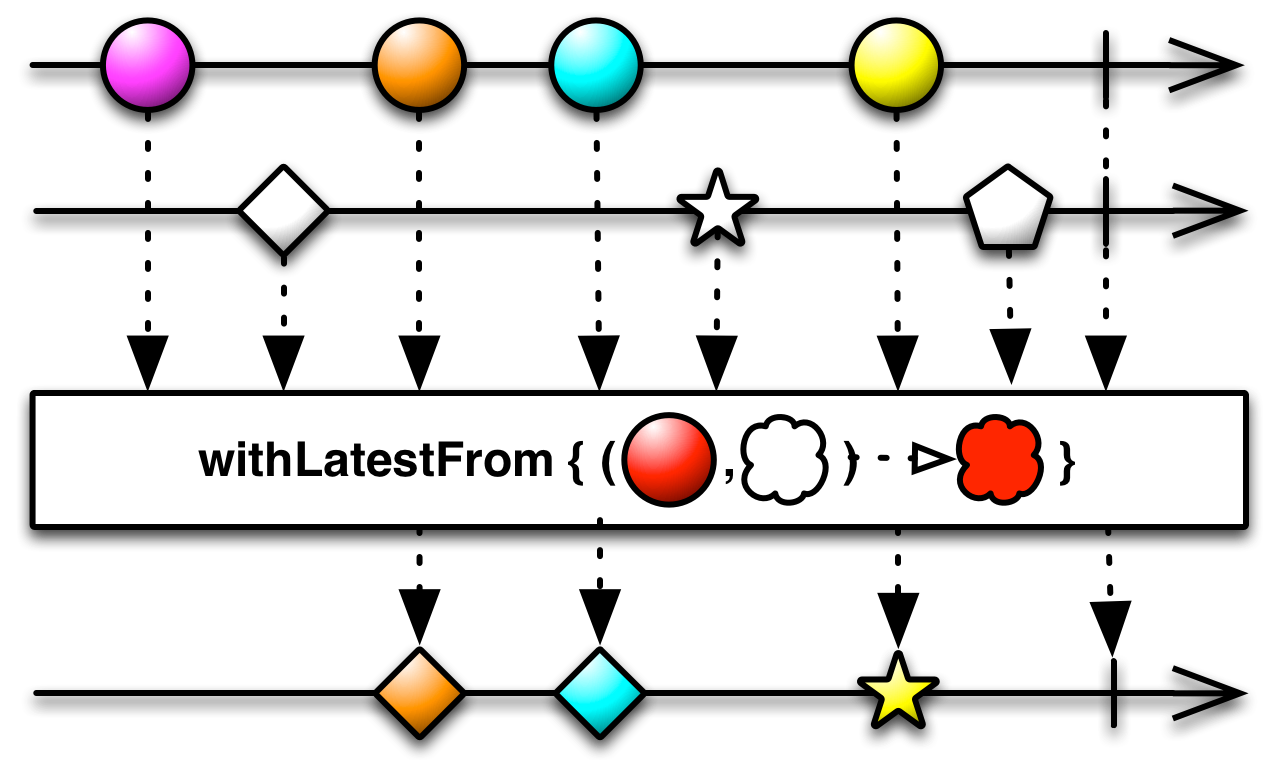
- Scheduler:
- This operator, by default, doesn't run any particular
Scheduler.
- Type Parameters:
U- the element type of the other ObservableSourceR- the result type of the combination- Parameters:
other- the other ObservableSourcecombiner- the function to call when this ObservableSource emits an item and the other ObservableSource has already emitted an item, to generate the item to be emitted by the resulting ObservableSource- Returns:
- an Observable that merges the specified ObservableSource into this ObservableSource by using the
resultSelectorfunction only when the source ObservableSource sequence (this instance) emits an item - Since:
- 2.0
- See Also:
- ReactiveX operators documentation: CombineLatest
-
withLatestFrom
@CheckReturnValue @SchedulerSupport(value="none") public final <T1,T2,R> Observable<R> withLatestFrom(ObservableSource<T1> o1, ObservableSource<T2> o2, Function3<? super T,? super T1,? super T2,R> combiner)
Combines the value emission from this ObservableSource with the latest emissions from the other ObservableSources via a function to produce the output item.Note that this operator doesn't emit anything until all other sources have produced at least one value. The resulting emission only happens when this ObservableSource emits (and not when any of the other sources emit, unlike combineLatest). If a source doesn't produce any value and just completes, the sequence is completed immediately.

- Scheduler:
- This operator does not operate by default on a particular
Scheduler.
- Type Parameters:
T1- the first other source's value typeT2- the second other source's value typeR- the result value type- Parameters:
o1- the first other ObservableSourceo2- the second other ObservableSourcecombiner- the function called with an array of values from each participating ObservableSource- Returns:
- the new ObservableSource instance
- Since:
- 2.0
-
withLatestFrom
@CheckReturnValue @SchedulerSupport(value="none") public final <T1,T2,T3,R> Observable<R> withLatestFrom(ObservableSource<T1> o1, ObservableSource<T2> o2, ObservableSource<T3> o3, Function4<? super T,? super T1,? super T2,? super T3,R> combiner)
Combines the value emission from this ObservableSource with the latest emissions from the other ObservableSources via a function to produce the output item.Note that this operator doesn't emit anything until all other sources have produced at least one value. The resulting emission only happens when this ObservableSource emits (and not when any of the other sources emit, unlike combineLatest). If a source doesn't produce any value and just completes, the sequence is completed immediately.

- Scheduler:
- This operator does not operate by default on a particular
Scheduler.
- Type Parameters:
T1- the first other source's value typeT2- the second other source's value typeT3- the third other source's value typeR- the result value type- Parameters:
o1- the first other ObservableSourceo2- the second other ObservableSourceo3- the third other ObservableSourcecombiner- the function called with an array of values from each participating ObservableSource- Returns:
- the new ObservableSource instance
- Since:
- 2.0
-
withLatestFrom
@CheckReturnValue @SchedulerSupport(value="none") public final <T1,T2,T3,T4,R> Observable<R> withLatestFrom(ObservableSource<T1> o1, ObservableSource<T2> o2, ObservableSource<T3> o3, ObservableSource<T4> o4, Function5<? super T,? super T1,? super T2,? super T3,? super T4,R> combiner)
Combines the value emission from this ObservableSource with the latest emissions from the other ObservableSources via a function to produce the output item.Note that this operator doesn't emit anything until all other sources have produced at least one value. The resulting emission only happens when this ObservableSource emits (and not when any of the other sources emit, unlike combineLatest). If a source doesn't produce any value and just completes, the sequence is completed immediately.

- Scheduler:
- This operator does not operate by default on a particular
Scheduler.
- Type Parameters:
T1- the first other source's value typeT2- the second other source's value typeT3- the third other source's value typeT4- the fourth other source's value typeR- the result value type- Parameters:
o1- the first other ObservableSourceo2- the second other ObservableSourceo3- the third other ObservableSourceo4- the fourth other ObservableSourcecombiner- the function called with an array of values from each participating ObservableSource- Returns:
- the new ObservableSource instance
- Since:
- 2.0
-
withLatestFrom
@CheckReturnValue @SchedulerSupport(value="none") public final <R> Observable<R> withLatestFrom(ObservableSource<?>[] others, Function<? super Object[],R> combiner)
Combines the value emission from this ObservableSource with the latest emissions from the other ObservableSources via a function to produce the output item.Note that this operator doesn't emit anything until all other sources have produced at least one value. The resulting emission only happens when this ObservableSource emits (and not when any of the other sources emit, unlike combineLatest). If a source doesn't produce any value and just completes, the sequence is completed immediately.

- Scheduler:
- This operator does not operate by default on a particular
Scheduler.
- Type Parameters:
R- the result value type- Parameters:
others- the array of other sourcescombiner- the function called with an array of values from each participating ObservableSource- Returns:
- the new ObservableSource instance
- Since:
- 2.0
-
withLatestFrom
@CheckReturnValue @SchedulerSupport(value="none") public final <R> Observable<R> withLatestFrom(Iterable<? extends ObservableSource<?>> others, Function<? super Object[],R> combiner)
Combines the value emission from this ObservableSource with the latest emissions from the other ObservableSources via a function to produce the output item.Note that this operator doesn't emit anything until all other sources have produced at least one value. The resulting emission only happens when this ObservableSource emits (and not when any of the other sources emit, unlike combineLatest). If a source doesn't produce any value and just completes, the sequence is completed immediately.

- Scheduler:
- This operator does not operate by default on a particular
Scheduler.
- Type Parameters:
R- the result value type- Parameters:
others- the iterable of other sourcescombiner- the function called with an array of values from each participating ObservableSource- Returns:
- the new ObservableSource instance
- Since:
- 2.0
-
zipWith
@CheckReturnValue @SchedulerSupport(value="none") public final <U,R> Observable<R> zipWith(Iterable<U> other, BiFunction<? super T,? super U,? extends R> zipper)
Returns an Observable that emits items that are the result of applying a specified function to pairs of values, one each from the source ObservableSource and a specified Iterable sequence.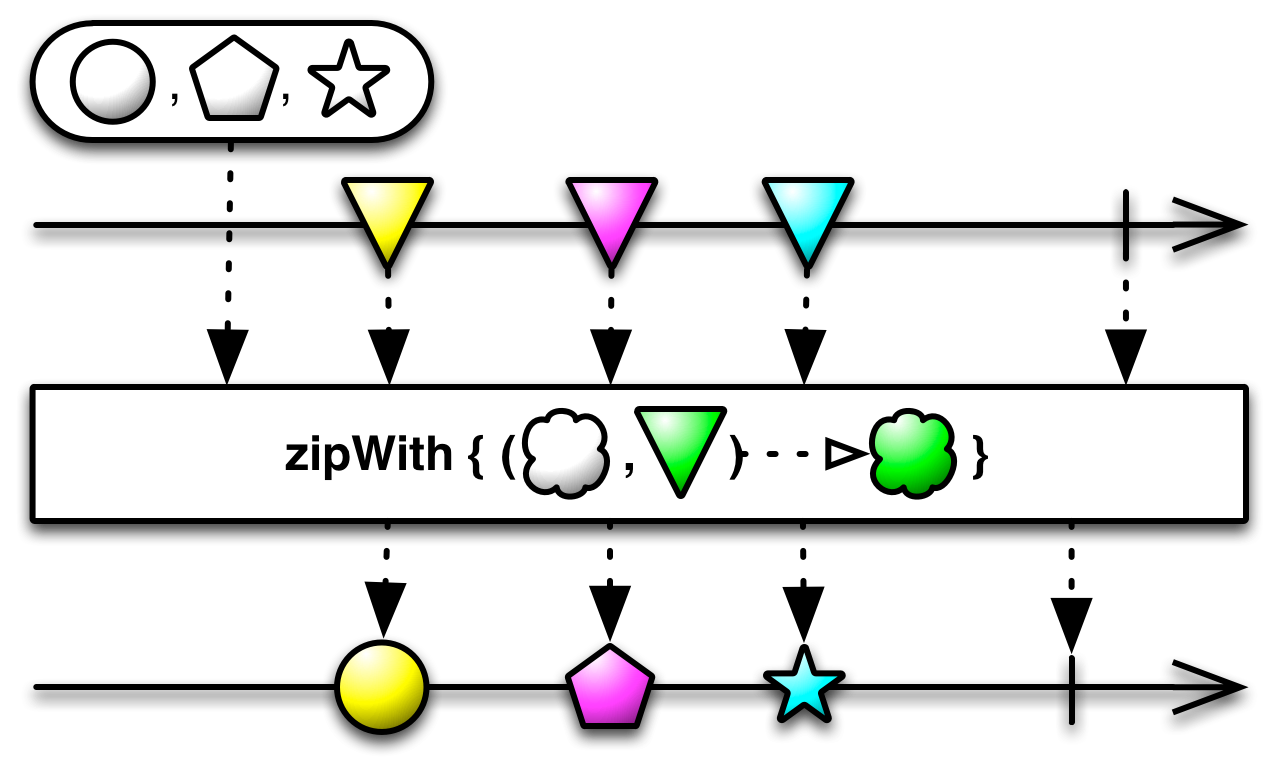
Note that the
otherIterable is evaluated as items are observed from the source ObservableSource; it is not pre-consumed. This allows you to zip infinite streams on either side.- Scheduler:
zipWithdoes not operate by default on a particularScheduler.
- Type Parameters:
U- the type of items in theotherIterableR- the type of items emitted by the resulting ObservableSource- Parameters:
other- the Iterable sequencezipper- a function that combines the pairs of items from the ObservableSource and the Iterable to generate the items to be emitted by the resulting ObservableSource- Returns:
- an Observable that pairs up values from the source ObservableSource and the
otherIterable sequence and emits the results ofzipFunctionapplied to these pairs - See Also:
- ReactiveX operators documentation: Zip
-
zipWith
@CheckReturnValue @SchedulerSupport(value="none") public final <U,R> Observable<R> zipWith(ObservableSource<? extends U> other, BiFunction<? super T,? super U,? extends R> zipper)
Returns an Observable that emits items that are the result of applying a specified function to pairs of values, one each from the source ObservableSource and another specified ObservableSource.
The operator subscribes to its sources in order they are specified and completes eagerly if one of the sources is shorter than the rest while disposing the other sources. Therefore, it is possible those other sources will never be able to run to completion (and thus not calling
doOnComplete()). This can also happen if the sources are exactly the same length; if source A completes and B has been consumed and is about to complete, the operator detects A won't be sending further values and it will dispose B immediately. For example:range(1, 5).doOnComplete(action1).zipWith(range(6, 5).doOnComplete(action2), (a, b) -> a + b)action1will be called butaction2won't.
To work around this termination property, usedoOnDispose(Action)as well or useusing()to do cleanup in case of completion or a dispose() call.- Scheduler:
zipWithdoes not operate by default on a particularScheduler.
- Type Parameters:
U- the type of items emitted by theotherObservableSourceR- the type of items emitted by the resulting ObservableSource- Parameters:
other- the other ObservableSourcezipper- a function that combines the pairs of items from the two ObservableSources to generate the items to be emitted by the resulting ObservableSource- Returns:
- an Observable that pairs up values from the source ObservableSource and the
otherObservableSource and emits the results ofzipFunctionapplied to these pairs - See Also:
- ReactiveX operators documentation: Zip
-
zipWith
@CheckReturnValue @SchedulerSupport(value="none") public final <U,R> Observable<R> zipWith(ObservableSource<? extends U> other, BiFunction<? super T,? super U,? extends R> zipper, boolean delayError)
Returns an Observable that emits items that are the result of applying a specified function to pairs of values, one each from the source ObservableSource and another specified ObservableSource.
The operator subscribes to its sources in order they are specified and completes eagerly if one of the sources is shorter than the rest while disposing the other sources. Therefore, it is possible those other sources will never be able to run to completion (and thus not calling
doOnComplete()). This can also happen if the sources are exactly the same length; if source A completes and B has been consumed and is about to complete, the operator detects A won't be sending further values and it will dispose B immediately. For example:range(1, 5).doOnComplete(action1).zipWith(range(6, 5).doOnComplete(action2), (a, b) -> a + b)action1will be called butaction2won't.
To work around this termination property, usedoOnDispose(Action)as well or useusing()to do cleanup in case of completion or a dispose() call.- Scheduler:
zipWithdoes not operate by default on a particularScheduler.
- Type Parameters:
U- the type of items emitted by theotherObservableSourceR- the type of items emitted by the resulting ObservableSource- Parameters:
other- the other ObservableSourcezipper- a function that combines the pairs of items from the two ObservableSources to generate the items to be emitted by the resulting ObservableSourcedelayError- if true, errors from the current Observable or the other ObservableSource is delayed until both terminate- Returns:
- an Observable that pairs up values from the source ObservableSource and the
otherObservableSource and emits the results ofzipFunctionapplied to these pairs - Since:
- 2.0
- See Also:
- ReactiveX operators documentation: Zip
-
zipWith
@CheckReturnValue @SchedulerSupport(value="none") public final <U,R> Observable<R> zipWith(ObservableSource<? extends U> other, BiFunction<? super T,? super U,? extends R> zipper, boolean delayError, int bufferSize)
Returns an Observable that emits items that are the result of applying a specified function to pairs of values, one each from the source ObservableSource and another specified ObservableSource.
The operator subscribes to its sources in order they are specified and completes eagerly if one of the sources is shorter than the rest while disposing the other sources. Therefore, it is possible those other sources will never be able to run to completion (and thus not calling
doOnComplete()). This can also happen if the sources are exactly the same length; if source A completes and B has been consumed and is about to complete, the operator detects A won't be sending further values and it will dispose B immediately. For example:range(1, 5).doOnComplete(action1).zipWith(range(6, 5).doOnComplete(action2), (a, b) -> a + b)action1will be called butaction2won't.
To work around this termination property, usedoOnDispose(Action)as well or useusing()to do cleanup in case of completion or a dispose() call.- Scheduler:
zipWithdoes not operate by default on a particularScheduler.
- Type Parameters:
U- the type of items emitted by theotherObservableSourceR- the type of items emitted by the resulting ObservableSource- Parameters:
other- the other ObservableSourcezipper- a function that combines the pairs of items from the two ObservableSources to generate the items to be emitted by the resulting ObservableSourcebufferSize- the capacity hint for the buffer in the inner windowsdelayError- if true, errors from the current Observable or the other ObservableSource is delayed until both terminate- Returns:
- an Observable that pairs up values from the source ObservableSource and the
otherObservableSource and emits the results ofzipFunctionapplied to these pairs - Since:
- 2.0
- See Also:
- ReactiveX operators documentation: Zip
-
test
@CheckReturnValue @SchedulerSupport(value="none") public final TestObserver<T> test()
Creates a TestObserver and subscribes it to this Observable.- Scheduler:
testdoes not operate by default on a particularScheduler.
- Returns:
- the new TestObserver instance
- Since:
- 2.0
-
test
@CheckReturnValue @SchedulerSupport(value="none") public final TestObserver<T> test(boolean dispose)
Creates a TestObserver, optionally disposes it and then subscribes it to this Observable.- Scheduler:
testdoes not operate by default on a particularScheduler.
- Parameters:
dispose- dispose the TestObserver before it is subscribed to this Observable?- Returns:
- the new TestObserver instance
- Since:
- 2.0
-
-